- Home
- Collections
- COLES DL
- Coles Family of Ongaonga, The
Coles Family of Ongaonga, The
Published by …
EVAGEAN Publishing
Bridge Street
Ongaonga
Central Hawkes Bay
New Zealand
ISBN 1-877262-06-4 (soft cover)
ISBN 1-877262-07-2 (hard cover)
ISBN 1-877262-08-0 (leather bound)
The compilation of this publication was carried out by Evagean Publishing as part of an on-going effort to preserve the history and heritage of the village of Ongaonga, Central Hawkes Bay.
The data contained in this book have been printed by computer using the EVAGEAN Genealogical Publishing Programme. No part of this publication may be reproduced by any means, electronic, mechanical, electrostatic photocopying or otherwise, or stored in a retrieval system without the prior permission of the Publishers.
Partial or complete printouts of current data may be obtained on application to the Publisher.
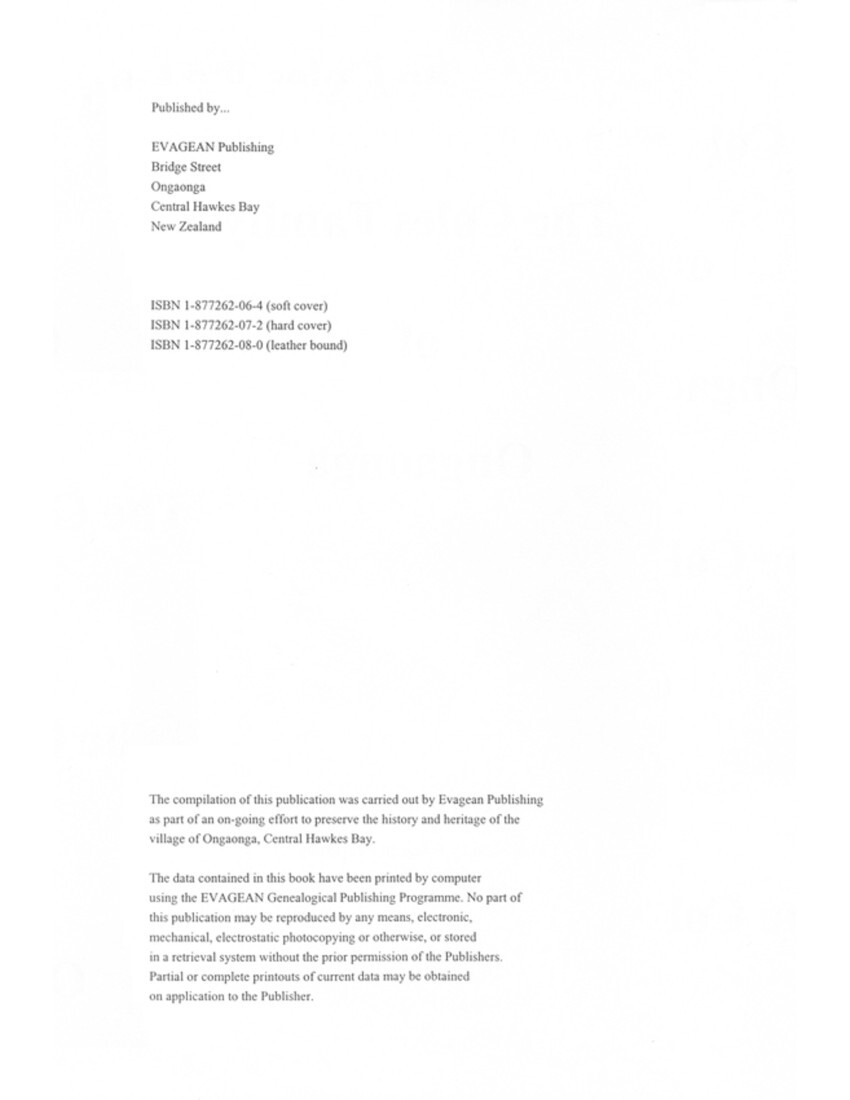
FOREWORD
For many of us, Ongaonga and its surrounding country is holy ground; arrival place of our Great Grandparents and their children, coming from a distant land; meeting place too, for some of us, of our parents, and stamping ground of our dear Aunts and Uncles. It was a holiday venue for us as young children, who have enchanted memories of cosy homes with a ‘Wind in the Willows’ feeling. I remember journeys from Hastings in a Tin Lizzie truck of our Uncle Frank.
If there was ever a Celtic ‘Isle of Joy, Land of Heart’s Desire’, this was it. One farming friend of mine called it, in the 1960s, ‘The Dreaming Spires of Ongaonga’. but I have also heard it called by another, ‘Hell Corner’, on account of the blistering heat of its summers.
In an earlier era, though, that of my Grandfather, Charles Robey Coles and his Danish wife, Emalie, it must have been less romantic – more ‘Wind-blown Dust and Dirt’, than ‘Wind in the Willows’.
Edward and Clara Coles, our Great Grandparents, had come out to Ongaonga in 1877, from the hub of the British Empire at its peak. When they arrived after a rugged journey, they were greeted by a world as primitive as the other had been civilised. I understand that, had it been possible, they would have returned home to Britain.
It is difficult for us today to get our heads around this time, before radio, telephone, car, aeroplane and whatever other conveniences we now enjoy. On arrival they had to make the very best of what they had and be almost totally self-reliant. They were stirling people. For them it must have been every bit as pioneeing as the Wild West of America, though, without the gun-toting cowboys. No wonder the Coles were such calm, capable people; multi- talented and resourceful. They made the very best of the material they were given and added to it, many hundreds of years of English tradition.
I am certain of one thing; people never did it better anywhere. They must have worked like galley slaves. The women made homes of great charm and atmosphere whilst the men worked to good prototypes and produced fine houses, churches, halls, homesteads, woolsheds, barns and everything to finish them. It is safe to say that many of Central Hawkes Bay’s earlier buildings have the Coles stamp on them.
For those of us especially who are just starting to hear the faint and far-off rustle of angel’s wings, this book is very welcome. I was amused some years back, by a story that might be relevant for us peering into the past at our forebears. A marine survey ship was in New Zealand waters and the captain was asked by a journalist, what they were finding. “Well”, the captain replied, “It’s as though we were floating five miles above London, and lowered a grappling hook down through the clouds and mist and came back up with a bowler hat. From this piece of evidence we would then make a report about the entire course of Western Civilisation.”
Our situation is similar with regard to the faint scraps of evidence we can muster about our past. I hope those who come along after are stimulated by these researches, and that if not the entire History of Western Civilisation, then at least there is a good deal to light up those who went before us.
If this is our ‘bowler hat’, then I raise mine unreservedly in salute to those Blessed Spirits, our ancestors.
Is it fanciful, I wonder, to think that our forebears, the Coles, were settled for yonks in Southern Britain, land of King Alfred the Great (849-99) who ruled Wessex, united the country in perilous times, taught it writing and other civilised arts? His capital was Winchester, not far from Portsea, the birthplace of Edward and Clara Coles. But no matter what the mixture in our ancestry, Celt, Anglo-Saxon, Norman, Dane, Viking, Roman, I for one would be proud to be associated with this following appraisal, that was written about the Irish, but seeming, from what I know of them, to apply in many details to the Coles. It was written before 1581 by the Elizabethan Jesuit, Edmund Campion.
“The people are thus inclined: religious, frank, amorous, ireful, sufferable of pains infinite, very glorious, many sorcerers, excellent horsemen, delighted with warres, great alms-givers, surpassing in hospitalitie…. They are sharp-witted, lovers of learning, capable of studie whereunto they bend themselves constant in travaile, adventurous, intractable, kind-hearted, secret in displeasure.”
Blow softly on the glowing Coles of Ongaonga.
Michael Clark
Pahiatua
May 2000.
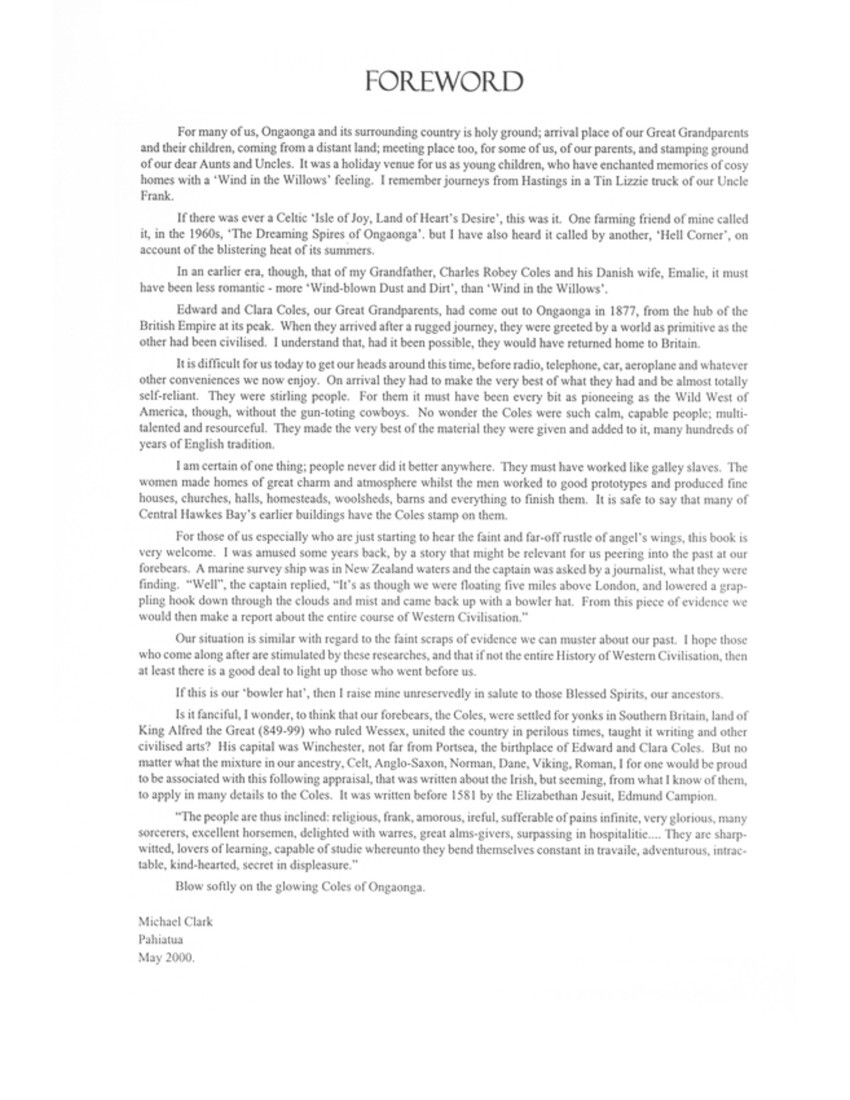
TABLE OF CONTENTS
1-2 Preface
3-9 The Coles Family. An Historical Rerslective [Perspective].
10 – 54 The Cantle Diary
55 – 62 The Coles Legacy
63 – 65 Odds and Ends
66 – 91 Photographs
92 – 95 The First Three Generations
96-132 Annie Clara and Willis Edmund Combs
133-160 Growing Up in the Forty Mile Bush
161-190 Clara Jane and William James Quigley
191-204 William Edward and Minnie Frances Coles
205 – 207 The Duchess
208 -209 Louisa and William Dixon Livick
210-240 Charles Robey and Amalie Elizabeth Coles
241-249 George and Adeline Coles
250-252 Mary Jane and Henry Milne
253-257 Kate Emily and Harry James William Strachan White
258-271 Frederick Purkis and Alice Coles
272-284 Samuel Arthur and Margaret Coles
285 – 290 Alice and Albert Frank Glenny
291 – 309 Index of Names
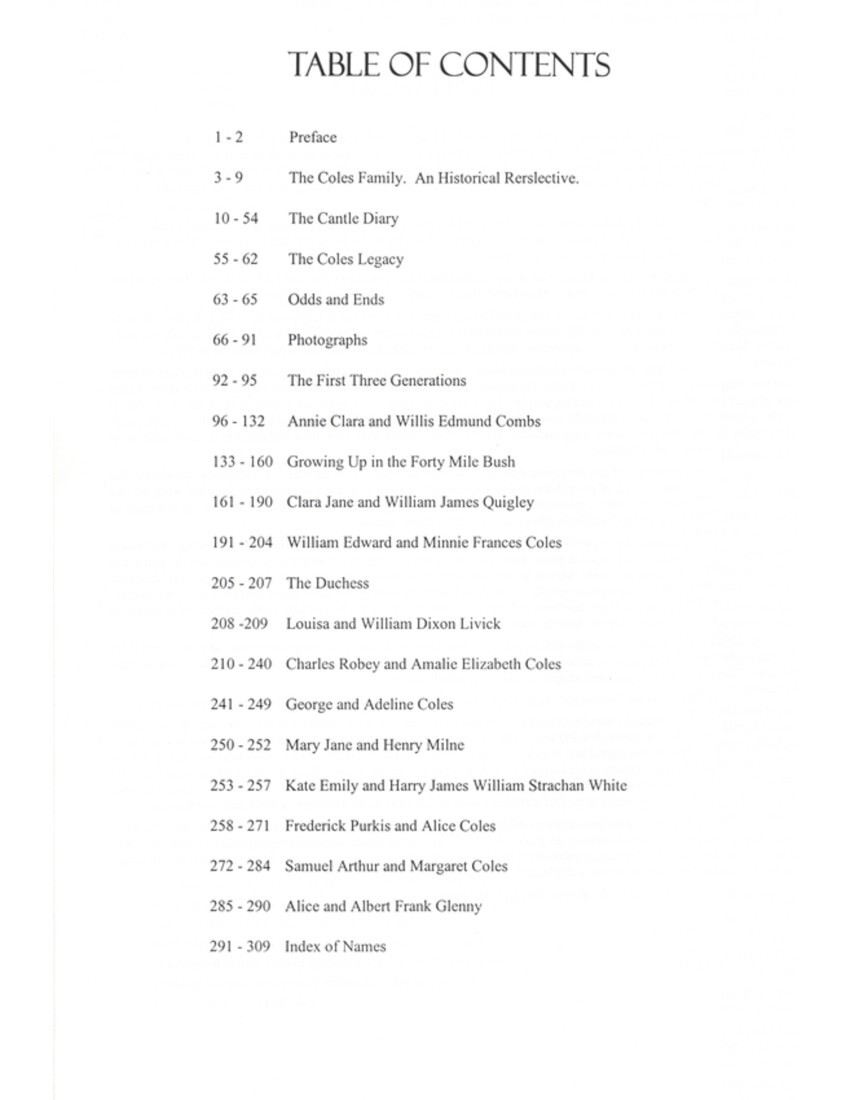
HOW TO READ YOUR BOOK
Descendants of THOMPSON, Harold James and CAMERON, Alice Mary
THOMPSON, George Thomas and FINDLAY, Margaret Eileen
THOMPSON, Lily Margaret and ANDERSON, Frederick Alan
04>ANDERSON, Brian Thomas Alan m on 16.10.1939 to CRAWFORD, Patricia Colleen
b 05.06.1916 b 07.06.1919 d-11.05.1989
Brian b. at Dannevirke and m. at Masterton. Colleen, d/o James Crawford and Maria Patricia Smith, b. at Geelong, Australia.
Address: 19a King Street, Palmerston North.
Brian was educated at …….
01>ANDERSON, Gerald Brian
b 02.09.1940 d 04.09.1940
02>ANDERSON, Sheryl Elizabeth m on 10.08.1963 to (1) MCRAE, Gary (Butch)
b 09.08.1947 b ** ** 1938
Page Header
The header is a quick guide to where the Descendants on each page of the book are located within the family.
It traces the direct line of descent from the earliest couple in the book down to the first person listed on this page.
In the example above, Brian Thomas Alan Anderson is the son of Lily Margaret Thompson who is the daughter of George Thomas Thompson who is the son of Harold James Thompson.
Name Line
The first name on the line is the registered (Birth Certificate) name of the Descendant.
The number preceding the Descendant’s name indicates his birth order (Brian is the 4th child of Lily and Frederick)
If the Descendant is married or has a partner, the second name is that of the Spouse (Patricia Colleen Fay Crawford is Brian’s wife. Crawford was her surname prior to her marriage to Brian).
If there is no formal marriage, the terms ‘and’, ‘partner’ or ‘de facto’ are used in place of a marriage date.
If a Descendant has had more than one marriage (or partner), the Spouse’s name is preceded by a (1), (2) etc (e.g. Gary McRae is the first of two spouses of Sheryl Anderson)
Where a person is known by a name other than their first Christian name, the known-as name is underlined (e.g. Colleen instead of Patricia). Nicknames are enclosed in brackets (e.g. Butch instead of Gary)
Date Line
Dates are expressed in English format i.e. dd.mm yyyy.
An unknown date is denoted by stars (e.g. **.**.**** – see Gary McRae’s birth date)
The abbreviations, b, d and m preceding dates denote born, died and married.
Text
The abbreviations b., m., d. and bd. within the text always precede the places of birth, marriage, death and burial.
The terms ‘d/o’ and ‘s/o’ are short for ‘daughter of’ and ‘son of’ and always precede the names of the parent or parents of the Spouse.
The Spouse’s parents are listed with the father’s name first followed by the mother’s name. The mother is usually listed by her maiden name as is customary in genealogical records.
The address is that of the Couple (or if separated, the Descendant) at the time of publication.
The biographical notes are as supplied by the Descendant or near relative(s). They are edited for style, spelling and grammatical form but not content.
Indentations
The vertical lines at the left side of the page indicate generation levels. In the above example, Gerald and Sheryl are both children of Brian and Colleen.
The numbers 1 thru 9 at the foot of each page are intended to assist the tracing of generation levels through successive pages.
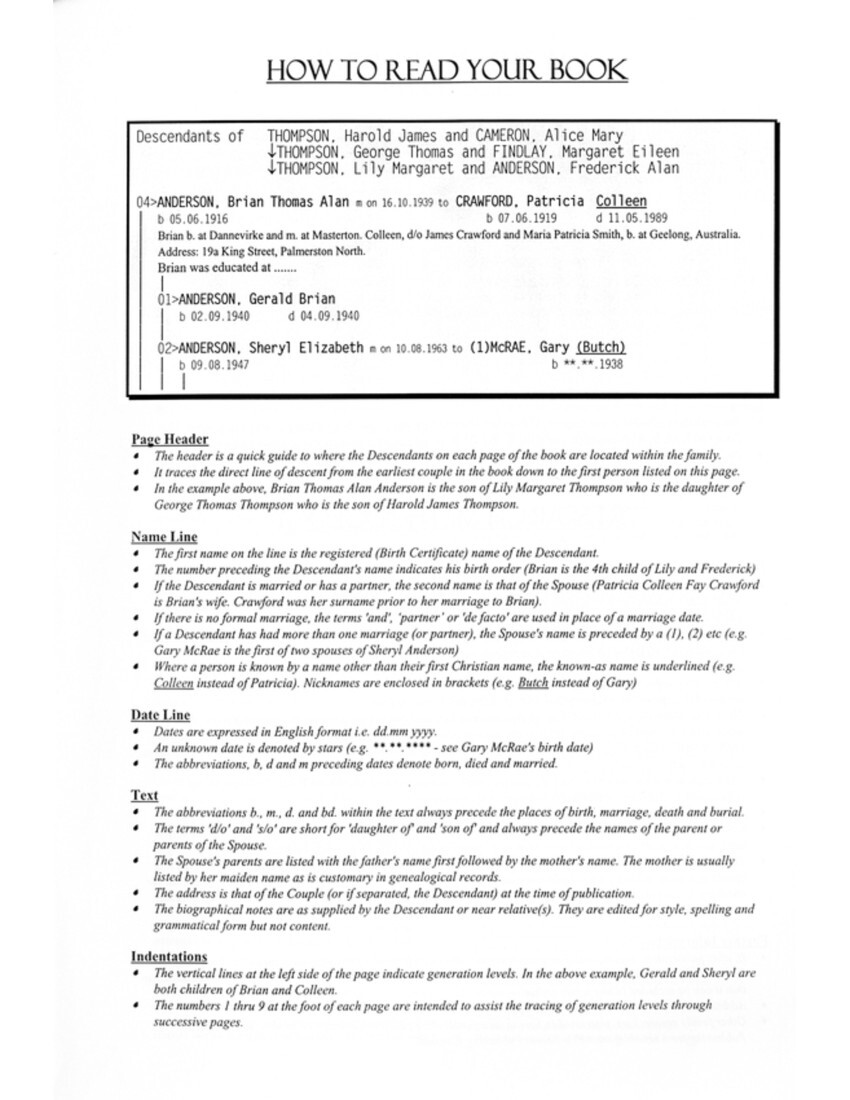
LAYOUT OF THE BOOK
Introductory Pages
The Book commences with a Foreword generally written by a family member, a Preface written by Rex Evans, and a Table of Contents.
Where historical notes or background texts are included, these are usually contributed by family members.
Photographs
Photos of historical interest are included near the front of the book. They usually cover the first three generations of the family.
The titles under the photographs are the names of the people, reading from back left to front right of the photo. Each name is as listed in the body of the book and is followed by the years of birth and death (as appropriate).
In the case of women, if the photo is (or may have been) taken prior to marriage it is followed by her subsequent married name or names. If it was probably taken after her marriage, it is followed by her maiden name.
Other photographs of interest are included at appropriate positions between sections of the book and generally apply to the preceding section.
Cameo photographs are included adjacent to the person’s entry in the Family Tree. Cameos of early family members are taken from the historic photos submitted, whilst those of later family are included at the request of the family members concerned.
Index
The alphabetical index at the back of the book is compiled from the descendants’ charts as they are printed. The listing includes both descendants and spouses, the latter, in the case of a woman, being listed by her maiden name.
To assist identification, each entry is amplified with the addition of the person’s birthdate and, where appropriate, the name of spouse or partner.
RESEARCH METHODOLOGY
Data Collection and Verification
EVAGEAN Publishing has not undertaken or carried out any of the basic genealogical research contained in this Book. That has been done by members of the family prior to the commencement of the publishing programme, or whilst it was under way.
However, in order to protect family members against the possibility of them having incorrect information published about them, EVAGEAN Publishing have sent printouts for checking to as many family members as could be contacted.
At the commencement of the Project, the family member/s initiating the work supplied EVAGEAN Publishing with details of their prior research together with all addresses known to them.
Using this information, EVAGEAN set up the computer files and commenced sending out printouts to all those for whom addresses had been supplied. Typically, each printout included all current information on the Descendant together with Parents, Grandparents, Children, Grandchildren and Brothers and Sisters plus, in each case, Spouses as appropriate.
The recipient was requested to check the printout, make corrections and add further family or biographical information and advise the addresses of other family members.
As new addresses were received, these people also were sent similar printouts.
Once this process had exhausted itself, EVAGEAN sent a final draft printout to all addresses in file and requested each person to make any further corrections by a specified cut-off date, after which the book was printed.
The finished book is accurate to the extent that members of the family have co-operated in the collection and checking of data. All those whose addresses are printed in their biographical notes, will have received printouts for checking. On average about half of them will have replied prior to publication. The finished book is, therefore, as accurate and complete as the family themselves have cared to make it.
Further Information
If, after publication, anyone is able to provide corrections or additional information relevant to this book, they are invited to send it directly to EVAGEAN Publishing, Bridge Street, Ongaonga, Central Hawkes Bay, New Zealand, so that it can be included in any future reprint.
Additional copies of this book may be obtainable from the Publishers. Enquiries are welcome.
Other family researchers, interested in having their family story published, are invited to write to EVAGEAN Publishing for a no-obligation Pro-Forma Publishing Proposal.
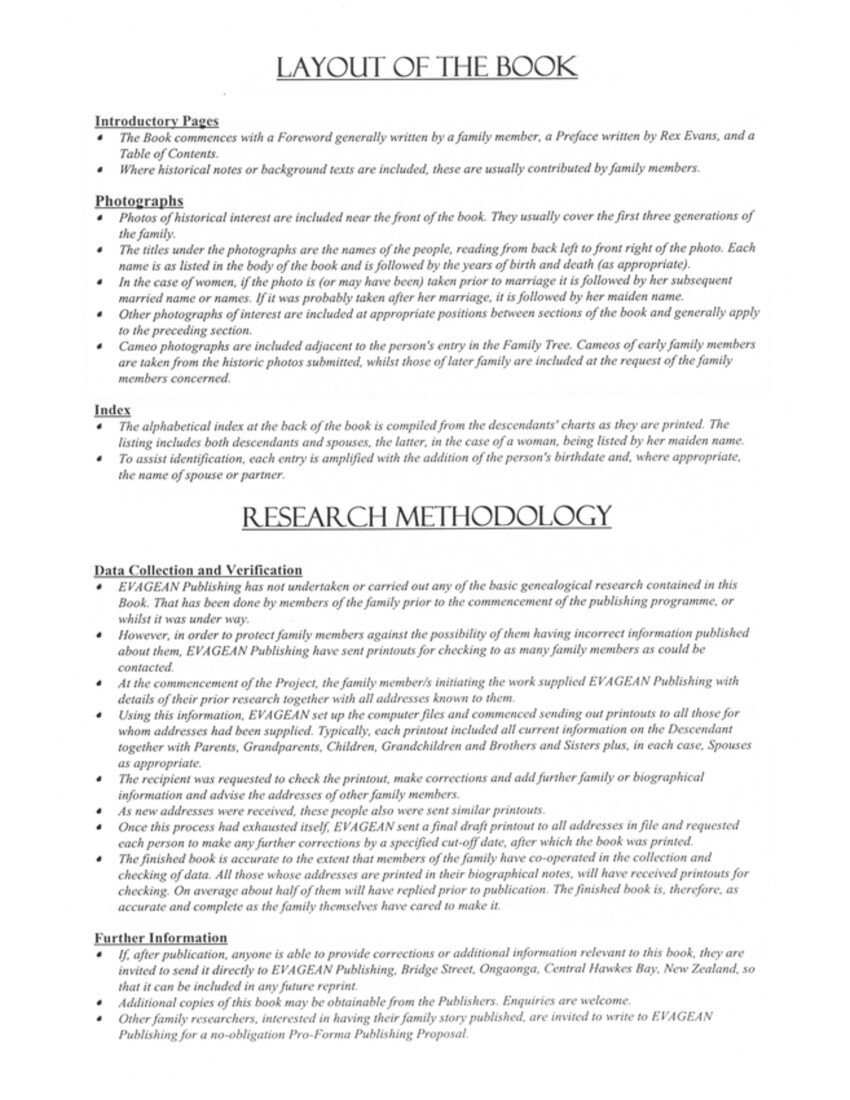
Page 1
PREFACE
The publication of this Coles Family book was initiated for the Historic Village of Ongaonga as part of a programme to record the history of local families for present and future generations.
The data verification programme commenced in May 1999, and by the time the files were closed in May 2000, we had sent printouts to 298 members of the family for whom addresses had been obtained. Each of these people had been sent two printouts, the first when we were given their address and the second just prior to the closing of the files. Notice of corrections and additional information has been received from 144 correspondents. For those who have put so much effort into the compilation of this family record, it is pleasing that nearly half the members of the family corrected and returned their draft printouts. Although there are still likely to be errors and omissions in the record which might have been avoided it is a satisfactory response. It is to be hoped that this publication will encourage members of the family to continue with their research with the view to locating the ‘missing’ members of the family and having them included in the record.
The text notes following each entry in the book include the current addresses for all those family members who received draft printouts. A listing of all these addresses is held by Evagean Publishing for future use and reference by members of the family. It is our hope that their inclusion within the text notes will help the family to maintain contact and assist other researchers to carry on the work that has yet to be done. The notes also contain a range of additional biographical information.
For some sections of the family this data is comprehensive and will be of great interest to future generations. Those not so well covered should be encouraged to assemble similar information for the benefit of their own future descendants.
Format of the Book
The Family Tree listing uses a format known as the Indented Descendant’s Chart. Advice on how to read it is contained on the previous page.
In presenting the information submitted to us we have adopted a number of general conventions which should be noted. Relationships which do not involve a legal marriage have been included where the family have informed us of them. The expression, ‘m on **.**.**** to’ has been replaced with ‘and’ or ‘de facto’. In some cases children are listed to persons for whom no spouse is recorded. Occasionally the name of the child’s father (or mother) is mentioned in a note. Where children have been raised by persons other than their parents, they are generally listed as part of the family in which they were raised. Adoptions have been noted only where the person or his parents have informed us of the fact. In cases where both partners are descendants of the original couple, their descendants are listed following the entry for the male. Biographical notes include reference to occupations and interests and these are entered in the manner advised to us.
On some occasions we have received conflicting information from different members of the family. We have generally accepted that the information from the closest relative is more likely to be correct. Our principal objective has been the production of a complete and accurate record. We have sought to temper this with discretion where appropriate. We trust that the few skeletons that inevitably appear in every family will be seen as part of the colourful fabric of this family’s history.
Whilst the book contains a great deal of information that is of historical interest, it does not purport to be a history. Biographical notes have been assembled from notes submitted by family members, and we, the publishers, have made no attempt to obtain verification of their accuracy.
Acknowledgments
This book is the result of contributions from individual family members who responded so willingly to the questionnaires that were sent out. So many of them have kindly pointed out the silly mistakes that we had made and have added their own useful comments and suggestions. They will see the fruits of their efforts in the sections of the family to which they contributed.
Our sincere thanks are extended to Graeme Harkness for providing the initial information than enabled the project to get started, to Brian Coles for lending us the Cantle Diary, to the Combs family for allowing the reprinting of Growing Up in the Forty Mile Bush. We also thank those family members who provided biographies of the early generations. Many others have also helped with their own family groups and we extend to them our grateful thanks. If despite our best endeavours, mistakes or omissions have occurred, we extend our sincere apologies to those affected. Please inform us of any necessary corrections so that the files can be updated for any future reprints.
Statistics
For those with a statistical bent we have abstracted some figures from the computer files which say something about the growth of the family. The files record 931 descendants and 428 spouses. Edward Coles is the sole member of the first generation of the family in this record. He had 16 children and they comprise the second generation. There are 65 offspring recorded in the third generation, 141 in the fourth, 301 in the fifth, 345 in the sixth, and to date 62 in the seventh. The Publishers Evagean Publishing specialise in the compilation and publication of genealogies and family histories. The original company has operated in New Zealand since 1989.
This book is the one hundred and nineteenth in the series of family histories compiled and published by Evagean Publishing since 1989. Other titles in the series are (Australian titles underlined):
1. The Hansens and the Kings (1,157 pp in 2 vols)
2. Te Whanau de Flavelle (382 pp)
3. The Descendants of James Wright and Hannah Austain (537pp)
4. The Wynyard Family Tree 1559-1990 (141 pp)
5. The Descendants of Sarah Vasey, 1841-1912 (55 pp)
6. The Descendants of Enoch Stanton and Sarah Abbott Turner (73 pp)
7. The Descendants of William Thomas Fairburn, Missionary (226pp)
8. The Smiths of Herekino and Their Descendants (125 pp)
9. Aitchison Oliver and His Descendants (285 pp)
10. The Webbers of French Pass (59 pp)
11. Charles Marshall of the Waikato – Whanau 1830-1992 (404pp)
12. Faith and Farming – The Legacy of Henry Williams and William Williams (444 pp)
13. The Descendants of Rebecca Samuel – The Burnham and Bennett Families (185 pp)
14. The Reeves of Tolaga Bay and their Descendants (74pp)
15. The Descendants of David Benge and Philadelphia Roberts of Upper
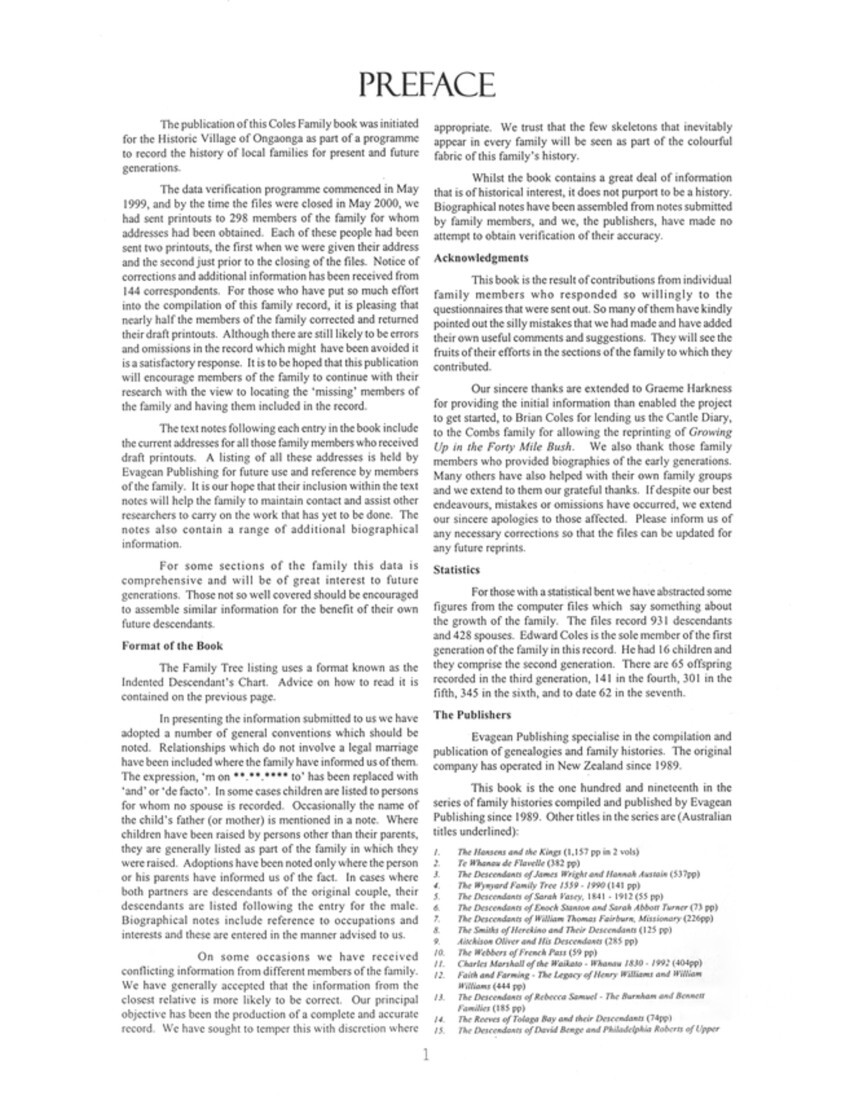
Page 2
Hutt (267pp)
16. The Baigents of Wakefield (535pp)
17. The Descendants of David and Elizabeth Clark of Nelson (682pp)
18. The Descendants of William Brind Hansen of Queensland (197pp)
19. The Descendants of John and Hipora Hunt (26pp)
20. The Gallagher/Clow Family Tree (339pp)
21. The Genealogy of the Allison and Laurie Families in New Zealand (470pp)
22. The Descendants of Thomas and Dinah Price, Settlers of Nelson (302pp)
23. The Mead, Papesch and Walker Families (277pp)
24. The Family of William and Sophia Rayner of Wakapuaka (60pp)
25. The Genealogy of the Moss Family of Chorley, Lancashire (27pp)
26. The Family of Charles and Mary Williams of the Hokianga (114pp)
27. The Family of Monte and Gertrude Hoult (16pp)
28. The Family of John and Elizabeth Ann Lean of Pukahu, Hawkes Bay (148pp)
29. The Narbey Family of Long Bay, Banks Peninsula (167pp)
30. The Descendants of Thomas Berry and (1)Sarah Palmer, (2)Sarah Barron, (3)Jane Elizabeth Dennis (667pp)
31. The Descendants of Annie O’Brien. The Davis and Bousfield Families of Hawkes Bay/ Poverty Bay (335pp).
32. The Genealogy of the Pilcher Family of Tawa, Wellington (674pp)
33. James and Ann Higgs of Te Karaka and their Descendants (148pp)
34. The Descendants of Michael Lord, Fencible and Ann Darby (217pp)
35. The Whanau of Hoeroa Tahau (72pp)
36. The Family of William and Helen Butler of Opotiki (121pp)
37. The Descendants of Henry and Ihipera Davis (136pp)
38. The Harpers of Christchurch (115pp)
39. The Family of William and Helen Mackay of Waitati, Otago (101pp)
40. The Family of Thomas and Jane Mason of Taita (307pp)
41. The Family of William Williams of Rissington (237pp)
42. The Whanau of Irihapeti Te Paea (Hahau). The McKay and Joy (Joyce) Families (919pp)
43. The Family of William and Whawhai Gilling of Kaikoura (160pp)
44. The Pritchards, a Family of the South Pacific (296pp)
45. The Scott Family. A Genealogy. (356pp)
46. Yorkshire and Yonder. Families of Keartons (440 pp).
47. The Family of William and Ellen Stowe of Hawkes Bay (212pp).
48. The Descendants of David and Martha Gordon of Marton (111pp).
49. The Cullen Family of Maungaturoto (375pp)
50. The Libeau Family of Banks Peninsula (687pp)
51. The Marsh and Locke Families 1842/1995. The New Zealand Connection. (171pp)
52. The Descendants of Thomas Hancock, Brewer and Publican of Auckland (225pp)
53. The Family of William and Ann Sansom of Rangiora (84pp).
54. The Family of Michael and Ellen Mullany of Howick (117pp).
55. The North and Holloway Families (93pp)
56. The Loder Story (160pp)
57. The Descendants of John and Mary Williams of Russell (189pp).
58. The Descendants of William and Martha Bucknell, Elmshall, Paterson River, NSW (494 pp)
59. The Descendants of John and Marion Thomas (153 pp)
60. A Haberfield Genealogy (381pp)
61. The Pavitt Family of Banks Peninsula (283pp)
62. From Dalmatia. The Hrstich Families in New Zealand (112pp)
63. The Descendants of Peter and Selina Treseder (99 pp)
64. Sailing Away… The Waymouth and Blackman Families (22\pp)
65. The Tatterson Family (247pp)
66. The Descendants of John and Ann Howell (830pp)
67. The Descendants of Henry and Mary Southcombe (186pp)
68. The Allens (150pp)
69. The Amos Family. A Story of Tasmanian Pioneers. (683pp)
70. The Hartleys of North Otago. John Hartley and Ann Hudson and their Descendants. (214pp)
71. The Reece and The Pee Families from Shropshire (117pp)
72. A Huguenot Family. The Descendants of John and Mary Mandeno (259pp)
73. The Sullivan/Harawene Reunion, Karetu 1996. (214pp)
74. The Sartens. Taranaki Pioneers (260 pp)
75. The Descendants of George and Mary Ann Friend (141pp)
76. The Family Tree of Henry and Mary Hanger. Pioneering in Australia. (245pp)
77. The Whitlock Family of Taranaki (74pp)
78. The Family of Heinerick and Elizabeth Steffert (206pp)
79. The Descendants of Samuel Blackburn and Elizabeth Peters (143pp)
80. The Whanau of Te Paea and William King (200pp)
81. The Macleans of Howick and Tamaki (147pp)
82. The Baron of Whakamoa and His Lady, Hannah. The Wrights of Banks Peninsula (658pp)
83. The Descendants of John Daniel (175pp)
84. The Descendants of John and Christian McLeod of Waikare, Bay of Islands (199 pages)
85. Timber Merchants of Thames. The Story of the Lamb Family of East Linton, Scotland. (160 pp)
86. The Descendants of the Kneebone Brothers. Miners from Cornwall. (499pp)
87. The Descendants of Henry and Mary Henderson, Taranaki Settlers (64pp)
88. The Reeve Family History (189pp)
89. The Biddles. A Bicultural Family of Aotearoa/ New Zealand (672pp)
90. The Tetleys of Paeroa (220pp)
91. The Fergussons of Strachur (87pp)
92. The Descendants of Ralph Terbutt and Ann McIntyre (146pp)
93. The Descendants of Michael and Sarah Lawlor (228pp)
94. Our Pell Family Story 1750-1998. (186pp)
95. The Descendants of Robert and Dorothea Duckworth (220pp)
96. The Bristows of Northland (177pp)
97. The Descendants of Alfred and Emily Marsh (77pp)
98. The Descendants of August and Wilhemine Knofflock, Taranaki Settlers (94pp)
99. The Thorstensen Family of Norway and New Zealand. Their Ancestors and Descendants (126pp)
10. Faith and Farming. The Legacy of Henry Williams and William Williams (Revised 1998) (720pp)
101. The Howell Family of Upper Waiwera (117pp).
102. Michael Smith and Mary Ann Collins. Our Links to Ireland 1811-1998. (220pp).
103. Coming Through the Ryes… (231pp).
104. The Family History of Charles and Mary Ann Ball. A Pathway to the Past (247pp)
105. They Came and They Prostered [Prospered]. The Finlaysons of Waipu. (239pp).
106. The Palmer Connection – The Family History of William and Elizabeth Palmer (1089pp).
107. The Kerrs of Nelson (789pp).
108. The Stanway Family of Staffordshire (44pp).
109. The Descendants of John and Ellen Pasco of Invercargill (104pp).
110. The Family of Maurice Oswyn and Anne Maria Kelly (324pp)
111. The Herbert Family. Descendants of Geroge [George] Henry and Ann (223pp)
112. The Descendants of Henry and Mary Holmes (41pp)
113. Celebrating 140 years of the Glenny Family (208pp)
114. Spreading Branches. The Dunstan Family (566pp)
115. The Descendants of Henry and Ihipera Davis (Revised 2000) (136pp)
116. The Descendants of Jeremiah & Elizabeth Emeny and Abraham & Sarah Emeny (308pp)
117. The Descendants of John Davis Collard, Soldier (209pp).
118. From Foleshill to Foxground. The Descendants of Edward and Ann Parrish (476pp)
The computer files used for the production of this book are held in permanent storage on computer tape and will be maintained and updated if and when new or corrected information comes to hand.
It has been a privilege to have been entrusted with the task of compiling this family record. It has been a pleasure to work with the various members of the Coles family and we will always treasure the friendships that have arisen out of this association.
Rex and Adriene Evans
Evagean Publishing
Ongaonga
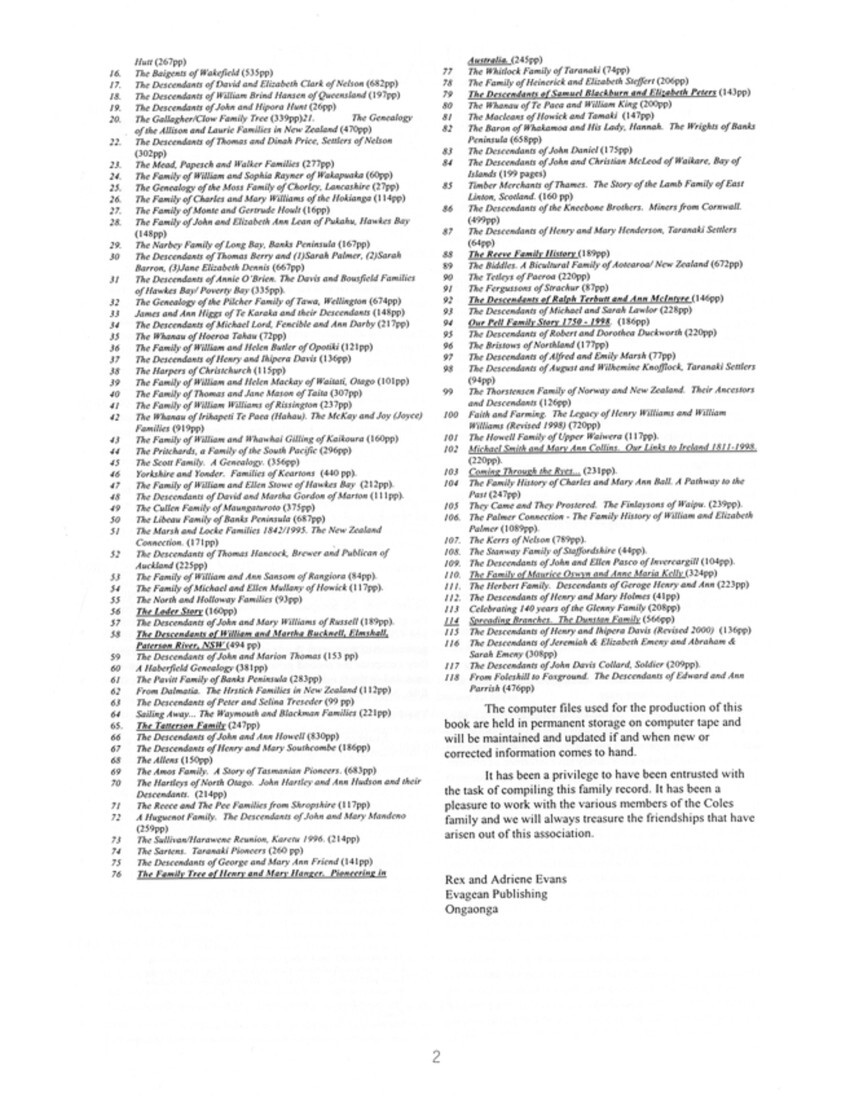
Page 3
THE COLES FAMILY
AN HISTORICAL PERSPECTIVE
By David Cooke
These notes have been based on research done over a number of years, but more particularly, on recent searches of records carried out here in the United Kingdom. Cherie and I arrived in August 1999 to spend 2-3 years living, working and travelling in the UK and Europe. One of the reasons for this adventure had come from my family history research, and the resultant desire to visit the many places of ancestral origin. Also, I wanted to discover more about their world and if possible, get further back in time and generations than I had been able to achieve from New Zealand.
This is an attempt to provide some background to Edward and Clara, prior to their life in Ongaonga, and to give a little background on the significant places where they lived. It is by no means complete or comprehensive, but it does reveal known facts as evidenced from records still existing and available today. Any assumptions made are mine and are clearly stated. Hopefully, in time, further research will provide a better and more definitive story.
The Coles Family of Droxford?
Without a doubt, anyone asking Edward or Clara, “Where did you come from?” would have received the answer, “Droxford, Hampshire” — after all, that had been their home for the 20 years prior to their departure for New Zealand, so it was a natural response. Therefore, the family “legend” has it that Droxford is the “home” of the Coles family. But anyone visiting there will be disappointed to find nothing more than a pretty village.
Of the Coles family, there were none in Droxford before Edward and Clara; there are none buried in the graveyard and none living there now. Research shows that Droxford is not the “ancestral” home of generations of Coles. The family origins in fact lie elsewhere. Whilst some work has been carried out, lots of digging remains to be done to lay bare all the roots of the family that made its way to New Zealand in 1877.
These photographs were found in an old family album and were untitled. It is not known where the headstones are located, but they are most likely in Portsea or Southsea (the name in the bottom right of Carmi’s headstone is Baker, Southsea).
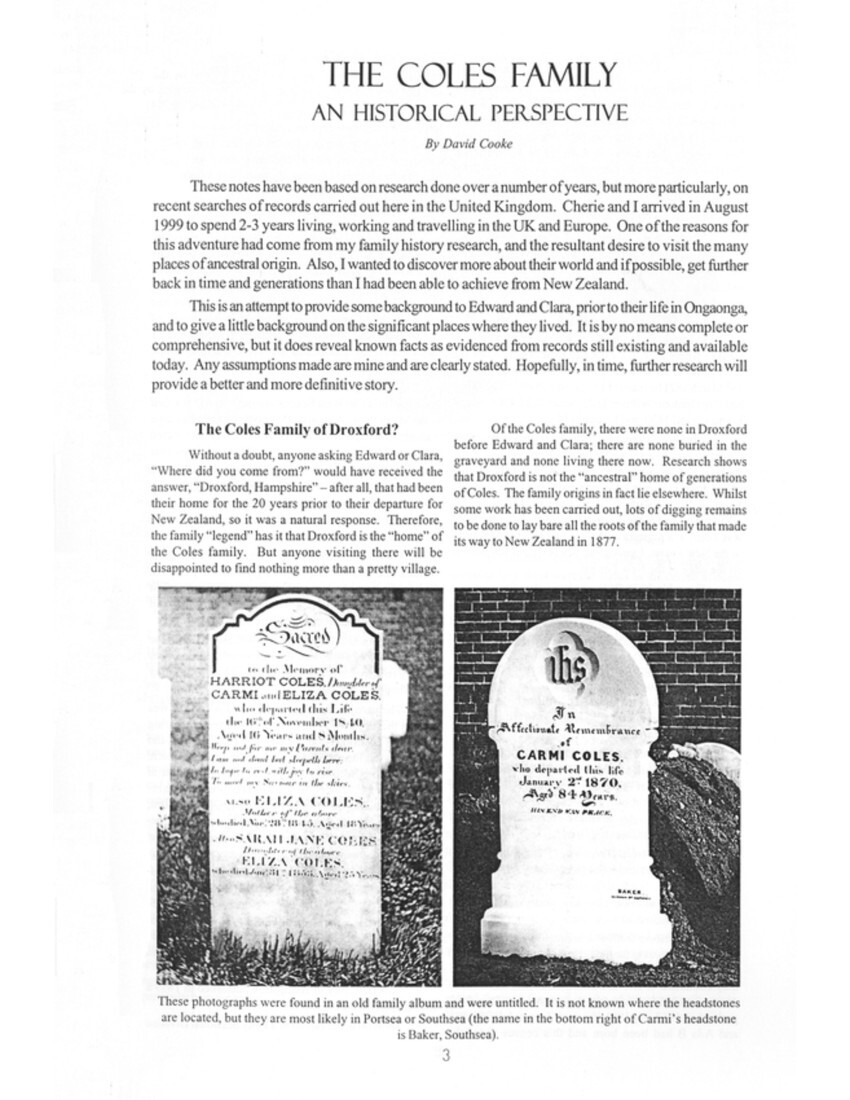
Page 4
Origins and Traces
Both Edward and Clara were born in Portsea, now a part of Portsmouth. At the time of the1851 Census, Clara aged 13 was living at 4 Green Lane, Portsea with her parents Edward (48), and Jane (45) Barton and her sister Jane aged 2. Her father is recorded as a Greenwich Pensioner and, as earlier information has him as a Petty Officer in the Royal Navy, his Census “occupation” shows that he had been retired and was on a pension from the Navy through the Greenwich Navy Hospital.
Edward, aged 20 and listed as an apprentice (we can safely assume carpentry/joinery) was living at 41 West Street together with his widower father Carmi (64), his milliner sisters Sarah (23) and Louisa (16) and his twin sister Emma (20) a dressmaker.
Carmi Coles was born in Lymington, Hampshire c.1787 and emigrated with his first wife to New Foundland, Canada where they had a daughter Elisabeth. After the early death of his wife Carmi returned to England and on 25th March 1821 he married Eliza Purkis, then just 20. They had five children: William 1822, Sarah 1822, Edward and Emma (twins) 1830, and Louisa 1834.
Although Eliza was also born in Portsea (her parents were William and Ann nee Bugden), the name Purkis is well known in the New Forest. A charcoal burner called John Purkis is known to have taken the body of King William (Rufus) II in August, 1100, on his woodcutters cart to the court at Winchester after the King was killed in a mysterious hunting accident at Malwood in the New Forest. Lymington, where Carmi was born is on the edge of the New Forrest.
From his 1870 Will, we learn that Carmi was a superannuated joiner from the Portsmouth Dockyard where he was, no doubt, involved in the construction of naval vessels. This could also indicate that Edward served his apprenticeship at the Naval Dockyard. Carmi bequeathed his property at 41 West Street, his household goods and furniture and the residue of his estate to his daughter Emma Lavinia Coles. To William he left a house at 52 Grigg Stand to Edward a house at 56 Grigg St, both of which were rented out.
A recent visit to Portsmouth revealed that not only had all these houses gone but so had the streets! Apparently that part of the city was so devastated during WW2 that it was not only redeveloped but the resulting streets renamed. An example is Brunswick Street becoming Winston Churchill Drive! In a Commercial Directory of Hampshire — Craven & Co — 1857, listed under Southsea Gentry, is “Coles, Mr Carmi, West St”. Southsea is also part of Portsmouth and West Street seems to have been variously listed as being in Portsea and Southsea.
Information from a subsequent Census provides us with the clues as to the next change of abode for Edward and Clara. After their marriage on New Year’s Day 1855 they continued to live in Portsea until after the birth of Annie in 1856, whereupon they moved to Droxford, probably in 1857. By 1861 (the next Census) Julia, Clara J, and Ada B had been born and this census states the 4 places of birth. Edward is recorded as a Master Carpenter and had achieved some substance as evidenced by the fact that they had a maidservant, Mary Pruflett (14).
By the next Census, 1871, living in what is today a relatively small two bedroom house in Droxford, were Edward, now recorded as a Master Carpenter employing 1 man, and Clara, with their 10 children (Mary J was 2mths) plus Frances Bayne (13) a cousin from Portsmouth.
Droxford
This rural Hampshire village is situated in a valley on the banks of the river Meon, on a main road that runs from Alton to Portsmouth. The road follows the path of the valley and would have been a natural travel way going back to Roman times — there is evidence of a road just south of the village. It is about 16 miles north of Portsmouth, four miles east of Bishops Waltham and 11 miles souteast of Winchester. Droxford is also the name given to a large church deanery and parish.
Settlement is believed to have been started by invading Jutes and West Saxons around 450 AD at a ford in the Meon river. A significant grave site from this time was discovered across the river and was excavated between 1910-73 uncovering some 200 graves dated over a 150 year span. It provided valuable information, although an actual village site has not been defined.
In 643 it is recorded that the Droxford parish was supporting the Benedictine monks of the Priory of St Swithin, Winchester.
Winchester had become the seat of the Kings of Wessex and in 891 King Egbert granted the parish of Droxford to the Minster of Winchester, St Peter and St Paul, for the support of the Bishop and the then Saxon Cathedral.
Droxford is detailed in the Domesday Book, the Great Survey of 1086, and the manor of that time was called Drockensford or Drockinsford and was “held” by the Bishop of Winchester.
The parish church of St Mary and All Saints was built in the 12″ century with the earliest records dating from 1150-60, using Norman and Early English styles and is possibly on the site of an much older Saxon Church. The first recorded Rector of Droxford was Nicholas in 1288. In the 14″ century the altar was restored and the re- consecration was carried out by John de Drockensford, Bishop of Bath who was granted special permission “be- cause of his birth in the village”.
In the 17th century Droxford had a close association with Isaak Walton, renowned fisherman and author of The Compleat Angler, who apparently fished in the Meon whilst living with his daughter and son-in-law Rev William Hawkins, the Rector of Droxford. A botanist of the time, John Goodyer, lived in the village, and it was here that the Jerusalem artichoke was developed and popularised.
In a Directory of Hampshire published in 1859 a listing states in part:
Droxford, the capital of a Petty Sessional Division
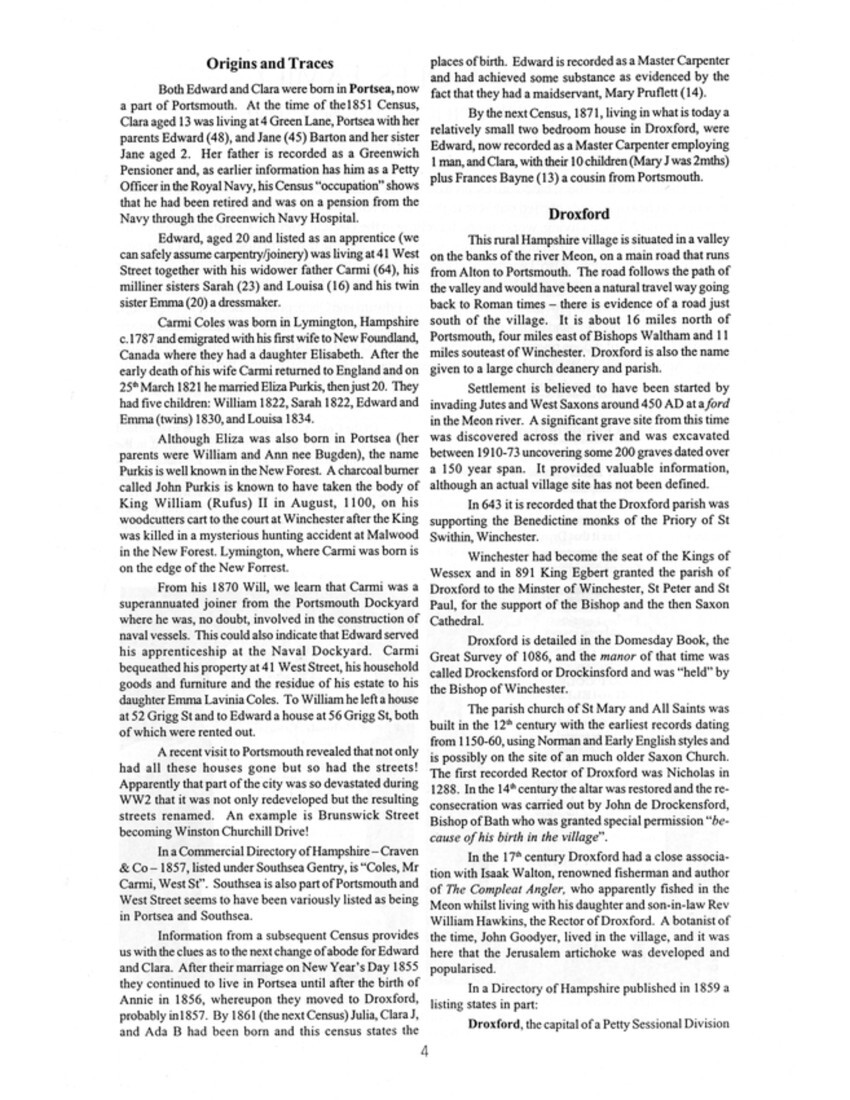
Page 5
(Magistrate’s Court), Poor Law Union, and Deanery, is a large village, pleasantly situated in the picturesque valley of the small river Meon. It has about 900 inhabitants but its parish has 2,005 souls and extends over 6,986 acres of land. A small Police Station was built in 1858, at a cost of £1,500. Petty Sessions are held each alternate Tuesday. The National School was built in 1835, is interdenominational, and has 106 pupils. In the list of trades people is: “Coles, Edw. Purkis, builder”.
By 1871 the population of the parish had grown to 2,325 and we know that the village had grown by at least 10 through the steady arrival of the Coles children! White’s Hampshire Directory published in 1878 has a listing of important people in the village and again we find: “Coles, Edward, carpenter”.
This book also notes that in 1871 there were 140 paupers in the Droxford Union Workhouse so times were tough in rural England. Maybe economic conditions meant that opportunities for his children would be limited and this was a consideration in making the decision to leave for New Zealand when asked.
The house in which the Coles lived has been determined by use of the Census and from family sources and it is clearly marked on the Map of Droxford from 1875. In 1851 the house was owned and occupied by George Westbrook, a plumber, and the Westbrooks are still a prominent family in the village. Also, there is a photograph of the house as it looks today. It is known as Cameron Cottage and is occupied by a retired lady who was quite happy to let me look around. It has been extensively remodelled and yet there was clear evidence of it’s age in the rough beams, low ceilings and low doorways, particularly in the cellar.
Other famous names with Droxford connections are Admiral Sir Frederick Sturdee, hero of the Battle of the Falkland Islands in WW1, and MacKenzie Grieve who attempted to fly the Atlantic with Harry Hawker in 1919. Their plane failed half way across but they came down near a Danish freighter and were rescued.
In “modern” times Droxford’s main claim to fame seems to be a short wartime status as the centre of command. Until Dr Beechey shut it down in 1968, there was a branch railway line across the river and it was in the tree lined siding at the Droxford Station that a Royal train on loan to Winston Churchill was sited just prior to D-Day in 1944. Meetings with Eisenhower, de Gaulle, Montgomery, Smuts, Portal, Tedder and Eden, plus others were held in this special pre-invasion headquarters.
Portsea
The island of Portsea was settled by a number of invaders: Angles, Mercians, Jutes and West Saxons, just as was Droxford, but it didn’t become a significant landing port until around 1100.
The earliest record is the granting of the Fratton manor on Portsea Island to the New Minster of Winchester by King Ethelred in 870. In the Domesday Book only the manors on the island are mentioned, not Portsea as a place.
It is generally accepted that the establishing of the area as a landing place lead to its naming as Portsmouth after Hugh de Port, an important Lord in the Hampshire of that time. As a result of its growing importance as a port of entry, ship building developed on the island from about 1200 onwards. King John is known to have passed through the port in one of his many sallies into Normandy.
Photo caption – Map of the south coast of England showing the locations of Droxford, Portsea and Lymington
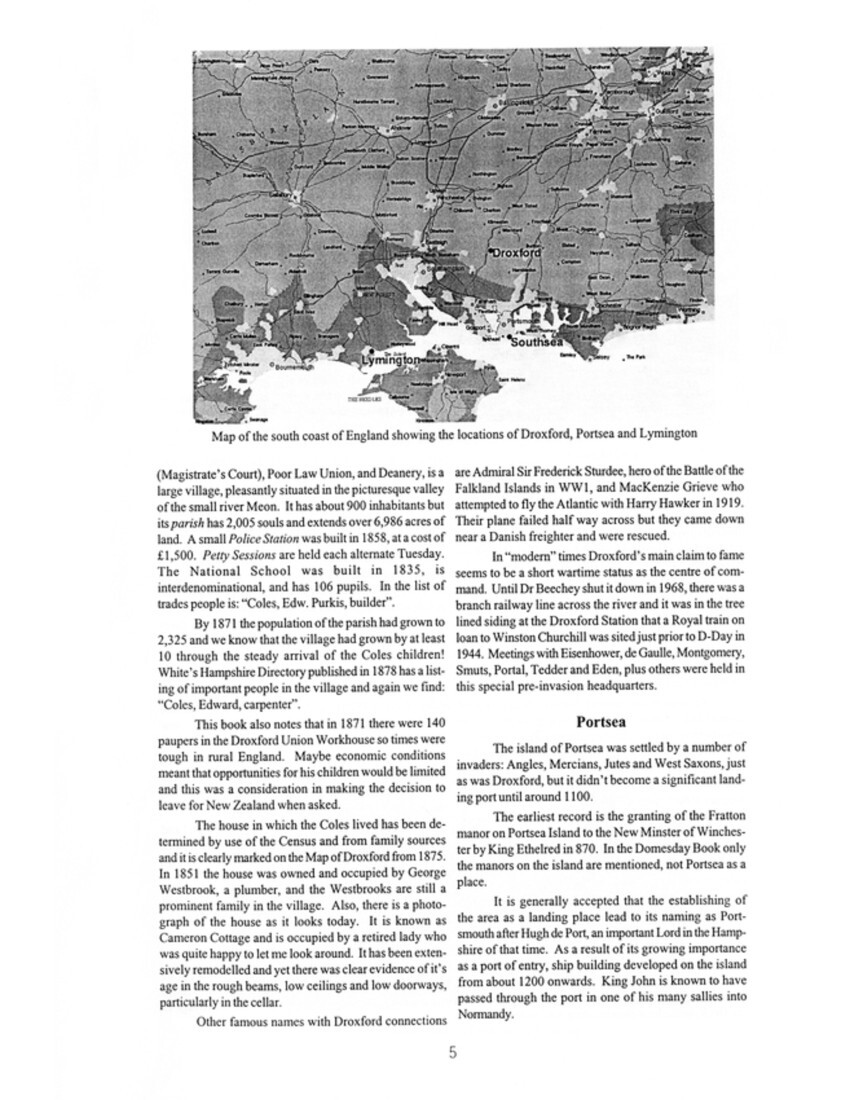
Page 6
On the back of this unsigned postcard dated 26.6.37, l pm: “Just passing through Droxford on way back to London. Called to see Miss Westbrook, a dear old lady. Can’t stay long as we’re due back at 6pm. This, I believe, shows your old home… This is the Coronation ‘do’.
Photo from: Mr D Cooke
Over the next 300 years a succession of Kings and armies passed through Portsmouth either coming from or going to France. It was even raided by the French in 1377, the town being burnt and fortifications and munitions destroyed. With all this movement, it is only natural that ship building and naval forces should have been based there.
The Naval Dockyard is considered to date from 1509 and Kings Henry VII and VIII were heavily involved in the fortification of the town, with Southsea Castle being built by Henry VIII. It was around this time that the Mary Rose, which has recently been raised for preservation and is now housed in a dry dock built in 1803, went down with the loss of 600 men.
Because of the status of Portsmouth as a national arsenal and a naval station, the local government has often been in conflict with the military leaders. However, this has been the price paid for the substantial growth of the town. Also, dealing with the influx of sailors and soldiers at various times, made for a town with ample supplies of beer, women and song. In 1716 there were 129 public-houses, 20 brandy shops, and 6 coffee-houses. The sailors ashore were often a problem and a local council heard a complaint; “that the anointing of ratts and putting fire to them is of dangerous conseqence, especially in this Towne, where there are Magazeens of Powder, and tends to the setting the dwelling houses of the inhabitants on fire”!
Portsmouth saw the tumultuous years of war with the French and in 1805 its townspeople were witness to the return of Lord Nelson’s body and the Victory after the Battle of Trafalgar which effectively ended the hostilities. Peace time had a drastic effect on employment in the Dockyards. Less ship building was undertaken and from a workforce of 3,582 in 1813, the numbers waned to under 2,200 by 1830.
As a carpenter/joiner in the Naval Dockyard, Carmi Coles (and possibly Edward) would have seen and been part of the dramatic changes taking place in naval vessels starting about 1830. Sail was giving way to steam power, both paddle and screw, with the latter proving its efficiency in a contest between two ships. In 1845 the screw vessel Rattler actually towed the paddle steamer Alecto backwards! Also, wood was giving way to iron or steel.
The first paddle steamer built at Portsmouth was the Hermes (6 guns 710 tons 150ft) built in 1835 and the first wooden steam screw gun vessel was Riffleman (8 guns 486 tons 150ft). Driver, a wooden steam paddle sloop was launched in 1840 and spent 1845-7 in New Zealand.
Throughout the 1840s two new ships a year were launched at Portsmouth with the last sailing warship, Leander (50 guns 1987 tons), launched in 1848. But even she was converted to a screw frigate in 1861!
The last ship built in Portsmouth was in 1967 and was Andromeda, a “Leander” class frigate — the type of frigate we all know as HMNZS Canterbury or Wellington.
All in all, to read the history of the Dockyard is to read the history of Portsmouth and the Royal Navy.
Connections
So how did an apparently successful builder in an attractive and seemingly prosperous Hampshire village come to embark his family on a 12,000 mile sea voyage to
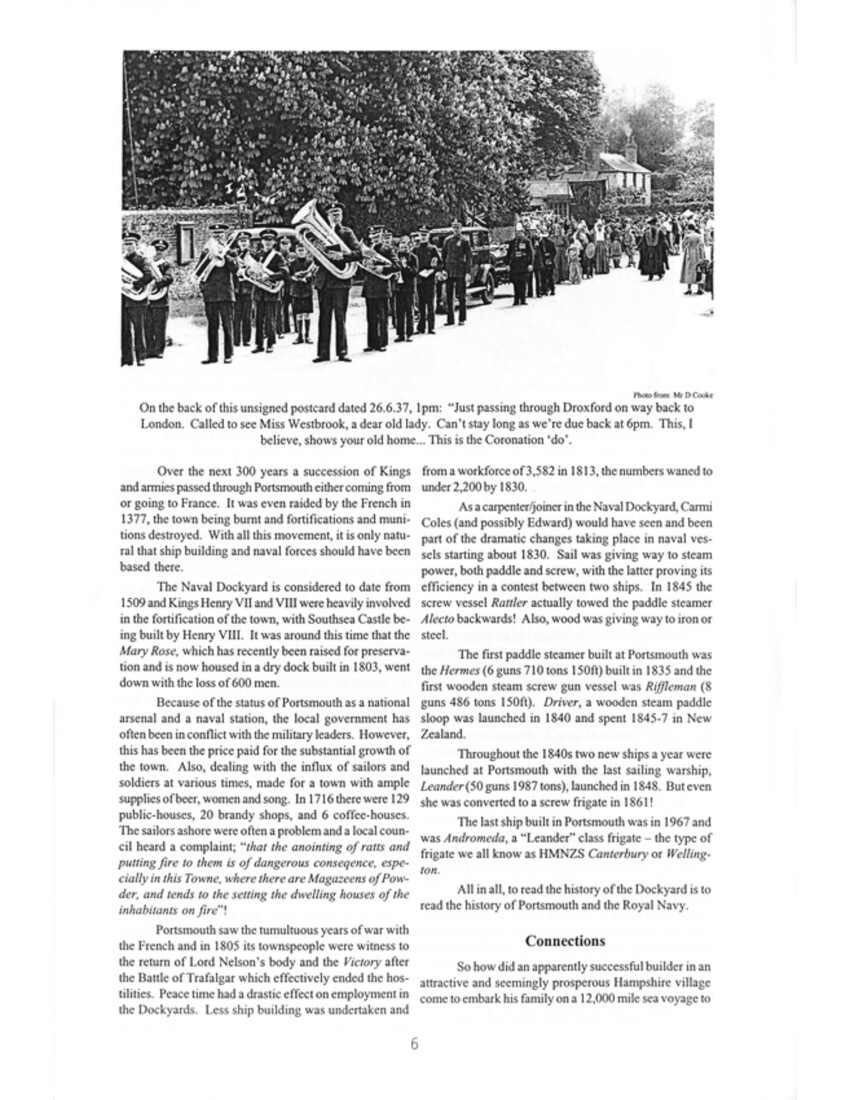
Page 7
the new colony of New Zealand, and in particular, to Ongaonga in Central Hawkes Bay?
It is generally accepted that he was asked or encouraged to do so by Henry Hamilton (aka Harry) Bridge, 2nd son of the Rector of Droxford, Rev Stephen Bridge 1868-86. Henry Bridge was reportedly in Hawkes Bay by 1866, and farmed the “run” known as Fairfield. He was the founder of the village of Ongaonga in 1872, providing the land for 78 sections and laying out the first streets.
To build the village, Henry would have needed tradesmen and labourers. However, as his father, Rev Stephen Bridge, only came to Droxford in 1868, Henry would not have known Edward Coles prior to his leaving England, so one has to assume that either Henry made a trip back to England to find the men required, or he wrote to his father enlisting his aid.
Whatever the case, Edward took up the offer and left Droxford in April/May 1877 for Gravesend to board the sailing ship Colombus, bound for New Zealand.
It may be possible to clarify this part of the story in the future because, as a result of a recent visit to Droxford, contact has been made with Mr Howard Bridge who is a son of Henry Bridge! Mr Bridge is 87 and has just buried his older brother Stephen, who was 92. He told me that his father Henry (aka Harry), who was born on 1845, retired from farming in New Zealand and returned to Droxford in 1902, subsequently had a family (two sons born 1908 and 1913) and died aged 90 in 1935.
As a result of the death of his brother, Mr Bridge has just taken ownership of all of the family correspondence and this includes numerous letters from his father written home when he was in New Zealand. However, they are currently at his son’s farm in Yorkshire and it will be after publication date before they can be accessed for study.
And so we come to William Cantle, diarist and artist of the Columbus voyage. The 1851 Census information has William aged 22, carpenter, living with his father James, 53, and also a carpenter at 38 Gold Street, Portsea. In 1871 William was 41 and was recorded as a Hardwareman (Master employing one boy) and living at 26 Wish Street. This must have also been the place of business as Mercer & Crockers Hampshire Directory 1871 has a Southsea Commercial Listing for “William Cantle, ironmonger, 26 Wish St.”
Also at that address were Martha M L (35), William J (13 -Hdwmns Asst), John E (12), George (9), Harry (8), Louis (6), Alfred E (3), Minnie S (1), James Cantle (75 — Carpenter (Unemployed)) and Martha H Bartholemew (15 —niece).
It is seems likely that William Cantle and Carmi and Edward Coles knew each other over many years. Firstly, they were in the same trade, carpentry, and then later William would have been a supplier of builders’ hardware, maybe even as far away as to Edward at Droxford. Finally, when you look at the 1870s map of Portsmouth, all the streets mentioned — West, Giggs, Gold, Wish (or Kings Road) are in close proximity to each other.
Conclusion
We can only speculate over many aspects of their lives in Portsea and Droxford, and about their departure from Droxford, leaving friends and family for the unknown. How did they travel up to Gravesend, to catch the ship? What were their thoughts, their hopes, their fears? What we do know of the voyage is contained in the “Cantle Diary”, but even this document cannot fully reveal what Edward and Clara felt of the whole venture.
That the family arrived safely and prospered is evidenced by this publication.
The Coles family home in Droxford as it is today.
Photo from: Mr D Cooke
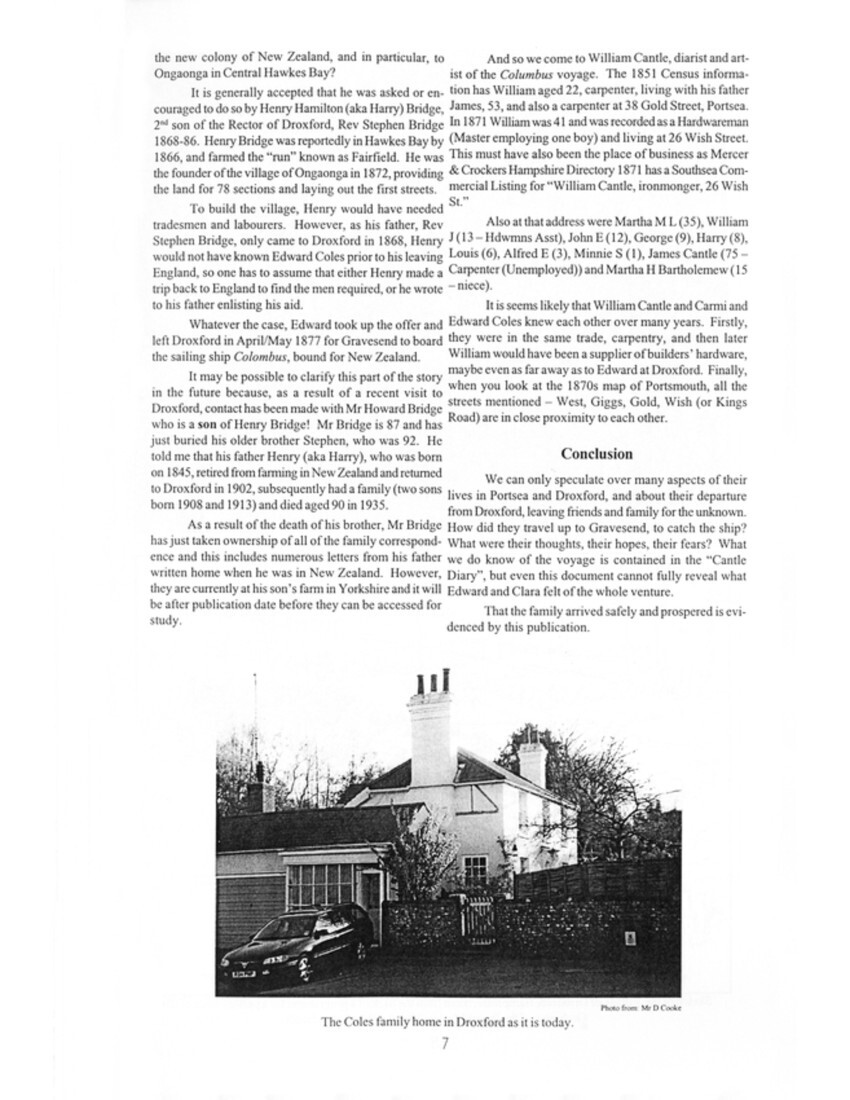
Page 10
The Coles and Cantle families were acquainted in before they left Droxford, England to sail to New Zealand and they were apparently pleased that they were emigrating on the same ship, the Columbus. William Cantle kept a diary of the journey which described shipboard life and chronicled the day to day activities of the passengers. The families comprised William and Martha Cantle and their children William James (20), John Edward (19), George (16), Harry (15), Louis (13), Alfred Ernest (9), Minnie Sarah (7), Adeline (5), and Kathleen (10 mths), and Edward and Clara Coles with their children Annie (21), Clara (18), Ada (16), William (15), Louisa (13), Ernest(11), Charles(10), George(8), Mary(6), Kate(4), Martha(3) and Edith(2). In 1900 the two families were united when George Coles and Adeline Cantle were married.
The diary is now owned by Brian Coles, a descendant of George and Adeline, who has had it repaired and bound. It is still in remarkably good condition. It is illustrated with 48 pencil sketches depicting incidents on the journey and these have been reproduced below.
THE CANTLE DIARY
This is the diary of W (William) Cantle, who sailed from England in 1877 aboard “THE COLUMBUS’ (744 tons, Captain Esson)
The journey took 103 days – Arrived in Auckland August 15th, 1877.
Saturday May 5/77 10a.m A beautiful morning. Ship in full sail and sailing like a yacht, no land to be seen on our left, the beautiful coast below on our right, with a beautiful green sea and all hands nicely after our sickness last night. After I wrote the letter to you last night, for the Pilot to take ashore we got out of the Thames into the Channel, and then it got rough and we fell sick. Young Martha first then old Clara, then Harry, Louis, Masa, me and all the Coles’s big big girls. All the little girls were fine. All the little ones are running about on deck as happy as larks, there is a good sea on and the water has just come on deck a little yet it is very beautiful. They are now preparing for dinner and I go to do a little more fitting up to make us comfortable. The singing of the men while setting the sails in the night after the tug boat left us was something beautiful to hear. Had a talk to the Captain last night, said he would make us as comfortable as possible after our sickness was over. He would have 3 or 4 concerts a week and when in the tropics he would take off our hatches, clear the decks, have dances and we could sleep about where we like.
8.30 p.m. We have had a fine day, a good breeze that has filled all our sails. Ship rolling now but don’t feel it so much as last night. Sometimes today we could see no land, now we are just off the end of our dear – Isle of White. You may be sure how our eyes and hearts watched towards our dear home but could not see it. How our dear ones we have left will miss us and talk about us tomorrow and to-night. Wrote a letter today expecting a deal boat would pass and take letters ashore for us but they did not come and we are very sorry we could not take another farewell of our dear ones. Capt. has just sent men today and cleared out our cabin. He has just sent the ladies some Port Wine, some of us feel rather queer, don’t know if we shall be sick, ship rolls very much and now to bed.
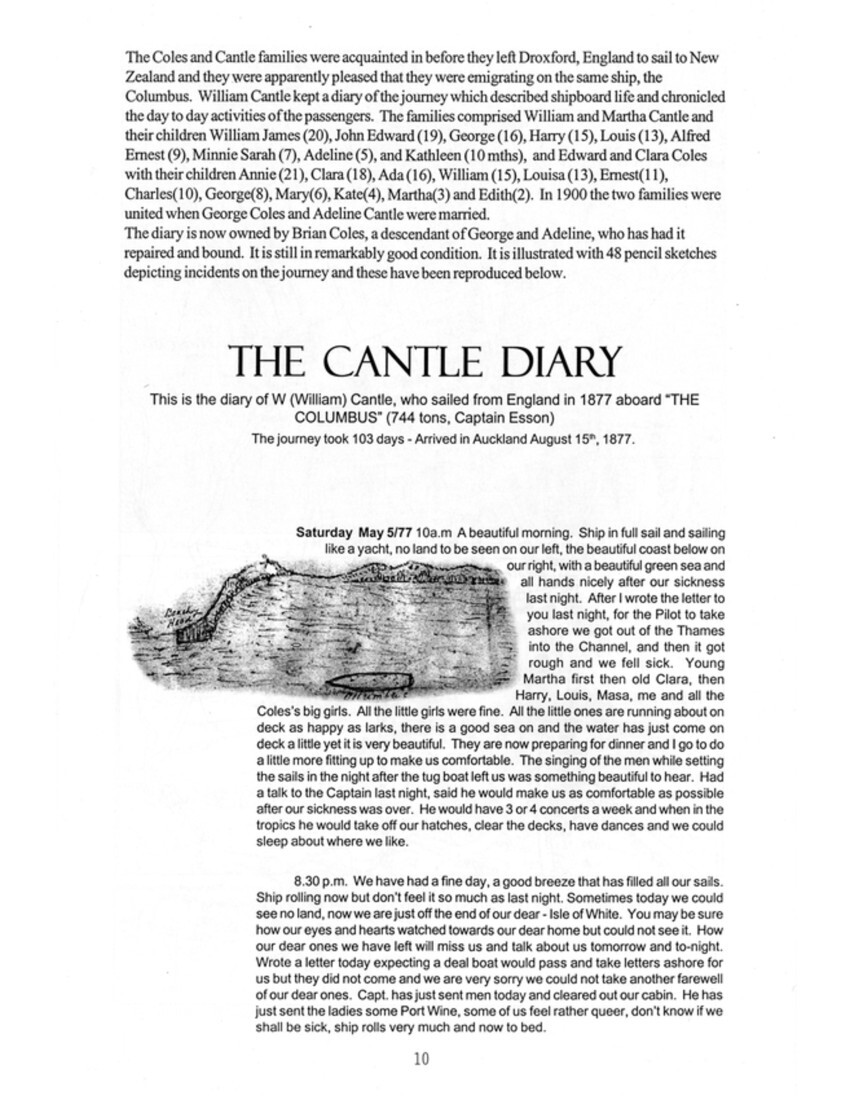
Page 11
The first Sunday at sea May 6/77 9 a.m. Our party have not had much sleep tonight, ship rolled so much but wonderful to say none were sick. Young Martha and Harry rather queer this morning, we have still a good stiff fair breeze, ship going through it like a steamer all sails full, we have had an excellent breakfast and now we are off Start Point, end of Devonshire Coast, next point will be the Lizard end of Cornwall and then good bye to old England and all we hold and love most dear. They are just sending our name on shore with the flags. I hope our dear ones will hear of us. The sea this morning is a very dark blue green and looking over the side it looks very much like some land we see in the country, it forms little hills from 10 to 12 ft. high with valleys between about 100 yds. and in going over that you know the ship cut some fine figures.
Very much like looking at the Isle of White from Southern Beach, we have made wonderful progress up to this point and if we don’t get delayed in the Tropics we shall make a quick voyage.
9.15 p.m. We have had what we call a fine rough day, but the sailors call it fine, we can’t understand being lifted up about 21 ft. and then let down again about every minute besides the cradle motion which we object to most as it disturbs the things on the table and we in our bunks. We had a slap up good roast beef dinner, with pudding, potatoes and turnips, very nice and all enjoyed it. We are not rolling so much and hope to have a better night. We have seen no land since this morning and now it looks just like being in the centre of a large circle about 5 miles all round the ship and we always seem in the centre. We expect to be in the Bay before morning. I have heard much of the Bay and hope it will not be so bad as I have heard. The open sea in the channel is something wonderful for a Landsman to look at.
Monday – May 7/77 We have had a good night and all are pretty well this morning. This is a very fine morning, sun shining both sides of the (Hedge) or rather ship – still a fair wind but not so much as yesterday. We went about 9 knots an hour yesterday. The dear children are all on deck happy. The mothers are washing babies and providing for dinner. We had a good breakfast with beef – steak etc, Their tea and coffee is not quite so good as we have been used to, it is a different taste. They say we are now in the Atlantic Ocean and quite clear of England. We are just skimming the Bay of Biscay and that is as much as we have of it. The sea is as smooth now as I have seen it in front of Beach Mansion but it looks much grander out here. The sea at Southsea looks more like a fish pond than a proper sea like this. The ship is running before the wind or as I should call it with the wind. The crew has nothing to do at present, but I suppose will be busy when we have to beat, I have just been up and looked over the bow and it is a beautiful sight to see how she is cutting through the water and throwing up the foams and then to look up and see the 5
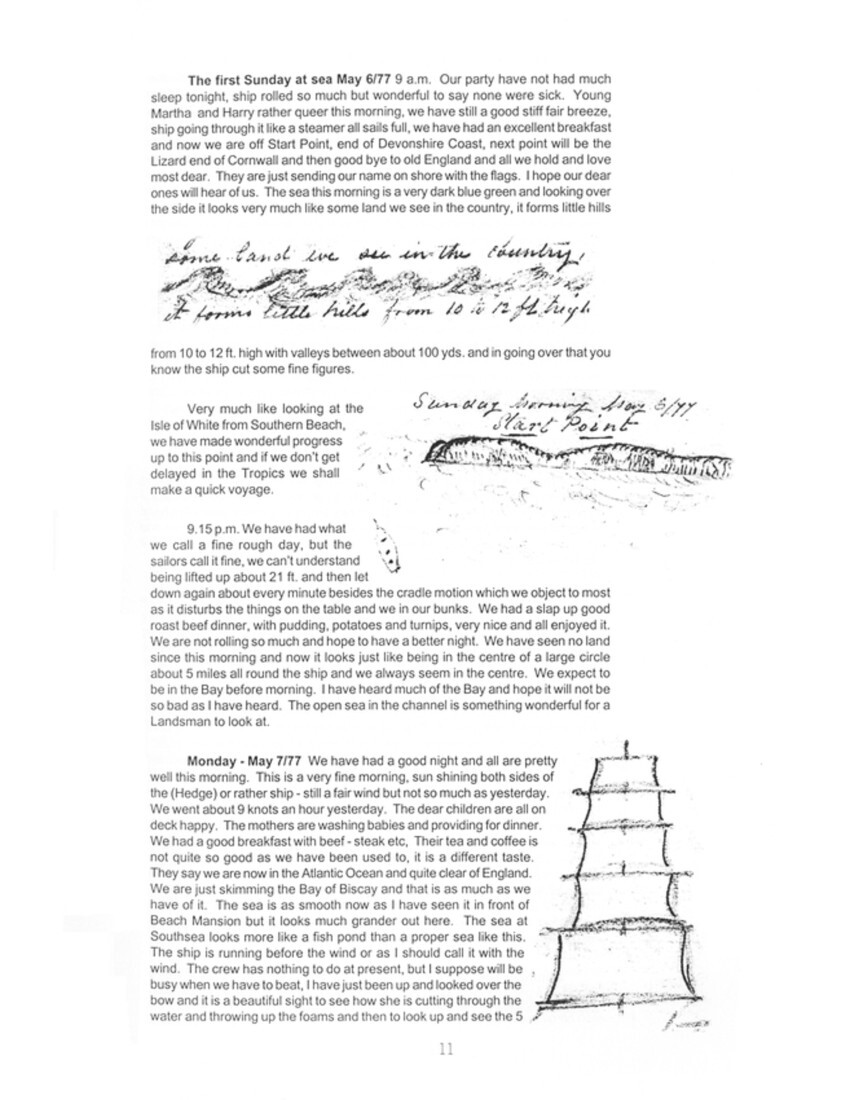
Page 12
large sails on the front mast. Jack is beside me and has just said that no doubt our dear ones are thinking about us. I said that our grief at present is nothing to theirs. Here we are all together and know where we are, and where our Dear ones we have left are, but they don’t know where we are, that is all the difference and makes it so much harder for them. Not a ship has been seen today yet. I must just put down a yarn one of the mates have spun the boys, “There was an old man who died on board a merchant ship and not having a shot like they have in a Man-of-War, to sew up with him to sink him, they put in with him an old hatchet, grinding stones etc. and so threw him over board. His son was on board and he was so grieved that he jumped over board and went down with Father and some days after they caught a shark and when they cut him open they found the son turning the grind stones and the father grinding the hatchet in order to cut their way out.”
7.30 p.m We have seen one ship since the morning. We have had a beautiful day. The sailors say too beautiful, too fine, just like a yachting trip. There seems to be breeze coming on now. Here we have been close to the Bay of Biscay and almost becalmed. The stewards have been giving us our provisions for the week. Mountains of sugar, butter etc. etc. I should think what would cost us about £4.0.0. on shore. We have had beautiful dinner with pickles and jam etc. There is a little bird just come on board. The boys are trying to catch it and put it in a cage. Coles and I have been putting up some shelves to hold our provisions and we now look like a grocers shop. All our party on the deck, but it is getting rather cold and we are going down below.
Friday Evening May 11/77 I said about that breeze seemed to be coming on and sure enough it did come. Who would have thought after such a beautiful evening that we should not have been in bed long before on came a gale with a head wind and sea which took us back into the bay about 30 miles, well it was a gale and it has been raging ever since till this morning. The first night we had to weather it out in our berths.
The second day and night the Capt, has us all up in the saloon and it was a sight. All were bad and sick. The children stood it best. The next night we were battered down in our cabin. If such a storm that we shall never forget. Fancy being lifted up and down about 50 ft. and then rolling the other way with the decks covered with water. When you could show your head out you could see waves about 30 ft, high and 100 yds. between. There was not the screeching and crying that I had expected, in fact all were so ill. The Capt. told us the second night that we were to trust in the Lord, but he did not tell us that they had carried away the steering gear. They don’t tell you the worst. They were most kind to us. Everything they could get for us they did. It is something awful to lay in your bed when the shop rolls. It is just like someone taking hold of your shoulder and keep twisting you backwards and forwards to try and break you off at the hips. We all felt like that. I should have said above that when the steering gear gave way, the Capt. thought to run back to Plymouth, but they put it to right and now we are clear of the Bay and a fair wind. We hope we have a good night. Who would have thought a month ago that we should have all been in the Bay of Biscay and in a 4 day storm, but such is life now a days. The greatest discomfort is this perpetual rolling. They say it is because the ship is loaded with R.W iron, such a dead weight, you can fancy how much we roll. Our coats hung on side of birth are sometimes as much as 2 ft. off at the bottom – if 2 ft. is length of a coat how much from keel to mast head? And that is the state of things we had to do everything in. It makes us as awkward as a man well drunk would be to get his meals, clean up and do everything.
Saturday May 12/77 Everything is so changeable in this sea, we had expected a good run now for a day or so, but we have had a head wind and sea all day so that we are no further on.
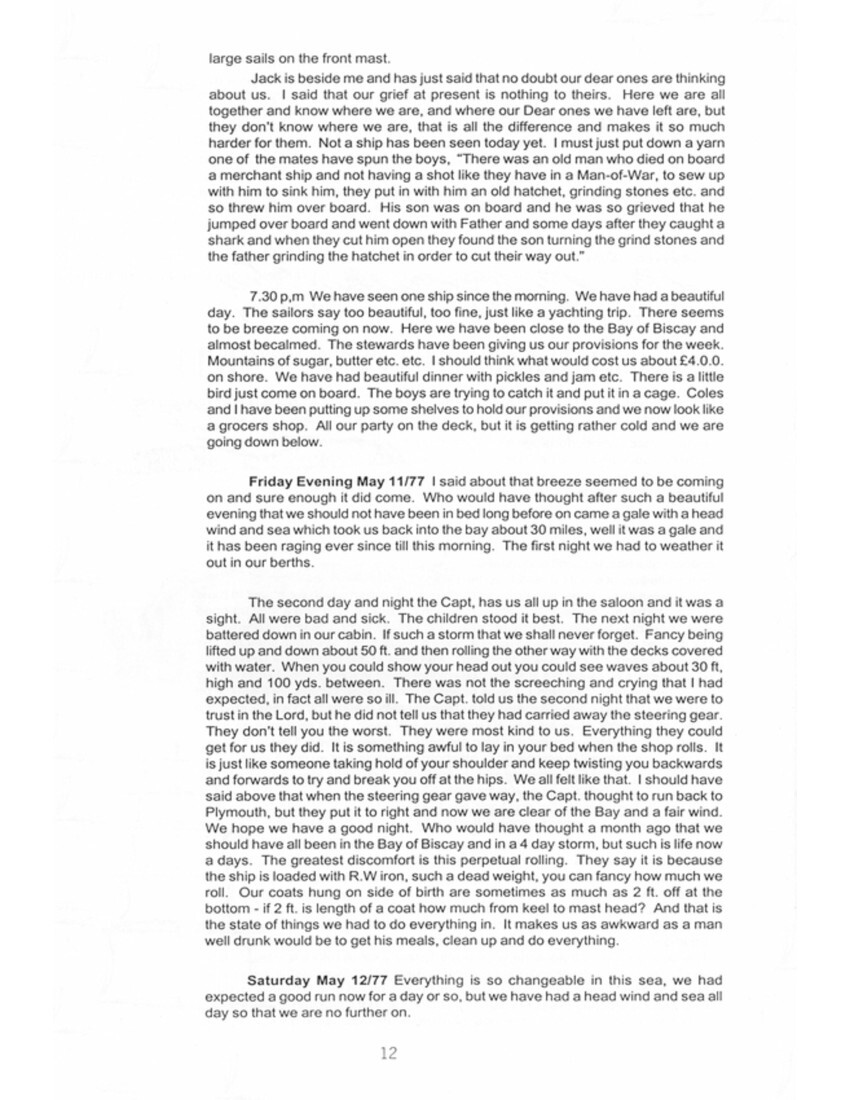
Page 13
Sunday May 13/77 Wind has increased to a gale so that we are still in the neighbourhood of this dreadful Bay and in another storm. Everyone that don’t properly value a home on shore, be it ever so humble, should be out here this day. Oh, if our dear ones knew where we are, if they knew that we were in a storm close to where the Captain went down. Here we are 2nd Sunday at sea and so knocked about that we can hardly stand, sit or lay down, everything flying about and the sea breaking over the ship. I feel now as everyone said I should after 10 days, wish myself back, but they also said that after that, things would be more comfortable, we shall see.
We have certainly had a very rough time of it with exception of first few days. Capt. said this morning he did not have so much storm all the last voyage as we have had all ready.
Monday May 14/77 We have had lots of wind today but it is fair and so the ship is rather steadier. We are dashing through a head sea 9 knots an hour. If we keep that up all night we shall soon get into fine weather. There are so many tongues going while I am writing that I forgot to mention that we passed several ships on Friday and gave our name and all well on board so that some of our friends may have seen that in paper before this. The sea is breaking over our bow like the falls of Niagara and running from fore to aft on the ship. Our boys have their trousers tucked up and are running about in it.
Tuesday May 15/77 We have had a rolling night but oh, what a lovely morning. After what we have gone through we could hardly expect to see such another day as this while we were at sea, but here we are this beautiful day all hands well and all doing something. I have not cut off 5 heads today, but I have cut the hair off 5 heads and sundry little jobs.
6.30 We are all hands on deck, some playing quoits, not iron ones, but round rope ones, others playing concertina, jump back and the girls on the poop making their light dresses for the tropics. It has been a very warm day, that is why so many wanted their hair cut. We have just at this moment 3 instruments playing.
7.30 The sun has just set beautiful and now we see the beautiful moon. We are all so well and in good spirits that we hardly wish ourselves back again, yet we should like to see our dear ones tonight. This is our boy’s birthday “Willie” he is 20 this day. Who would have thought that he would have had his 20th birthday on board ship and on the road to New Zealand. Now for a piece of salt pork before I retire for the night. This is the first day I could come to pork. My appetite has been so very bad since we first got into the storms. This is the first day our decks have been dry since we came into the Channel.
Wednesday Evening May 16/77
This has been another beautiful day. This morning the water was almost as smooth as you ever saw off Southsea beach. We have been scudding along at about 6 knots but then we cannot reckon on all that because we are not going straight. It has been all day just like a yachting trip in the Solent but not in danger of being run down by Capt. Welch. We said the other day in the storm if we had lots of money we should never do any yachting, 4 in hand tandems broughans or anything, but the water, but strange to say that today we think just the opposite. We think that a fine day like this is very much more enjoyable on the water than on the land. Here we are this fine day, I am thinking to say all well and in good spirits (only the one drawback) just when we are most happy we think of our dear ones at home and that spoils the pleasure. We have had the leak stopped in the dead light that gives a good light into our berth, that has been great nuisance but could not be stopped while it was rough. I have scrubbed out our berth and took all beds etc. up on deck
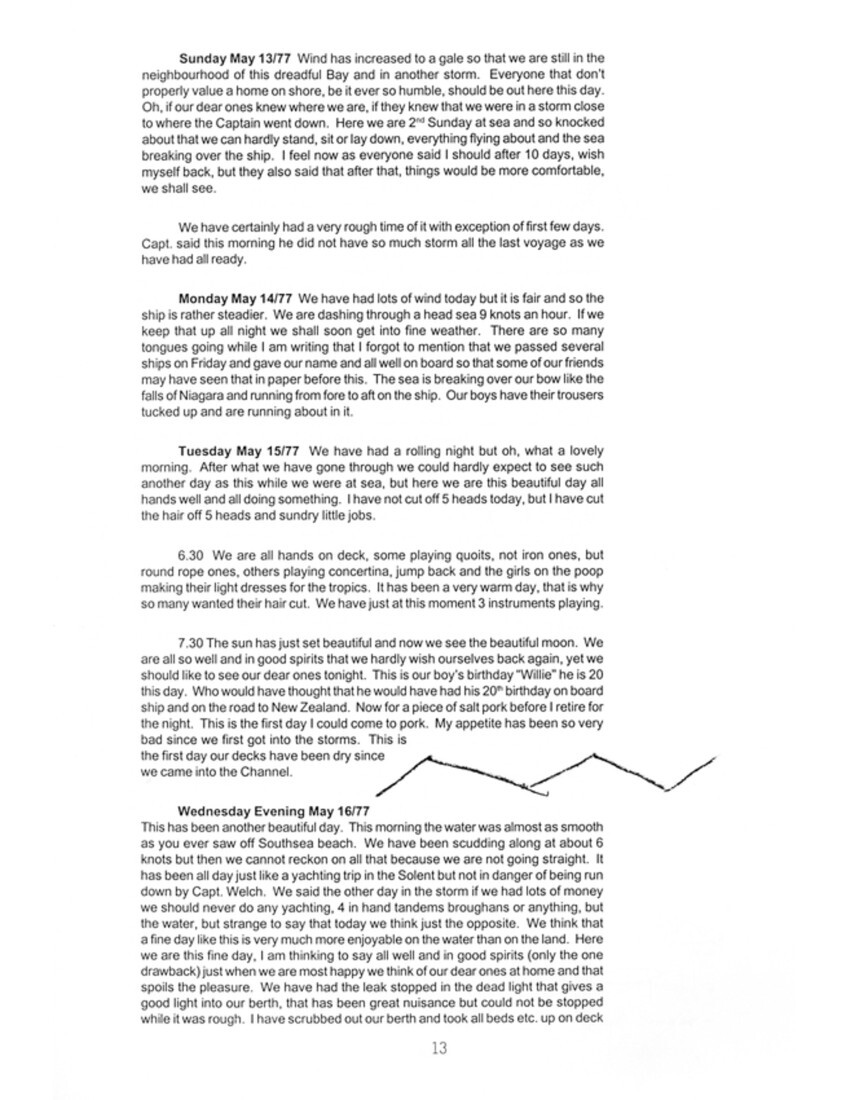
Page 14
for a good airing. We have laid down our carpet and mats and now here I| am sitting in our easy chair that I bought at Gravesend, with 4 of our dear ones asleep by me. 3 in bottom bunk and one in top. Mama is just outside in our dining room having a chat with Coles and Clara. Harry and Louis are turned in and I can hear the big boys and girls with the mates having a concert, “Star of the evening” they are singing at this moment (on the poop). We find we are getting hotter everyday, showing that we are nearing the tropics. We expect to be able to send letters from there. We wrote some and expected to have been able to have sent them by a Deal Boat but none came off. I would just mention here that we are still treated in every respect as 2nd class passengers. We have a nice Croole Steward who does all he can do make us comfortable. We have lights all night and we are not humbugged with a trouble-some old doctor, or a disagreeable old Capt. Such days as this makes us look forward with pleasure to the hope that is before us. A breeze is springing up and she is beginning to dance a little but we don’t mind that so long she don’t do the side dance.
Thursday May 17/77 Here we are about 100 miles from home just a fortnight since we embarked at S.H.1. Docks in the good ship “Columbus” for New Zealand and in that short times we have in God’s Mercy been delivered from the Storm and last but by no means the least we were last night delivered from Fire. It having occurred among our own party we won’t say much about it here. We shall never forget it and it was another illustration of what may happen through the disobedience to parents. We have had another lovely day but we are not going very fast on our journey. Saw a fine ship today on her way home. It is evening now, our party have been dancing on the poop and now I hear they are singing. There is hardly any wind the ship is rolling very much. Through the misfortune last night we have orders to put out our light at 9.30 but one of the N.Z.S.C. lights will burn in our dining room all night as usual, yet the innocent will have to suffer for the careless.
Friday May 18/77 We have had another very beautiful day and have had more wind and being much more favourable we have made good progress today. She is at this moment going along fine, about 8 1/2 knots. We are now quite well and have almost got our sea legs. Some of our dear little ones especially our dear little Addie (Addie Coles 5 years) can walk the decks when the ship rolls better than we can. They are always on deck this fine weather.
8.30 All our party were on the poop singing. Capt. has invited them all in saloon to play cards. I would rather come down and write this. It is a beautiful night (moonlight) and the sea looks beautiful. They say we may sight Madeira about Sunday. If we had not been held back in that dreadful “Bay” we should have been nearly as far again but never mind it is all for the best no doubt. Made our “Bunk” 4 inches wider today which is a great improvement. It gives more room for the baby now the weather is getting hotter. Neither baby nor Addie have lost their coughs yet, they are no worse but yet not much better. A short trip to the Isle of White might have cured them but a long trip like this never does so soon.
Saturday May 19/77 Another beautiful day a fair running wind, it seems we have got into the trade winds almost, we had a little excitement today, sighted a homeward bound Brigg and went a little out of our course in order to speak to her, we got very close to her and found her to be an Italian ship. All hands came on deck and waved their hats and handkerchiefs they dipped their colours three times which meant “Farewell, wish you pleasant voyage”. We are all on the best of terms with Capt., mates and mum and I find that there is a growing affection for each other that will make it very hard to part. The Capt. has brought his Lady with him for the first time and he could not have brought her at a better time. Our girls and boys just suit them, they can see what we are made of. Boys and girls are now in Saloon playing piano and singing. They dance on the poop till 8. It was a beautiful sunset,
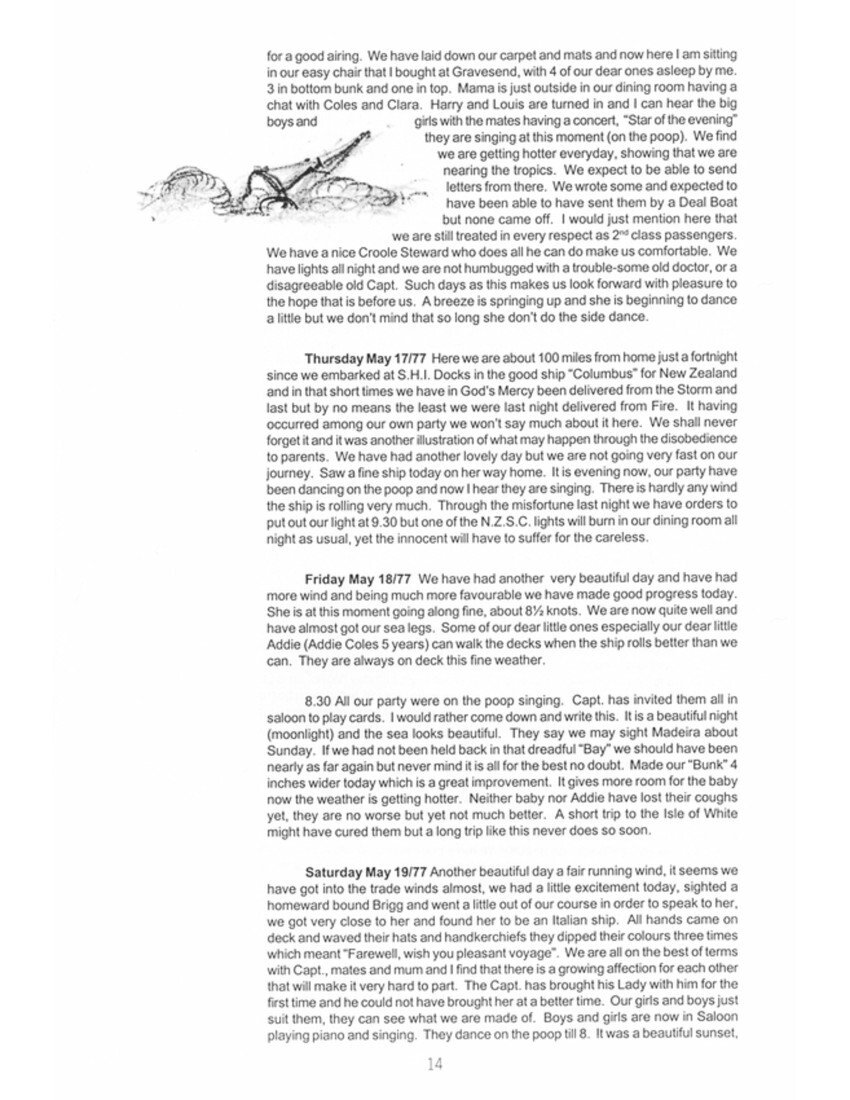
Page 15
just like an autumn sunset in England and now it is a beautiful night (moonlight). Ships going nicely and very steady so that you could almost stand on one leg for 2 seconds. Children all washed and in bed, Mama and Clara on deck cooling themselves and listening to singing in Saloon. We have lots of food to spare. We have too much squalling the other side, I don’t think that I have heard so much crying in the 22 years I have been married. They never quiet only when their mouths are full of food. I should make short work of them if I dared. They have been badly nursed you can see, they may squall for a month and you won’t hear anyone ask them what they want or where they are bad. They are much better tempered than I am and so can grin and bear it. I should jump down some of their throats.
This is Blessed Whit Sunday at Sea. May 20/77 We have had a beautiful quiet night. We have been going faster and steadier than ever, this morning we have the wind on our starboard quarter and therefore all our sails are full and we go faster. The 2nd mate Mr. Taylor kindly took our little ones on poop this morning and helped them sing and read. We joined them soon as we were ready and had a nice little service till 12. We have had a nice dinner, Willie is our cook and a capital one he is, he always was good at it, and now at this moment it is something beautiful, beyond description. I feel just now that I would not go back if I could. Just now it is a great temptation to feel so, here we are this beautiful Sabbath morning with water as blue as the water the washer women make, a most peculiar blue. We have not much to do and plenty to eat and drink and locomotion free so that just now I feel that I shall be sorry when it is over. I should have said that I have been looking at my dear children this morning and happy to say that they all look much better and happier than I have ever seen them. Their dear mother has put them on some of their little dresses their dear Aunty made them, their faces are brown and red mixed and they do look proper. Our dear little Addie has got quite fat. Minnie, Alfie, Louis and Harry have much improved, all the others with young Martha myself and Mama are worth two such as we were a week ago, dear Baby is still poorly she suffered when her mother was so bad and have not yet picked up – They have got a character for not crying, they certainly don’t cry unless they are hurt or poorly.
And now for the first wonder of the “Deep blue Sea”. We have just seen a whale. I heard them shout that there was one and I looked for some time but could not see it and was just going to put down here that one had been seen but that I had not seen it when all of a sudden about 1000 yds. off our stern to leeward up rose the gentlemen or lady what seemed to me about 15 ft. out of water (diagram). I shall never forget that the first whale I saw was on a Whit Sunday 1877 on board the ship “Columbus” on voyage to New Zealand and somewhere near Madiera. Myself and Coles have just been to look over the stern to see how fast we were going. She is tearing along much faster than this morning, if she was going 7 knots when they threw the log at 12 noon she must be going all 9 now.
I must mention again this beautiful Blue Water with silver topped waves. I never of course saw anything so beautiful before, I must not forget that we had 4 four deaths in the night. The dog and 3 ducks. We have fowls and ducks on board and you would be surprised to see how they suffered in the rough weather they cannot get over it so well as the passengers. The poor black dog had been poorly some days. They committed his body to the deep this morning and perhaps that accounts for the whale following us. I will just mention here before I forget it that I never expected to see weather anything so bad as we have seen it nor anything so beautiful as this.
Monday May 21/77 Whit Monday Called this morning at 5.30 to see the beautiful Island of Madiera [Madeira], at first sight in the mist of
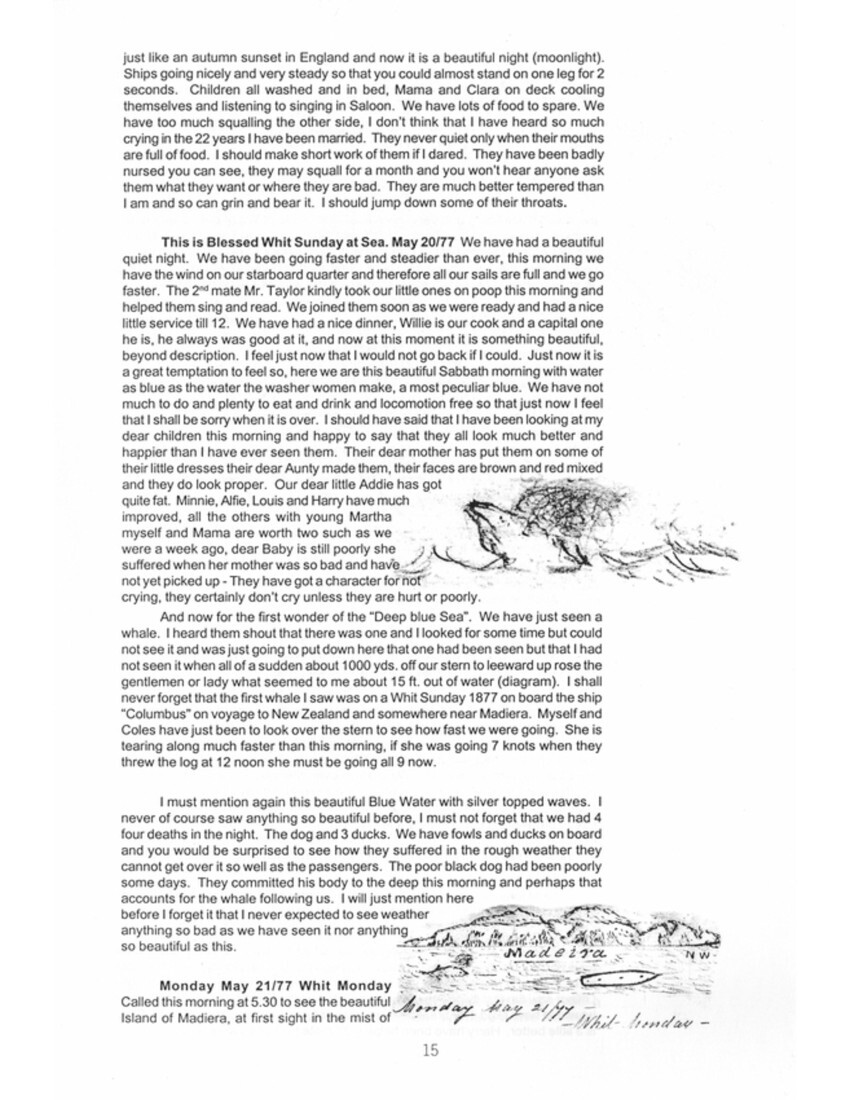
Page 16
the morning it looked like a row of icebergs backed in on the main land and grounded later on and as we got near about 2 miles off N.W. end. It was a grand sight indeed, we could see the houses and vineyards laid out in a few spots. There are not many level spots this side of the island it is all cliffs and very much like back of Isle of Wight but so very much grander. I used to call the back of I.O Wight Grand, but now I should call it pretty and this grand, the face of the cliffs are exactly like back of 1.0 Wight only larger, very few tees that we can see from here. Saw another beautiful whale this morning as shown above. It seems that we shall see more whales but no more land.
Have just signalled to the signal station if they notice us we shall tell them where we came from and where we are going. They notice us and we are giving our names, hope our dear ones at home will hear of us, wish boat would come off for letters. We are going along now much faster than we were this morning early, Ishould say about 7 1/2 knots it is a Beautiful morning, a good fair breeze and a beautiful blue and silver sea. I have just heard my dear Minnie say her lessons and I feel grateful to dear Mrs. Codben for teaching her so well and giving her such gentle manners.
Another view of N.W end with more land on the right, they say it is part of another Island.
8 bells, 12 noon, we are going 81/2 knots and very steady, we shall soon have lost sight of Madeira. That beautiful light “little Island”.
8 bells evening. All our party dancing on deck, except of course the 4 old ones. Master George have been doing the ridiculous again, he is dressed up as “Neptune” I believe. I hear they are roaring with laughter it is rather too fast to suit me. I hope the Capt, won’t be offended but it seems that he have enjoyed it. We are scudding along at 9 knots. Wind a little over after quarter, a little more on the quarter and I think we should go with this breeze 12 knots, ship very steady, all sails full, staysail not much good with this wind, we have had a beautiful day, all hands are well except old Clara she is poorly and it is a wonder she is not worse from the fright she had the other night from the circumstance I mentioned above, and now we retire for the night thankful for this days memories.
I had forgotten to mention that this is my dear Louis’ birthday – he is 13 years old this day. I am glad to say that he never looked better than he does this day.
Tuesday May 22/77 Nothing so interesting to relate as yesterday yet we have had another fine cool day, we have not been going so fast today, but sometimes in the night she was going 91/2 knots. She is now doing about 7 1/2 knots. The Chief Officer saw the first flying fish cross the bow today, the finest he ever saw. He said he would have liked it for breakfast tomorrow. More music and dancing. Old Clara is a little better. Harry have been helping 2nd mate his hands were all over tar.
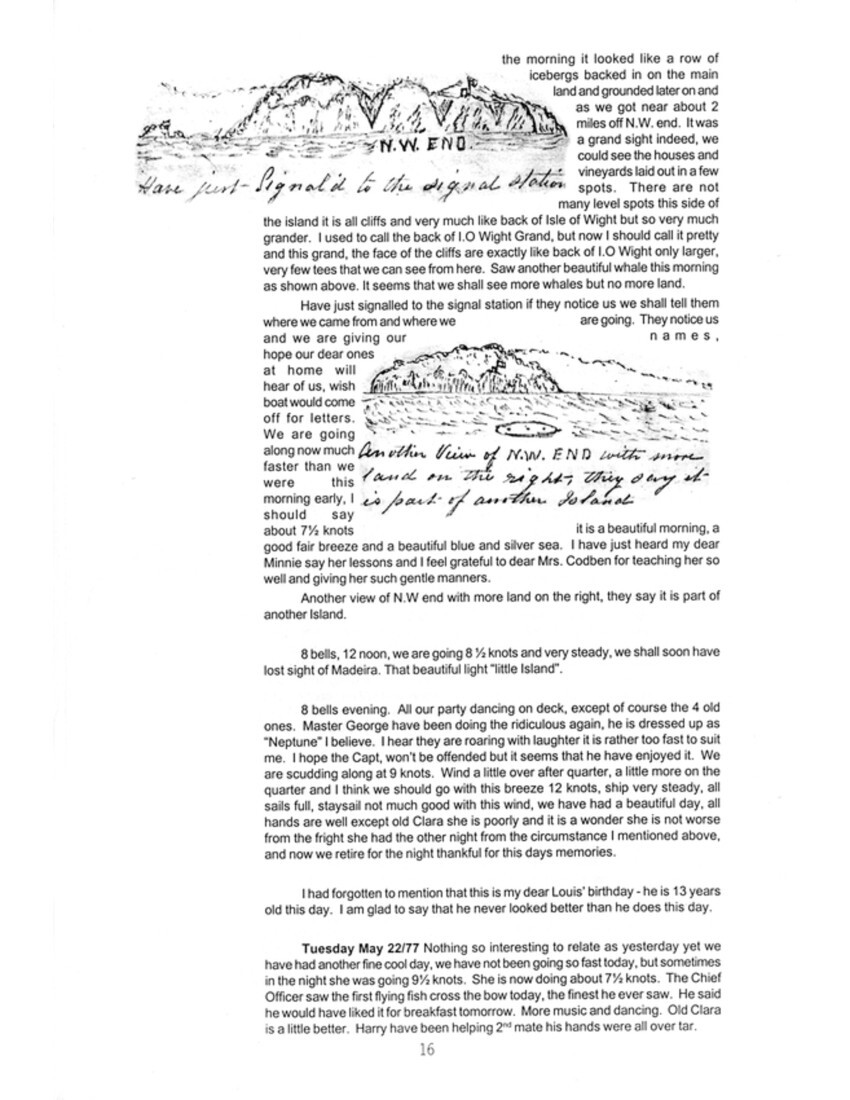
Page 17
It is a mercy to have so many days because it seems that we shall have some more rough weather other side of the Cape, altho’ it will be a fair wind yet sometimes it blows a gale so that the sea sometimes breaks over the stern of the ship and covers her with water. Some of the crew say it is worst part of the voyage. We have just come into preserved vegetables, some of them don’t like potatoes yet, but they soon will. I like them. The preserved carrots are beautiful. We have got used to salt Pork and Beef. It is much better than we expected, in fact it is all very much better than we expected. Fancy 2000 miles at sea and having Hot Rolls for breakfast, we have new bread 3 times a week. We did not expect that. Our steward is very kind. He has just brought us down some ginger bread, our ladies have stout for supper, sometimes when poorly, a little Brandy or Wine. We have seen an outward bound ship ahead nearly all day, we have been gaining on her and should have caught her before this if the wind had been a little more on our quarter we expect to catch her sometime to-night. Capt. thinks it is same ship that started day before we did. It surprises me that we don’t meet more ships than we do, we don’t see one for days sometimes. We had a beautiful sunset to-night, at first the sun was what we used to say drawing water then it turned into the most beautiful colours.
Wednesday 23/77 Another quiet night as regards the ship but dear baby has been very poorly. You see we have caught up with the ship and beaten her and she now looks to me about 5 miles in our rear and 5 miles on our left but they say it is much more, 15 miles at least – the sea is beautifully blue again and very smooth to what we have been used to yet they would call this a heavy sea where I came from. The men are all engaged repairing rigging, making ready for another storm I suppose. I have been helping carpenter a little and cutting hair. The ship has not been going very fast today yet she is keeping in her course and it all goes to the good.
We saw a homeward bound steamer today and we hoisted our number but we fear she was too far off. We have lost sight of the ship we beat last night but we have seen 3 others a long way off. I have found my sea legs sufficient to be able to carry Baby all round the deck. It is a beautiful night, the girls and boys are up top enjoying themselves. It is getting very warm and the evenings are getting very long. Sun sets about 6.45.
Thursday May 24/77 We have had another very fine day with a fair wind but ship not going very fast. We have had a beautiful sight all day, there has been 2 beautiful ships on our weather side all day. We have beaten one and are overhauling the other. I have been trying to make a model of this good ship today. I don’t know how I shall get on with the few tools I have. To make this a faithful narrative I am sorry to have to mention that Master Harry and George have had a set-to over a trifle. I had to send one, one way and one tother. We have a little too much
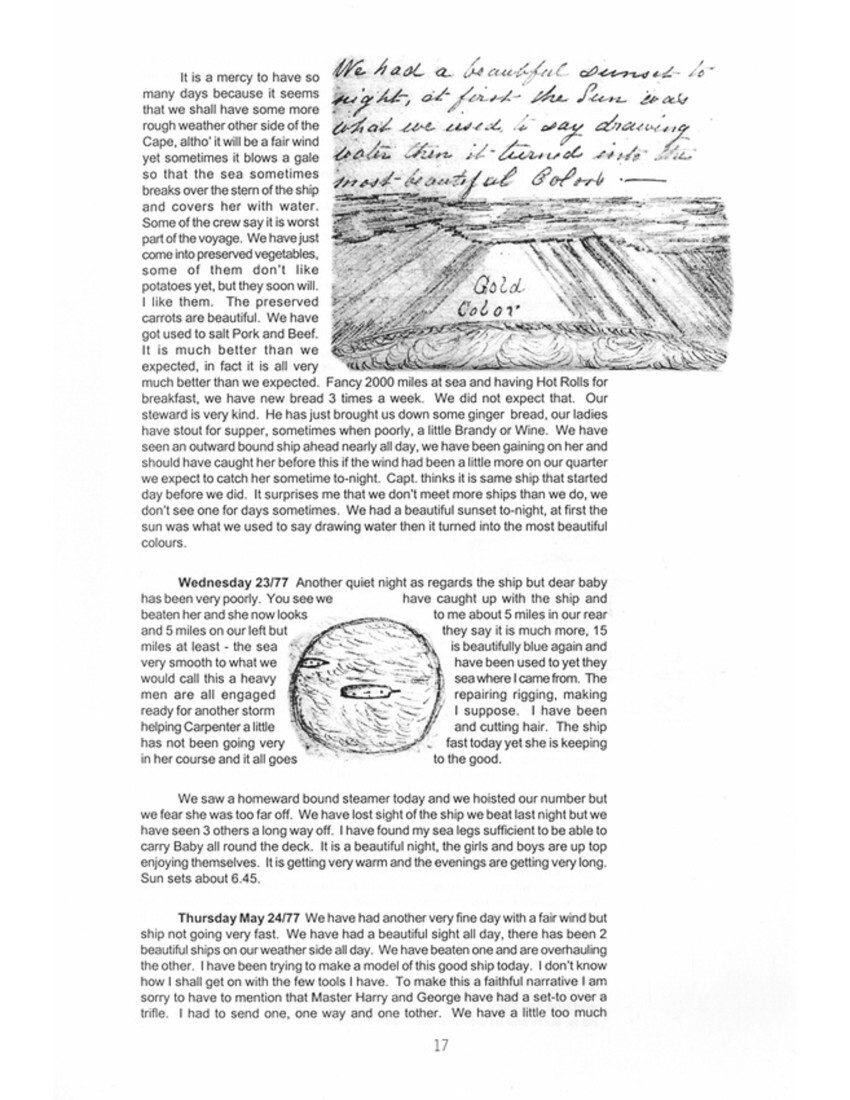
Page 18
growling t’other side to suit me, if they were to get on and do something I think it would cure it. It is getting rather warm now. The children live on deck and brown they are, we can’t keep young Addie away from the men up “forehead”. She told them today that it took 2 tons of “Holloways Pills” to cure her cold. Baby is rather better today. She is always so good. We have had another birthday today. One of Clara’s little girls Martha is 3 yrs. old today. She was very bad all night. I gave her some medicine and she is much better. All our party have been writing in hopes to fall in with a “homeward bounder’ in the tropics in a few days. Oh if we could only know that our dear ones at home will have heard of us, we know how they would value only one line. It must be dreadful suspense for them. It is a splendid moonlight night, nice and cool on deck. The Capt. has covered our part of the deck with a nice awning so that if it rains or shines we are covered. He has also taken our hatch off which gives us more air, fancy, only the other day and we were battened down. All our 2 parties on deck singing, this is really a happy life in fine weather, we had a nice dinner, Willie is a good cook, he put some preserved meat in a large dish and covered it with preserved potatoes and baked it and it was good. We have a greater variety here than we used to have at home. Ours is really a special case, we might have came a hundred times and not fared like this. We have a nice women and child with us (those are the only strangers with us). She paid £28 and only fares as we do (I am on deck and it is so light that I can see to write these last few words). It is a very quiet night but the ship is rolling very much and 2 of Clara’s girls are sick.
Friday May 25/77 We have had a rather unsteady night, some of the Coles girls with some of my boys have been sick. I think the dinner was a little too rich yesterday, we all have felt a little bilious. This is another splendid morning, a nice cool breeze and more of it on our port quarter. Ship going faster. We have passed the German Barque that was about 10 miles ahead last night. She is now almost as much astern. We were within a stones throw of her this morning.
6.30 It was a welcome sight. We dipped our flag 3 times on parting and they did the same. You see with all her sails we passed her with only 2/3 of the canvas. Our ship passes everything when once we have sighted it.
There has been a beautiful fish following us some hours this afternoon. It is what they called an Albercore. It looks a beautiful colour just under water – pinkish. Sometime a part of it is above water. The 2nd mate was trying to catch it with a hook and piece of white rag, but when I heard that the first mate had never seen one caught and that the Capt. had only seen one caught in his 23 years experience. I came away and gave it up as hopeless. It looked about 7 feet long in the water. We have just lost sight of the ship we came up with this morning. It is a beautiful moonlight night (full moon). I was thinking that if we could only know that some of our dear ones at home was looking at it the same time we were it would be some relief. It may be possible that when they look at the moon they think of us their long lost ones. Two of the Coles girls are poorly or else we have had another happy day. I have been on the Poop dancing and playing while others danced, they are still at it. Now I hear them singing. The 2 Mates are first rate fellows and we are capital company for them. Our dear Addie is a great favourite with the men “forward”. One of them has made her a 4 wheel cart today.
She will have cart on the brain tonight. I sent him a piece of tobacco for which he was thankful. I should have said he is a Russian Finx and a beautiful man he is, such one as some of our ladies would like to meet alone in a long narrow
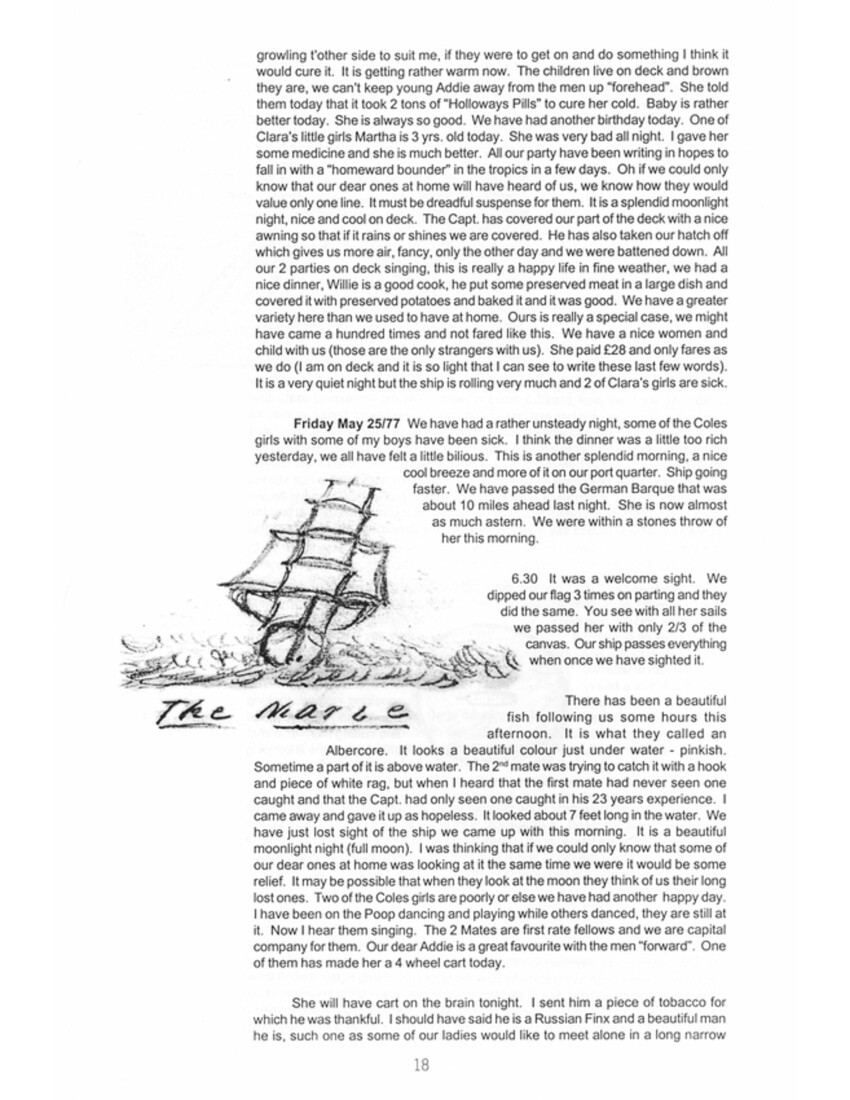
Page 19
lane. Our dear baby is still poorly, but I hope a little better. She is so thin. She is smaller than when we left home. I do hope she will get better before the rough weather comes on again. The ship is not going very fast but is rolling a little and now we soon retire thankful for another day’s mercies in this wonderful place.
P.S. All hands on deck to see the Capt. set off some sky rockets and beautiful they were. He certainly does all he can at present to please us.
Saturday May 26/77 Another most beautiful day. I think the warmest we have had. I have not seen “Mountains of sugar” or “Rivers of Rum”, but I have seen “Flying Fish” today. They are pretty creatures. It seems they fly till their wings are dry then they drop. We expect them soon to fly on the deck.
I went on the Poop at noon to stand on my head. The sun in so nearly over our heads now, that our shadow is so short that we can stand our foot on our heads for the first time in our lives. We had our lime juice served out today. It is very nice. I have put up another locker to put our provisions in to make us more comfortable. The Mother has bathed the dear children tonight just the same as if we were at home. She has also made 2 nice cakes for tomorrow and we are to have a plum pudding and now she is mending their cloths. Another beautiful moonlight night. All our young party on Poop singing. Two or 3 Coles party sick again. They give way to it and lay in bed too long. They seem to have no energy. I do hope they will improve for their parents sake. The water is what we call smooth, but there is a heavy swell on, which makes the ship roll, but we are getting used to it now. I know I shall spoil this diary if I put down what I don’t like to see but I will be faithful. I will do it, see it who may. I don’t like to see young girls sitting in men’s laps, old enough almost to be their father and who they have not known many days. They are foolish to do it, poor things, for they are only thought less of by the very party who enjoy it for a time. I need hardly say that you won’t catch our young Martha doing it and that spares me the trouble of having to object to it, which I certainly should, and yet one of the mates told me that he could see that Martha was worth a dozen of the others. Men are no fools.
Sunday May 27/77 Another most beautiful day. We are now the South side of the sun and may never be the North side again unless we come home sometimes. It is warm but not near so warm as it was in England last summer. I don’t mind if it is not hotter than this, but the mate says that he never found it so hot right under the sun as he have found it when the sun was at an angle, so perhaps we shall find it hotter farther on. We have had nice dinner with the pudding I mentioned above and it was very nice. We have also had a nice tea with cakes which were also proper. We have had singing and reading. The children have all looked nice in their light clothes. I have had on a pair of white ducks that I have grown out of. I had a job to close the “Front door’, thought I should have had to use the button hook but we managed it without that dangerous weapon. Our little boys have been up forward this morning and had their salt bath. They get into a large tub and one rubs the other. We saw a shoal of Black fish today. They seemed to be very large, but we could not see much of them out of the water, only a large piece of their tails, now and then.
Photo caption – What they call the Albercore
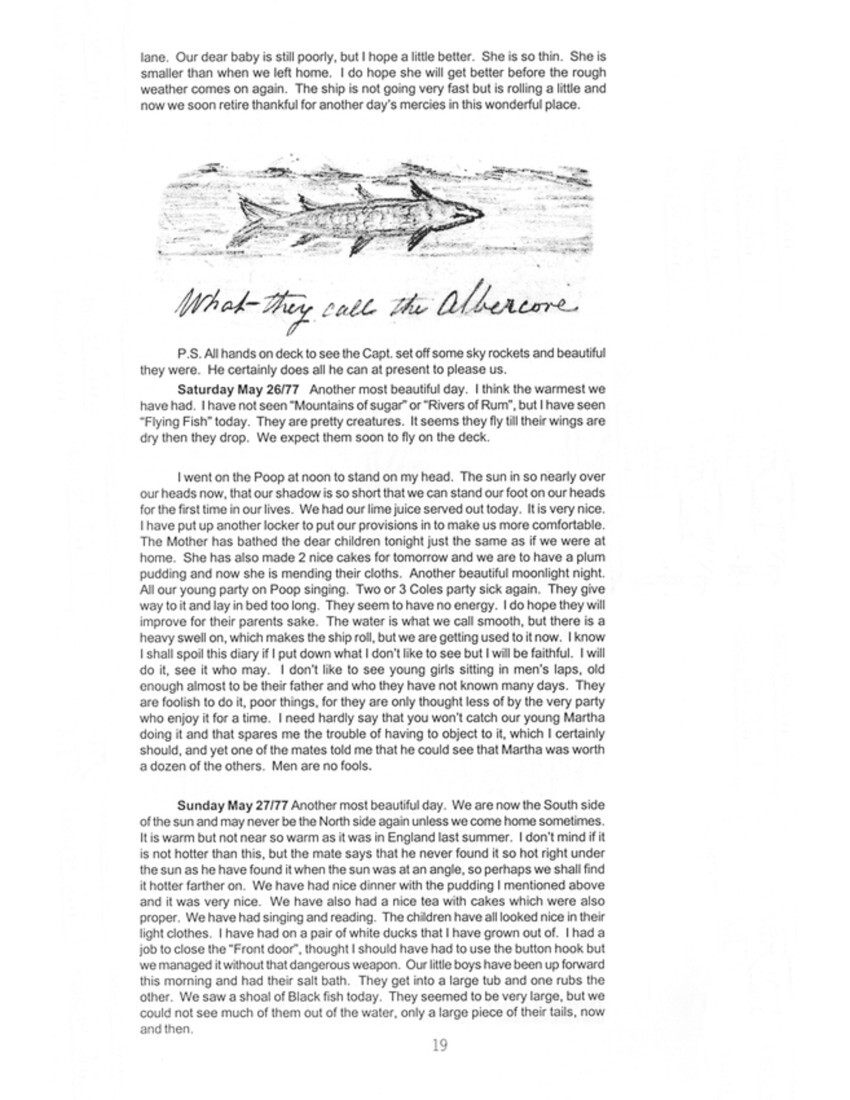
Page 20
The mate says it is the Black fish that is supposed to have swallowed Jonah and not the whale, because it has a very large swallow and a whale has not.
Monday May 28/77 I think this is the most beautiful morning we have had. A good breeze over our Port after quarter and the ship is going faster and steadier than I have seen her before, this will help us nicely. They say it will be another week before we get on the “Line”. We are now about 2500 miles from our late home. Who’d have thought we should have been here, yet here we are and I’m thankful to say that we are all much happier and better than we ever expected. The girls (those who could) young Martha and 2 of the others have had their bath on deck this morning. They rig them up a canvas machine and they tell me they have a proper bath. They certainly looker fresher. I told the little boys yesterday that they should not go round the berths calling each other as early and waking us up, so young Alfie for fear he should not wake, lashed his Port arm on to the starboard side of his bunk and by the time we went to bed he had got so hot that I was obliged to unlash him. As their mother says “what won’t they get up to”.
This evening we could just discern land on our port side. It seems it was one of the Cape Verde Islands called St. Antonio. We could just see 2 mountains. One the mate said was 700 feet high. This good ship is slashing through it now and she
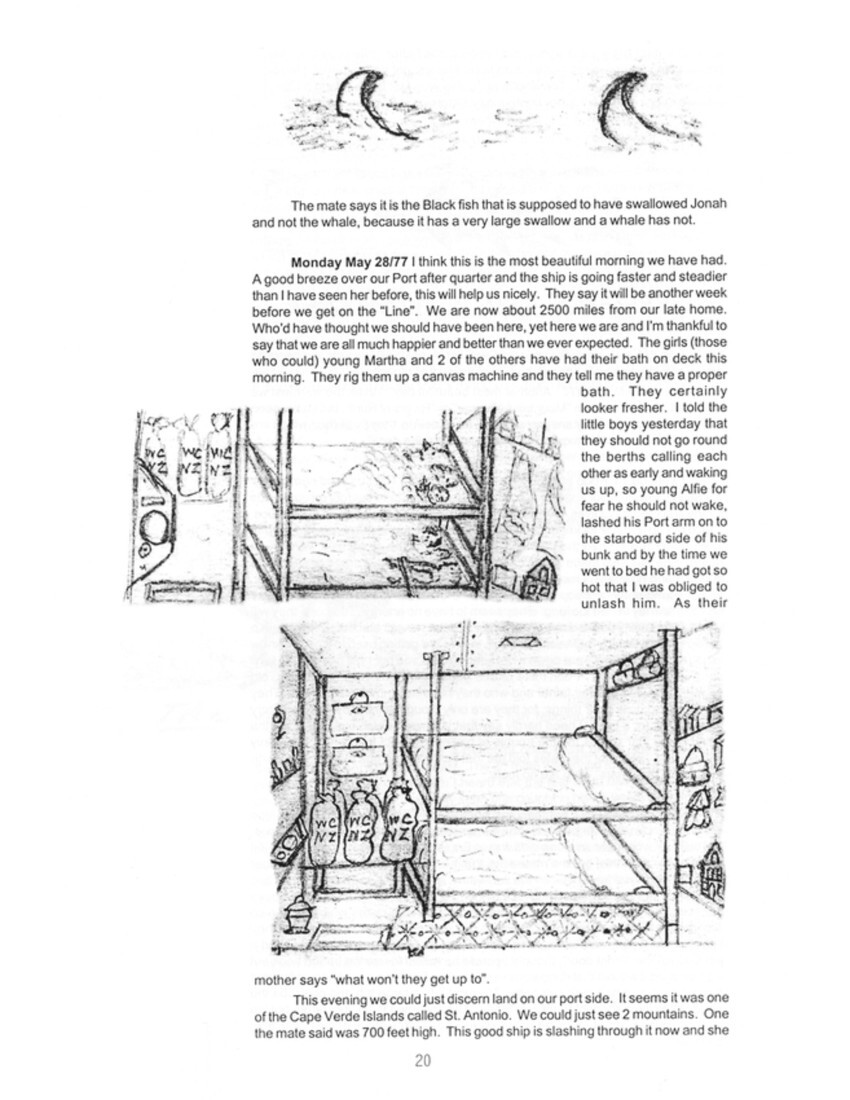
Page 21
is very steady for going so fast. On looking over the side you can see her throwing up the little mountains of sea about 12 ft. high and yet she is steady. We are in great trouble now about our dear and only fellow passenger and child, Mrs. Thomas. I don’t think that I have mentioned her before. She has been so quiet that I have forgotten her. She tells us that she come from Cornwall, that her husband is in India and that her friends are sending her to N.Z. for her health. It seems she is consumptive and have thrown up blood in England and today she has thrown up some more and now she certainly looks very ill. The Capt. is in a way about her and says he is sorry she came in a ship that has no doctor. I have given her some medicine and hope she will be better tomorrow. Rather a cloudy sky tonight and I have heard something about the Royals & Top galant sails may have to come down. I hope not, but it seems that they are sometimes met with squalls in this neighbourhood. Weather looking better before we went to bed.
Tuesday May 29/77 We have had no squall but the ship has had a most peculiar motion which have made some of us queer in the head and the Capt. Wife has been sick all night. Mrs. Thomas has had a middling night but is still poorly. She thinks some more blood is coming. The ship feels now as if she was on a candle spring which is anything but pleasant. Mrs. Thomas has been much better today than she expected and now she seems nicely. The ship was going slow this morning, but now she is cutting along fine and a breeze has sprung up which I hope won’t increase to a gale. It is dark now by 7.15. We have long evenings. We have very little twilight, a very few minutes after the sun is down it is dark. The time passes jolly yet it seems much more than a month since we left England. Mama and the boys have done a nice bit of washing today. That is better than throwing dirty cloths overboard, but we could not have done it if we had more people on voyage with us, in fact we enjoy very much which we could not in that case. It was a great mercy that it is so for us. I have been in Chief Officers Berth and have seen a nice specimen of a sea horse which was caught at N.Z. They say they have them alive in Brighton Aquarium. It is about 4 inches long and very pretty. He has also a petrified oyster from N.Z. It was broken by accident since he has had it and a good job it was for it shows the oyster inside petrified as hard as the outside. It is a beautiful specimen. He also showed me on chart where we are today. I see we have passed Canary & Cape De Verde Islands and are now somewhere between S. America and Africa. Have just been on deck and was going “Forhead” to light my pipe when a sea broke over the weather side “midships” and just caught me enough to fill my boots. The ship is going very last but very steady. She is making so much foam that it is just as if we were sailing in soap suds. It looks very black to windward. The Capt. keeps coming up on poop to look at the weather. He is a very careful man. I have had a long talk with him about Mrs. Thomas and other mothers.
Wednesday May 30/77 We have had no squalls. The wind drops through the night and now we have had another beautiful morning. Young Martha took our 2 girls on deck and bathed them. We were called up this morning to see two ships one a large steamer 5 miles on our starboard side, we signalled her, the other an American Barque 2 mile off our port side. She was lightly laden and I am sorry to have to admit that she has walked away from us. We could see that she had a lady on board and that she was the “Miss Mary” from New York. Went up to bow to see some shoals of fish they called .. they looked just like large water rats. They were all going same way as us and they seemed to be after the flying fish for they were flying about by hundreds. Wind has increased by noon and we are going a good pace. Mrs. Thomas is no worse but her child being a spoilt child worries her. Went shopping today and brought a cheese off the Capt. It is expressly for our 2 ladies. It was 6lb. At 1/6 per lb and not dear because it is good stilton cheese. We
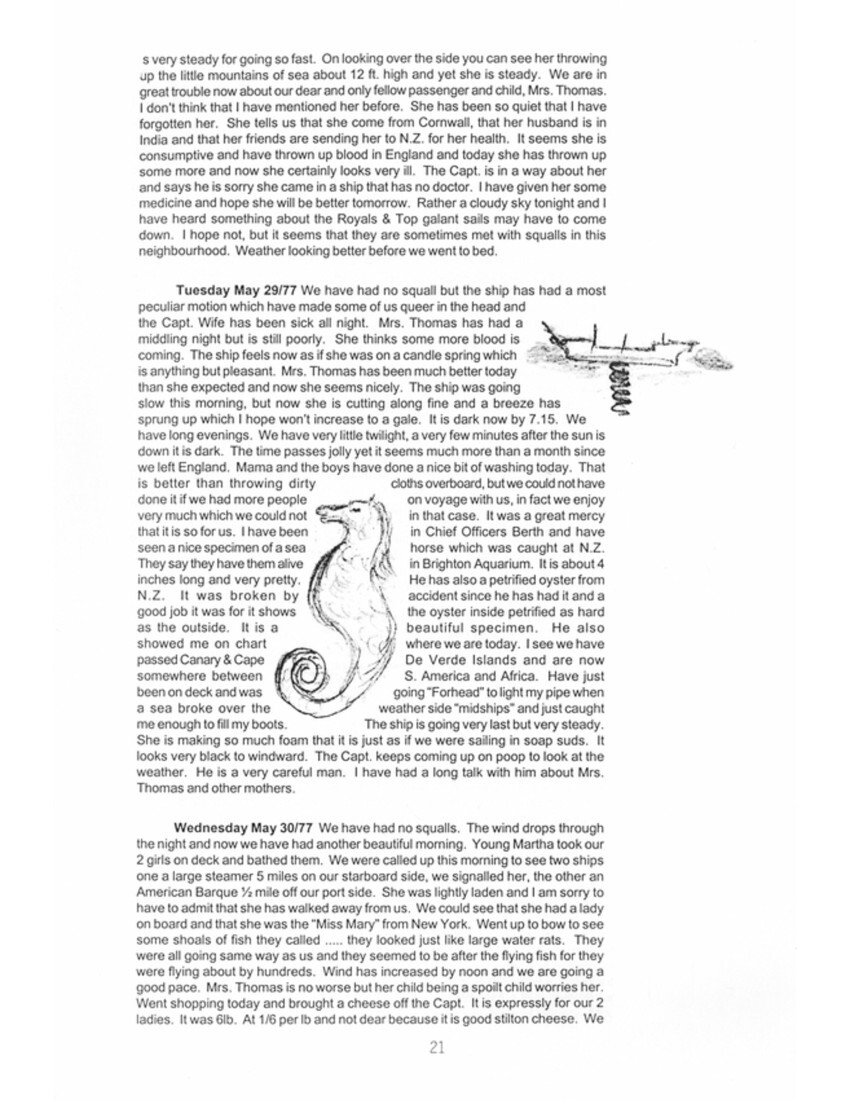
Page 22
have been very hot today, this has been the hottest day worse than when we were right under the sun but I don’t think it is quite so hot as it was in England last summer because we have such a nice sea breeze. It is beautiful up on deck now. Ship is going faster than 10% knots, expects to catch up to “Brother Johnathon” but I doubt it very much. Our dear Baby have seemed rather better these 2 or 3 days but have not yet lost her cough. She ought to loose it tomorrow or she will not loose it in May. Neither she or Addie coughs so much. She knows now when her Mother is dressing her for me to take on deck, she is delighted. Sometimes the Capt.’s wife holds her, she is so good with anyone. They all say she is the dearest creature in the ship. You would hardly know she was here, very different to our port side Ladies.
The ship is throwing up the foam both sides and as it flies past tonight you can see hundreds of phosphorus sparks, just as if her bow was going through a large fire and these were sparks thrown off. The third Mate, Mr. French has given me a nice sailors knife. I heard that he had brought 1 dozen on board and I asked him to spare me one at what it cost him, but he would not think of taking the 2/6 for it, so I must accept it in memory of ….. They are all on deck having a cooler. A sea has just come over the port side and Jack has just run down to tell me that Lou & Harry were laying down on the main hatch, but hear they are not much hurt. They have been out on the bow sprit today fishing, but I stops that, that was more than I could stand, altho’ Harry is a good sailor, he is helping the men and they think him very clever and says he is cut out for a sailor and would get a good berth in one of the N.Z coasters.
Thursday May 31/77 Another beautiful morning, all the girls and boys taking their baths. Ships not going so fast as last night. Wind always drops with the moon. Saw a homeward bound Brig today, have made a sponge and soap box and put up another shelf to make more comfortable before the rough weather comes again. Lots of flying fish about again today and one has just come on deck. One of the men picked it up and gave it to their favourite, Harry. It was a great wonder among us, I intended to have pickled and dried it, to send it home but impatient Harry soon had its wings off so we must look out for more. We had a very hot night and we expect another tonight. I have just been to look at the children in their bunks and they look melting. They are as red as fire. Some of the party sleep in deck. Capt’s wife and Mrs. Thomas a little better. Ship going a steady 8% knots wind not quite as favourable as it was last night. I have just asked the Capt’s wife if she would accept flying fish for her breakfast. She was glad and sent us down a nice salt fish in return.
Friday June 1/77 We have had a very hot night. I don’t sleep with my wife tonight no, not for Joseph …., ship have been going rather slow today yet it has been better than being in the “doldrums” as they call it in this part of the voyage. It has been hot today. I have been writing to our dear ones at home expecting soon to fall in with a “Homeward Bounder’ to take them for us. Oh, if they should only get them how they will value them. Not many flying fish today. We have had a beautiful sunset, black, grey and gold, most spectacular. What a noise in this ship tonight, all hands singing and dancing. They have a “Cockney” in the “Forcastle” and he knows a thing or two. Our boys are delighted with him. We are just having a heavy shower, a “Tropical Shower”. It does come down proper. It is the only rain we have had except one day in the storm in the Bay. All our party are on deck so I suppose it don’t come through the awning. A lot of our boys intend sleeping under it tonight. I wish I had the courage to do so, but I fear catching cold. I noticed that it comes over fresh about 4 in the morning and I am afraid to risk it. The ship is going very slow and very steady. Perhaps the wind will rise with the moon, I hope it will. We expect soon to be becalm’d. We have not lost sight of “Brother Johnathon” yet. And if a breeze was to spring up we should “over haul” her yet. We have had another ship in sight today and we expect to “over haul” her tonight.
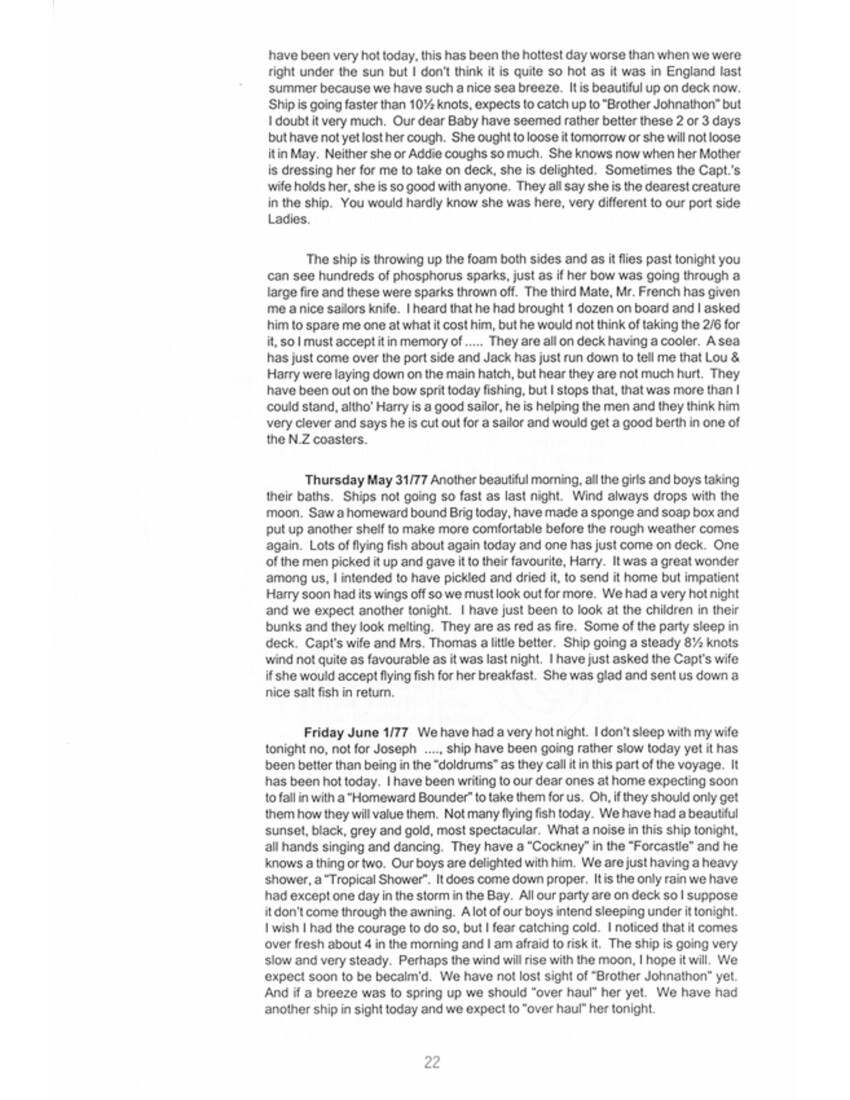
Page 23
Saturday June 2/77 A very eventful day. There was the beautiful morning with two fine ships on our starboard side, then all of sudden all hands to shorten sail, a tropical squall, all hurry and shouting and such wind and rain for about 1/2 hour, we lost sight of the ships in the storm and after it had passed and we could see them they were quite in another place, they or us had been driven such a distance apart. Then the accident to Coles baby. The steward had sprinkled some Carbolic Acid about and the poor thing went and sat in it. She did cry for a time. You could hardly hold her she was in such pain. I noticed a good plan one of the sailors had for wringing a sheet or blanket. He put it over a peg and I could see that he had more power to wring it dry than 2 people could have. All run up on forecastle to see a shoal of Porpoises. Men out on bowsprit trying to harpoon them but no go. We have had a very hot day and have been becalmed, since the storm, ship hardly moving.
Such a row with the sailors tonight. I am sure our children were all delighted and they will never forget it. They “Buried the Dead Horse”. That is they all draw a month’s advance some days before the ship sails and of course spend it all, so that they have been working one month on the “Dead Horse”, or for nothing. When that month is up they make up a horse (this one was more like a sheep), one man rides it and others draw it round the deck singing and shouting. Of course all our party joined in the procession and made as much noise as the sailors, then they pulled it up to the yardarm and after a few verses they cut the rope and it dropped into the sea, then there was a hurrah and then glass of grog each and all was quite. Our young ladies complain very much of the heat, yet 3 of them can sleep with all their cloths on all night in 2nd mates cabin, a place hardly large enough for one person. Novelty.
Sunday June 3/77 A beautiful morning, ship going much faster, more squalls, one this morning drove us ahead of the American and have not seen her since. Children look very nice this morning. I never saw them look better. It is melting hot below, about 90° in our berth, enough to melt us. I am surprised we are so well. Our night shirts in the morning are as if they had been dipped in water. Have had a lot of “Sankey and Moody”. Ship going along well. Had cake for tea and a taste of Duck and Green peas in the morning.
Monday June 4/77 Beautiful morning, more squalls but soon over. Ship going nicely. Capt’s wife still very poorly. Some of the Coles children still sick, very hot in cabin but nice breeze on deck. Mater Louis fell down ladder and hurt his bxxxxm. Beautiful cool evening on deck but hot below. Ship is dashing into it just now. Her bow seems to rise and fall 50 ft. Capt’s wife rather afraid, a great sea on.
Tuesday June 5/77 A beautiful morning but lots of wind. Ship have been going very fast through the night and is tearing along now altho’ the wind is almost dead against us. Had the hottest night we have had yet. They have taken down the awning and put on our hatch again. They expect this weather or I should say they did not expect this weather so soon. One of the men who has been this way many times has just told me that he never knew so much wind near the line but it is a good job as we are going 8 or 9 knots an hour instead of as much in 2 or 3 weeks as he have known them do. Ship is going ahead well altho’ wind is almost ahead. One of Coles girls sick again, but we have just found out that she is always at the pickles. We have not yet seen a “homeward bounder” to take our letters. I hope the wind won’t blow them out of our course.
Wednesday June 6/77 We have had a very hot night, had to wipe ourselves all over 2 or 3 times through the night. Ship have been going fast all night but not quite so fast this morning. Nice cool breeze on deck. This morning hundreds of flying fish about, they look just like a flock of birds. 3 came on deck today. Steward kindly gave us one and it was beautiful, very much like Gore fish but much better taste. Have had rather troublesome day. The decks are very hot and slippery. Mrs.
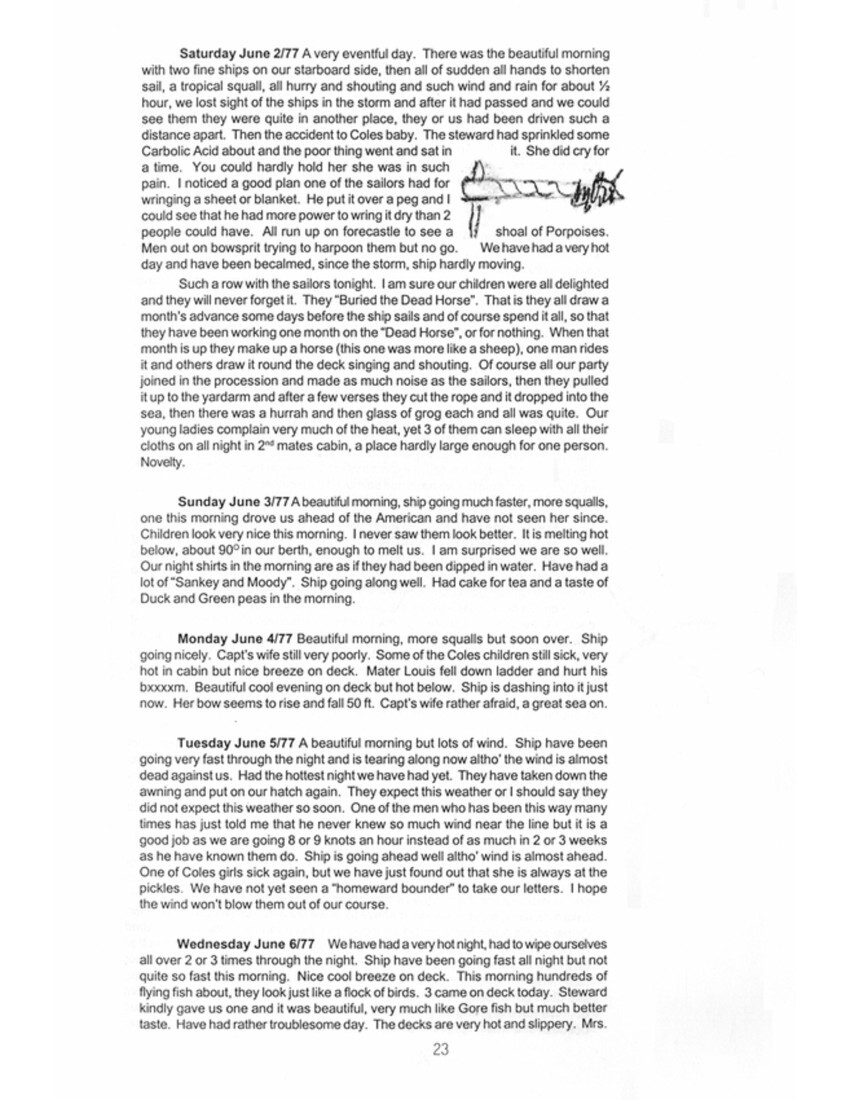
Page 24
Thomas and her child fell down. The little ones have been falling about and wetting themselves. One of the Coles girls Clara had a nasty fall on her head and then in going down the hatchway she slipped again. Lots of growling and grumbling on the other side. We have too much of it to please me. Capt’s wife have been very poorly today. Our dear Baby I am thankful to say is much better. Cleaned the first mates revolver today, a 6 shooter. The men have been dragging the boys around the deck this morning on sleighs, that just suited them. Ship is going fast 10 knots and steady, very unusual in these parts. We must be on or near the Line, I am sure, going as we have been these 4 days.
Thursday June 7/77 We have had another hot night. I sept [slept] with Minnie but she kicked so I had but little sleep. Another beautiful morning. Ship has been going fast through the night. It seems that we crossed the Line yesterday but Capt. kept it quiet because the men shout, not have a stir up. I daresay we should have had to come out with a bottle of rum, I expected that, but now we are 200 miles south of the Line and I have not heard the men say anything about “Father Neptune”. Mrs. Thomas’s child is better and so is Coles girl that fell down. 2 of them slept in 1st mates berth last night and that done them good. I am too hot to sleep naked – I don’t know how they feel to sleep with their cloths on. We are going about 200 miles in the 24 hours which is a great mercy, much better than being becalmed.
Coles got out some of his boxes today “Wanted on Voyage” and found the clothes were all in good condition. 2nd Mate seems rather upset, I think he is rather jealous, the girls seem to pay more attention to 1st Mate, such is human fancies. Have seen no flying fish today. I expect this wind will soon blow us into cold rough weather, we are thankful we have had so much fine weather.
Friday June 8/77 This has been another splendid day, a beautiful breeze and doing about 8% knots. Nothing particular today only more grumbling and tale bearing. The “Guide Book” said we should be sure it have that and so we do. You see we are a lot of people with not enough for the hands to do and then the tongues goes to work. Coles made a new sleigh for the children to drag on the deck, but Capt. would not let them use it because of tearing up the deck, I knew that – . A spanking cool breeze on poop deck this evening, young ladies enjoying themselves in their way on poop. Steward upset today because someone said his bread was sour and Cook because someone said he boiled the meat too much. Carpenter made Capt. wife an easy chair with canvas seat and back rather good idea. She seems to be a little better today.
2nd Mate much better temper today than he was yesterday.
Saturday June 9/77 Beautiful morning called on deck by ship in sight, get your letters ready, but she was too far off. I fear it is a case with the letter Ship having been going fast and steady all night, they say we are now about 600 miles south of the Line, some of them begin to talk now of doing it in 80 days, I say 90 days. Ship have been going fast and steady all day, beautiful peculiar sunset and fine cool evening.
Sunday June 10/77 Another beautiful day ship going about 8 knots, not quite so hot in our cabin, had a nice dinner, cut up salt meat and mixed it with preserved meat and then passed it through mincing machine and baked it in patties, cake for tea and steward very kindly gave us a little Duck and Green peas for dinner. Our dear little Addie had 3 nasty falls today. She put on some boots today that had some nails in the bottoms and caused her to slip about. I forgot to mention that dear Minnie had a serious fall yesterday down poop stairs, cut and bruised her poor face rather badly. She is much better today. Capt. kindly gave wife bottle of wine, she don’t go “spelling” for anything of the sort, yet she gets more than those that do. We have a young lady on board who very much objected to come with us because she was engaged to a very nice young man but did come and I saw her
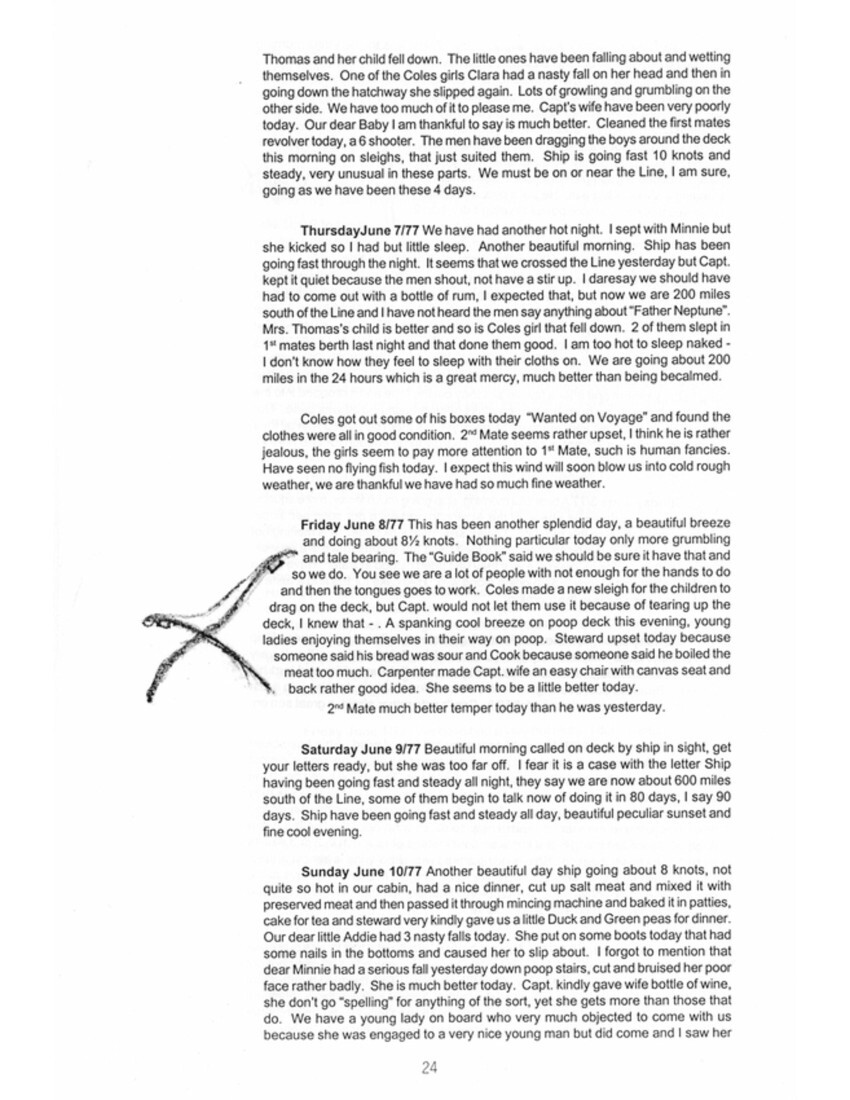
Page 25
take a most affectionate farewell of him in the W.I. Docks yet I noticed last night that in this short time she has fallen, what I should call desperately in love with a man who was a total stranger to her then, it is quite time her father asked the gentleman “what are your intentions?”. A beautiful flying fish came up on poop this evening and Mr. Taylor 2nd Mate will preserve it for Martha, a peculiar cloud in the night sky like a serpent – but soon passed away.
Monday June 11/77 A beautiful shower this morning. A very smooth sea, the smoothest we have seen yet. Altered a chest for the Capt. Boys done a nice lot of washing, all hands on deck this evening to see the beautiful sunset it was most splendid, the clouds formed all sorts of shapes, you would think that you were looking on land. We could make out Portchester Castle, Southsea Castle, St. Pauls London and all sorts of places and animals. The sea being so smooth of course there was no wind and our good ship was only going about 2 knots.
Tuesday June 12/77 It seems the rules that after calm comes a storm, we have much wind today with a head sea ship pitching rather heavy, our people rather queer such a rush and shouting at noon, one or two of the top gallant back stays broke and if men had not been sharp to lower the sail they say it would have broke the mast. Capt. has been fitting up stove in the saloon and from what I see I think it is goodbye for the present, to fine weather – all hands called in poop about noon to see Homeward bound Brig, she was a beautiful vessel and come so close that our dear Baby could see her and seemed to wonder what it was. We exchanged signals with her and she was soon out of sight as she had a fair wind. 2nd Mate has given me a set of flying fish wings which I hope to preserve – I was hurt tonight to see that our dear Addie was afraid of the weather and to hear her little tongue say Mama I want to go back home, why did you bring us here.
Wednesday June 13/77 The wind has gone down and we have had a quiet night, we could just bear a part of one sheet over us so you must think how we should all have looked the past fortnight if a “Blue Eye” has been turned on us about mid-night, you would have seen the children laying all sorts of ways some with their heads where their feet ought to be and some across the bed, some on stools, tables, under boats on the Bridge on deck, but now it is getting cooler we are in better order. Not much wind today, but a heavy swell. Ship seems to rise and fall at the bow about 30 ft but we are getting used to that. All hands on poop to see homeward bound American 3 mast schooner. She came so close that they spoke to our Capt. and he to them they asked us what our longitude was. Capt. gave them 34-20 and asked them to report us well, so that if our dear ones are looking at the papers they will hear of us in about 3 weeks. Her name was the “James M Riley” of New York. Another beautiful sunset, such beautiful colours. Not so much swell and ship going faster.
Thursday June 14/77 Beautiful morning, nice cool breeze. One of Coles girls Clara very poorly from the fall she had the other day. I am doing best I can for her. It makes us anxious having no doctor on board. Have had another Barque in sight today, expect to pass her in the night. She seems to be going the same way as we are. Have begun a little job for the 2nd Mate. Our dear Baby is much better but have not quite lost her cough, the dear little thing, everyone loves her on board. We call her the Ship’s Baby, she is so good, she will go to any of the men if they will only take her, for a walk. The Capt’s wife has given her along walk tonight. We have a nice wind tonight and more fair, ship going about 8 knots, steering S. by E.
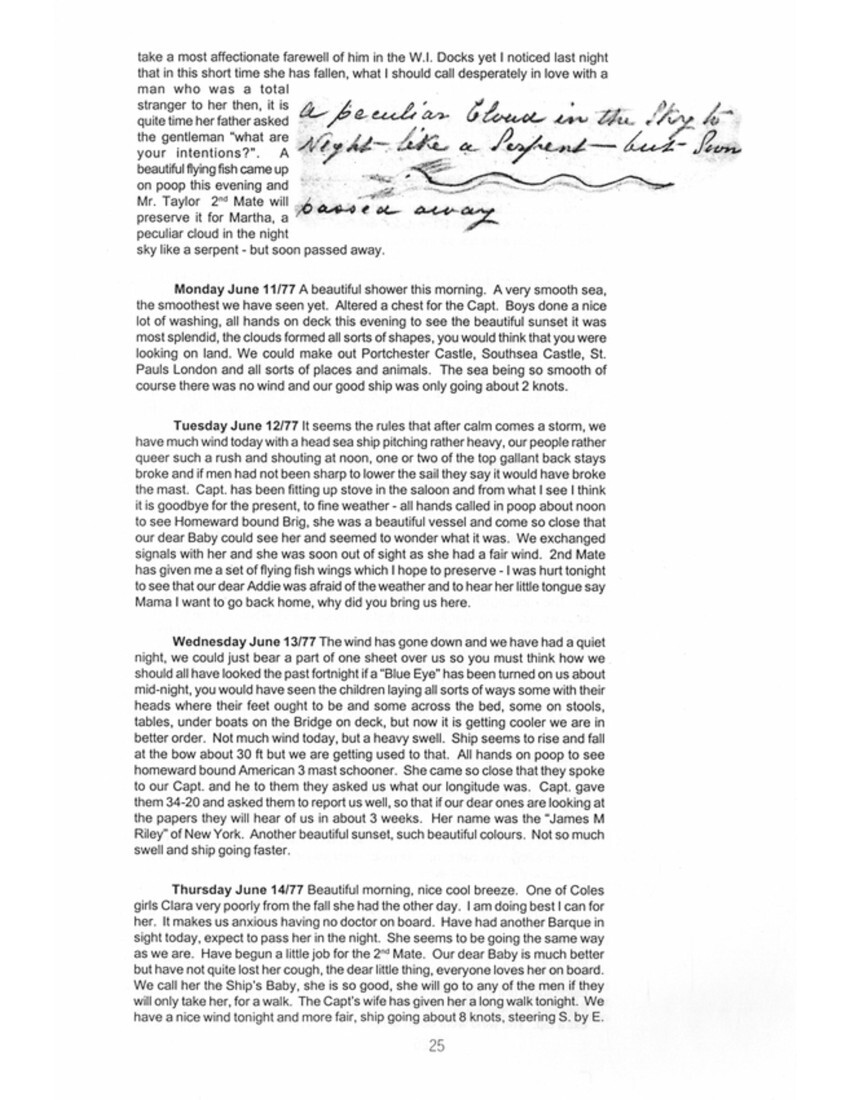
Page 26
The Capt. has just given me a nice cigar and I have enjoyed a long chat with him about 1.0. Wight. It seems he was there about 5 years ago, I suppose his honeymoon.
Friday June 15/77 A fine morning but heavy swell, ship rolling much and not going ahead much. Finished the shelf to hold the 2.4 Mates sextant. Clara Coles much better, gave her aconite and boyonia which did her good. Saw a curious meteor in the sky tonight it was about size of your fist like a small moon and then bursted and left a cloud of smoke. It is a splendid moonlight night but from what I see and hear I don’t think we shall enjoy ourselves on deck much more. I think we shall soon have some rough weather in fact while I am writing this the ship rolls so much that I have a job to do it.
Saturday June 16/77 Ship have been rolling very much all night and as I sleep outside now I was afraid I should come over and fall about 5 feet, no wind only a great swell, don’t think ship have done 100 miles these 2 days. I am sorry to say that Master Jack and George had a set to today over a trifle, but 2 tempers soon made something of it and I had to have a set 3. Children have to be below now at 6 and the girls off the poop at 8, they don’t like that. Saw another meteor tonight, just like the one last night. A beautiful moon light night. First Mate says we are well out of the tropics, it is a little cooler but can only bear one sheet on at nights. Saw a fine ship today, “The Auckland” from W. coast America going home. She will report us all well.
Sunday June 17/77 Our Willie has been very poorly today. I think a cold from change in weather. Wind much stronger, ship going faster. Had singing and reading in our cabin tonight.
Monday June 18/77 Ship have been rolling heavy all night. Wind has increased to a gale our things have been flying about from one side to tother, they say it is as bad as we had it in the bay. They have carried away 3 sails, mainsail, royal and top gallant sail, none of us is sick, but we have had enough to do to hold on. The shouting of the 2nd Mate and the men seemed to us something awful. The seas were dashing over the ship, first the bows, then the beam, then the quarter, knocking men down in all directions, who would be a sailor. They battened us down, yet the water found its way to us. Our young Martha is very poorly, she caught a cold on the poop last night. She has had a pain in her side and feverish, now I must doctor her. Our children have all been looking so well. I hope this rough weather won’t put them back. Old Clara has had a rough day of it, she had some nasty knocks. She has just been sent from our side (where she was talking to us) flying, chair and all to her side, which have made her rather poorly. We are all most careful about her, yet she is the unfortunate, I shall be glad when we get her on shore. It is a great mercy that none of the little ones have been injured today, but they have seemed to get on all along better than the big ones. It has got suddenly colder, we shall soon want more sheets to cover us at night, no sleeping on the deck now, the cold have “run them in”. It is curious to see the little ones in their bunks fast asleep but rolling from one side to “tother’. They all jump up frightened when the ship gives an extra dip. The ship is now labouring they say more than she did in the Bay. We can’t hope for much rest tonight First Mate says ship has gone about 200 miles these 2 days.
Tuesday June 19/77 We have had a sight of it, the ship have been lashed by the waves from “fore to aft” first one side then tother, just as I was going to sleep she took an awful dip to “leeward” and I thought we should have been all cleared out of our berth, as it was, the contents of one shelf went flying out of our door which we have kept open the hot weather, over to Coles door, I jumped out of bed and tried to catch some of it flying. After that we had a little sleep. The wife sleeps much better than I do, sometimes she jumps up and catches hold of me when the ship gives a extra dip. The wind went down a little and the singing of the men when hoisting
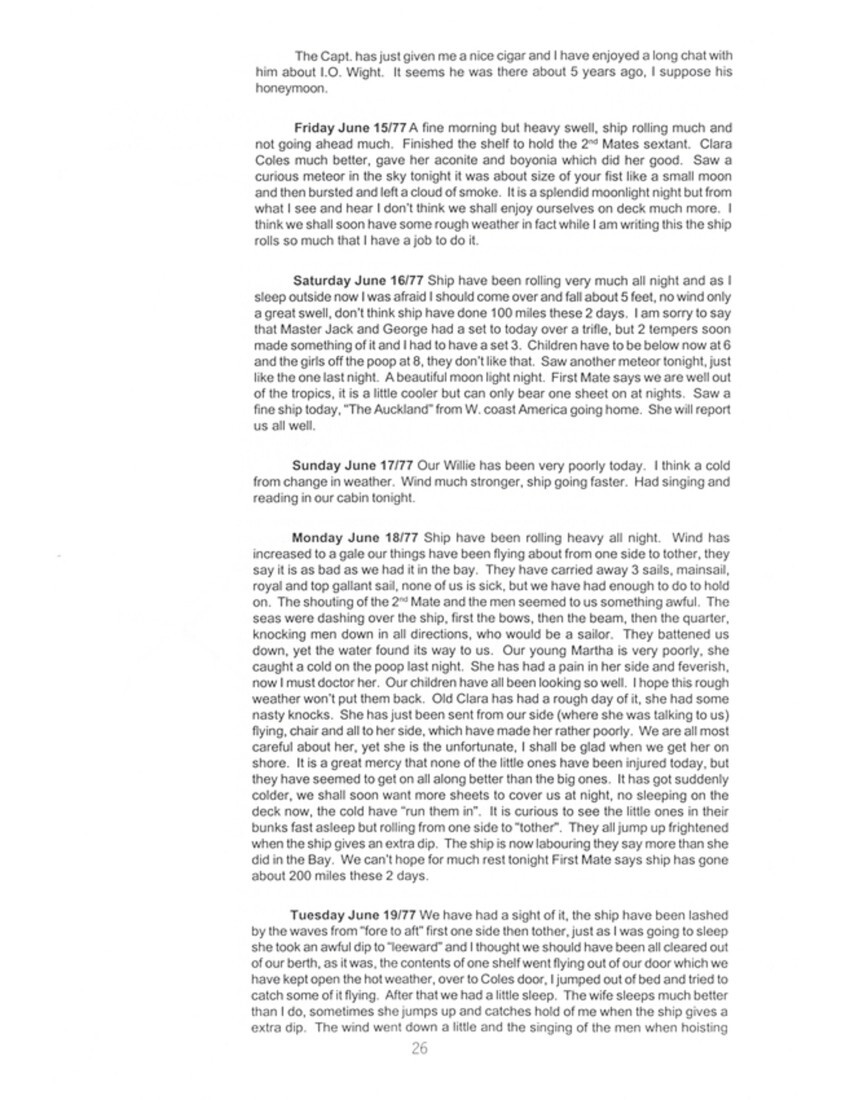
Page 27
more sail, sounds better than when it is “all hands shorten sail”. The ship have been much quieter all day and all hands have been able to go on deck to get a little fresh air. The men have been bending on new sails and the wind have been changing about so that they have been “Tacking Ship” rather often. She has not been doing much today because they could not keep her on course. I think she is on a better tack now. She is rolling, yet it is beautiful to what it was this time last evening. Martha is just a littler better, she has had a mustard plaster on her side. I hope she will have a better night and be able to get on deck tomorrow. The weather is just now about as cold as when we left England.
Wednesday June 20/77 We have had a very quiet night and all have had a good nights rest – called on poop this morning 6.30 to see a Southern sunrise. I have seen many beautiful sunsets lately, such as I have never seen before, but not to equal this sunrise. How I wish I could describe it as some could. What a picture it would have made yet I think it would have looked too wonderful on canvas to have been believed. The sun was rising behind some very heavy dark black clouds, which after a little while rose from the horizon like a curtain and showed the scene underneath which was something wonderful. You could see ships on fire and burn to the water edge, citys catch fire and all the principal high buildings fall one after the other and then other large town catch fire and so on for miles along the horizon, sometimes you could see fortifications like those round forts at “Spit Head” England take fire and burn and then where there were holes in the black clouds, rays of sun light would strike down like the smoke out of a horses nostrils, all together I thought that it as far excelled anything that man could produce as day light does darkness and was worth coming all this way to see it. I have never seen such sunset and sun rise in our dear old England. Then I saw the much talked of “Cape Pidgeons” for the first time, which shows that we are near the “Cape of Good Hope”. They are beautiful creatures about the size of our pidgeons with black heads and legs and they seem to move through the air so easy without using their wings their large wings are beautifully marked just like a butterfly, they are very tame and come quite close to the stern of the ship. The children were delighted to see me feed them by throwing pieces of pork into the water which they would be sure to see as they keep crossing the wake of the ship. I could have easily caught some with a line a piece of pork and a pin, but the Capt. has given orders that none are to be caught, I don’t know his reason, but they say that he believes that it would bring bad weather. Martha is better and have been on poop a little. The men have been bending more new sails, but the ship has been doing nothing. We have had a beautiful sunset and now we have a beautiful quiet moonlight night, walking on deck with wife as steady as walking on “Southsea Pier”. The weather today has been beautifully cool just like a fine English October day.
Thursday June 21/77 We have had a quiet night but some of us have had some bad dreams. The ship have been tacked many times through the night but have not done much good, a dull morning with head wind, not in the right course to be any good. First mate has just told me that we have had a very narrow escape, having had 2 whirlwinds pass us, one on our starboard and one on portside. The one on the portside only cleared us by about 100 yards, he said that if they had struck us they might have carried away our masts ,so that is another mercy. Martha is very much better today and now I am thankful to say that all hands are nicely, they caught a little fish that is called a Naughtiles, but which the sailors call a Portuguese Man of War, when they are in the water they put up a large fin of their backs about 4 in. square and the shape of a sail and they look very pretty as they sail along.
I shall try and preserve this one if I can get it. The ship has been doing nothing good all day till this evening now we have a good breeze. They have just set the Royals and she is nearly in her right course. We have had another beautiful sunset and now we have a beautiful moonlight night. This is the longest day in old England but here the sun sets about 5. Seven weeks today we left all our dear ones and old England perhaps for ever and we know that they are thinking about us
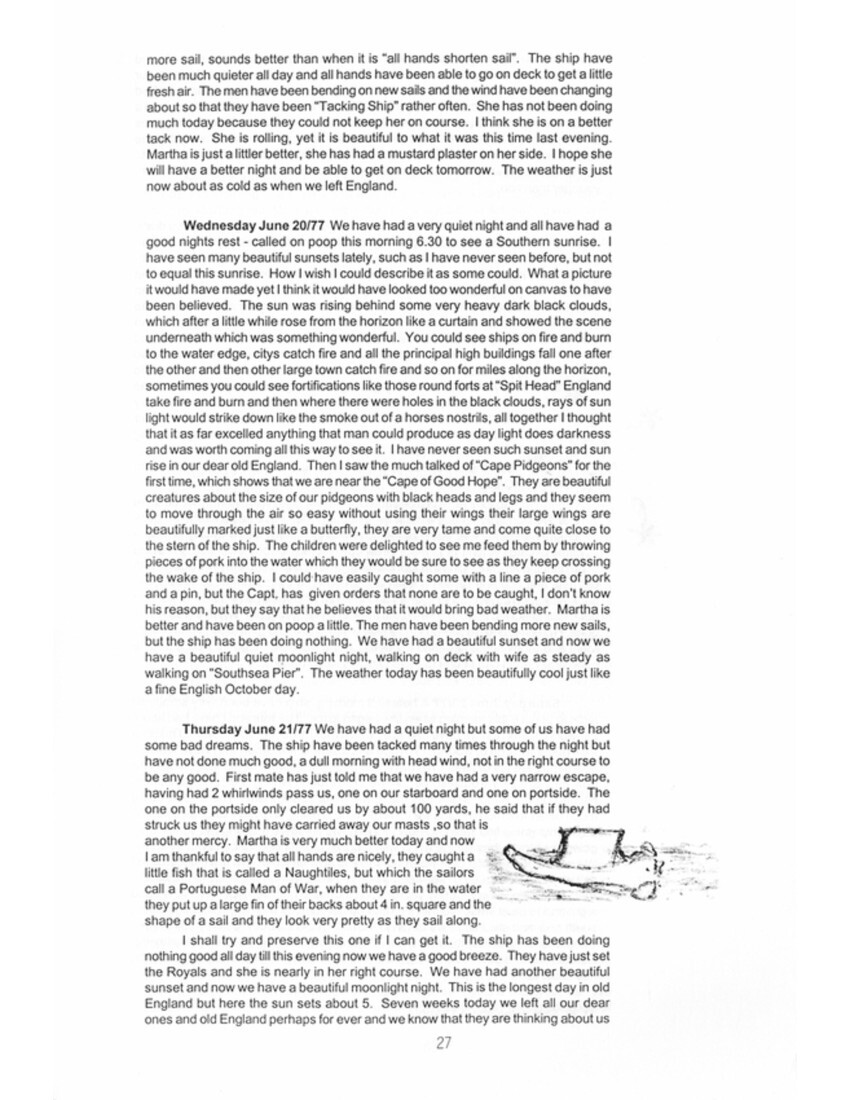
Page 28
this day and wondering where we are, oh that they only knew that we are safe and that while I am writing this in our berth our young people are just outside in our cabin enjoying themselves with 1st and 3rd Mates playing a game called “Consequences” and these dear children Alfie, Minnie, Addie and Kathleen are in a beautiful sleep close to me, while Mama, John and 2nd Mate are enjoying themselves on the poop, we hope to have a quiet night as this ship is now very steady but the carpenter thinks the wind will rise before morning. I have persuaded Uncle Coles to let his beard grow. I don’t want when we get to N.Z. for him to look 10 years younger than I do.
Friday June 22/77 We have had a very quiet night. Ship has not been doing much, a little breeze this morning but too much ahead to be much good, have had a few words with the Cook this morning, he is a Black man and can be either very good or very nasty, it seems that some of our boys have upset him and he won’t let them into the galley, but will let any of the party in, so that now the Capt. have given orders that no one is to be in the galley. I have been making a frame for one of the sailors to make a wool mat on. They are very handy at their needles. Some can work in wool, some are tailors and some are shoemakers. The wind has fallen and the ship hardly moves through the water. It has been a most splendid day just such weather as I seem to remember we used to have in England in the Autumn some 30 years ago. A bright, clear cool day, but the climate like many other things have so changed there that they sometimes now have winter weather in summer and summer weather in winter. The Capt. says that yesterday was the first day of spring in this latitude (of the Cape). We have lost sight of the North Star and the Great Bear, perhaps for ever? But we have the “Southern Cross” to look at. It is a beautiful moonlight night and the water is so quiet that the ship is as steady almost as “Southern Pier”. We had a scene on deck tonight. It seems that some of the boys and girls were below quietly having a game of cards when the 1st Mate threw down some rice and then quietly walking up on the poop. The girls thought it was 2nd and 3rd Mate and they filled bags with oatmeal and rice and came on deck and smothered them from head to feet, the deck was soon covered with it, and I and the wife who were having a quiet walk on deck had to stay in the bows while the thick of it was going on. When it was a little quiet, I took a broom to sweep it up a little when one of the girls took me for the 2nd Mate and threw some right into my eyes. For a moment I thought I should have gone crazy and I can’t hope to have to much sleep tonight.
Saturday June 23/77 A beautiful morning, ship have been very steady all night till about 6 this morning when she began to roll. The wife and I have had about the worst nights rest we have had at all which makes us feel very queer. This ship took home a cargo of wool last voyage and it seems that when they have wool on board they are full of fleas. We have seen nothing of them till the last 2 days and now they are very troublesome. While I have been writing this, one gentleman pitched on my hand, which has made me think about them. The ship is doing much better this morning and we think the wind is rising. We have another splendid day. Ship going first rate and now this evening we have a strong fair wind. Ship going like steam through the water with foam all round her – speed about 11 knots. We are still in beautiful blue water but there is no smell to it. We have not smelled salt water or seen a bit of seaweed since we were last on our dear old Southern Pier. The ship is very steady yet for such a breeze and we hope to have a good night and to be at least 100 miles further on our road by morning. We are steering south now and shall do till we begin to “run down the Eastern” as they call it when we make our course then to N.Z. 1st mate boys and girls are now playing” Consequence” again in our dining room. All hands are well except Willie Coles who has tooth ache –
11.30 Ship doing about 13 knots.
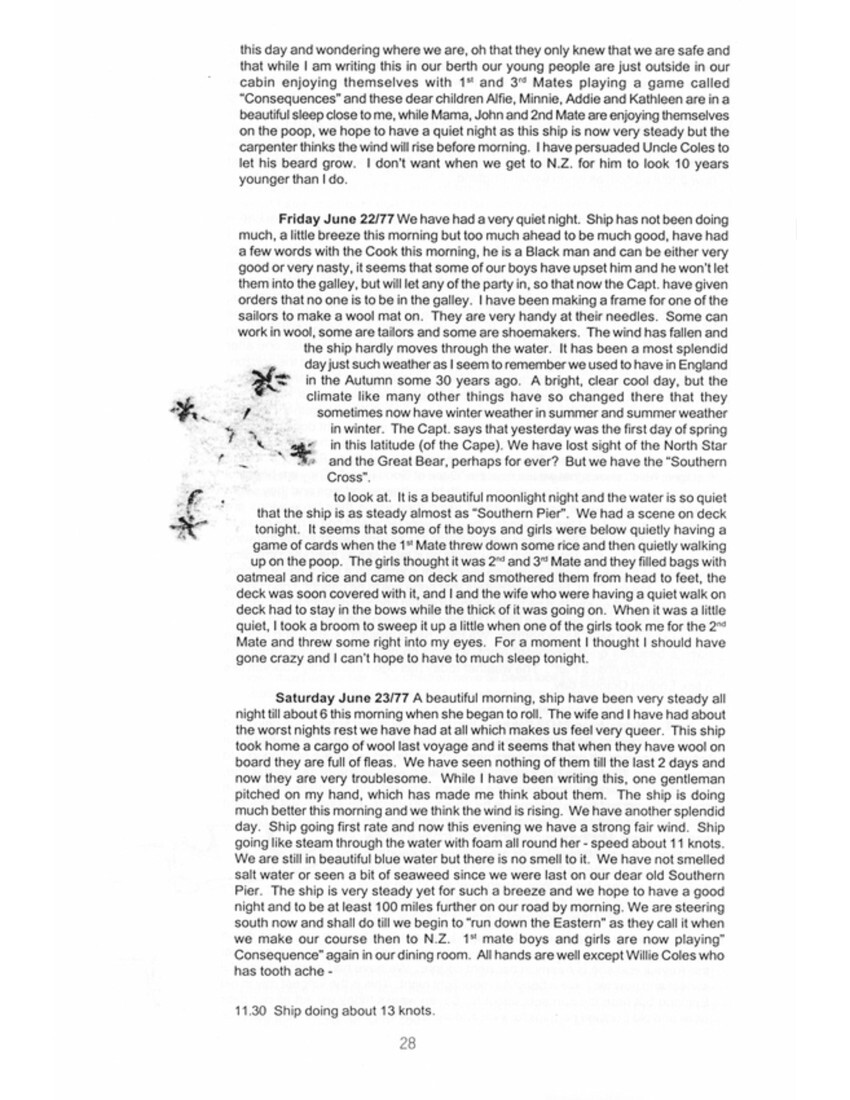
Page 29
Sunday June 24/77 Ship has been going fast all night. Wind has increased to 1/2 gale, not safe to go on deck. Some of our party are rather sick, wife, young Martha and Harry. Mrs. Thomas is ill again. I can’t make her case out. She don’t eat enough to keep a sparrow alive. She ought not to have come without a Doctor. We are getting well on our journey at this rate, and I begin to think now what we shall do at the other end. I trust we may find early employment.
Monday June 25/77 Ship has been rolling all night. Wind not quite as strong this morning and we are just able to go on deck a little. Began to make a case for Martha’s fish Mr. Taylor gave her, it is all a job to do dovetailing work while the ship is rolling so. The Capt. have had a row with the steward. It seems he have lost some of his “extract of meat” and he thought that the steward had given it to some of our party who are not now so much in his favour as they were, but he was wrong there. I know a party in the ship who watches the steward and when his back is turned they slip into his pantry and help themselves and it seems they have a weakness for “extract” as it is. The Capt. don’t know this and so the poor steward caught it. We had just used our last bit of washing soap but Mr. French the 3rd Mate came to the rescue and kindly gave us a bar. Our dear Addie turned in with the 2nd Mate in his watch below and remained in his cabin 2 hours, which we thought was a very long time for her to stay in one place. Ship have been going well all day and now we have a moonlight night. Took wife on the poop, but ship rolled so much, she was obliged to shut her eyes, afraid to look at it. Young Martha is in Saloon with Capt’s wife, which shows she has not lost her character. I should be glad to see all the girls in there these long evenings and so they might be.
Tuesday June 26/77 The wind has dropped a little and the ship has been steadier through the night. Sometimes for 20 mins. she was as steady as a house and then would begin to roll again. They tell me that much of that depends on the man at the “wheel” but much of the rolling is from being loaded with R.W Iron. I should advise anyone not to come in a ship loaded with iron. We have been able to get the children on deck a little today altho’ we had to hold on or be sent flying – Ship has had a fair wind and going fast, there has been a big sea on but this evening the sea has not got very quiet altho’ we have a fair wind and going fast. This morning I tried to finish the case I began yesterday, but as the carpenters bench is on the deck I was afraid of being washed away. They say that we were off the Cape at 2 on Sunday and as we have been going very fast since then we must be a good bit to the south now. The girls and boys are just outside playing “Consequences” again. It seems to be a very funny game for they are roaring with laughter while I am writing this and I am afraid they will wake up these dear children. Willie is playing cards with the Capt. and his wife and Clara is sitting up in front of saloon to get an airing. I forgot to mention that Master George dressed up in one of the girls clothes last evening and made fun all over the ship. We have seen some very large birds today flying among the Cape Pidgeons. They are as big as a goose with very large wings, some call then cape Hens and some call them Molly Hawks? Thankful today all are well except poor Mrs. Thomas, but I hope the medicine I have given her will make her better by the morning. Ship steady and we hope to have a good night.
Wednesday June 27/77 I forgot to mention that one of the ship boys caught a very large flying fish on Sunday morning. He sold it to the 2nd Mate who is preserving it. I wish I had been in time to have bought it. It flew on to the deck and some of the old sailors say that they have seldom seen one caught so far South or one so large. It measured 24 inches across the wings and is 18 inches long. They preserve it by putting it in pickle for a few hours, clean out the inside and fill it with tobacco and when dry varnish it all over. We have had a quiet night and the ship has been doing well, they think now that 30 days more and we shall reach Auckland (if all goes well). It has been a dull day but fine so that the children have been able to be on deck all day, it has not been so cold as they expected we should have it here, in fact it seems all better than they expected, so that is a mercy for us. We have had a good fair breeze today and the men have been busy taking coals out of
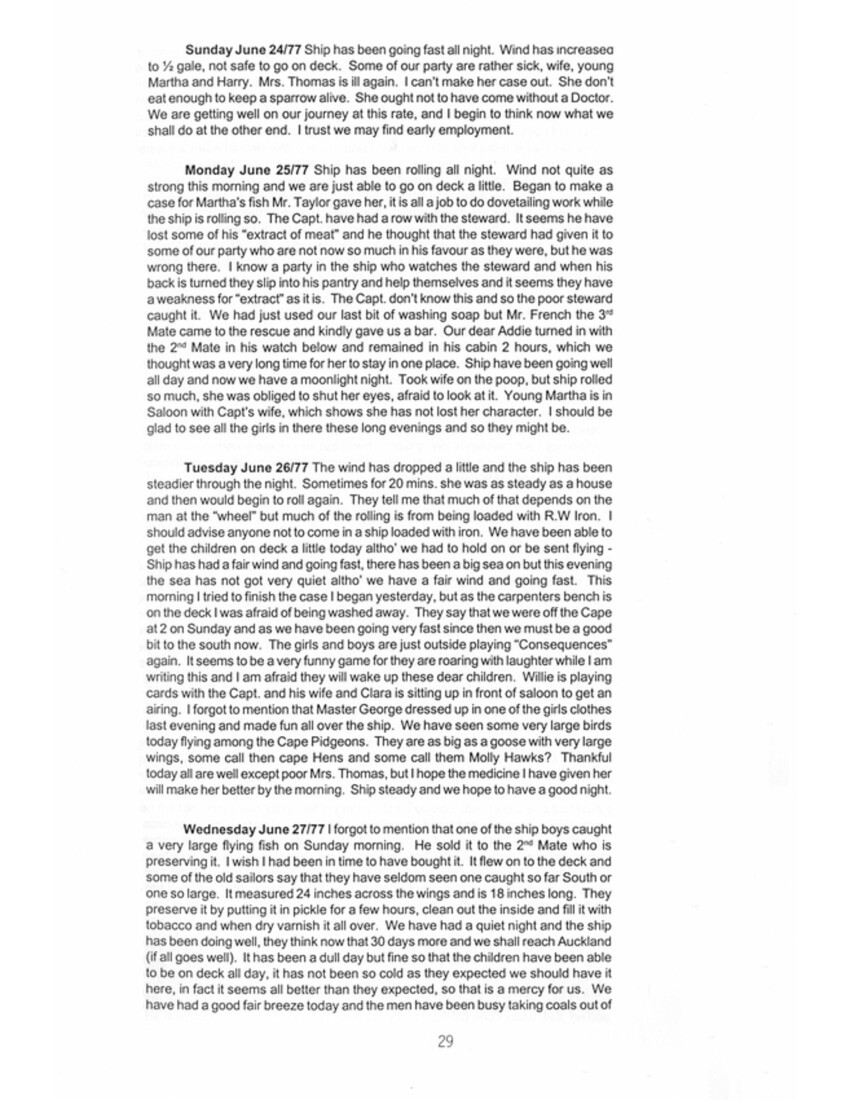
Page 30
the “forehold” and tomorrow if it is fine they will take out some of the Cargo under us to put where they took the coals from as the ship is now too much down at the stern. The Capt. won’t let us catch the Cape Pidgeons because he says it is cruel but I noticed today that he and his wife were on the poop trying to catch some. At first they had it all to themselves but as soon as the children got scent of it he had plenty of company. I thought it was something like “Don’t do as I do, but do as I tell you” but that is a doctrine children can’t understand. We had a beautiful sunset this evening about 4.30 and now we have a beautiful moonlight night our dining room is full of people, Mates Steward etc. playing games. The children are in their “bunks” before me, Alfie and Minnie are asleep but young Addie can’t get off and she has been telling me that Adam and Eve were two wicked men and other matters all the time I have been writing this. The ship is going well and steady and we hope to have a good night. Mrs. Thomas is much better, the medicine I gave her did her much good, she was able to get up on the poop today for a little while, that is the 3rd bad case I have cured.
9.30 Willie and Martha are in the saloon playing cards with the Capt. There has been a noise outside they have been playing a game called Farm Yard Mimics, they have had the cow, duck, donkey etc. etc. one of the boys so well mimic’d the cock, that he set the cock crowing in the fowl house on deck. I have left the wife and Clara on the deck taking their airing and I have just had as nice a piece of pork as I have had for many a day. We could hardly look at the salt meat in the warm weather but now we can do something more than look at it. Edward Coles has been able to do his bit all the way. I find he has a remarkable take away. It is still a fine night but the ship is rolling rather much, but we are more used to it. I notice that dear Addie has gone off just where she was taling to me, all along the pillow over the heads of Minnie and Alfie –
Thursday June 28/77 We have had a nice quiet night. There is a heavy fog in the distance and as it reaches the water you can see the swell rise and fall like young mountains so that we don’t wonder that the ship rolls passing over them. It is a dull quiet morning and the ship is not doing much. The boys have caught a large bird this morning and for some time of course bird was all the go. A good breeze have sprung up and the ship is going fast. This is the 28th of June we have been eight weeks at sea and this day brings sad memories of Rowlands Castle and Portchester Castle and dear old Crimble and Jackson. We know our dear ones are thinking of us today. We wonder where they will spend their afternoon? We hope they have a fine day and that strawberries are 6d. per quart, we would give 5/- just now. Last 28th June we were taking stock “Marmion Place”. This year we are on the wide ocean, thousands of miles from our dear home and all we love. Where shall we be next year? We have a still better breeze this evening our good ship is “booming” along 11 1/2 knots. Our young people are just outside making a fine row, worse than last night so much so that these dear children can’t sleep. Young Minnie and Alfie are looking at me writing this and listening to the party playing “Fish and family Coach” two noisy games. Dear Addie has run about so much today that she has gone off. Our dear little Kitty was as fresh as a daisy just now but I find she is gone off. She do much better yet her nasty cough has not left her yet. She is such a dear little creature and all hands are very fond of her because she has a smile for them all. The ship is still going very fast and very steady and we hope to have a good night. There is hardly a day but someone of the party slip down these stairs. They are so upright that if you come down the usual way and don’t turn round you will be almost sure to slip. It is a mercy that no bones have been broken.
Friday June 29/77 Someone predicted that we should have a storm last night, but we have not, we have had a very quiet night and the ship has been going fast. She began to roll rather much after breakfast and have been rolling all day but doing her 9 & 10 knots – . It is a little change to have a little company following us now everyday. We have a dozen or two fine birds always over the stern. It pleases
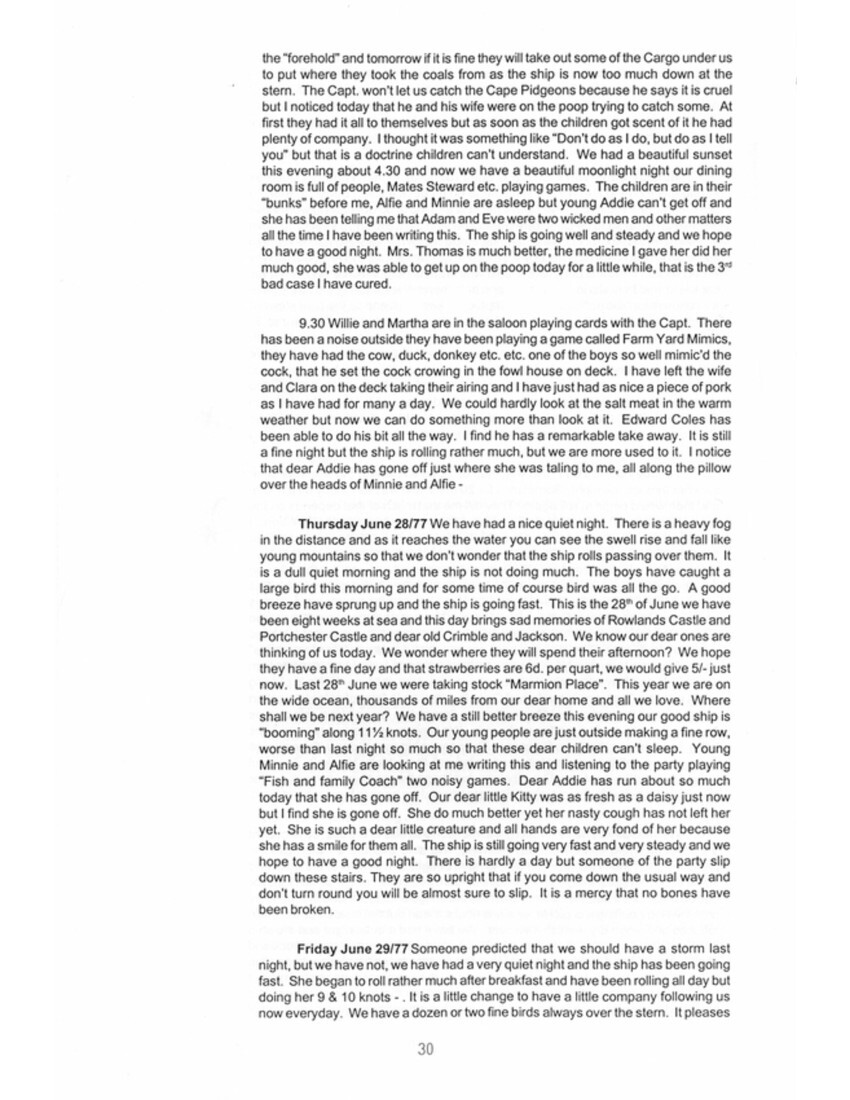
Page 31
the children to feed them. We have passed 2 ships these last 2 nights and have seen them “astern” in the morning. We have been called up on the poop to see a ship on our portside, she is not far off but the night is so dark that we can only just see her. I don’t know if we have passed her or if she is passing us. The 1st Mate has been down this evening dressed as a Lady with Master George as her husband, you may depend there was a row then. It was just as I was having my supper but it did not spoil it. I think the noise made me eat. I am almost ashamed to say that I had onions and tripe, then Pork and bread and rice pudding. As I had some very bad dreams last night on a very light supper, I am almost afraid to go to bed tonight. They are playing a quieter game outside this evening, yet is noisy enough to keep some of these children awake. Dear Addie has just asked her Mother “Shan’t we ever go back again because I didn’t wish anybody goodbye? If when we get to N.Z, and it is a nasty place, won’t you come back again then?” It makes us sad to hear her dear tongue. She has got as fat as a little porker and gets all over the ship better than we can. Yesterday I heard her ask someone for a piece of “spun yarn” – . I thought that was rather shippy. Young Alfie is always making ships. There is one just over his head now, full rigged ready for the morning. Minnie glides about more on the quiet, yet she is looking well and enjoys herself in her own way. The ship is not rolling so much just now yet she is going fast and we hope to have a good night.
Saturday June 30/77 We have had a good steady night. Ship has been going very fast all night. This is a bright cool morning with good stiff breeze over our “after quarts”, a wind that suits this ship well. It has been a most remarkable day. I have never seen such a big sea or the ship going faster yet she has been as steady as a church. If she pitches we don’t mind it so much but when she rolls we have to “hold on by our eyebrows”. We had a most exciting scene today. Early this morning we could see a fine ship coming up on our “starboard quarter”, as she got nearer our Capt. thought it must be his old ship the “Michael Angelo” and as she got nearer it proved to be so, we thought it a most singular thing that we should fall in with a ship here that sailed on the Tuesday before us and belonging to the same owners. She is a much larger ship than this and carries more sail and is considered the smartest ship that sails out of London. It seems our Capt. was first Mate and our first mate, 2nd Mate in her on her voyage to N.Z. and that when she got there her Capt. died and our Capt. had to bring her home and was promoted to Capt. and the 2nd Mate to first mate, so that they have good reason to remember her and were delighted to see their old ship. All hands on poop you may be sure and it was a nice change for us and no one knows the feeling but those who have been at sea for weeks and then have a fine ship and a relation come within 500 yds. of you. We exchanged the usual signals and waving of handkerchiefs and hats and then altho’ we were doing 12 knots this fine ship walked away from us. There was a fine row tonight, more than I like after the children are gone to bed. 2nd mate and master George dressed as niggers and so disguised that our people would not have known 2nd Mate if he had spoken. There was a fine row for an hour and it seemed to please some of them much, but “not for Joseph”. Ship going fast, steady.
Sunday July 1/77 Fine morning with a fine breeze. Ship going well and steady. I am thankful to any that all hands are well. I don’t remember ever being better than I am this day. Back in the hot weather I felt very poorly as did also the rest, but we all felt better last week and have improved by it much. I find this morning that there is not so much spare room in my trousers as there was in the tropics. The children have looked well all along but I notice this morning that I never saw them look so well. If young Alfie and some of them goes on improving they must bust. Our people are just beginning to relish their food and I remember now what Mr. Smith, King’s Road, Southsea told me. He said “you will find your people at first turn up their noses at some of the food but towards the end of the voyage they will eat the stools and tables!” We used to eat about half our store but this morning we were quite cleared out and it was a good job that the steward came to the rescue. This is the stewards birthday. He says that he is 34 but he looks older. He is a fine tall man. He was dressed early this morning and looked well, he has
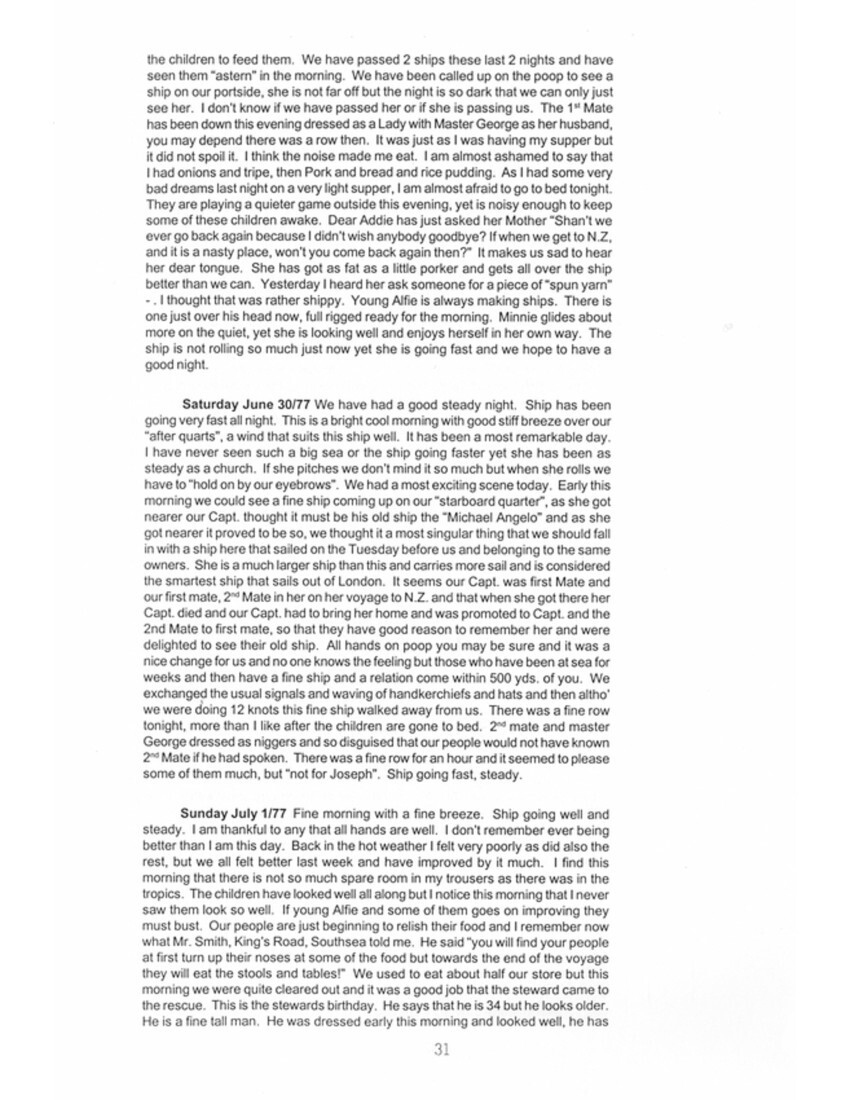
Page 32
fine curly hair and being a Creole it is almost wool. We had a service of song in the midshipmans House on deck, but as the “Watch” wanted to go to bed in the forecastle at 8 p.m. were obliged to adjourn to our cabin and there we sang away. Our people, midshipmen, steward, cook and carpenter till 4 bells (10 p.m.). I noticed how fond these ship people are of Sanky and Moody’s hymns on a Sunday altho’ some of their language on week days is not fit for polite ears to hear. We have had a strong breeze all day. Ship going about 12 knots and very steady and we hope to have another good night.
Monday July 2nd/77 We have had a good night. There is enough wind to press the ship over on one side and keep her there. She has been going fast all night but not quite so fast this morning yet she is doing 9 knots. That is a good speed for a ship so deeply laden as we are. This is Edward Coles birthday. I won’t say how old he is because I am 12 months older. I noticed he is in capital temper today and with his new beard about 1/2 inch long he looks like a Jew in mourning for his mother. I find now that this has been a very merciful voyage for us. All these people say that they never knew such fine weather in this1/2 of the world before. Now at 4 p.m. we have strong wind, yet a very smooth sea and the ship doing her 12 knots and very steady. I noticed at noon by the movements of the Capt. on the poop that he was expecting a storm but I am thankful to say it has not come yet. All the “watch” were aloft repairing rigging but I heard the Mate order them down and to “lay off’ and then I noticed that they put the ropes in order to shorten sail if required. They did “reef the spanker” and I heard the men say “the birds are flying high, we shall have something presently” and I noticed that they certainly were flying higher than I had seen them before and the Capt. told me this afternoon that when the birds fly high it is almost always a sign of a storm. I noticed this evening that they (The Cape Pidgeons and Molly Hawkes) were not flying near so high and so I hope we have escaped the storm. We have just enough wind for all sails set and the good ship is going fine. Some of our party with 2nd Mate, steward and cook are playing cards and some are playing draughts. The game of cards is called “Old Maid” and causes much laughing, too much for the babies. I could do a 1/2 lb of pork now for supper but we eat it all for dinner so here’s in for some boiled rice, milk and sugar and we hope to have a good night.
Tuesday July 3/77 We have a beautiful steady night. This is a fine spring morning with smooth sea but a good breeze which makes it cool but not cold. They are surprised again today at having such weather just here. They took away our stairs and took off the hatch this morning and took out some cargo to go down the fore hatch to “trim the ship”. I was glad to have something to do so helped the men “pull away boys” all the morning. There was a little more wind at noon. They squared the yards a little as the wind got more “aft” and then you could see the ship improve her speed. I noticed that the birds that followed us today were mostly large ones as big as geese. One gentleman was as big as a swan but he did not remain with us long. I suppose we were not worth his notice. The boys tried to catch some this morning but they were too deep for them. Some of them were so strong that they carried away bait, line, and all and could be seen flying about with a piece of line hanging out of their mouths. It seems that last Friday we were in the same latitude as London and so our times was the same, but then where they are enjoying their longest day we are having shortest. The 1st Mate has just told us that he expects we shall get to Auckland in about another 30 days which will make it about a 90 days passage which is considered good. I noticed that they were preparing for rough weather today. They don’t expect to have much more of this fine weather. There is a little more wind and a little more sea tonight but nothing uncomfortable. The ship has been doing about 8 knots all day but I can hear now in our berth by the water rushing past outside that she is going faster now. She is pitching a little tonight but that is not near so bad as rolling. Ship in sight on our starboard bow this afternoon. We hope to have a good night and see her better in the morning.
Wednesday July 4/77 We had a good night till about this morning when
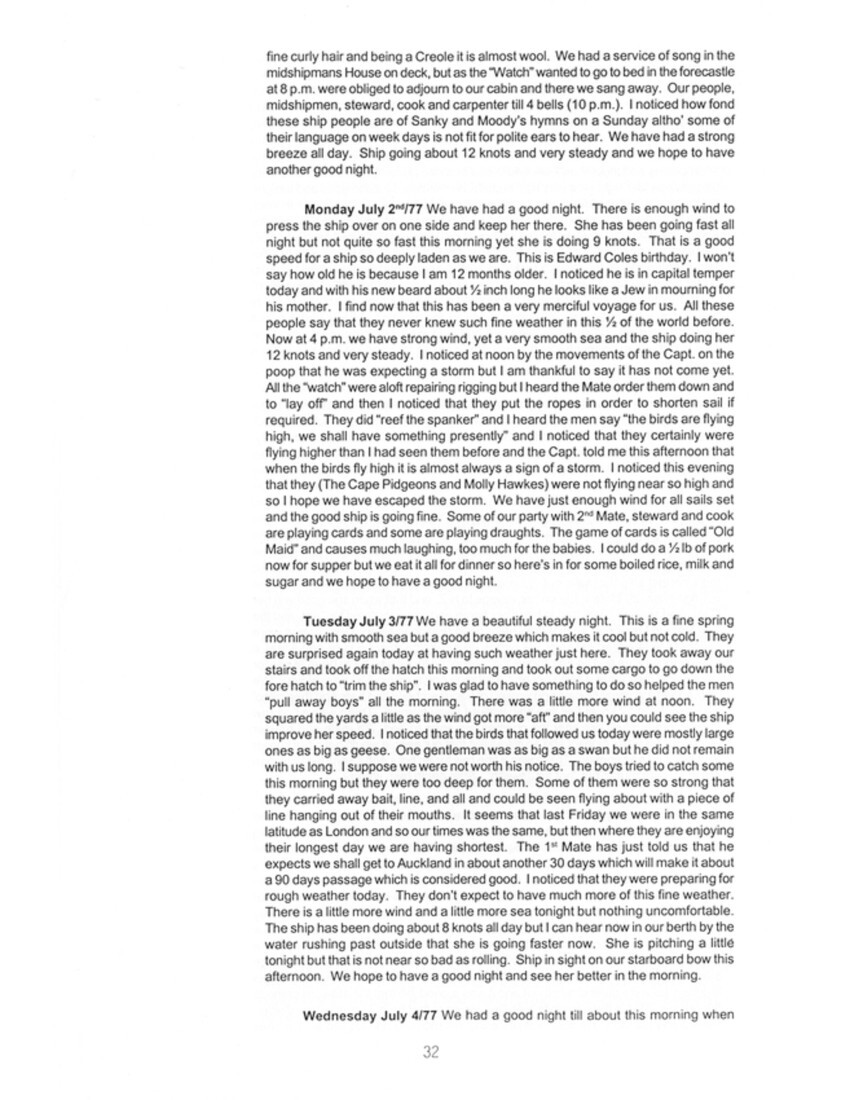
Page 33
they squared the yards which always makes the ship roll. There was a great swell came on and by breakfast time she rolled so much that we had a job to keep the things on the tables. We have found the rolling the worst things on the voyage but as it don’t average more than one day a week we are thankful. The greatest fun today was to see the big bird that swallowed the hook and line yesterday, flying about this morning with about 1/2 yard of line hanging out under its tail. This is a fact, but when the boys first came down and told me I would not believe it, but I have seen it many time today and so have all hands. The Capt. thought that the line looked longer this afternoon and so I think it did. It looked almost a yard long. I don’t know how long it will be tomorrow morning but if it gets a yard longer everyday day for a few days we hope to catch him yet as he often flies down close over the poop. We don’t care which end we catch him as long as we do catch him and so recover our hook and line. I suppose the piece of pork is gone by this time. If we do catch him? I should like to send Home an Illustration for “The London Clipper” Wonderful, Remarkable, and Humane? way of catching Molly Hawkes by passengers on board the Barque Columbus on voyage to N.Z. The boys almost caught another today. The line got round its wing but being a very strong bird, it broke the line being only crochet cotton. It was sometime before he could rise from the water as the cotton got all round its wings, but it is flying about now with our cotton hanging from its wings. We came up with the ship we saw last evening and to show what a swell there was, altho’ she was only about 3 miles off, sometimes we could see her from bottom to top and the next moment she could not be seen through the mountain of water that rose up between us and her. Later in the day we came up to within 1/2 a mile of her and found her to be the “Avoca” from Monte Video to the Mauritius 22 days out. She looked to be about 500 tons and seemed to be rolling and pitching more than we were. While our ship was rolling she was not doing more than 2 or 3 knots, but now the wind has changed more on our quarter. She is doing her 8 or 9 and is much steadier and we hope to have a good night. There was another little occurrence respecting something that was found in one of the berths wrap’d up in a piece of paper. Some of them called it an “Irish Pan Cake”. I wish it had been tobacco or sugar, but it was neither. I won’t further describe it or it will look as if we have had a dirty day.
Thursday July 5/77 We know that our Dear Friends will if possible think more of us every Thursday that we are away. We shall never forget that deadful Thursday, I shall never forget while I live, their retreating forms as I watched them out if sight from the deck of this ship. We have had another quiet night. I find this morning that we have a head wind and the ship is not doing much. Our Capt. is a Scotchman and he is never in first rate temper if the ship is not doing much. If she is only doing 2 knots he will only say good morning but if she is doing 9 knots and in her course he will say “good morning Mr. Cantle”. He is like a man I knew once that was in business. If he had a good days till he could sleep better than when he had a bad one. We have had a nice day, not much wind or sea. We have had lots of sport today with the birds again. The one I spoke about yesterday we have not seen today but we have caught two fine Albatroses. Our boys had been trying for a long time when the Capt. came up on the poop. He had the ship “brought to”, a little and then as she did not go so fast, with a good hook he brought up. He & George with the rest of us soon brought in 2 fine ones. The first one (a dark one) measures 10 feet across the wings and 3 feet from beak to tail only a very short tail like a duck. The 2nd one (a handsome white and grey one) was not quite so large but a very beautiful bird and the Capt. is having it stuffed by the 2nd Mate. You may be sure the children and in fact I must confess all hands were delighted to see the great things pulled on board. There was such a shout from the dear ones that you would have thought we had sighted land. The 2nd Mate skinned it and took the body to clean out and it was only about half as large again as a goose (diagram). Their feathers are so thick. This evening just as our children were having a dance while Willie was playing the concertina and young Louis the drum (an empty biscuit tin). The Capt’s wife’s brother dressed as a waiter with a white cloth over his shoulder
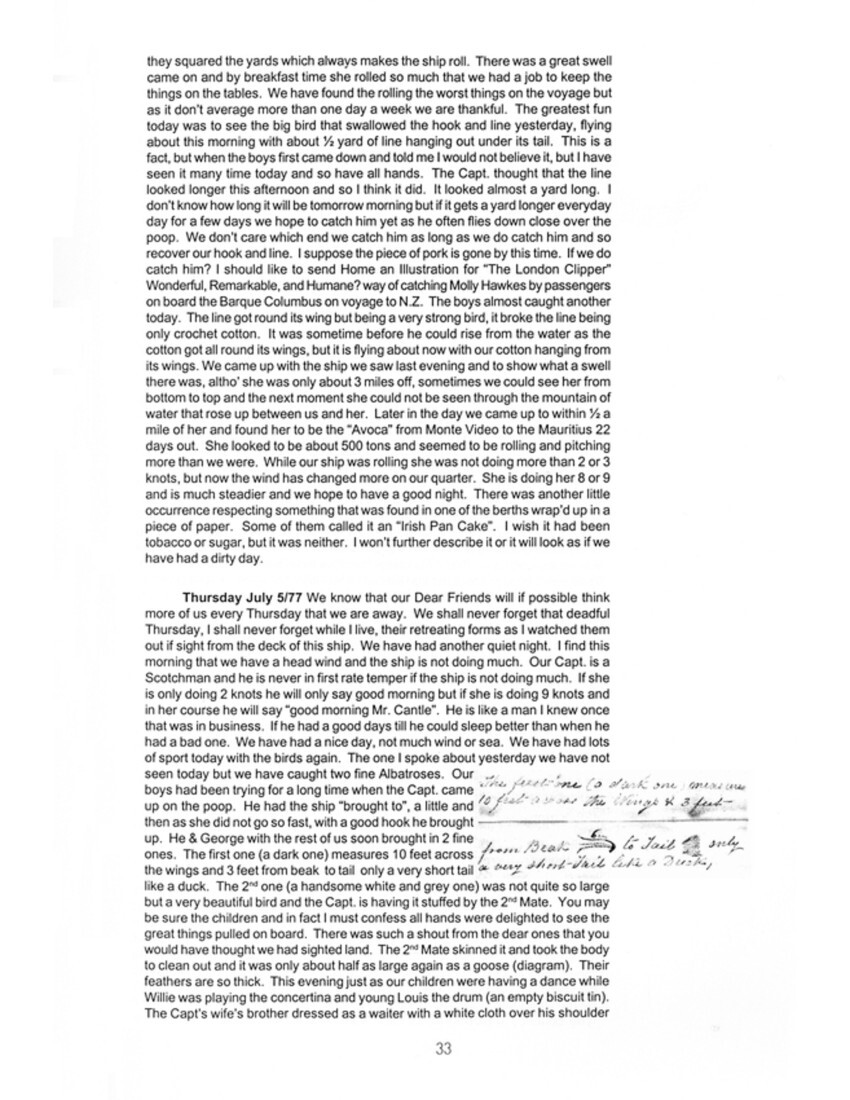
Page 34
brought down a large dish covered with a large dish cover and put it on the table, saying he had brought down something for our suppers. All were quiet a moment and looked straight at the dish, when he raised the cover, as you expect there was the Albatross covered with butter? (flour and water I think) ready to be carved. Then another shout from all hands you may be sure. He cut away at it just to please them but of course no one could eat Albatross, but such scenes make our dear ones happy for the time and will be something for them to think and talk about in our new home. After that the 2nd Mate with face black’d (he only wants a little black to make him look like a nigger) gave us hours entertainment and now all hands outside playing cards. I spent most evenings here in our berth and while these dear ones are sleeping I am doing my best to dot down the events of the day. The ship is not doing much tonight but the men told me that they expect a storm because we caught those birds today and they believe it, but I don’t. I see no signs of it yet and I hope we shall have a quiet night. This have been the coldest day we have had. I was glad to put on my Guernsey. I never wore one before but find it very comfortable as I wore it outside and had NS & FC on the breast in red letters it caused a laugh from all hands. The 1st mate ordered me aloft to “Reef the Spanka’” of course I went?
Friday July 6/77 We have had a very quiet night. The ship has not been going much with a head wind. We have had a quiet day. The 2nd mate has been cutting up the other bird to divide among us. The feet make good tobacco pouches, the skin is double and has to be divided very carefully and then these will hold 1 lb, of tobacco. (diagram) The Capt. has one and I have the other which I value very much. The children have been dressed in feathers today. Young Martha has made a nice cap for George, out of some old trousers from a pattern the 1st mate gave us. They look proper and she is to make us one each. The ship has been pitching a little, I tried to make a boot Jack but while I was sawing it out I was afraid of falling on my nose and so have left it till the ship is steadier. The most active fish we have seen is the porpoise. The 1st Mate says that they swim faster than any other fish. They shoot through the water and jump up 3 feet high and about 10 ft long so that you can see them to perfection. The other night there were hundreds of the big “black fish” round the ship. It seemed that the ship went right through a “school” of them. It has been very cold today but it don’t stop the little ones running about the ship. All hands are well and I think my children have improved as much in these 2 months as they would have done on shore in 2 years. I am afraid that when we get to N.Z. we shall find that they have all grown out of their best clothes. The ship is only doing about 5 knots but very steady and we hope to have a good night.
Saturday July 7/77 We have had a very quiet night but have had a very squally day. I intended to have finished my Boot Jack today but it had been taken from where I left it. You can’t leave things a moment or these men will have it. They are very much upset if they are suspected of taking anything yet they are not so particular about taking anything. The 2nd Mate says that these are a very select crew to what is usual, then I wonder what the average sailor is? I never heard men swear as these do, not in anger, but in general conversation and by the look of them I should think they could do anything on a pinch. It has not been cold today altho’ there has been more wind. The ship has been rolling and pitching both a little. It is very curious sensation for us to walk on the poop when the ship is pitching. You take one step and your leg seems 6 in. too long and seems to drive you leg up into your body and then next step your leg is 6 in. too short and so you can fancy what figures we cut walking up and down like that, altho’ we can do many things that we could not do 2 months ago, yet I think it would take 2 or 3 voyages to get over this difficulty. Our ladies have had a busy day, mama making cakes and young Martha ironing the shirts the boys had washed and now Mama is sewing on the stays on to the little clean petticoats. It seems that we are now running down “the Eastern”, the men have talked so much about. They have said wait till we are running down “The eastern”. The decks will be full of water and you will be battended down for
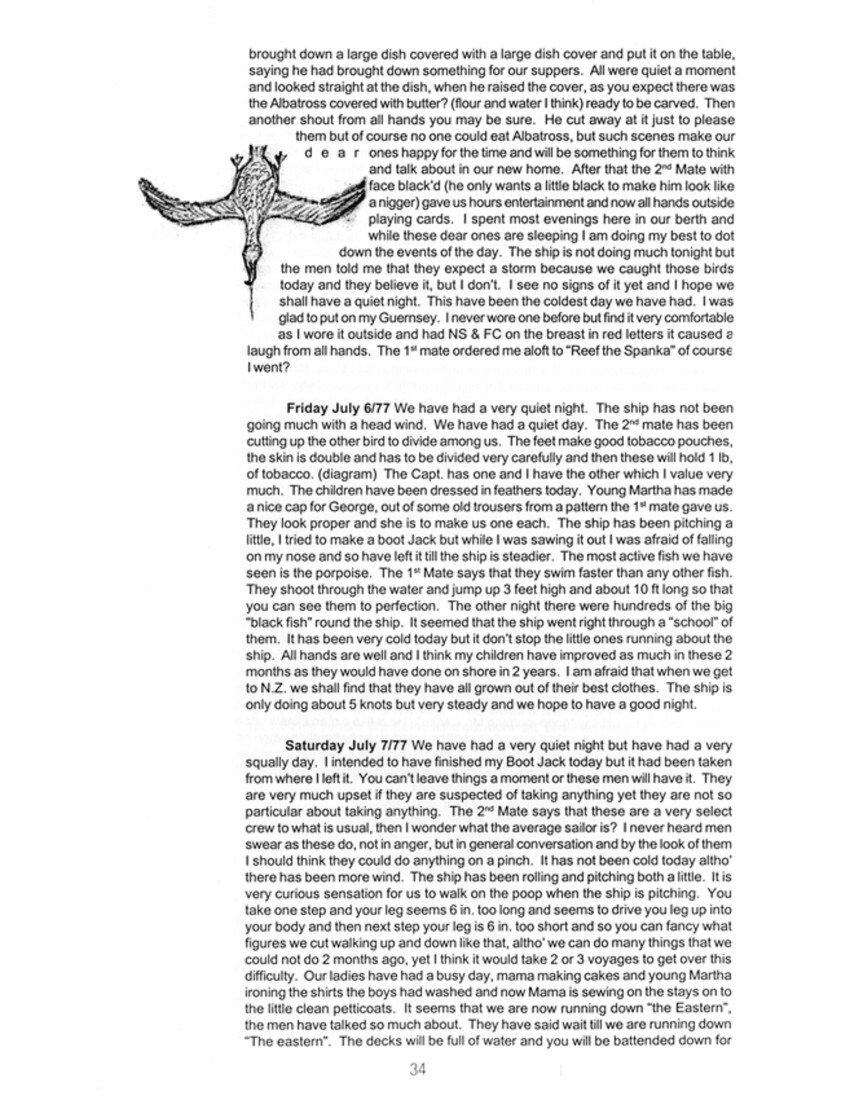
Page 35
days. I hope, please God that it may not be so for the sake of these little ones. We are thankful that he has been so merciful to us as yet. It seems that after rounding the Cape, they steer south so far to get into fair winds. The further they go south the colder it gets, but they get more wind. The Capt. told me some weeks ago that through having us on board (one word for us and two for his wife) he should not go so far south. We would rather have less wind if it takes longer about. There is a strong wind tonight and they have shorten’d sail and are “laying by” to shorten more sail should it be required, I trust not (diagram) and that we shall have a good night. Ship rushing through a head sea 11 knots.
Sunday July 8/77 The wind went down about 12 in the night and then the ship began to roll. Ship rolling more this morning and doing nothing, smooth water but a great swell. Someone was bad enough to catch one of those beautiful birds this morning. It was not hurt and was pulled on deck alive. The Capt. and the 2nd Mate took it on to the main hatch and set the beast of a ferret at it, nice inhumane sport for a Sunday morning. I spoke rather loud about it. I told them that if they could do that they were capable of doing anything. The carpenter said, “that was ship all over”, he said they have no feeling on board ship, if a man is taken ill, they say he is lazy. He knew a poor lad that was taken ill and he went to the Capt. who said he was growing and gave him a dose of castor oil (they give that for anything). The next morning he could not get up and the 2nd Mate went and told him that if he did not get up he would throw a pail of water over him and he did do it and in 5 days after that the poor boy died. I read 2 sermons that were preached on behalf of the Merchant Seaman Orphan Asylum Bow Road London. We have a lad here that come from that Institution. His father was Capt. of the “John Lidgett” belonging to owners of the ship, he was going his last voyage and then would have retired but the ship went down and all hands. Mr. George Liggett who is a Wesleyan Preacher and who has 13 of these ships, took this lad in hand and got him into the Asylum, but being over age to be voted in he had to pay £80 to get him in for 3 years. The school gave him a fit out and here he is as Middy, but the poor boy is no use for the sea, he is so near sighted that if he looks at a clock he can’t see the time. I don’t know what he will do as he says he has a very bad Mother who drinks and have nearly spent all his Father’s money. The ship has been rolling very much all day and it has been hard work to get about, it is a mercy that the children don’t fall about and hurt themselves but the dear things they seem to take no notice of it now. With such heavy rolling I fear I shall not have much sleep tonight. It has not been cold and if the sun had come out it would have been very warm.
Monday July 9/77 The ship has been rolling all night. I have had very little sleep but the wife and baby sleep well, they are better sailors than I am. She is rolling very much this morning and we have a job to keep the breakfast things on the table. I notice they have lost 2 plates on the other side and to make it worse they belong to the Capt. and will spoil his set. They have had a hard days work with the birds, catching killing and skinning them. Four large birds have been landed and now we have quite a museum. The girls have begun to make feather hats, muffs, collars and I don’t know what. We have more tobacco pouches. I have a nice one I intend sending to our dear Gus if we are spared to reach our New Home. It was been a beautiful day only the ship has been rolling very heavy. At one time I was on the poop which is 8 or 9 ft. above the deck and she dipped over so much that you might have touched the water with a walking stick, then she ships the water right over “midships”. Our children have been singing “Roll Columbus” but I would rather prefix the Don’t. The water is very smooth, in fact we are becalmed. The men who have been most times this way say that they never remember such weather in these parts, not even in summer. We had a most peculiar sunset. It cast such a light on the ship that she looked all on fire.
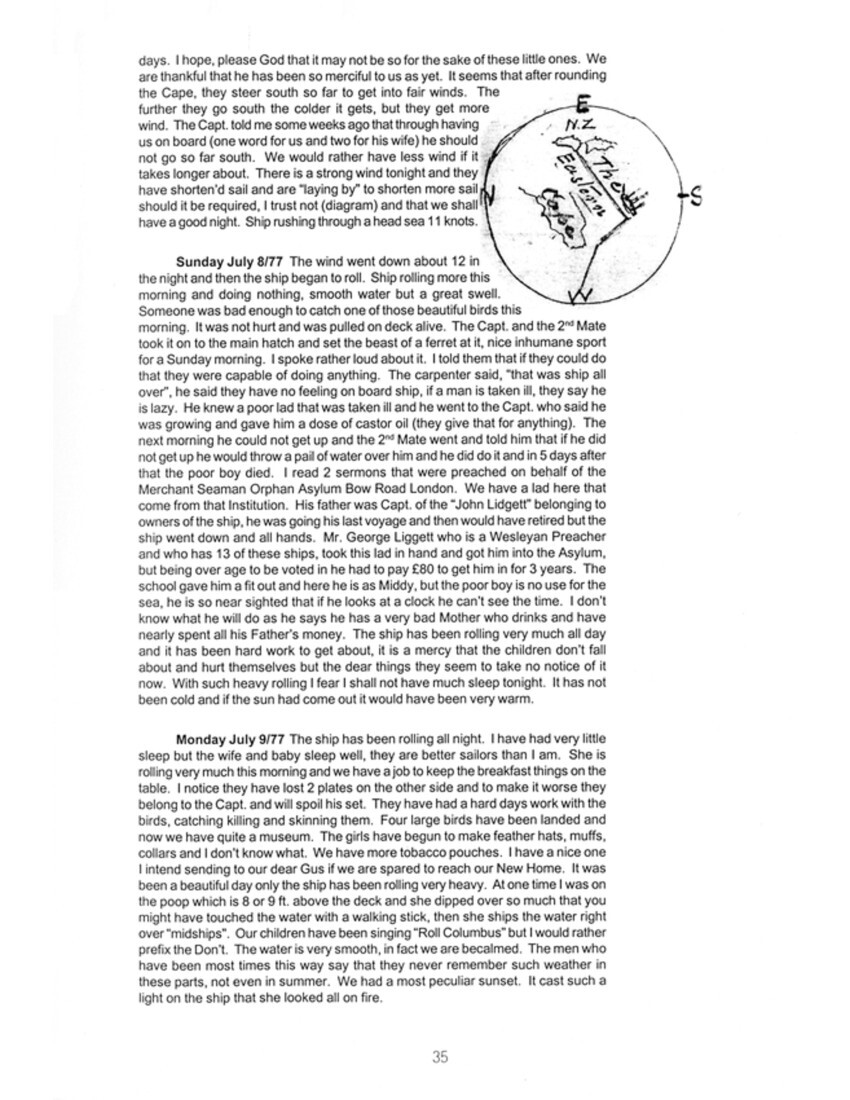
Page 36
10 p.m. They have just shifted the yards round and she seems a little steadier. Hope we shall have a better night.
Tuesday July 10/77 Just as I expected when I saw them “Brace the Yards up” last night, we have had a good steady night, quite a treat after 3 days rolling. Now we have a beautiful cool morning with a nice fair breeze. Ship doing 8 knots with a pretty sea and just the size I like. I quite enjoyed sitting on the poop this morning smoking my pipe with no fear meeting A that owes you £5 and then in the next street meeting B that you owe £5 to and can’t pay him till A pays you. All hands (our hands) have been busy with the birds again, not catching them, the ship is going too fast for that, but skinning the feet for tobacco pouches and scraping the long bones for pipe stems etc, etc. As they can’t catch them only when the ship is going 1 or 2 knots, I hope they won’t be able to catch any more. The men have been busy looking out for storms, taking in sail and then setting them again. There has been several beautiful bows in the heavens this morning. The men called them “wind calls”. I think they are more afraid of the wind than we are. They are so superstitious that if the Capt. puts her tail up a little higher than usual they think it is a sign of something. They think (or say they do) that these beautiful birds flying about here are the dead bodies of late Capts and Mates and men who have been drowned at sea. The Albatrosses are the Capts, the Molly Hawkes the Mates and the Cape Pidgeons, the men. Mr. Plimsol’s M.P. next job after he has made the ships tight ought to be to educate these poor deluded men. I think by the way the yards are “Braced up” that we shall have a good steady night.
10.30p.m. I have just been on deck and the ship is “booming” along about 12 K and with as much wind as she can carry with all sail set.
Wednesday July 11/77 We have had a very steady night and the ship has been doing well. There is a little swell this morning but nothing to hurt. The men have “Bent” a new top gallant sail I noticed that they had a job to make fast the ends of the yard arms. The wind blew it away from them, the Mate gave the man at the wheel a sign and with just a turn or two he brought all the sails “aback” and then they could make fast.
10.30a.m It was lovely on the poop walking up and down with our dear Kitty. She does like the deck. That is the only time she whimpers is when she sees me put my hat on to go on deck. The swell has gone down and now there is a beautiful sea and clear sky and nice and warm in the sun, a little more wind and ship is doing 12k. No bird catching. I wish our dear Alfie had caught one, how he have worked for weeks and have not had a bite. I don’t know how much line or how many hooks he has lost, but I noticed his cheeks have got fatter over the job. There has been many speculations and calculations through the ship as to how long we shall be now, getting to N.Z. They ranged from 25 days to 6 weeks, but I know that they don’t know anything about it. I am very thankful for past mercies and leave the rest to the Giver. The Mate told Coles and me just now that he has been in this spot 26 times and he never saw anything like such weather as this in the middle of summer. The last voyage they were 3 weeks with the water on the decks waist high and sometimes worse than that, so that he thinks this weather must have been made on purpose for us. It was a beautiful sunset again, yet they expect wind. We don’t know any more, 12k will do for us and ought to satisfy anyone. I made another boot jack today but did not lose sight of this one till I had finished it. Our dear girls are now making dolls and stuffing them with oatmeal and a nice mess there is in front of me. They are just off to bed and I must clean it up. What would their dear Aunties give to see their dear happy faces this night. Addie has just asked me, “what are you putting down now Pa”. Thursday July 12/77 We had a nice steady night and now we have a beautiful sunrise just like a midsummer morning. The ship has been doing well all night but the wind drop’d towards morning. It most always does. We had a squall at noon which drove her through the water about 12k. Since then she has been going
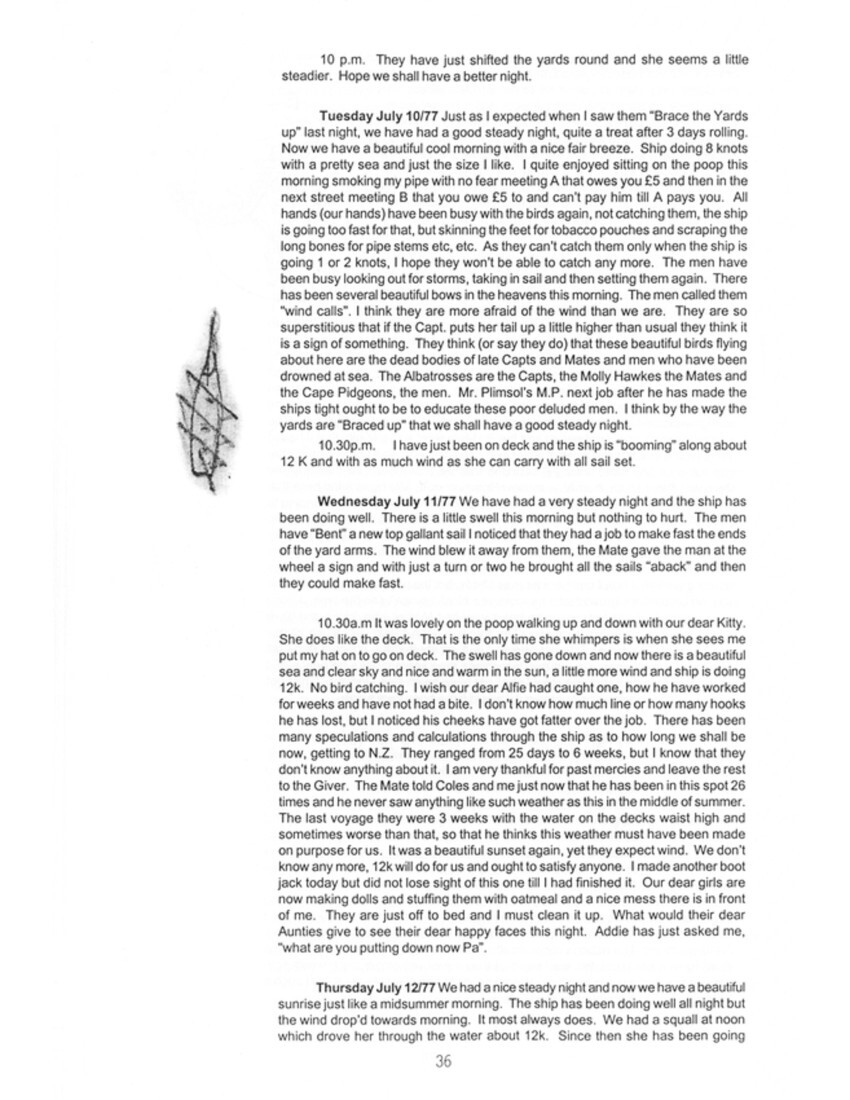
Page 37
steadier with a nice breeze and the water smooth enough for a small open boat, something wonderful for mid winter in this part of the world. This dreadful “eastern” that was to have been, has been as yet about the best part of our voyage. It has been much colder today, almost too cold to take our dear Katty up on deck, but she don’t mind it if we will but only take her. She is so much improved and her cough has nearly left her, I hope. She is just about as knowing as anyone in this ship. She is covered with kisses from all hands all day and no wonder for she has a smile for everyone. When the men first saw her they wondered where she came from, they didn’t know that she was on board because they never heard her cry. I have just heard that the Capt. had just said that he hopes to be in Auckland now from today, in 20 days, I hope so. Martha has made herself a fine feather hat, a white, brown with a grey rim and green bird in front.
Worth fifteen “bob”. I believe our dear little girls are to have one each. I am glad to say that all hands are quite well and with weather like this, some of them have been grumbling all the way “could not eat, drink or sleep” but I notice that they have eat, drunk and slept more than I have, but I am very thankful, it is all very much better than I expected and I hope we shall not fare worse for some time after we get on shore, but some people are born grumbling and they carry it out.
10 p.m. I have just been on deck, it is rather cold but this good ship is “booming” along about (I think) 10k. and I have watched her so much that I can tell by now by looking over the side, within 1k. Nearly all hands at cards. Ship very steady and we hope to have a good night. We never forget when a Thursday comes round, 10 weeks this day. We know that our dear ones are counting the weeks. I hope they have seen the papers. We must have been reported by some of the ships we passed, before this. I am so sorry we could not send our letters from the tropics. We expected to have been becalmed there and to have seen lots of homeward bound ships but we came through most of the way with a good breeze, our gain but our dear ones loss, but they won’t mind when they know how much dreadful heat we escaped. The Mate had got a letter bag made before we got to the line and for some days there was nothing but writing letters, but it was not required,
Friday July 13/77 We have had another good steady night and this morning there was a beautiful sunrise. Light wind but it is fair and ship is going nicely, just like a spring morning on the poop with baby. I told the Capt. that I thought it was wonderful weather. He said yes, but we will have something presently for this, I don’t quite see why. I know one thing, he won’t have the making of the weather. Harry caught 2 pretty Cape Pidgeons with just a piece of black thread. They can’t see the black thread and it gets in their wings and then they pull them in. We are going to have one stuffed and one to cut up for hats. Harry Cantle and Ernest Coles had a fight today about fetching an allowance of water at 8 bells (4 p.m.) When first we came on board we used to be glad to do it, but now they have found out that it is work and they would rather fight than work. It seems that Master Harry gave him a clout and he kicked Harry and gave him one on the “smeller” and worst of all for me threw his cap overboard. Then Harry knocked him down, picked up his cap and sent it to keep the other one company. Edward came up the time and pitched into his boy, but he don’t lay it on as thick as I do. Someone thought he was only brushing the boys coat. I like to see him in a temper, he looks as if he would if he could, but he can’t and they know it. I came on the scene after it was all over and I can’t do much in cold blood. The boys have lost several hats overboard and if other ships should see them they will think that the heads are at the bottom of the “dark blue sea”. They squared the yards just now and the ship rolled a little. I said at the time that I thought they made a mistake. I saw no reason according to the wind and I was right, for they put them back again and now we hope to have a steady night. It has been like a fine autumn day, smooth sea and nice fresh breeze. I have walked miles today up and down the whole length of the main deck, sometimes by myself and then with Edward, talking about what we should do in N.Z. and then with wife arm in arm looking at the
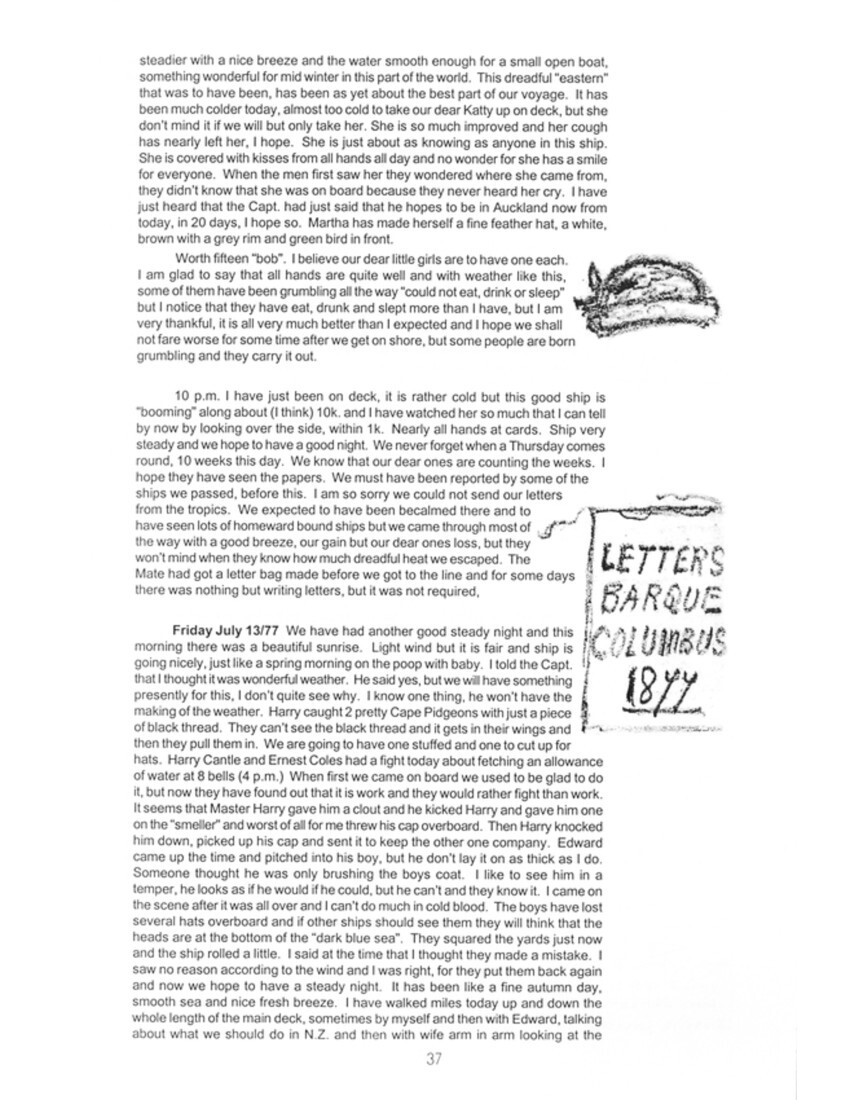
Page 38
beautiful sunset while Clara Coles was carrying our dear Kitty by our side. It has not been cold enough yet for a great coat, but according to what some say we shall soon want them. Ship going about 6k and rolling slightly.
Saturday July 14/77 We have had a good quiet night. The ship has been doing 6k through the night but not so much this morning. The wind is so light and the sea so very smooth. A great event happened on board this day. While sitting at breakfast Mama was feeding baby and found out by the rattle of the spoon that she had a tooth. So our dear Kitty has a Columbus Tooth she has been made such of today on that account. I have had a long walk today with and without the baby. The ship was going about 5k at noon, but only while I went down to get my pipe the breeze freshened and has been increasing till now the ship is off rate of 12k.
8 p.m. She is “booming” along no mistake. The sea breaking over her the wind on her quarter. They are all delighted with the fair wind but of course they think we shall have more before morning. I hope not. The sea is quite big enough and the ship is going quite fast enough for me. The Mate says that if the sea don’t get tougher he wants 13k out of her before he shortens sail.
10 p.m. I have just been on deck after having a nice supper and if she was going 12k at 8 she is doing 14k now. She is rushing through it proper and the phosphorus at the sides and wake of the ship is something beautiful. The Mate says that he have been able to read a book on the poop of a night by the light of it. While I am writing I can hear them taking in all “stay sails” and squaring the yard. The wind have got more “aft” and so the stay sails are no good. I am sorry they have squared the yards for I am afraid she will roll but perhaps not so much with strong wind as when we are crawling along at 2k. The Mate is singing but I am thoughtful and trust we may have a good night. 10.30 They think they see a light ahead and have put out side lights.
Sunday July 15/77 I always put down on the Monday what occurs on the Sunday, but here is Tuesday morning and I am afraid I shall forget some of the important events that has happened the last 2 days. Well, as I thought the storm came down and the ship did roll and pitch all night and now this morning (Sunday Morning) I go on the poop and see a beautiful sight, such seas – what we should have called 2 months ago, mountains high, but they look grand with beautiful green and white tops. The ship looks one moment that she has to go through a hill of water at her bows – 30 ft. high and then where I am standing on the poop you would require a 2 story ladder to reach the water and then the next moment the bows are up in the air and we have a mountain behind us with a big sea coming midships. 2 months ago I should have been frightened and should have tumbled about here like a man drunk, but now I enjoy it and can walk about almost as well as the Mate. I would not venture to go “forehead” today because of the big seas coming over but our young ladies Addie and Minnie got up there some hour and came back (carried back) and told me they had had had some “plum duff’. They have all dropped the English grammar and have got a new one “Colunbus grammar”. We shall have some trouble with them when we get them on shore. Young Alfie and Charley Coles got on to the Main Hatch and a big sea came over. Charley ran up a short ladder that leads to the top of the galley and where another sea might have taken him overboard, but Alfie ran to the winch and held on and sung out “I’m at the winch, I’m at the winch”. Now the boys have given him that name but they added “Mother to it, which makes it, “I’m at the winch Mother”. We had a service of song and reading this evening and then into bed as well as we could. We cut some fine capers, undressing, when the ship rolls like this. You can’t stand on one leg and pull the stocking off the other one, and when in bed if you lay on your side you will soon roll over on your back or front.
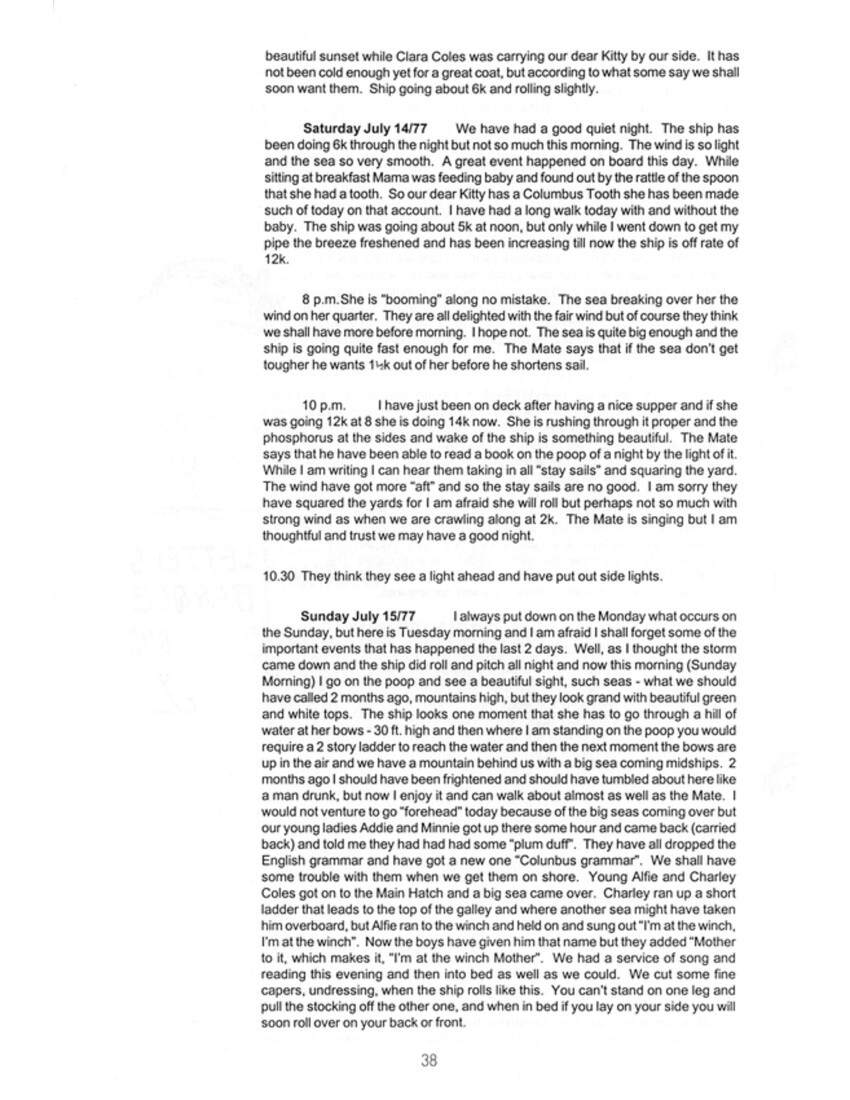
Page 39
Monday July 16/77 Of course we had a troublesome night. Every big sea that comes on the deck, wakes us up, it sounds worse at night. It seems like an “81 tonner” coming down on the deck. Coles & Clara have not had their cloths off. We are most anxious about her. People who have been this way before ought not to have persuaded her to come. What makes it worse she is frightened. That is no use. We can’t run away. I have every confidence in these officers and crew and this good ship and we know to whom we must look for the rest. More wind and sea today only a few storm sails up, yet we are rushing rough this big sea about 250 miles in 24 hours. I think we have to do about 3000 miles more and I shall be glad when that is done, for the reasons stated above, altho’ I have enjoyed myself much perhaps shall be sorry to leave this ship, but if I had seen my little party were afraid and the little ones crying for fear, I should have been very sorry I came, but they are as happy as larks and I thankful to say up to this moment are quite well. There has been many narrow escapes from getting a wetting today. One of the ships boys was washed from fore to aft, but not hurt. The Capt. has paid us a visit to see how we are getting on and have sent down the ladies some Hot Grog. Clara is very queer tonight with some bad symptons [symptoms]. The seas are coming on deck in quick succession and the ship is rolling very much yet some of them are at cards – A winch Alfie made today in memory of his escape yesterday.
Tuesday July 17/77 We have had another troublesome night, the ship rolling much and heavy seas coming over the side flop, not so much wind this morning but a very big sea. To look at the mountains and valleys it is wonderful that the ship don’t roll more. At the moment I have been obliged to stop writing and hold on while she is having a good roll. She has taken some heavy seas on deck this morning. One knocked down 2 men and the 2nd Mate upon top of them, but they only laugh at it. It was near here two voyages ago that this ship lost 2 sailors and a carpenter. The 2 men over the side and the carpenter through one of the side ports and last voyage they lost a man off the royal yard. It seems that a heavy sea broke into the saloon and the men went to their assistance and the passengers gave them bottles of liquor for their kindness, but this poor fellow drank too much and he lost his life. The sea broke through a port in the forecastle last night and the Mate brought me this morning a singular creature that came through the port at the same time. Some call it an Ink Fish. They say when another fish is persuing it, it throws out a dark fluid which blackens the water so that it can’t be seen – some call it a Cuttle fish. It is like jelly so that I don’t think I can preserve it.
No. 1 is a Sheath just like a scissor sheath into which it can draw its whole body and then it would be this shape.
No. 2 is the body with a sort of legs with feet at the end just like a toothbrush. Altogether one of the most wonderful creatures of the deep that I have seen. The wind was not fair this morning but it has got round to the west but have dropped and the ship is not going at present more that 6k.
Wednesday July 18/77 It is with great pleasure that I can record the good conduct of this ship the latter part of the night. She rolled
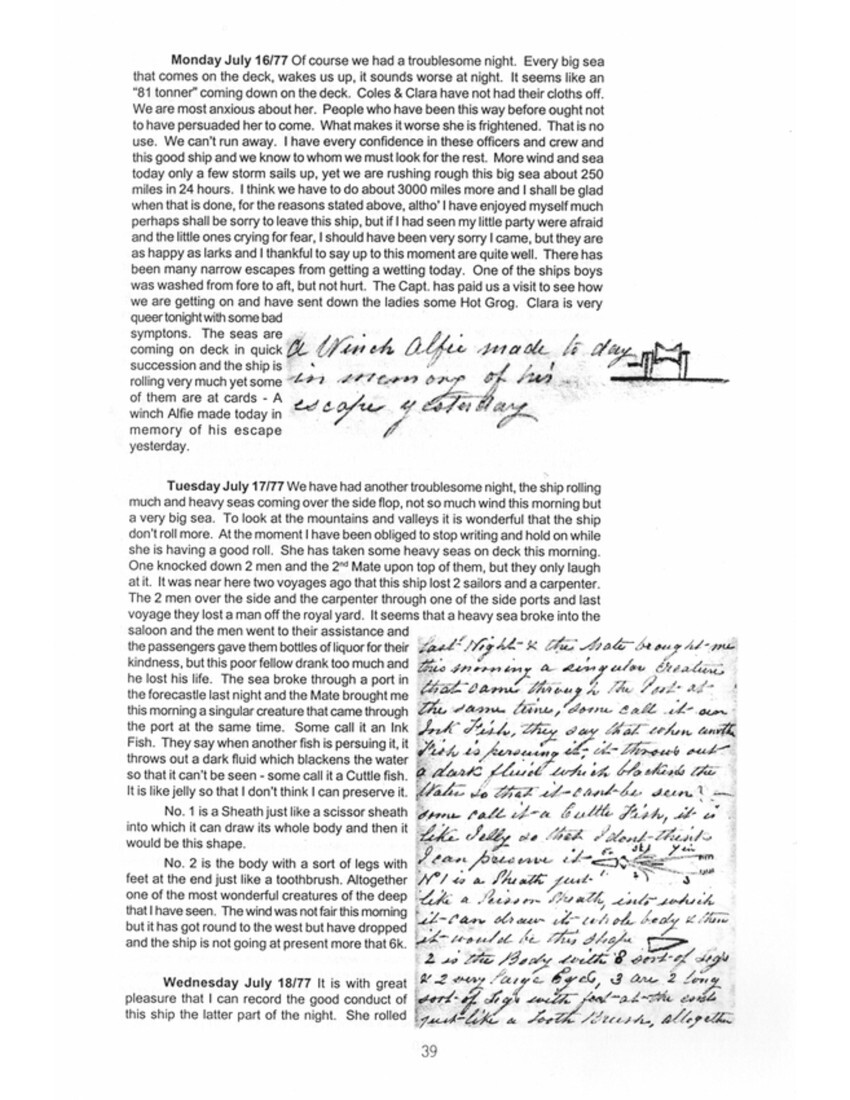
Page 40
very much for about 2 hours after we went to bed, but it seems she got steady about the middle watch (2 a.m.) About 12 young Martha Coles broke out screeching. The Capt. heard her on deck and told her if she was not a good “Girrl he wad tak her up and put her in a Baux” (box). The 1st Mate said he had a mind to call me up in the middle of the watch, the phosphorus was so beautiful. It was all round the ship and quite lit her up, so that you could see to read a book over the stern. I and Coles went with him to the bow this morning and it was a beautiful sight to see how she was flying through a mountain of foam with a beautiful green top (all the big seas have white and green tops). Some times there was a sea in front of her as high as the point of the bowsprit as shown above, but she rode over it. She don’t skip any seas forehead while running, it is much wetter on the poop
The wind has risen today and she has been flying through the water, rolling and shipping heavy seas. I have been busy today conducting the ladies to the ___. I have had to watch the seas and pop them in and keep watch and pop then out. I was comfortably seated this morning in the “Gentlemen” when a rude sea came up and drove me flying and I had to give it up as a bad job. While I am writing, the seas are breaking over us, but all are merry and well. We expect a rough night but we are getting used to it now. The Mate showed me the chart just now and I see we have passed a lot of islands and shall be off St. Pauls tomorrow. They say another 18 days and we shall be there, we shall see. It is a beautiful moonlight night and the ship is running at about 11k.
Thursday July 19/77 I will try and write a few lines, but we are “Tempest Tossed” now and no mistake. It requires both hands to hold on, and that have not saved me lately a broken shin and a sprained finger. We had a very bad night and this morning the sea is very high and the wind is very strong. There is lots of falling about but nothing serious, I am thankful to say. For a party like this to escape one day without an accident is a mercy. The seas were getting so high at noon that they talked of “Heaving the Ship to”. That is to bring her head to the wind. The seas are so high at the stern that they threaten to overwhelm her but they have not done it yet. This is “running the eastern” down and no mistake. We must have a bad night. 11 weeks from home this day and if our dear ones could only see us this night, they would go mad.
Friday July 20/77 We went to bed (that is, for a swing) at 11 p.m. and she did roll and the seas came on deck, such as we never felt before. At this moment she has had a awful roll. Mama was nursing baby and she thought that her mother was doing it to please her and so was delighted. We must have gone to sleep about 1 a.m. and it seemed that when the Mate came to look at us at 4.30 we were all asleep, but the other side can’t sleep. Coles & Clara are frightened and they have good reasons but the girls don’t try to sleep at night. They don’t go to bed and so are no use to their poor mother in the day time. Clara is very poorly and frightens us more than the storm and to make it worse, all the water that comes down our hatch goes into their berth. The seas were so high at noon that they hove the ship to. It is a risky job to do but she came to all right and now she is head to wind in the trough of the sea going sideways 3k and rolling tremendous but not shipping so much water. They say that she is safer now, but I should like to see her safe in
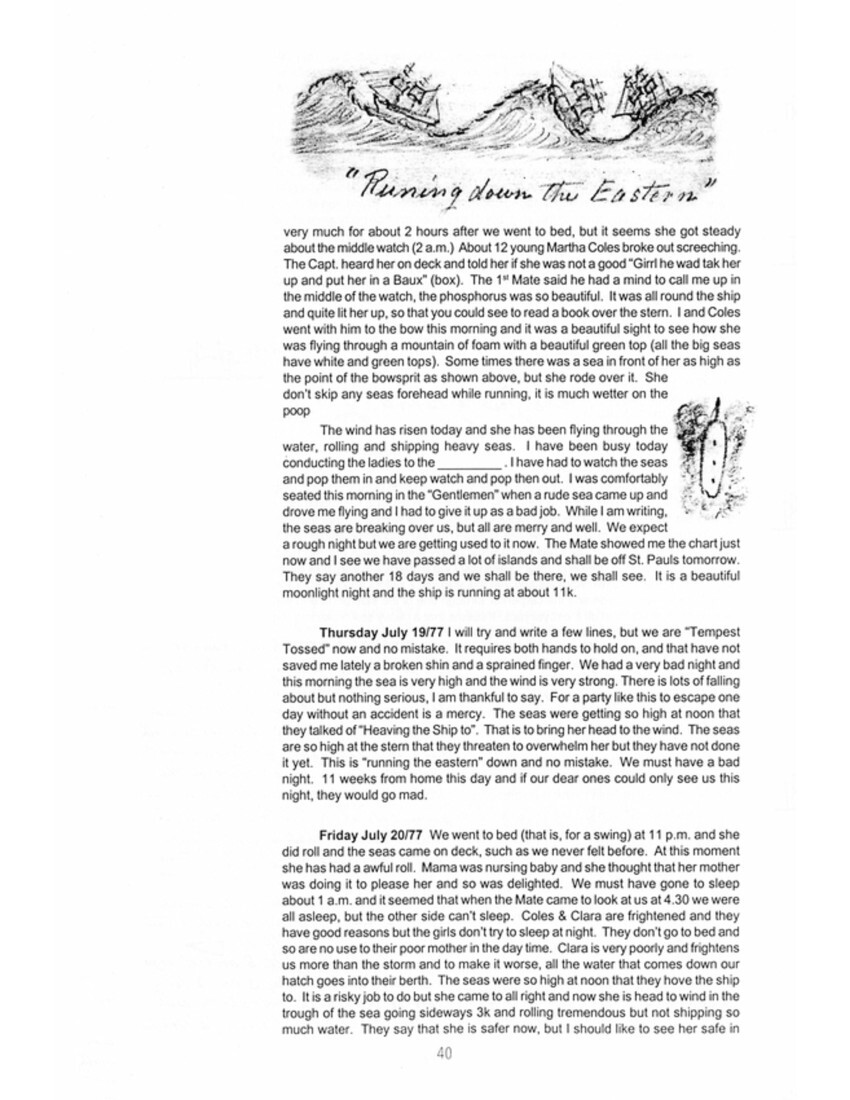
Page 41
harbour. I went on the poop just now, the man is lashed to the wheel and I had to hold on to a life line. The seas were as high as our foreyard arm and that is all 4 – 10 ft. rods.
Fancy seas 40 ft high and valleys 300 yds. wide. Some of the old sailors say that they never saw such large seas before and yet they come this way, out of their way to get this wind. They could come a much quieter way but it would take much longer and “time is money”. The young boys have been dressed up in paper caps and hats and have caused some fun, so it shows that they see no danger. They talk of bringing the ship round again. I hope not too soon, but she can’t roll worse than this. The water have put out the galley fires 2 or 3 times. While our bread was baking the water got into the oven. The ships boys have had to wait on us today, bringing our food from the galley. One is stationed at our hatch to shut it up when he sees a sea coming over.
8.30 p.m. they have “brought her round” and now she is shipping some tremendous seas again. The seas are roaring and the men are shouting. I can hear and Clara is in our berth frightened and well she might in her state poor thing. I fear we shall have a bad night but we hope not for her sake more particularly.
Saturday July 21/77 We have had a fearful night. The seas have been striking the ship like a blow from a cannon ball and then it came on deck, just over our heads like another shot. We could hear the wind and seas roar just like a blast furnace. The blowing of the Mates whistle and the shouting of the men just over your heads is something awful in a storm, but we liked to hear it in fine weather. The Mate and his men have been knocked down and down again. They lost the run of the 3rd Mate, Mr. French, for sometime he was covered with the sea. He said he never swallowed so much salt water before. One of the ships boys have been knocked down and sprained his foot badly. The fowl house and all the fowls have been washed overboard and the steward just escaped being knocked down by it. The poor cook and his galley is knocked about shameful. Just now he has the hardest job in the ship. The 2nd Mate came and looked at us 4.30 this morning and the steward has just told me, that was the roughest part of the night and they were just thinking of battening us down, only it just got a little easier. It got worse again at noon. Besides the steady gale we have squalls come on of more wind and rain and snow we had today, it seems a shade easier just now. She don’t ship the seas so often but when she does it gives us a good shake that goes through one.
P.S. Kitty has another tooth.
Sunday July 22/77 It got very rough again towards midnight but got easier by this morning so that I could take a walk on the poop and just hold my own. While there, I saw what I though was a large coil of rope on the starboard bow and so the Mate thought at first, but found it to be a coil of seaweed, the first I have seen since leaving England. The Mate said he have eat some of it and the boys say they saw the birds pecking at it.
A squall came on and I was obliged to run and then we had it very rough again all day and it got worse towards night. We had singing and reading in the evening and was thankful that we escaped another day with only a few bruises between us all. Mama visited Mrs. Esson for 2 hours.
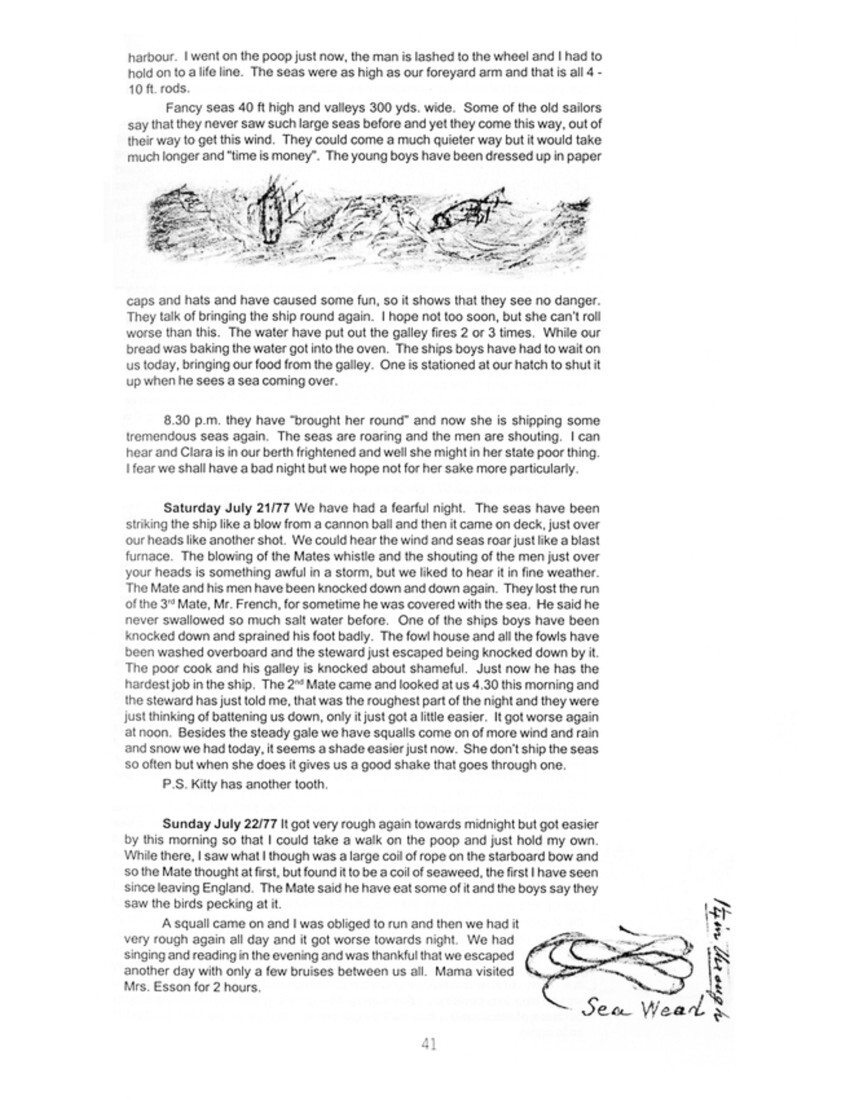
Page 42
Monday July 23/77 We had another very rough night. Ship rolling awful, men shouting Mate whistling and shouting and big seas dashing over us. My little party stand it first rate, but it troubles me to see the other party so frightened. They are certainly uncomfortable. Their berth is so wet and they have hardly a bed where the water don’t come in, the ship leaks their side. The girls have the water in their beds now so that they can’t go to bed, but they would not when they could. A gale all day with lots of extra squalls. Edward found out today (or thought he did) that we have been having one more can of milk than we ought to have. I have not troubled about the stores, the boys have done that, but I understood that the extra one was for our dear Kitty. The boys are very much upset that they should rob our dear baby because they knew that some of their girls will eat it wholesale, just as it is and then at meal times they can’t eat. It is too late now for me to make a noise about it now or I should. I hope they won’t have more than 3 cans more – .
6.30 p.m. “All hands heave ship to” again and while they are doing that we nearly turned upside down, if a landsman could stop on board just then he would think that we were going to the bottom. We have to hold on while the things goes flying about our heads. Just at that time poor Clara does pull a long face and poor Edward looks bewildered and well he might. There are 2 men lashed to the wheel and we expect to have a very bad night. The Capt. and mates are very kind to us. When Mama was in the saloon on Sunday she told the Capt. that Clara’s appetite was very bad and soon after she came down he sent down a nice dish of ham and hot grog for the ladies. It was ham too, we should know now what to bring if we come this way again. We ought to have brought about 6 nice hams and several other little things that we did not.
Tuesday July 24/77 We have had a dreadful night. The worst we have had at all since leaving Old England, a very strong gale. The 1st Mate says he has seen it worse but then I know he was in a hurricane in the western ocean, he says that the seas here and round Cape Horn and in the Western Ocean are the biggest anywhere, some of our bulwarks have been carried away and other accidents among the men etc. I don’t know who would be a sailor for 2/2 per day, they get no rest this weather and always wet through. They have to set sail and then the next 72 hour all hands by to shorten sail. I would rather be a dustman or a sweep. While I am writing (4.30 p.m.) we have a hail storm with much wind. This morning we had a snow storm and the boys brought down some snow balls. We have been able to go on deck a little between storms, but I fear it is all over this evening. Our ship is not doing much altho’ there is so much wind, they can’t put on canvas and I don’t think she has much more than made up today what she lost yesterday when hove to -. We have just heard a tremendous sea come on deck and some of our boys and girls are up on deck. Willie has just come down and says that the girls are drenched. Our Martha, Coles, Clara, Annie and Ada they had just been on the poop to see the hail that had fell. All ahead it looks the blackest of darkness. I asked the Mates if we were going into that. No, that is the storm that has just passed over us but we have more coming astern, I see. The ship is having some heavy seas on deck and rolling heavy but she don’t keep on as she did yesterday almost every storm something for the carpenter to do. Who would be a “chips” they call him, not this child, for £5 per week. Just now he was fixing the funnel on the galley that a sea has carried away, when a sea went right over him, but they only say “it is all business”. We are very thankful that this day has been so fine as it has and we hope to have a better night. The children can’t sleep well this weather they get knocked about so in their beds with the violent rolling. Last night Addie was just getting into her bunk just as the ship rolled and away she went against the side of the ship and struck her dear face. They say now that we are 4000 miles from N.Z. but I don’t believe it, unless we have been going back. I believe that if we could only get a good 10k breeze that we should be there one fine morning before we were ready. I find that Capts as a rule don’t like to tell the passengers just where they are. They did intend to have brought her round again at 12 last night, but the wind was so high they could not “square away” till 4 a.m. She has not done much today because of the squalls. Just as they got her in trim they would have to shorten sails again.
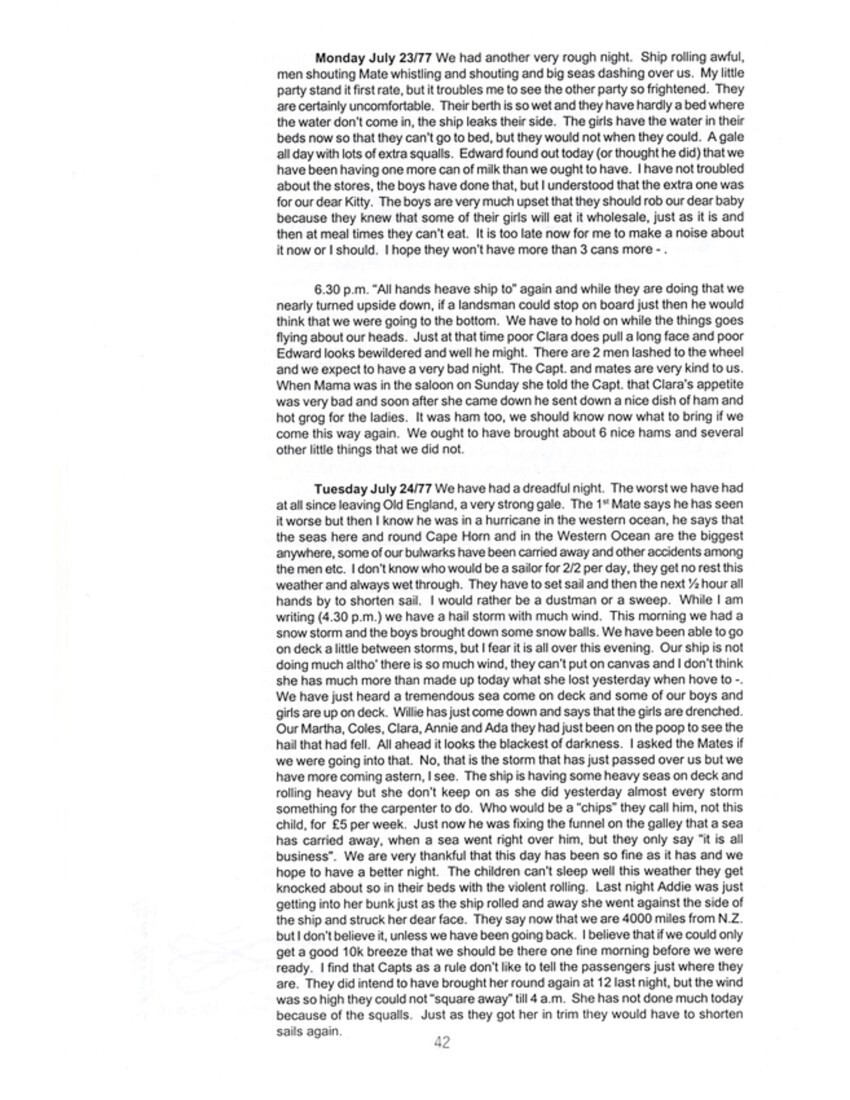
Page 43
10 p.m. She is off now and doing about 11k and pretty steady altho’ she is taking some heavy seas on board now and then. The men call her a “dirty wet wretch”. If we don’t have any squalls we shall have a good night. I have just heard the Mate whistle and heard him sing out, “Stand by the main topsail haul yards”. That means a squall is expected.
Wednesday July 25/77 We have had a dreadful night, the worst we have had. I awoke about 3 when I could hear the wind howling and the sea roaring and soon heard the Mate sing out “All hands shorten sail”. I expected we should have it for just as we were going into bed, she began to roll and the things went flying about in our living place. We left Willie, Jack and 2 of Coles girls up, and they had a job to fly after the tin ware etc. If every thing is not fastened on they must fly, but it got better by morning and we have had a merciful fine day (fine after what we have had) and soon we had the pleasure to help the men make sail. They always sing a song when they pull up the heavy yards, we wait while one man sings the air and then we all sing the chorus and pull. It is aways a very pleasant job and our dear ones are delighted with the singing for they do sing. You will always see our dear Alfie at the end of the rope doing his bit. They call him the “Bosun”. The songs are generally of their own making up. The one today began thus
Air “We are bound away, I heard them say
Chorus Away and fare thee well
Air We are bound to Auckland Bay they say
Chorus Away and fare thee well
Air We are bound where storms are sure to blow
Chorus Away and fare thee well
Air We are bound to see the Mourie girls
Chorus Away and fare thee well”
Another.
Air Where are you going my pretty maid
Chorus Give me time to blow the man down
Air I’m going a milking sir she said
Chorus Give me time to knock the man down.
I wish I could give the tune but I cannot. All the children know the tune and many others they sing. There is plenty of wind now and she is rolling quite enough to make a job for me to write this, but she is going fine about 11k and if she keeps this up we shall be off the “Leuwins” in about 2 days. “Cape Leuwins” a part of Australia and then we have to sight Tasmania and then Auckland. I give them 3 weeks to Auck. They are going to fit up a cabin in the saloon for Coles, Clara and child. I am very glad of that so that they will be more comfortable. The girls will have room enough to sleep then if they like?
Thursday July 26/77 There is no dependence in the weather here for 10 minutes. Before I went to bed last night, I heard the order, stand by to shorten sails. It seems that they had a hail squall and after that we had a good night. Last night a large bottle was broken and one the girls picked up the pieces and put them into the slop pail. This morning someone got up early and emptied the pail with other contents on the deck and there was a noise about that. We had a merciful fine morning and I have been laying on the poop, could not stand in comfort, a good position when she is rolling. Fix your arm round a rope and lay down and then you won’t slide overboard.
It was very pleasant in the sun and watching the young mountains coming up behind and threatening to come over and swallow us all up. The mate had just said “I think I shall be able to give my watch (men) some rest this afternoon”. When the Capt. came up and
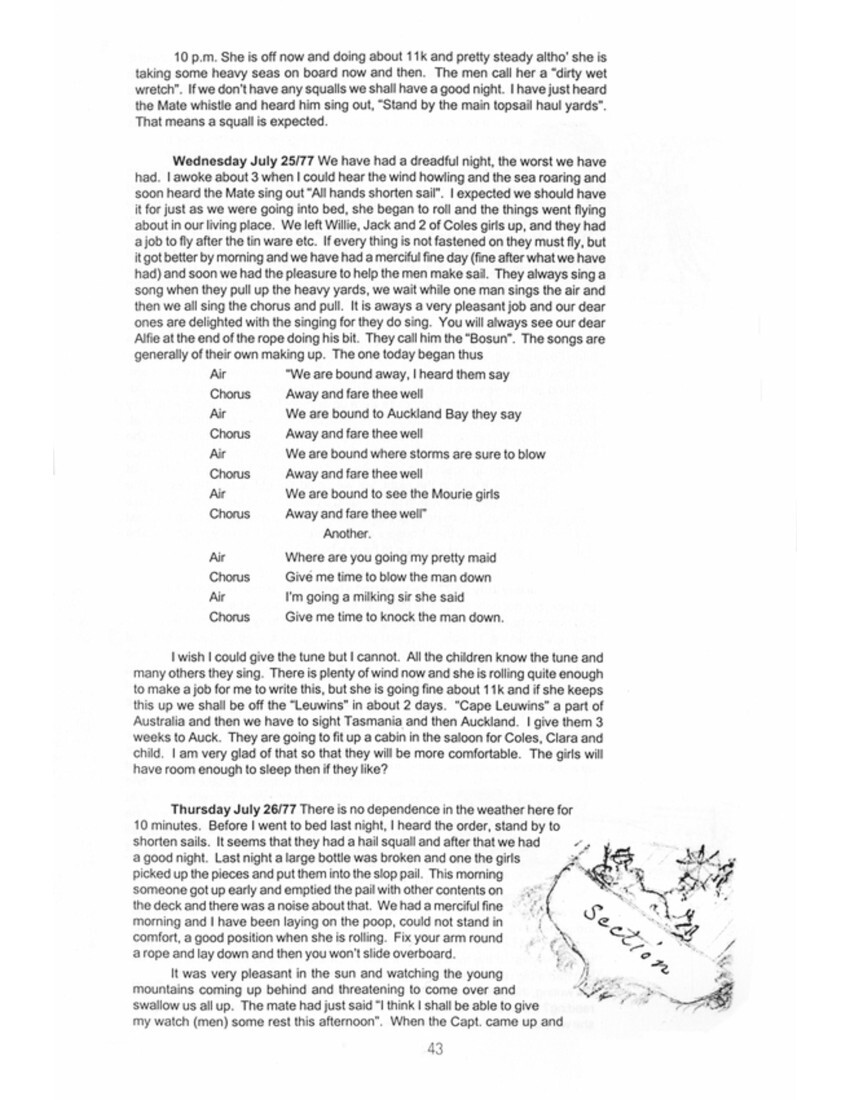
Page 44
looked over the stern and then gave the order to “shorten sail” and be quick about it. I cleared off and a short time after, she shipped a sea. They say it was 3 seas together and must have been about 500 tons. It filled the decks to the top rail and as there was not men watching our hatch cover today to cover it over when a sea came, it rushed down our cabin and left us about 3 inches all over to dip up. You may be sure it frightened some of our party,,in fact some on deck thought she was going down. It carried away some of the bulwark etc. the “bosun” had a narrow escape of being knocked down as he was coming down our steps, at the moment, the water rushed down each side of him so that he was not much wet. She is rolling now which you can see by this writing, but she has not shipped such heavy seas since, but we have a man now to stand by our hatch and he has had to keep us closed up for the seas are coming over rather large. We have been 12 weeks from Home this day and we know that our dear friends are talking about us and that they will now be expecting a telegram from us every day.
Friday July 27/77 We have had an awful night. The decks have been covered with water from 2 to 4 ft, deep. The Mate says it was the worst night we have had yet and to make it worse the wife was taken with dysentery and vomiting so that we were up and down all night. The water came rushing down our steps and some of our party opposite were up all night frightened and crying, they fixed up a hammock for poor Clara to see if she could be more comfortable in that, but today they got her up into the saloon and I was very glad of that but before she went up she very foolishly sat on the end of a box and the ship giving a tremendous roll, over she went up against an iron pillar and hurt herself very much. It has not been so rough as it was in the night, yet we could not get about the deck. The greatest mistake we made was in not bringing a pair or two of sea boots. We have always got wet feet, but we have got quite used to it. The youngsters have the best sea boots. They tuck up their trousers and go barefooted. It is very rough, but she is not rolling so much and we hope to have a better night.
Saturday July 28/77 We have had a better night altho’ they have had it bad on deck, but not near so bad as the night before. The wife is better but still poorly and now we have a beautiful morning for this latitude. Harry came and told us that they really had the “Royals” up. I was obliged to get up and go on deck to see that he had not made a mistake, but it was a fact and she was going along well for so big a sea, of course the royals can come down and the spanker soon brailed in and stand by the top gallant haul yards, yet we have had a fine day and could have got about better only for want of boots. I have looked round today at the damage done by the sea. I find there are 4 holes in the bulwarks and about 6 ft. of the top rail. The life boat was stove in on the bridge and several other smaller matters. It is a mercy that none of our dear ones have been injured by falling about. We have got up a good many sails now, at this moment 8.30 p.m. I hear the Mates whistle and that means something. I suppose, to take some in and that means something. I suppose, to take some in and snug the ship for the night. She is pretty steady at present but you can’t depend on a moment. One of the sailors told me that here (off Cape Leuwins) the squall sometimes comes so sudden that often sails and sticks are carried away before they have time to shorten sail. I have visited Clara in her new quarters and I wish she had been there weeks before. She is very much bruised down one side where she fell against the iron pillar yesterday. Edward is quite another man today, he looks 10 years younger. He has been worried lately, I can’t make out how long we shall be now, the reports are so various. The men say 10 days, the Mate says 3 weeks. If the men are right then the Mate wants to surprise us. She has just had a big roll and ship’d a big sea, but we hope to have a good night. While I am writing, the girls are in bed talking ship and the artful young Kitty is up in our bed reading? a part of the “Illustrated London News”. If she is not very good tempered she will push it over the side of the bed. It is nearly 3 weeks since she has been on
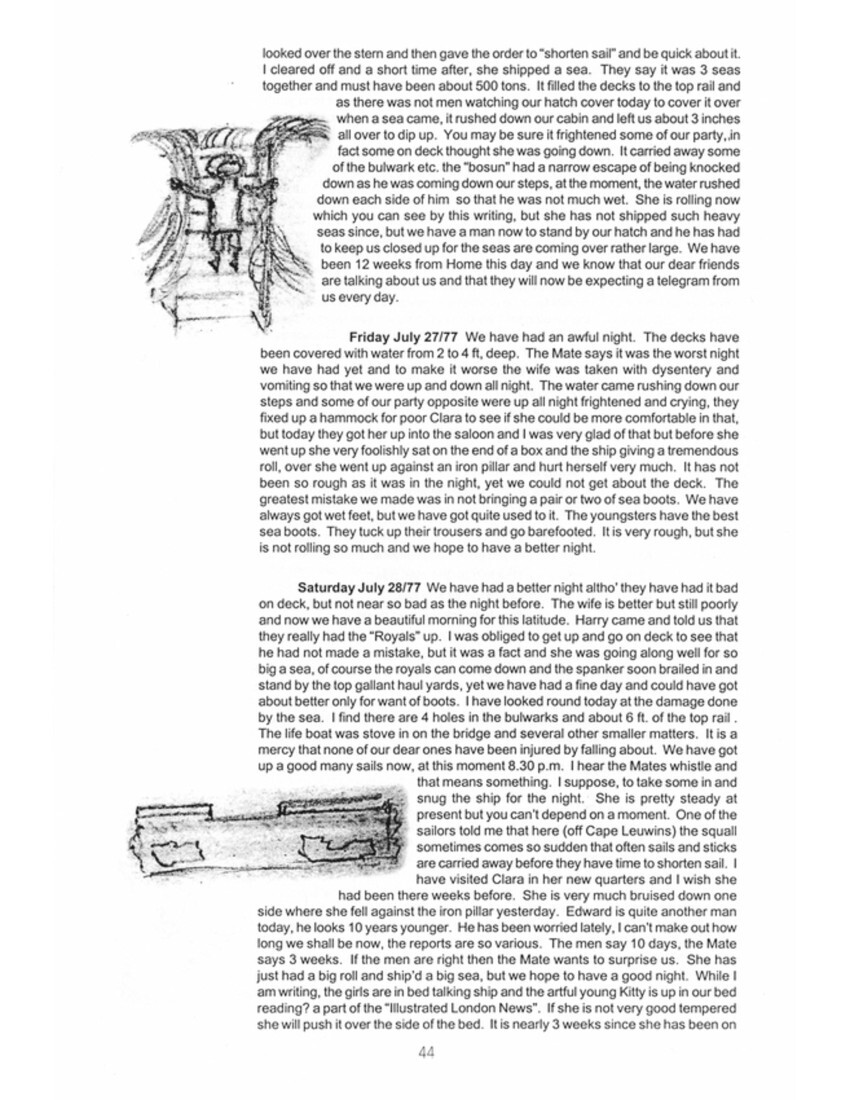
Page 45
deck and she was so fond of the deck, she is such a dear little thing. She has not had a proper cry since she has been on board. Jack has just come down and says that it is a beautiful night on deck and she is doing about 10k. I went on deck to take a last look for the night.
11.30 and while there she made a dip while rolling such as I had never seen before. Her top rail went 3 feet under the water and of course a lot came on deck. I made tracks to bed.
Sunday July 29/77 We slept pretty well till about 6 when I was awoke by a most peculiar noise. I could not tell whether it was water or wind. The ship was sometimes trembling from end to end. I could hear the men screeching and shouting more than usual, and I could not tell what time it was, whether it was moonlight or daylight coming in. In about 2 hours I was very much relieved by hearing the men sing “we are bound for Auckland Bay they say” and then I knew that they were making more sail and thought I had made a mistake. At that moment the Mate looked into our berth, a pretty looking object, and I asked him if there had been anything the matter, he said they had had the most fearful morning that he had ever seen. A dreadful hail storm with such wind he thought he must lose 2 or 3 of the men. He fell down 3 times getting to the man at the wheel, that passed off as sudden as it came on, but we had several storms through the day but not near so bad. I want to remember that Mama had a bit of dinner given her by the steward and because the ship was rolling so much she put in on the bed. Young Kitty was in bed and she managed to get at it and when they came in she had got her little fingers under the dish cover and was helping herself. She looked quite silly while we were all looking at her and laughing and as much as said, what are you all laughing at? All the rest of us have gone off our appetites this rough weather but she feeds well. We had a most peculiar sunset, a green sky and a pretty green too. First of my family, I should think, that ever saw a green sky. We see beautiful rainbows at night. What they call Lunar rainbows. She is rolling very heavy.
Monday July 30/77 We have had a pretty good night, but they have had a bad night on deck and now she is rolling heavy and continually. You can’t keep a thing on the table unless you hold it on. You want about 6 hands. I have had many happy days on board this ship, but running down this Eastern is something dreadful. I wonder that my little party stand it so well. Young Martha have been poorly a few days, but is better today. The Capt. thought of going through “Bass Straight” between Tasmania and Australia but for some reason he is going outside Tasmania, which being farther south it is so much colder.
We can’t find out when we shall get there, but from what I hear I think that if we spared, next Sunday will be our last Sunday on board and then what next I wonder? She has been rolling dreadful all day and now to be able to write at all I am obliged to sit on the floor with my back against the children’s bunk board and my feet against a box. While the men were pulling the main brace today a heavy sea came over and knocked them over to the other side of the ship. They do say some pretty things about her. Some of them declare they won’t come back in her. She is such a “dirty beast”. They have been wet through now for 16 days and I fear they won’t get dry till we get into port.
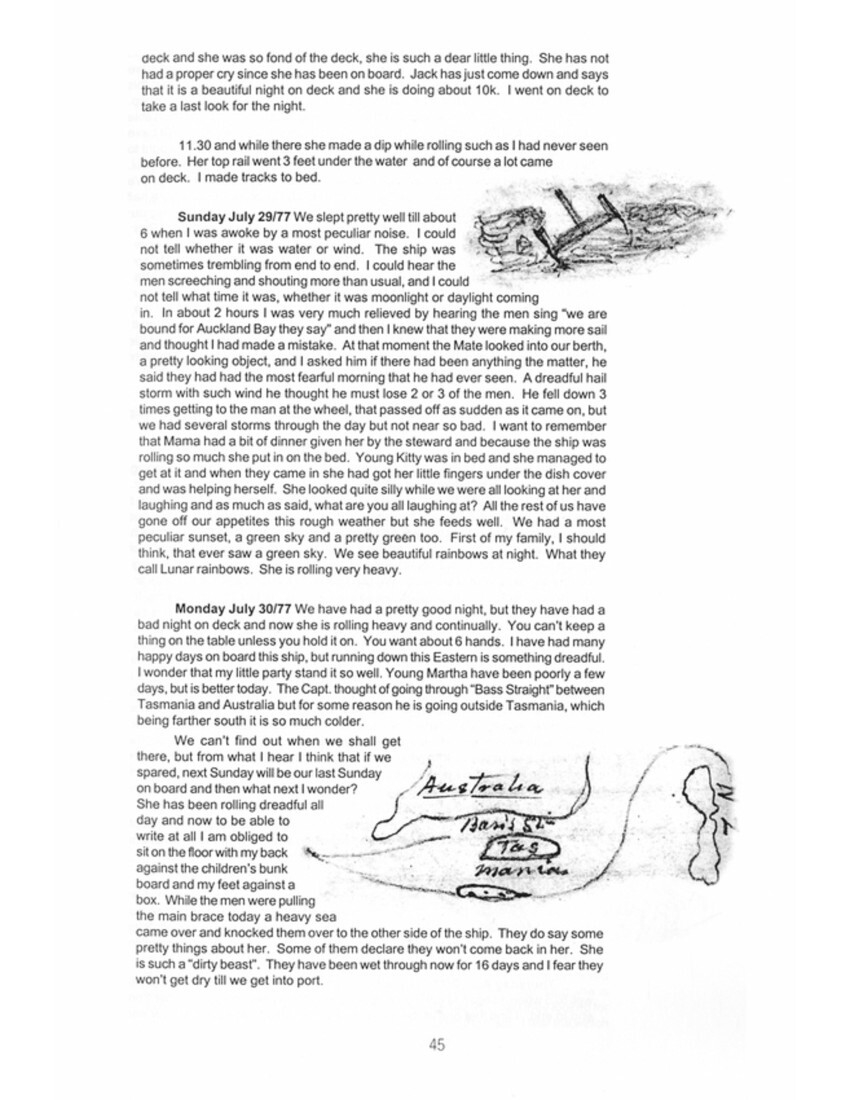
Page 46
Tuesday July 31/77 They have not had such a bad night on deck but she has been rolling so much that I could get no sleep. This is a fine day from what we have had. The wind has shifted more north which is much warmer than south in this part of the world. Yesterday the cold got through 2 coats, while I was on the poop. Today I have had a nice walk there with one coat only. The children have been able to get up on the poop a little. Quite a treat for it is very dull down here. We have burnt all our candles and the steward finds that he is 100 short of what he ought to have so he has put us on short allowance, but the dear things are all very cheerful. Stormy weather makes no difference to them. The ship is doing well today. We have actually had the royals up all day. It was stand by once, but it was only a hail storm. This is my birthday, no matter how old I am, I know I am too old to emigrate but I am doing it for my children’s sake. I have brought them from a country of Pride and Poverty to something better I hope. Coles said today that he hoped when we get there that we should not be more than 15 miles apart so that shows that if Capt. Russell has anything for him to do, he don’t mean to share it with me. If I had known that before, I should have booked for Auckland, I don’t think Napier will suit me, bit it is too late we must do out best. I thought he might have said, if I find they have work ready for me you shall have half till you can see something for yourself. Young Martha is a little better and has gone up in the saloon this evening. Willie has been washing and Jack, Harry and Louis have been making pastry. I thought we should have gone to bed with the royals up but no.
11.30 I hear the sound stand by royals halyards and down they come. Ship doing about 11k.
Wednesday August 1/77 we had a good night till about 5 this morning, when I was awoke by the rushing of the water and wind, and the shouting of Capt., Mates and men. A squall had come on and was driving her about 15k. It was a storm, one big sea stove in another boat and that is up 9 ft. from the main deck and knocked down one of the ship lads and then washed him aft hurting him very much. At the moment 7 p.m. we have had such a roll as we have never had sent us all almost flying. We have had lots of wind and very rough sea. The worst of the rough weather it does us out of our grub. We can’t get up to the galley, while the seas are coming on deck. If it is a rough bread day, it does us out of our hot rolls for breakfast. This morning a sea knocked down steward, bread and all – such is sea life. Martha is much better today and has been on the poop a little while, but was obliged to “clear off”, a storm was coming. I noticed that one of our young ladies new lover is “steering off’ now we are nearing port, and that she has hoisted her old colours (her old engagement ring). If he is going to act like that, I say he is a humbug and have imposed upon a weak minded girl and have treated her parents badly. Mama is gone up by invitation to see the Capt’s wife. I shall be glad when she is down again, safe. There is one good thing, there are none of us seasick this rough weather, only sick of being here now it has got so wet and miserable, but the children are as happy as they would be in a drawing room – I can hear the steward outside saying that they now talk about this day week, to be alongside the wharf. Oh that it may be so. Most of our party are bruised about by falling, but we are thankful that no bones are broken, the fact is we have all got our sea legs. Mama has come down from the saloon and Capt. told her he expected a very rough night. It lightens and ship is rolling heavy.
10.15 p.m. She has just had such a roll as she has never had. Carried away our ladder, our water cash and cans, all the crockery out of Coles cupboard and everything that was not tied on. What a scramble.
Thursday Aug. 2/77 They had a very bad night on deck. We slept pretty well till 5 when it began to get worse. Such seas striking her and shaking her from end to end. I find that one of them came over the portside and passed over and
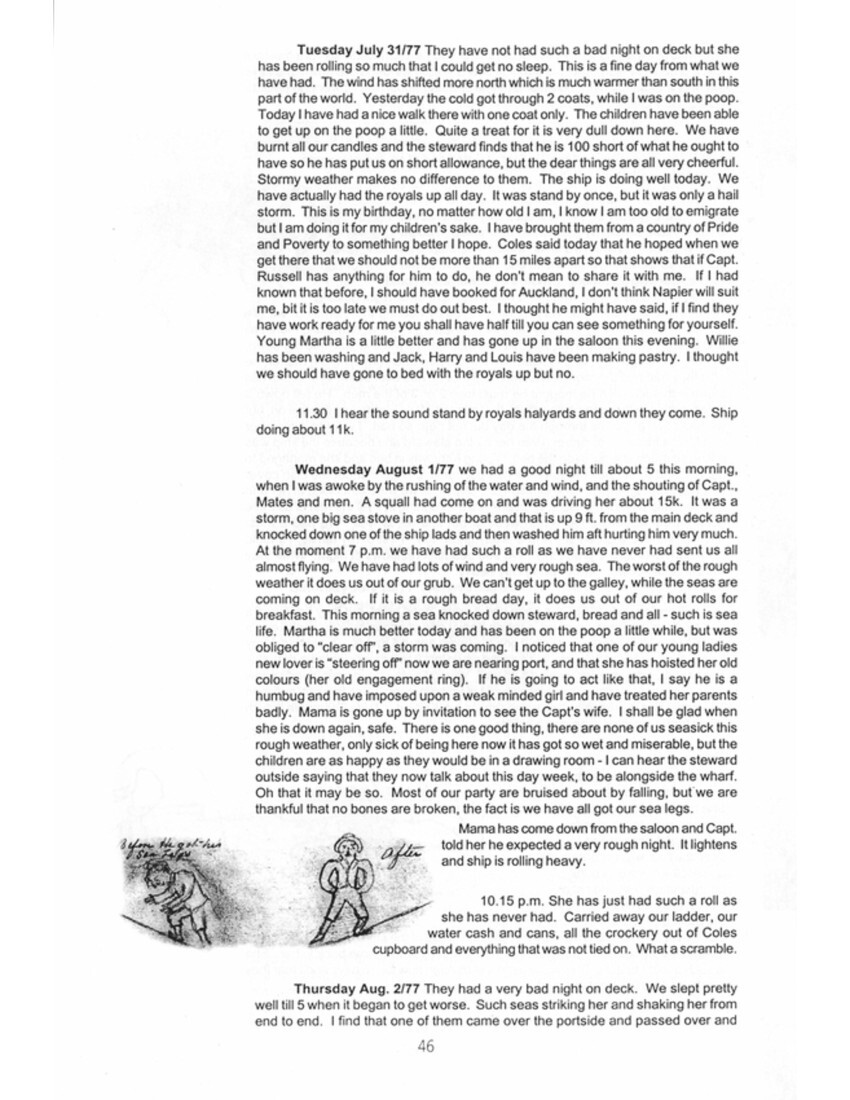
Page 47
knocked down one of the ships boys that was taking our “burgoo” to the galley and carried away yards of the of the starboard bulwarks. We lost our “burgoo” and tin can over board and almost the boy. We have orders that no one is to come on deck. They need not trouble about that. We have been running under 2 lower topsails only. They are so small that they never take them in, they let them blow away if they will. At noon it got much better so that they opened our hatch and gave us a little fresh air and we men could go up. The Capt. asked me how we were getting on down there. I told him as well as we could but the worst part we were in darkness half the day (we have the “dead lights” in our sleeping place). He said that he would give the best part of £100 if he could land us tonight, but I don’t believe that. Scotchmen are too fond of their cash, that was only figurative. It seems Clara was very frightened last night, altho’ she has a nice comfortable place. She can hear more of the shouting and the storms than we can down here. I have just heard the Mate say that he saw a sea this morning the biggest ever he saw. It was as high as the foreyard. He says that this is the finest evening we have had these 3 weeks, but she is now rolling very heavy so that I can hardly write this.
11.30 the ship has certainly got up her royals so I suppose they expect a good night. 13 weeks today since we left all we loved and since then we have been more than 13,000 miles.
Friday August 3/77 We have had a beautiful night and now here is a beautiful morning. Mama and the boys have been washing clothes and George and I have scrub’d out our berth for the last time I hope. Harry have scrub’d our carpet and mat and all hands have had coats, dresses, boots etc. on the poop to dry – all the children have been able to run about again on the poop. The deck has always water on it as it now comes through the broken bulwark. All hands are well and cheerful again and the ship looks all alive again. I have taken our dear Kitty up today first time these 3 weeks and she did enjoy it as much as anyone. The ship has had all her sails up all day and has now. She has not been doing much, but I would rather be 2 days longer than have such rough weather. They say now, we shall reach Auckland this day week. That will do nicely. I always reckoned 14 weeks. I don’t think we shall sight Tasmania. I think we have passed it because I see that we are steering N.E. What a mercy here we are 10.30 a beautiful starlight night with all sails set and going about 10k. We hope to have a good night. All hands singing once more.
Saturday August 4/77 Oh what a change a few hours makes on the Ocean. Here we are again this morning with much wind. Nearly all the sails taken in and the ship all over on one side rushing along. They say sometimes 15k. They sighted Tasmania but before I could get on deck it got so thick that I could not see it. This is our dear Kathleen’s birthday. It is too rough to make her a cake. I want to remember how she shakes her head for no, no, scolds the naughty boys and girls, shakes hands and knows how to call me dad, dad and her ma, ma. The ship has a most peculiar motion. She is pitching and rolling and you have a job to keep your legs. It lightens again this evening which is a very bad sign. Our nice clean place have been covered with water again today.
Sunday August 5/77 The seas have been washing over us all night. The water has been rushing down here so that we have 3 in. of water in our berth and can’t get up. We thought that there was something very dreadful going on, on deck and about 12 p.m. the steward came into our berth, white as a ghost and told us that she had almost foundered. Then the first Mate came in and told us that he was on the poop when the Capt. came up and he was just telling him how they had just escaped a very big sea. The next moment 3 tremendous seas came on board together and filled up her deck. They felt her sinking and the Capt. said she is going down. The Mate said, no she rolls and we were saved. Then they looked for the “watch”. They were all underwater. The Mate said to the Capt., I fear the watch
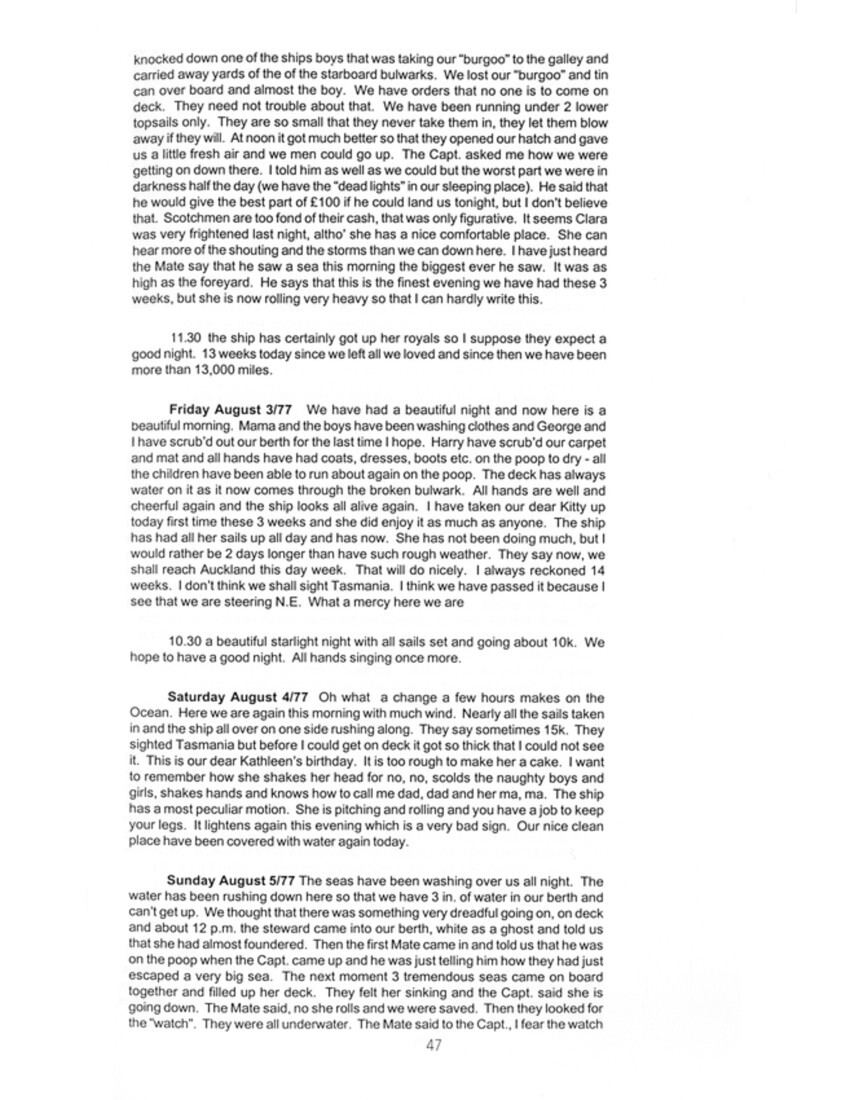
Page 48
are gone Sir, when they saw the first man come out by the fore rigging. One was washed into the sheep pen and one up on the bridge who just held on to a rope yarn or he must have gone over. Directly the Mate found she rolled he rushed on the deck and tried with the steward to knock away the bulwark and as soon as they could get the men together they hove her to. It would take the remainder of this book to tell the damage done. It broke away the bulkhead in front of the saloon, and washed some of the planks right inside. It washed poor Clara and Capt. wife out of their bunks and filled the saloon up about 4 feet. Many things were washed out such as boots, clothes etc. and what is left is all spoilt with water. Poor Clara nearly died with fright. It was bad down here, but much worse up there. After the danger was over the Capt. sent us down some port and sherry wine and some soup. We had no breakfast and the poor little children were begging for food, but oh, what a narrow escape. What a mercy we are here now. The Capt. and Mate both say that they never were so near a watery grave or had ever seen 3 such big seas. After they hove to the 2 Mate called down to us, “cheer up we are safe now”. Our boys have been helping the men clear the ropes and pump the ship. We had our breakfast and dinner together about 4 p.m. and got up about 6 p.m. I have not been on deck but they tell me that everything looks like a wreck and the ship looks like a raft. They have put her round again and heavy seas are coming on deck but I pray that we may have a better night – we have had reading and singing.
Monday August 6/77 We have had a pretty good night but they have had a rough one on deck strong wind and heavy seas coming on deck. This is a fine morning but a very strong wind as much as they know what to do with. Ship is rushing along at a great speed. There is a sight on the poop, it looks like “Petticoat Lane”. There are coats, frocks, boxes, medicine bottles, boots, beds and bedding, carpets, mats and in fact everything that was in the saloon. The Capt., his wife and the carpenters watches are full of water besides lots of their boots and clothes were washed away overboard. I was talking to one of the old sailors and he said it was what they call a Southerly Buster. He said there were 3 seas in succession and that if she had not rolled as she did we must have gone, in fact he thought we were going, he said we have a very bad cargo (Iron rails) and that she is loaded 12 in. too low. He had been many years to sea, but yesterday was the first time he was frightened. I saw where they tried with all their might with a heavy axe to break away the bulwarks but could not, yet one sea the other knocked away yards with one blow. It is wonderful to see what mighty things the sea can do. A man told me today he had seen the sea break 3 in. iron bars like a carrot. Young Martha have been making a new “Sou.’wester” for 2nd Mate and a hat for one of the little girls. I was glad to hear her say that her sight has got very much better with the voyage. It was very bad at home, in fact, she had to wear glasses. Harry has been helping in the saloon and Capt. wife gave him 1/-. Mama and boys have been washing. The wind and seas have got stronger and at this moment.
11.p.m. she is taking over the big seas which sounds like thunder. If spared we expect to be in Auckland about Friday or Saturday. I noticed that the officers were dressed up in what dry clothes they could pick up. All their chest of drawers and boxes were full of water. “Cabin Jack” had on the Capt. shirt and trousers which fitted him too much, the Capt. is short and thick and he is long and thin. He got wet inside and out yesterday. Just now the seas are coming over in quick succession, I fear they must heave her to. I hope not but if they must, that they will do it soon enough and not run the risk they did yesterday. The 3rd mate was taken ill tonight. The Capt. thought he had been drinking but he had not. He was under water yesterday and altho’ they look like iron men I find they are only human and suffer by being so much knocked about.
Tuesday August 7/77 We have had a dreadful night as I had expected. The ship has been rushing along at 12k, but is not so fast as the seas travel and they have been coming over her almost every moment. Mama woke me at 3.30 and singular that we had both dreamed that some harm had come to our dear Addie,
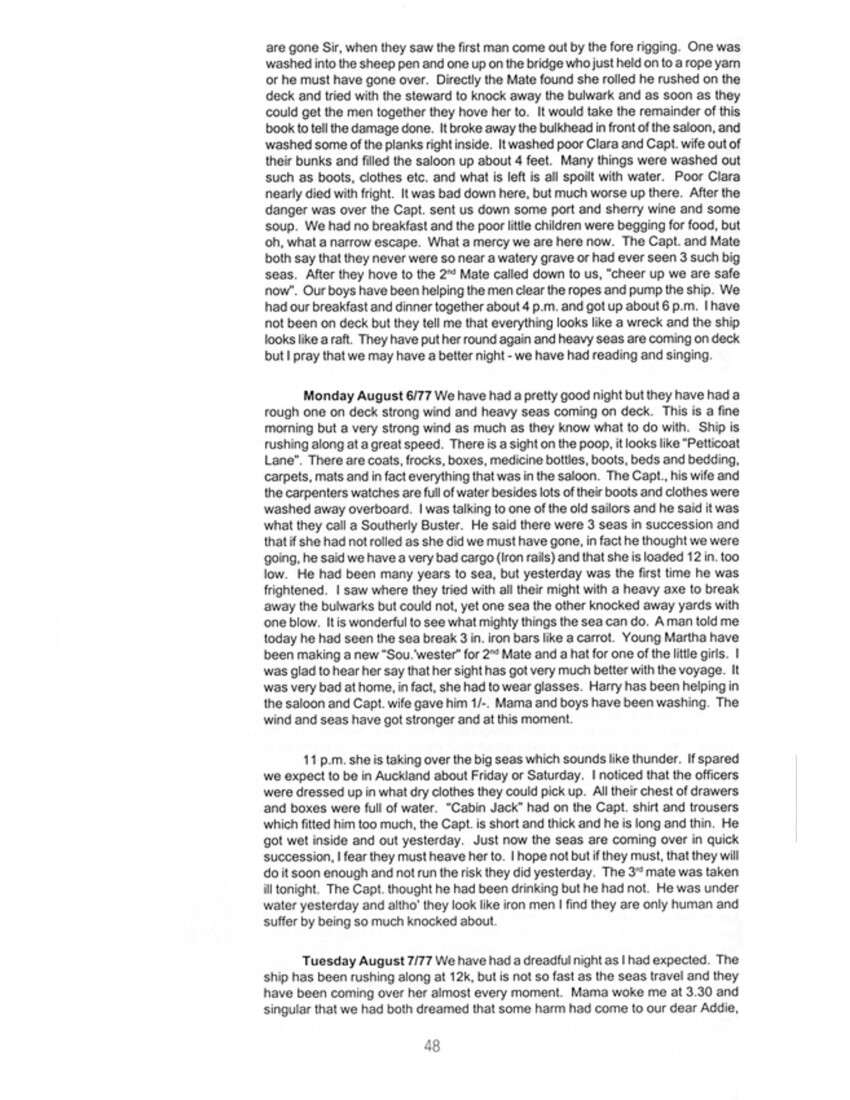
Page 49
but it was the sound of a big sea that awoke her and there we lay tossed about with no light outside in our dining place now, because they are all used up. We could hear the others of our party talking, frightened. Presently young Louis came in and said he could not stand this much longer and then about 7 we heard a terrific crash and then a whistle and then the order “all hands lay aft”. We soon heard that the deck had been filled again and had rushed into the saloon, but not quite so bad as on Sunday. Poor Clara was up to her knees in water again and the Capt. Wife floated in her bed. Jack was sleeping in the saloon but he sleeping in a top bunk and so escaped and got up and helped all hands to bucket out the water, then the Capt. was taken with the cramp and we lent them some dry blankets. They “hove the ship to” again and the wind and sea have been so high. They have not been able to let her run again yet.
10.30 p.m. I hope they won’t all this night altho’ this will delay us much. Clara and Coles are so frightened that they worry the Capt. He says he won’t have them in the saloon and that they must come down here again. I hope not. The ship is rolling about now and her deck is covered with water but they say she is as safe as she can be, hove to. I am surprised how well Mama and young Martha stand it and they are surprised themselves. We pray God to give us nerve for the sake of our dear ones. The big boys do all they can to help us all, but I see they are very anxious. We are only now about 800 miles off Auckland. Oh, that we were there. It was a mistake to come this time of year and in so deeply laden a ship, but we are here and cannot run away. Our trust is in Providence. 12 months ago this day this ship when off the Leewins Point nearly filled her saloon with water and lost a man over board from the royal yard. I think I have noticed it farther back, this day, the 2nd Mate who was in her then, was nearly lost. A sea came through the broken bulwark and nearly lifted him over the top rail, only he caught hold of a rope. I can hear the wind howling now, but I pray we all may have a better night. Nearly all the poor officers and men have something the matter with them by being knocked about so and having to lay down in wet bunk and wet clothes.
Midnight They are putting her round, I hear the men singing “Throw the man down”. We are not gone to bed yet. We are waiting for Jack, Willie, Clara, Annie and Ada to come down from the saloon. We can’t tell what makes them so late. We fear that poor Clara may be worse. We are fastened down so as to keep out the water.
Wednesday August 8/77 We have had a few hours good rest and now here is a beautiful spring morning. There is a heavy swell and the ship is taking much water on deck, as there is nothing to stop it rushing through the broken bulwarks. The poop is like Petticoat Lane again this morning it is covered with things taken out of the saloon again. We have had a nice warm day. I have not put on my coat today and some of the children have been able to walk on the poop. There was nothing the matter with Clara last night more than usual. The girls were kept late by the sea coming over. All cheerful again today and the Capt. is better. The ship has not been doing much today, but not matter she has been nice and quiet, they have been pumping a good deal today. She is a very tight ship but lots of water have gone down off the deck among the cargo. There must be lots of goods damaged. There is a lot of drapery goods in wrappers such as mantles, bonnet- shapes etc. which must be in a bad state. We see more every day the danger we were in on Sunday. It only wanted the turn of the scale. It is a wonder to all hands. We have royals up again and it is a beautiful night, we hope to have some peaceful rest and oh that we may have a few fine days, is my prayer.
Thursday August 9/77 We had a beautiful steady night and the ship has been going fast. It is a beautiful morning. A strong wind and small sea. Ship with all sails set and going 11k. Wind have got stronger and they have taken in the royals, two stay sails. Sheets carried away and a block fell on deck but hurt no one. The other day a block fell down on the poop close to the Capt. and was a 49
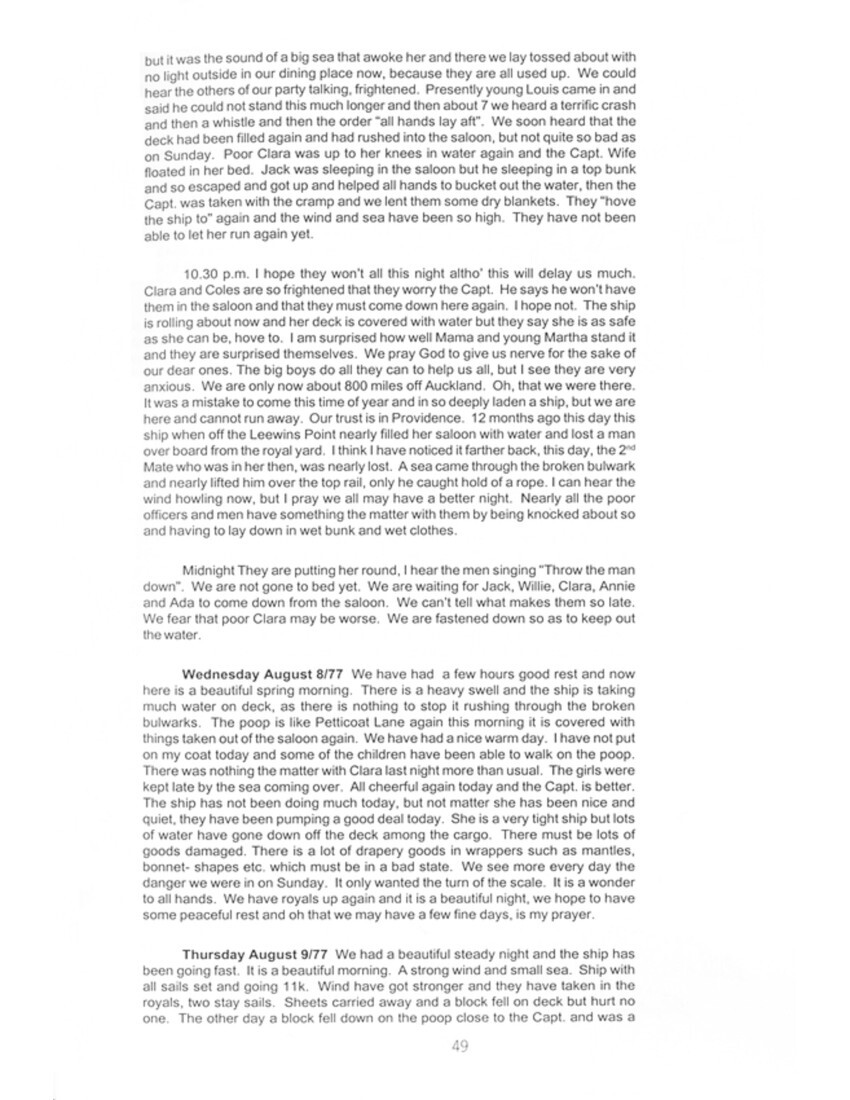
Page 50
mercy it did not kill him. The children have been on the poop today and our dear Kitty was delighted for my taking her up for a couple of hours. I noticed our Young Alfie (Bosun) coiling up the ropes today as handy as a man could do it. Mama has been washing and I have dried a nice lot of clothes. Willie has been cleaning up berths and our dining room. It was filthy, after having 6 in. deep of water in it. The wind is very strong now.
p.m. but the sea has not risen and she don’t ship the seas more than one every 1/2 hour. We hope to have a good night and if she keeps up this speed we may sight land tomorrow evening or Saturday morning and then we may get into Auck. sometime Sunday. I pause to take a sketch of a poor mans wife who has gone wrong while I have been writing and who you can see looks very “Bunkey”. 14 weeks today we left our homes to seek a better, I hope the “Game will be worth the Candle”.
Friday August 10/77 We have had a very quiet night the wind have drop’d and now here today we have a calm. The ship has been doing almost nothing. It has been a splendid day as fine as we have had through the voyage quite a yachting day once more. All hands well and happy. Mrs Thomas (I was surprised at her) and the girls had kicked up last night. Mrs. Thomas was leader. They crow’d like a cock, brayed like Asses and mewed like a cat, barked like a dog etc. to the very great annoyance of some of young gents who they woke up with their noise, it being past 12 midnight. We got to bed with a calm outside, but a storm down here.
Saturday August 11/77 We had a good night as far as the ship and weather was concerned but the wife was kept awake all night by the children opposite crying so much the ship has been going very slow all night but before I got up I could feel by the rush of the water outside that she was doing something better than she did yesterday. She has been rushing along all day and if she had done the same yesterday we should have got in Auck. tomorrow. They expect to sight the “3 Kings” somewhere in the night and then with a fair wind we should get into Auck. in about 16 hours. We have had some rain today and the wind drop’d so much at tea time that we thought we should be becalmed again, but it suddenly rose again so much so that I heard the Mate say he hoped it would rise to a “Black North Easter’, which happens on this coast about 4 times in a year and are very dreadful but just now.
10.30 we have a strong breeze and the ship is doing well and we hope to have a good night.
Sunday August 12/77 We had a good night and now we are called on deck to see the first N.Z., land of the starboard side.
I think it was very clever to come all these thousands of miles and then to just drop on these Islands like this. Later in the day we lost the 3 Kings and came down on to other land. We have to go round the N. end of all this land to get to Auck. which is the other side. Ship has not been doing much all day, but the wind is fair at present and Capt. says would take us right in sometime tomorrow? Saw some sea weed floating along, the 2nd lot we have seen all this way. We have had a beautiful day and now we have a fine moonlight night.
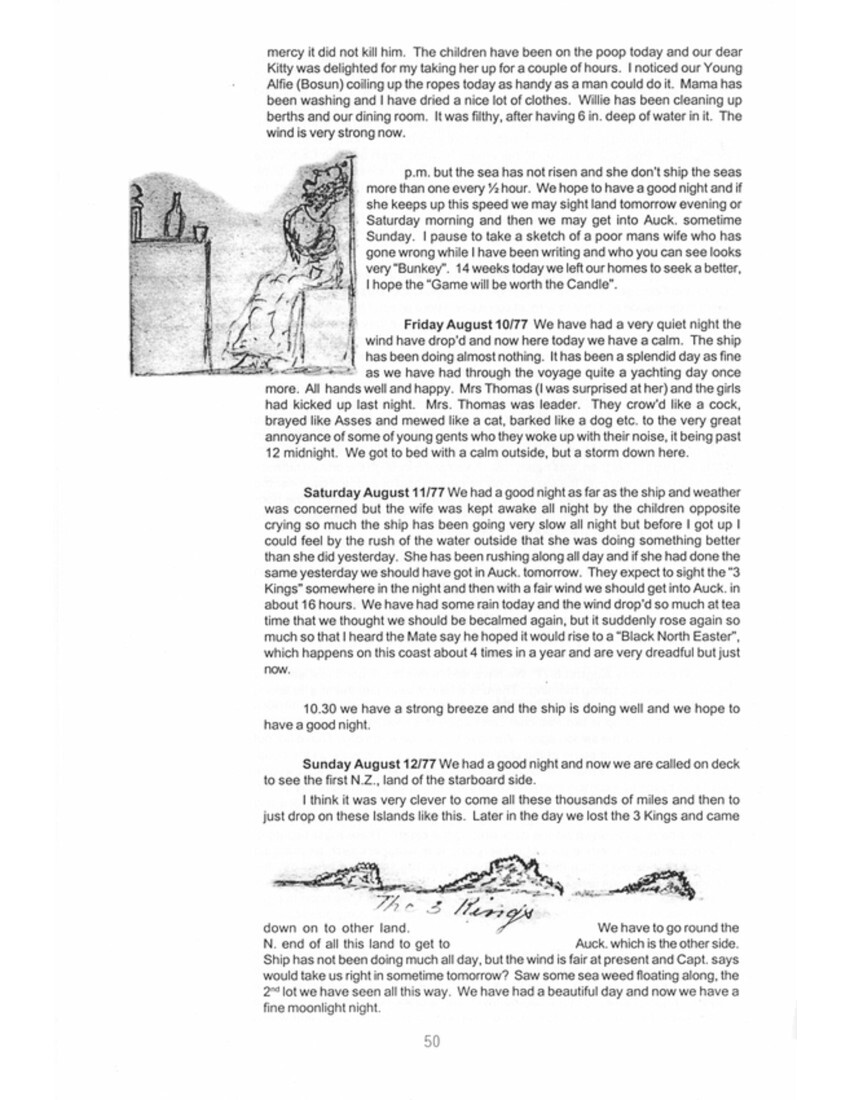
Page 51
Monday August 13/77 We had a good night, ship very steady. They had a rain storm in the night for about 8 hours, oh such rain, wet you through in 2 minutes. It changes the wind to heed wind so that we are “hard braced” and hardly on our course. They got astray somehow through the night, the compasses are gone wrong through being close to land. We have a splendid day and the everlasting circle we have been in all the way looks larger than ever it has. It looks quite 20 miles each way, in a storm it don’t look more than 500 yards. We are round the Auck. side I think by the sun setting over the bows for the first time. Another rain storm at tea time brought more wind and now we are rushing along somewhere about 11k. Head wind all day so that we have had “bout ship” twice. They say she is now on her course but it is very uncertain when we shall get there. The ship is always very steady when “hard braced up”. The wind presses her one side and the water the other, so that she seems fixed and best of it, don’t ship much sea. Martha have been helping 2nd Mate fix his cabin with new curtains, carpet and some say they expect a christening on board, I hope not. Young Lou got on deck this morning before I was up and helped the men. When something carried away aloft and a piece of iron struck him on the head, a block came down and struck one of the men on the back rather badly. We hope to have a good night and see some land tomorrow.
Tuesday August 14/77 We have had a good night.
6 a.m. All hands on deck to see land and we go up and find that we have had a very narrow escape from running into rock. “All hands about ship and sharp about it” and I don’t wonder that we got so near coming on to them for we are surrounded with rocks on all sides and ends of the ship from the size of our I. Of White, down to the size of a gate post. Here is the Great Barrier, little Barrier and Hen and Chickens, 3 Knights and lots more. We have been all day tacking ship (for we have had a head wind) in order to clear them. This is the place to try a Capt’s skill. He have had a hard days work, up and down the poop, then his charts, then giving orders, in fact the most excitable and pleasurable day I have had. It is worth coming all this way to see these wonders of nature, to see their wonderful shapes. There seems not place to land if we were to run into one. Their sides are perpendicular with the water just like the back of the Isle of White in England, dozens of great grey monsters all barren except the Great Barrier. They say there are 1400 white people on that. I noticed that our Cape Pidgeons, Molly Hawkes and Albatrosses have left us. They have followed us all the way from the Cape. Last night we noticed that they seated themselves on the water and drop’d astern but we did not think then they were taking a last farewell. Now we have two other kind of birds, one is very much like an English Rook the other like our sea gull. They flap their wings I notice and don’t sail along so easy as the others did.
11.15 it is all excitement tonight. The cook has to be in his galley all night to give the men coffee every 2 hours. Our George and Willie Coles will keep him company. They have been cook’s Mates for some time. They will long remember how often a big sea have come and washed them and the cook out flying. I don’t think I should have gone to bed tonight, seeing that we are surrounding with so much danger and the moon just going down behind a grey monster, only I hear the man on the look out, give the word “light on the starboard bow, sir’ and now I am comfortable.
The Capt. has just told me that he has had to do his best today to keep clear with such a head wind. We have had a very strong wind but a smooth sea and the ship has been as steady these 2 days as if she was in a vice. She
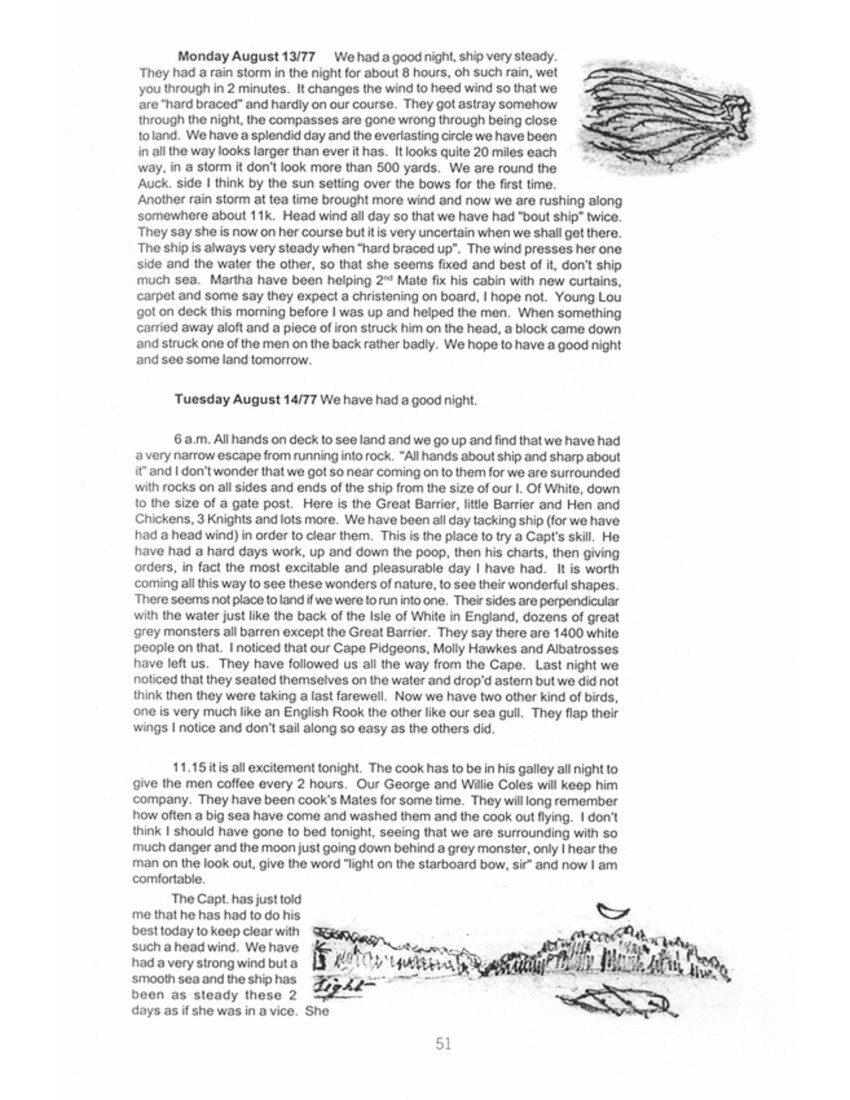
Page 52
is braced up so sharp on each tack that she can’t roll and there is no sea to make her pitch and at this moment.
12.15 you would not believe that you were afloat. I am the last one up tonight down here and now I go up to take another look and then to bed thankful for that Great Mercy that has brought me and all my dear ones through so many dangers. The light I mentioned above is 15 miles off and when we get there we have 15 miles further to go, so that if all is well we shall surely get to Auck. tomorrow,
Wednesday August 15/77 We have had a quiet night but I have not had a wink of sleep. I am getting anxious now about how we shall get on in this country. We have been tacking about among these wild islands all day. We make a long reach and then we come nearly back again to where we started, so that we don’t gain more than 5 miles for every 50 we travel. It has been a pleasure to us to help the men “bout ship” and to see this beautiful scenery. The pilot came on board at 4 p.m. and took charge of the ship to bring her in. We drop’d anchor at 9 p.m. in Auck. harbour. The Agent has sent us 50 lbs of beef, potatoes and cabbage. The steward gave us some rock oysters. You would not take them oysters, they were the shape of small lumps of coak. They were beautiful. The reporter of a newspaper came on board to take account of the voyage to put in the paper tomorrow. This is a beautiful harbour surrounded with Islands. The South Island is Auck. which looks very pretty from the ship. It slopes down to the sea and the houses are built down to the waters edge. The North Island is inhabited by people well to do, by the look of it. I have had a very bad account of Auck. tonight. I find it is over done, so we think it well be better for us all to go to Napier.
Thursday August 16/77 We have had a beautiful day and have been on shore and had a look at the City. There are some very fine shops and some nice little shops. Most of the goods are as cheap as they were at home and the rest are very much cheaper. I bought a nice hat for 8/6, the same price as they are at home. We have had an abundance of fresh meat, cabbage and beautiful potatoes. Meat is 2d. lb., potatoes 4/- a cwt. In fact they tell us you live here cheaper than in England. I saw Mr. Wyatt today, he did squeeze my hand, he looks as young and much better than he did when he left home 15 years ago. It cost him £281 to come out. He might have been much better off I know, only he has the old complaint, he sucks too much. This is the last night we shall have on board. We go to the Depot tomorrow and wait till Monday and then go down to Napier.
Friday August 17/77 We came to the depot this morning. It is rather rough. It has been an old Barracks, but we have plenty of good food and the best of it, we are all by ourselves again. Mr. Buckler, son of the Bucklers Grocers, Warblington St., Portmouth called to see me. He is another that may have done better only for the drink. He has had good situations as Draper, as much as £4 a week, but can’t hold them. Have another look at Auck. and the more we see of it the better we like it. The Mates and some of the men have been up to see us and we go to bed with no fear of the ship rolling.
Saturday August 18/77 It is beautiful weather here, such as we never saw in England. The boys went out this morning and picked as many water cresses as they liked. We can look out of our window and look all over Auck. It is very much like Ridge Isle of White. We have mountains inland and the harbour and mountains on the other side. We are all delighted with this wonderful scenery we could never dreamt of such a place. The dear children have a beautiful place to run on and they look as fat and happy as possible. The Mate have been up and took the girls out and then brought us home some oysters and we keep it up till 12 o’clock. Capt. & wife called to see us today.
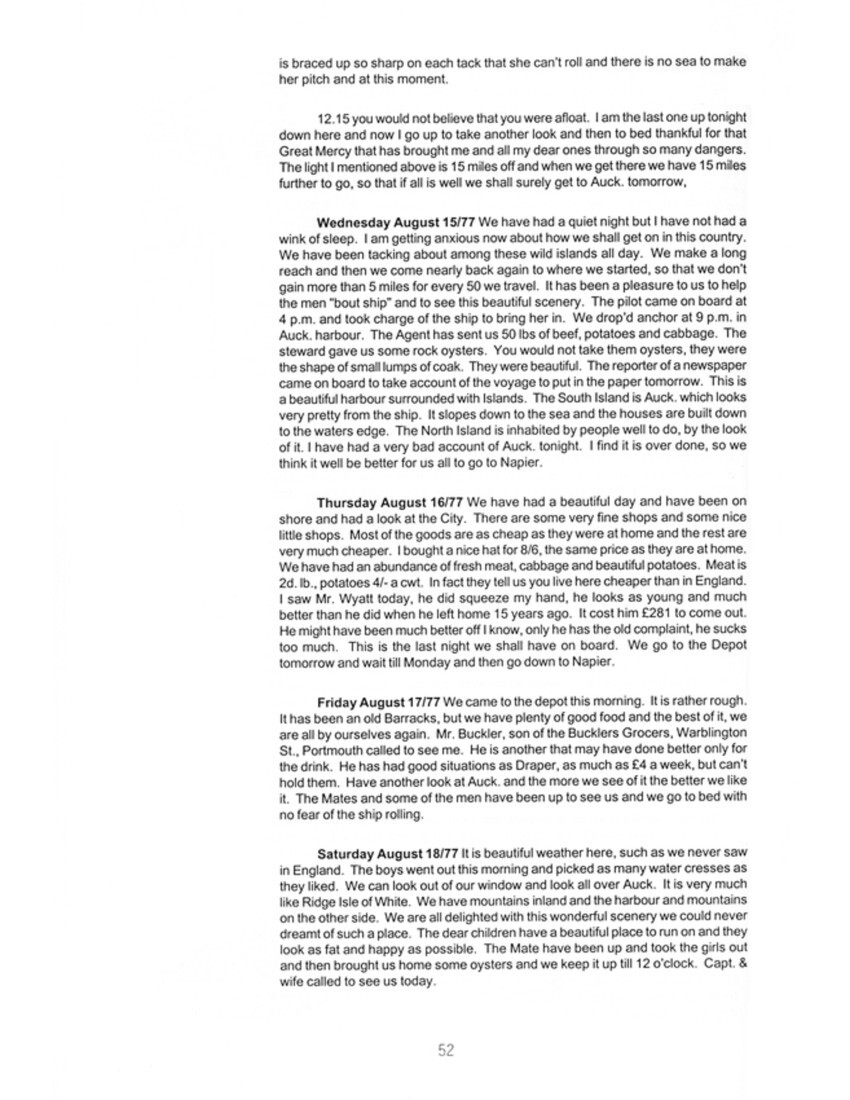
Page 53
Sunday August 19/77 More beautiful weather. I hung up the beef to roast and went to Chapel. There are collections every service and I got my 3d piece ready but when the plate came round, I saw that there was only 2/- piece and 1/- so I was ashamed to drop my 3d. piece in. I noticed that none of the gentleman wore gloves. I wore a nice pair of trousers and waistcoat I brought last night for 25/- really good. Took the wife up into a place they call the “Domain”. Oh what a beautiful place you walk round and round, up and down among the most lovely trees and ferns. Birds that were brought from England singing and the views inland and seaward, I cannot describe, this is “Paradise found” at last. Mr. Binsted who used to rent Portchester Castle called to see us this evening. Avery nice man and his 3 sons have got on well. They have bought him the house he lives in and keep him and 2 or 3 daughters. They have all had good health here. The 3 Mates, some of midshipman, steward carpenter and cook have called. We leave here with very much regret tomorrow at 4 in the “Southern Cross” for Napier. Some say trade is better there than here and some say it would be better for us to stay here. They all say that there has not been 2 such respectable and fine families landed here for many a day. They wish that the early settlers had been of the same class.
Monday August 20/77 Got all our luggage on board “Southern Cross”. We find that young Mr. Binstead is the steward, lucky for us. The Mates and others came and wish us good bye. Mr. Findlay has asked Edward for the hand of his daughter Clara. We are much surprised. He seemed to be making love to Annie all the way out until the last few days, when he turned over to Clara. We shall be very surprised if it is genuine. We have beautiful views going out the harbour. Mr. Binstead has put the 2 wives, the girls and children into the saloon. You should have seen them at tea. They had the best of everything, meat, fish, jam, toast etc. They and we are delighted. They will sleep in the saloon. We big chaps had a good tea down “aft” plenty of meat, sausages and stew. This steamer has a strange motion to what we have been used to but as it is very fine, none of us has been sick.
Tuesday August 21/77 I have had the best sleep I have had all the way out. We have had some sport with the Rats. I saw them last night, but said nothing about it to the boys or I knew I should have no sleep.
There was a row this morning when they first saw them. We have all had a good breakfast especially those in the saloon and now we are off the “Burning Sulphur Mountain” in the Bay of Plenty. It is a grand sight. The steward has just given us some oysters and the children some oranges.
We have just seen a green rainbow. 3 or 4 shades of green. We have all had a splendid dinner. The ladies and children have had, soup, fish, mutton, beef and poultry. We are keeping in along the coast except when we cross a bay from point to point. The scenery is magnificent. I should enjoy it more only I have a bad attack of dysentery. We are having a very smooth passage and this is the most enjoyable part of our journey.
Wednesday August 22/77 We have all had a good breakfast and now we are off a beautiful part of the coast with high mountains covered with snow, and which they say is not far from Napier. We got off the Bar of Napier at 3 p.m. but there was not enough water for the steamer to go in. We were taken ashore in a steam launch. There was the Agent and the Master of the Depot to receive us, but my impressions on first landing was something awful. They put the females and
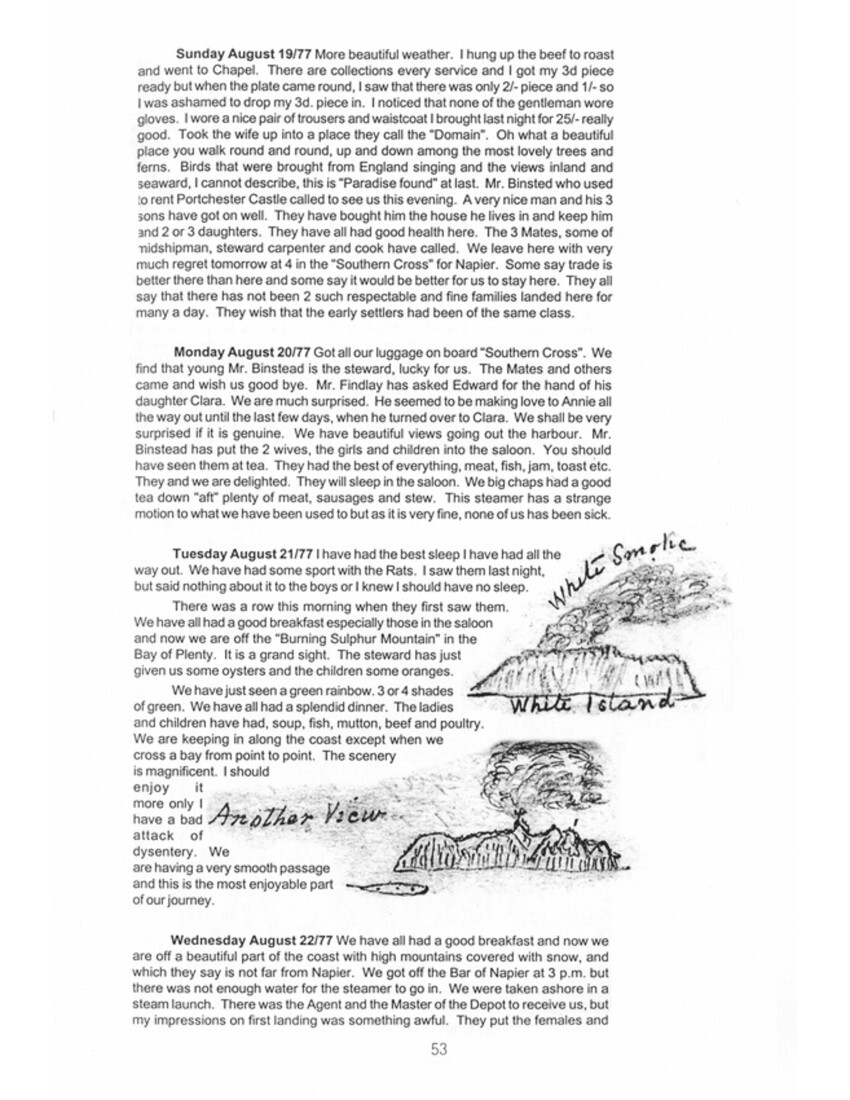
Page 54
children in 2 traps and we boys had to walk up a very high hill. When we got there they brought us plenty to eat and seemed to think that they could get us all (the Cantles) into situations. They had a letter from Mr. Bridge up country, to forward Edward and his family to him. I am sorry to part so soon but it is not more than I expected. This is a beautiful place. You cannot turn your head but you have a fresh scene. It is all hills and such hills and dales. We had a nice walk into town and saw Mr. & Mrs. Mayo niece of Mr. Smith, Kings Rd., Southsea. Found them very nice people. They promised to try and get us something to do. The Master of the Depot went down with us and I found him better than I expected. He knows everybody in the town and will try to get us work to do. It is a much better town than I expected to see. Many large buildings of wood, but I had to try it with my knuckles to make sure that it was not stone and the designs are far better than any I have seen. Thursday August 23/77 We have had a hard night because the beds are on board the steamer and she cannot get in yet. The boys have been out and picked up as many cockles as they could carry. I have been down town again and on the road the Master and I saw a house he thought would suit me. We had a look at it, 4 bedrooms, parlour and kitchen, workshop and bench at the side, stands on a piece of ground 100ft x 150 or there abouts. I wish I may get it, but as the Master says I may stay here as long as I like, I shan’t close the bargain till we get some work. It has a garden in front and rear. The back garden runs up hill higher than the house. There are lots of peach trees, goose berry and figs and flowers any amount. Close to the road and near the town and with beautiful views all round. We have seen such a fire this evening, some hayards burning at a township about 3 miles off.
The Coles Family settled in Ongaonga, Central Hawkes Bay, New Zealand after their long sea voyage from England.
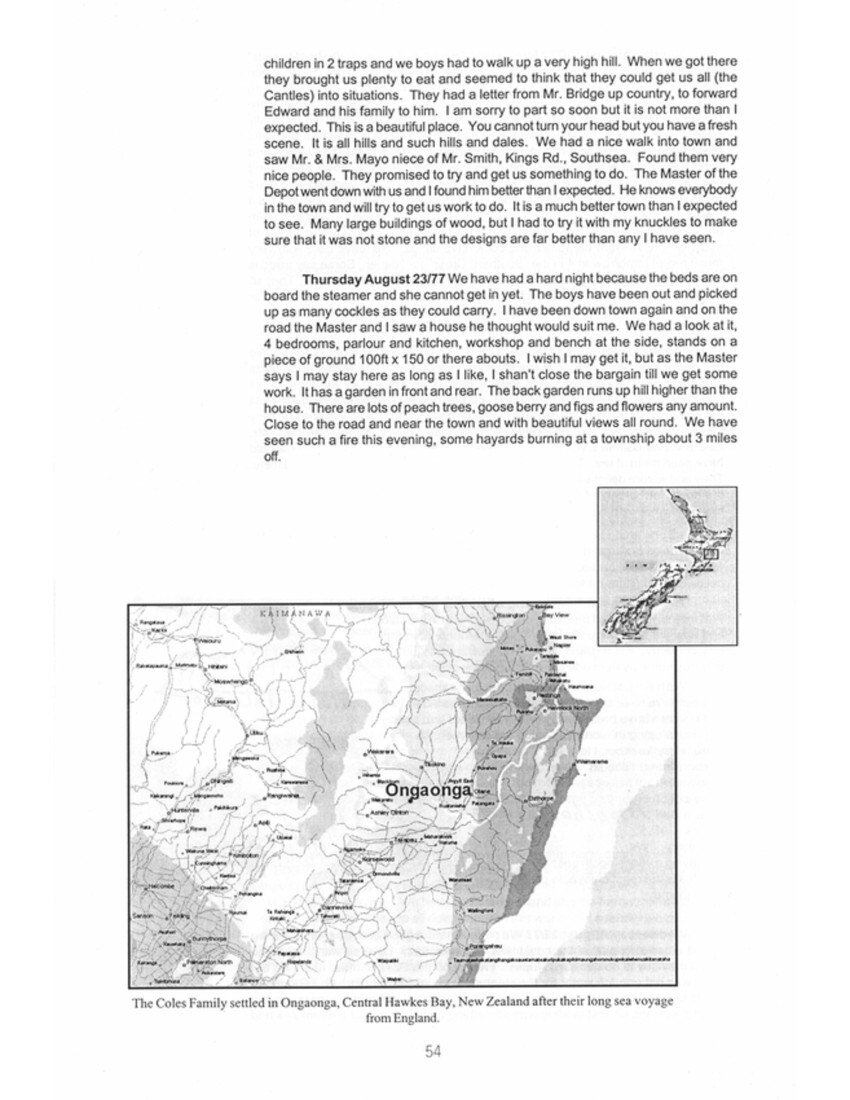
Page 55
THE COLES LEGACY
by Rex Evans
Preparing this history of the Coles family of Ongaonga has enlivened for me the still bones of a delightful little hamlet that grew up with the Coles family and declined with them. Now it is blossoming again as a new generation recognises its worth and strives to preserve its history and its few remaining buildings. Pivotal in this process of re-awakening interest, has been the Old Coles Factory. Built, as far as we know, shortly after Edward and Clara Coles and family arrived here in 1877, it served them for eighty years as a base for their flourishing building business. Eventually, overtaken by progress, Ongaonga, once the hub of a thriving farming district, became an anachronism. Farmers, owners of sleek new cars traversing newly sealed roads, found it as easy to travel to Waipawa, Waipukurau or even to Hastings and Napier to do their weekly shopping. And from the outside, a new breed of builders moved in and invaded the domain that once belonged to the Coles enterprise by virtue of their isolation.
We wish we knew more precisely what we owe to this family of artisans. It is probable that most of the early buildings in the district were built, and probably designed, by them. But if they kept records of their contracts, they have long since been lost. We believe that most of the houses in the village and, probably, in the surrounding countryside were Coles-built; as were the three churches and most of the commercial premises. These latter included a number of general stores, a flour mill and a school and, probably, a hotel. It may still be possible to find sufficient records to enable an inventory of their work to be compiled, but that has been beyond the scope of this present research.
A small window on the early activities of the family is provided by an old ledger and a box of old plans which is in the possession of Mark Coles, Havelock North. The ledger contains records of jobbing work, rather than full contracts and covers a period from 1872, five years before their departure for New Zealand, to about 1900. The plans, likewise, are mostly for alteration work as well as some local houses. Of particular interest though, are two sheets of drawings for a reading desk for the Droxford Church, and entries in the ledger for work done for the Rev Stephen Bridge in Droxford as early as 1872. This may indicate that his son, H H Bridge may have learned of Edward’s skills as a tradesman from his father, the Rector of Droxford. The ledger is difficult to read, but it contains a wealth of information about people, building methods and prices for the period. It shows, for instance, that Edward was charging out his time at 4/- per day in 1872 and up to the time of their departure and that this had risen to 10/- per day immediately after their arrival in New Zealand.
The last recorded entry in the ledger, prior to the departure of the Columbus on 5th May 1877 was for work
Coles Bros factory in the early 1900s
Photo from Ongaonga Historical Society
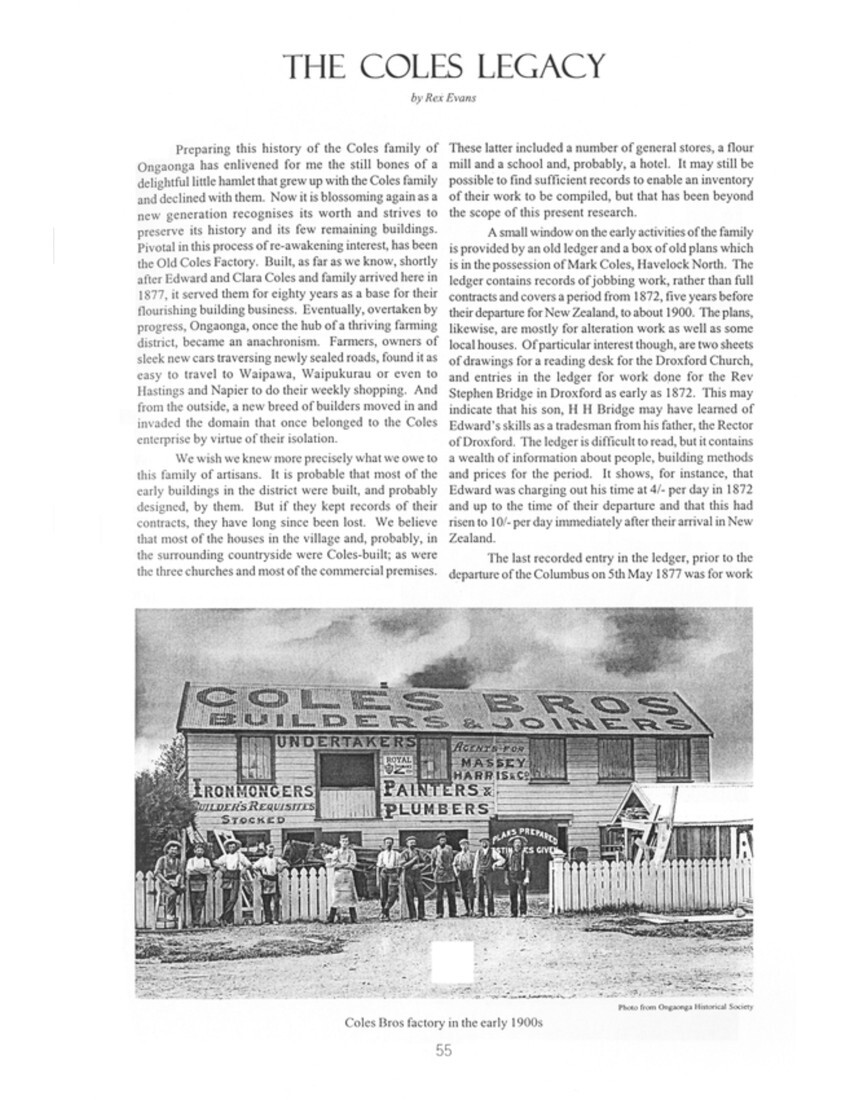
Page 56
The Coles Bros factory as it was about 1950 (above) and in about 1980, just before it was restored by the Ongaonga Historical Society and the Historic Places Trust (below). The photo at left shows the factory in the background but the car and occupants in the foreground have not been identified. Note the reflection in the windscreen of the man standing in front of the car, and the luggage and bundle of trees on the running board.
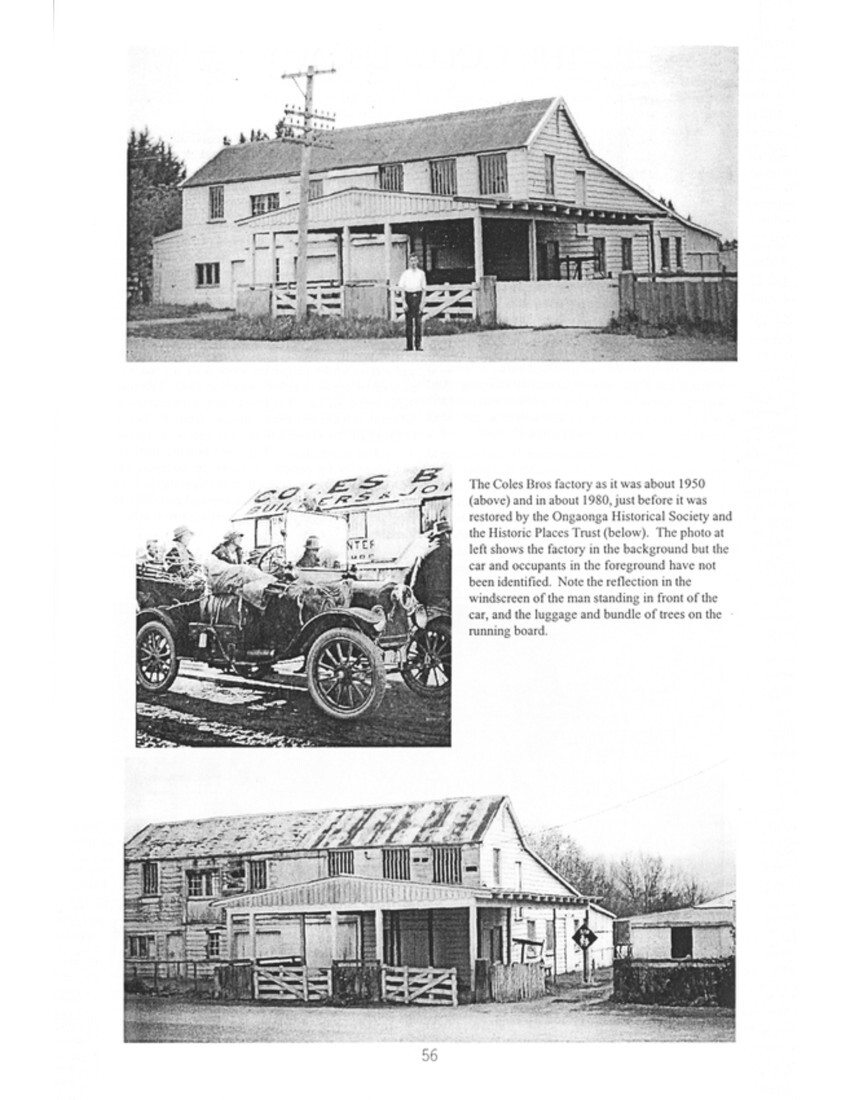
Page 57
Views of the interior of Coles Bros joinery factory taken in the early 1980s, at about the time that it was being restored. All of the photos are taken from the back part of the factory near the rear vehicle bay.
Top: looking towards the west wall where the work benches were located. The position of the well under the floor is near the left hand edge of the photo.
Right Upper: Looking south east and showing the main drive shaft and driving belts.
Right Lower: Looking towards the door in the south wall through which timber was brought into the factory. The trolley in the foreground was used to carry the sawdust box down to the swamp at the back of the site.
Lower: A wider view looking south. The steps to the upper level can be seen to the right of the photo.
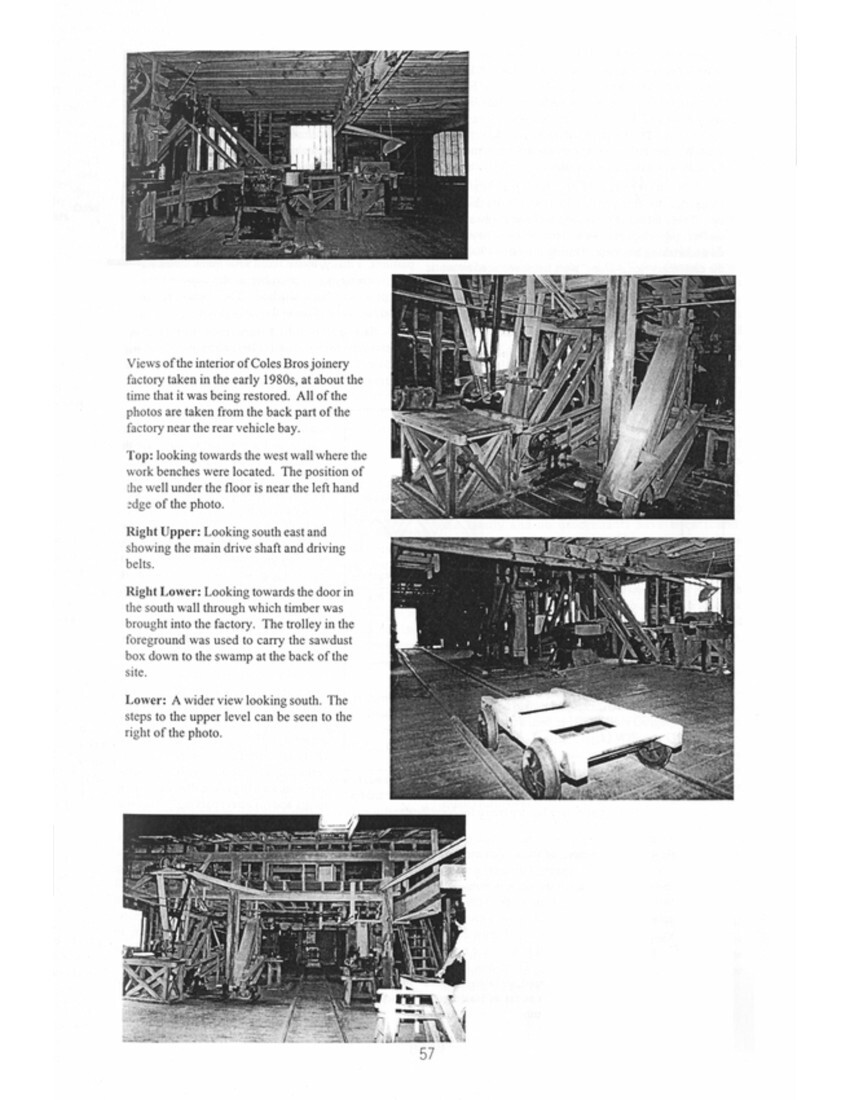
Page 58
for Rev Bridge on 10 April 1877. The first entry for work in New Zealand appears to be for work for H H Bridge in March 1878, building a house and a woolshed. However, the work may have been done earlier than that date as the entry is for 152 days at 10/-, 1574 days at 5/- and 1354 days at 2/6. The latter two charges may have been for sons, William and Ernest as they are in August mentioned by name against charge out rates of 6/- and 3/- a day.
In the heyday of the building business in Ongaonga, the firm provided services ‘from the ground up’. These included surveying, joinery, hardware, paint and wallpapering, glazing and plumbing. They also ran an undertaking business. During the early 1900s, when the customary ‘long-drops’ were being replaced by septic tanks, the Coles’ constructed many of these scientific disposal systems around the district. The consequent improvement in sanitation, it was said by local wags, resulted in a sharp decline in the undertaking business.
The business peaked in the period prior to the First World War. This was a period of rural prosperity brought about by the opening of the frozen meat trade with Britain. But for the Ongaonga district, it was also enhanced by the breaking up of the large stations, Forest Gate in 1902 and Mount Vernon in 1905. This led to a rising demand for buildings as new settlers moved into the district. It also resulted in a rapid growth in the Ongaonga township as it expanded to serve the needs of the growing farming community. The Coles Brothers expanded to serve the growing demand, and also extended the boundaries of their operations as far as Hastings in the north and Eketahuna in the south.
The business declined during the years of the 1914-18 war as young men left to serve in the armed forces. Twenty five local men never returned from that conflict and this left a terrible void in the community which could never be filled. The 1920s and early 1930s were scarred by economic hard times and Coles Brothers, along with most others in the community, suffered severely. Conditions improved again in the late 1930s, only to be reversed with the outbreak of the Second World War. Coles Brothers was still active in the district, but on a smaller scale. The second generation of the family, the sons of Edward Purkis Coles, were themselves advancing in years and the third generation was moving off to other pastures. Finally, by the mid 1950s Frank Coles was the only remaing family member in the business and the enterprise was but a shadow. The doors were finally closed for the last time in the early 1960s.
The old building remained deserted and increasingly forlorn until 1983 when the Ongaonga Historical Society began to take an interest in its preservation. The Historic Places Trust considered acquiring it and commissioned architect Guy Natusch to prepare a report on it. A public meeting was held to guage local opinion and a proposal to purchase the building from the Frank Coles estate, renovate it and use it as a crafts centre was strongly supported. The Coles family accepted an offer of $10,000 for the building and the Trust agreed to pay half the amount with the remainder being raised by the community. Ownership of the building was to be vested in the Waipawa District Council who would administer it through a board of management. However, the Council declined to accept ownership and the scheme subsequently lapsed.
In 1984 the old factory building was purchased by Richard Quinn of Wellington with plans to restore it and put it to use as a museum tourist attraction. He applied to the Waipawa District Council for permission to “establish a house and establish a wood museum, animal park, coffee bar, public toilets and off-street parking”. This was approved. The first step towards restoration was taken when the Quinn leased the building for a year to Greg Frater and Alastair Nugent to operate as a joinery business. The building was later purchased by Greg and Anne Frater who still own it. Later, with financial help from the Historic Places Trust and labour from the Ongaonga Historical Society, the old building was re-roofed, repaired and painting in its former colours. It now stands proud and fresh as a monument to a family that was the cornerstone of a once- thriving community, and as a tribute to a community that remembers its past.
Photo caption – Drawings of a reading desk for the Droxford Church, constructed by Edward Coles just before his departure for New Zealand.
From: Mark Coles
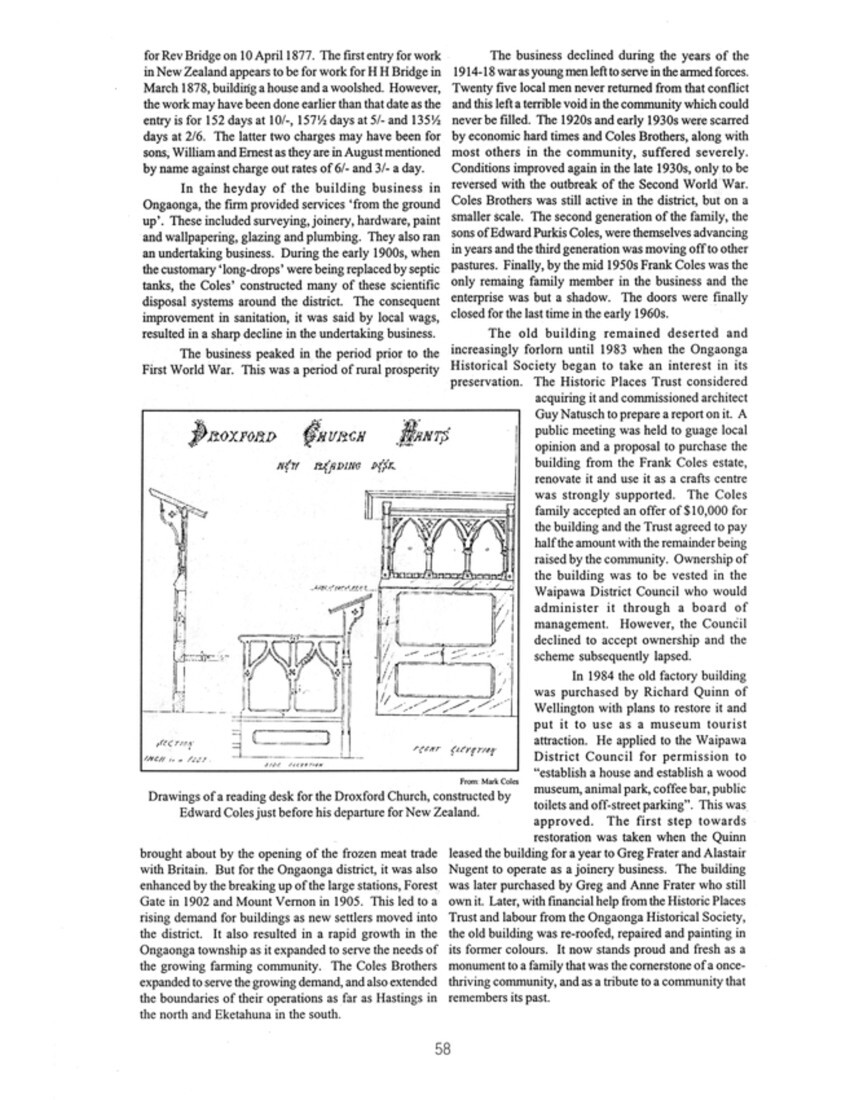
Page 59
In the early days the factory machinery was run by a large steam engine. Its driving force was transferred through a system of shafts, pulleys and belts to saws, planers, thicknessers and lathes in various parts of the shop. Water required by the engine was supplied from a well beneath the floor near the centre of the building. Shavings and sawdust was loaded into a wooden trolley which ran on railway tracks, down to the back of the section where it was tipped into a swampy area and burnt. Fire was always a hazard for the shop as it created such a volume of inflammable material. As a precaution, they used to have a number of 44-gallon drums full of water and lined up along the edge of the mezzanine floor. Fortunately they were never needed.
With the advent of electricity around the mid 1920s, the old steam engine was discarded to be replaced by electric motors and a more modern extract system. The old engine lay out the back for many years, until a scrap metal merchant offered to take it away. All was removed except the large driving wheel which was too heavy to load onto his truck. Deciding to break it up on the spot. he placed a charge of gelicnite in the centre. The resulting explosion blew pieces of cast iron over half the area of the village and several buildings carried scars to remember the occasion.
Edward and Clara Coles along with 12 children disembarked at Napier in August 1877. Their second daughter, Julia, had died in England at the age of 18, some 18 months before their departure, and their fourteenth child, Frederick, was born in New Zealand a few weeks after their arrival. They travelled out aboard the barque, Columbus and a diary of the voyage was kept by their good friend and fellow passenger, William Cantle. William’s daughter, Adeline, later married George Coles and the diary is now owned by their grandson, Brian Coles. A transcript of the diary, along with reproductions of the forty sketches it contains is reproduced in this book by the kind permission of Brian.
The family had apparently been encouraged to come to New Zealand by Henry Hamilton Bridge who had emigrated from England some years earlier and taken up the Fairfield Estate. He surveyed from his farm the sections for the village and put them on the market. Recognising that a good builder would be needed to develop the his township, he apparently sent word of this opportunity to Edward Coles. So, after arriving in Napier, Edward and family travelled south to Ongaonga and set up home and business.
We have not found any records of their early years in the district but there is a suggestion that they lived initially in a house a couple of kilomtres northwest of the town until they built there home on the western side of the factory. It was there that they lived out the remainder of their lives. Unfortunately, the home was built of kahikatea and borer found it very much to their liking. After Edward’s death, it passed though several hands before it was finally demolished sometime in the 1970s.
A year after their arrival the eldest daughter, Annie Clara married Willis Combs and moved south to take up land. Some of their story has been recounted by their son, Harry in his book, Growing up in the Forty Mile Bush, which has been reprinted in this publication by kind permission of members of his family. Clara Jane married in 1879 and moved to Gisborne with her husband, architect William Quigley. Their last two children, Samuel and Alice were born in 1880 and 1881, so the family was still growing even as the elder ones left home.
William, became the senior partner in Coles Brothers, and the others were Charles and George. They married in 1888, 1894 and 1900 respectively and their families formed the heart of the Coles dynasty in the township. Ernest, who also became a builder, has vanished from the family records. He apparently established himself in Wanganui and had two sons but no trace of them has been found. Of the girls, Ada married in 1881 but died just a year later. It is not known what happened to her daughter, Connie. Louisa married William Livick in 1886 and they moved away from the area, their descendants now mostly in Auckland. Kate who married Harry Whyte, remained in the Ongaonga for a time but eventually moved to Havelock where they may have gone into business with Alice, the youngest in the family, and her husband, Frank Glenny. Regrettably, nothing at all is known of Edith who married Jack Hurfit. They apparently had four children but no trace has been found of them. Likewise, Martha, wife of Robert Russell, has been lost to the family and no descendants have been found. However, Mary Jane and Henry Milne, who also left the district and settled near New Plymouth, now have descendants living in Australia. Frederick and Samuel, the two youngest sons, both took up farming although Frederick eventually returned to building. Frederick moved to Hastings and died young while Samuel ended up at Levin. A section of his family are now living in Australia.
Clara Coles died in 1905 although she had been predeceased by two of her daughters. Edward lived until 1915 and his eldest daughter, Annie Combs, died a year later. Frederick died in 1925, Clara Quigley in 1929 and Emest in 1941. Louisa Livick, William, George, Mary Milne and Samuel all died in the 1940s, Charles died in 1959 and Alice Glenny, the last of the generation, died in 1963. However, it is not known when Martha Russell or Edith Hurfit died.
This year the village of Ongaonga is marking its 125th anniversary with a reunion of past school pupils and a village party and Peter and Teresa Coles, farming near Springhill, are the only members of this extensive clan still living in the district. The Coles era has passed, but will not be forgotten.
This history, like all histories, is incomplete. If this book triggers memories of past events, or old photos or other records are found in family archives, feel welcome to send them on to us so that they may be added to the files that we are keeping open.
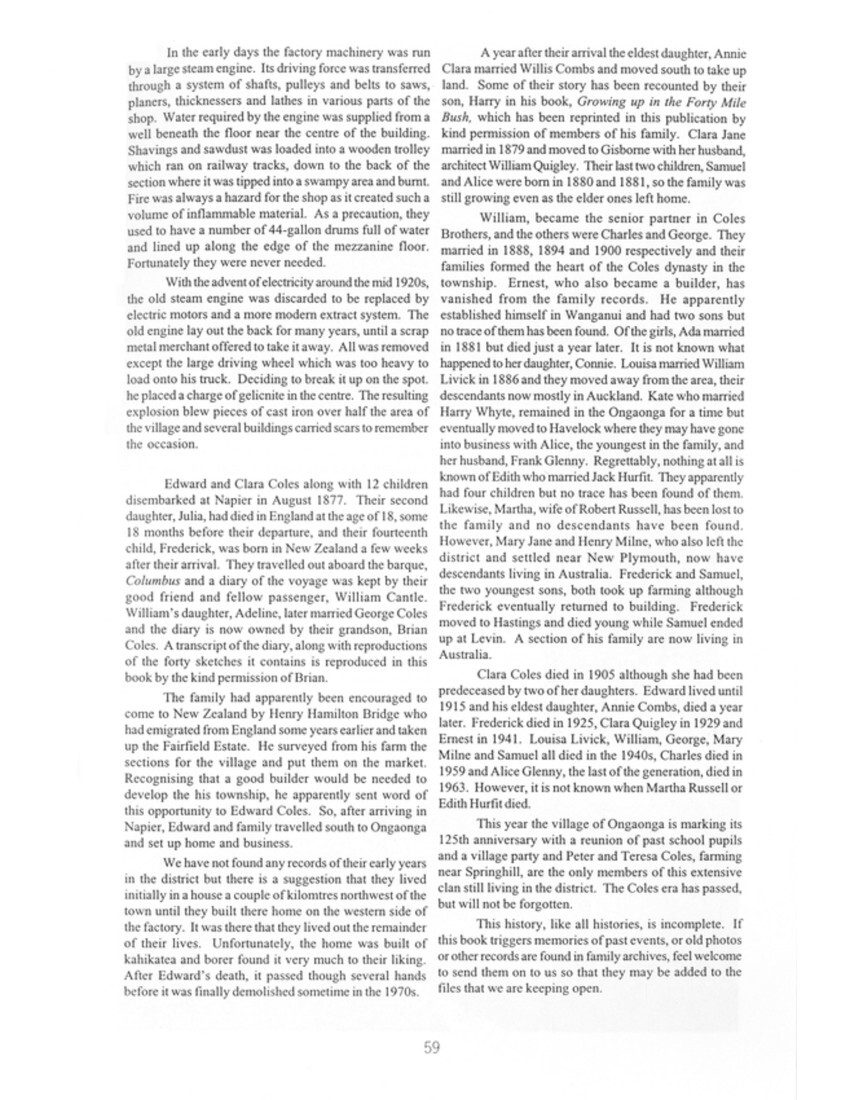
Page 60
Photos from: Ongaonga Historical Society
Above: Looking east along Bridge Street about 1917. The Coles factory is behind the trees on the far left.
Below: The southern side of Bridge Street about 1917 with the Coles factory on the right. The photo is probably taken from the roof of the Presbyterian Church.
Left: Mr HH Bridge, who purchased Fairfield Station from Mr W Fannin in 1865. It was from his land that the village of Ongaonga was laid out. Bridge Street was named in his memory. He sold Fairfield in 1899 to Mr Herbert Watson and returned to England in the early 1901. He married a few years later and had two sons, Stephen who died last year, and Howard who is still living in England.
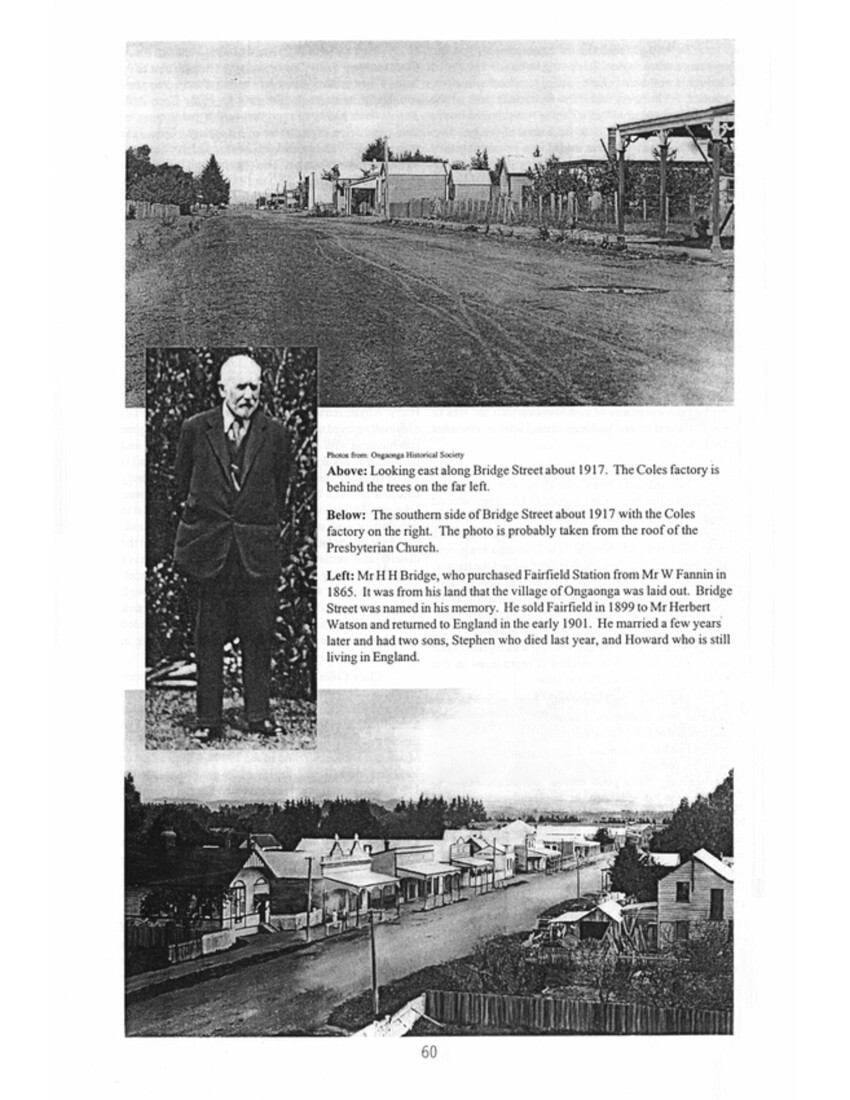
Page 61
The Coles Family in Ongaonga
1. This imposing two-storied house next to the school was built by George Coles. It is on a large section and he had his honey house in a shed at the back. After George died his wife, Adeline continued to live there with a companion house-keeper. After she died it was bought by the present owners, Doug and Shona Simpson.
2. This was the home of William and Minnie Coles who built it in 1888. After Minnie’s death, it was bought by L and O McKay in 1946 who sold it to their son, J McKay in 1985. In 1995 it was bought by R and N Lefort.
3. This was the home of Jack and Annie Coles until just before Annie’s death in 1971.
4. Harry and Kate Whyte built this house and lived here for a time. It was later occupied by their son, Bob Whye [Whyte].
5. This was the home of the Charles Coles family at an early stage. Later Herb and Edith Carr and family lived here. Herb Carr was the local blacksmith.
6. Frank Coles and family lived here for many years. The house was doubled in size in 1933 and altered again in 1946 when the pillars were added. There was a chimney standing alone on the left side of the section which belonged to a bakehouse. It was bought by the Lawrence family in 1993.
7. This was originally a shop owned by Coles Brothers and used for selling hardware and wallpaper. The shop was later owned by Mr Knight, and altered by Coles Brothers for him.
8. Now the Ongaonga Store and Dairy, the Frank Coles family lived in the right hand side of this building. On the left front was a bank which opened on Friday mornings. Behind the bank were three more rooms used as living quarters.
9. This building was erected around 1900 by Harry Whyte as a shop. It was burnt down about 1909 and rebuilt a year later. It was next owned by Messrs Hollings and Gilson until bought by the Simpson family in 1919. It passed through three generations of Simpsons and was managed by Frank Coles for a short time in the 1940s. Ken Twiss owned the store for 14 years from 1948 when it passed to Gavin Helm then Mel Wilson until 1969 when Hugh Reid became owner. Ron and Joy Gough ran the store from 1973 to 1976 and it was then run as Poodles Bazaar until the mid-1980s. It degenerated into a state of disrepair until 1998 when it was purchased by Evagean Publishing and restored.
10. This house was the home of Willis Combs in the 1920s, until his death in 1935. It passed to his sons, Harry and Frank. The Maurice Coles family lived here for a time before they moved to the Macfarlane house to the left of #6. Later again they moved to Robert Buchanan’s cottage. It is now owned by Rex and Adriene Evans.
11. This house was built by the Coles Bros for the L W Simpson family and later bought by George Watts.
12. This site next to the Coles factory was where the original Coles family home stood. It was probably built shortly after the family arrived in Ongaonga in 1877, but was built of kahikatea and suffered badly from borer infestation. It was derelict when it was finally demolished in the 1980s.
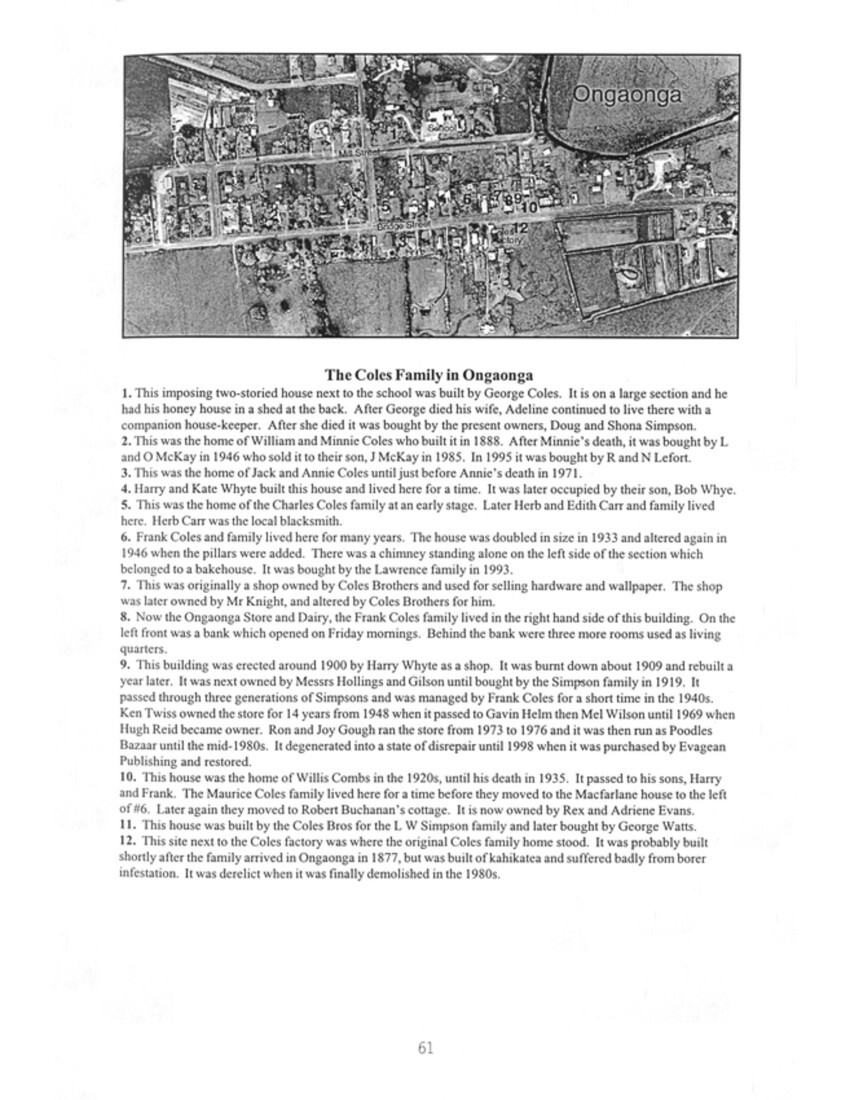
Page 62
When the Colonial House was the Talk of Ongaonga
This was taken when the old house was in its heydey. It later degenerated to the shell shown below, but not before it graced the village with the ring of merry voices and the sound of happy feet.
The End of an Era Sadly, the original Coles homestead fell into disrepair and was demolished in the early 1990s. It was located at position 12 on the aerial photo. The house was probably built around 1880 and was the home of Edward and Clara Coles and their large family until after Edward’s death in 1915. It was later sold to Bert Hook who built the butchery on the front of the section. The house and business were sold to John Buchanan and Samuel Fletcher, who worked for Buchanan, lived in the house from about 1931 to 1935. Ken Daly took over the butchery and the house before selling to Bill Ross. The butcher shop was moved to the Ongaonga Museum in the 1980s where it is preserved in its original state.
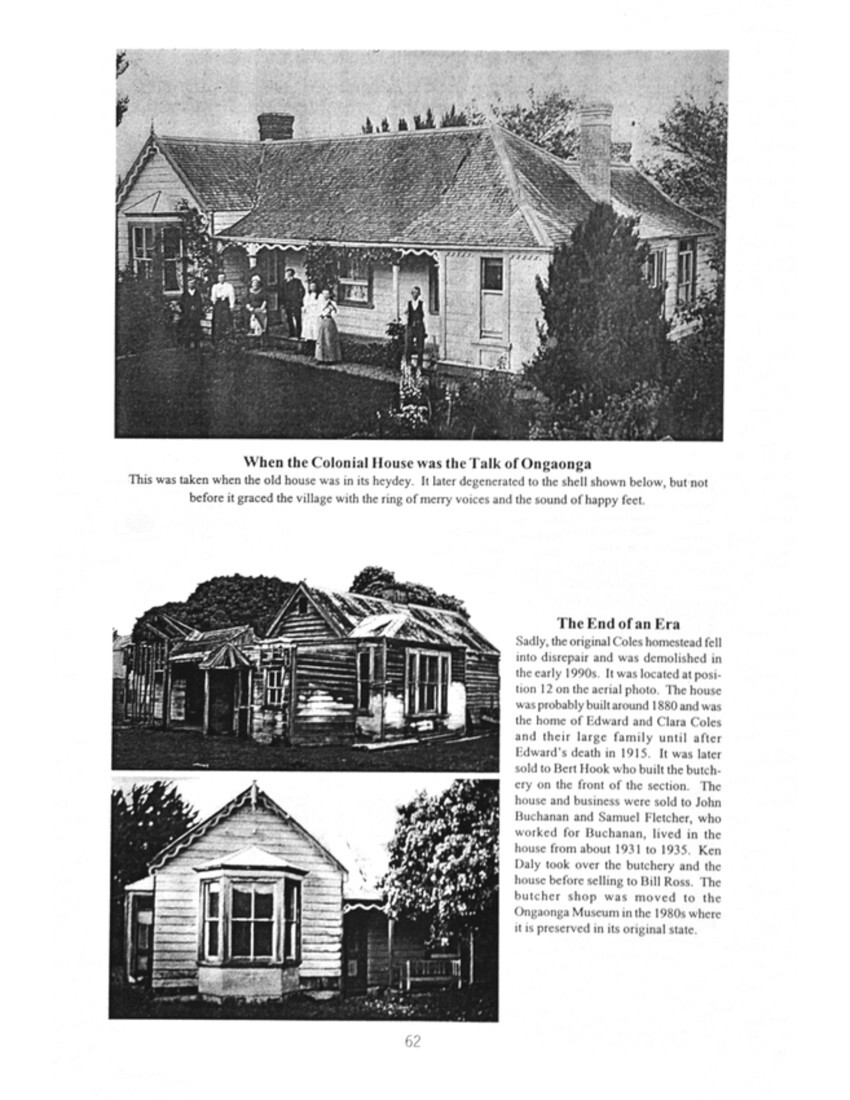
Page 63
ODDS AND ENDS
The following newspaper reports mentioning members of the Coles family were extracted for this publication by Dylan van der Zee. They show something of the social life of the period and give an insight into the activities of some of the family.
Thursday, September 29th , 1910. “The report of the social for Mr Geo Hunter, which appeared in Tuesday’s issue was hardly complete enough, for on Monday night the local town’s people again met to do him honour. On this occasion the juveniles were present in large numbers. Dancing was indulged in, and as usual with the social functions in Onga, a most pleasant night’s amusement was afforded. At the social at Friday night, among those present I noticed Mesdames Mathews… Coles, Whyte.”
Tuesday, February 28th , 1911. “A very enjoyable time was spent at Onga Onga last evening, on the occasion of the concert and dance in aid of the building fund of the Catholic Church. Father Saunderson occupied the chair, and the hall was well filled. Among the performers on the stage were Miss Buckhurst, Mrs Rosewarne, Miss Rhodes, Arthur, Carrol and Rosewarme. Mrs E. Rathbone acted as accompanist. The performers were entertained at supper by Mr and Mrs Coles while the hall was being cleared for the dance. Dancing was indulged in up to an early hour. Father Saunderson at the close of the concert, in a neat speech, thanked the audience for their attendance and the performers and accompanist for their several efforts.”
Saturday, June 17th , 1911. “The results of the ploughing matches at Onga Onga on Wednesday were as follows: A Class: E Meyers 1, Joe Waldrom 2, T A Glenny 3. B Class: S Coles 1, W Spargo 2, L Harmes 3, S Vesty 4. Best Ins and Outs: T A Glenny. Best finish: T A Glenney, Best Faring in A Class: M O’Rourke: T A Glenney received most of the prizes for horse and harness events.”
Friday, September 16, 1921. “The balance sheet presented at the annual meeting of the Onga Onga Brass Band, showed a credit of £22 and 12s 1d, the revenue for the year amounting to about £80. Office-bearers were elected as follows: – Vice President: W Coles… The following Band Committee was appointed :- Messr C. R. Coles…”
Wednesday, September 9th , 1925. “The following is the committee controlling the Onga Onga Hall :- Messrs H M Carr, C Coles, H Robb, B Hook and W Jacob. This committee has power to add to its number. The hall is a credit to the district and visitors have expressed the opinion that it compares more than favorably with many similar buildings in larger towns. Only £104, part of recent improvements including electric light, is now owing in connection with the structure.
Matters are well forward at Onga Onga Sub-station as to the provision of power for the Central Hawke’s Bay Board. Of special interest to visitors is the structure of steel work and insulators rising to a height of about 50 feet in the form of eight towers of meccano-like design. The transformer at the station is of 1500 KVA, with a high tension voltage capacity of 110,000, being an imposing metropolitan – Vickers’ production. “
Friday, September 11th , 1925. At a public meeting held in connection with the official opening and switching on of electric current at the Onga Onga Sub-station, there was a good attendance, including a number of ladies, Mr W. Coles was in the chair. Mr. Coles introduced Mr J A Kerr to the meeting, and gave all particulars available re: the proposed opening ceremony. Afternoon tea will be provided for visitors, and a strong committee was formed to assist the Power Board in every way to make the function a success. The Hall committee will arrange one of their popular dances for the same evening.
After the close of the meeting all arrangements were made in connection with the farewell social and dance to Mr and Mrs Boyer tonight.”
Friday, October 16th , 1925. “Additional to the official ceremony at the Onga Onga Sub-station at 2 pm on Tuesday next, when the ‘switching on’ of electricity for the Central Hawke’s Bay Power District will be formally celebrated, and the afternoon tea function at 3 pm, the residents of the district, under the auspices of the Celebrations Committee, will hold a function in the evening. Mr E MacFarlane is the secretary, and Mr W E Coles chairman of the committee. A dance in the evening, torchlight procession and fancy dress ball in that town, are other features of the occasion; also the street illuminations in Waipukurau and Waipawa.”
Friday, October 16th , 1925. Hydro-electric Dance, Town Hall, Onga Onga, Tuesday, 20th October, at 8 p.m. Music by F Limbrick’s Orchestra, Supper provided. Double tickets 5/-; Gents’ Single, 3/-; Ladies 2/- W.E Coles, Chairman Onga Onga Electric Celebration Committee.”
Monday, October 19th , 1925. “The dance to be held under the auspices of the Onga Onga Electric Celebrations committee, tomorrow night, promises to attract a large attendance of dancers to the Onga Onga Town Hall. Mr W E Coles is the chairman of the committee, and Mr Ed MacFarlane secretary. Mr. Limbrick’s orchestra will provide the music for the occasion.”
Wednesday, November 18th , 1925, “Mr and Mrs Chas Coles, entertained about twenty of their friends on Saturday night at Onga Onga, the occasion being the coming of age of their daughter Norah. An enjoyable evening was spent and the usual good wishes extended to Miss Coles.”
Monday, December 7th , 1925. “The Onga Onga Horticultural and Home Industries Society held it’s annual show in the local hall on Wednesday, and it proved a great success. Considering the unfavorable weather conditions during the spring, the display was wonderful. Sweet peas and roses were two very good sections, the prize for the champion rose going to Mr S Bott. The vegetable section was not as good as in previous years. In the home industries the entries were numerous, and
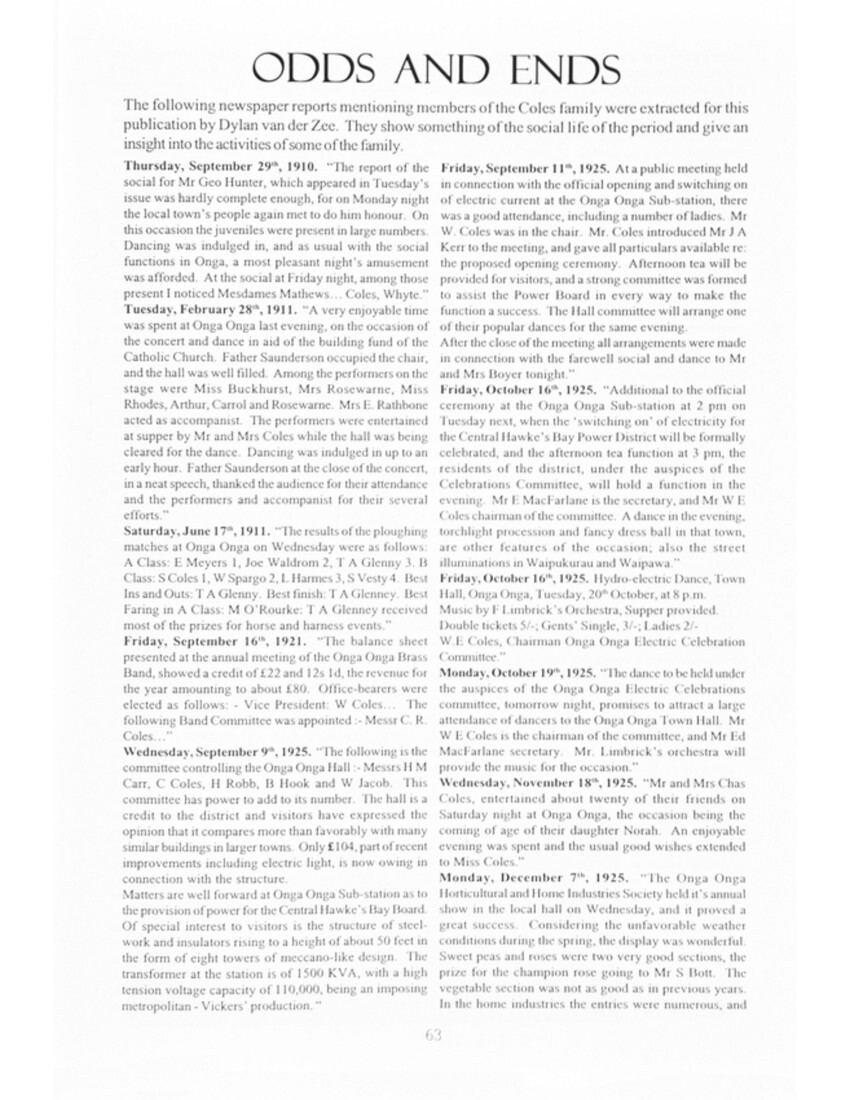
Page 64
competition keen, the school children contributed largely in their section, and most of their work was full of merit. A great number of the entries came from Waipawa, and many of the prizes went to those exhibitors. The various judges were:- Cut Flowers, Mr A Anderson; Fruit and Vegetables, Mr Livingstone; Children’s class, Mr Curd; Ladies class and Fancy work, Mrs Livingstone and Mrs Blathwayt; Home industries, Mrs Clark.
There is so much detail work in connection with a show of this description that an efficient secretary is a great essential to its success. The manner in which the show as handed reflects much credit on Mrs L Simpson, jun. and the secretary was ably assisted by the following committee:- Mesdames E McFarlane, C R Coles, L Simpson, sen., W E Freemantle, Messer, Misses R Simpson, O Coles and W Doyles. “
Wednesday, January 6th , 1926. “The usual monthly meeting of the Central Hawke’s Bay Power Board was held this morning, there being present:- Messrs Chas Pattison (Chairman), A C Russell, Thos Butler, W Malenoir, W H Rathbone, J A Kerr, E A Goodger, and F J Witherow. An apology for the absence of Mr R A Fraser was tendered.
Correspondence Inward
Correspondence was received and dealt with as follows:-
E H Leigh, Waipukurau, forwarding gift photographs incidental to the ‘Switching On’ ceremony at Onga Onga.
S A Coles, Onga Onga, complaining as to the delay in the matter of installing a hot water service.
Correspondence from Messrs Hawke and Walker was read bearing upon such delays, and the explanation was regarded as generally satisfactory.
Mr Fraser remarked that the matter of affording greater satisfaction as concerning the successful heating of water was important as a factor in the development of such services, and the installation of electric ranges.
The Engineer stated that he had discussed the question with Messrs Hawke and Walker. An element in the system of installation had proved unsatisfactory.
The chairman suggested enquiries being made from other Boards as concerning hot-water services. The Engineer stated that he proposed to carry out experiments with several systems.
On the motion of Mr Rathbone, seconded by Mr Russell, it was decided that this and other complaints be tabulated, with a view to the defects being remedied by the Engineer and installation contractors.”
Friday, March 26th , 1926. “Miss Ida Coles has been transferred from the Onga Onga Post Office to the Waipawa Post Office.”
Tuesday, April 6th , 1926. “Following is the list of winners of the art unions and competitions run by Mrs. Murphy and her Ormondville committee in connection with the Catholic Bazaar and Fancy Fair held last month at Takapau. Art unions: Alluvial gold, first prize, Rev Father Brennan; second prize, Miss Joan Fogarty (Waipukurau), Suppercloth, Miss Inglis (Takapau); Bridal doll, Joan Purcell (Takapau); Hand-painted jar, Miss Coles (Onga Onga); Autumn cushion, Mr J Green (Dannevirke). Competitions: Silver service, Mrs Maloney (Takapau); Silk jumper, Mrs Murphy (Ormondville)…”
Friday, April 30th , 1926. “A householders’ meeting was held at Onga Onga School on Monday night to elect a committee for the ensuing year. As there were only eleven present, but little interest was taken in the election. The chairman was taken by Mr W E Coles. The report was read and adopted, the balance sheet showing a credit of £26. The following committee were elected for the ensuing year: – Messrs S A Coles (Chairman), W E Reid (Secretary), J Coles, H Shaw and A Hutt.” Monday, May 24th, 1926. “The children’s plain and fancy dress ball organised by the Young Helpers’ League proved a great success at Onga Onga last week. Splendid music was supplied by Kirkham’s Orchestra, and Mr O Rasmussen acted as M C. Prizes for the best fancy dresses were awarded as under – Girl under 10, Joan Trengrove (Eastern Lady). Boy under 10, Wareen Waldin (Coster). Special for tiny tots, Betty Carr (Dutch girl), Girls 10 and over, Joan Tierney (Rose). Boys 10 and over Lyall Coles (Sir Walter Raleigh). Most original, Mabel Wyatt (Frog).”
Friday, June 11th , 1926. “Mr J Combs of Onga Onga, who has been for a lengthy period an inmate of the Waipukurau Hospital is progressing steadily towards recovering from his serious illness,” Monday, September 27th , 1926, “There was a good attendance at the annual meeting of the Onga Onga Sports held last week, Mr W E Coles being voted to the chair. The balance sheet presented by the secretary, Mr Ed MacFarlane, was very satisfactory, showing a credit of £61. Officers were elected as under:- Patron, Sir George Hunter, MP; President, Mr E Wilson; Committee, Messrs W EColes (Chairman). H Robb was appointed the club’s delegate to attend a meeting of Central Hawke’s Bay Sports bodies, to be held at Takapau. The tender of Coles Bros, has been accepted by the Hall Committee for alternations necessary to comply with the requirements of the Health Officer and Inspector of Explosives.”
Friday, October 1st , 1926. “The Presbyterian Church, Onga Onga, was the scene of an interesting wedding on Wednesday afternoon, when Miss Nora Coles, second daughter of Mr and Mrs C R Coles, was united in the bonds of matrimony to Mr J L Hardy, son of Mrs and the late Mr C A Hardy of Christchurch, the marriage service being conducted by the Rev Mr Lankshear. There was a very large gathering of relations and friends of the bride and bridge groom. The bride wore white silk georgette, beautifully beaded, with veil and orange blossoms and carried a beautiful shower bouquet, the gift of Mrs A Inglis. Miss Olga Coles, sister of the bride, was bridesmaid, and wore a frock of electric blue velvet, with black picture hat, and carried a posy of spring flowers to tone. Mr Frank Coles, brother of the bride was best man. As the bride entered the church on the arm of her father, the bridal hymn, ‘The Voice That Breathed O’er Eden’, was sung, and the bridal party left the church to the strains of Mendelsohn’s ‘Wedding March’, played by Miss L I Hobin. The church was prettily decorated by girl friends of the bride, a lovely bell hanging over the happy couple. The bridegroom’s present to the bride was a gold bangle. The presents were numerous and costly including several cheques. A reception was held in the Hall afterwards, when the usual toasts were honoured. Later, Mr and Mrs
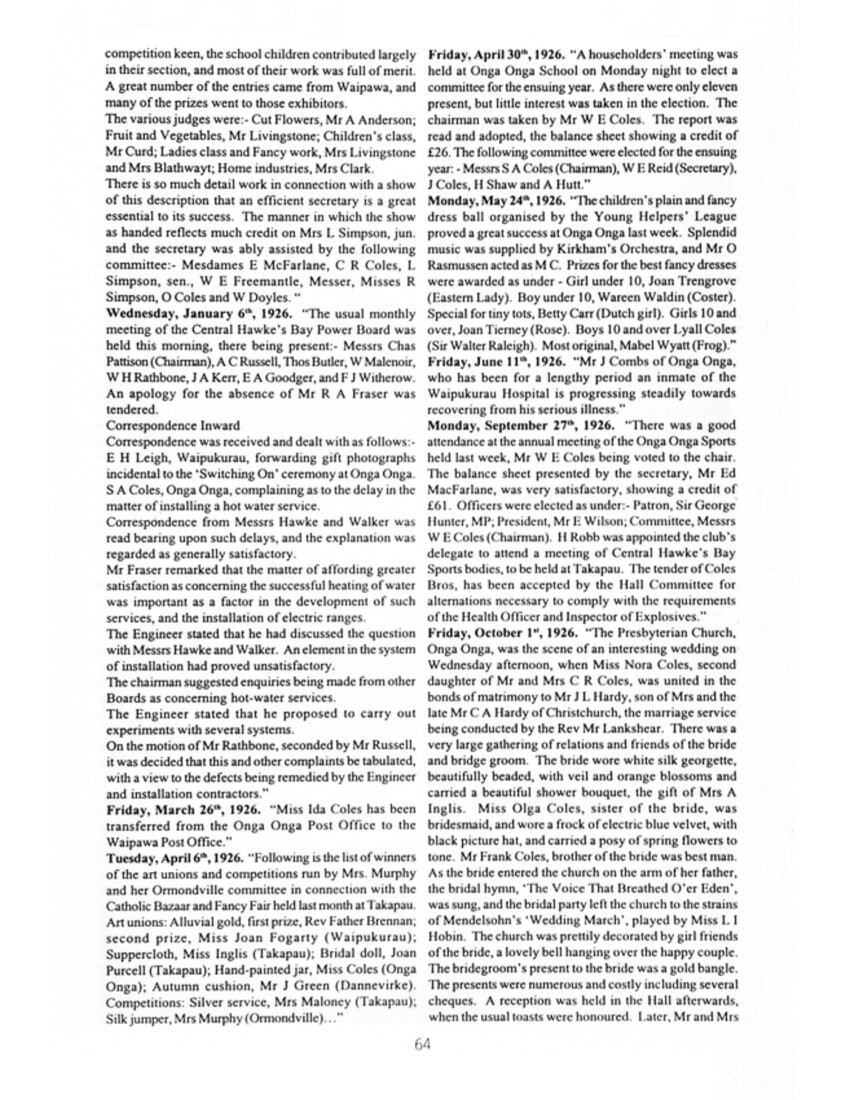
Page 65
Hardy left by car for the North, the bride wearing a smart navy blue ensemble suit, with hat and shoes to tone and marabout fur.”
Wednesday, August 10th , 1927. “The Onga Onga Women’s Institute meeting was held on Thursday last in the Institute rooms. On this occasion we were privileged to have with us Miss Spencer, New Zealand Organiser of Women’s Institutes, who gave a most interesting address on the institute movement throughout Canada and England, detailing some of the wonderful and helpful work done by Women’s Institutes throughout the war period and afterwards. Afternoon tea was dispensed by Mesdames Coles and Arnold.”
Monday, October 31st , 1927. “In connection with the recent concert held at Onga Onga by the Waipukurau Orphan’s Club the chairman of the School Committee (Mr S A Coles) has intimated that the event created a very favourable impression the School funds will benefit to the extent of over £13 by the effort.”
Wednesday, May 30th , 1928. At the adjourned meeting of householders, held at the Onga Onga School, there was a good attendance of parents. Mr W Coles presided. Nominations for a committee of five were taken, seven were nominated, the ballot resulting in the election of Mrs Williamson, and Messrs S Coles, Hutt, Easter and Simpson. A vote of thanks was passed by the meeting to the outgoing committee for the splendid work done by them during their term of office, and also a vote of thanks to the school staff. After the meeting, the new committee met, when Mr S Coles was animously [unanimously] re-elected, and Mr Laurie Simpson secretary.”
Monday, August 13th , 1928. “A quiet but pretty wedding was celebrated at Anglican Church, Onga Onga, last week when Miss Olga Coles, daughter of Mr and Mrs Chas Coles was married to Mr Arthur Charles Clarke, of Wellington. The Rev Pigott of Waipawa, was the officiating minister, and Mrs T Russell, aunt of the bride, presided at the organ. The church was prettily decorated with spring flowers for the occasion”
Friday, December 6th , 1929. “Mr F Coles of Onga Onga, was admitted to the isolation ward at the Waipukurau Public Hospital yesterday.”
14th April, 1915, Obituary of Edward Purkis Coles. There was a sad feeling in this town on Saturday when the funeral of the late Mr Edward Purkis Coles wended its way to the cemetery where the venerable father of Onga Onga was to be laid for his last long rest.
Although it was known for nearly a week that his end was fast approaching, it was yet hard to realise that the time has come when we shall see our beloved old townsman no more. Mr Coles emigrated with his family from Droxford in Hampshire, England, in 1877 and soon after arriving in New Zealand established himself here as a building contractor, in which occupation he saw his share of pioneering in the old time battle with dull trade. He emerged, however, with full credit and 12 years ago was able to retire, leaving to his sons the management of the extensive business since known as Coles Bros. In the years of his retirement he retained always a keen interest in the progress of the district and of the township in particular, and his amiable nature kept him constantly interested in a host of warm friends extending throughout the North Island. He derived much happiness in his declining years from his friends travels amongst them. He also visited on two occasions his brother William, New South Wales Govt architect in Sydney who predeceased him by six years. The deceased gentleman was chairman of the first school committee and held office in practically every other local public body during his working years, At the time of his death he still retained the office of Justice of the Peace and was a trustee of the domain and the Undenominational Church.
He leaves a family of 6 sons and 8 daughters to mourn their loss viz, Messrs William, Charles, George and Fred Coles (Onga), Samuel Coles (Forest Gate), Ernest Coles (Auckland), Mrs Quigley (Gisborne), Mrs Combs (Dannevirke), Mrs Livick (Napier), Mrs Whyte (Onga), Mrs Milne (Stratford), Mrs Russel (Onga), Mrs Hurfitt (Auckland), Mrs Glenny (Onga).
The funeral service was conducted by Rev Archdeacon Cullwick and Rev G. Harkness also addressed the assemblage at the graveside, referring to the exemplary life of rectitude and usefulness their deceased friend had lived. Numerous floral tributes were received from friends throughout the district and Hawkes Bay and messages of sympathy came to his family from far and wide.
Edward Coles’ funeral procession moving down Bridge Street, Ongaonga.
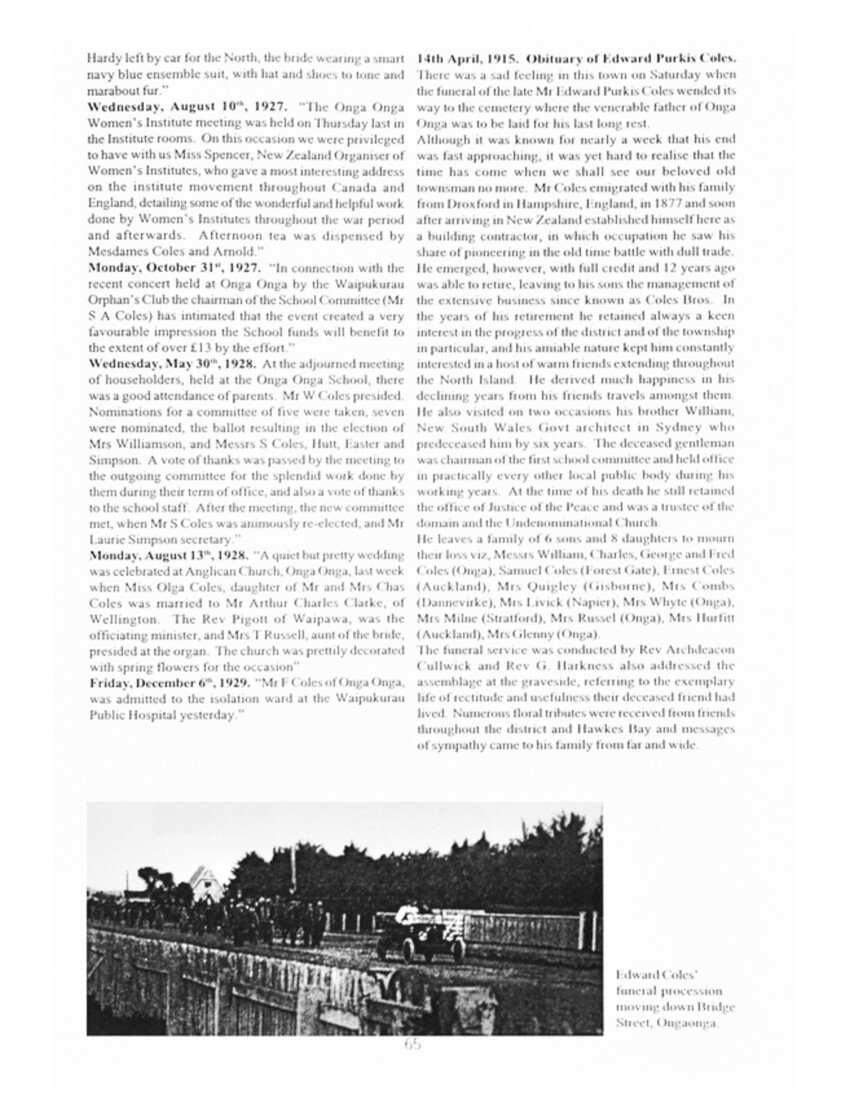
Page 68
The Descendants of Edward and Clara Coles
Clara Jane QUIGLEY (1858-1929) nee COLES,
Edward Purkis COLES (1830-1915),
Alma Elaine QUIGLEY (1908-1966) md KITT.
Photo from: Miss V Quigley
Freda Clara QUIGLEY (1886-1941),
Cynthia Elaine QUIGLEY (1881-****) md BARKER,
Ada Mary QUIGLEY (1883-1966) md COMBS,
Edward Purkis COLES (1830-1915),
Clara Jane QUIGLEY (1858-1929) nee COLES.
Photo from: Miss V Quigley
Edward Purkis COLES (1830-1915), Willis Edmund COMBS (1845-1935).
Photo from Mr T Kitt.
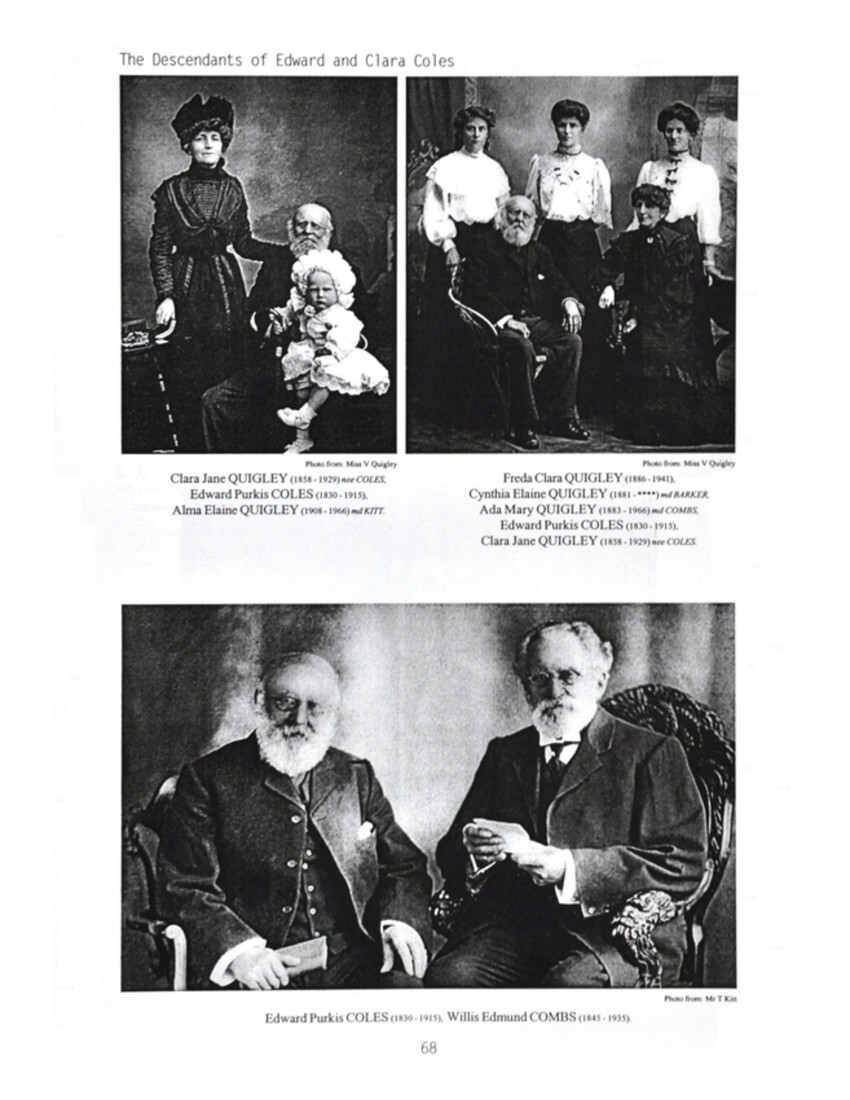
Page 69
The Descendants of Edward and Clara Coles
Clara Jane QUIGLEY (1858-1929) nee COLES,
Ada Mary COMBS (1883-1966) nee QUIGLEY,
Edward Purkis COLES (1830-1915),
Edward Charles P COMBS (1912-1974),
Willis Ide COMBS (1879-1920).
Photo from: Lady A Raynham
Coles Family Gathering.
Photo from: Mr R Coles
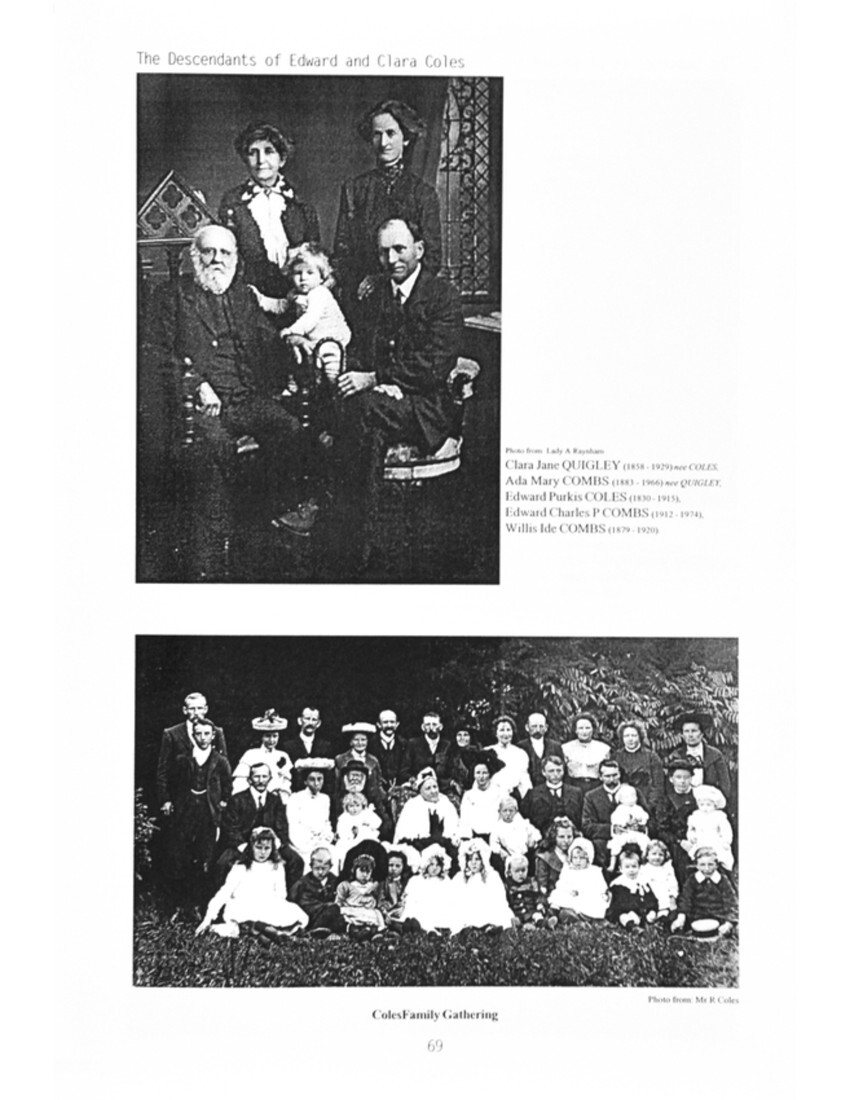
Page 70
The Descendants of Edward and Clara Coles
Family Photo on the occasion of the funeral of Edward Perkis [Purkis] Coles in 1915
(1 ) Edward Purkis COLES (1830-1915), (2) Clara Louisa COLES (1837-1905) nee BARTON,
(3) Clara Jane QUIGLEY (1858-1929) nee COLES, (4) George COLES (1869-1941), (5) Louisa LIVICK (1863-1940) nee COLES,
(6) Mary Jane MILNE (1871-1945) nee COLES, (7) Edith HURFIT (1875-****) nee COLES,
(8) William Edward COLES (1802-1942), (9) Frederick Purkis COLES (1877-1925),
(10) Annie Clara COMBS (1856-1916) nee COLES, (11) Charles Robey COLES (1867-1959),
(12) Kate Emily WHYTE (1872-1945) nee COLES, (13) Alice GLENNY (1881-1963) nee COLES,(14) Martha Emma RUSSELL (1874-****) nee COLES, (15) Ernest COLES (1865-1931), (16) Samuel Arthur COLES (1880-1943).
Photo from: Mr BG Coles
All family members were asked to help to identify the people in this photograph. There was concensus on all except Nos 7 and 10. Alison Raynham advised that, shortly before her death, her aunt, Molly Combs, named the people in the photo for her, She named No 7 as “the daughter of Ada Barton Coles”. This could only have been Connie Kemsley. Connie’s mother died a year after her marriage, perhaps in childbirth, and nothing is known of what became of Connie. Since all others in the photo are children of Edward and Clara, it would seem unlikely that Connie, a granddaughter, would be included in this photo when another, on the facing page, was taken of all the family, Molly also identified No 10 as Edith Hurfit whereas others identified her as Annie Combs. According to Molly’s list Annie Combs, who was Molly’s grandmother, was not in the photo, However, her husband Willis Combs is in the large group photo and seated next to No 10.
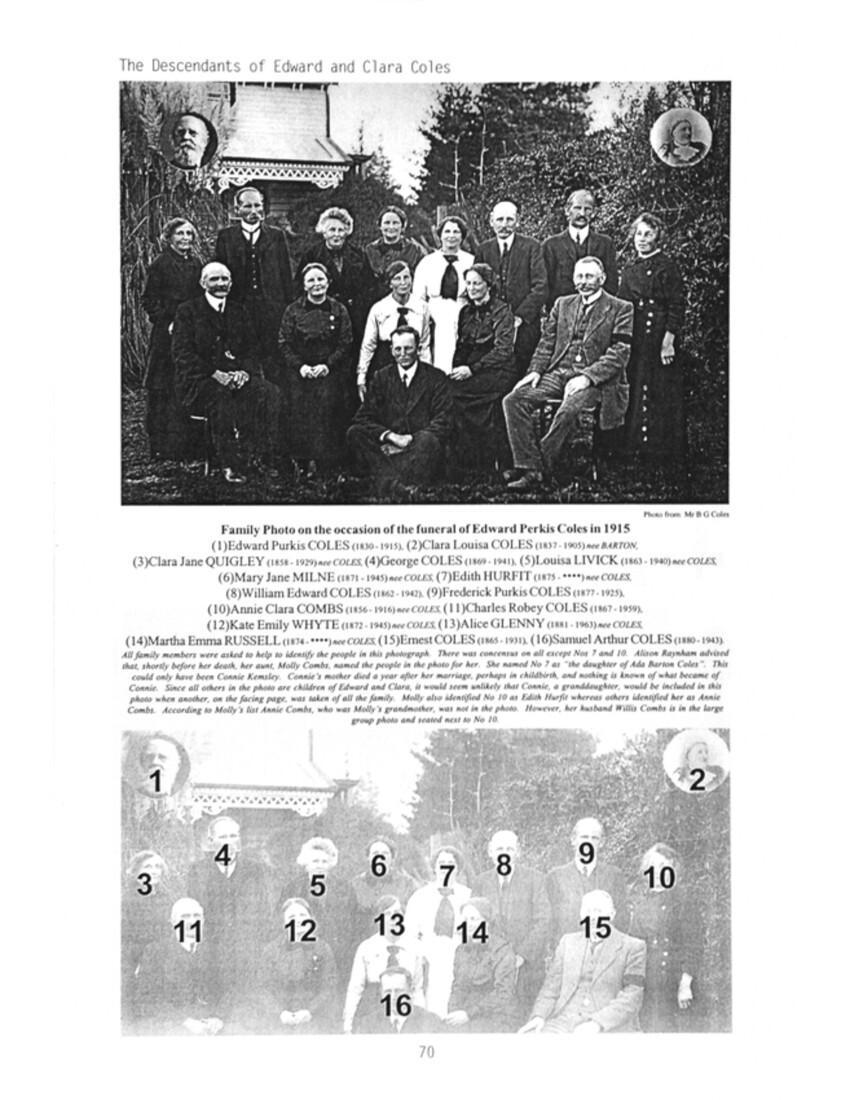
Page 71
The Descendants of Edward and Clara Coles
(1) Margaret COLES (1875-1955) nee VESTY, (2) George COLES (1869-1941), (3) Unidentified,
(4) Edith HURFIT (1875-****) nee COLES, (5) Unidentified, (6) Clara Jane QUIGLEY (1858-1929) nee COLES,
(7) Albert Frank GLENNY (1882-1975), (8) Louisa LIVICK (1863-1940) nee COLES, (9) William Edward COLES (1862-1942),
(10) Harry James William Strachan WHYTE (1870-1943), (11) Mary Jane MILNE 1871-1945) nee COLES,
(12) Frederick Purkis COLES (1877-1925), (13) Robert RUSSELL (****-****),
(14) Martha Emma RUSSELL (1874-****) nee COLES, (15) George Vincent KEMSLEY (***-***),
(16) Vera WHYTE (****-****) md McNEILL, (17) Kathleen COLES (1902-1991) md BAILEY, (18) Cecil Ernest COLES 1898-1982),
(19) Charles Robey COLES (1867-1959), (20) Kate Emily WHYTE (1872-1945) nee COLES,
(21) Alice GLENNY (1881-1963) nee COLES, (22) Willis Edmund COMBS (1845-1935),
(23) Annie Clara COMBS 1856-1916) nee COLES, (24) Amalie Elizabeth (Emily) COLES (1871-1932) nee THODSEN,
(25) Samuel Arthur COLES (1880-1943), (26) Ernest COLES (1865-1931), (27) Basil GLENNY (1908-1971),
(28) Ella Valerie COLES (1909- ) md NICOL, (29) John Barton (Jack) COLES (1896-1983),
(30) Charles Russell WHYTE (1906-1981), (31) Neil RUSSELL (****-****), (32) Maurice COLES (1908-1978),
(33) Dulcie Mavis GLENNY (1912-1962) md BOHM, (34) Unidentified, (35) Edward Purkis (Ted) GLENNY (1907-1927).
Photo from: Mrs R Arlidge
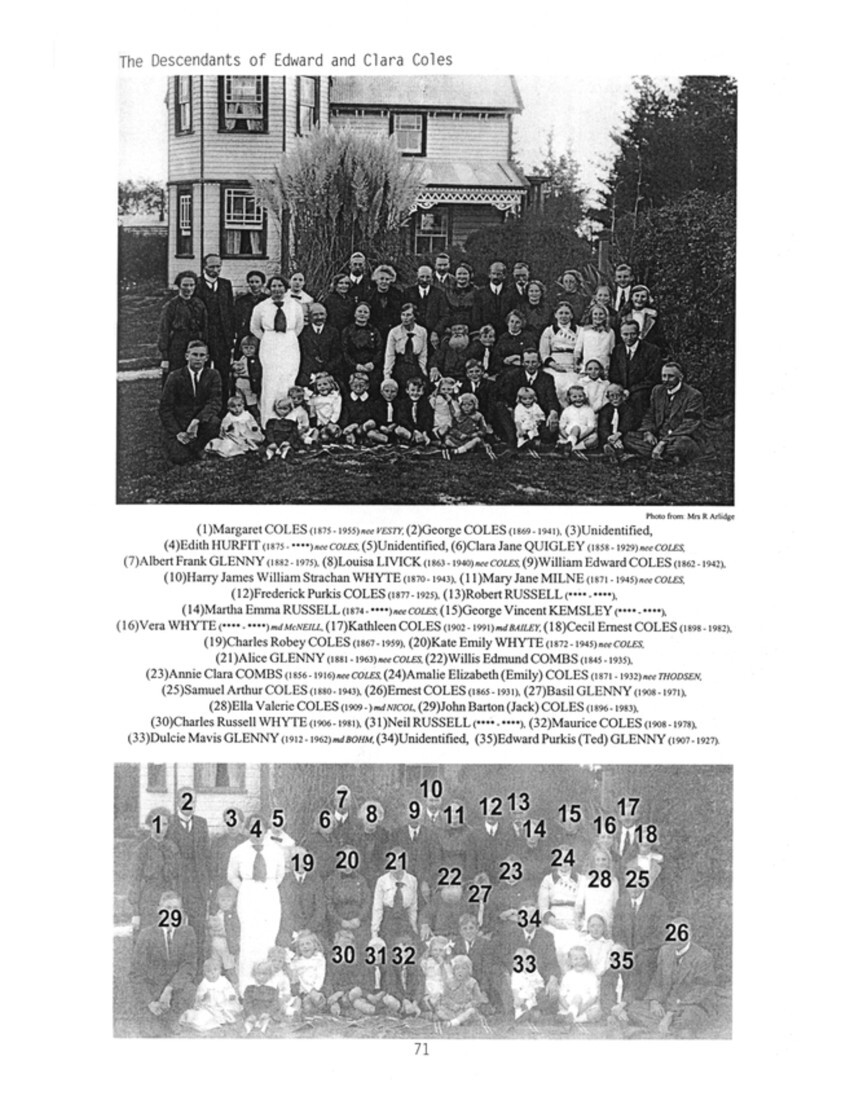
Page 74
The Descendants of Edward and Clara Coles
Clara Jane QUIGLEY (1858–1929) nee COLES.
Photo from: Miss V Quigley
William James QUIGLEY (1854–1905).
Photo from: Miss V Quigley
William James QUIGLEY (1854–1905).
Photo from: Miss V Quigley
Clara Jane QUIGLEY (1858–1929) nee COLES.
Photo from: Miss V Quigley
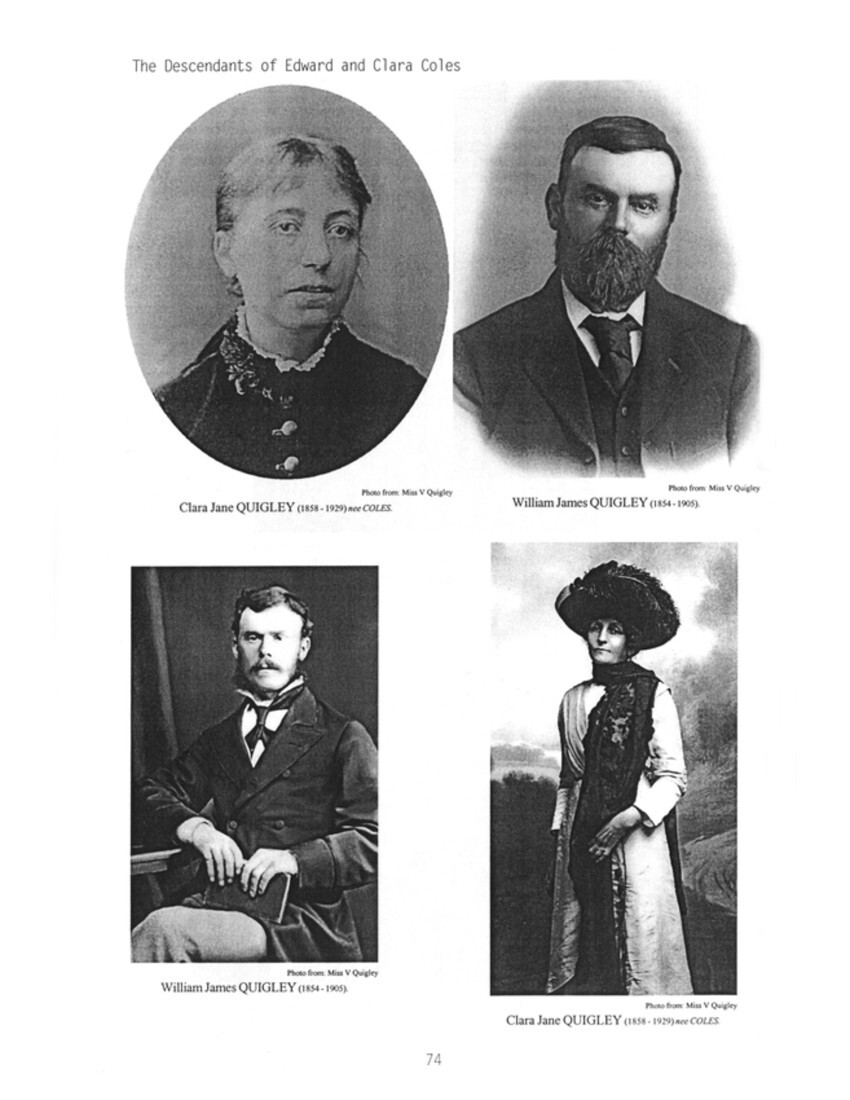
Page 75
The Descendants of Edward and Clara Coles
Clara Jane QUIGLEY (1858–1929) nee COLES.
Photo from Miss V Quigley
Clara Jane QUIGLEY (1858–1929) nee COLES.
Photo from: Lady A Raynham
Irvine James QUIGLEY (1889–1971).
Alma Elaine QUIGLEY (1908–1966) md KITT.
Photo from: Miss V Quigley
Jack Herbert QUIGLEY (1910–1978),
Irvine James QUIGLEY (1889–1971).
Photo from: Miss V Quigley
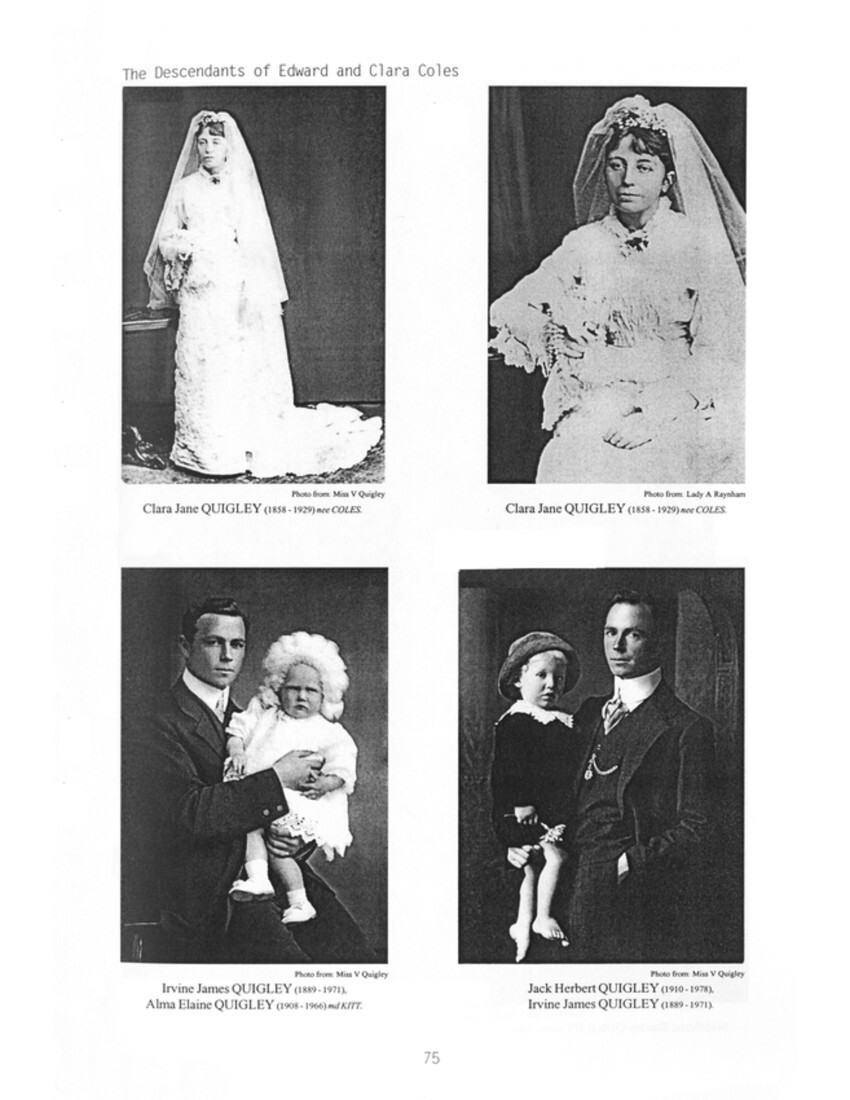
Page 76
The Descendants of Edward and Clara Coles
Irvine James QUIGLEY (1889-1971),
Jessie Rebecca KING (1897-1976) nee QUIGLEY,
Herbert Sydney McGowan QUIGLEY (1880-1951),
Middleton Stanley QUIGLEY (1895-1966),
Olive Phillis CROOKS (1900- 1990) nee QUIGLEY,
Freda Clara QUIGLEY (1886-1941),
Ada Mary COMBS (1883-1966) nee QUIGLEY,
Cynthia Elaine BARKER (1881-****) nee QUIGLEY,
William Edward QUIGLEY (1885-1959),
Frank Martin QUIGLEY (1891-1942).
Photo from: Miss V Quigley
Middleton Stanley QUIGLEY (1895–1966).
Photo from: Miss V Quigley
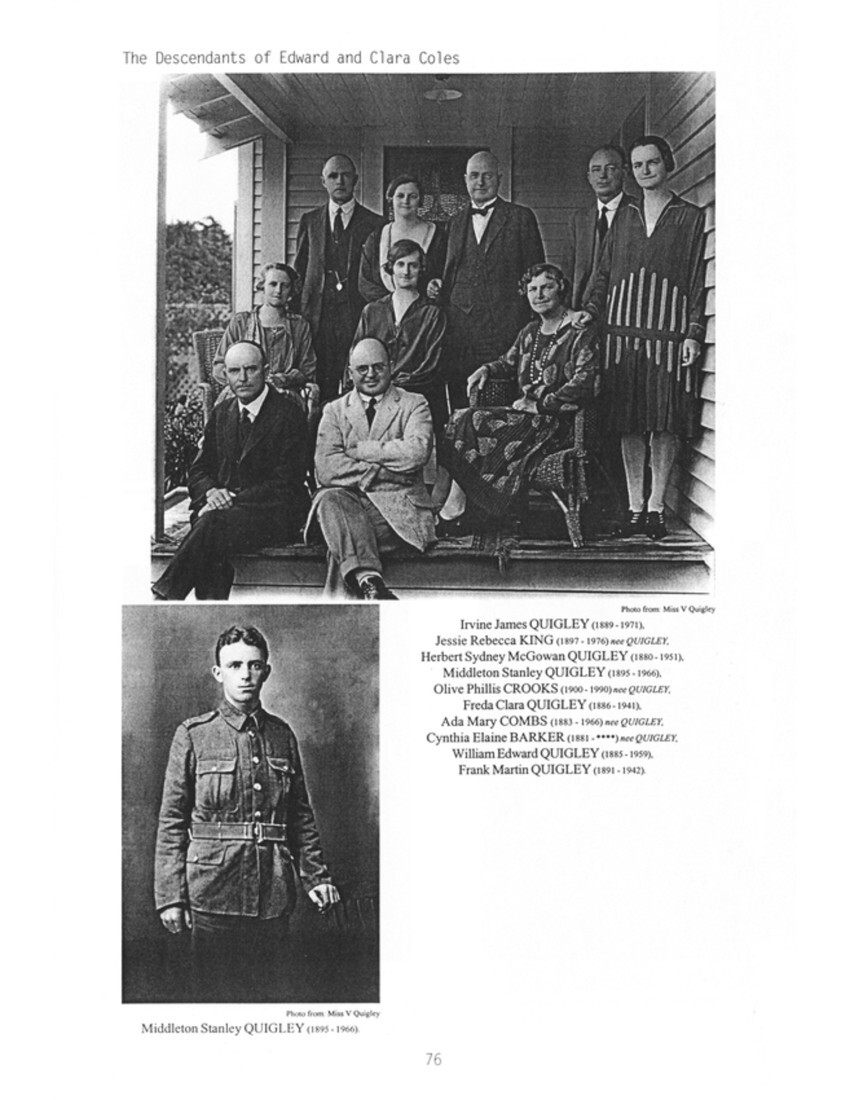
Page 77
The Descendants of Edward and Clara Coles
Middleton Stanley QUIGLEY (1895-1966), Irvine James QUIGLEY (1889-1971),
William Edward QUIGLEY (1885-1959).
Photo from: Miss V Quigley
Mona SMYTHE, Irvine James QUIGLEY (1889-1971), Lillias Hamilton QUIGLEY (1893-1987) nee BRUTON,
Alan ??, Vera SMYTHE.
Photo from: Miss V Quigley
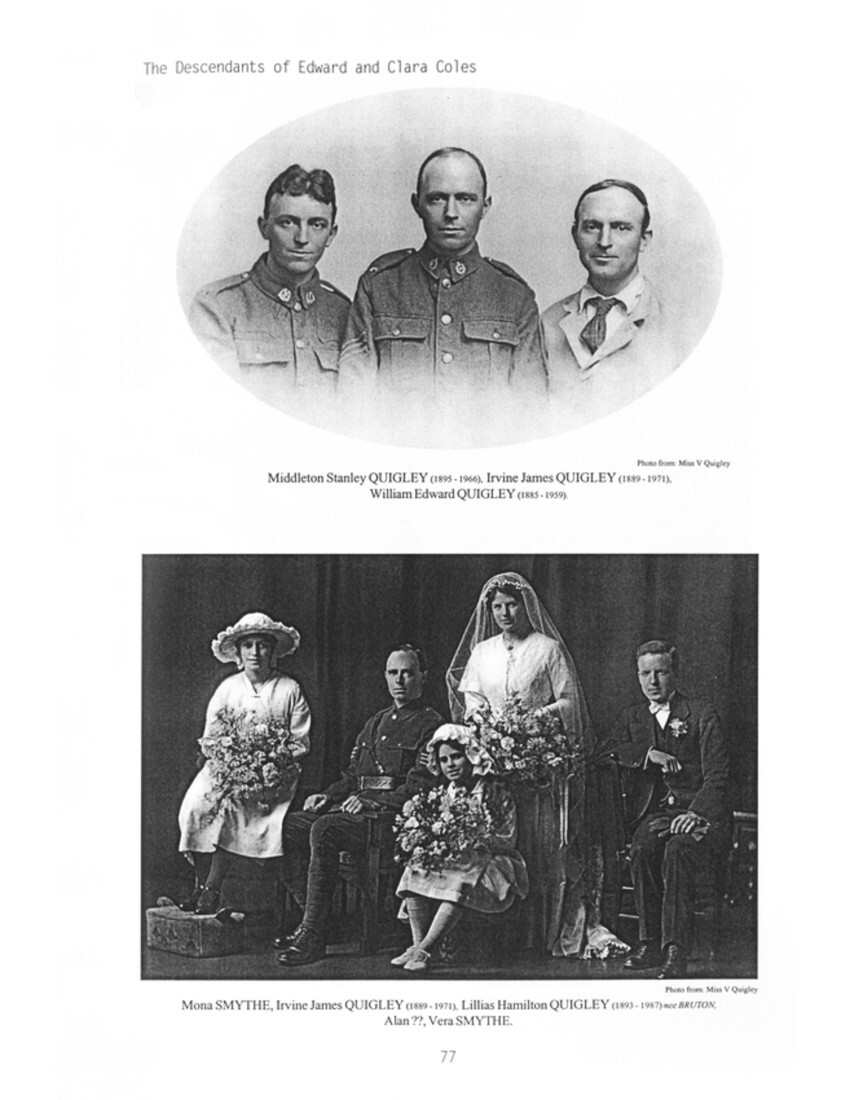
Page 78
The Descendants of Edward and Clara Coles
Noela Elizabeth (Betty) QUIGLEY (1917- ) md THOMPSON, Wilfred Irvine QUIGLEY (1925-1981),
Irvine James QUIGLEY (1889-1971), Ngaire Lillias QUIGLEY (1922- ) md SPENCER,
Lillias Hamilton QUIGLEY (1893-1987) nee BRUTON, Vivienne Enid QUIGLEY (1929- ).
Photo from: Miss V Quigley
Louise Annie (Nancy) CAMPBELL (1908-1998) nee COMBS,
Arnold Everitt CAMPBELL (1906-1980).
Photo from: Mrs J M Cumming
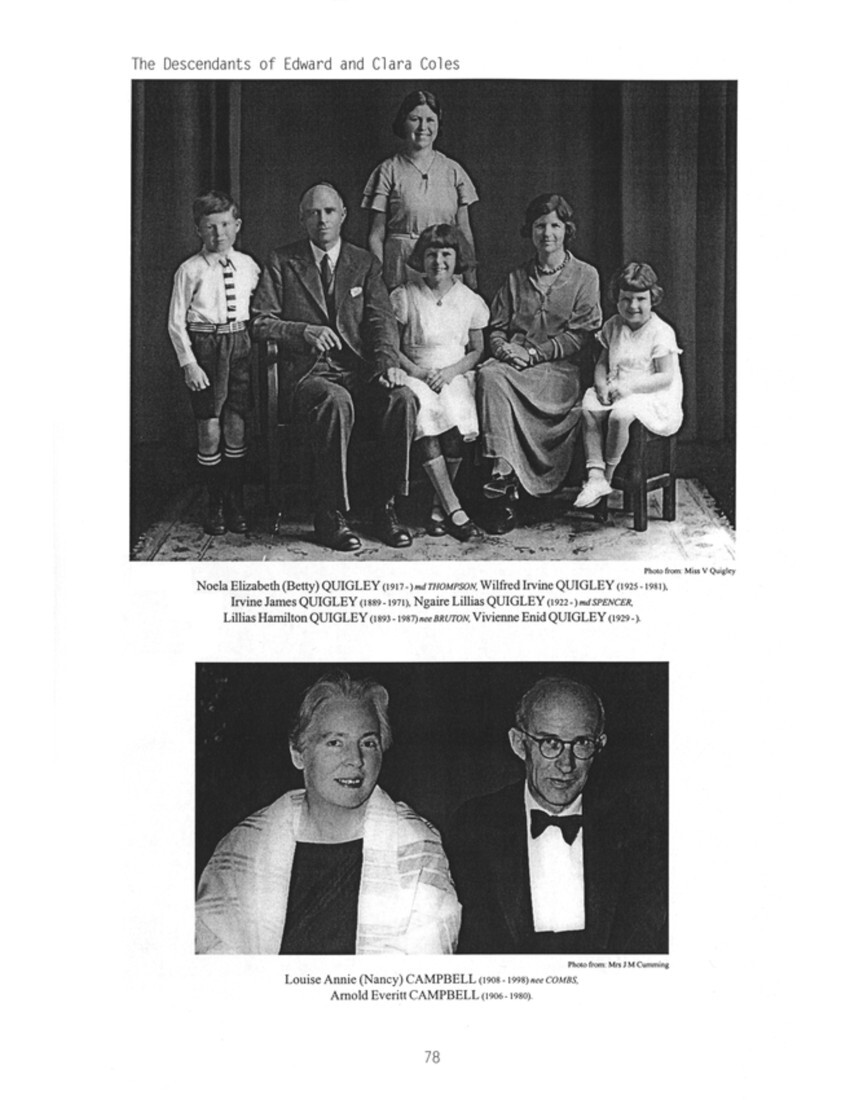
Page 81
The Descendants of Edward and Clara Coles
Vernon Francis COLES (1903–1994), Edward William Perkis COLES (1889–1978),
Mary Margaret COLES (1887–1962) nee BRETHERTON, Frances BRETHERTON md KELLY.
Photo from: Mrs M Harting
AudreyEleanor COLES (1891–1972) md KEEHAN, Meta Honora COLES (1901–1955).
Photo from: Mrs D Kelly
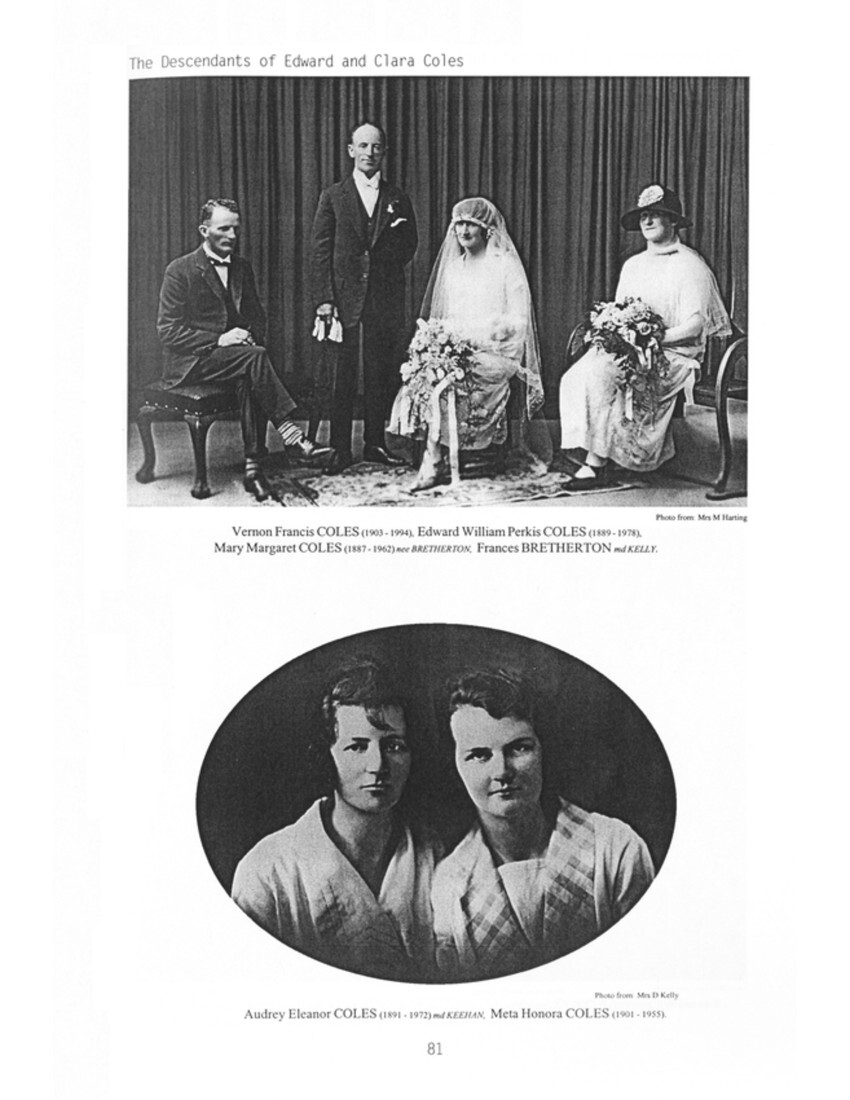
Page 82
The Descendants of Edward and Clara Coles
Dorothy Matilda COLES (1896–1983).
Photo from: Mrs D Kelly
Gladys Winifred Mabel COLES (1899–1975).
Photo from: Mrs M Harting
Edward William Perkis COLES (1889–1978).
Photo from: Mrs M Harting
Dorothy Matilda COLES (1896–1983).
Profession as Dominican nun Jan 1920.
Photo from: Mrs N Keehan
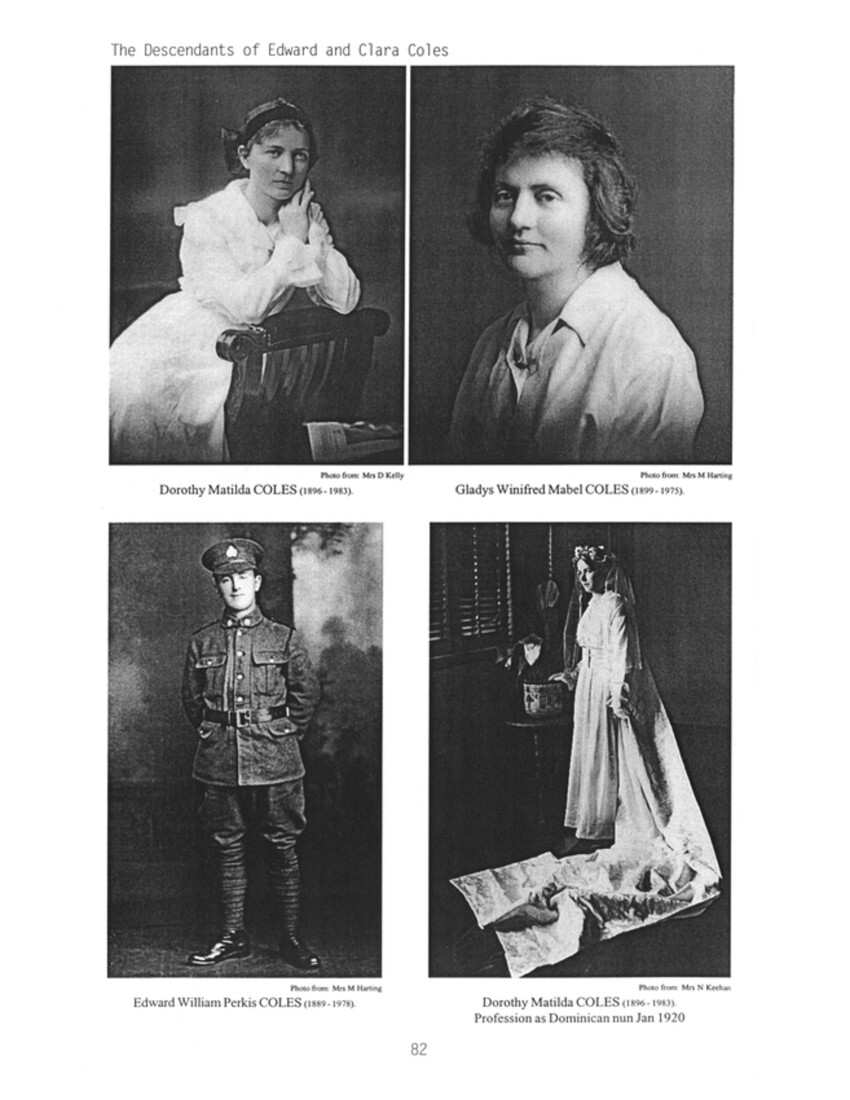
Page 86
The Descendants of Edward and Clara Coles
Charles Robey COLES (1867–1959).
Photo from: Mr M R Clark
Amalie Elizabeth (Emily) COLES (1871–1932) nee THODSEN.
Photo from: Mr M R Clark
Charles Robey COLES (1867–1959), Amalie Elizabeth (Emily) COLES (1871–1932) nee THODSEN.
Photo FROM: Mrs M M Jarvie
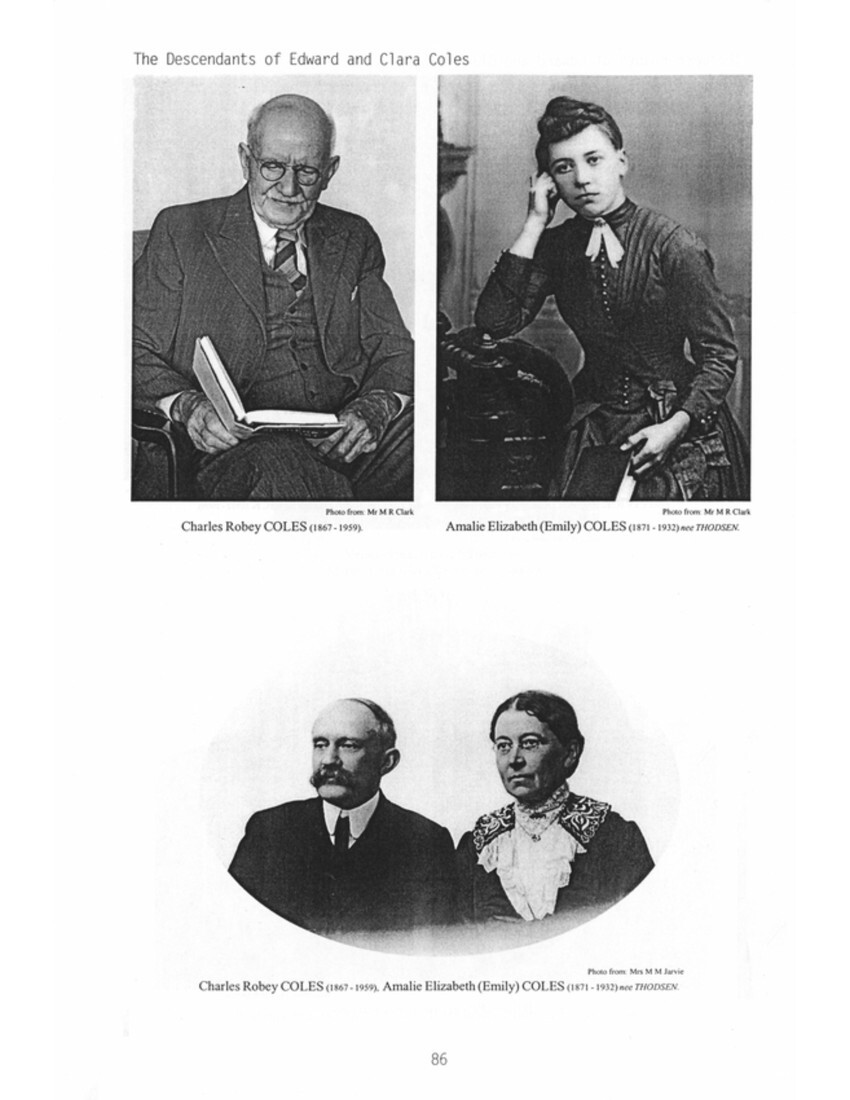
Page 87
The Descendants of Edward and Clara Coles
Mona COLES (1899- ) md MACFARLANE, John Barton (Jack) COLES (1896-1983), Cecil Ernest COLES (1898-1982),
Frank Charles COLES (1902-1981), Olga COLES (1907- 1997) md CLARK, Charles Robey COLES (1867-1959),
Ada COLES (1909-1982) md PARKER, Amalie Elizabeth (Emily) COLES (1871-1932) nee THODSEN,
Nora COLES (1904-1996) md HARDY.
Photo from: Mr M A Coles
Frank Charles COLES (1902–1981).
Photo from: Mr M A Coles
Frank Charles COLES (1902–1981).
Photo from: Mr M A Coles
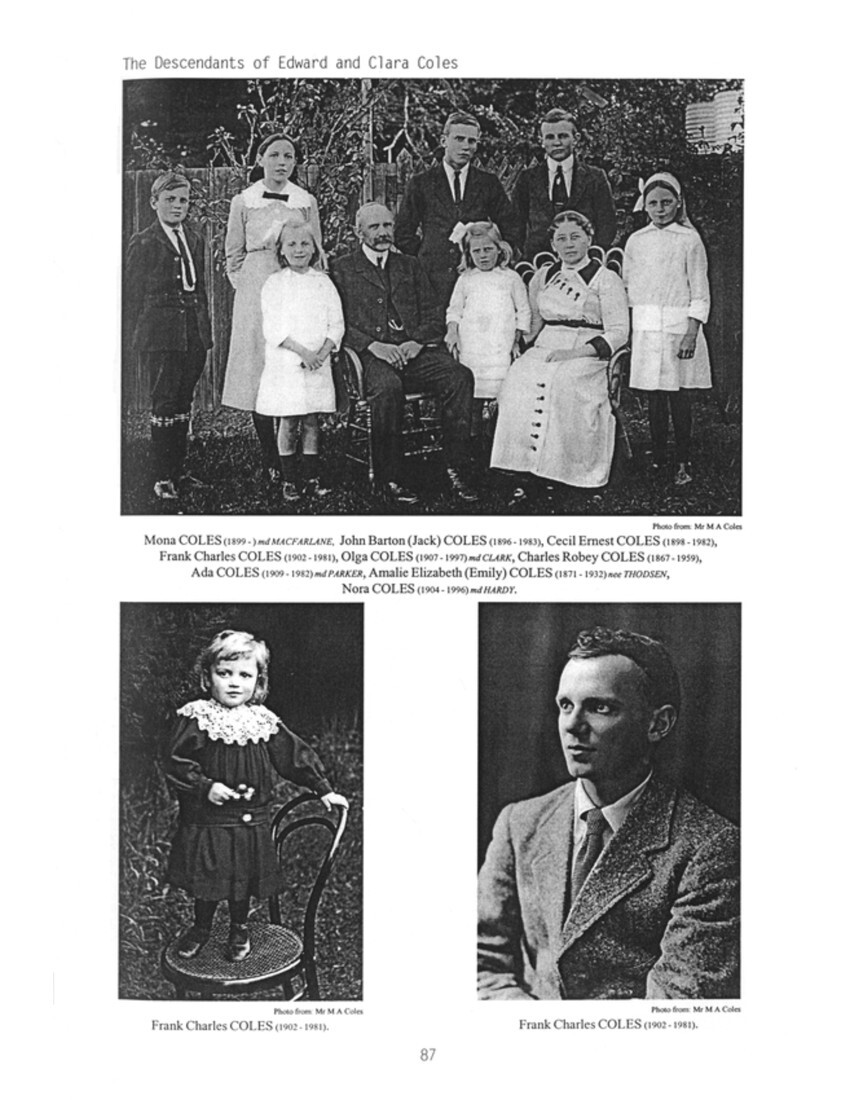
Page 89
The Descendants of Edward and Clara Coles
Kathleen COLES (1902–1991) md BAILEY, Maurice COLES (1908–1978).
Photo from: Mrs R Arlidge
Frederick Purkis COLES (1877–1925), Alice COLES (1888–1973) nee VESTY, Unidentified Coles,
Mary Watson VESTY nee McLEOD, Matthew W (Sam) VESTY, Leslie VESTY.
Photo from: Mrs J M Robertson
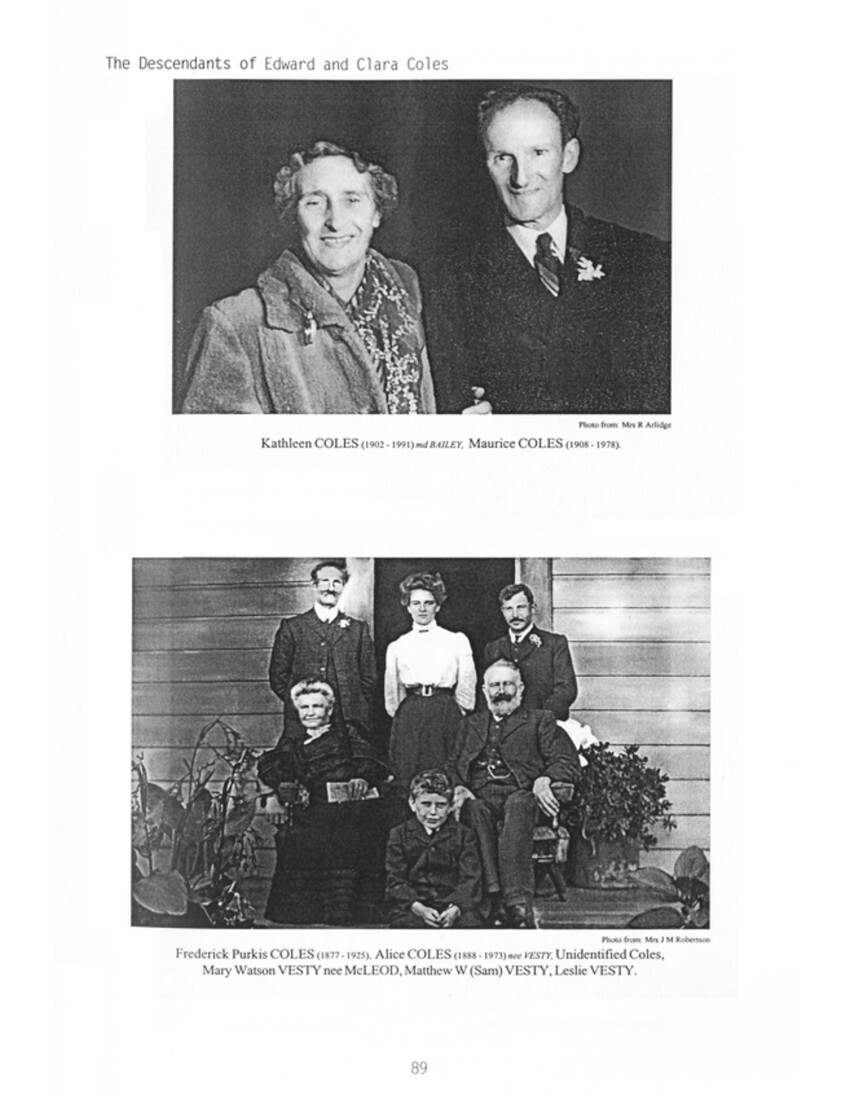
Page 90
The Descendants of Edward and Clara Coles
George Alexander ROBERTSON (1911–1996),
Nancy Gwendoline ROBERTSON (1912–1973) nee COLES.
Photo from: Mrs J M Robertson
Nancy Gwendoline ROBERTSON (1912–1973) nee COLES.
Photo from: Mrs S K Allen
Samuel Arthur COLES (1880–1943).
Photo from: Mrs E V Nicol
Margaret COLES (1875–1955) nee VESTY.
Photo from: Mrs E V Nicol
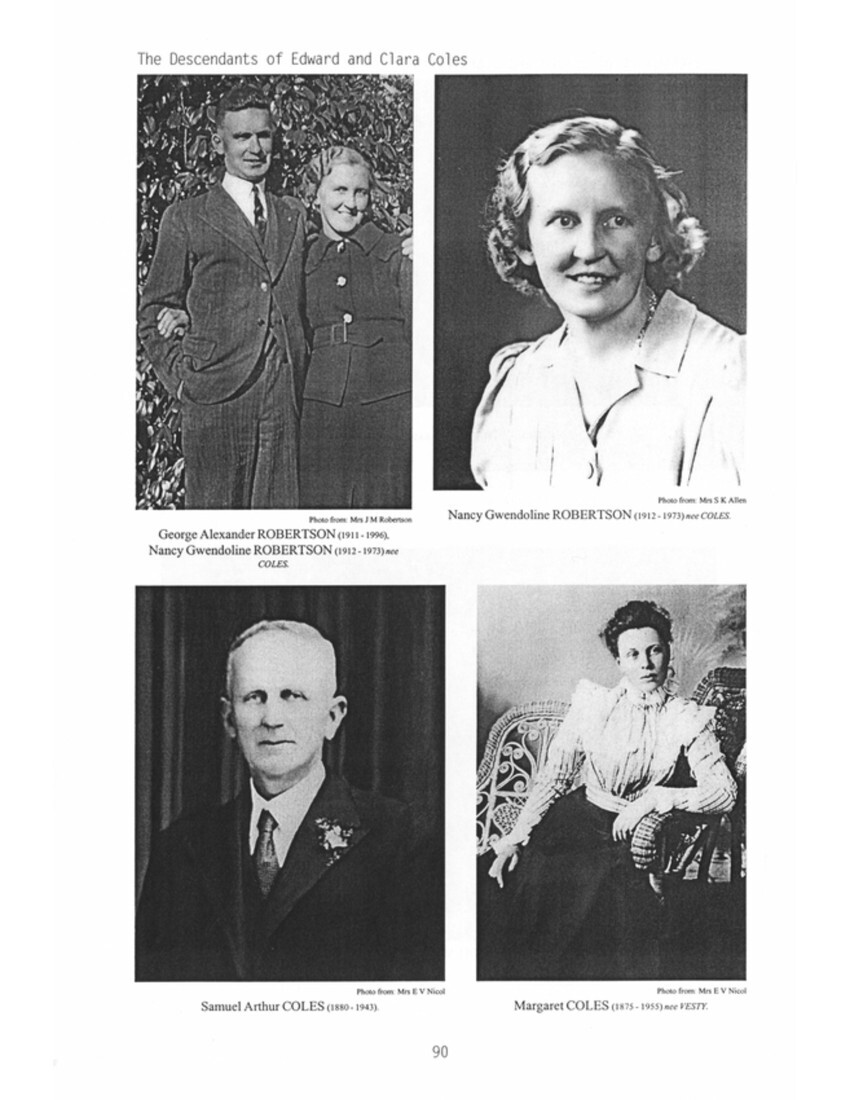
Page 91
The Descendants of Edward and Clara Coles
Mary Barton COLES (1912- ) md STONE, Alfred John NICOL (1909–1991), Ella Valerie NICOL (1909- ) nee COLES, Bob NICOL.
Photo from: Mrs E V Nicol
Phillis Barton COLES (1911–1994) md HARKNESS,
Ella Valerie COLES (1909- ) md NICOL,
Mary Barton COLES (1912- ) md STONE,
Madge COLES (1910–1918).
Photo FROM: Mrs E V Nicol
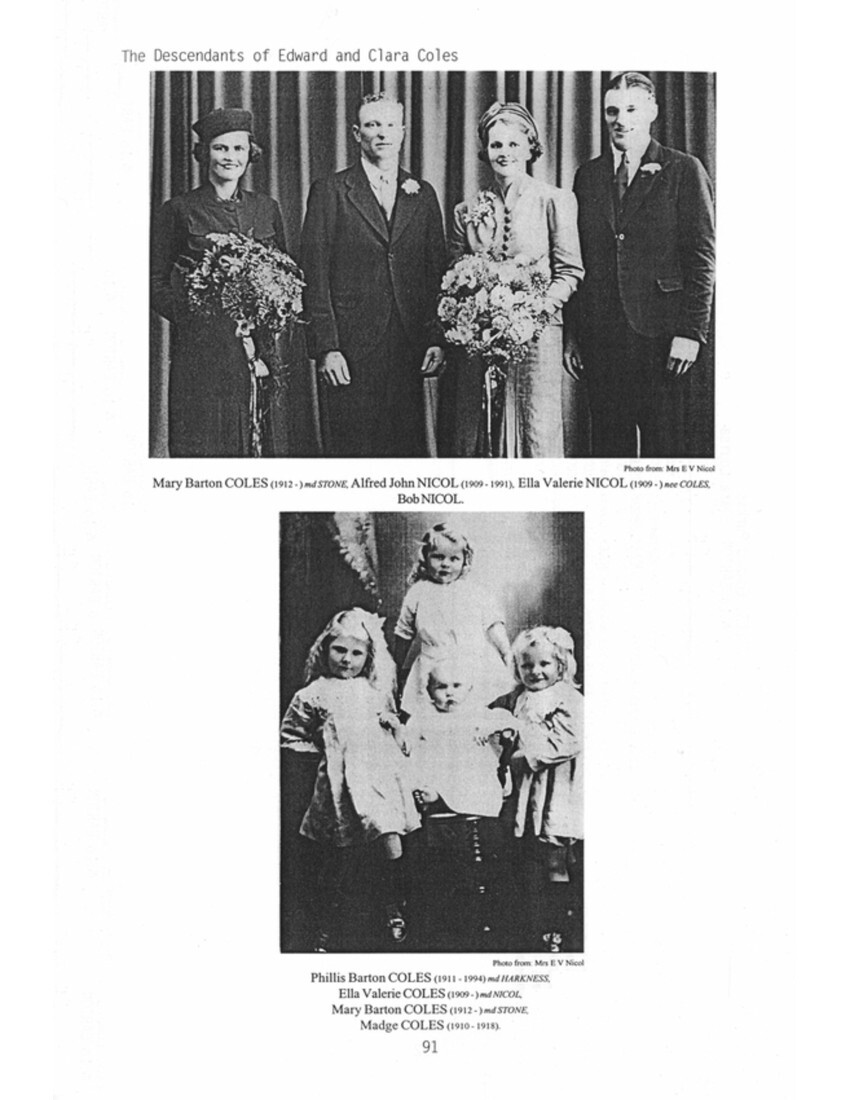
Page 92
COLES, Edward Purkis m to BARTON, Clara Louisa
Annie Clara =COMBS, Willis Edmund
COMBS, Willis Ide
= QUIGLEY, Ada Mary
COMBS, Harry Ernest
= WEBSTER, Ethel Bessie
COMBS, Frank Livingston
= THOMSON, Louise Florence Leys
Julia Clara Jane
= QUIGLEY, William James
QUIGLEY, Herbert Sydney McGowan
= (1) HERBERT, Adeline Winifred
= (2 HAYWARD, Muriel Rose
QUIGLEY, Ada Mary
= COMBS, Willis Ide
QUIGLEY, Cynthia Elaine
= BARKER, George
QUIGLEY, William Edward
= KENDERDINE, Brenda Mary
QUIGLEY, Freda Clara
QUIGLEY, Irvine James
= BRUTON, Lillias Hamilton
QUIGLEY, Frank Martin
= BENTON, Cora Cecilia
QUIGLEY, Athol Andrew (Attila)
= CURTIS, Ellen
QUIGLEY, Middleton Stanley
= LANE, Ina Lottie
QUIGLEY, Jessie Rebecca
= KING, Arthur William Herbert
QUIGLEY, Olive Phillis
= CROOKS, David Low
Ada Barton
= KEMSLEY, George Vincent
KEMSLEY, Connie Ada
William Edward
= O’NEIL, Minnie Frances
COLES, Edward William Perkis
= BRETHERTON, Mary Margaret
COLES, Ruth Clara
COLES, Audrey Eleanor
= KEEHAN, Thomas James
COLES, Emma Lavinia (Vinnie)
= (1) BRETHERTON, Joseph Bartholomew
= (2 )MCLAUGHLAN, Martin Norman
COLES, Dorothy Matilda
COLES, Gladys Mabel
COLES, Gladys Winifred Mabel
COLES, Meta Honora
COLES, Vernon Francis
= BROCK, Marion Olga
Louisa
= LIVICK, William Dixon
LIVICK. Ella
LIVICK, Beryle
= BRAYTON, William Grindal
LIVICK, Ivan
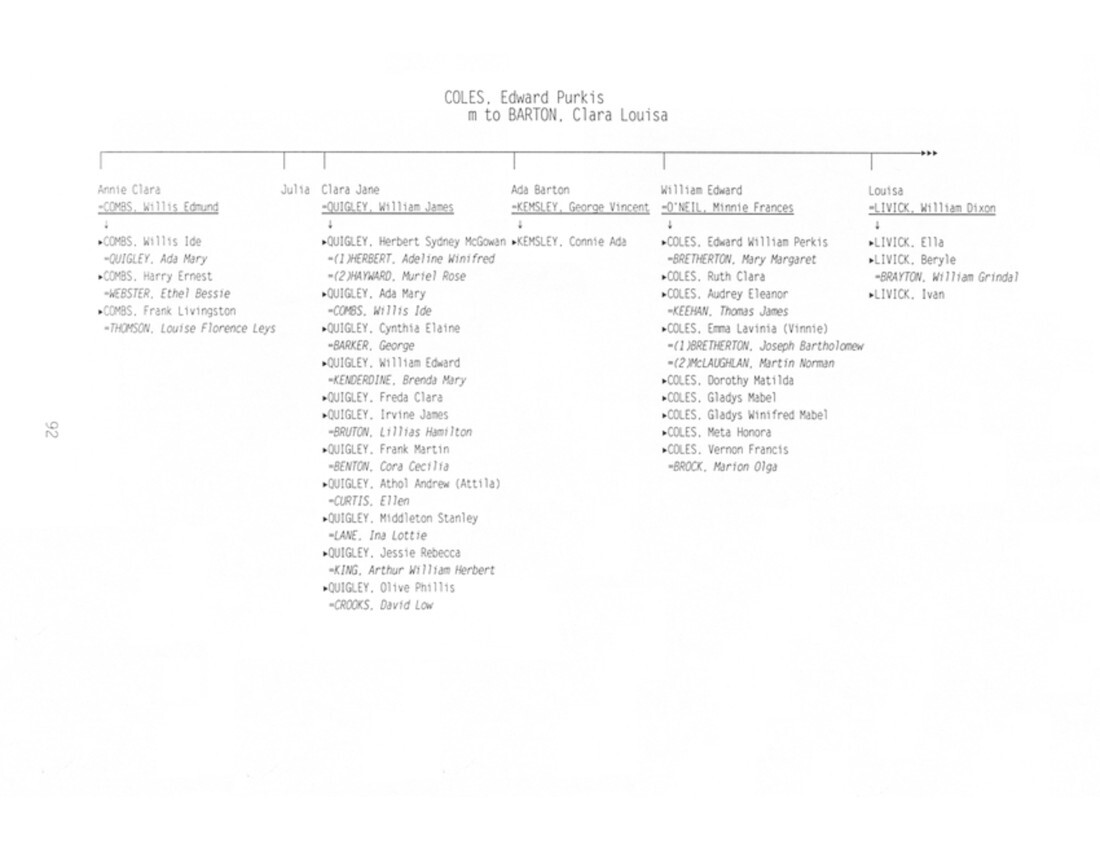
Page 93
COLES, Edward Purkis = BARTON, Clara Louisa (cont)
Ernest = GRANT, Jessie
COLES, Hector
= ??, Eve
COLES, Grant
Charles Robey
= THODSEN, Amalie Elizabeth (Emily)
COLES, John Barton (Jack)
= SHEPHERD, Annie McGregor
COLES, Cecil Ernest
= CHARTERS, Rosanna Maye
COLES, Mona
= MACFARLANE, Leslie Mace
COLES, Frank Charles
= SIMPSON, Irene Mabel
COLES, Nora
= HARDY, John Laurence
COLES, Olga
= CLARK, Arthur Charles
COLES, Ada
= PARKER, Francis Raymond
George
= CANTLE, Adeline
COLES, Kathleen
= BAILEY, Frederick William (Bill)
COLES, Maurice
= COSSAR, Vera
Mary Jane
= MILNE, Henry
MILNE, Clara
MILNE, Eric Conway
= WYLIE, Isabel Mary
MILNE, Ernest
= EVEREST, Mary
Kate Emily
= WHYTE, Harry James William Strachan
WHYTE, Harry
= BULL, Ruby
WHYTE, Ernest Robert
= GLAZEBROOK, Nora
WHYTE, Vera
= McNEILL, Alex
WHYTE, Charles Russell
= WHITE, Eila Jessie
COLES, Edward Purkis = BARTON, Clara Louisa (cont)
Martha Emma
= RUSSELL, Robert
RUSSELL, Clara
RUSSELL, Neil
Edith
= HURFIT, Jack
HURFIT, Trevor
HURFIT, Aritt
HURFIT, Iris
HURFIT, Maurice
Frederick Purkis
= VESTY, Alice
COLES, Nancy Gwendoline
= ROBERTSON, George Alexander
COLES, Guy Kenneth
= RYBURN, Daisy Lorraine
COLES, Sidney Purkis
= DARROCH, Karine Marjorie
COLES, Jessie Mavis (Jaye)
= ROBERTSON, Andrew Douglas
COLES, Bruce Barton
= HILDRETH, Peggy
Samuel Arthur
= VESTY, Margaret
COLES, Ella Valerie
= NICOL, Alfred John
COLES, Madge
COLES, Phillis Barton
= HARKNESS, William Leslie
COLES, Mary Barton
= STONE, William Henry
COLES, Lyall Barton
= BRODIE, Margaret
Alice
= GLENNY, Albert Frank
GLENNY, Edward Purkis (Ted)
GLENNY, Basil
= RIACH, Margaret
GLENNY, Dulcie Mavis
= BOHM, John Richard Fulton
GLENNY, June Alison
= GROGAN, Maurice Patrick (Mick)
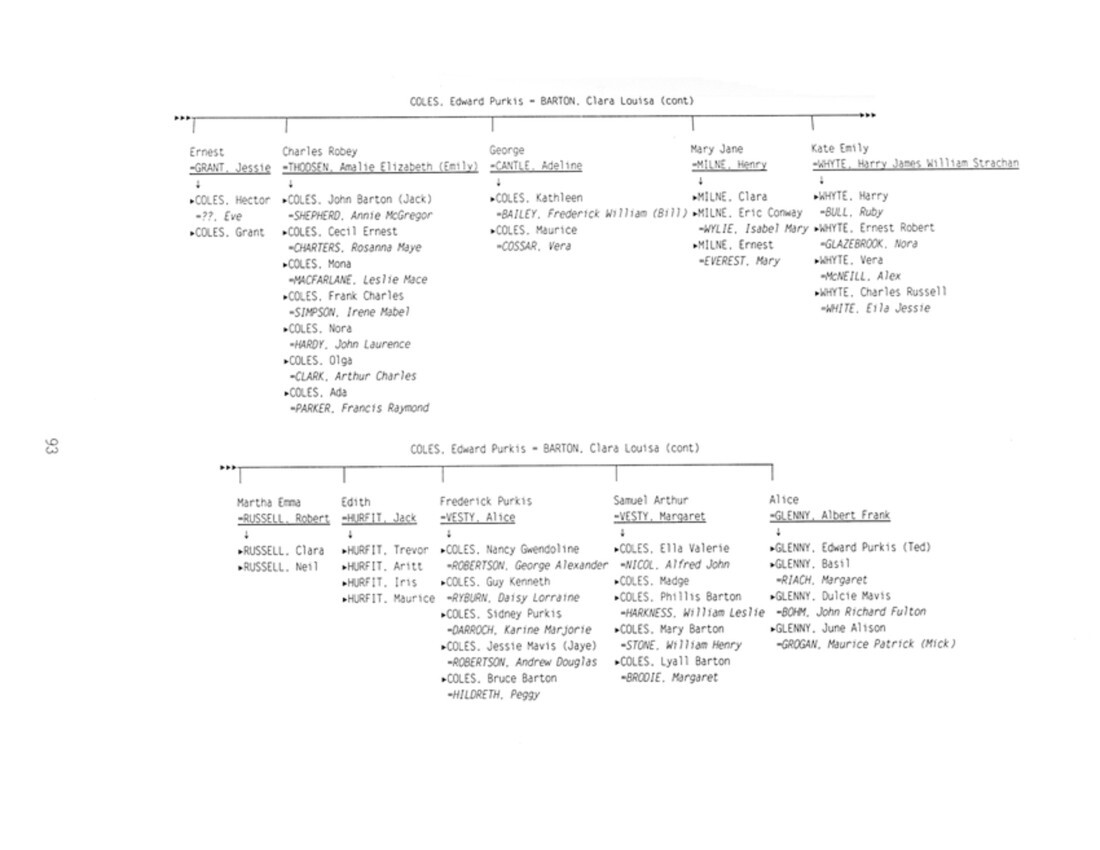
Page 94
Descendants of COLES, Edward Purkis and BARTON, Clara Louisa
01> COLES, Edward Purkis m on 01.01.1855 to BARTON, Clara Louisa
b 04.07.1830 d 08.04.1915 b 05.12.1837 d 21.02.1905
Edward b. and m. in England, d. at the residence of his daughter, Mrs H Whyte and bd. at Ongaonga. Clara b. in England and d. and bd. at Ongaonga.
The family departed from Gravesend, England, on 4 May 1877 on the 744 ton barque, Columbus, under the command of Captain Esson who reported on the voyage as follows: “Left Gravesend on 4 May with ENE breeze, which carried the vessel clear of the English Channel. When in the Bay of Biscay experienced strong gales with heavy seas of such a nature that Captain Esson ordered the passengers from below into the deck cabin, and then battened down the hatches. Head winds were then encountered until off Cape Finisterre and the Island of Madiera was sighted on 21 May. The NE Trades were secured on 20 May but these were light and unsteady. The Equator was crossed on 4 June, thirty days out from “Star-point”. Sighted the Tasmanian coast on 4 August and then commenced a series of gales tried the mettle of all on board. The crew as a body behaved in a most praiseworthy manner. On the 5th the vessel was struck with two heavy seas which filled the main deck flush with the rail, and the cabins also received a large quantity of water. Everything moveable on the deck went overboard, a breastwork which had previously been erected to protect the cabins was destroyed, and so great was the amount of water on deck that the bulkheads had to be be stove in to allow the water to escape. The water got into the after hatchway but the passengers lost nothing, only suffered a little inconvenience by their apartments being submerged. Towards evening the gale abated but on the 7th it arose again with great fury, smashing in the cabin doors and filling the saloon with water, and as a heavy cross seas was running, the vessel was brought-to. At midnight on the 8th the barque was squared away upon her course, and on the pumps being examined it was found that two bilge and one main pump were gone. As the vessel made no water, these pumps were sufficient in a short time to clear the hatches of what had got in during the gale. The Three Kings were sighted on Sunday the 12th at 7am and the North Cape at 1pm on the same day. Then on to Port of Auckland in thick weather. The vessel comes into port with her bulkheads considerably shattered.”
The passengers were Mrs Esson, Mrs Thomas and daughter, Miss Bartholomew, Mr and Mrs Cantle and family (9) and Mr and Mrs Coles and family (12).
The ship arrived at Auckland on 18 August 1877 after a voyage of 103 days. From Auckland they made their way to Ongaonga in Central Hawkes Bay where Edward set up a business as a builder, joiner, ironmonger and undertaker. He built a factory in Bridge Street which is still standing today and being restored.
1> COLES, Annie Clara m on 25.09.1878 to COMBS, Willis Edmund
b 12.03.1856 d 28.02.1916 b 10.09.1845 d **.**.1935
2> COLES, Julia b 21.07.1857 d 10.12.1875
Julia registered at Droxford, bap. at Kingston, England, and d. at Droxford, Hampshire, England.
3> COLES, Clara Jane m on 19.05.1879 to QUIGLEY, William James
b 11.12.1858 d 09.04.1929 b 18.01.1854 d 27.09.1905
04> COLES, Ada Barton m on 10.08.1881 to KEMSLEY, George Vincent
b 10.08.1860 d 30.09.1882 b **.**.**** d **.**.****
Ada registered at Droxford and bap. at St Jude’s Church, Southsea, England. She had a daughter, Connie Ada but it is not known what became of her. It is thought that she may have lived in England and may have visited New Zealand at the time of the death of Edward Coles.
5> COLES, William Edward m on 19.11.1888 to O’NEIL, Minnie Frances
b 11.04.1862 d 07.06.1942 b 17.03.1865 d 05.04.1946
6> COLES, Louisa m on 24.05.1886 to LIVICK, William Dixon
b 05.10.1863 d 14.03.1940 b 10.04.1852 d 30.09.1909
7> COLES, Ernest m on 28.07.1896 to GRANT, Jessie
b 17.06.1865 d 28.07.1931 b **.***** d **.**.****
Ernest registered at Droxford, bap. at St Jude’s Church, Southsea, England, and d. at Papatoetoe, Auckland. Jessie, d/o G Grant or Ormondville.
Ernest was educated in Droxford and learnt the building trade. After his arrival in New Zealand with his (cont…)
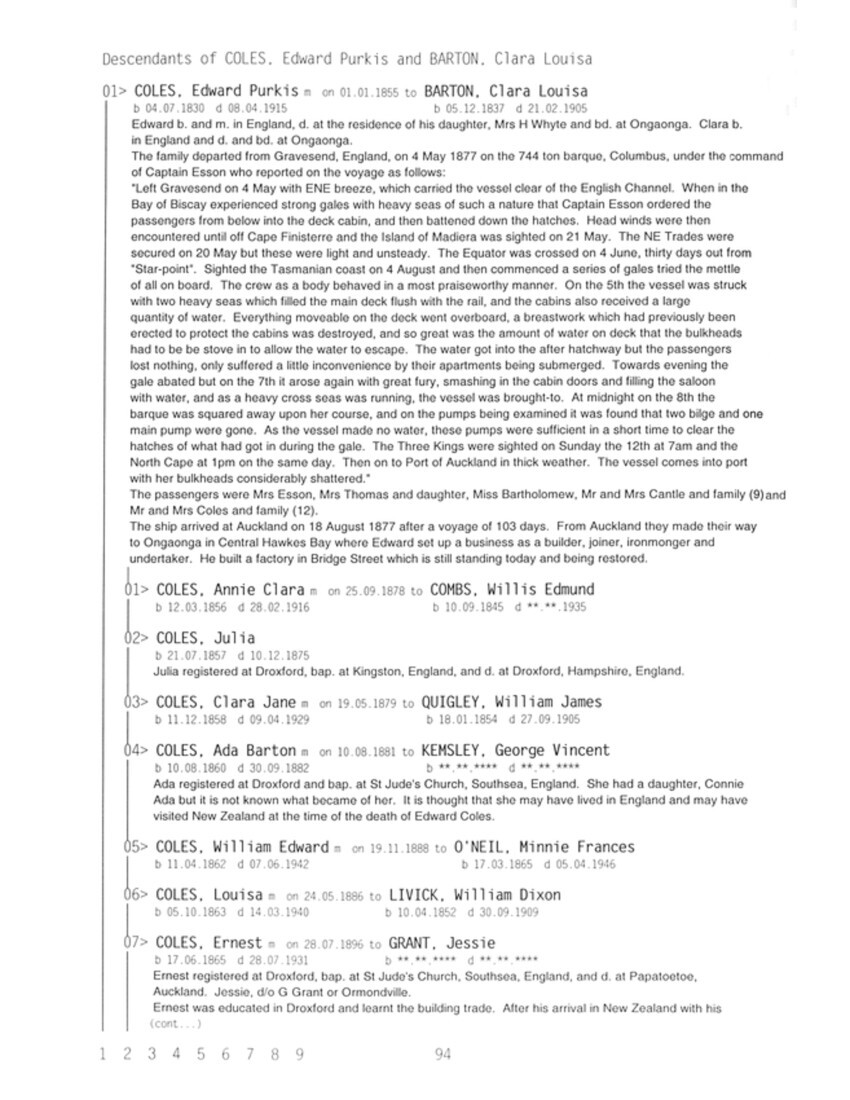
Page 95
Descendants of COLES, Edward Purkis and BARTON, Clara Louisa
COLES. Ernest and GRANT, Jessie (cont…)
parents in 1877, he served a full apprenticeship under his father in Napier. He subsequently worked for a time in partnership with his brothers in Ongaonga before starting on his own account at Ormondville. In 1900 he moved to Wanganui and established his business there.
Ernest is believed to have had two sons, Hector and Grant but it is not known what became of them.
08> COLES, Charles Robey m on **.**.1894 to THODSEN, Amalie Elizabeth (Emily)
b 25.03.1867 d 09.07.1959 b 25.08.1871 d 20.09.1932
09> COLES, George m on 04.03.1900 to CANTLE, Adeline
b 30.05.1869 d 26.04.1941 b 25.02.1872 d **.**.1964
10> COLES, Mary Jane m on 23.09.1896 to MILNE, Henry
b 24.01.1871 d 27.06.1945 b 01.03.1859 d 02.03.1951
11> COLES, Kate Emily m on **.**.*** to WHYTE, Harry James William Strachan
b 14.09.1872 d 31.08.1945 b **.** 1870 d 19.11.1943
12> COLES, Martha Emma m on 17.04.1906 to RUSSELL, Robert
b 24.05.1874 d **.**.**** b **.**.**** d **.**.****
Martha registered at Droxford, Hampshire, England, and m. at Ongaonga in a double wedding with her sister, Alice.
Martha and Russell lived on the Ongaonga-Waipukurau road and later went to Havelock North. They had a daughter, Clara and a son, Neil. They are both believed to have died young.
13> COLES, Edith m on **.**, **** to HURFIT, Jack
b 06.11.1875 d **.**.**** b 12 01.1874 d **.**.****
Edith registered at Droxford, Hampshire, England. They are believed to have had four children, Trevor, Aritt, Iris and Maurice who may have been brought up in Auckland. It is not known what became of them.
14> COLES, Frederick Purkis m on 26.01.1910 to VESTY, Alice
b 08.09.1877. d 06.08.1925 b 02.04.1888 d 24.09.1973
15> COLES, Samuel Arthur m on 04.09.1907 to VESTY, Margaret
b 24.06.1880 d 10.03.1943 b 27.11.1875 d 12.09.1955
16> COLES, Alice m on 17.04.1906 to GLENNY, Albert Frank
b 09.10.1881 d 21.06.1963 b 10.08.1882 d 16.08.1975
[…]
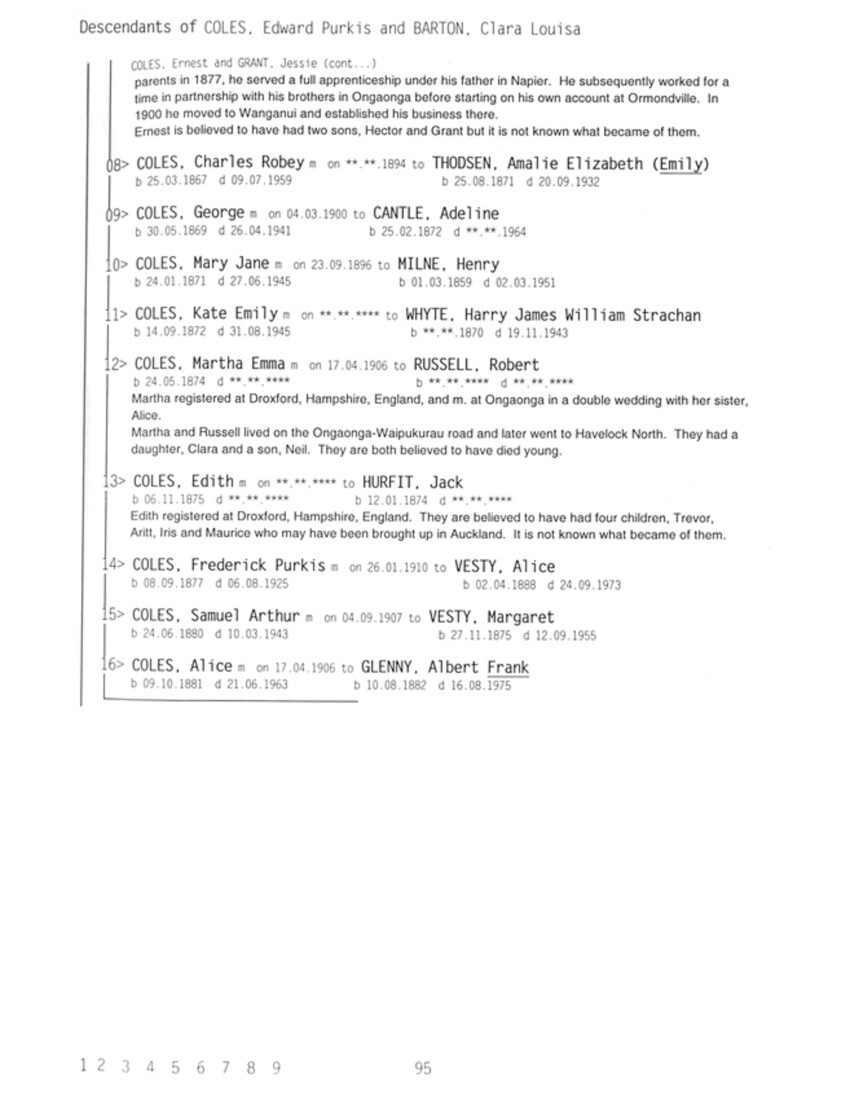
Page 96
COLES, Annie Clara
m to COMBS, Willis Edmund
Willis Ide
= QUIGLEY, Ada Mary
COMBS, Edward Charles P
= FLEMING, Clara
COMBS, Irvine Hanby (Ike)
= HOULKER, Audrey Marie
COMBS, Willis Ide
COMBS, Willis Ide (Bill)
= WILLIS, Grace
COMBS, Florence Marjory (Molly)
Harry Ernest
= WEBSTER, Ethel Bessie
COMBS, Marjory Ethel
COMBS, Joan Dorothy
= STEVENS, John Reginald (Jack )
COMBS, Barbara Faith
= MARSHALL, George James Stewart Ogilvy Latta
Frank Livingston
= THOMSON, Louise Florence Leys
COMBS, Louise Annie (Nancy)
= CAMPBELL, Arnold Everitt
COMBS, Jean Livingston
= BUCKLEY, Desmond
COMBS, Willis Livingston
= ??, Gladys
COMBS, Charles Thomson
= ANDERSON, Margaret Aileen deLancy
COMBS, Frank Spence
= MURRAY, Hazel
COMBS, Joseph Thomson
COMBS, Elizabeth Thomson (Betty)
= KENNEDY, Phipps
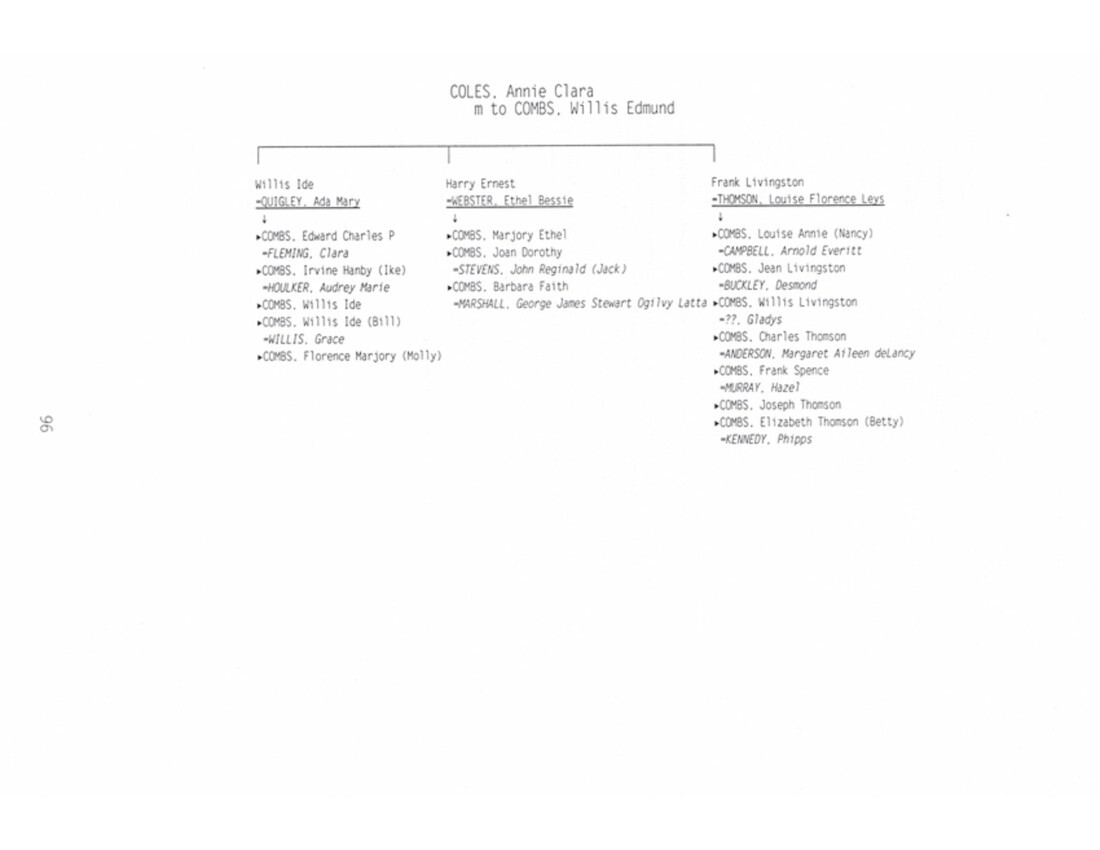
Page 97
Descendants of COLES, Edward Purkis and BARTON, Clara Louisa
COLES, Annie Clara and COMBS, Willis Edmund
01> COLES, Annie Clara m on 25.09.1878 to COMBS, Willis Edmund
b 12.03.1856 d 28.02.1916 b 10.09.1845 d **.**1935
Annie registered at Southsea, bap. at Kingston, England, and m. in the Ongaonga schoolhouse. Willis, s/o Henry Combs (b. at Warblington, 1804) and Sarah Ide (b. at Warblington, 1807), b. at Chichester, Sussex, England. He was the youngest of nine children and he stayed with his parents until at least age 15 (1861 census). In 1862 he was sponsored by John Evett to come to New Zealand on the “Telegraph”, a ship of 1,118 tons captained by A R Pope and chartered from Shaw Savill and Co. She left Gravesend on 23 April 1863 with 172 passengers. During the voyage she was detained by the Confederate raider, CSS “Alabama” under Captain Semmes but was allowed to proceed after her identity was established. This happened off the coast of Brazil. (The “Alabama” was later sunk by the steamer USS “Kearsarge” off the coast of France on 19 June of the following year.
Upon arrival of the “Telegraph” at Waitemata Harbour on 6 July 1863, all men of military age were sworn in and marched off to the Otahuhu Barracks. He served as a private in the 2nd Waikato Militia from 1863 to 1866 and was allocated confiscated Maori land at Alexander East and Mangapiko. It is not known what Willis did in the subsequent years until his marriage but, according to his marriage application, he had been living in Napier for five years prior to that event.
Details of the life of Annie and Willis are sketchy. The best information has been obtained from the pages of the book, “Growing Up in the Forty Mile Bush” written by their son Harry and published in Hamilton in 1951. It has been reproduced in full elsewhere in this book, so the following is a very brief summary of the early life of the family.
Apparently Willis and Annie settled first in Napier. Somehow a bank failure set him adrift and he was declared bankrupt in 1884. They then apparently took up a block of bush land at Makotuku near Ormondville and set about breaking it in. Devastated by bush fires and other misfortunes, they found themselves in debt, was declared bankrupt in Napier in 1884, and lost the farm. Willis then obtained a job at Porangahau as storekeeper where they remained for four years. Then, to provide the better for the education of their children, they moved to Dannevirke. It is not clear what Willis did for a living in Dannevirke – he may have worked as a bushman or again as a storekeeper. Harry also wrote at length about Ongaonga. If he was there with his family, it is possible that Willis worked for his father-in-law in the building business. But perhaps Harry was only visiting with his grandparents. He does no elaborate. The family returned to Napier, probably in the early 1890s, then moved on to Gisborne where Harry ended his school days when he developed typhoid fever.
What the family did for the next forty years is unknown. Willis next comes to attention on the title deed of a cottage in Ongaonga in the 1930s when he was described as a retired draper from Wellington. The cottage passed to his sons, Harry and Frank in the mid 1930s and is now owned by Rex and Adriene Evans, the compilers of this book. In his final years, Willis lived with his son Harry and family in Wellington. Willis was a Christadelphian and had a strong dislike of any form of uniform. He was a very accomplished gardener and planted by the moon. He had an elder brother, Charles Henry Combs (1832-1924) who served with the 72nd Queen’s Own Highlanders in India during the Mutiny. He came out to New Zealand on the “Maori in 1866 when his enlistment expired and he died in a veteran’s home in Auckland. His war memoirs are in the Alexander Turnbull Library.
01>COMBS, Willis Ide m on 19.10.1910 to QUIGLEY, Ada Mary
b 22.11.1879 d 31.03.1920 b 11.08.1883 d 18.10.1966
Ada, d/o William James Quigley and Clara Jane Coles, d. at Palmerston North. Willis, in his late teens, ran away to sea to avoid parental pressure that he should study for the bar. He wanted to be an engineer. He joined the US merchant navy, and from there eventually ended up in Portland, Oregon. There he became involved in the timber business for a number of years before returning to New Zealand around the age of 29-30 years. On his return he was placed in charge of the Taumarunui Forestry project, working for a local timber company in Auckland. He lived a comfortable life with his wife and four children, and was the first owner of a Model “T” Ford in the area. Tragedy struck towards the end of his life, when a very close and trusted American associate in Oregon got into financial difficulties and asked Willis to act as guarantor for a loan. Willis agreed, but his guarantee was called in, and he was bankrupted. Shortly afterwards Willis died after falling under a tram in Auckland.
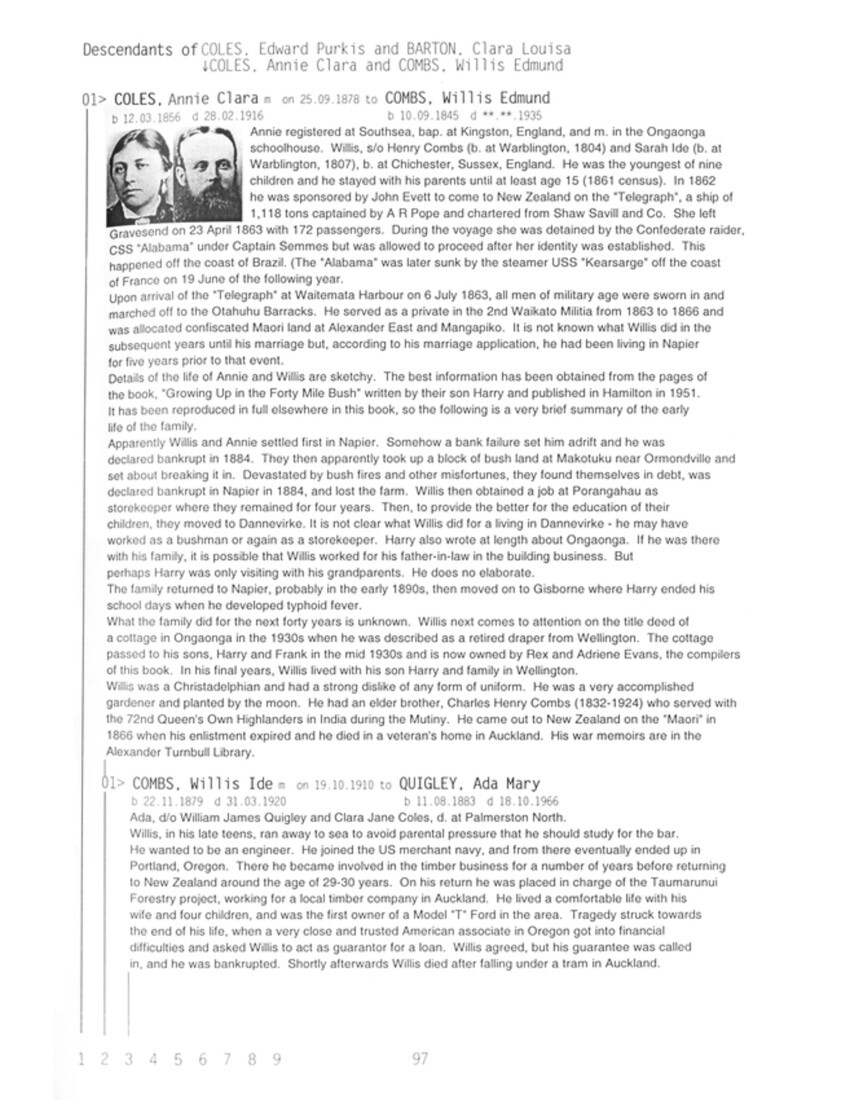
Page 98
Descendants of COLES, Edward Purkis and BARTON, Clara Louisa
COLES, Annie Clara and COMBS, Willis Edmund
COMBS, Willis Ide and QUIGLEY, Ada Mary
01> COMBS, Edward Charles P m on 18.04.1937 to FLEMING, Clara
b 06.06.1912 d 31.01.1974 b 23.12.1909 d 07.02.1984
Edward b. at Taumarunui, d. at Kawakawa and bd. at Kaikohe Cemetery. Clara, d/o Robert Fleming and Agness Merrylees, b. at Waipukurau, d. at Waipawa and bd. at Kaikohe Cemetery.
01> COMBS, Patrick John m on 20.06.1964 to RATCLIFFE, Marilyn May
b 16.05.1939 b 19.09.1944
Patrick b. at Waipukurau and m. at Northcote, Auckland. Marilyn, d/o Donald Albert Ratcliffe and Edith Lorna Shepherd, b. at Auckland. Address: 7 Docker Street, Wagga Wagga 2650, NSW, Australia. Patrick started primary school in Waipukurau in 1945 but when the family moved to Kaitaia later in the year, he continued at Kaitaia Primary School until 1950. He spent his first secondary year at Kaitaia College then went to Northland College in Kaikohe until 1955, gaining his Higher School Certificate. In 1956 he started work as a technical trainee with the New Zealand Broadcasting Service, stationed at 1XN in Whangarei. In April of that year he was sent to Wellington to attend a 10-week training course and in October he was transferred to Auckland to work at 1ZB in Durham Lane for three years. He then worked for a year at the Auckland Recording Studios in Shortland Street. During this time he also worked part-time in the pioneering days at AKTV2, New Zealand’s first TV station. In 1960 he was appointed to the full-time staff of AKTV2 and on opening night he was No 2 cameraman (David Hendry was on camera No 1).
In 1961 Patrick gained his First Class Certificate in Radio Technology and in December 1964 he took up a position with Riverina Television P/L (RVN2) in Wagga Wagga, New South Wales, as a senior technician. In 1967 he joined a friend, Jeff Hodgson, in a small radio and television sales and service business called The Sound Centre. After three weeks in the business Jeff died and Patrick carried on the business with his wife as a silent partner. In 1971 they dissolved the partnership and Patrick joined Riverina Broadcasters 2WG as their engineer, a position he still holds. In that time he has rebuilt the station twice and in 1994 he built an FM station for the company (FM93).
In 1995 Riverina Broadcasters was sold to BMG Radio, a NSW consortium, and in 1996 the company was sold again to The London Daily Mail newspaper group and is now known as DMG Radio Australia. Patrick went to Nanjing, China, in 1996 and spent six weeks supervising the installation of sound systems in a marine theme park which was designed in Australia and financed by a company based in Singapore.
Marilyn was educated at Mount Albert Primary School, Kowhai Intermediate School in Kingsland and Auckland Girls’ Grammar School (1958-61), attaining her Higher School Certificate. She worked at John Courts department store in Auckland in school holidays and after school and in 1962 she started work with the New Zealand Broadcasting Service at 1ZB in Durham Lane. She was transferred to the Auckland Recording Studios in Shortland Street as a technical assistant and from 1963 until her marriage she was at AKTV2.
Whilst the children were growing up she worked in various merchandising jobs in the grocery field, one being with Marrickville Holdings. For the past ten years she has been employed by the Charles Sturt University in the Department of External Studies.
[…]
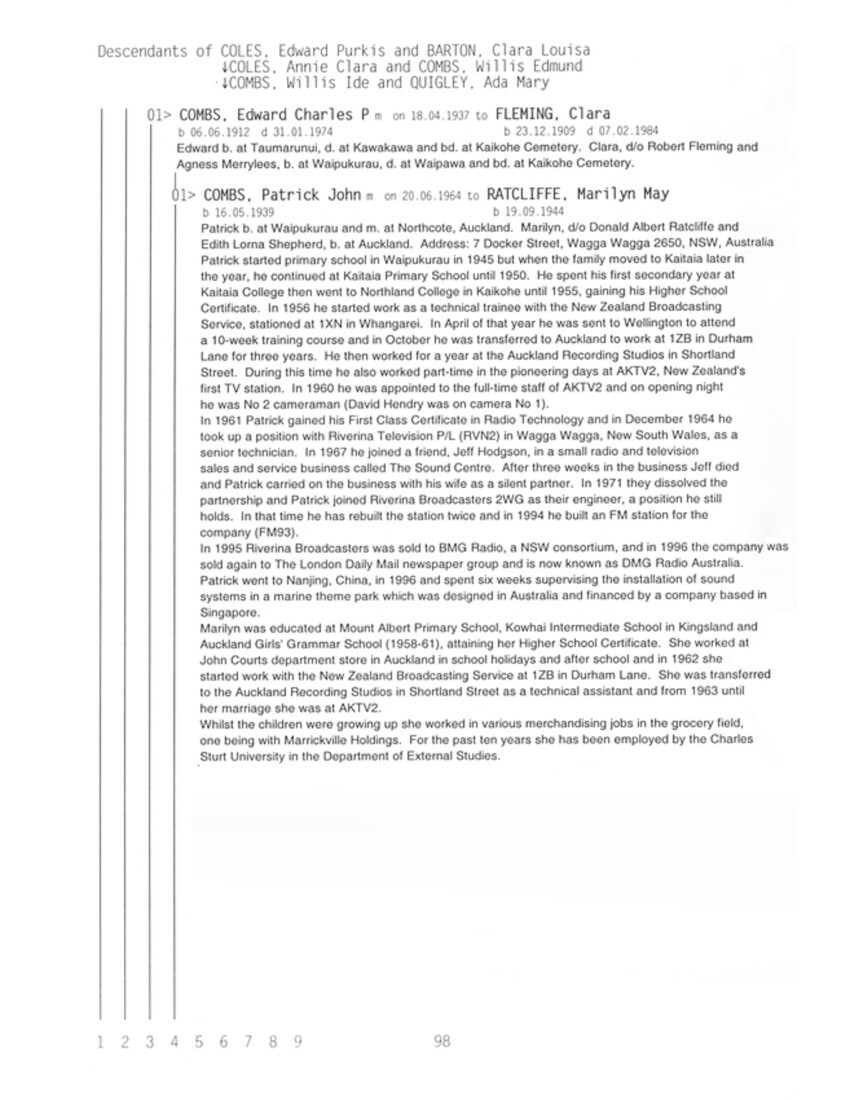
Page 99
Descendants of COLES, Edward Purkis and BARTON, Clara Louisa
COLES, Annie Clara and COMBS, Willis Edmund
COMBS, Willis Ide and QUIGLEY, Ada Mary
COMBS, Edward Charles P and FLEMING, Clara
COMBS, Patrick John and RATCLIFFE, Marilyn May
[…]
02> COMBS, Helen Kathleen m on 06.05.1961 to MCGREGOR, John Morison
b 06.11.1940 b 02.04.1937
Helen b. at Waipukurau and m. at Kaikohe. John, twin s/o John and Anne (Nancy) McGregor, b. at Kawakawa. Address: 35 Otuhiwi Crescent, Tikipunga, Whangarei. The Ted Combs family lived at Nelson Street, Waipukurau until 1945 when they moved to Kaitaia. Helen attended primary school in Kaitaia until 1953 when the family moved to Kaikohe. She had a year at Kaikohe Primary School then went to Northland College from 1954 to 1958. She represented (cont…)
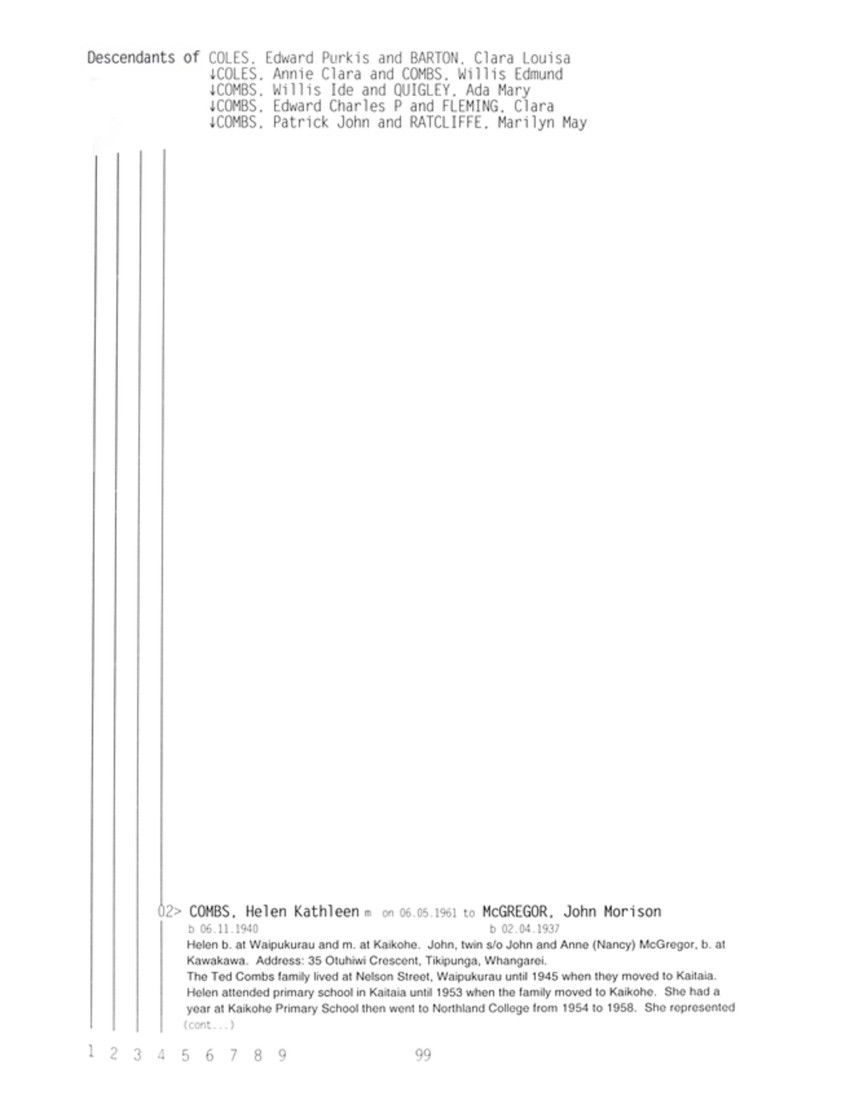
Page 100
Descendants of COLES, Edward Purkis and BARTON, Clara Louisa
COLES, Annie Clara and COMBS, Willis Edmund
COMBS, Willis Ide and QUIGLEY, Ada Mary
COMBS, Edward Charles P and FLEMING, Clara
COMBS, Helen Kathleen and McGREGOR, John Morison (cont…)
the college for four years at both athletics and hockey, and continued to play hockey after leaving school. In 1958 Helen joined the accountancy firm of Cracknell, Toplis and Fletcher and for three years she learned the skills of bookkeeping.
John was educated at Kaikohe Primary School and Northland College, leaving in 1955 to join the Post Office in Kaikohe as a technician. He moved to the Whangarei Post Office in 1960 and remained there except for four years which he spent in Western Samoa. As a technician, he was responsible for the installation of many telephone exchanges. With the changeover to Telecom, he held several management positions until taking early retirement in 1993.
Helen and John set up their first home in Onerahi, Whangarei. Later they moved to Tikipunga where they built a new home. In 1970 Helen returned to the workforce, working for the local Mobil Service Station until 1975 when the family moved to Western Samoa for four years where John was in charge of the installation of a new telephone exchange. Back in Whangarei in 1980, Helen again worked for Mobil and remained there until 1988 when she retired to care for John’s mother. John and Helen have both been members of St John Ambulance and are currently also Elders in the Trinity Uniting Church in Tikipunga. Helen has been involved with the Girls’ Brigade for 28 years and is currently Captain of the local company. She also teaches Sunday School and John is a lay-pastor.
[…]
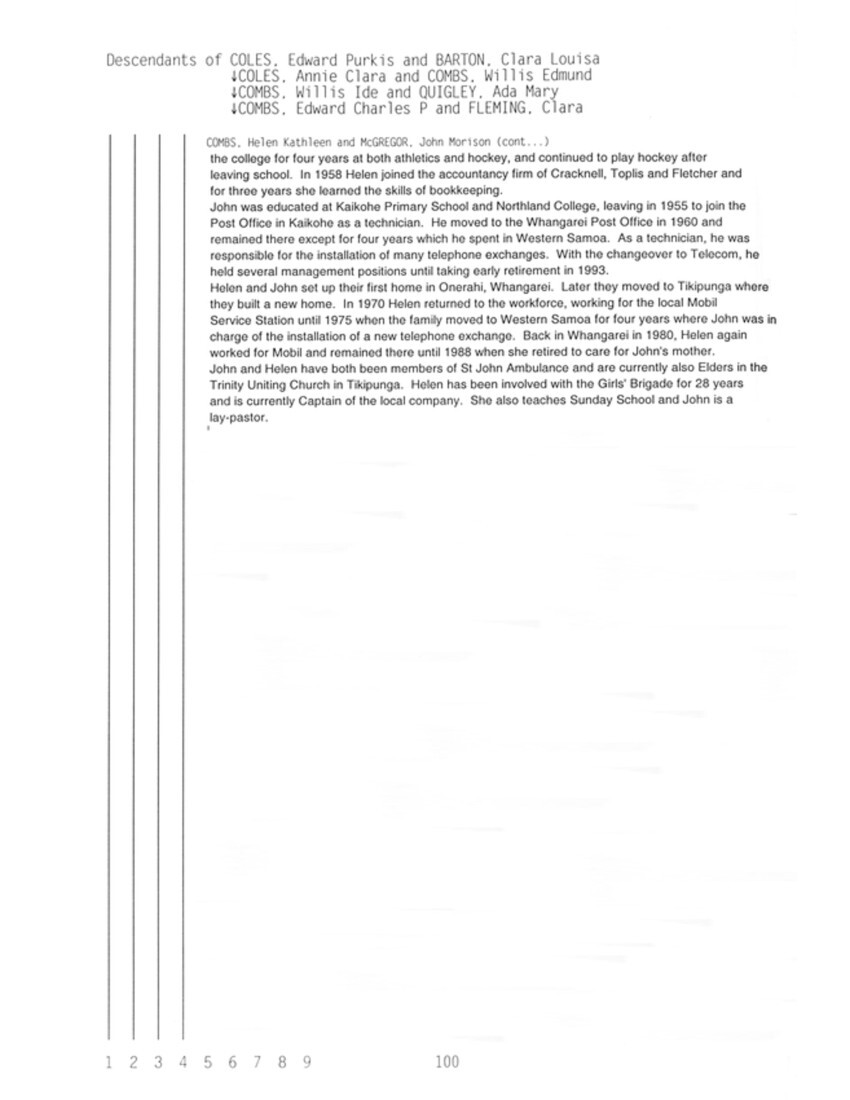
Page 102
Descendants of COLES, Edward Purkis and BARTON, Clara Louisa
COLES, Annie Clara and COMBS, Willis Edmund
COMBS, Willis Ide and QUIGLEY, Ada Mary
COMBS, Edward Charles P and FLEMING, Clara
COMBS, Vivien Mary and CRANE, Trevor John
[…]
02> COMBS, Irvine Hanby (Ike) m on 03.06.1942 to HOULKER, Audrey Marie
b 14.04.1914 d 01.03.1989 b 27.07.1913
Irvine b. at Taumarunui, m. at Wellington and d. at Palmerston North. Audrey, d/o William Houlker and Gladys Olive Harley, b. at Nelson. Address: Palmerston North Retirement Village, Cnr Grey + Carroll Street, Palmerston North.
Irvine joined the staff of Waughs Flower Shop in Wellington about 1938 as an apprentice seedsman. At that time it was a flourishing business with a nursery in the Hutt Valley and a shop in Lambton Quay. It was one of only two retails seed outlets in Wellington, the other being F Cooper Ltd. Trade at Waughs was so brisk on Saturdays that a person was employed to control the crowd at the door. Some of their regular customers included Lord and Lady Bledisloe, Dame Elizabeth Knox Gilmer and Sir Alex Roberts. The nursery part of the business planted the gardens for some of the more notable properties in Wellington including Lower Hutt’s Woburn Homestead, the Karitane Home, the Trentham Racecourse and the Riddiford Homestead at Orongorongo Station. The nursery side of the business ceased in 1950 when the Waugh family decided to quit its interest in the company and placed it in voluntary liquidation. The retail outlet moved to premises in Bowen Street and Irvine took it over. He specialised mainly in cut flowers until closing down in 1988 on account of uncertainty over the lease in the government-owned building, as well as ill health. He and Audrey retired to Raumati.
Audrey was educated at Nelson College for Girls and Sacred Heart College.
Refer to “The Kerr Family of Nelson” published by Evagean Publishing in 1999 for information on Audrey’s family.
[…]
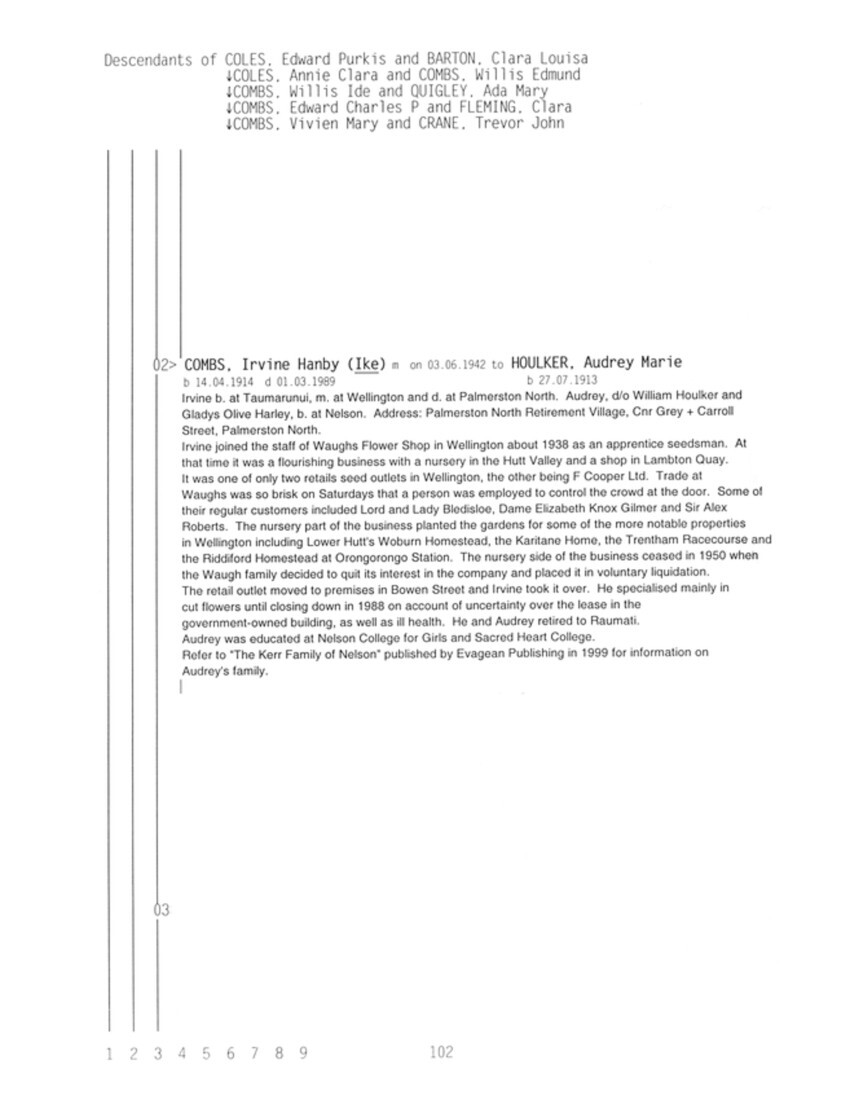
Page 103
Descendants of COLES, Edward Purkis and BARTON, Clara Louisa
COLES, Annie Clara and COMBS, Willis Edmund
COMBS, Willis Ide and QUIGLEY, Ada Mary
04> COMBS, Willis Ide (Bil1) m on 08.04.1942 to WILLIS, Grace
b 06.05.1916 d 13.01.1994 b 16.02.1913
Willis b. at Melbourne, Australia, m. at Bexhill, England and d. at Wadhurst, Sussex, England. Grace, d/o Thomas and Jessica Sarah Willis, b. at Watford, Herts, England. Address: Lower Cottage, Lower High Street, Wadhurst, Suffolk, England TN5 6BE.
Willis moved to New Zealand as a child and attended Dannevirke North School (1922-27) where he was Dux in his last year. He went on to Dannevirke High School and was known for specialising in the study of languages. In 1930, at the age of 14, he passed a university examination. In December 1932 he was presented with the medal for Dux of Dannevirke High School by Hon E A Ransom, MP. His list of achievements included being placed first in English, Latin, French and chemistry, second in history and winning the senior OPA essay prize. He was also head prefect of the school. He was loudly cheered by the school as he was presented with his medal. Later, recalling his school days, he said that he was “the first boy to have the distinction of spilling a trayful of inkwells over the floor of the new wing”.
After leaving high school, Willis attended Victoria University College in 1934. He completed his BA degree, being awarded a senior scholarship in French and being proxime accesit to the senior scholar in Latin. With another, he was awarded the Robert Stout bursary. Whilst at Victoria, he was a member of the harrier club and the defence rifle club and played for college football teams. He was also news editor on the college paper. He took a position of relieving teacher at Timaru Boys’ High School and had been appointed to the permanent staff when he advised that he had been awarded a Shirtcliffe Fellowship which took him to St John’s College in Cambridge. The Fellowship was worth £250 per year for two years and also paid his passage to the United Kingdom. In his first year he gained a first class pass, a college scholarship and Wright’s prize, being the highest awards bestowed by the university. He was at Bonn University when WW2 broke out and had difficulty getting back to England. He served in the British Intelligence Service and helped plan the D-Day Landing in 1944. He then joined the British Foreign Service and served in Paris, Rio de Janeiro, Beijing, Baghdad and Rangoon and was British Ambassador to Indonesia from 1970 until 1975. During his tour of duty the Queen and Prince Philip made a State Visit to Indonesia and Willis was with them when an attempt was made to kidnap Princess Anne in London. It was during that visit that he was knighted. Grace was educated at Watford Grammar School for Girls and graduated BA from Bedford College for Women in London in 1934.
Willis and Grace retired in 1975 to Sussex, England.
In addition to Willis’s many other talents, he was a great craftsman, producing beautifully crafted pieces of furniture, fitted cupboards and shelves. He was also a talented storyteller, toymaker, and possessor of a very dry and humorous wit. Grace continues to keep up with her Italian (learnt while she and Willis were in Rome) and now tutors a friend in the language. She is an enthusiastic gardener and is currently learning bridge.
01> COMBS, Janet Barbara m on 26.06.1971 to (1) PIGOTT, James Francis Gillery
b 18.02.1943 b 27.07.1933 d 23.12.1988
Janet b. at London, England and m. at Boston, Lincolnshire, England. Divorced. Francis, s/o Owen Rupert Pigott and Phyllis Pleasance Case, b. at London, d. at Glasgow and bd. at Horley nr Banbury, Oxon.
Francis attended preparatory school at Town Close House, Norwich, Norfolk, which was evacuated during World War II to Barbon Manor in Westmoreland (now Cumbria). He went on to Westminster School in London then trained as a doctor at St Bartholomew’s Hospital, London. He also rowed for the London Rowing Club, winning numerous cups.
His medical career spanned both General Practice and Anaesthetics, achieving a fellowship of the Faculty of Anaesthetists of the Royal College of Surgeons in 1968, and a consultant appointment in Anaesthetics to the Boston (Lincolnshire) group of hospitals in 1970. He held a similar appointment on emigrating to Winnipeg, Manitoba, Canada. Concurrently he became involved in medical politics, at one point holding the chairmanship of the Junior Hospital Doctors Association of which he was a co-founder, and later being elected to the General Medical Council. Upon his return to the UK in 1977, he was appointed an under-secretary to the British Medical Association which involved him in a full time career in medical politics. He moved to Glasgow in 1987, and following his divorce from Janet married Christeen Mundell shortly before his death from cancer.
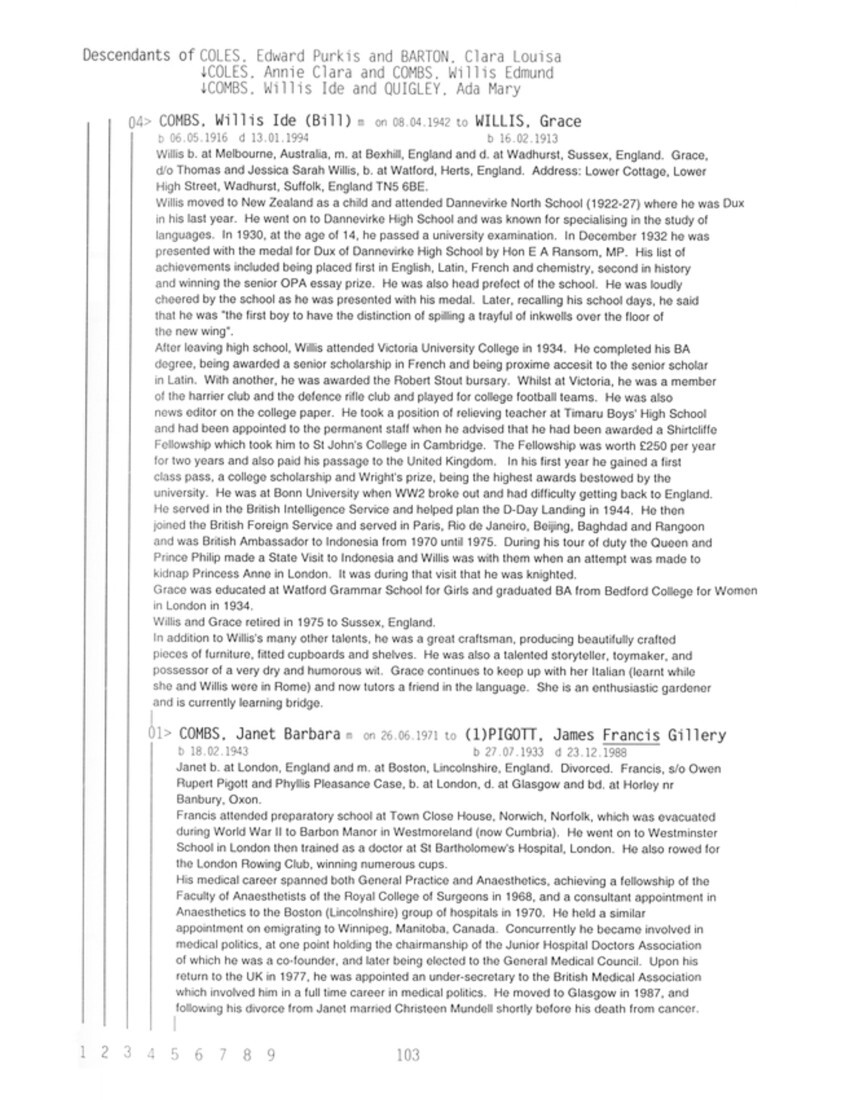
Page 104
Descendants of COLES, Edward Purkis and BARTON, Clara Louisa
COLES. Annie Clara and COMBS, Willis Edmund
COMBS, Willis Ide and QUIGLEY, Ada Mary
COMBS, Willis Ide (Bill) and WILLIS, Grace
COMBS, Janet Barbara and PIGOTT, James Francis Gillery
[…]
01> COMBS, Janet Barbara m on 29.12.1994 to (2) SKUBLICS de VELIKE et de BESENYO, Ernest
b 18.02.1943 b 14.01.1936
Janet m. at Dent nr Sedbergh, Cumbria, England. Ernest, s/o Viktor Skublics de Velike et de Besenyo and Edina Barcs, b. at Budapest, Hungary. Address: 115 Welch Street, Silverton, Oregon 97381, USA.
Janet is currently living in Oregon, USA, returning with Ernest to Broadfield House, Dent, Sedbergh, Cumbria LA10 5TG, UK in June 2000. She was educated at various schools overseas until 1956 when she went to Wispers School, West Sussex, UK. During her time there she won senior school prizes in French and Art as well as the Sixth form prize, and was appointed head girl during her final year 1961-62.
She studied medicine at the Royal Free Hospital School of Medicine, obtaining a Certificate of Merit in Venereal Diseases in 1970. In the same year she was awarded the degrees Batchelor of Medicine and Batchelor of Surgery. Following appointments as House Physician (Royal Free Hospital, Grays Inn Road, London) and House Surgeon (Lincoln County Hospital, Lincolnshire) from 1970-1971, she obtained a traineeship in General Practice in Lincolnshire, which was completed shortly before the birth of her son Rupert in June 1972. Janet then obtained a post as a Clinical Medical Officer in Public Health for the Holland and Kesteven Districts in Lincolnshire. In November 1973, Janet and her husband Francis emigrated to Winnipeg, Canada, where her daughter Katherine was born. On the family’s return to England, Janet accepted part-time posting as a Clinical Medical Officer in Community Health in Cumbria, eventually specialising in the audiologist screening of hearing impaired children.
Janet was elected to Dent Parochial Church Council and nominated a governor of Dent Primary (cont…)
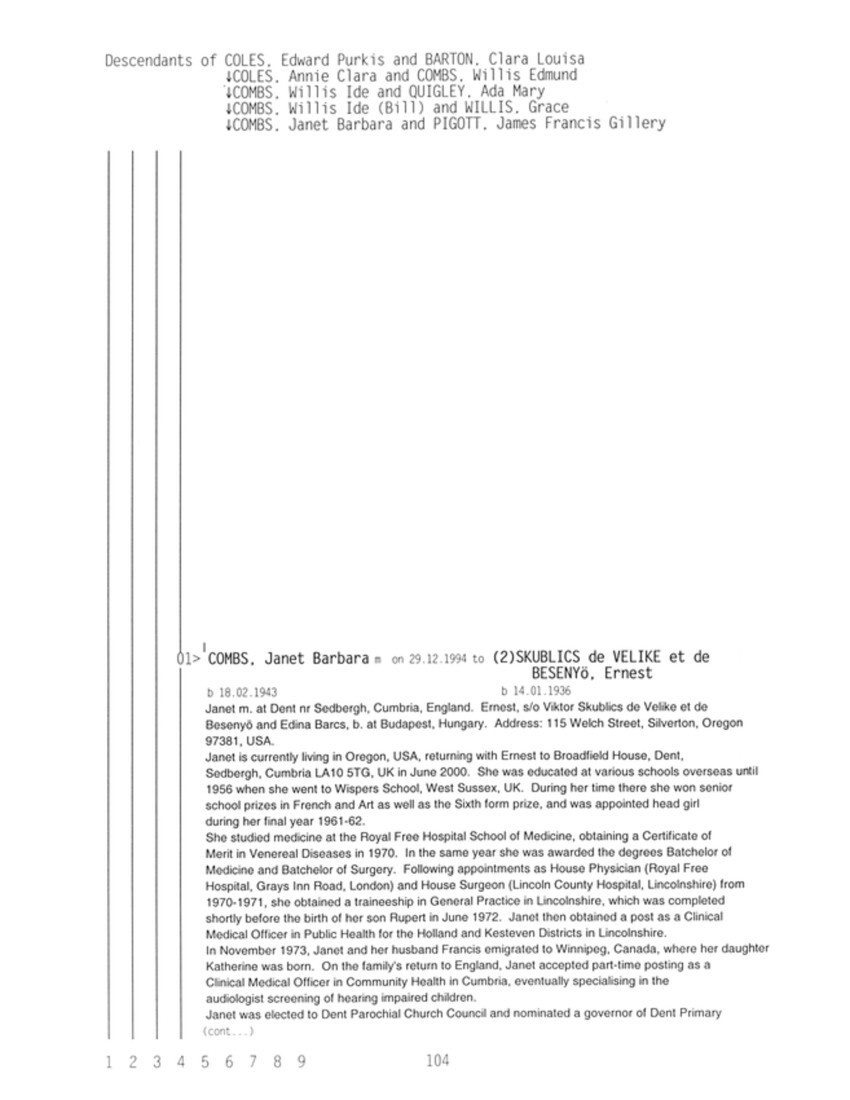
Page 105
Descendants of COLES, Edward Purkis and BARTON, Clara Louisa
COLES, Annie Clara and COMBS, Willis Edmund
COMBS, Willis Ide and QUIGLEY, Ada Mary
COMBS, Willis Ide (Bill) and WILLIS, Grace
COMBS, Janet Barbara and SKUBLICS de VELIKE et de BESENO, Ernest (cont…)
School, serving as Vice chairman of Governors until her departure to South Africa.
In 1989 she was appointed a Fellow of the Society of Public Health (now known as the Royal Institute of Public Health and Hygiene). Following her divorce and the death of Francis she accepted a post as Senior Medical Officer at Jane Furse Hospital in the Transvaal, South Africa, 1990-1992. While there she was in charge of the Paediatric ward as well as being available for emergency cover and regular work in most specialties including obstetrics, orthopaedics, medicine, infectious diseases and minor surgery, as well as some teaching.
In 1993 Janet was appointed Appeal Co-ordinator of the Macmillan Cancer Relief Fund for Cumbria. It was also in 1993 that Ernest, who had been widowed in 1991, set about a long distance courtship from Oregon where he is Academic Dean of Mount Angel Seminary. Janet and Ernest had first met in the 1970s in Winnipeg, Canada. After their marriage, Janet moved to Oregon in January 1995, and shortly after her arrival commenced studying for a Master of Arts degree in Theology at Mount Angel Seminary, which she obtained in May 1999. She was also placed on the Dean’s Honour List, Mount Angel Seminary 1995-1997. Janet also taught Human Biology and Health at Mount Angel Seminary from 1995-1997, and is currently a member of the Seminary choir and schola group. In 1956 Ernest escaped from Communist controlled Hungary to Austria while it was still possible to do so, and from there emigrated to Canada, where he met and married his first wife, Christine Farley. Ernest did his studies in Hungary, Canada, the US, Italy, Germany and Holland. He earned a Batchelor of Theology degree in Rome, Master’s and License degrees in Theology in Canada, a Diploma in Liturgical Studies in Trier, Germany, and his Doctorate in Theology from the University of Nijmegen, Holland.
He was ordained in the Anglican Church of Canada and was a contributor to the 1985 Book of ’ Alternative Services of the Anglican Church of Canada. Ernest has taught Theology at the Universities of Ottawa, Toronto, Manitoba and Seattle where he was Associate Director of the Institute for Theological Studies. He has just completed six and a half years as Academic Dean of Mount Angel Seminary, and is currently working on a book. His numerous publications in Canada, Holland, the US, Germany and Britain, are mostly in the areas of Liturgical Studies and Ecclesiology. He is also an enthusiastic sailor, a passion that started in his childhood sailing on Lake Balaton in Hungary, winning several awards for racing in both Hungary and Canada. Ernest is also an accomplished poet and artist. He is also the father of three children, a son and two daughters, and grandfather to three (soon to be four!) grandchildren.
[…]
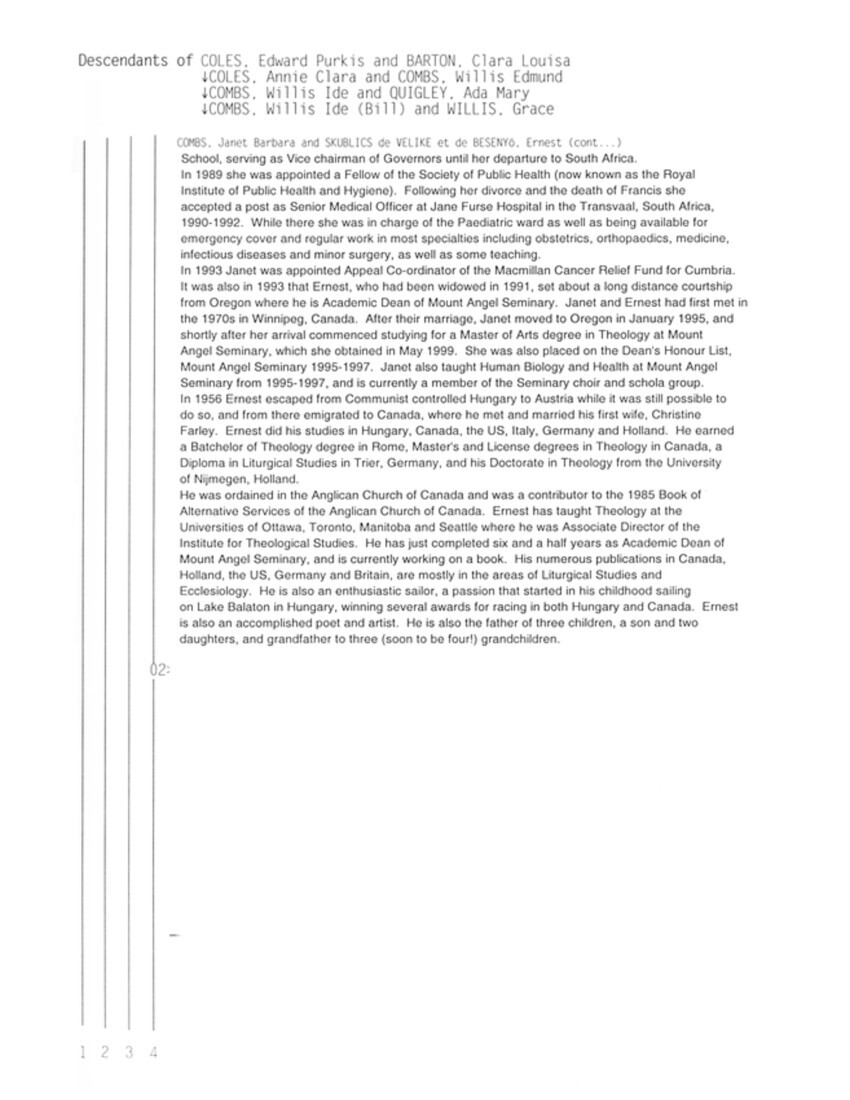
Page 106
Descendants of COLES, Edward Purkis and BARTON, Clara Louisa
COLES, Annie Clara and COMBS, Willis Edmund
COMBS, Willis Ide and QUIGLEY, Ada Mary
COMBS, Willis Ide (Bill) and WILLIS, Grace
COMBS, Alison and MARSHALL, David Ashmead
[…]
05> COMBS, Florence Marjory (Molly)
b 11.02.1918 d 16.07.1999
Florence b. at Dannevirke and d. at Palmerston North.
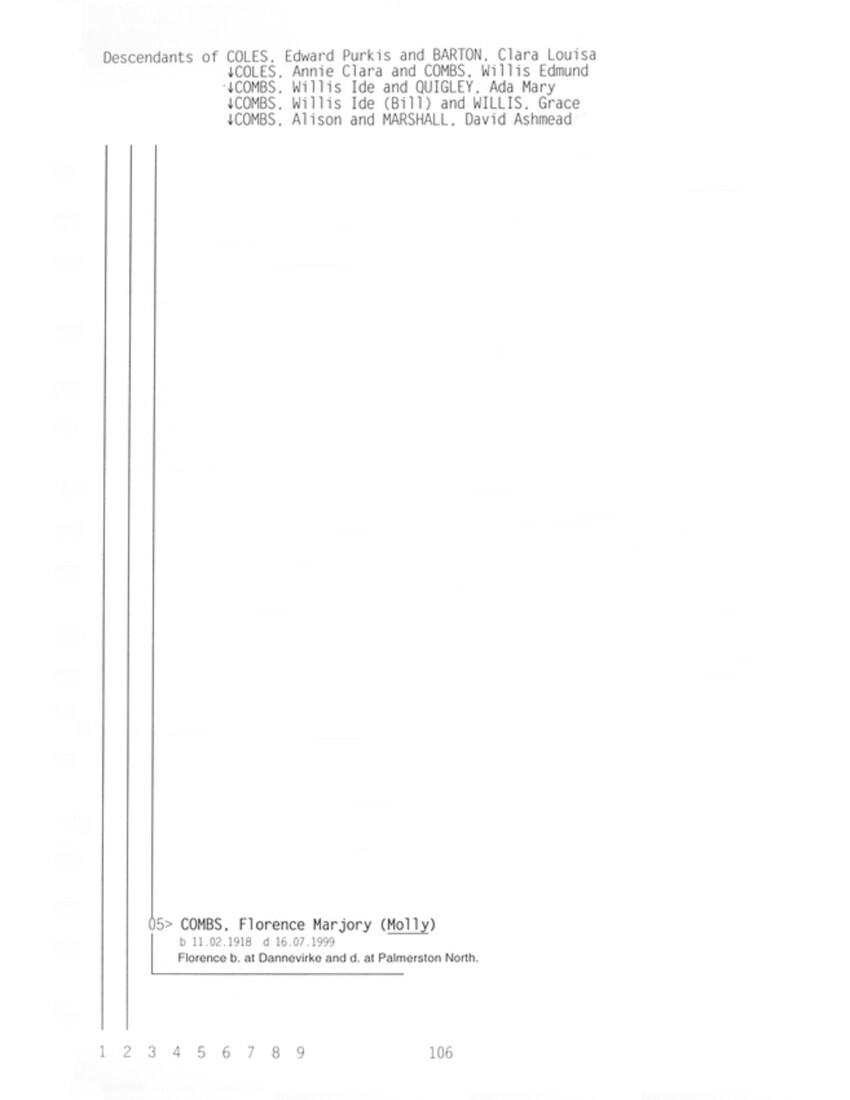
Page 107
Descendants of COLES, Edward Purkis and BARTON, Clara Louisa
COLES, Annie Clara and COMBS, Willis Edmund
02> COMBS, Harry Ernest m on 09.06.1908 to WEBSTER, Ethel Bessie
b 14.01.1881 d 21.06.1954 b 23.03.1882 d **.**.****
Harry b. at Napier and m. at Brooklyn, Wellington by Rev Wm Shirer. Ethel, d/o Alexander Low Webster (accountant of Greytown) and Minnie Richards, b. at Greytown. Her father was born at Bally Keenan in Ireland on 23 December 1853 (or 1863) and her mother at Grasspark, Wexford, England on 13 March 1848. They were married at Dublin, Ireland on 6 May 1875 (or 1876).
Harry was educated at Makotuku, Porangahau, Dannevirke, Napier and Gisborne. He started work as a newspaper runner for the Poverty bay Herald before joining the Post and Telegrapn Department as a messenger. He was a Captain in the Post and Telegraph Corps of the Territorial Army at Trentham during WW1 but did not serve overseas. He was Editor of “Katipo”, the Post Office Union magazine (1909-26), Chairman of the New Zealand Post and Telegraph Association (1909-11) and Permanent Secretary (1916-26), Secretary of the New Zealand Rugby Football Union (1919-26), and a member of the Hataitai School Committee (1926-??). In 1926 he took up a partnership in a printing business in Wellington, the Civic Press Co Ltd.
Harry contested the Wellington North electorate against Sir John Luke in 1922 and 1925. In 1938 he was chosen as Labour Party candidate for the new seat of Wellington Suburbs and he won the contest against Dr O C Mazengarb with a majority of nearly 3,500. He held that seat until it was abolished in 1946 and won the Onslow seat in that year’s General Election. He was first elected as a Labour member of Parliament for Onslow in 1938 and was re-elected in 1949. In the last two years of the Labour Government he was Under Secretary to the Minister of Finance, Mr Walter Nash. He was the official representative on the Disabled Servicemen’s Rehabilitation League and the Central Milk Council and was Chairman of the Hutt Valley Rehabilitation Committee. He was a member of the Wellington Crippled Children’s Society and on the National Executive of the New Zealand Labour Party. He was awarded the Coronation Medal at Wellington in 1953. He was living at 23 Kainui Road, Hataitai, Wellington, in 1931.
Harry represented New Zealand at two Commonwealth Parliamentary meetings in Canada and the UK and also at the Queen’s coronation in 1953.
Harry was an avid reader and helped all his children to gain an appreciation of literature. He had no car and the most distant holiday that his daughter Barbara can remember was going by train to Waipukurau and then to Ongaonga to see his father. Walter Nash was a close friend of the family and he paid a moving tribute to Harry after his death. Harry was very knowledgeable about the American Civil War and had a collection of books on Abraham Lincoln, Robert E Lee, Stonewall Jackson and the Virginia Campaigns.
01> COMBS, Marjory Ethel
b 31.08.1909 d **.**.****
Marjory was a delicate, shy child. She worked as a typist for some years after leaving school and she also learnt to play the piano very well. She was an active member of the All Saints Anglican Church at Kilbirnie. After her father died she continued to live in the family home with her mother. Others of the family as well as parishioners looked out for them and paid regular visits. After her mother died she stayed on at the home until illness forced her to go into hospital where she died suddenly.
02> COMBS, Joan Dorothy m on 03.06.1947 to STEVENS, John Reginald (Jack)
b 05.01.1911 d 19.03.1999 b 12.10.1910 d 22.03.1996
Joan m. at St Thomas Anglican Church, Newtown.
01> STEVENS, Valerie Ann m on 23.11.1963 to WALSH, David
b 24.11.1938 b 16.06.1940
Ann b. at Wellington. Address: 52 Chisholm Street, Anslie, Canberra, Australia.
Ann was educated at Nelson and at Worser Bay School in Wellington then at Wellington East Girls’ College. She enjoyed Brownies and Guides and in 1954 she represented Wellington Girl Guides when she presented to the Queen a huge jigsaw for Charles. She worked in broadcasting and TV for ten years and after her marriage to David they built a house at Strathmore above the airport from where they had a superb view. They moved to Canberra, Australia in 1968 where David worked at the Australian National University. Ann continued with Guiding and ran a unit there for eight years. For the past 18 years she has worked at Ainslie Primary School. She enjoys swimming, tennis and walking.
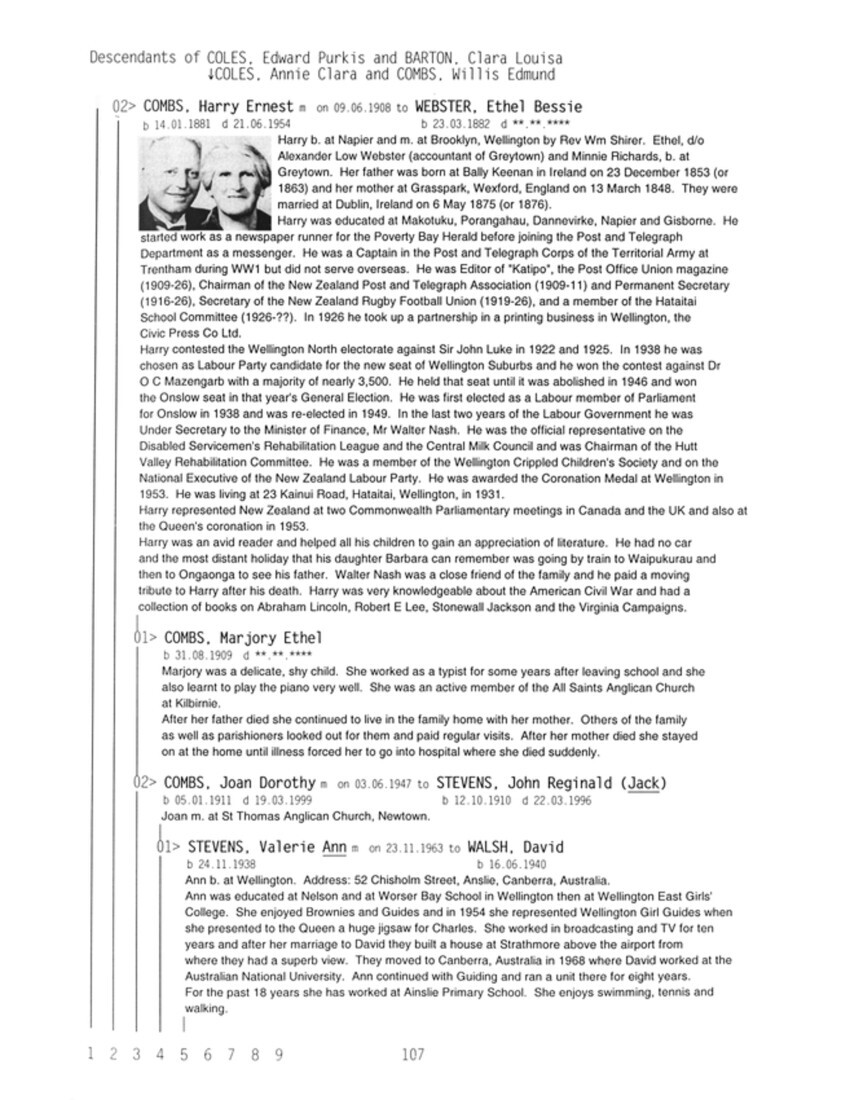
Page 108
Descendants of COLES, Edward Purkis and BARTON, Clara Louisa
COLES, Annie Clara and COMBS, Willis Edmund
COMBS, Harry Ernest and WEBSTER, Ethel Bessie
COMBS, Joan Dorothy and STEVENS, John Reginald (Jack)
STEVENS, Valerie Ann and WALSH, David
[…]
02> STEVENS, John Anthony
b 04.11.1940 d 26.09.1955
Anthony died of leukemia at about age 15.
03> STEVENS, Michael Vere m on 30.03.1968 to COCHRANE, Lois May
b 22.10.1943 b 13.11.1943
Michael b. at Wellington and m. at Plimmerton. Lois, d/o lvan Cochrane and Ethel Cramp, b. at Lower Hutt. Address: 27 Kaimanawa Street, Paraparaumu.
Michael was educated at Worser Bay Primary School, Rongotai College and finally Wellington College after his parents moved from Miramar to Eastbourne. He started work as a draughting cadet and later worked in the river pollution section of the Ministry of Works. After a short period as a radio technician, he completed an adult apprenticeship in carpentry and remained in the building field for a number of years. He also spent short periods as a motel and hardware shop manager before joining the Housing Corporation as a building supervisor. In 1978 he became involved in computers in the Housing Corporation and on its breakup he moved to the Ministry of Housing as a systems administrator at Porirua where his still works.
Lois was educated at Wadestown Primary School and Wellington Girls’ College. At the age of 16, after the death of her mother, she kept house for the family of father and three sisters. She later worked in a shoe store and as a dental nurse. After marrying Michael, she continued working as a dental nurse and later in a jeweller’s shop until the birth of Bruce.
Michael and Lois lived in Plimmerton and Johnsonville before moving to Paraparaumu in 1976. They both enjoy gardening and collecting antique china.
[…]
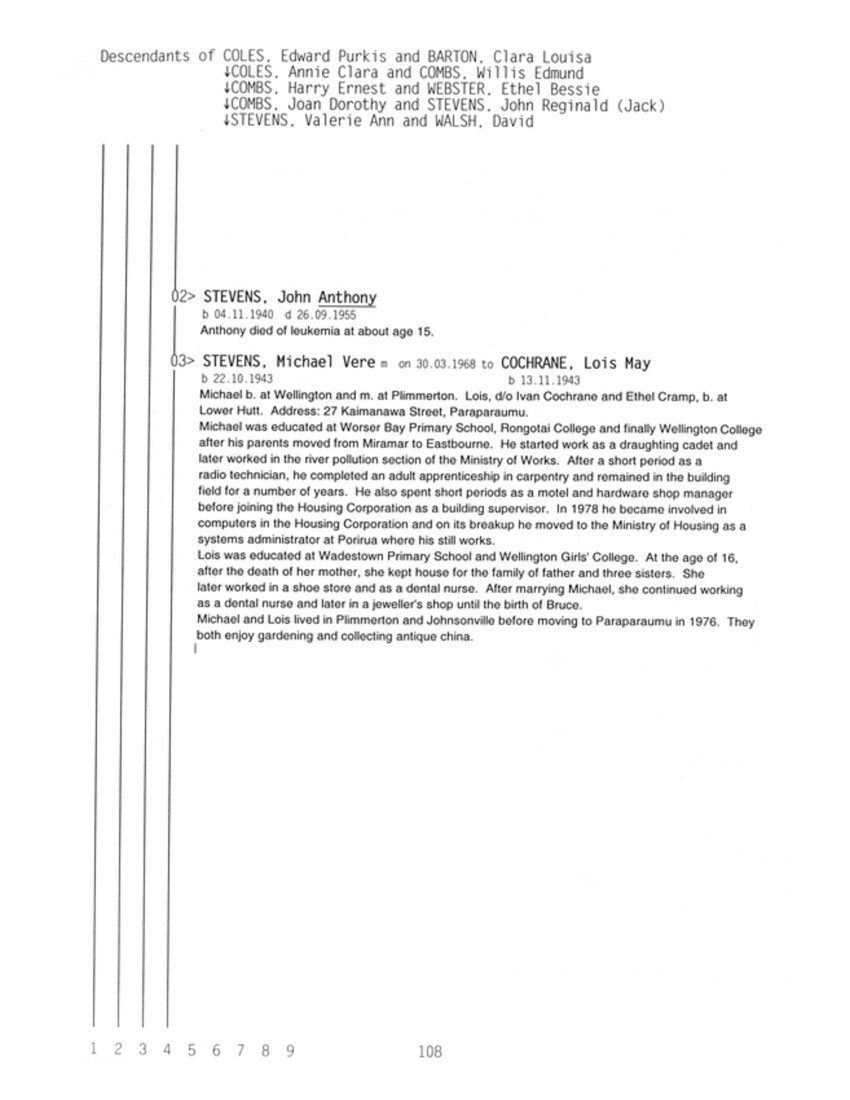
Page 109
Descendants of COLES, Edward Purkis and BARTON, Clara Louisa
COLES, Annie Clara and COMBS, Willis Edmund
COMBS, Harry Ernest and WEBSTER, Ethel Bessie
COMBS, Joan Dorothy and STEVENS, John Reginald (Jack)
[…]
03> COMBS, Barbara Faith m on 11.02.1955 to MARSHALL, George James Stewart Ogilvy Latta
b 20.04.1920 b 09.08.1924
Barbara b. and m. at Hataitai, Wellington. Stewart, s/o Bruce ?? and Nancy Eileen Latter, b. at Wellington. Address: 12 Kirkway, Raumati Beach, Paraparaumu.
Barbara’s mother was seriously ill following her birth and in her infancy she was often cared for by her two older sisters. She learnt to swim and became very competent in the water. She was educated at Hataitai Primary School and Wellington East Girls’ College and her interests at that time were poetry, writing and singing.
Stewart was adopted at birth by George and Annie Marshall and was educated in Wellington, Lyttelton and Christchurch then graduated in accountancy from Victoria University of Wellington. He enlisted in the RNZAF in 1953 and after initial training at Wigram he went to the UK for pilot training with Bomber Command. When he returned to New Zealand he joined the Customs Department and worked in Christchurch, Dunedin and Wellington. He also had brief overseas postings in Japan, Papua New Guinea, Australia and the United Kingdom. He retired in 1986.
After their marriage, Barbara and Stewart bought a house at 44 Townsend Road, Miramar and the children attended Miramar Central Primary School. In 1968 they went to London for four years where Stewart was head of the Customs staff at New Zealand House. They lived in a rented house at Chislehurst, Kent and the children went to Redhill School where music was an important part of the curriculum. After returning to Wellington in 1972, they settled at 64 Oriel Avenue, Tawa and the children went to Tawa College. They remained there for 13 years. With advancing years and some health problems (Barbara suffered as stroke in 1985) they moved to Raumati South where they still live. They have been involved in a number of community organisations including the Arthritis Foundation Support Group and the Parkinsons Disease Support Group.
[…]
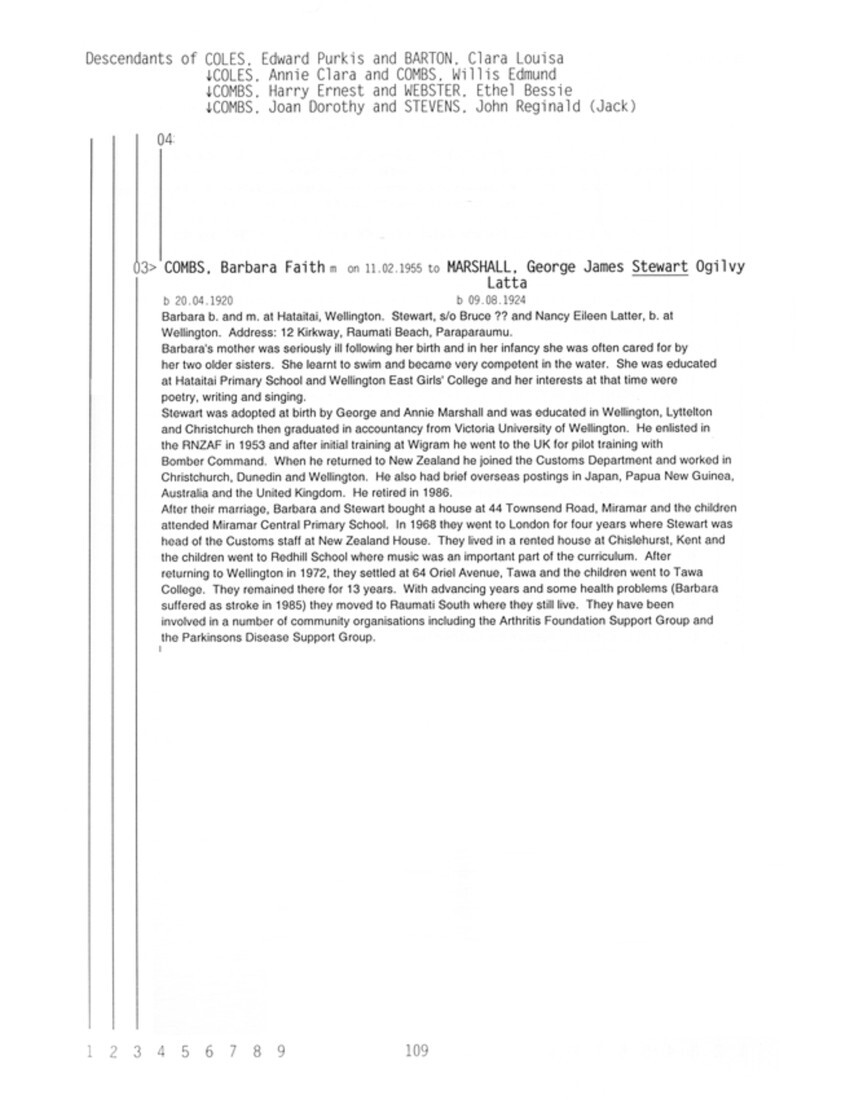
Page 111
Descendants of COLES, Edward Purkis and BARTON, Clara Louisa
COLES, Annie Clara and COMBS, Willis Edmund
03> COMBS, Frank Livingston m on 22.01.1908 to THOMSON, Louise Florence Leys
b 19.07.1882 d 31.08.1960 b 11.11.1876 d **.11.1960
Frank b. at Napier m. at Auckland and d. at Wellington. Louise, d/o John Thomson, b. at Dunedin. Frank was educated at Makotuku, Porangahau, Dannevirke, Ongaonga and Gisborne then won an Education Board Scholarship to Napier Boys’ High School. He began his teaching career as a pupil-teacher at Hutt School in 1899, then moved to Mangatainoka School as an assistant master. He was subsequently head teacher of Rakaunui, a sole-charge school (1905-6), Mauriceville West (1907-15), Fernridge (1916-18), Featherston (1919-26), and Mount Cook in Wellington (1927-36). During his early years as a teacher he was an extramural student of the University of New Zealand, graduating BA in 1914 and MA with first-class honours in history in 1915.
Form [From] his earliest years Frank was an inveterate reader and his writing was laced with allusions to English literature. Wordsworth and Dickens were his educational lodestars: the ‘Ode on intimations of immortality’ glimpsed a lost world of childhood that could still be regained through education of the imagination; Mr Gradgrind in ‘Hard times’ stood for everything he came to deplore in the schooling he had experienced as a child and was experiencing as a teacher. The longer he lived the more was he struck by the fact that apparently ordinary pupils showed in their adult lives that they were anything but ordinary. In his view the school system was largely a confidence trick and his writings were his rebellion against it.
From the age of about 35, writing as ‘Old Timer’ in ‘National Education’ the journal of the New Zealand Educational Institute, he published short stories illustrating the constraining effects of primary schooling on children who did not fit the norm of a good pupil. Some of these were later collected in ‘The harrowed toad, or, the pedagogue’s plaint’ (1939), ‘Little Ann & what to do with her’ (1940), and ‘Half lengths of pupils & people’ (1944). His leading ideas were expressed in ‘Little Ann’, one of his best known stories: ‘Would human nature reach a fuller, fairer growth, blossom more beautifully, bear fruit more abundantly, if we paused in the midst of all our aspiring and striving to water the roots of the affectations?’
Believing that adult society must be changed if children were to have a richer education, Frank became a pioneer of adult education in Masterton, where he gave vigorous, highly regarded lectures on history and contemporary world issues. He was also convinced that political action was necessary for educational reform to be achieved: he was president of the Wairarapa branch of the NZEI in 1913, attended his first annual meeting of the institute in 1916, was elected to the national executive in 1921, and was the first person to be elected twice to its presidency – in 1927 and 1936. He was associated with various moves to strengthen the institute’s internal organisation and the involvement of teachers in its activities. A strong advocate of worker solidarity, he pressed for the NZEI to reconstitute itself as a union under the Industrial Conciliation and Arbitration Act, but was unable to gain sufficient backing from the membership.
During the ten years that spanned his presidencies, and very much under his influence, the NZEI developed comprehensive policies for educational reform, including smaller classes, better trained teachers, better accommodation, the provision of library books and teaching aids (including radio and film), and unified educational administration as recommended in the 1930 Atmore Report. Frank also led the way in earmarking money from the institute’s finances to carry out publicity campaigns. As part of the strategy of getting the institute’s message to a wider public, he was active in creating organisations that brought together teachers and lay people: although short-lived, they broadened support for the agenda of reform during the depression years.
Frank largely wrote the NZEI’s booklet ‘Order out of chaos’, which, attractively produced in large numbers, was intended to influence the education policies of political parties in the 1935 general election. His advocacy of reform had brought him into close association with Peter Fraser and other leading members of the New Zealand Labour Party in the 1920s. Labour’s education policy for the 1935 election was the same as the NZEI’s on all matters of concern to primary school teachers. From 1936 to 1940 Frank was officially vice principal of Wellington Teachers’ Training College, though from mid 1938 he was seconded to the Department of Education as editor of the School Publications Branch. He had championed publication of books that would deepen children’s understanding of their heritage: despite war-time restrictions, he took the first steps to enliven the ‘New Zealand School Journal’, to write textbooks in English and arithmetic for primary schools, and to commission the first of the bulletins for students and handbooks for teachers that would become indispensable resources for teachers (cont…)
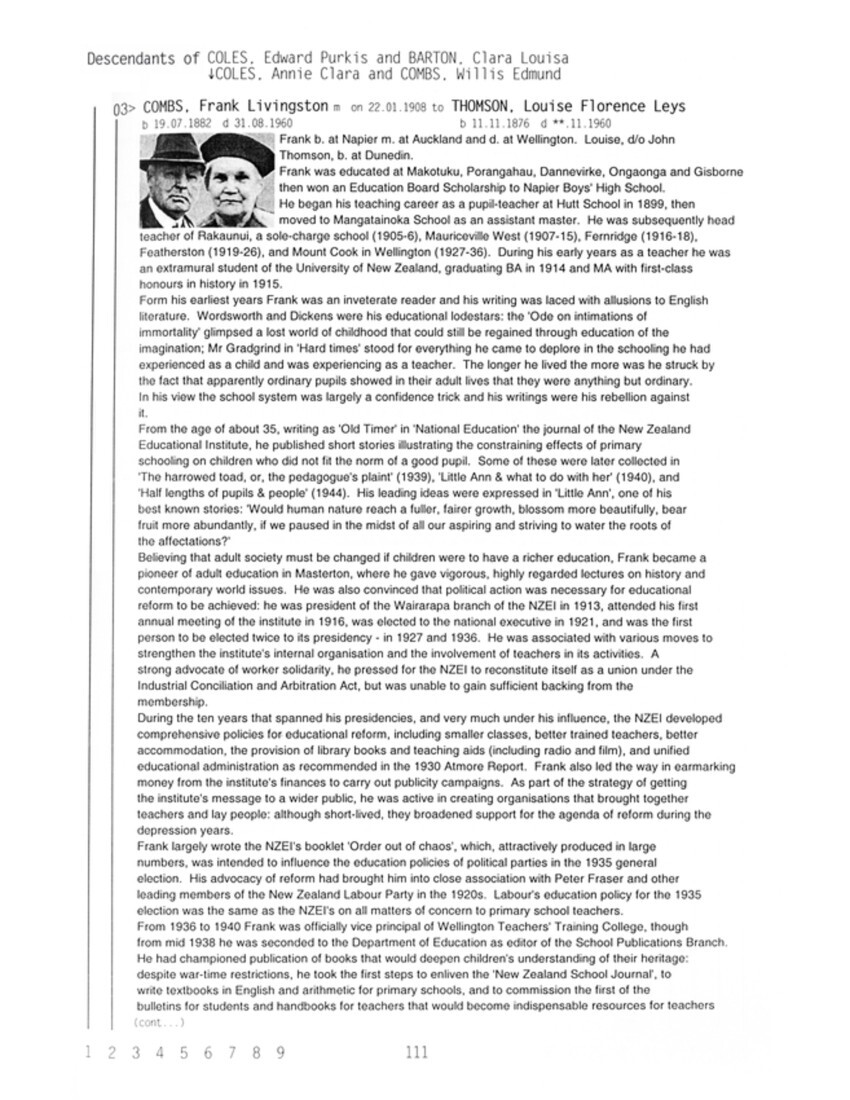
Page 112
Descendants of COLES, Edward Purkis and BARTON, Clara Louisa
COLES, Annie Clara and COMBS, Willis Edmund
COMBS, Frank Livingston and THOMSON, Louise Florence Leys (cont…)
and learning.
During WW2 he mobilised teachers and members of school committees and parents’ organisations in a camp, for better teaching conditions in primary schools in the post-war world. ‘Reconstruction in primary education’, a booklet setting out a plan of action, was the result. He retired from the department at the end of 1944, but returned to the NZEI in 1952 as a part-time publicity officer. Frank had the aura of an Old Testament prophet and has been likened to Moses leading his tribe of primary teachers out of the wilderness. As a publicist and professional leader he was unmatched in the history of primary education in this country for intellectual and emotional force.
From The Dictionary of New Zealand Biography, Vol 3.
Before her marriage, Louise worked as a proofreader with the Auckland Star.
01> COMBS, Louise Annie (Nancy) m on 10.02.1934 to CAMPBELL, Arnold Everitt
b 13.09.1908 d 28.12.1998 b 13.08.1906 d 02.07.1980
Nancy b. at Mauriceville West and d. at Motueka. Arnold, s/o Fernley Charlwood Campbell and Mabel Annie Brooker, b. at Karere, Palmerston North and d. at Wellington.
Nancy attended Mauriceville West and Fernridge Primary Schools and Featherston District High School. Before the family moved to Wellington in 1927 she spent time helping her mother, time she spoke of later in life with real satisfaction; she enjoyed cooking and her mother clearly appreciated her help in managing a household of seven children. In Wellington she gained her Public Service typing and shorthand examinations and became a stenographer with the Department of Native Affairs. At this time she met Arnold, a lecturer in education at Victoria University. He came to the Combs family home at Rongotai to discuss politics and education with her father. After their marriage they set up home at 13 Pitt Street, Wadestown.
Arnold was educated at West End School in Palmerston North and Palmerston North Boys’ High School. He attended Wellington Teachers’ College and Victoria University of Wellington and graduated MA and DipEd. He was librarian and assistant lecturer in history at Wellington Training College in 1926, a primary school teacher in 1927, an assistant lecturer and then lecturer in education at Victoria University of Wellington in 1930-38, editor of ‘National Education’ and assistant director of the New Zealand Educational Institute in 1935-36, director of tutorial classes with the Workers’ Educational Association in 1937-38, director of the New Zealand Council for Educational Research in 1939-52, Chief Inspector of Primary Schools for the Department of Education in 1953-58, Assistant Director of Education in 1959 and Director in 1960.
Arnold was the New Zealand representative at a conference in London in 1945 to draw up the constitution of UNESCO and attended the UNESCO General Conference in Paris in 1958. He was joint secretary of the Consultative Committee on Post-Primary School Curriculum in 1942, a member of the Consultative Committee on Adult Education in 1945, and chairman of the Consultative Committee on Training of Teachers in 1949. His publications include “Educating New Zealand” (1941), “Feilding Community Centre” (1945), and “Control of Post Primary Schools” (1948).
As a young mother, Nancy was a foundation member of the Family Planning Association, a pioneer in making birth control advice available to women in New Zealand. Her constantly creative and intelligent approach to homemaking, her pleasure in reading and gardening and sewing were a backdrop to her own strong intelligence, her strength of character, her appreciation of true feeling and her sense of fun. In 46 years of marriage to Arnold, she saw and supported his rise to the position of Director of Education in 1960. He retired in 1966 in frail health, suffering a stroke in 1972. Nancy cared for him devotedly until his death. She lived on alone in her Wadestown home, continuing to cultivate her lively interest in her family, in reading, politics, and in running her own home. At the age of 87 she moved to Motueka where she lived in a rest home, close to the home of her daughter, Jane, until her death at age 90.
01> CAMPBELL, Jane Mabel m on 11.05.1957 to CUMMING, Alistair Craig
b 04.04.1936 b 12.08.1933
Jane b. and m. at Wellington. Alistair, s/o Eric Cumming and Alcyone Hinewhare Cowdell, b. at New Plymouth. Address: 34a Courtenay Street, Motueka.
Jane received all her schooling in Wellington – at Wadestown, Kelburn Normal School and Wellington (cont…)
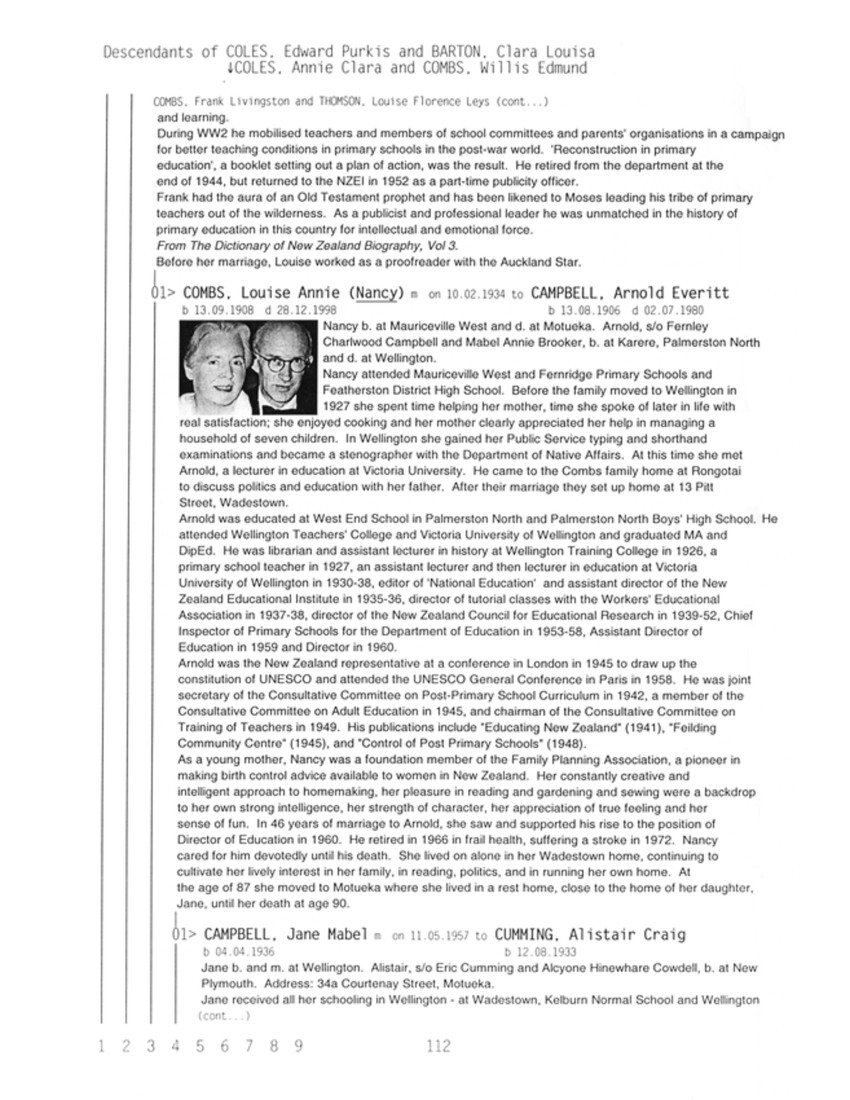
Page 113
Descendants of COLES, Edward Purkis and BARTON, Clara Louisa
COLES, Annie Clara and COMBS, Willis Edmund
COMBS, Frank Livingston and THOMSON, Louise Florence Leys
COMBS, Louise Annie (Nancy) and CAMPBELL, Arnold Everitt
CAMPBELL, Jane Mabel and CUMMING, Alistair Craig (cont…)
Girls’ College. After a full-time year at Victoria University, she was accepted at Wellington Teachers’ College, graduating as a primary school teacher in 1957. It was at that time that she met Alistair who was teaching at Brooklyn Primary School and already developing what was to become a life-long interest in folk music and playing the classical guitar. Both from predominantly teaching backgrounds, they met in the classroom. In 1961 they began their teaching country service, moving to Rawhiritoa, a dairying district in Taranaki.
In 1967 Alistair won a position at Tongariro High School, a school being developed along with the creation of the township of Turangi to service the needs of the Tongariro Power Project. The ten years Turangi gave many and varied experiences – Alistair taught night classes at the Hautu and Rangipo Prison farms; Jane was a partner in a craft shop; Alistair was on the committee that developed the Turangi Golf Course; and interests in boating, fishing and tramping were nurtured. Motueka has been the home of Jane and Alistair since 1976. Alistair was principal of Motueka South School until his retirement in 1991. Always actively interested in teachers’ employment conditions, he held the position of teachers’ representative on the Nelson Education Board for some years. Jane had part-time teaching positions and completed a BA as an extramural student at Massey University.
[…]
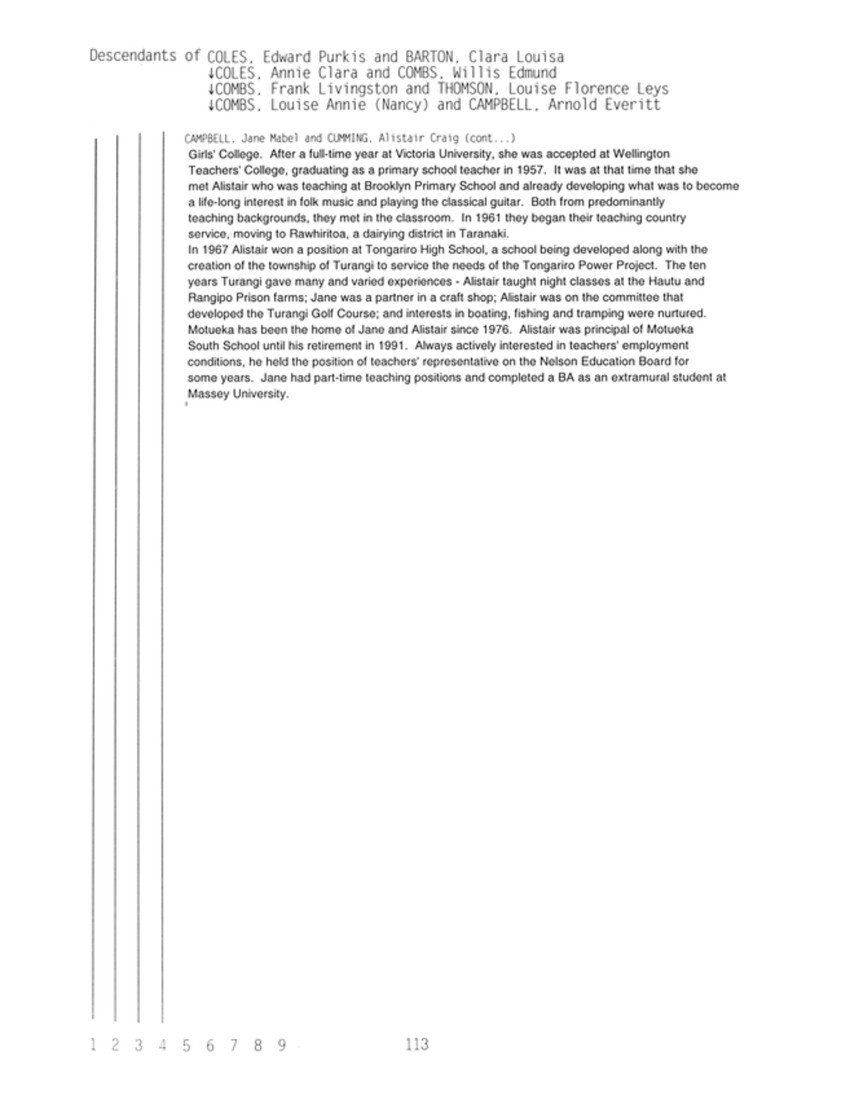
Page 114
Descendants of COLES, Edward Purkis and BARTON, Clara Louisa
COLES, Annie Clara and COMBS, Willis Edmund
COMBS, Frank Livingston and THOMSON, Louise Florence Leys
COMBS, Louise Annie (Nancy) and CAMPBELL, Arnold Everitt
CAMPBELL, Jane Mabel and CUMMING, Alistair Craig
[…]
02> CAMPBELL, Peter Frank m on **.**.1960 to DOOGUE, Winifred
b 16.04.1937 b **.**.1939
Address: 47 Gartmoor Gardens, London SW196X, United Kingdom.
Peter graduated BA and worked as a book designer and editor with the BBC. He is now self employed.
Winifred gained her Teachers’ Certificate and BA and worked as a secondary school teacher.
[…]
03> CAMPBELL, Margaret Louise m on **.**.1964 to GASCOIGNE, David
b **.**. 1942 b **.**. 1940
Address: 18 Chelmsford Street, Ngaio, Wellington
[…]
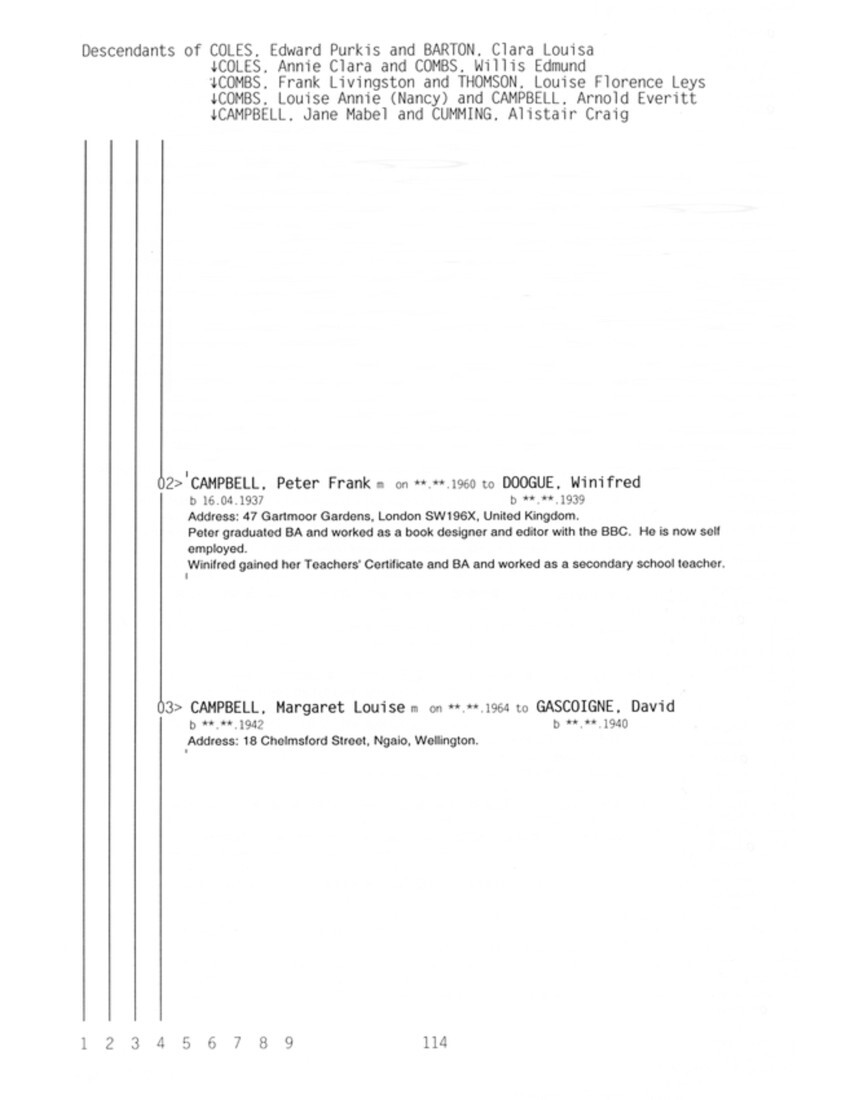
Page 115
Descendants of COLES, Edward Purkis and BARTON, Clara Louisa
COLES, Annie Clara and COMBS, Willis Edmund
COMBS, Frank Livingston and THOMSON, Louise Florence Leys
02> COMBS, Jean Livingston m on **.**.1954 to BUCKLEY, Desmond
b **.**.1909 d **.**, 1980 b **.** 1915
Jean gained her Teachers’ Certificate and worked as a teacher and supervisor of educational radio programmes. Desmond also gained his Teachers’ Certificate and worked as a printer’s devil, proofreader, shepherd, cost accountant and secondary school teacher. He also served in the Army in North Africa, Italy, Korea and Wellington.
03> COMBS, Willis Livingston m on **.**.1944 to ??, Gladys
b **.**.1911 d **.**, 1980 b **.**.****
Address: 82 Brownlow Drive, Risepark, Nottingham, England.
Willis started work as a messenger with the Post and Telegraph Department. He served in the Airforce during WW2 as a navigator and was awarded the DFC. After his marriage, he and his Gladys returned to her home town of Nottingham, England, where she still lives.
[…]
04> COMBS, Charles Thomson m on 08.12.1937 to ANDERSON, Margaret Aileen deLancy
b 27.04.1912 d 28.04.1991 b 27.03.1912
Charles b. at Mauriceville West and m. at St Joseph’s Cathedral, Dunedin. Margaret, d/o Charles Henry John Anderson and Norah Margaret Lavery, b. at Wellington and baptised at St Mary of the Angels, Wellington. Address: 6/89 McDonald Street, Napier.
Charles’ family moved with his father’s increasing responsibility as headteacher in various schools in the Wairarapa. When the family came to Wellington he continued his education at Wellington Technical College while he worked at Watson and Sons (later Watson, Victor Ltd) in the sales, installation and maintenance of x-ray equipment. Margaret, known as Nan, lost her mother on 20th August, 1916 in Newcastle, Australia, and she then returned to Wellington to live with her grandfather and aunts. At age seven she went to Dufferin St Convent, then three months later to board at St Bride’s Convent, Masterton. She returned aged 11 to St Catherine’s, Kilbirnie for two years, then to St Mary’s for secondary education in 1925. She matriculated at age 15 and was Dux at 16, then went on to Banks Commercial College. Her first
(cont…)
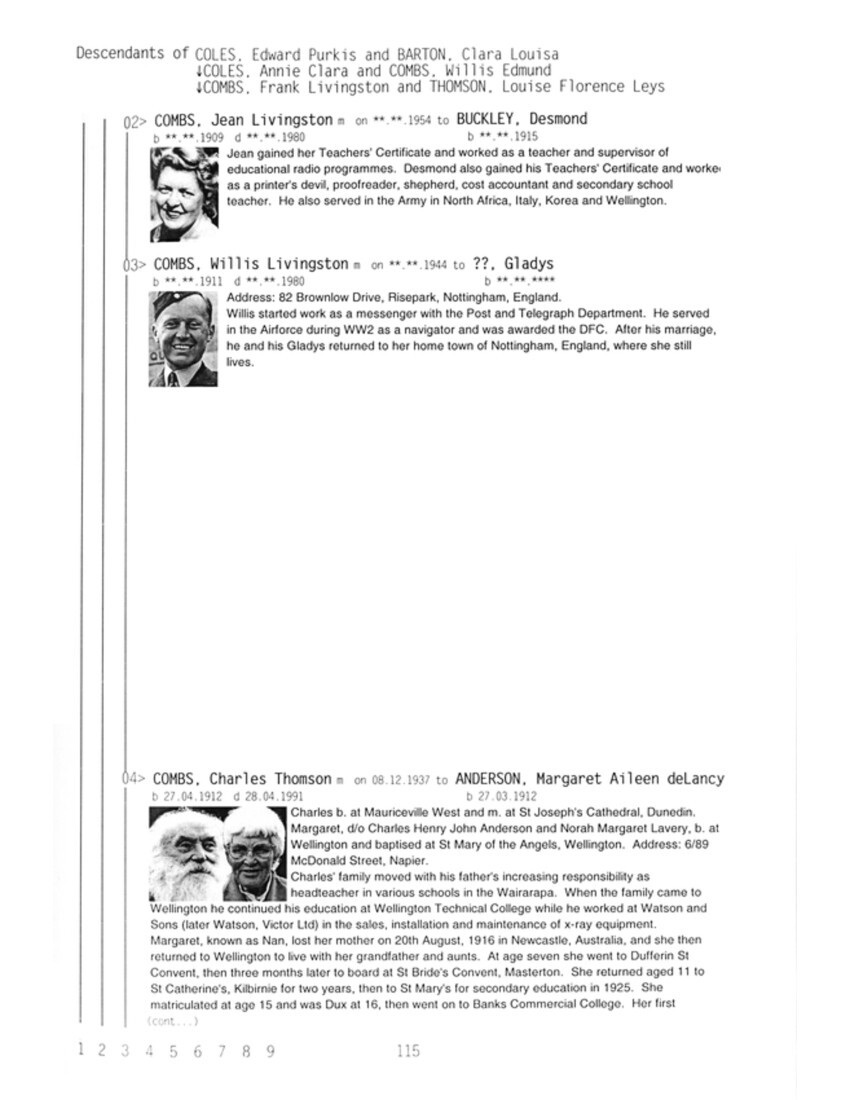
Page 116
Descendants of COLES, Edward Purkis and BARTON, Clara Louisa
COLES, Annie Clara and COMBS, Willis Edmund
COMBS, Frank Livingston and THOMSON, Louise Florence Leys
COMBS, Charles Thomson and ANDERSON. Margaret Aileen deLancy (cont…)
employment, in September 1929, was as a shorthand typist with Watson and Sons. She remained with the firm until her marriage to Charles.
Nan and Charles set up house in Dunedin where Mary Lou and Sheila were born. With the expansion of Charles’ responsibility for x-ray facilities in the hospitals of the South Island during the war, the family moved to Christchurch where Michael and Barbara were born. Charles qualified for service with the RAF but was retained in New Zealand as working in an essential industry. The next move was to Wellington; Robert was born and the family took up residence in Lower Hutt where Clare, Christine, John and Philip were born. Charles was dogged by ill health. As the children grew up Nan typed Frank Livingston Combs’ stories, took employment part-time with the Trade Certification Board and then full-time with the New Zealand Educational Institute, from which she retired in 1974. She was active in the Labour party when Walter Nash was the member for Lower Hutt and was secretary of St Leo’s Scout Troop. Nan joined the newly formed Extension College and studied Hebrew. She visited England and toured Europe with Mary Lou and family in 1981. At the age of 70, Nan had a heart operation. Nan and Charles remained in Lower Hutt until his death in 1991 after which Nan moved to Napier where three members of the family live.
Nan’s interests included dressmaking, needlework, knitting and playing the piano and throughout her life she has enjoyed books. Her wide reading has been the subject of discussion and letter writing on a great variety of topics with the far-flung members of the family. Charles had a keen interest in natural history and all his life he was a keen gardener.
01> COMBS, Mary Louise Lavery m on 09.06.1969 to THORNBURY, Robert Ernest
b 08.09.1938 b 23.04.1938
Mary Lou b. at Dunedin and m. at Lewisham, London, England. Robert, s/o Henry Robert Thornbury and Doris Mary English, b. at Swindon, Wiltshire, England. Address: 36 Glebe Place, London SWE 5JP, United Kingdom.
Mary Lou moved at age three to Sumner, Christchurch, where she began school at Our Lady, Star of the Sea. She and Sheila spent a year with their Aunt Lil and Uncle Jack (Woods) in Auckland then moved to Oxford Terrace, Lower Hutt and attended Sacred Heart School; secondary education was as boarder at Mt St Anne’s, Christchurch. She studied from 1955 for a BA at Victoria University, then a Post-graduate diploma of Education at Mt Eden Auckland. Her first teaching post at Mana College, Porirua was followed by a year’s full-time study, resulting in a Masters degree in English Literature. She then taught for two years at Hutt Valley Memorial Technical College. Mary Lou left in 1964 for her ‘overseas experience’ in England. She taught English in Walworth School. Married in 1969 to Robert, she gave birth to twins, Paul and Jane and then to Clare while continuing to teach part-time in schools.
Robert was educated at Pinehurst Juniors and Commonweal Grammar School. He worked as a cub reporter in Swindon and at various occupations in London where he was involved in the prison aftercare movement initiated by Mervyn Turner. In 1959 he took up his place at Borough Road Training College in West London and worked for one year as teacher at Islington Green before joining the staff of one of the new, experimental comprehensive schools Walworth School, off the Old Kent Road in Southwark. From there he moved to Bredinghurst Special School as Deputy Head, then went to Leicester to do an Advanced Diploma in Education.
After their marriage Robert became Warden of one of the first Teachers’ Centres in England, Sherbrooke Teachers’ Centre in Fulham, and worked for his MEd extramurally. He published “Teachers’ Centres” (1973) and “Changing the Urban School” in 1978. The family visited New Zealand in 1975, when Robert introduced the teachers’ centre idea to Australia and New Zealand audiences, at the invitation of governments and the British Council, subsequently writing his Master’s research degree (1978) on this topic. In Southwark Robert was secretary of the Tenants’ Association for the estate on which they lived. The family moved to Chelsea in 1977, where Richard was born. Mary Lou worked on local history and primary-secondary liaison in North Kensington. After retraining in computers in the ’80s, she was an advisor in computing and then a lecturer, first in St Mary’s, Strawberry Hill and then a Senior Lecturer in the School of Education at the University of North London. After the dissolution of the Inner London Education Authority in 1990 Robert worked in teacher education, on commissioned research and consultancy, and a PhD on The Teaching of Philosophy in Schools until his retirement in 1999. Mary Lou was (cont…)
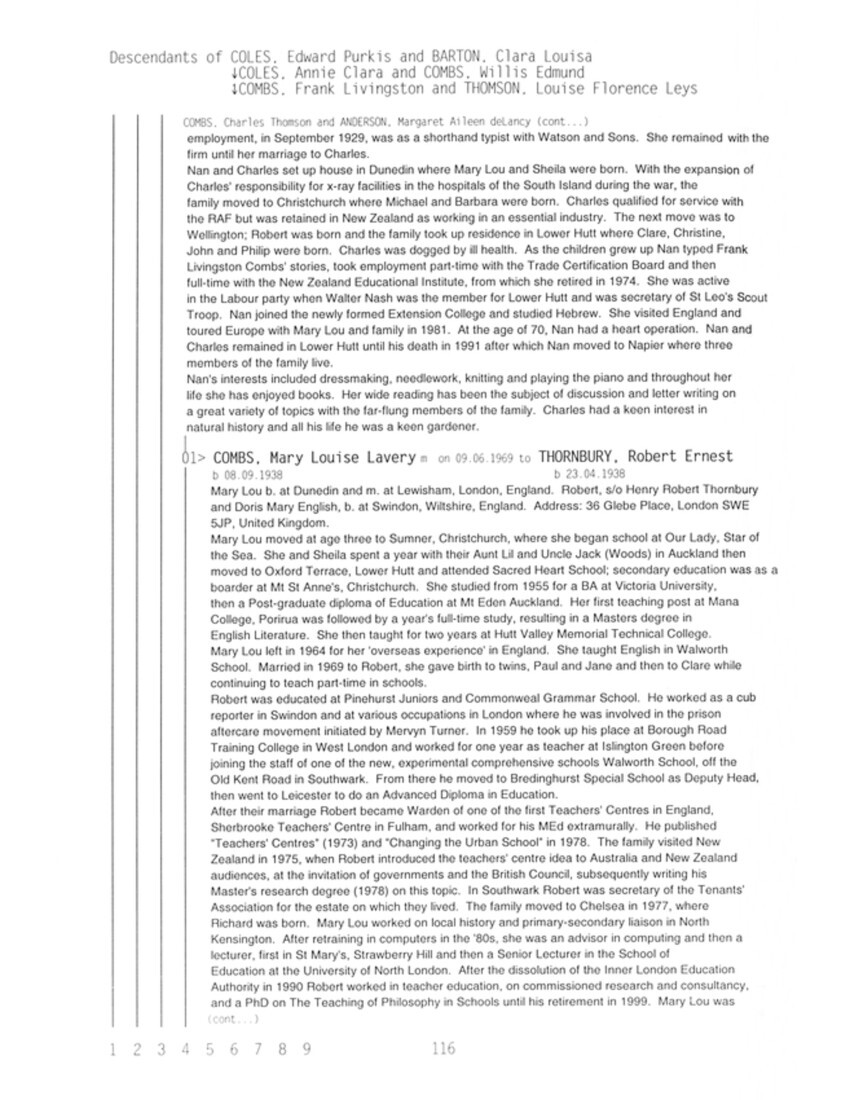
Page 117
Decendants of COLES, Edward Purkis and BARTON, Clara Louisa
COLES, Annie Clara and COMBS, Willis Edmund
COMBS, Frank Livingston and-THOMSON, Louise Florence Leys
COMBS, Charles Thomson and ANDERSON, Margaret Aileen deLancy
COMBS, Mary Louise Lavery and THORNBURY, Robert Ernest (cont…)
invited by government to contribute to the national development of a curriculum for teachers and teacher-educators in Information Technology. She retired in 1999. Mary Lou and Robert share an interest in the arts, French life and culture, and travel which included a number of return visits to New Zealand. Their four children, although London-born, enjoy joint New Zealand and British citizenship.
[…]
02> COMBS, Sheila Margaret Thomson m on 15.12.1971 to CLENDON, Ewen Keith
b 19.05.1940 b 03.11.1936
Address: 5 Orihau Terrace, Eastbourne, Wellington; E-mail: ewan.clendon @ xtra.co.nz. Sheila was educated at Sacred Heart College, Lower Hutt. She joined the Navy Office, was promoted and moved to Town Planning. While there she joined the Wellington Aero Club and flew a Piper Cub, Cessna 150 and 172 after which the Victa Airtourer 100 became the standard light aeroplane. She entered many air competitions, won the Fitton Airwoman’s Rose Bowl in 1964 and was many times winner of the Morane, Saulnier Trophy for Forced Landings. She was Cub leader for St Leo’s Troop. She went overseas in 1966 and on her return trained as a nurse. During her training she was president of the Nurses’ Union. She joined a tramping club where she met Ewan. She was NZRN in 1971, and was staff nurse in surgical and medical wards until her marriage.
Ewan was educated at Eastern Hutt Primary, Hutt Intermediate and Hutt Valley High School. He (cont…)
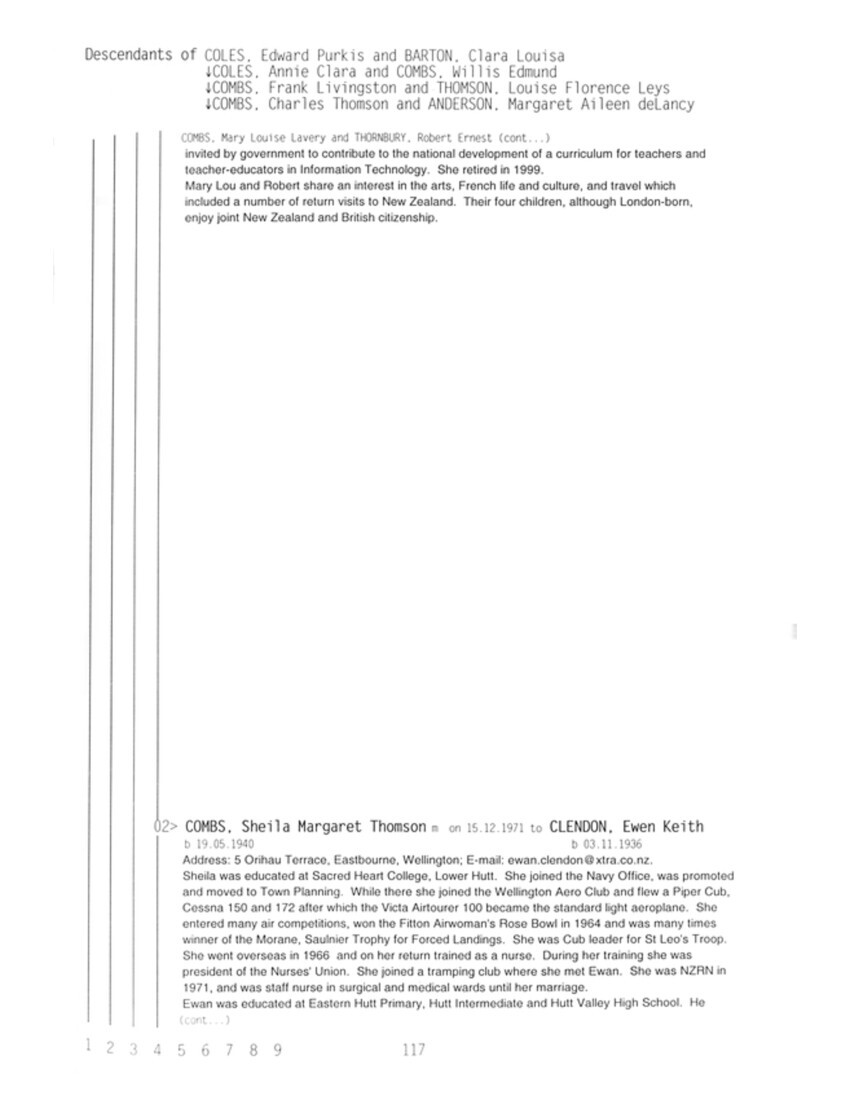
Page 118
Descendants of COLES, Edward Purkis and BARTON, Clara Louisa
COLES, Annie Clara and COMBS, Willis Edmund
COMBS, Frank Livingston and THOMSON, Louise Florence Leys
COMBS, Charles Thomson and ANDERSON, Margaret Aileen deLancy
COMBS, Sheila Margaret Thomson and CLENDON, Ewen Keith (cont…)
gained a Bachelor of Engineering (Civil) at the University of Canterbury. He joined the family firm of Edwards, Clendon and Partners which later became Clendon, Burns and Park. By his first wife who died in 1970, he had three children, Jeffrey, Fiona and Diana. He is a keen tramper and skier and is interested in hovercraft and 4 wheel drives. Sheila helped bring up Ewan’s children from his first marriage and they had 6 children. She was involved in Eastbourne Cub Troops and as a volunteer reader at the local Muritai Primary School. Her hobbies are reading, gardening and playing the saxophone, and with Ewan and the children, has been tramping locally and in the south Island. They have recently made a 4 wheel drive expedition in Australia from Melbourne to Mt Isa and Cairns.
[…]
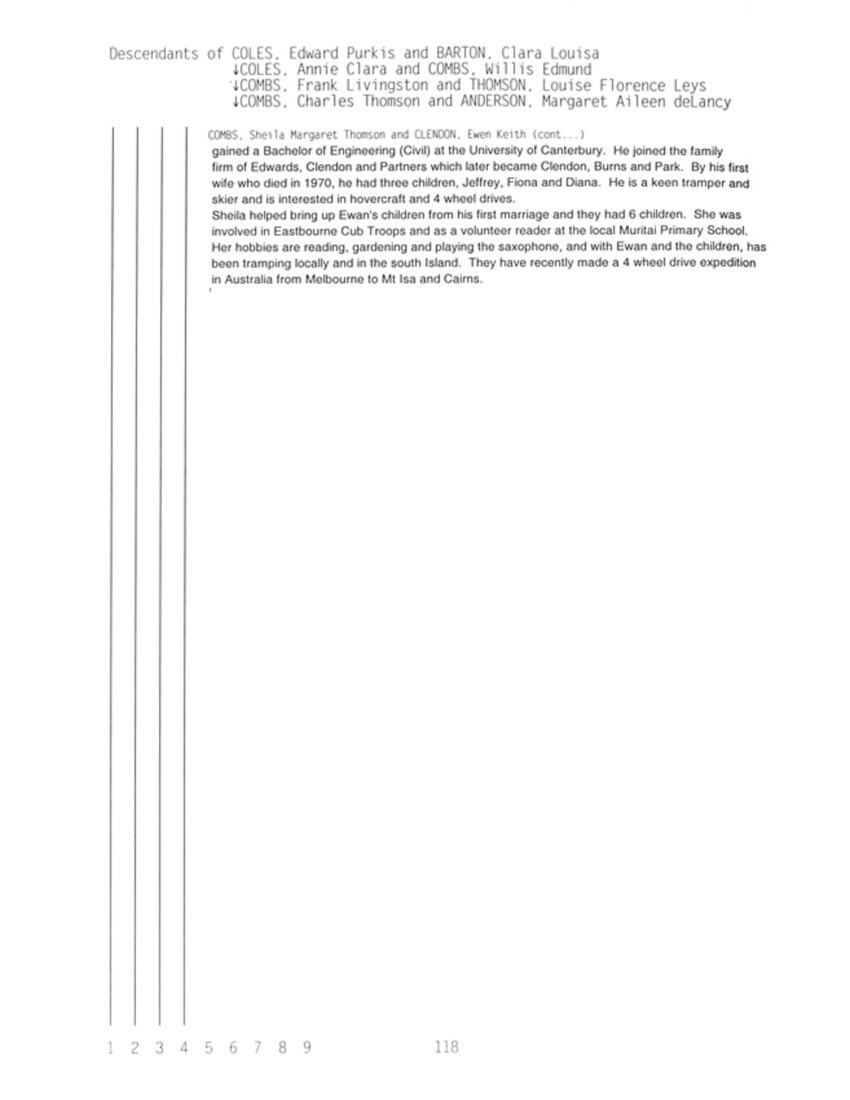
Page 119
Descendants of COLES, Edward Purkis and BARTON, Clara Louisa
COLES, Annie Clara and COMBS, Willis Edmund
COMBS, Frank Livingston and THOMSON, Louise Florence Leys
COMBS, Charles Thomson and ANDERSON, Margaret Aileen deLancy
COMBS, Sheila Margaret Thomson and CLENDON, Ewen Keith
[…]
3> COMBS, Michael Frank Thomson m on 01.04.1967 to LIVINGSTONE, Penelope Jane
b 20.04.1942 b 24.09.1946
Michael b. at Christchurch. Penelope, d/o Drummond Blair Livingstone and Noeline Eleanor Brownjohn, b. at Palmerston North. Address: 74 Bill Hercock Street, Napier. Michael was educated in Lower Hutt at St Peter and Paul’s School, then at St Bernard’s. He went to Flock House, a training centre run by the Department of Agriculture, where he was top trainee. His employment was with sheep farmers in the Manawatu and while there he played rugby at provincial level. He studied for a year at Massey University then worked as a stock and station agent for Sims, Cooper during which time he met and married Penny Livingstone. They moved to Napier where he worked for Williams and Kettle.
Penelope was educated at College Street School, Intermediate Normal and Palmerston North Girls’ High School. She worked as a bank officer in the National Bank in Palmerston, Wellington, Fielding and Napier.
After leaving Williams and Kettle, Michael bought a small cleaning business called All-Brite. The business expanded into chemical cleaning, painting, roofing, document destruction and road sweeping. In 1984 he won the Air New Zealand Entrepreneur of the Year Award. The divisions, other than the paper, were sold after the introduction in New Zealand of free trade and the (cont…)
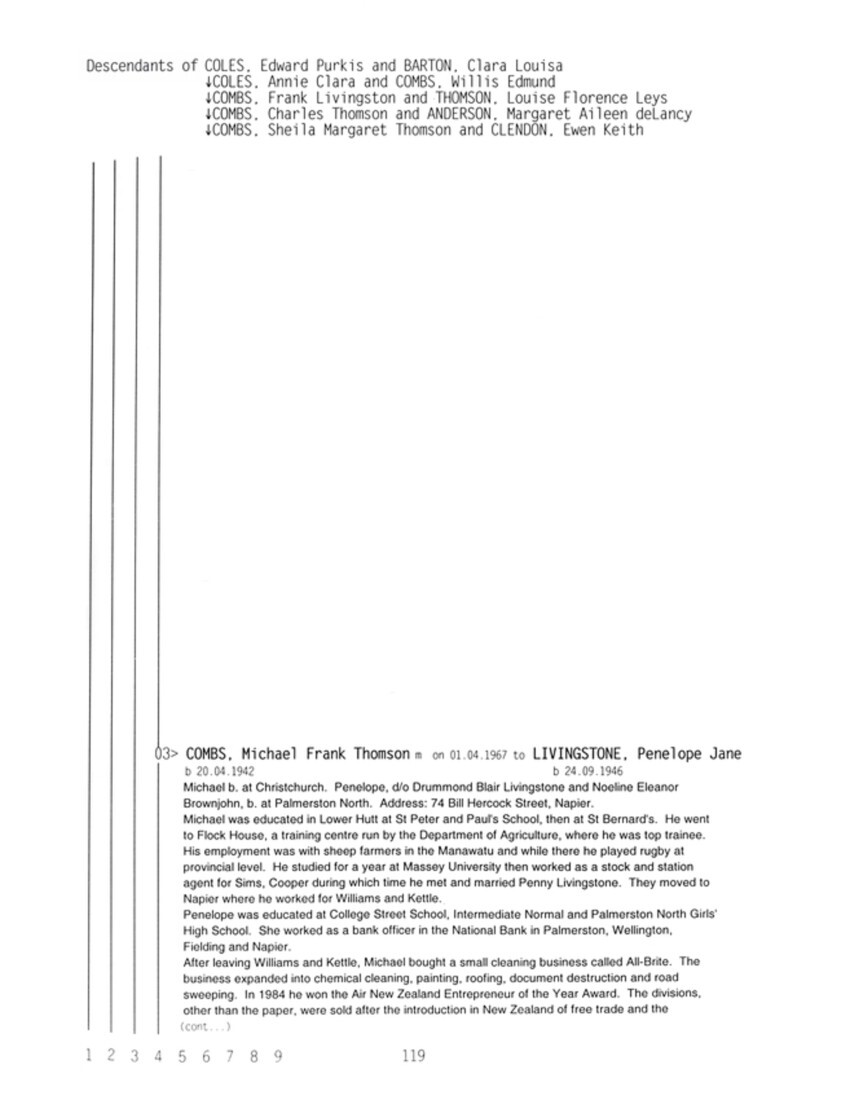
Page 120
Descendants of COLES, Edward Purkis and BARTON, Clara Louisa
COLES, Annie Clara and COMBS, Willis Edmund
COMBS, Frank Livingston and THOMSON, Louise Florence Leys
COMBS, Charles Thomson and ANDERSON, Margaret Aileen deLancy
COMBS, Michael Frank Thomson and LIVINGSTONE, Penelope Jane (cont…)
reorganisation of local government at the end of the ’80s. All Brite Industries Ltd then expanded its recycling business to become, by 2000, the largest recycling business in New Zealand, It specialised in the sorting, grading and export of recyclables. Penny supported the development by doing the accounting. Exports were into South-East Asian countries and Michael and Penny have travelled widely. During the expansion the younger members of the family joined the business, as the central importance of recycling became part of public awareness of environmental issues. Michael was on the executive of the Hawkes Bay Rugby Union from 1980, and was manager for the Watties, Ross Shield Team for ten years. He was also President of the Taradale Rugby Club in 1980-83. He has served from 1997 as Director of the newly formed Board.
Penny worked on the Committee of Rainier School, and was on the Executive of the Hawkes Bay/Poverty Bay Swimming Association from 1983-86 and the Greendale Swimming Club.
[…]
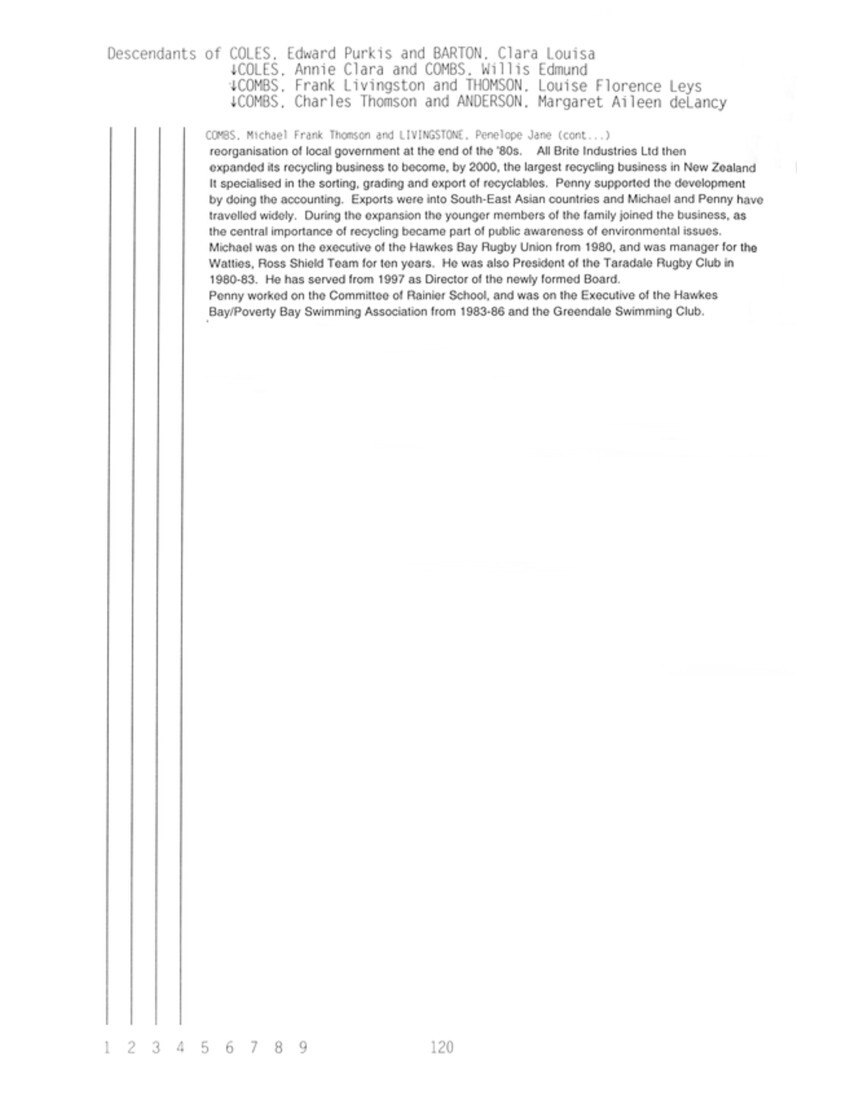
Page 130
Descendants of COLES, Edward Purkis and BARTON, Clara Louisa
COLES, Annie Clara and COMBS, Willis Edmund
COMBS, Frank Livingston and THOMSON, Louise Florence Leys
COMBS, Charles Thomson and ANDERSON, Margaret Aileen deLancy
[…]
05> COMBS, Frank Spence m on 24.03.1951 to MURRAY, Hazel
b 13.05.1916 b 11.09.1916
Spence b. at Masterton and m. at Feilding. Hazel b. at Bulls. Address: 226 Vogel Street, Palmerston North. Spence served in the Airforce during WW2 and gained his Teachers’ Certificate and BA after the war. He worked as a government typist and as a secondary school teacher. Hazel was a nursing sister and midwife.
01> COMBS, Juliet Linda m on **.**.**** to ??, ??
b 28.12.1952 **.**.****
Address: 40 Napier Road, Palmerston North.
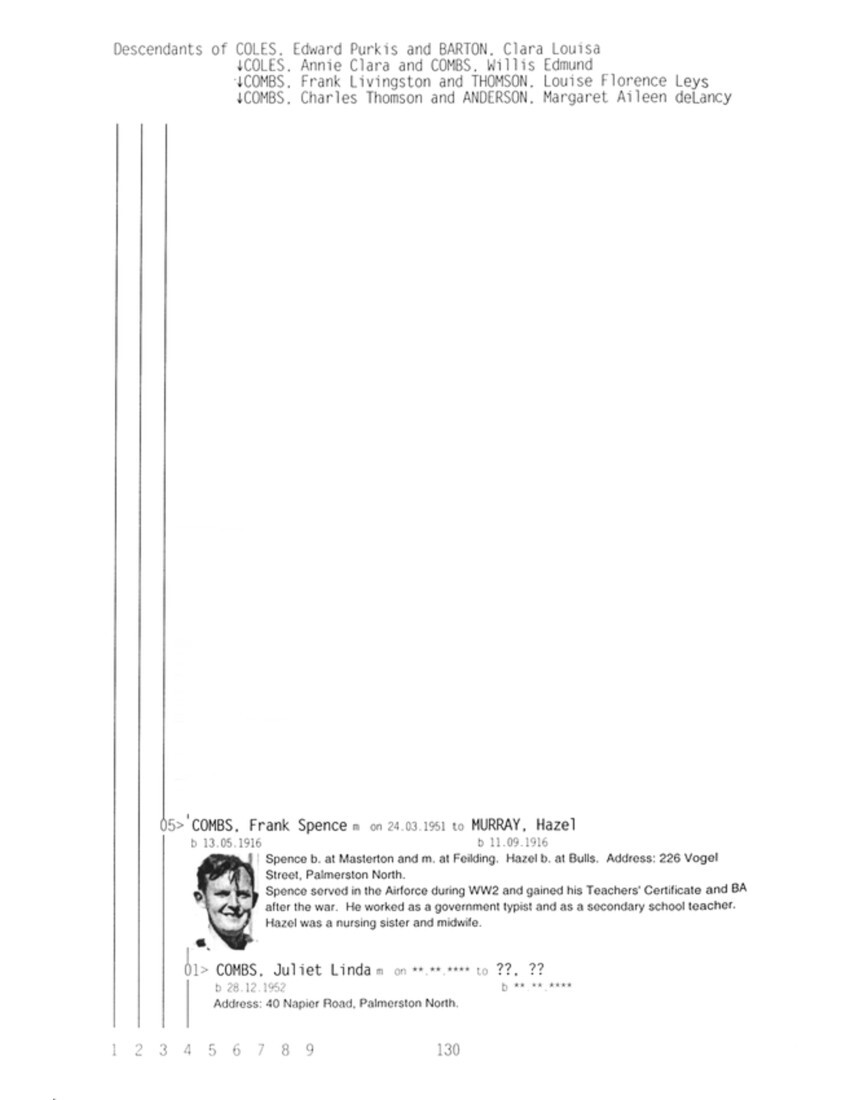
Page 131
Descendants of COLES, Edward Purkis and BARTON, Clara Louisa
COLES, Annie Clara and COMBS, Willis Edmund
COMBS, Frank Livingston and THOMSON, Louise Florence Leys
COMBS, Frank Spence and MURRAY, Hazel
[…]
06> COMBS, Joseph Thomson
b 24.11.1917 d **.**.1994
Joe served in the Army in New Zealand during WW2. He was a typist with Hansard for some time and was later a clerk with the Ministry of Works. He lived at 19 Oban Crescent, Wadestown, Wellington.
07> COMBS, Elizabeth Thomson (Betty) m on **.05.1947 to KENNEDY, Phipps
b **.06.1919 b 13.04.1907 d **.08.1979
Elizabeth b. at Fernridge near Masterton and m. at Wellington. Phipps d. at Lyall Bay, Wellington, and bd. at Otaki. Address: 38 Parkwood Lodge, Parklands, Waikanae.
Elizabeth and Phipps both gained their Teachers Certificates and lived and worked in Wellington, Kerikeri, Stratford, Fiji, South Africa, England, Scotland, France, Wellington, Wanganui, Otaki and Waikanae. Phipps also had accountancy qualifications and worked for the Bank of New Zealand for 20 years.
Louise Florence Leys COMBS (1876-1960) nee THOMSON, Frank Livingston COMBS (1882-1960),
Willis Livingston COMBS (1911-1980), Charles Thomson COMBS (1912-1991).
Photo from: Mrs M L L Thornbury
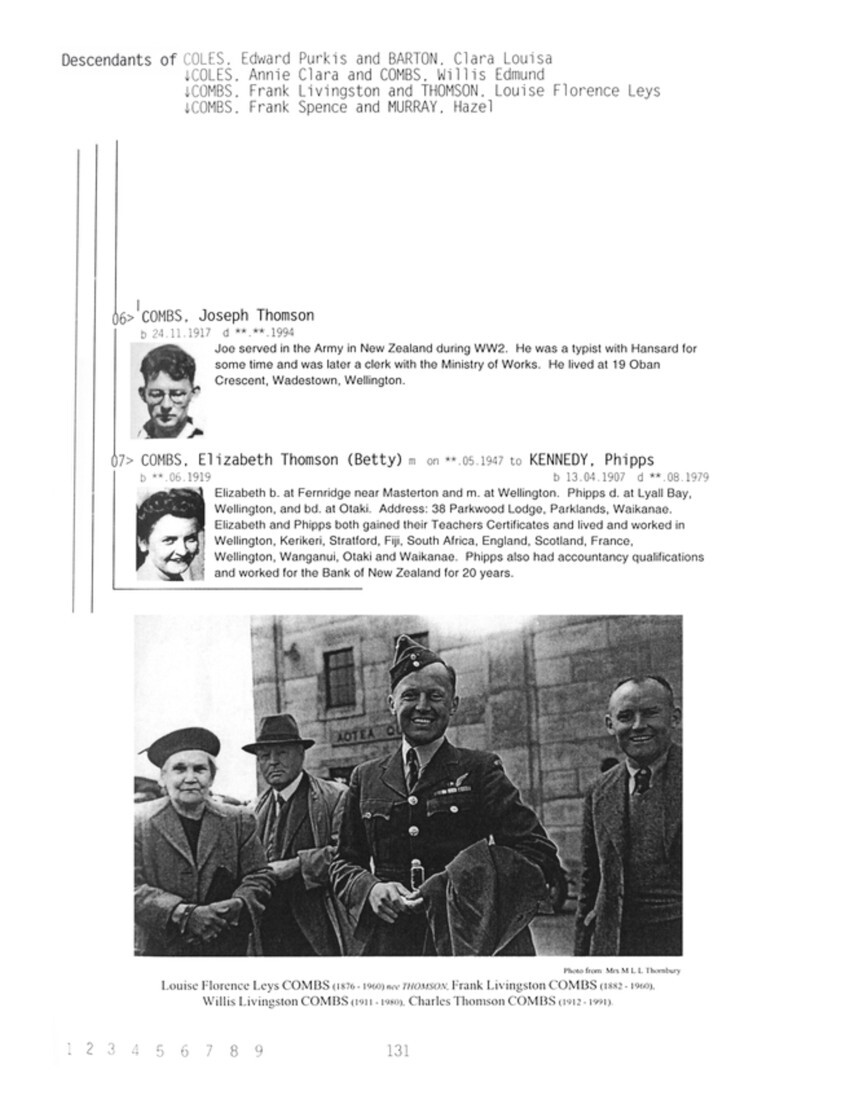
Page 132
The Descendants of Annie Clara and Willis Edmund Combs
Barbara Faith COMBS (1920- ) md MARSHALL.
Photo from: Mrs B Marshall
Joan Dorothy STEVENS (1911-1999) nee COMBS.
Photo from: Mrs B Marshall
Marjory Ethel COMBS (1909-****).
Photo from: Mrs B Marshall
Frank Spence COMBS (1916- ), Charles Thomson COMBS (1912-1991), Joseph Thomson COMBS (1917-1994),
Willis Livingston COMBS (1911-1980), Elizabeth Thomson (Betty) KENNEDY (1919- ) nee COMBS,
Louise Annie (Nancy) CAMPBELL (1908- 1998) nee Comes, Jean Livingston BUCKLEY (1909- 1980) nee COMBS.
Photo from: Mrs M L L Thornbury
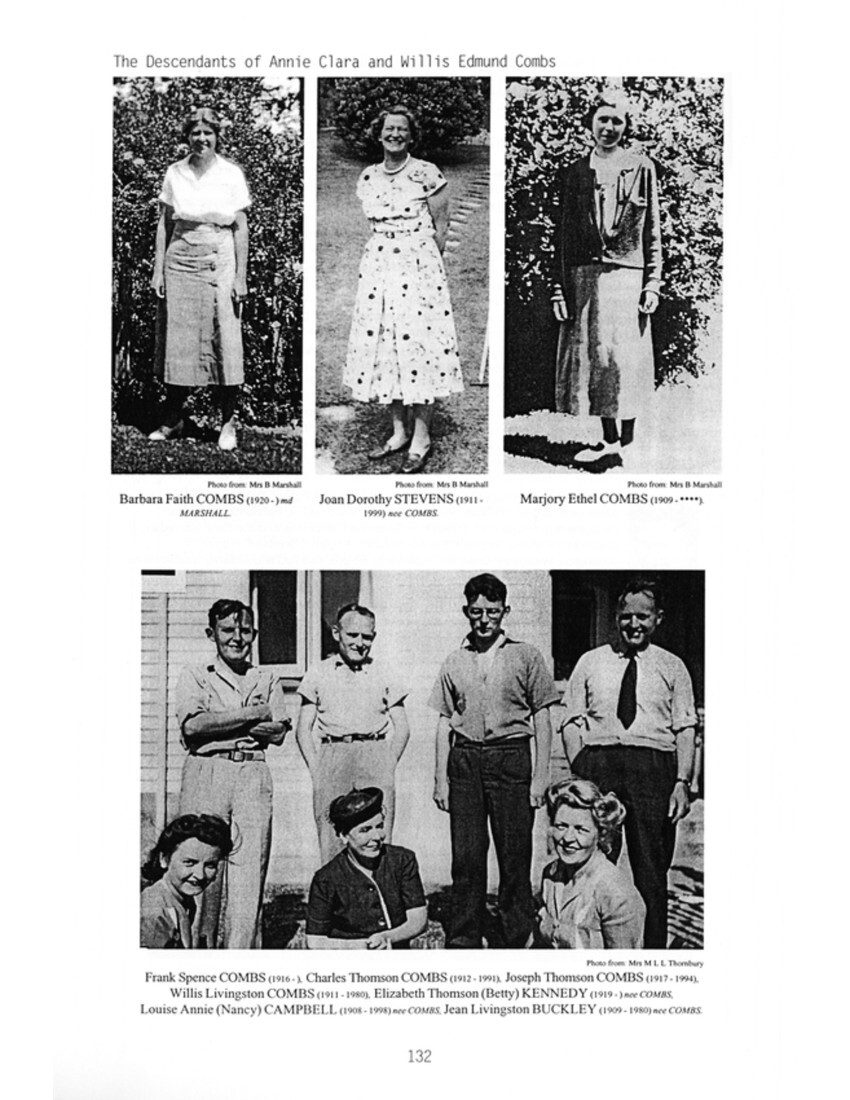
Page 133
GROWING UP
in the
FORTY MILE BUSH
BY
HARRY COMBS
PAUL’S BOOK ARCADE
HAMILTON, NEW ZEALAND
First Published 1951
The publication of this book has been made possible by a grant from the New Zealand Literary Fund.
SET IN LINOTYPE CALEDONIA
PRINTED AND BOUND IN AUSTRALIA BY
HALSTEAD PRESS PTY LIMITED, NICKSON STREET, SYDNEY
CONTENTS
1. MAKOTUKU
2. PORANGHAU
3. DANNEVIRKE
4. ONGA ONGA
5. NAPIER
6. GISBORNE
FOREWORD
TEN YEARS BACK, New Zealand celebrated her centennial and amongst other acknowledgements of the work of her pioneers were several excellent books about the lives they lived and the conditions they mastered. These were more or less confined to the first fifty years. What about the second fifty? There should be some record made of them before it is too late. Though they lack the stirring interest of first arrivals and Maori wars, they were by no means commonplace. What follows has to do with a corner of Hawke’s Bay, but it does set down the life lived in backblocks settlements so far as it affected one small boy.
So set your calendar back to ’80 something, and come with me.
Chapter 1: MAKOTUKU
The White Crane
AS THE devil drove, the devil being the food and clothing needs of three infant sons, my parents moved from place to place in search of employment and opportunity. Bush settlement. out-back isolation, small town and tiny village, followed each other in quick succession; but memory rests on Makotuku, for it was there that I made my debut (unnoticed on the roll) as a schoolboy.
The tiny school was in the heart of “The Forty Mile Bush,” and I was only four years old when I crossed its only doorstep for the first time. A year too young to be enrolled, but I didn’t care. I was in love. The lady was beautiful: blue eyes, long plaits of golden hair, an engaging smile, plenty of spirit and a rippling laugh. Too much for the resistance of baby boys. She had a dowry, too, in her own right. As a P.T. (short for pupil teacher) she was able to deck herself in the extreme of bush fashion out of her salary of £20 per annum. Such charms and affluence were too much for the unattached males of the village. They were shy, but not so this four-year old. His proposal was by the short route of telling her she was to marry him. She was willing and so was father, provided some schooling came first.
So, see the new scholar on his way, resplendent in his first pair of real-to-goodness pants (the britched small boys as opportunity offered in bush circles), lunch in a home-made schoolbag slung over his shoulder, and cow-bell in hand, picking his way in and out of the logs and stumps which beset the path between his home and the road which led to school. Our cabin was set well back from the road line. To cover this distance unescorted was essential to schoolboy status. The cow-bell was a compromise. A very delightful one to his mind. With the bell clanging merrily-he saw to that-mother checked his progress without coming further than the big stump halfway along the track.
At the sliprails, his lady love took charge, giving the bell a vigorous jingle-jangle before placing it on a convenient log. Thus was mother notified that, so far, all was well with her schoolboy son, and turned back to the pressing tasks of skimming the milk, or setting the dough, or baking a home made loaf in the camp oven.
The house had four tiny rooms-the largest 8′-10′ and was roofed with shingles, the inner sides of which constituted the ceiling, while a yawning space in the kitchen showed where the fireplace would eventually be.
Pending the arrival of the bricks for the fireplace,
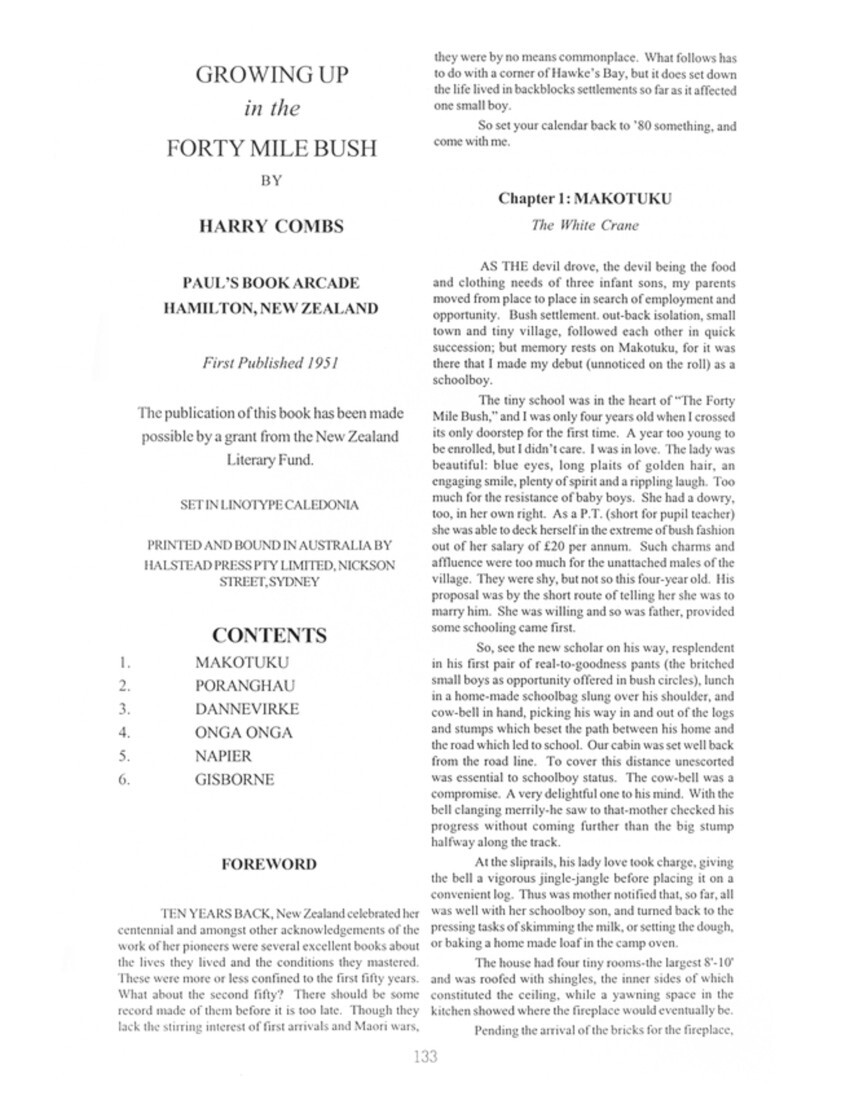
Page 134
cooking was done in the open-rain, hail or shine. Of firewood there was a surfeit; it surrounded the house whichever way you looked. Cut to fencing-post length and thickness, it was laid, three or four pieces deep, in a trench dug for the purpose. Lighted at one end, it was never allowed to go out, fresh lengths being thrust in as the burning ones neared their useful end.
It was the cook’s job to shuffle the cooking gear from outer coldness to inner heat, as emergency required. The kettle, or the kerosene tin, or the camp oven, had the point of vantage in turn. A sort of postman’s knock, varied by inevitable upsets and flavoured with whiffs of smoke, very trying to the eyes and the temper. As the tea hour approached, the tempo was accelerated, with the kerosene tin dominating the central position over the flames. For bush work was dirty work and a good sluice in the half- barrel which served as a bath hardly less welcome than a good meal.
What a life for a gentle woman! Yet what appetising meals mother whisked off those hot coals!
And the great day for her when the bricks came, and the amateur brickies closed that yawning gap and set up our chimney! Even though open-hearth cooking left much for the cook to desire, there was at least shelter from wind and weather.
But where was I? On my way to school with the P.T. She shared her scholastic activities with the mistress (“E” Certificate), and between them they taught reading, writing and arithmetic to some thirty scholars. What an assortment we were! Ages ranged from (my) four years to seventeen. Four nationalities were represented Norwegian, Swedish, English and Maori. The seventeen- year-old was in Standard I-a giant come out of some mountain recess in search of his “bit of schoolin’.
For convenience of leg room, this scholar sat on his desk when he did not figure at the teacher’s table out in front. Rude and elementary as our surroundings were, they were a new world to him. The general store, the church, the school itself, were of unceasing interest, while the fascination of clambering over the trestle bridge in course of erection against the arrival of our first train led to many reprimands for lateness before he settled down.
Out of the Ruahines, Alec made his bow to progress when he presented himself at Makotuku School. He paid for his keep by doing odd jobs for this settler or that and by contributions of young kakas and pigeons to the general stock pot. He, had uncanny skill in producing these welcome variations to the somewhat monotonous menus.
As the two newest scholars, we sat as nearly together as such ill-assorted sizes could manage. By right of years, Alec supervised my efforts with pothooks and hangers, with such a masterly neglect of his own that he was warmly upbraided by my wife-to-be. This scolding seemed to please Alec. The two were of an age when familiarity between youth and maiden quickly develops. My Alec was a handsome youth with the first suspicions of the whiskers of manhood. Frowns and scoldings were the P.T.’s uncertain shield.
Vere Foster set the hand-writing standards of the day, but I don’t remember how far I progressed in his elementary requirements. I can say, however, that I was the day’s sensation at the school and in great demand with the older girls, for I shifted seats as fancy moved me. Having the freedom of the room, but with a bias towards Alec.
He had an accomplishment which outshone all others-he could waggle his ears. This was new in my experience and, as soon as he discovered the importance I attached to it, he exercised this charm whenever I strayed too far, or stayed away too long! Catching my eye, Alec would waggle, and my return to his side was as certain as the swing of the needle to the pole.
Most of the boys tried desperately to emulate him, and red ears were the order of the day. As I couldn’t, I urged my lady love to try. She took refuge behind her authority. Sadly disappointed, I appealed to everybody to do their level best, with the same negative result. But I didn’t ask the mistress. Natural awe of a grownup of twenty-three, plus respect for her supplejack, restrained me.
Alec was kept in. Afterwards he would consent to waggle those entertaining ears only in rare moments, such as when both teachers were out of the room.
My return to the home circle was simple. The plan of the morning was put into reverse. The cow-bell was rung vigorously and handed over, but, more satisfactory still, after signalling to mother that her son had entered the home stretch, my escort decided to hand him over in person. As good an excuse as any for a gossip.
I was given “a piece” (bread and dripping) and sent out to play. Keeping within earshot, I gathered that the day’s events were under discussion. I knew she was “telling on me,” for I heard mother chuckle. Reference was made to Alec’s ears, and the chuckle developed into peal on peal of unrestrained merriment. But horrors! It was not what Alec could do with them that occasioned this laughter; it was the description of the state of them! My passion faded from that moment, and, although I paid further unregistered visits to the house of learning, it was more the charm of the cow-bell overture than the prospect of a happy marital state which beguiled me.
Our scholastic progress was small. This was partly because of measles, colds, chickenpox and the like. But there were also absences occasioned by diversions along the way. These were many, and all cried aloud for small-boy attention. They brought frowns and the supplejack ever nearer and nearer. The shallow creek which flowed over the road, near our front sliprail, was always a temptation. We set chips and bits of bark afloat and followed them until they disappeared under the log which served as a footbridge. Then, again, this creek had never been traced to its source and this was a job for Primer III, school or no school.
Travel books make a feature of the difficulties and dangers of first explorations. It is now possible to assert, in the light of this early experience, that such
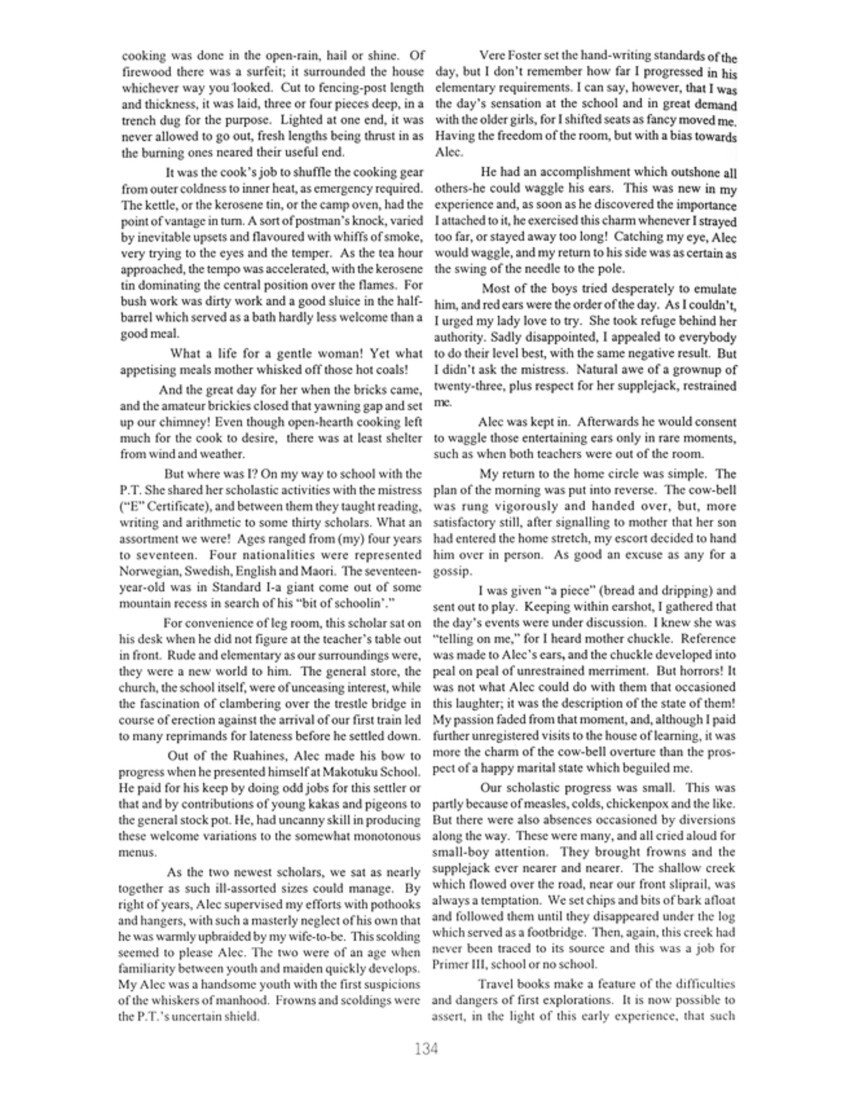
Page 135
accounts are exaggerated. Nothing could be more satisfying than an obstacle overcome, unless it is the process of overcoming it. Difficulties really began at the conclusion of such adventures. Adults have a very cock- eyed idea of what is suitable for children and what is good for themselves.
Standing near the bank of the rivulet (a convenient water supply) was a one-room wharebedroom, kitchen, dining-room and pantry, all in one. In this lived our nearest neighbours-father, mother, and seven children. The dividing lines between these features of domestic economy were more or less sketchy. The bedroom was farthest from the fireplace. It boasted a double bed with one leg. Don’t shout! I repeat-a double bed with but one leg. And how? Simplicity itself. The frame at the head was fixed to the rear wall, one side to the side wall, and its one leg, out in the middle of the dirt floor, supported the free corner.
Above this was what can only be described as an extra wide shelf. It was constructed with long lengths of manuka spanning the gap between the eaves, with shorter lengths lashed crossways and to the back wall. On this rough stretcher was spread a layer of dried fern, which in turn supported sacks half filled with chaff. This constituted the boys’ bedroom. It was entered by stepping from the stool on to the table. And then, with a half-spring, half- scramble, up you went.
No more desirable sleeping berth could be imagined. It was the aim of my young life to spend a night in that whare and sleep with the boys.
All good things come to him who waits and knows how to ask. I did stay the night, and I did sleep with the boys in this bed of my desire. What tales I had to tell next day! The toasting of bread and slices of bacon before the log fire which blazed busily in the outsize fireplace; the raising of the sacking screen behind which the girls retired for the night; the snug comfort of the boys’ bed; porridge served out of a pot dumped in the middle of the table (the best porridge ever tasted); the dab in the creek with the end of the community towel-a “lick and a promise” and no mistake.
Never was small boy more excited or jubilant. Never had small boy such wonders to relate. He made one slip. As a cold yet interesting fact, he mentioned that “Jacky had spiders in his hair!” Slip? “Avalanche” would be nearer the mark. In just one minute a small boy was bitterly repenting his careless tongue as his mother, with soap and carbolic and the wholesale use of water and a fine toothed comb, gave his neck and ears and hair as thorough a “once-over” as small boy ever had.
In this fly-speck of a village, life was not the monotonous business most people might imagine; or, putting it another way, there was sufficient importance attached to small events to give them a lot of interest. For instance, the installation of a four-gallon linseed-oil drum in our open fireplace, to serve as an oven, was the object of school conversation for quite a spell. Many a small wayfarer wandered in to have a peep, to the disadvantage of his attendance record as the bell rang out its summons to morning school. The drum was packed in with clay, a channel being left underneath to take hot embers and to create a draught. The top was left exposed and on this further embers were shovelled for baking purposes. It was long uncertain as to temperature, but, what with plastering with more clay and much trial and many errors, this irregularity was more or less mastered.
Trips into the bush always savoured of adventure. Can you picture two small urchins, father’s dinner in a flax kit, cow-bells in hand, dawdling along the sledge track and gazing in awe at the age-old giants bordering the right-of- way? These trees, or most of them, were truly magnificent. Clean stemmed for thirty, forty feet before the first branch broke clear-a branch in itself was a fair-sized tree- they crowded close together like the pillars of the temple in the family Bible at home.
The track was clearly defined by the deep scoring of sledge runners, so we could not miss our way, but we always avoided its uneven surface. Who wouldn’t prefer the carpet of mosses and small ferns at the side? With a flurry of wings, a dozen or so pigeons changed feeding- grounds from miro to tawa, or titoki, or konini as the season provided. In and out flitted scores of fantails, fluttering so close we must try to catch them. Tui replied to tui, in musical duets no composer has yet reduced to paper. There were parakeets too, carrying on cheeky bird conversations and flirting their red breasts. Sometimes we could pick out a kaka after it had called a dozen times; or again (this very rarely) a huia would sail by, its white- tipped tail outspreading and contracting like a beautiful fan.
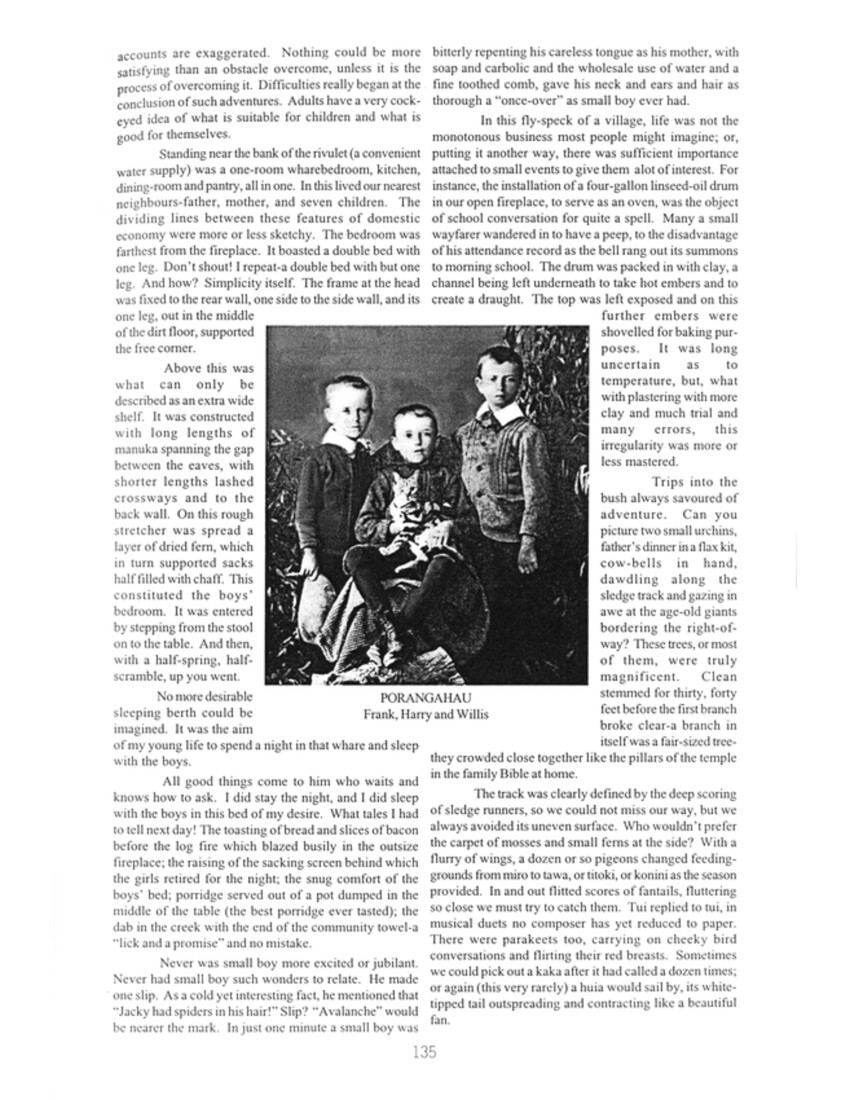
Page 136
With such diversions to keep us interested the dinner in the Maori kit was mostly slow in arrival. Ahead we could hear the klip-klop of an axe, or the rhythmical swish and hum of a heavy crosscut ripping through the life-thread of totara, or matai, or rimu, or white pine.
Rounding a bend we come in sight of the bush- men, to be halted by a warning shout as, swaying towards us, gently at first and then with a rush, the tree in hand comes crashing to earth, smothering us with leaves and twigs and dust and bringing down branches torn from obstructing trees in its path. The blast of displaced air almost knocks us over. A near shave indeed, and one which father did not care to talk about for many a long day, his fright was so great.
Along this track, or just such another, we might make way for a team of bullocks, perhaps ten, sometimes sixteen, yoked in twos, tugging and lurching in their persistent way with a huge log trailing behind rolling and twisting on its way to the sawmill. The bullock-driver with voice and whip encouraged the workers and punished the slothful.
This man was a notability amongst us. Did he not use the longest whip (no mean accomplishment in the heart of the bush-ask any fly fisherman), had he not the bushiest beard, did he not own the strongest bullock team in the whole forty miles? Yes, a hundred times yes. And when he volunteered to help the school committee out of its annual picnic problem of “where” and “how” fly by offering to transport the children and teachers and female adults into the very heart of the bush, the chorus of approval sent up by the male youth was so flattering in its sincerity that the offer had to be accepted.
So, planks having been laid on the rough deck of his wagon, picnic kits and other gear placed aboard, the ladies helped up, the girls lifted in as the boys climbed the muddy wheels (they must get in the way the men do), away we went. The team was not specially groomed-no one was fussy in such matters-but an extra bell or so had been strapped on to combine their tunefulness with the rattling of the ever-useful kerosene tins swinging under the axle. Add to this obligato a chorus of happy children’s voices singing:
“Pull for the shore, sailor;
Pull for the shore.
Heed not the rolling wave,
But bend to the oar.”
From time to time the leading bullocks, finding themselves beyond the reach of the all-persuasive whip (an extra span or two had been yoked in to add magnificence to the procession), would forget their duty and come to a halt or turn aside for a moment’s browsing. Then their driver, in turn, forgot his passengers and returned to his craft with some unfiltered language, amid squeals of disapproval from the women. This merely added variety to the proceedings. With menacing yelp, the dog, awaiting just such an occasion, scurries through the undergrowth to nip the heels of the defaulters. Our wagon is in motion once more.
Arrived at the clearing, the elders boil the billy and set out the eatables, while they discuss the general waywardness of children and the utter impossibility of getting boots which will last a couple of weeks. “The boys kick the toes out of them in no time.” These same small boys are having an hilarious time swinging themselves over the creek on rata vines and threading supplejack mazes. The girls are equally noisy, as they play “kiss-in-the-ring” or some round game requiring a lot of chasing.
The rattling of the kerosene tin brings all wanderers to the business of eating and drinking, the company having first sung a verse of the Doxology. Appetites satisfied, exploring parties set out, to return in the late afternoon laden with ferns and shrubs which invariably refuse to grow after transplanting in the open.
Good times indeed, but there were others not so good. One such comes to mind. A neighbour had a family of strapping sons, all of them employed on bush work of some sort. The youngest left school in our time to help his father with a felling contract. The pair were away all the week, returning on Sunday for a clean-up, a change of washable clothes, and a much needed rest. They had scarcely settled down to their job when the boy was struck on the thigh with a heavy branch which dropped, for no known reason, from the tree they were cutting. The broken leg was lashed to a stake and the sufferer hauled by his father to their whare. There he lay on the rough table while his father set out for help. Hours later his mother turned up, father having gone on to telegraph the doctor in distant Waipukurau.
On the morning of the second day, this hard- worked friend of the community arrived, too late to save the leg and almost too late to save the boy. Off the limb had to come, with the mother as nurse-assistant. A crude stretcher was improvised, and father and brothers hoisted the patient on their shoulders and set off on the long tramp to the station, mother walking at the side to watch the bandages. Sympathy and help with the carrying there were without stint. Every cottage along the route had the fire going and the billy boiling, fresh scones and cups of tea ready, sufficient for a party twice the size, if they would but set the sufferer down and stop for a rest.
Meanwhile, the doctor, having done all he could for this urgent case, was pressed into service for jobs that had been put off against such a call. Boils were lanced (bush boils were the very devil), teeth pulled, ringworm treated, stomach troubles guessed at and prescribed for, and so on until, thoroughly tired out, the good man accepted a shakedown in a friendly home, to sleep the sleep of the just.
The school was no more. For the youth of the village a by no means ill-timed disaster; the girls demurely silent, the boys smugly off-hand. There had been a real old-man bush-fire. Ten days of it. Settlers with their wives, battling it out night and day, rescuing stock and poultry, feeding their families, defending home and
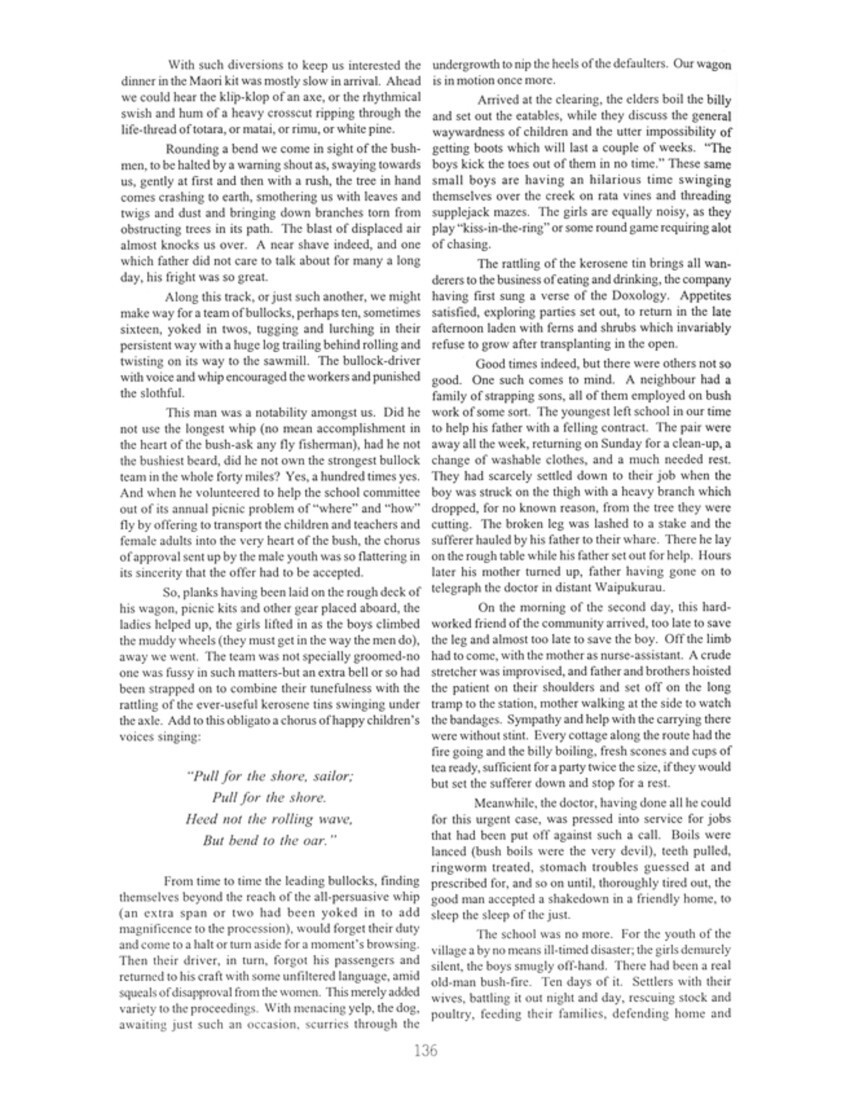
Page 137
outbuildings and fences. A losing fight in some of these particulars for all of them; a disastrous clean sweep for some. This fire was one of many,, but it stands out in memory because of the length and extent of it.
At that period there was little or no control of land-clearing by fire. It was regarded as the right thing for settlers whose “burn” was ready, to warn fellow settlers. But the accidentally-done-on-purpose fire was frequent enough.
This one, which closed for a time my search for knowledge as prescribed by the educational authorities of the day, started some miles from where we lived. A perfect late summer day. Brilliant sunshine and a cloudless sky. The bush lightly tossing to the gentle breeze; the tuis in full song, as they probed bush flowers for honey stores; hundreds of fantails pursuing the thousands of midges on which they lived; the irregular notes of the bells as the cattle grazed and wandered through the undergrowth; the fowls scratching in rotting logs for those tidbits discriminating birds find so tasty.
Midway through the morning attention wanders from the entrancing story of the cat-which-sat-on-the- mat, to the upper unfrosted half of the schoolroom window. A cloud is framed by the sash. No mistaking that cloud. Perfect in shape, like an enormous cauliflower, a clear ivory in the sunlight, shading by graduations to a sombre brown as it revolves and rolls, rising against the blue of the sky. “Bush-fire!” runs a half-delighted, half-agitated murmur round the room.
“Which way will she break?” wonder the experienced children. A lot depends on the answer to this unspoken question. Wind currents, drawn by the heat of the burning forest below, take their time before setting out on their path of destruction.
Lunch recess finds us still awaiting the answer. Along the road we have unusual company. Men from the sawmill and even out of the bush are on their way home too. They want to be on hand. If the tip of that smoke- cloud breaks our way there will be work enough for them. If it breaks the other way, then horses must be saddled, wet sacks of all sorts strapped in front and behind, and off they will go to help distant settlers in the path of the flames.
The sky by this time has changed to a bad tempered blacky blue. There is hardly a breath of air stirring; the mid-morning breeze is stilled. There is something ominous, too. The oppressive atmosphere has silenced the bush birds, or they have departed to who knows where? Farm animals stamp along the fence lines, especially the horses, tossing their heads as though worried. The fowls are restlessly calling in the peculiar way they have. But that magnificent cloud, though bigger, and hundreds of feet higher, retains its perfect shape.
We hurry through our dinners and are off to school once more, father deciding that, for the afternoon, there is no need for concern. Other fathers are of the same mind, for we are all back, my coterie again engrossed in the adventures of the fat-cat-sitting-on-the-mat.
Suddenly the schoolroom darkens. Everybody looks up. That smoke column broken, and blowing every which way, but definitely our way, obscures the sun. We are for it! The final hour of our scholastic troubles has one hundred minutes. The big boys are told to see the little fellows home. Only just in time for me, for, with a rush and a roar, the gale swoops down on us, bringing a full load of twigs and leaves and small stones to sting little boys’ hands. A tornado of a blast, then a dead calm. Next a swirling, vicious whirlwind, that brings us up all standing, then hurries us this way and that until, grabbed by some adult, we are hurried indoors.
A dense cloud of smoke sweeps across the paddocks, blotting out everything, animate or inanimate, twenty yards away; then lifts like the curtain on a stage to a glow of fierce flames and the roar of coming destruction. Then a glare lights up the bush a mile away and the tops of the trees near the house break into flame from the heat borne by the gale. The debris of the first squall is reinforced by sizeable branches, wrenched from trees hundreds of yards back. These thud to earth, adding terror to the anxieties of mothers of straying small boys.
Within half an hour the fire, which was a mile away, is all round us, and efforts to save the stock are abandoned. The job now is to save the home.
Across the way a neighbour’s barn catches fire. It is filled to overflowing with green hay, hurriedly harvested in the vain hope of saving it. The dark blue and brown of the forest smoke is supplemented by this hay smoke, black as black can be. Sweeping across the short space to our home, it terrifies the small boy perched on the roof of the low lean-to at the back of the house, where he has been stationed with a bucket of water and a pannikin to deal with flying sparks dropping on the shingles.
For a time he can see neither roof nor sky above, nor earth beneath. It is the end of his world. He screams in terror as a second eddy, more dense than the first, swoops over the gable. The bucket tumbles over, the pannikin flies anywhere, as, careless of foothold, he falls backward into his rescuing father’s arms.
There follow days of incessant and fruitless toil for those capable of it. Difficulty is superimposed on anxiety for the womenfolk. They have worn out men to cheer, and kiddies crying for food at their feet. Meals are conjured out of nothing in a nightmare of noise and an atmosphere clogged with ashes and befouled by smoke.
And ten days before the rain came! Ten days of almost ceaseless anxiety. Everywhere one looks the country is alight. Tall trees, like tremendous torches, are ablaze from the ground up. The whole world is on fire.
And then the rain! The blessed, glorious rain, the prayed-for rain, falls down on us, washing the atmosphere clear again, tempering danger with hope, and bringing relief and rest to those almost too tired to stand.
The long fight is over. Where magnificent trees once stood there are now scarred and twisted and gaunt trunks, and pile upon pile of charred remains, like rocks on the coast when the tide is out, as far as the eye can
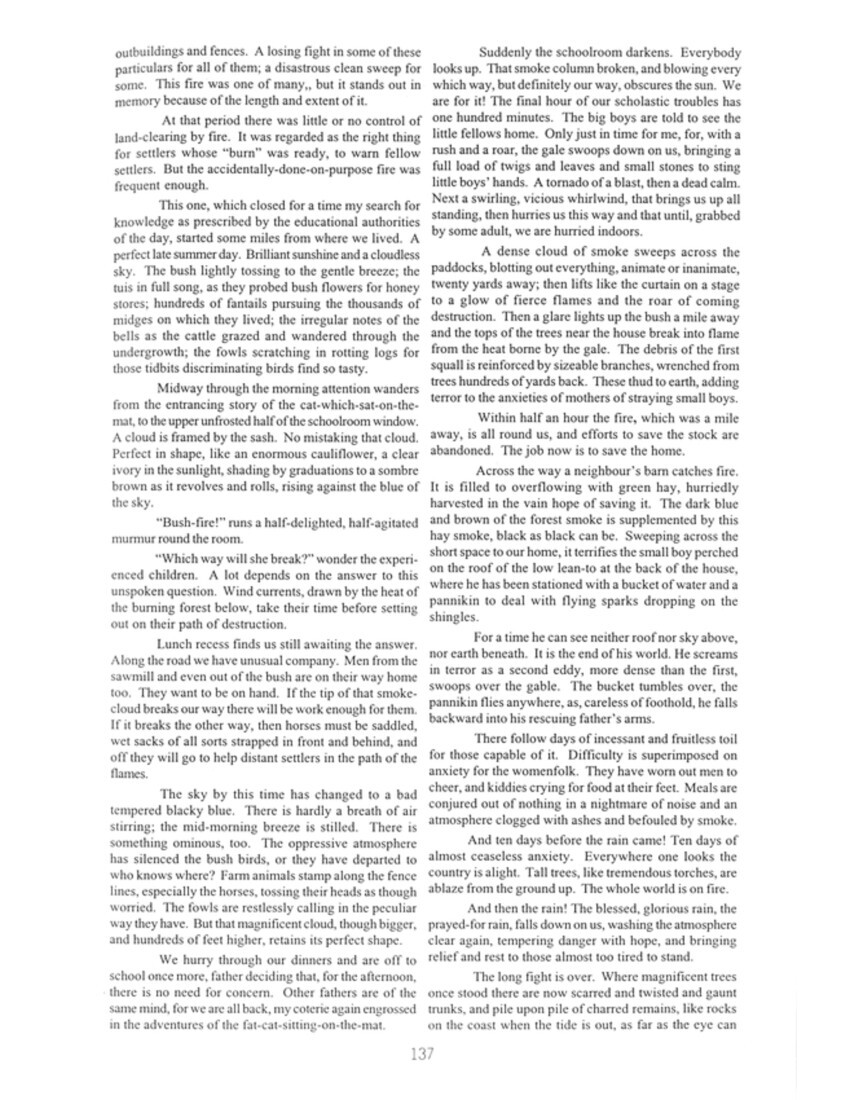
Page 138
see. Freakishly, there stands a lone forest monster, to all appearances unscathed. A symbol of a world that is gone. Fifty yards away, maybe, is a charred trunk, stripped of everything but its naked strength. The world that survives. Both will fall presently, when saw and axe start in to clear away the mess.
For a day or so complete exhaustion rules the village. Then men begin to emerge from shed and tent (make-do homes) and other resting places and set to counting their losses; licking pioneering wounds, as it were. The surviving houses are occupied by two or more families. The surviving stock are pooled to provide milk and butter. The general store is raided for flour and sugar and tinned goods to feed the younger generation. The sawmill is gone. The school is gone. So are the stacks of sleepers awaiting the railway inspector’s broad arrow. A winter’s work and hopes brought to nothing.
Start again! Well! Will we? Or won’t we? By some telepathic decision the menfolk gather at the site of the vanished sawmill. Nothing is left but the engine lying on its side. The school being gone, boy-folk make this their rendezvous too. Listening in? just so. What tales of woe, of depression, of discouragement run round the circle! More than one has a bandage showing; a bad burn, a sprain or even a fracture needing medical attention, not keeping them home.
A “what’s-the-use” sort of atmosphere. Up stakes-and-start-somewhere-else, is discounting Oh-give- it-another-go, with partisans on both sides. Pessimism beats down suggestion until the benchman (key man of the sawmill. and therefore a workman to be listened to), who has heard all and said nothing, breaks in with:
“There is one thing we can do, anyway!”
“What’s that?” in a chorus.
“We can stand the old engine on her pins!”
He strolls over to his friend. A man here and there follows him. Then all gather round the fallen engine. Someone grabs a pole and pokes it under the boiler, as a lever. Willing hands seize hold of anything they can grip. With a heave and another, and a pull together, “up she goes,” to be held in position while props and struts are fixed to hold her. The job is done.
What a useless job it is! But is it? The saw doctor forgets his sprain and gets down into the pit, to see how his saws have fared. The bush foreman moves off, tap tap tapping the charred logs lying around, gauging their worth as millable timber. Someone reminds someone else that some bullocks had been reported a couple of miles away. The mill-owner, with only his engine and his mortgage left, opines that, if the storekeeper will lend him half-a-crown.’ he will send a telegram to Napier and see if the merchant will accept rough baulk timber.
Our village lifts its head and male villagers return to women-folk with the light of purpose in their eyes, the squared shoulders of men who have still a purpose in life.
In a few days, more urgent matters having been disposed of, the call goes out for all hands to put up a temporary school. Pungas and slabs and other useable timbers are gathered and stacked. A trench is dug, the ends dropped in, and the tops lashed and nailed to battens. Raupo thatching serves for a roof and presto! there is a school once more. The chinks and crevices are chocked with clay. This is the boys’ department. They attend to it with a will.
An old tub (half a barrel) is partly filled with pug and sluiced with water and two of the smaller boys hoisted
Photo caption –
Wratt and Henderson’s Sawmill
DANNEVIRKE
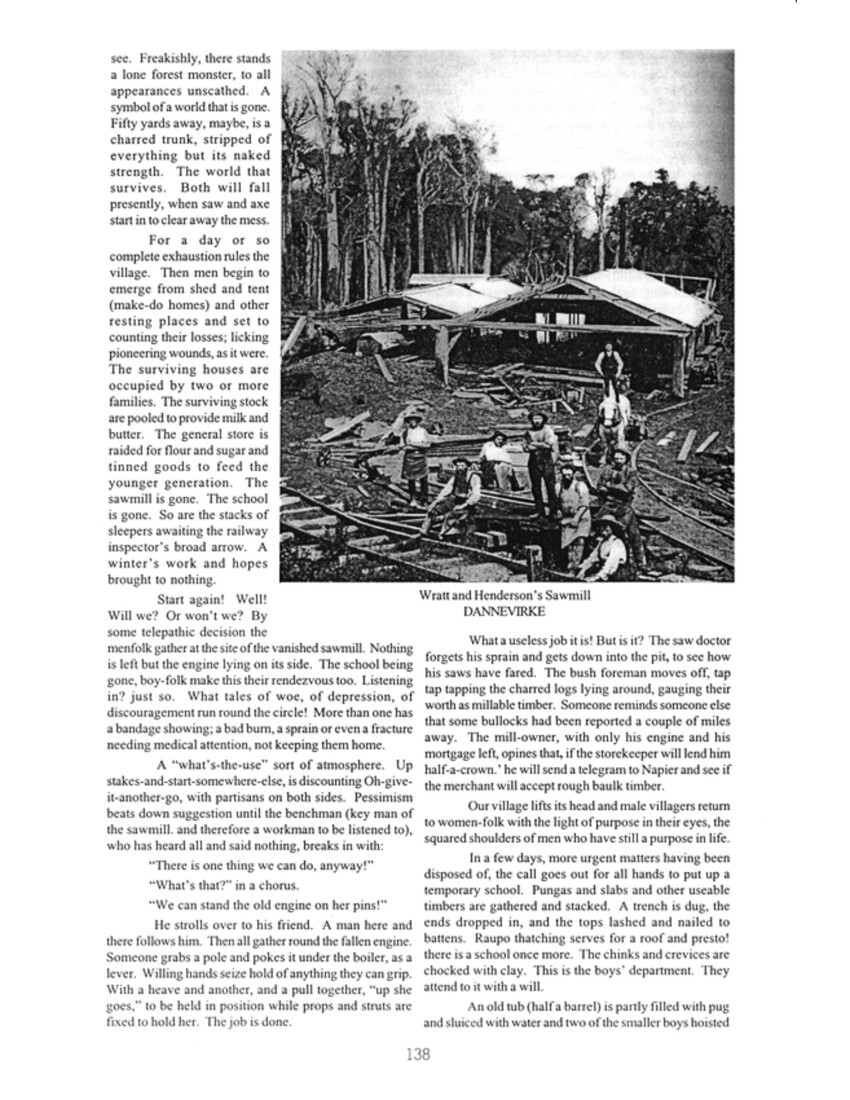
Page 139
in to tread the mixture into useable consistency. For a start, the side of the tub is grasped firmly, but gradually discretion is thrown aside until first one and then the other nipper subsides into the slippery mess to the complete disadvantage of pants and shirt.
But what matter? Mud pies are good, official mud pies glorious. Oh, the oozy, squazzling squirm of soft clay between the toes-the slimy, slushy pleasure of it! Shouts of derision and hilarity as first one hero and then the other, grown bold in well-doing, falls sprawling in the slippery mess. Yells of boy delight as more clay is added, more water splashed over the conglomeration, boys and all. Boy and mud merged into a perfect whole. And asked to do it! Memory retains no joy to equal this day of delight in this wealth of minor happenings.
After a “real” fire had passed, grass-seeding became of first importance. As soon as the necessary seed was available (there were many delays), the settler cut a sack in half, tied a piece of rope to each corner, filled the half-sack with seed and, slipping the loop over his shoulder, tramped his paddocks from end to end, until his supply of seed gave out or his fields were gridironed.
If he was blessed with sons, they could be very useful, no matter how small. Sugar-bags, cut in imitation of the sack, with string or strap to serve as loop, had their quota of seed measured into them. Keeping a near-enough straight line, through and over a mullock of logs and stumps, was next to impossible. Boys slipping in and out of gaps between logs made omissions good, or overlaid areas too thinly spread. Performance left much to be excused, but wagging tongues at times of refreshment (under mother’s special care) left no doubt as to who was doing all the work.
As soon as grass-seeding was over, logs and stumps were burnt, this time according to plan. Moveable logs and debris were piled, end on end, around stumps, or at the foot of a standing trunk. Once more small boys filled a useful place. It was their delight (for there were stirring times ahead) to place armfuls of the general litter around these piles. When this job was done, a calm day was awaited. Permission given, an eager urchin seized a lighted brand from the kitchen fire and dashed forth to do his best-or worst. He had lived for this moment. No professional firebug could do a better job. Flying from heap to heap, he soon had the satisfaction of watching the work of his hands, in a most agreeable form, lighting up the nearby landscape. Livening up smouldering bonfires or heaping fuel on sluggish logs kept him out of other mischief for days. Should a stalwart monster be involved, speculation would be rife as to the hour of its downfall. If it chose a bedtime hour, great was the disappointment. But, mostly, such trees were kind to small boys, and high was the glee as they came tumbling earthwards, an arc of flame and a fountain of sparks as each struck the ground with a lordly thump. Guy Fawkes days of after years were the merest sideshow!
But what of home fires? How did we live outside bread-and-butter needs? Every cottage, every whare, every bush camp, had its open fireplace. The day’s toil over, family and friends would gather in a circle to enjoy the warmth and companionship. Men talked politics and bush “shop”; the women turned over domestic setbacks, discussed births and deaths, or, at great length, some faraway society wedding as depicted in the London Graphic. Small boys punched and teased each other, until suppressed by an adult “who could not hear himself speak,” because he was getting the worst of an argument.
This interruption would serve to start a directed form of entertainment. Yarns held the floor. Experiences on shipboard, coming out to the Colony, were followed by reminiscences of Maori war times and tales of the road; most of the men had “humped their bluey” at some stage, prior to their arrival in Makotuku.
A more lively source of amusement would be voted for. Spelling-bees were much in favour. It is hard to realise today the degree of interest these contests occasioned. The words were graduated to suit ages and schooling (or lack of it), three letter words giving way to four-letter words, one syllable to two syllables, and so on. Excitement ran high as contestant after contestant misspelled himself out of the competition. Woe betide the senior who allowed a youngster to outspell him. He was twitted about it for days. By way of variation we had contests in mental arithmetic, each child on edge to be the first with the answer.
Interest slackening, a sing-song was proposed. Led by fiddle and concertina, childish treble added to soft soprano and, backed by tenor and baritone, combined in happy harmony one would give a small fortune to hear again. The flames leaped high in unison as we sang of the troubles of “Old Black Joe” or the liveliness of “Camptown Races.” These gave way to Moody and Sankey’s hymns. The tunes were simple and the words easily learned. Faster and faster went the fiddler’s bow.
“Hold the fort, for I am coming
Jesus signals still.
Wave the answer back to Heaven.
‘By Thy grace we will.”
Eyes shining in the firelight; faces lit by the growing embers; all signs of weariness and stiffness disappeared. Grotesque and more grotesque grew the musician’s shadow as it climbed the wall and wove across the ceiling. No community sing of later years has ever equalled in fellowship those of wayback settlement days.
All too soon the command, “Now, boys! Time for bed!” would put an end to our share in the evening. Dilatory “good-nights” having been said, we climbed into our bunks, mother tucking us in. In the short interval between drowsy wakefulness and deep sleep, the noises of the night set us wondering. Crickets singing. Moreporks signalling to each other across the gully. Our rooster taking his turn in the crowing circle. Brindle tinkling her bell in the undergrowth. Frogs croaking in the swamp. The loud “chuck” of the big eel in the creek. The bush sighing as the light breeze stirred the treetops. The barking of our dog as a horseman trotted past. “Who was that?” we wondered. A tongue of flame shot out of
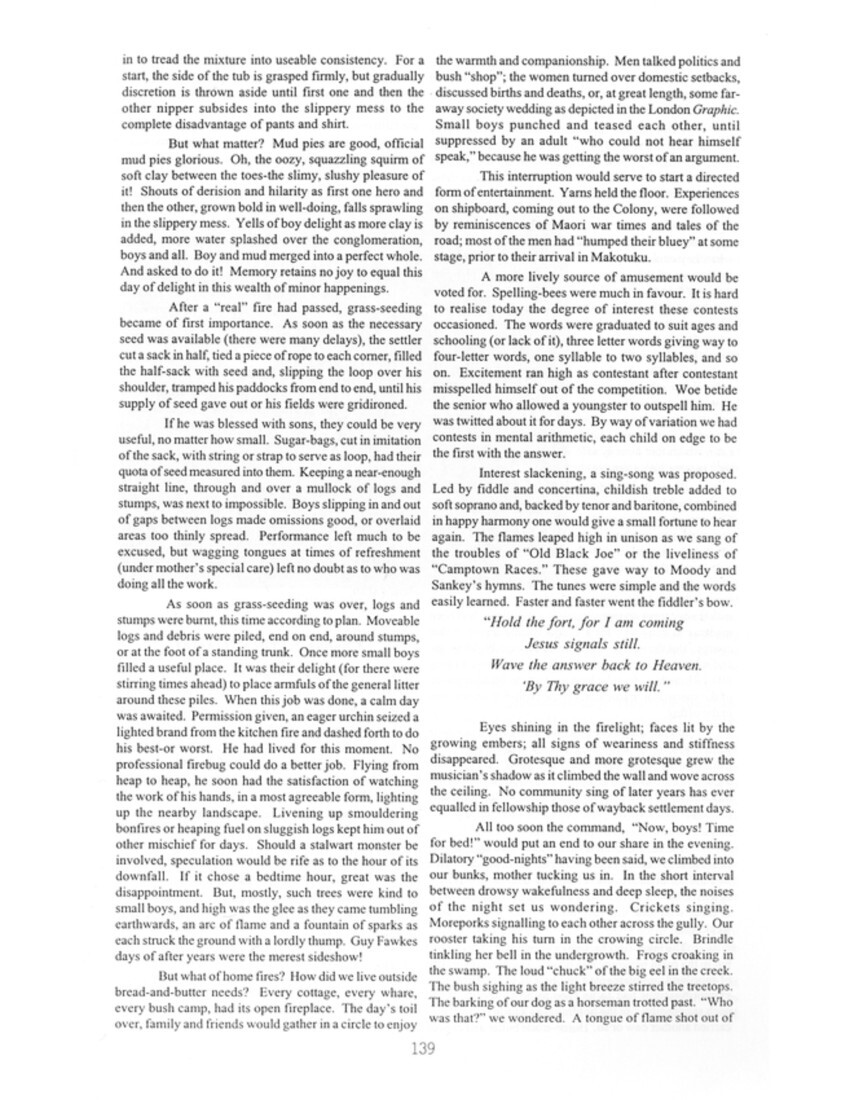
Page 140
a hollow stump, lighting up the room. Voices from the other room would cease to make sense, drift further and further away, become fainter and fainter until-the sun shone in the window.
Early days of land settlement in Hawke’s Bay saw the immense areas of open country, the natural clearings, monopolised by big run-holders squatters of the Australian era. Smaller men (by “small” I mean those with little or no cash or influence) were compelled to go right back. Where they did settle was determined by one or both of two factors: (1) cheap land; and/or (2) the opportunity to make some sort of living, in addition to what they could win from their small holdings. A bush section gave the answer to (1), and the building of railways the answer to (2), provided the line came within easy reach of the holding. But this job had its limitations. The pay was small-four bob a day-and an absence of ten hours (getting to the job and home again cost a lot of time) left the settler hardly any chance to break his property in. The clearing of a bush farmstead was a full- time job in itself. But most settlers in the Forty Mile Bush acquired some ready cash by doing part-time work on railway construction, and used their “free” time on their holdings, cutting and shaping sleepers and posts, and rails, which had a ready sale with the contractors when they moved into a nearby stretch.
These useful oddments were stacked alongside convenient bullock-tracks pending the arrival of the Government inspector. His visits were uncertain; so the non-working speculator with cash to play with made a lot of money, particularly if, as mysteriously happened, he got wind of the approach of this important official. Once the inspector’s broad-arrow sign was punched into the items submitted, they became Government property. The maker need worry no more (unless a stipulation had been made as to delivery), for a cheque would arrive in due course. But the settler, with a store account building up, and with a stock of posts and rails and sleepers awaiting official branding, found it hard to resist the blandishments of the speculator, particularly if the bush-fire season was in the offing.
Should such a fire precede the inspector, a whole winters effort would more than likely go up in smoke. A gamble in the real things of life, with a vengeance. Many a man took this chance to his bitter disappointment. King Fire not only shuffled the cards; he dealt himself the joker, the Right and Left Bowers, not to mention the Ace and King.
But hard and all as such total loss was, it was easier to bear than a world-without-end debt liability. This was the lot of many who elected to accept an advance against their stacks of timber awaiting acceptance. Most of those who took this easy-money route repented their weakness.
The bush-fires brought a train of small disasters, but in the main recovery was quick. The natural fertility of bushland, supplemented by the ash of the fires, was extraordinary; it had to be seen to be believed. After each succeeding fire the holding was a little clearer, and carried another cow or so. Home-made butter and cheese were as good as ready cash with the storekeeper. He had his market at the contractor’s camp along the line. With groceries and other small needs bartered for in this way, the family’s other needs were more or less supplied from the farm itself. With our own milk and butter, cheese from a Scandinavian neighbour (they were past masters at making it), two or three pigs, ducks and hens, the table never went very short.
But the real wealth of the district, if these pioneers had not lived so close to their tasks, lay in the forest itself. Only a few of the splendid trees which stood in this richly endowed area were ever converted into millable timber. The rest were felled, to shrivel and dry, ready for burning when they were not burned “standing.”
Thought for today was all that was possible. Care for the future was rarely expressed, at least not in schoolboy hearing. The settler, with his rent or interest to meet, struggled manfully to raise money. If there was a “poultice” (expressive bush word for “arrears”) on his place, he was just moved on as soon as, his creditor found a purchaser at the new improved value.
In what particular jam father got caught we never rightly knew. But caught he was, and the farm no longer ours. His years of strenuous toil and husbandry reverted to the vendor, who, in addition to his claim for outstanding monies, had by way of bonus fences and outbuildings, to, say nothing of a property cleared and drained and therefore more readily sold or leased.
Small boys know little of such things and think less. So we young fry were not at all disturbed when father and mother set themselves up as a committee of ways and means, covering a hopeful migration to Porangahau.
Chapter 2: PORANGAHAU
In Maori: Porangi-mad; Hau-wind
FOR THOSE days the way was long-perhaps fifty miles-and the means woefully short, not much more than twenty shillings. These pieces of silver were set up in two piles, one to be retained by mother for the needs of the three boys, the other to cover father’s journey to this distant job he thought he might get.
We follow him. The ticket to Waipukurau cut his precious share in half. Stepping off the train, he strode along the only street, with a thirty-mile tramp ahead and his anxieties for company. But his luck was in. Passing the hotel he was greeted by the proprietor:
“Hello, Billy! What brings you here?”
“I’m off to Porangahau, Peter, after that job at the store.”
“How’re you going to get there? There’s no coach until Monday.”
“I’m not using any coach. I’m going on shanks’ mare. I’m broke. Peter.”
“The hell you are!”
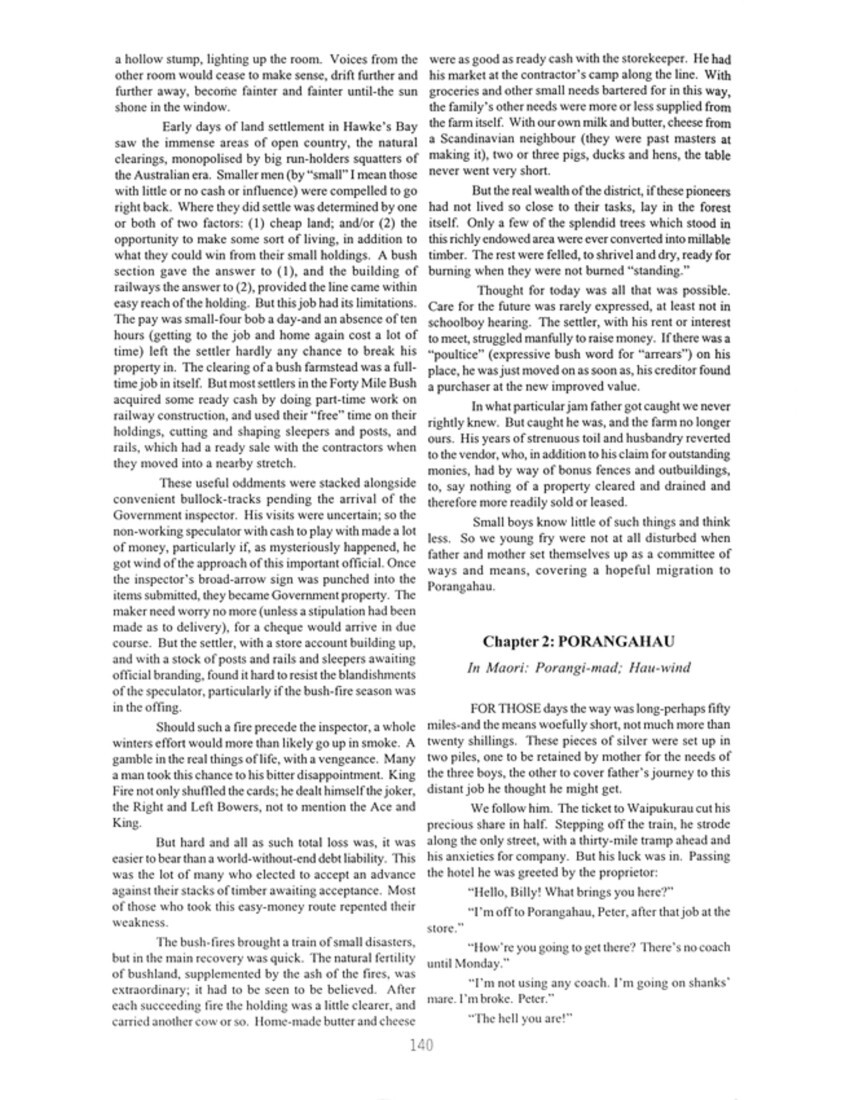
Page 141
PORANGAHAU
“Bet your sweet life, and I must be jogging along if I’m to get there before dark.”
“There’s an easier way than that, Billy. Take my horse. If you get the job, send him back by a drover. If you don’t, ride him back. It will be easier than walking.”
“But, Peter. I can’t pay you; I’m broke.”
“Pay be damned, Billy. Who said anything about pay? I’m lending him. Some exercise will do the brute good. What’s more, dinner’s ready. Nothing like a good feed, before you start.
“Mother!” (this to someone in the kitchen). “We’ve company for dinner and I’m hungry.”
An hour later, farewells having been said and thanks brushed aside, behold father on Peter’s roan pursuing the road to job or no job. With so much at stake his thoughts early took charge, and the roan, from nipping thistleheads, took to snatching satisfactory mouthfuls and finally, with a mind to serious grazing, saw a turning that suited and just naturally took it. Dusk was setting in when his rider awoke to the fact that Porangahau was not in sight and the road had dwindled to a bridle-track. A night in the open in May was a far from pleasant prospect; but, just as he had made up his mind to it, the sound of a horse coming towards him at a smart trot obviously told of a rider sure of direction. A brief explanation and the two men were on their way to Oak- burn, the – stranger’s destination. The offer of a “shake-down” was gladly accepted and, with prospect of a meal ahead, the horses kept up a brisk pace.
Did I say it was father’s lucky day? The object of the journey to Porangahau turning up in the course of general talk, he was able to settle the matter of “job or no job” there and then, for before they dismounted the job was his. His host for the night combined sheepfarming with general storekeeping and was the owner who was looking for anew man. Father settled in right away, and a few days later a letter enclosing two one-pound notes arrived. at Makotuku. We were in funds once more.
It took weeks to scrape together enough money to cover the shift to the new home, but the funds were available at length and three excited boys were all on edge for the glory and excitement of a trip on the train.
Our neighbours had been more than kind-they had been generous to the point of self-denial and their hopes of our “coming back some day” were as genuine as our promises to do so. Good people all.
The stationmaster clanged his bell, the guard blew his whistle and raised his arm, and we were off to a great waving of handkerchiefs and honest “goodbyes.” Down the grade we gathered speed on to the railway bridge and into the cutting on the other side. Makotuku was gone and interest in bush playmates gave way to interest in the train itself. The driver (the envy of each boy’s heart), the fireman and the guard were old friends. Each was called by his first name, except by mother, who used the prefix “Mister.” Having agreed that we were on the best train, handled by the best crew in Hawke’s Bay, we canvassed the pleasures of the journey ahead, wondering if “she could do better than twenty miles an hour on the flat.”
But pleasures that day there were none. They were destroyed by bush and second-growth fires along the track.
For miles the train just moved, and no more. It stopped at every culvert while the guard went forward to inspect. It stood for untold minutes at every bridge (all
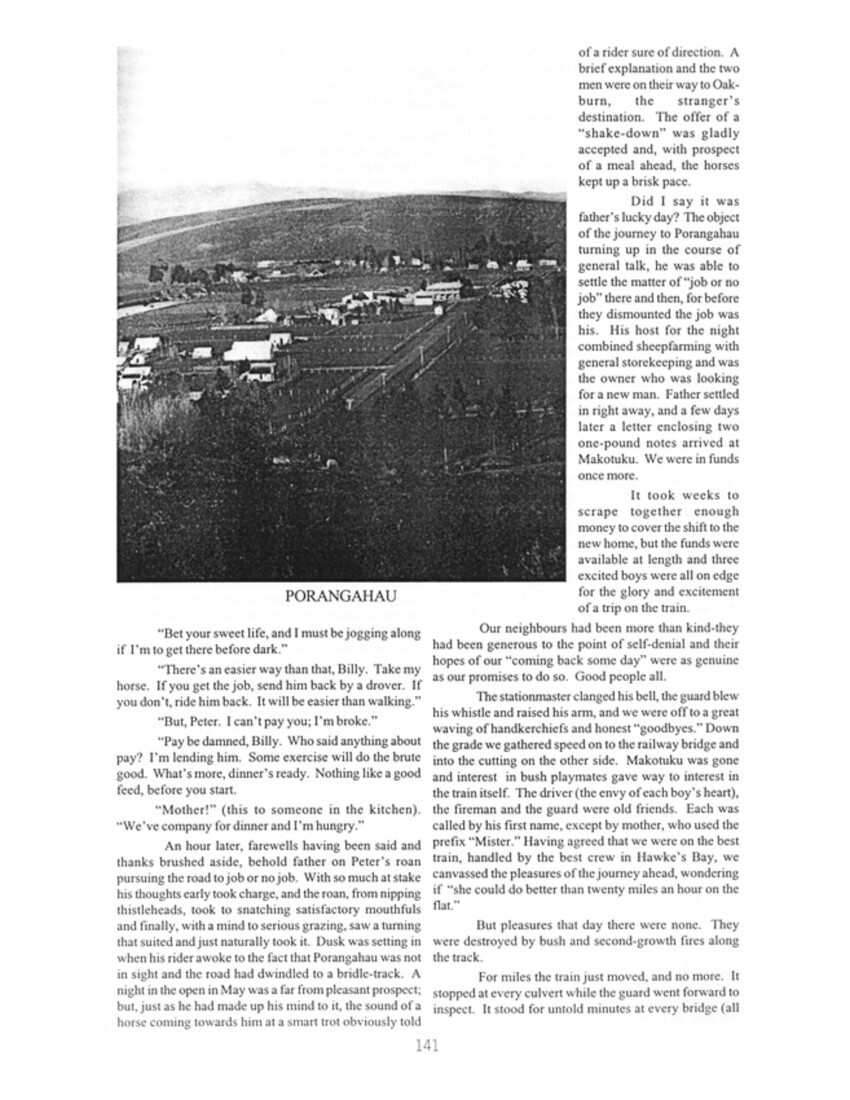
Page 142
bone-dry totara) while the driver held conference with a red-eyed, smoke-grimed platelayer. Mostly the two disappeared into the murk that hid the lower parts of the structure before they decided to proceed. The heat was terrific whether carriage doors and windows were open or shut. Nothing could keep out the smoke, the floating black cinders and feathery white ash which settled on clothes, in ears, and worried eyes until they smarted unbearably-rubbing only made them worse. The acrid taste and smell of the smoke destroyed all appetite for anything except fresh water, which was unknown in the railway carriages of that day. At least one small passenger crept under the seat in search of relief from these discomforts.
It seemed more like days than hours before we emerged from the smoke and heard the last of fiercely crackling grass and fern as the flames raged up and down the sides of the cuttings.
We were hours late in reaching Waipukurau, and the coach, being under contract in the matter of mails, had gone off without us. In the help-one another habit of the times, this was a minor trouble. We boys took it as a matter of course to be billeted in the homes of good- natured residents. I had as host the blacksmith, and a proper nuisance I must have been, for I was “under his feet,” as he expressed it, “the whole blessed day.” His smithy was a novelty and I tore myself away only for meals. The rise and fall of the huge bellows; the clouds of steam as he damped down the rising flames; the pungent, pleasant smell as hot shoes were fitted to massive hooves; the ring of hammer on anvil, between blows on the new shoe. The flying sparks, as first blows were struck; the beat of heavy sledge and guiding hammer when the smith and his offsider joined forces to forge a new axle. Dong! (on the spot to be hit). Ding-a-ling-a- ling-ling! (on the anvil). Whang! (the heavy sledge). Dong! Ding-a-ling-a-ling-ling-ling! Whang! Musically, evenly, perhaps thirty strokes; perspiration streaming down and reflecting the glow of the roaring fire, while hot iron turned from orange to red, to bronze-blue, before they cried “enough.” The beat of sparks on leather aprons. The ultimate glory of riding the newly-shod to the hitching-rail is one of lifetime’s memories.
But the coach came back, as coaches will, and the coach pulled out, as coaches must when drawn by five willing horses. We were on the road to our new school. A tedious road it was. A provoking road. An exasperating road. Twenty-eight miles of (slow) uphill and (swift) down dale. Uphill (it seemed) all the way. In our day the coach did well if it compassed this journey in five hours. This was the summer timetable. It did not run at all in winter, being replaced by packhorse for mails and bullock dray for store supplies. Those residents who could not ride remained in isolation for the duration.
Besides climbing the higher hills, the road specialised in going the longest way round, private bags having to be dropped at run-holders’ gates. Half-way, we pulled up at Wallingford for a change of horses, the passengers pressing the driver, as per time-honoured custom, to accept refreshment while this was going forward. The landlady (kindly soul) put a leading question about lemonade. Receiving three positive affirmatives, she, rightly, brushed aside mother’s polite negative and we were happily initiated into the charms of that beverage.
Wallingford lying at the bottom of a hollow, we started to climb, climb, climb again and, between the monotonous pace, the tedious outlook and the lurching of the coach, were all but worn out and half asleep when the driver roused us with. “Porangahau, boys!” as we crested the final rise.
It was dusk. In the short time he gave us to look, we spied out a few scattered houses, the small church, a two-storeyed hotel and the store. The river father had written about was hard to pick up, as its banks were high, but beyond where we guessed it to be were the whares and other buildings of a considerable Maori pa.
“Giddap!” shouted the driver, and, to the cracking of whip, rattling of harness, jingling of chains and loose buckles, we took the downward track to the flat below at a pace a trifle short of a smart gallop. But the brakes were good and the driver’s hands were firm. Almost before we had time to be frightened we were speeding over the final stretch-a level road at last. It was an entry in the grand manner, and roused a chorus from the dog population befitting the arrival of so important a vehicle. We tore down the last hundred yards with a dozen small boys in hot pursuit. The tedium of the journey was forgotten in the glory of this entrance.
Next day, to school. It was tiny. Not much bigger than a decent haystack and not much unlike one in shape. Three windows faced the road set too high for small children to peep through; but, to make sure distractions of traffic did no divert attention from lessons, the lower halves were frosted. In one corner stood the shelves of the public library. Its hundred odd books (“odd” is the right word) were leather bound and smelled deliciously. The blackboard and the pointer were the teacher’s tools of trade, anda large map of the world (Mercator projection) covered most of the spare wall. There was an open fireplace for heating, comfort in that particular depending largely on wood retrieved from the river which flowed along the back boundary of the small playground.
This playground was an improvement on Mako- tuku, as it was free of obstacles other than long grass. The school roll jumped from twenty to thirty during our stay of four years. The master was a German, who neither spared the rod nor spoiled a child. The small fry feared him-said they hated him-and hoped that something dire might happen as he passed the river bend on his way to school. His methods were based (so he told us) on those of his own schooling. If this was true, then German boys of his era had a mighty thin time of it. It was quite usual for him to smash a ruler (made by the local carpenter) on some small child’s hand, then seize another and continue to punish the unhappy mite until this broke also. The results were as poor as his methods. In one notable year only one pupil out of twenty-seven passed.
There were several Maori names on the roll, all boys. My class had three, making a class of four when all
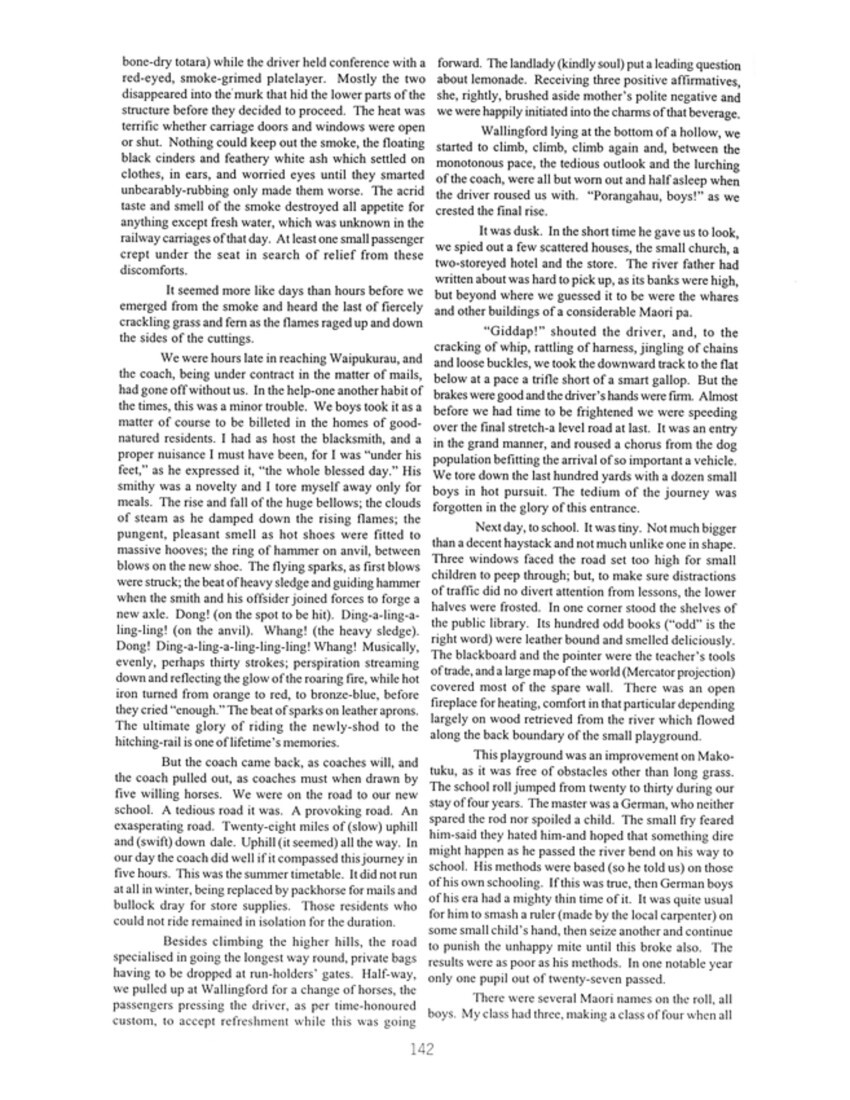
Page 143
attended. The three Maoris had but one book among them. The chap who got this precious volume came to school; the other two just didn’t – it wasn’t done! The pakeha scholar pondered this mystery for some time. When the why and wherefore of it dawned upon him he sprang to action. The class colour scheme changed from brown and white to all brown. The pakeha book had been handed over to a potential absentee and the third Maori had gone fishing with a white partner in sin.
The Porangahau is tidal to a little above the main road crossing. There was no bridge in our day; a dugout canoe served pedestrians who liked to get over dry-shod. The rising tide brought an advance guard of herrings. Next on the programme, was eeling. The Maori boy knew all that was to be known about digging them out of the mud. There was the kingfisher’s hole to explore. Was he at home? He was; and in a nasty temper, too. We were in and out of the river every five minutes. The hours flashed by in a boy’s heaven of happiness too good to last, for small boys must eat and small boys must sleep.
The division of spoils agreed upon, the Maori boy returned to his tribe with two eels, to b welcomed as one who had done well by his up bringing. The pakeha, with half-a-dozen herring to justify his departure from routine, was received in silence. An ominous silence. Perhaps the limited catch decided the punishment – not enough to go around; so, off to bed without any tea.
Porangahau had sat itself down at the foot of the hills as though it needed company. The flat was narrow where the houses stood and widened out into a considerable plain as you followed the river. The hills nestled close and were steep for small climbers, but up we went to discover delicious swamp-hole in the hollow crown of on of them. Fringed with raupo, and growing water weeds to perfection, it was semi-warm in the summer. Could a small boy wade across? He could, but only just.
Lying at its edge, we searched the sky to locate larks singing to their families. Mighty hard to spot. How could such small throats deliver that volume of music? Nota sign of them. Music out of nothing! Could there be “nothing”? What would the world be like if there were “nothing?” Everything black. But wouldn’t “black” be something? Oh! There was a lark! Singing as though his heart would burst, and fluttering, fluttering down; then silence as he dropped like a stone for the last twenty feet. Can we find his nest? No chance; that chap is too cunning. He lands feet away from the nest merged into a camouflage of grass, and finds his mate. We give it up and return to the pond for our twentieth dip.
In the ‘eighties, if Porangahau had any special feature it was its isolation. Not that.this worried youngsters overmuch. They had their mates and, apart from school, had the general run of farm and station activities to join in. In the summer the arrival of the mail coach was the highlight. When the winter set in the coach was wheeled to the corner of the stable yard and packhorses brought out mails and urgent supplies, such as medicine.
The general store stocked something of everything, and this included chemists’ sundries. The parson, who had studied medicine but had not taken a degree, prescribed. The storekeeper did the rest. Nobody was any the worse for their ministrations. As the Maoris liked blue bottles, their medicine had a castor-oil base.
Patent medicines were popular. Painkiller took the edge off, or added to the thrill of a drinking bout, or somebody’s “Safe Cure” in brown bottles was taken by the dozen by certain “drifters” who discovered merits in the contents quite apart from their curative properties.
Speaking of “drifters” reminds me of the swaggers who tramped up and down the coast spring work began on the sheep stations. There were notable characters among them. They slept out quite a lot, and their “dosses” in the fern dotted the roadsides. Their reputations as workers were well established. All could make themselves useful if they wanted to. Some never wanted But mustering, lambing, docking, shearing and droving provided them with spells of work and funds to “wipe the slate” at the pub.
Useful men were fed by the squatters until the season started. “Drifters” were given a feed, night’s doss, a hand-out next morning, and sent on their way. Their pace on the road was regulated by the distance to the next cookhouse. Nearly all had a dog trailing behind. Some carried bedding rolls, weighing many pounds; others preferred to freeze at night rather than burden themselves on the daily tramp. They were tough. Vagaries of weather had to be put up with, and were put up with as if of little moment. They could tell to an ounce what the hand-out would be at the station ahead. Silence was their rule, and they ruminated over questions, sometimes so long they forgot to answer.
Yet they were part of our life. Not a picturesque part; they were too down-at-heel for that. But they had their influence, if not as an example, at least as a warning.
When winter finally shut down on us, the working community relied on the store for general supplies. These sometimes gave out. Heavy items, such as flour and sugar, could be obtained from Waipukurau at £5 per ton per bullock wagon. This surcharge was too much; so we made use of the tiny steamers which plied the coast. Our open roadstead port was Blackhead, and it often happened that the surf there was more than the sailors would face-and goodness knows they were daring enough; so the small steamer would pass us by to try again on the return trip. If it missed several times-well, we were all on “short commons.” This, for the small fry, was not worth discussing, unless sugar was short at the store. Run-holders who laid in stores in bulk sometimes came to the rescue, but transport from them was difficult and potato and pumpkin pie figured on the menu morning, noon and night.
Plenty of meat? Yes, but mutton, mutton, mutton. The community was so small, the killing of an ox was never thought of-half of it would have gone bad. Sometimes the bullock-driver discharged one of his team. It would be “spelled” a few months and then slaughtered “on spec.” Everybody took more than they could manage
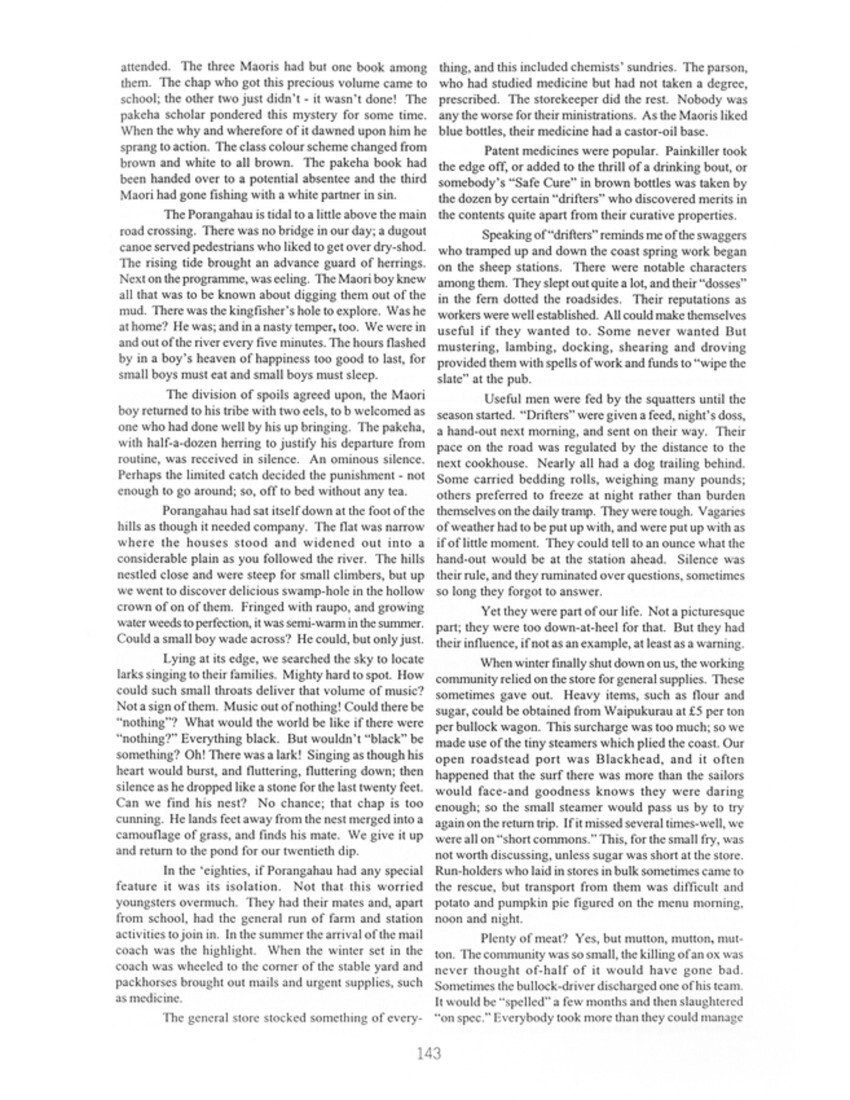
Page 144
and next day wished they hadn’t. Ten years’ tugging on the chain sucks the succulence out of muscles, toughens sinews and hardens bone.
Father had a brine-tub; so corned beef-corned leather was nearer the mark-figured on our table until we were sick of the sight of it, and were glad to return to mutton roast, mutton boiled and mutton stewed.
We went in for pig-raising. A sty was built and two piglets cleaned up our -own and theneighbours’ scraps. They were named with the christian names of two of our leading lady citizens. This caused some embarrassment at home when their progress was discussed in front of feminine visitors. I don’t know whether mother was more relieved over the termination of these social setbacks or pleased at the opportunity of returning some of the many kindnesses shown to us by neighbours when the day of the piglets’ demise arrived.
Present-day adults have to go far afield to understand what isolation amounts to. Porangahau was one of a dozen small places dotted, along or near the coastline of Hawke’s Bay. The arrival of the mail coach brought nearly everybody to the front door. As fast as they could run, boys scampered to the Post Office. If there was the rat-tat-tat of vigorous date-stamping, anticipations ran high. There might be a letter for us. Skirmishing for places was brisk when the postmaster- linesman-telegraphist pushed up his slide.
We were always in luck. Father subscribed to the Napier paper. Why, it was difficult to understand, for the things he said about its news and politics must have made- the editor’s ears burn. But, with this certainty to rely on, we did, mostly, lord it over the other boys. So the turn “to call for the mail” was eagerly sought after. If, in addition to the Herald, a letter was handed through the slot, the messenger swelled with importance.
Imagine, then, the sensation when an excited urchin dashed into the kitchen with a letter from England to hand over. News from grandparents they had never seen; on the envelope a shilling stamp. Inside, sheets of the thinnest paper, criss-crossed in the spidery handwriting of the day, with news of distant Sussex, so far as grandma knew of it, and she seemed to see and hear quite a lot. Father read out loud for the benefit of all, but when he got to trellised areas a word or two slipped into the text which we thought only bullock-drivers knew. Mother frowned. A fresh start, and a second slip. How could grandma write that? She hadn’t, so mother took a hand.
“Time for small boys to go to bed; I’ll read the letter to you in the morning.”
That letter had been four months on its way. It had costa shilling in postage, a shilling out of an income of thirty shillings a week. No wonder every inch was crammed with news. After she had written on all the lines, grandmother turned the letter sideways for good measure-and father’s undoing.
We had one notable building-the church. Not that it was large; it was not. But it was in perfect keeping with its surroundings. Over the altar was an exceptionally fine stained-glass window with the story of the Good Shepherd worked out. To a small boy this was its most satisfactory appointment. The parson’s sermons were long, but the coloured lights playing on his surplice aroused interest very complimentary to the preacher.
Sunday school was held in the parsonage along the Blackhead road. Attendance was not all our parents expected, because of the natural desire to consort with boys whose parents had different standards. We were mostly behind with the catechism, so punctuality suffered in the effort of memorising the allotted task. Sluggishly we moved along, kicking up unnecessary clouds of dust. The crickets sang gloriously. To enliven one dull Sunday we gathered a colony ina box. No trouble, to fill it.
Thrust a cocksfoot straw down a cricket’s hole, wiggle, and then pull it up. Half second later up comes Mr. Cricket in a tearing rage – “What the hell!” – to be grabbed and made prisoner. The box is soon filled, and away to Sunday school, with attention centred on the prisoners, who make quite a noise. The order for the box to be handed over is grudgingly obeyed. “Curiosity” thy name is “woman.” The lid is lifted and the air is full of crickets, happy in release. Shrieks, punctuated by a sound box on the ears, and a boy is left alone in penance (?), under instruction to capture the tribe. An inglorious home-coming, not unmixed with pain.
The village frowned on the delinquent in public but rather enjoyed the incident in private. This was discreet, for the parson’s wife was a masterful woman and held on to the subject like grim death. Why, a week later she was heard to say to mother: “…and you know, I never go into that room, without I feel as if one of those dreadful creatures was crawling on me.” She may have been right. A good round dozen went into that box and only ten turned up for ultimate release.
Our great delight in summer was the flocks of sheep which passed through on their way to the boiling- down works. These sometimes numbered thousands. A drover leading one, two, or even three in gaps along the line, with two more bringing up the rear. Dogs scuttling to and fro, obeying orders or awaiting them. Can anything equal the eagerness of a well-trained sheepdog to “beat the pistol”?
We followed the trail for miles, with a lift on to the drover’s horse when we were tired, and a share of his tucker when the billy boiled.
There were other trips. Horned cattle in small lots livened things up, but one glorious summer the village surrendered to horse-breeding. The town paddock held fifty to sixty mares with foal at foot. At low tide, mothers and foals were take to the river for their daily drink. Hell- for-leather they followed the leader from paddock to river and then home again. Did we feel like it (we mostly did) there was always a mount to be had.
England sent a Rugby team to teach New Zealand how football should be played. A year later Porangahau took up the game. A challenge from the rival village of Wainui (Herbertville now) was accepted, and
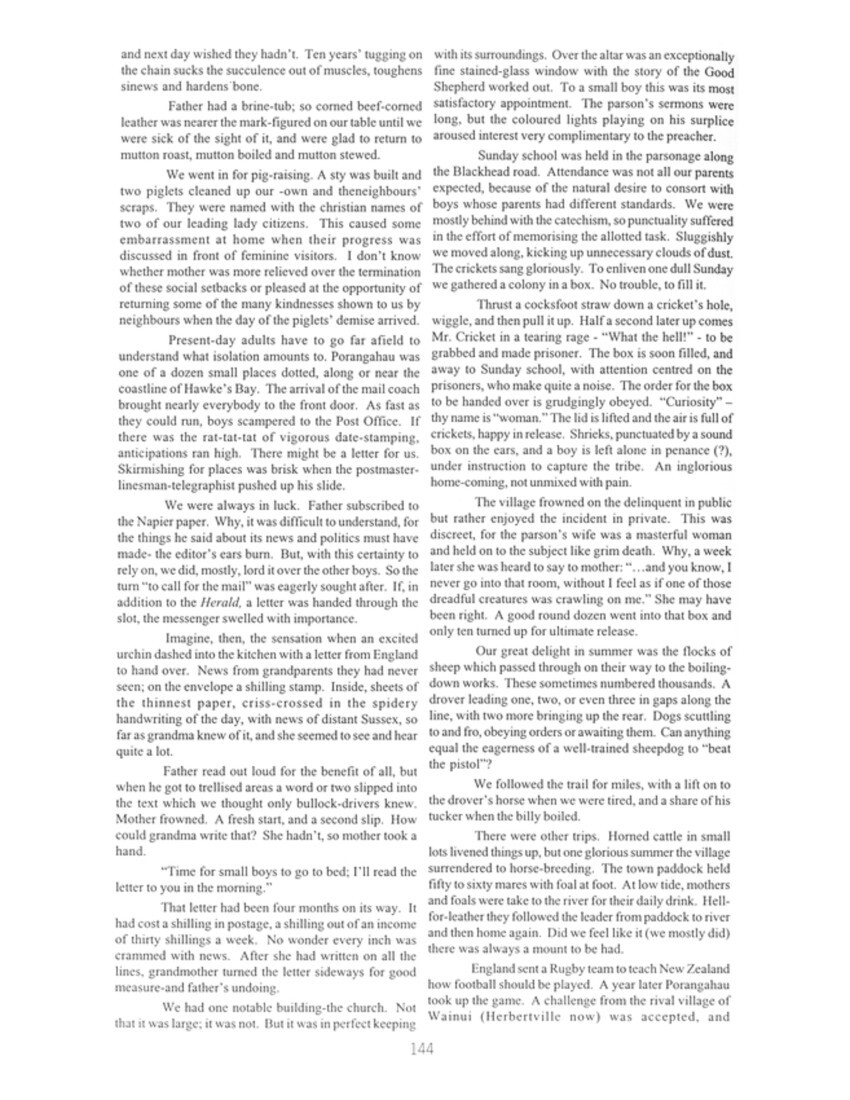
Page 145
preparations, mostly of the verbal sort, went ahead apace. It was laid down at mealtimes that the game was rough and that the slaughter would be terrific. We were for-. bidden to go. Of course we went, but for safety’s sake climbed out on the limb of a pine that overhung the playing-field.
In addition to the players there were some forty other people present-all men. It was the day of the “Maul.” Nothing could be more satisfactory or exciting. As two men wrestled for the ball, friend, foe and spectator gathered round, eventually joining in. Fearful of missing details, a small lad leaned over too far and tumbled into the midst of the conflict. His father was present-another inglorious home-coming.
Friends in Napier gave a thought to us and our loneliness and made up a box of bananas, oranges and coconuts. A treat so rare could not be kept secret. The school was invited to join the feast. Fifteen boys came that day and another two rolled up the next. Luckily, coconuts break into many satisfactory pieces, so grownups did not all go without.
Four years slipped by, and the matter of a better education had to be considered. We were all potential bullock-drivers, could speak the language to perfection, but there were only limited opportunities in this line and the local bullocky showed no signs of retiring. Makotuku debts were paid off; so, in the interest of better schooling, father turned in his job at the store, packed up his belongings, and we set out for Dannevirke.
Chapter 3: DANNEVIRKE
In Maori style TANIWAKA
THERE MAYBE a province in New Zealand more beautiful than Hawke’s Bay, but no resident of that province will admit it. The full length of its western boundary is commanded by the Ruahines, which obligingly change their names as they run north. The long, four-thousand-foot ridge at the back of Dannevirke gives way to lofty, snow-clad peaks back of Waipawa, and breaks up into miscellaneous ranges nearer Napier. Jutting off ridge and peak and range are spurs reaching out to the coast in splendid hills which dwindle to rolling country before they touch the sea front. With their help, innumerable creeks shoot out of the mountains through deep gorges. Fed by the melting snows these streams rush on to the plains in a terrific hurry, gentling down as they sweep round bend after bend, to. merge into splendid rivers fringed with willows and lush meadows.
This mountain backdrop is never the same two days running. Indeed, it changes from hour to hour. If residents would only pause to look they would see that sunny day, cloudy day, stormy day, has each its charms. But best of all is sunset after rain. As lengthening shadows creep over the land the dark greens and browns of the bush disappear into a deep blue, to tantalise amateur artists.
Near the southern end of this range lies Dannevirke, resting on an undulating plateau, six hundred feet above sea-level. Between the settlement and their mountain majesties are ten miles of hills, clad (in the ‘nineties) with virgin forest. These hills are eternal, but the bush, alas! is no more. Man, despising the vast riches with which this countryside was endowed, had set to with axe, and saw, and firebrand. Week in, week out, the trees toppled down to
Hauling Logs in Bush
MAKOTUKU
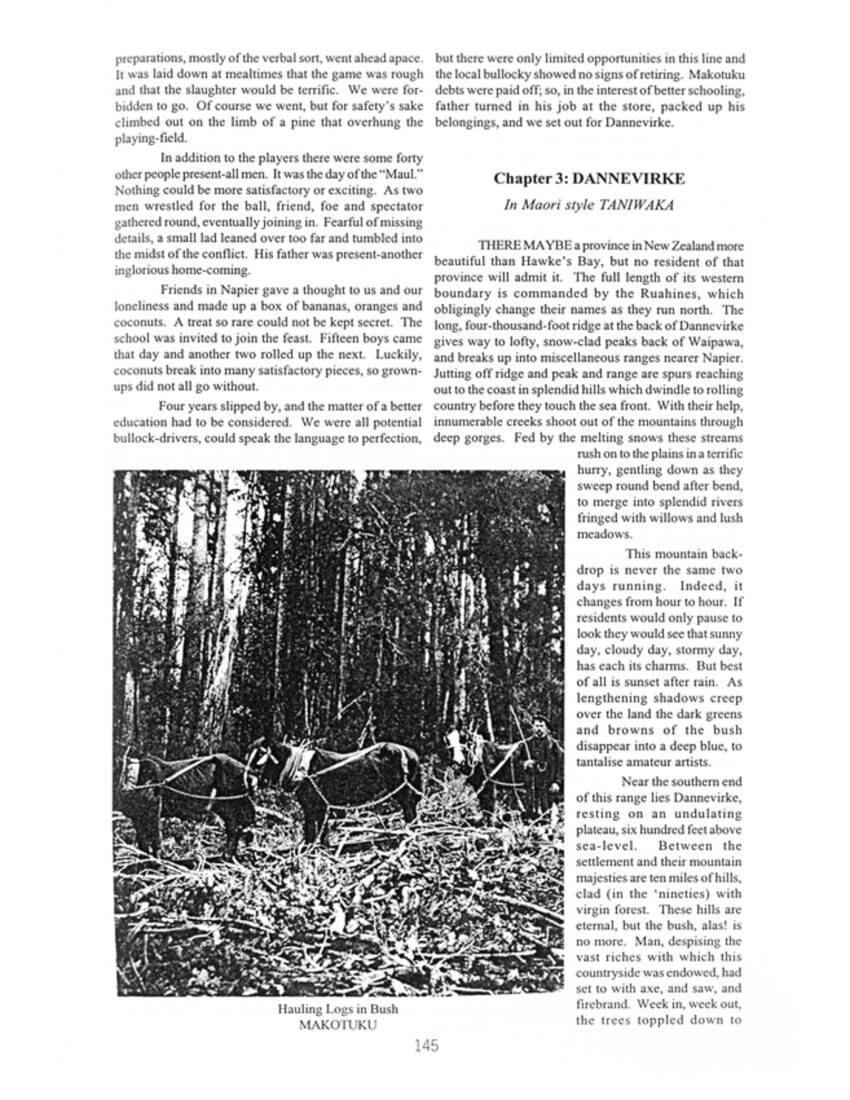
Page 146
shrivel and dry and later disappear in smoke and flame, leaving a twenty years aftermath of stumps and logs and lonely trunks to mar the landscape. The gift of centuries destroyed in as many years, and only a fraction saved for useful purposes.
This is true despite the buzz and bustle of a score of sawmills providing builders throughout the province with timber for houses and barns, bridges and telegraph poles, woolsheds and warehouses, churches and schools, public and private works of all kinds.
The railway hauled rakes of empty trucks to Dannevirke, seized an equal number of laden wagons and disappeared down the grade, to the noise of protesting brakes, on its way to Napier.
Fences offended the eye everywhere and were hard to forgive against the glory of these everlasting mountains. The camouflage of civilisation was beginning to show against the work of the ages in 1890. Crudities in the way of houses, rough and unpainted, with nondescript outbuildings and post-and-rail fences, offended the eye everywhere, and were hard to forget even when overshadowed by the majesty of the everlasting hills.
The township flanked the sides of High Street, which was narrow, probably because it had been cut out of the forest. Tiny shops dotted along its length made up the business area. It was the period of the general store, and most shops catered for every known household need. Advertising was done by a display of wares on the footpath, the putting-out and taking-in of which monopolised a lot of each storekeeper’s time. Boots were suspended from nails driven in the verandah-posts. (Shoes, even for women, were hardly known.) Gaudy blankets swung from the rafters in the wind. The footpath was kept for rolls of flannel and towelling and unbleached sheeting and turkey-twill.
Empty packing-cases further impeded pedestrian progress or served as resting-places for the idler and the gossip, and as a delight to small boys, whose heels drummed diligently on their resounding sides. Inside, billies and buckets and pannikins clinked in bunches from the ceiling, while axes, spades, crowbars and saws were mixed with piles of moleskins and bundles of heavy woollen singlets. Socks, grey and blue (fancy colours were held in outspoken contempt), were piled on one end of the counter, and bolts of cashmere and tweed encroached from the other, so that little room was left for serving customers.
Customers were leisurely and the service hardly less so. It was quite usual for customer and shopkeeper to go and have a drink together. At such times a small boy could come into his own, being deputed to “look after the shop till I get back.” By right of this authority he would lord it over his fellows, firmly refusing permission to break biscuit and lolly tin seals but, in a spirit of practical generosity, allowing reasonable sampling of raisins, dates and currants opened up for sale.
Presently storekeeper and customer would return, to wander in and out of the maze of boxes and crates and bundles, the sacks of onions, potatoes, oats, chaff and flour. Treading on their heels would trot the emergency counter-hand, whom the proprietor had forgotten to dismiss appropriately. Tired of being ignored, he would finally get in the way.
“Well sonny, what do you want?”
“Please, I looked after the store while you were out”.
“Did you? You’re a good lad. Help yourself to a bag of toffee.”
No instruction as to size of bag, or quality.
“Old … is a champion; he knows how to run a store!” A permanent advertisement and a sure market for coins of low value for many a day.
A grocer was a grocer in those times. He blended his own teas (rarely striking the same blend twice), roasted and ground his own coffee, mixed a specific he called “rising,” did some soap-boilin’ when trade was slack, and tried his hand with the candle-mould. In.between these exertions he sold drapery, fitted customers with “ready- to-wears,” and dealt out pounds of nails and staples or disposed of coils of fencing wire with ready impartiality.
The stores were more or less duplicates of each other, both in general appearance and in contents. A bright exception was the chemist’s. He displayed two huge bottles of coloured water, one red, one blue, to indicate his calling. On late night the gaiety of the street was greatly heightened by these two spots of colour, a lighted candle helping to show them off.
There was one other odd man out-the gunsmith. His premises were outstanding because they reached a storey and a half. The upper half served as a home for his large and increasing family. A crude stair, fastened to the outer wall, provided their means of in going and outcoming. A start had been made with boxing it in, and had gone as far as a rail with irregular supports.
It would be hard to imagine a greater medley of interesting oddments than his stock-in-trade. Guns and bits of gun predominated, but he did some tinsmithing and served us as locksmith too. He mended clocks with unguaranteed results, and tackled watches when owners were not too fussy over them.
He was an omnivorous reader and a champion euchre player. This combination led to a prolonged stay of business at one period. An itinerant salesman with a line of Swiss watches turned up. He fancied himself with the cards. After a session with our gunsmith he took the porter’s job at the pub, to work off his board account.
Then our watch-repairer settled down to some really solid reading. It being the off-season for shotguns, there were only watches to trouble him. Did you leave your timepiece for attention, he waved you over to the tray of Swiss samples and left you to tie a tag to your watch and place it in the repair cupboard. You went on your way hoping, unless you were disposed to linger and discuss books. Even then our gunsmith continued with his reading. He must have had meals, for his shadow never grew less, but when or how was the secret of his family. I don’t remember whether he ran out of books or
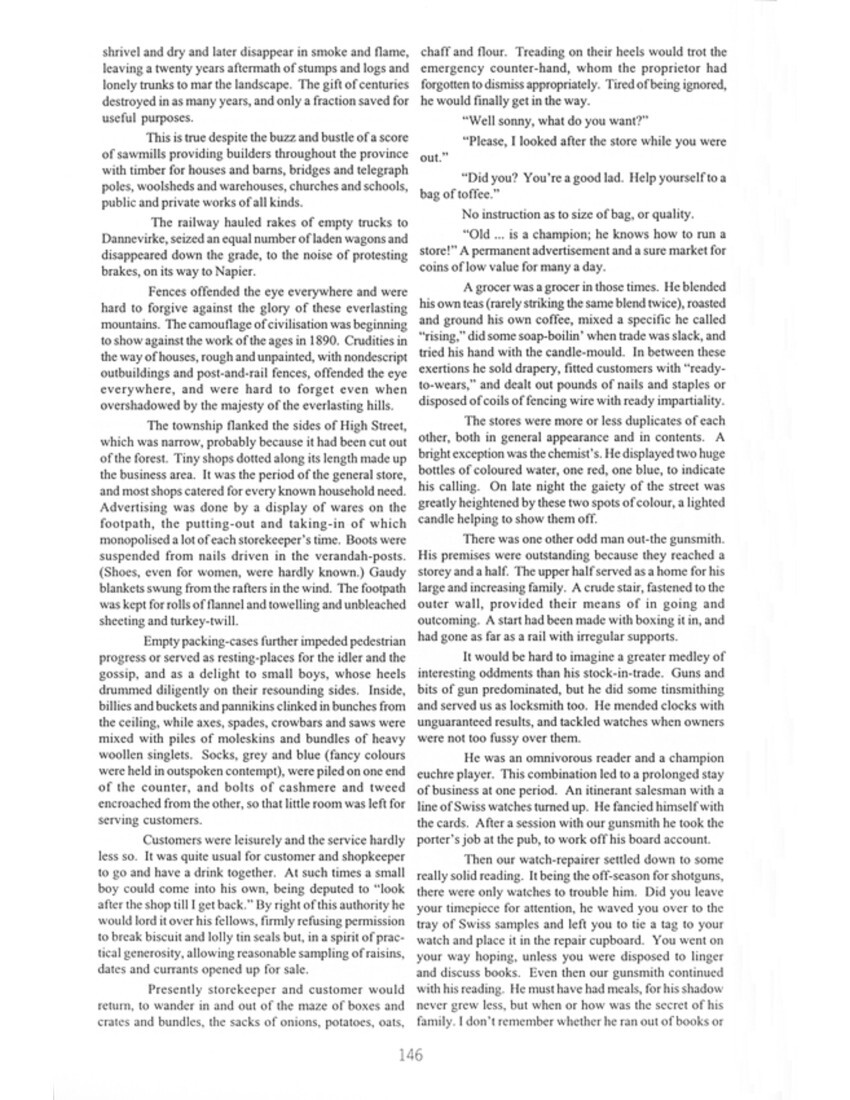
Page 147
substitute watches first, but I am sure of this: his display of ancient time pieces far exceeded in number, general variety and depth of dust the display of any other watch maker in the province.
Heigh-ho! Here we are one-and-a-half storey high. This brings us to buildings of two storeys. We had four-all pubs. A stranger, asked to guess at our principal business, would automatically nominate hotelkeeping. He would be right the very first time. Traders gave credit. They had to Settlers exchanged eggs and home-made butte and cheese for daily wants beyond their own fabricating. They wiped out store debits when the cheque for their season’s efforts in the bush came to hand. Such cheques called for “liquification,” with the hotel proprietor as the out-ofbank-hours discounter.
This practice obtained also with thirsty men who drew fortnightly wages. Mill-owners paid by cheque, and the publican, as a matter of course, “cleaned the slate” before ordinary traders came into their own. Lucky the shopkeeper who had his account settled between the times when normal thirst gave place to abnormal. If he didn’t, it was a case of waiting for next pay-Saturday and adding to the score, especially when the man was married.
Through this main street flowed a stream of newcomers. These paused for a while at some convenient sawmill and dropped a boy, or a girl or so, at the school. Such parents were mostly land hungry. After working for a spell they would hear of some bush section within their means as to deposit and rent, and away they would go, chasing the rainbow’s end, their goods and chattels on a home-made sledge trailing behind. School was over for the older members of the family and indefinitely postponed for the younger.
The school, our largest so far, boasted three rooms, a master and three women teachers. With two standards per room and fifty pupils, lessons proceeded by mass production. Every possible subject was done in unison. Reading was taken en masse, one standard at a time; recitation in chorus, both standards together; history (with dates and names of kings as central features) was led by scholars learned in such things; while geography, a pointer guiding pupils over a map of the world, was an art in itself. Select the map of Asia and spontaneously the class would tell you: “The Yenesei, the Obi and the Lena rise near the Mongolian Desert and flow north across Siberia to empty into the Arctic Ocean.” Which river was which mattered not at all. The teacher seldom, if ever, had time to probe for individual knowledge.
There was one exception, SUMS. These plaguey things had to be worked on slates and the right answers were in the back of the teacher’s book, which she guarded most jealously. At the end o half-an-hour’s struggle with long division, or mountain of addition, slates were exchanged and the answers checked off. This was the time for showing real friendship. But woe betide the boy who went too far in such matters. The teacher came down hard on cheating.
The highlight of the school year was the visit of the Inspector. Every subject was brushed up until the whole place shone with scholastic virtue. Boys who had been slack in attendance were granted unexpected holidays, or sent on difficult messages when awkward tests were going forward.
The inspectorial method was simple. Packs of question cards, duly shuffled to checkmate copying, were dealt out to the nervous pupils. An hour later, together with the answers, they were gathered in and fresh packs on the next subject served round in the same way. At the end of these tests the Inspector retired to his hotel with a mass of evidence to wade through, and a day or so later produced his list of passes and failures. Classes were then adjusted in the light of his decisions.
In the year 1890 teachers depended very much on class results for increases in pay and prospects of promotion. “Results” rested with the inspector, who worked them out on the averages of successes against pupils presented. Now could be seen the advantage of special leaves and distant messages. Such pupils, being absent, were not “presented.” Nothing could be clearer. The average rose to a high level. The teacher was happy, the committee congratulatory, the householders pleased.
The big boys dominated the playground. They were big, too, many of them more than half men. Some rode to school. If they did not, there were other boys who did, and it was quite in the accepted order of things for a steeplechase to be brought off in the lunch-hour. Should the time chosen be near to afternoon school, that was just too bad. Delays in choosing the jockeys or the course occasioned no misgivings, either. Once the signal was given the whole pack, boys on foot as well as on horseback, would be off in mad career over logs, ditches and fences. The master, armed with his cane, stood at the finishing post. He was as much a judge as a constable, for he was known to throw up his hat over a spirited finish and was quite ready to settle any argument.
In adult life, the two great days of the month were “pay-Saturdays.” Our many sawmills spewed their workers into High Street from any old conveyance that came handy. The first port of call was the hotel. Cheques were slapped on the counter and the publican ordered to “square me up, boss.” The change handed over, “ shouting” became the order of the day. Good-fellowship and lively greetings were predominant, but arguments of the “You’re-a-liar” type broke out, too. These in turn called for physical retaliation, with the barmaid, begging: “Outside, gentlemen! Please!” If she was comely and popular, the combatant were quickly hustled out of doors.
Then small boys saw stirring contests from the kerbside. Nothing was barred except mauls and wedges, and these only because they had bee left behind in the bush. Timekeeping was no thought of. Adult onlookers usually intervene before real harm was done, and, having brushed the fighters down, adjourned to drink the winner’s health at the loser’s expense.
“Pay-Saturday” was a day for women to keep out of High Street, Dannevirke. They mostly did, except when under the terrifying necessity of retrieving something of their husbands’ wages before the money was gone.
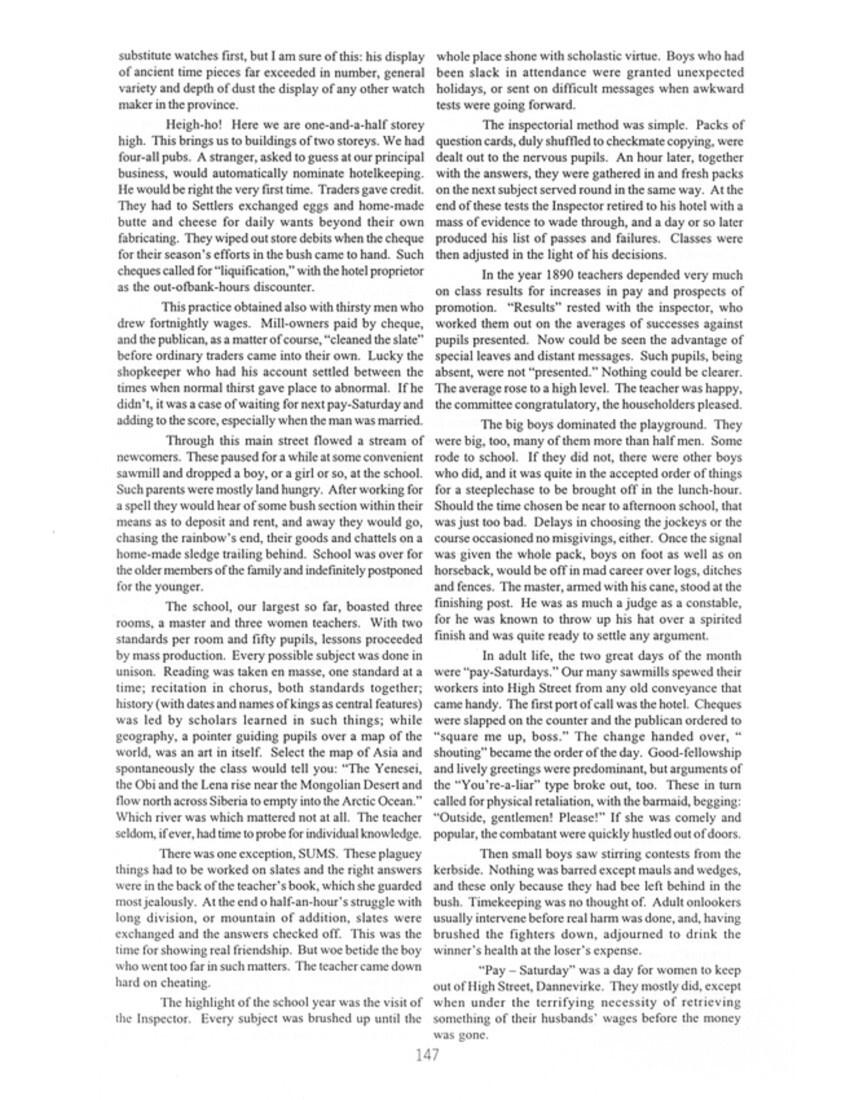
Page 148
Single men stayed at the pub, each of which catered for that type of trade. One, indeed, was reputed to have one hundred rooms available for this purpose. On Monday mornings, drays, traps and expresses were brought into service, the collection of their several gangs being undertaken by the mill managers-a difficult task, with escapees returning for “one more” final drink.
It should be remembered that bush work is heavy work; it is dirty work; it is wet work; it is dangerous work. A fortnight of roughing it on indifferent meals produced by camp cooks, and bush workers were ripe for any sort of diversion when they emerged from the forest. The customary way of escape from their boredom was through the hotel doors.
Efforts by well-meaning people to cater for such needs usually came to nothing. Lucky the young fellow who was courting. His sweetheart saw to it that his standard of behaviour gave promise of a decent home. But the unattached young man, left to his own devices, contracted habits which were hard to break in after years.
The Salvation Army tried its hand. Its first officer did well to stick it out for the ten weeks he lasted. What with jostling and language, he had a sorry time. His departure was unheralded and unsung and our truculent youths were above themselves with pride.
But the Army came again. The local bi-weekly announced the coming of Captain and Lieutenant… on the Thursday’s train. Those who could spare the time, and many who couldn’t, were at the station to look them over when the train pulled in. Out on to the platform tripped two of the prettiest women it had been Danne- virke’s lot to see. Sensation! That same evening these two women spread their flag of defiance to the Devil and all his works. In front of the onehundred-roomer, too. The Captain played the concertina and with the Lieutenant rattling her tambourine, sang a hymn to the stirring tune of “On the Ball.”
Rugby football was just coming into its own so this was a backhander with a vengeance Knock-out number one! Next day they cornered the town nuisance and by night had borne him to his knees and claimed a conversion. Knock-out number two!
Anyone who asks for a third knock-out is a glutton, but those who knew their Dannevirke felt that one was due and held their breath until the coming “pay- Saturday.”
Out from the bush poured the men, and wild and hilarious they became by sundown. That evening found those two bold women in the centre of the town, singing as though they had not a care in the world and, between whiles, beseeching onlookers to come and be saved. They came and were conquered. In a few weeks the Army ring took in the full width of High Street; our bush workers had fallen head over heels in love, and changed (some folk said “gone”) was the spirit of the town.
By happy chance, or with deepest guile, the Army had used the ideal method to conquer a rough community. Thenceforward “Pay-Saturday” lost its excitement and most of its terrors for the women, while Monday’s output in the sawmills was near enough to that of other days, Bush whares felt the new influence, too, the Bulletin being dropped, for interior decoration, in favour of the War Cry.
The boy population accepted the new order with true boy philosophy. They soon learned hymn tunes and words as interesting as the old and joined with zest in the services. They had side interests, too. The nightly collection started with the opening hymn and ended only when the faithful marched away to the barracks. The request for “another nineteen shillings to make a pound” met with an unusual response. Penny offerings, heated at a convenient fire, were scattered all over the ring, well clear of the drum, on whose head other donations resounded. “Glory!” shouted a new brother; “Hallelujah!” another; “Praise the Lord!” a third, as they stepped forward to pick up those super-heated pennies. Hell’s bells! Their language was far from godly as they cooled tortured fingers on unruly tongues which had grievously betrayed them.
Converts were so many, two women would not go round. Help was at hand. Our clear-skinned, bright- eyed maidens liked the trim serge uniforms and the demure coal-scuttle bonnets. They found that glances flashed from beneath their brims flew as straight to the mark as any covertly launched from sunbonnet hoods. Thus our young women kept in step with the spirit of the times and made good their age-old inalienable right to the men marked down as their own.
There were defaulters, of course. Raillery from those not brave enough to join the circle, or still heart- free, had its influence, and many “blood and-fire” jerseys were tossed aside or disposed of at a handsome discount. There was the case of George. His had been a notable conversion. Once the leader in all that was wild, he faced the jibes and sneers of former companions with courage and good temper. His “Peace be with you” rejoinders had them dumbfounded, while his stentorian “Praise God!” stilled the frivolous who favoured the rear form at meeting.
He had his cross. George’s business in life was to deliver logs from the bush to our largest mill. The motive power was his bullock team. They would not work in this New Jerusalem atmosphere, but clung to their early training. George replaced outsize, ugly words with terms of endearment. No good. He tried out lively hymn tunes. They disdained his music. He searched the major prophets for phrases of vigour. Another failure.
His bullocks had learned their business on swear words, and nothing but swear words would serve. Turning soft brown eyes on George, they sank to earth, chewing the cud of slow reflection.
Meanwhile there was a dearth of logs on the mill skids. The foreman spoke to George; the benchman reproved him; the breakdown gang spat in his presence. Even “Slabby,” the lowest of the low in sawmill society, cheeked him. All to no purpose. George held to his faith while the bushfellers sent word of logs six deep awaiting haulage.
The day came when the big saws gathered speed for lack of big timber to bite into. So the boss took a
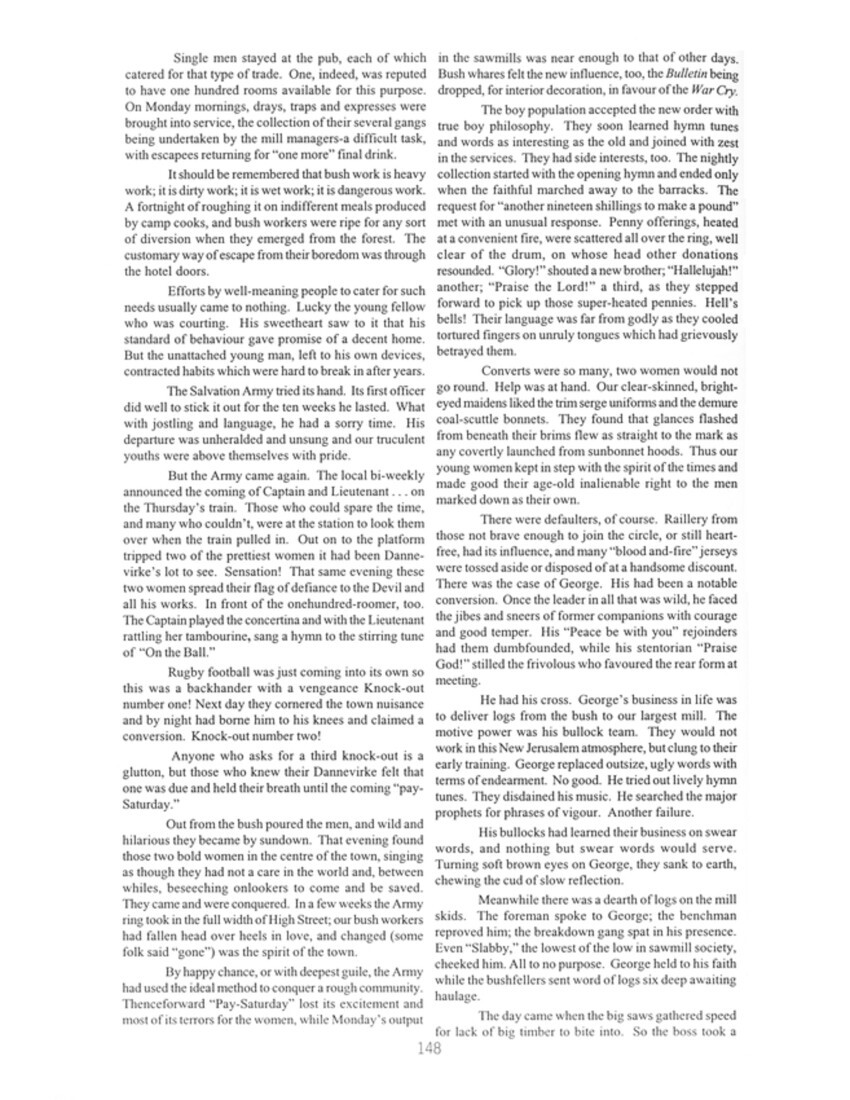
Page 149
hand. He was a gifted speaker, and chose his time well- every useful man was within earshot. They occupied the stalls with the bullocks in the dress circle, so to speak. Taking George to the centre of the stage, the boss thundered: “If you and your — team” (dozing bullocks opened their eyes) “don’t haul some – – – logs” (stolid bullocks showed interest) “by dinner-time” (switching of bullock tails) “and deliver them at the — skids” (the leaders uncrossed their legs), “you and your – – – team” (straddled bullocks paired off) “are – – – well sacked!”
The team understood this. They looked at George and George looked at them. They read decision in his eye and shifted uneasily. An explosion was due. It came.
“Get up, you lazy – – -! What the – – – are you – – – loafing here for? Am I to starve to death, waiting for you to get converted? Shift yourselves, you —, before I cut the hides off you!”
The result was magical. Every bullock understood; they sprang to it as a team. An hour, later a six- foot log turned and writhed and plunged through mud and brush towards the skids, there to be seized by eager hands who, with jacks and chocks, rolled it on to the breakdown frame.
Soon the big saws slowed down on a job worthy of their size, while the staccato cough, cough, cough, of the engine y s exhaust told the settlement of great things doing once more. The whole mill caught the momentum. The benchman did marvels in turning out weatherboards for the planer to shape and smooth. Sawdust and, shavings rose to breast height, and the sawdustboy, plying his shovel like one possessed, prayed aloud for night to come, he was kept so busy pushing his truck to the end of the tip.
Many bush-fires happened along, but not near enough for the home to be involved-we had to go to them, as they did not come to us. We went, and, being by this time venturesome, had minor adventures not mentioned athome. To mention one incident. Ona “dare,” five of us ventured a mile or so into the heart of a blaze. Using the tram track which ended in the railway yard, we had a close-up view of a fire at its fiercest, logs and stumps ablaze all round us. The wooden rails of the tram-line sent up tufts of flame and the smouldering sawdust between the sleepers made our feet hot inside our boots.
This foolishness illustrates the silly lengths to which small boys will carry a “dare.” We reached the point stipulated, turned and hurried back to find the tramline blocked by the trunk of a blazing tree-a tree which was not there on the inward journey!
Another occasion. From a safe distance (our estimate) we watched the onward sweep of a particularly large fire approaching on a wide front. An adult companion called attention to a shed which, by general consent, was in the path of the flames. We knew the owner and liked him. With no further thought, we flew to the rescue of harness and tools stored therein. Wrenching open the door, we dashed inside, to be followed by a quarter of a ton of shingle which a mischievous whirlwind elected to deposit at that moment.
Thoroughly frightened, we grabbed all we could carry and placed them in the shelter of. the overhanging bank of the creek, there to forget them until the fire was over. To our surprise, when a few days later we returned to the spot, the shed was still standing half-filled with gravel and litter; but the harness and tools we had so valorously rescued had disappeared, nor did a diligent search discover them.
The owner was peeved; he swore vengeance against persons unknown. He carried his grievance to the local “buster.” The editor hailed him with delight and composed one of his bitterest articles to our address. We felt mean, and scoundrelly and depraved, but let it go at that. Pocket-money at the rate of tuppence a week was not equal to making good one bridle, much less all the other gear.
About this time, certain seamen in Australia (or was it London?) decided they could not live of the wages offered them by shipping companies and refused to take the ships to sea. This awful state of affairs had its repercussions in Dannevirke. Our tiny railway engines used coal then, as do their bigger brothers today. New Zealand seamen caught the fever and coal ceased arriving in the port of Napier.
Fireboxes were altered and suitable lengths of wood hid most of the engine. Instead of two trains a day we had to make do with two a week. Before long, sawmill yards were stacked sky-high with timber of all sizes and lengths, awaiting trucks. Mill after mill closed down and bush workers, their resources gone, depended on the good nature of the storekeepers to keep their families supplied.
Single men hoisted their swags and tramped away, seeking scrub-cutting and such-like work at “tucker” rates. Married men, chained by their families. had to face it out. One week, two weeks, one month, nine months of enforced idleness- living on next to nothing. Porridge and potatoes, potatoes and porridge, world without end porridge or potatoes. We were thankful that the creek nearby had tuna (eels) and koura (crayfish) in plenty to give variety to this monotonous fare. These, with occasional feeds of acid titoki or bitter tawa berries, helped things out quite a lot.
Father’s jealously guarded funds slid away and, business opportunities being nil, he was on the trek again. No word for a fortnight, and then a telegram to say he had got a job. Once again there was the problem of get-away money. This was gathered in at last and we boarded the train for Napier.
There has been some kind of sequence in recording these old-time impressions, but I did attend another school at odd times. It was a one-teacher school, too. In other ways it differed from the others. So to complete this picture I ask the reader to come with me to Onga Onga.
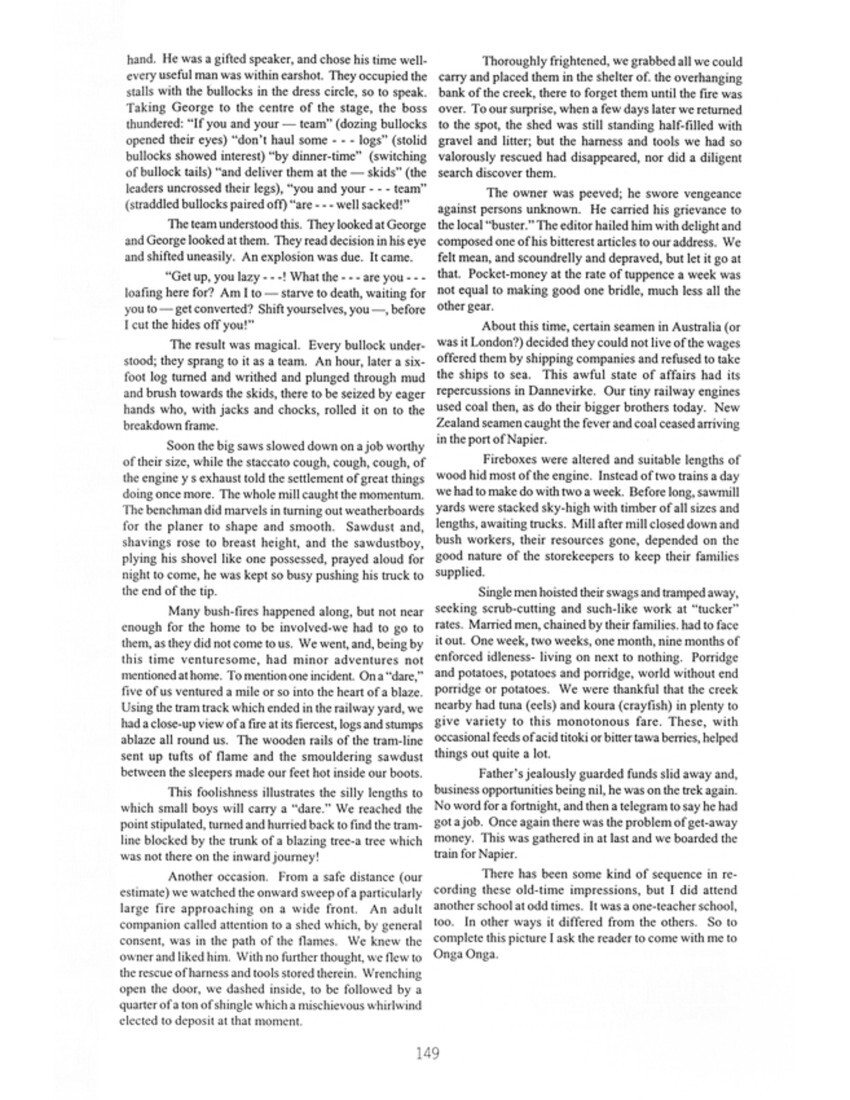
Page 150
Chapter 4: ONGA ONGA
Maori for Thistle
WHO FIRST applied the name of Onga Onga to this hamlet is not on record. Whoever he may be, every sixth year or so the name was very apt, for thistles sprang up everywhere and the air was laden with thistledown on the move. Next year there were still thistles a-plenty, but the following years only scattered bushes would be seen. Then, in the fourth or fifth year of the cycle they would again take possession, smothering the landscape.
Onga Onga as a centre of population? You had to be told you were there to know you were there. In our time it had a smithy, a two-storey hotel, a small general store, a few scattered cottages, the smallest of small schools, and grandfather’s workshop.
This was in the earliest days. Subsequent visits, on holiday or convalescence, noted additions to its splendours. A new store, another cottage, and, as the crowning triumph of the year ‘ninety-something, a flourmill, four floors high. To support its gristing the plains round about were given over to crops of wheat and oats and barley-a beautiful sight from the mill’s upper floor as the wind set the heads swaying and rippling, swishing and glinting in the sun.
Such agrarian highlights did not have the landscape to themselves, however. Two creeks hemmed in the village, wandering casually round its edges, disappearing under high banks to emerge as silver pools fringed with gorse shaded by poplars and guarded by round-topped blue-, gums and stray pines.
In the middle distance stood splendid plantations, shelter-belts for stock, and further shelter for homesteads and their orchards and gardens against the gales which raged furiously at the equinoxes.
In a “thistle” year the plains were smudged with a purple sheen, in and out of which hundreds, or thousands, of sheep, cattle and satin-skinned horses grazed busily.
Should one’s sense of direction be good, the saw-toothed hills east of Takapau could be located. This remarkable geological formation was a constant source of speculation, and the explanations offered were as varied as such theories usually are. To the west, rolling hills, terraced one above the other until they merged into the blue of the mountains at the back. In the spring, both plains and hills were a treat to see covered with a greensward which fairly shouted of fat stock ahead and dotted with lambs in ones twos and threes. As the sun gathered strength the green turned to gold and then to khaki, with paddocks set aside for hay flirting fast-and-loos with each wayward breeze. Each season wrought its change, and year by year, as plough an harrow worked higher and higher up their slopes hill contours softened until they finally lost their rough outlines.
Fifteen miles back, the mountains looked down on us in all the majesty of snow-capped rugged peaks. They divided their attentions between tripping the westerlies which hustled over the Tasman and surrendering their own snows for the benefit of many rivers and creeks which reticulated the plains. This eternal reservoir only awaits the art of the irrigation engineer to be put to a better use.
In and around this out-of-the-way place, hardworking men, cared for by equally hard-working women, won a livelihood, and raised youngsters enough to fill the small school. The first of these was one-roomed and had desk space for, perhaps, twenty children. It was the sort of school to which Mary took her little lamb. If it were not the identical school of the nursery rhyme, it ought to have been, for in the spring every girl there had a pet lamb, if not two.
It was a one-teacher school and was always “in” for one or other of the families round about, as the woman teacher was boarded out by each in turn. It was a case of “mind your manners” when she was with us, for her accounts of her experiences lost nothing in the telling when she moved on to the next home.
Boys lived a full life. There was a lot to occupy them apart from home lessons which hardly occupied them at all. There was the doing (and dodging) of many chores. Chopping wood, filling the water-barrel, getting in the cows, catching the horses, cleaning the pig-pens- a detested task. The renewal of the meat supply fell to the boys’ lot, too. Mutton was the standby. This was bought by the “side.” On killing days a small boy mounted a large horse and set out for the homestead. On the return journey he wrestled with a forty-pound sack of meat, thinking’ more of the pleasure of the ride than of difficulties in opening and shutting the series of gates which hindered progress.
It was a pleasant, easy-going life, if it hadn’t been for school. This institution was very much out of favour in the ‘eighties. Attendance was a compulsory obligation, imposed and watched over by stern and relentless adults,
Photo caption –
The Old School
ONGA ONGA
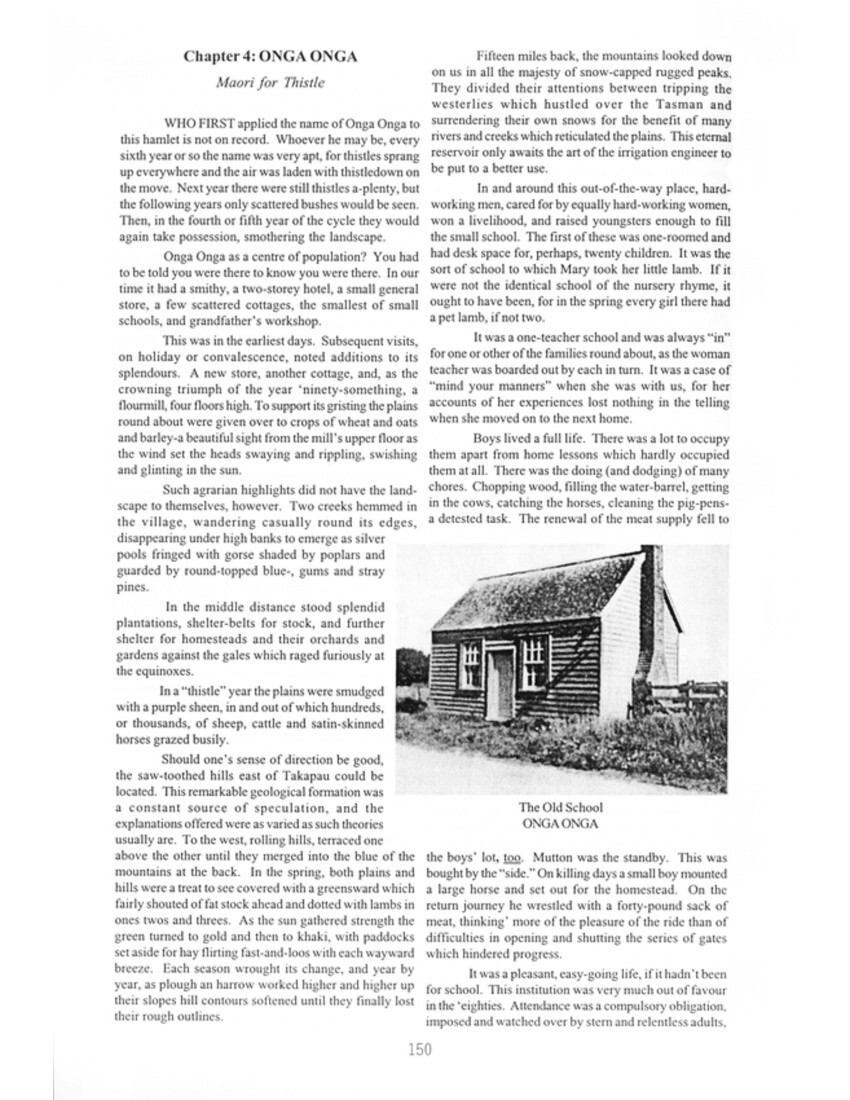
Page 151
serving on the school committee and knowing too darn much of schoolboy misdoing. The injustice of it! Why, some of them had never been to school themselves. How could they know what boy scholars suffered? A plague on them and their worship of reading, writing and arithmetic!
Contact with the outside world was kept open by the mail contractor who paid us a weekly visit in the summer and came every second week in the winter. The needs of trade were met by drays and brakes, while the wool clip moved leisurely railwaywards by bullock dray. A trip at two miles an hour.’ sprawled on the uppermost bale, would hardly appeal to the youth of today; yet the opportunity to get up was eagerly accepted by us as a variation of the daily round.
Improvements came slowly. Such as did come, added to the sum total of table talk, both in prospect and retrospect. The building of the Waipawa bridge was notable. The width of the decking, the length of the spans and the height above flood-level were matters of opinion and counter-opinion. But the outstanding event was the installation of the telephone. This was a mystery, very properly shrouded in secrecy.
The storekeeper-postmaster and his assistant were sworn in, and the seriousness of the oath taken (many of us thought of it as a swear-word) was most impressive. A sound-proof box was erected inside the store so that no stray customer should overhear the telephonist transmit the telegrams, though most anybody could read them as they lay around loose on the store counter. As a special concession we were allowed to speak to the Waipawa operator. This was before the walls of the telephone-box were filled with sawdust. When the final shovelful was tipped in, secrecy, double-dyed secrecy, clamped down.
The why and wherefore of electrically conveyed conversations were discussed morning, noon and night in the store, with the postmaster-telephonist, as became his office, supporting or contradicting every speculation. His own theory was that the voice did not travel through the wire (how could it, when the wire was solid?), but in the air immediately around it, using the wire as its guide for direction. This view might have held had not a thunderstorm rolled up, a flash of lightning using the telephone as its shortest route to earth. The shock blew out the lightning-guards and smashed a dozen poles, leaving the wire, to all seeming, intact along the ground. Faced with failure in all his efforts to get a response from Waipawa, our storekeeper-telephonist reluctantly surrendered his point, but for some days wore the look of a grievously injured man.
As for the bridge, its opening was royally celebrated. Crossing the river had been difficult and terrifying, for the Waipawa was a deep and forceful stream even at so-called low level.
Before the year of the bridge Onga travellers followed the north bank to a point where the Hampden (Tikokino today) road struck out across the plains. There Onga folk turned into the ford. “Ford” it was by courtesy only. It seldom remained “put” two days in succession. If on Monday you drove into it at right angles, on Thursday you had to drive on a long slant; while on Sunday, as like as not, there was a change of direction half-way over. These vagaries were supposedly understood by the country roadman. He drove manuka stakes into the bed of the stream as a guide to wayfarers, but mostly by guess and by God,” as sailors say.
The riverbed was a wide expanse of heavy shingle and boulders with, perhaps, two or three minor streams to negotiate. But no matter how many of these there were, the main stream was a fearsome obstacle. Seldom less than three feet deep, its icy-cold water rushed along at four or more miles an hour. Good drivers treated it with respect always. Timid and inexperienced people drove into it with misgiving and out of it with thankfulness that “that was over,” mixed with unpleasant anticipation if a return trip had to be made. Once the horses plunged into this main stream it was a case of “sit still and hold tight.” Words of command were useless. The rush of waters and the rumble of rolling boulders smothered anything less than a shout; and who shouts at a team doing its honest best? A firm hold of the reins and a touch of the whip kept the team moving ahead.
Sitting still took some doing, too. As the wheels settled deeper and deeper the water came nearer and nearer to small boys seated on the floor of the vehicle. No one likes getting wet where they sit down-not even the small boy.
If, at a critical point, the jerking and jolting were varied by the upstream wheel mounting a big boulder at the moment the downstream wheel dropped into a dip, bringing all moveables with a rattle and a run to the lower side, well-hard breathing and forceful words had to be overlooked until the driver recovered control.
Few teamsters attempted the Onga crossing when the river was rising. It was sheer madness to try it in flood. But the river was worth looking at before you made up your mind to turn back, all the same. Shingle islands submerged beneath the brown floodwaters, being replaced by moveable items such as uprooted trees and sections of fence line scurrying past followed by dead animals or some crude outbuilding, giving warning of settlers facing adversity, or marooned higher up.
A bullock sweeps by, still struggling bravely against the impossible, with a despairing bellow for aid, although beyond all hope of rescue. The rain pelts down, the wind using it to help confuse the traveller who is driving into its teeth.
“C-r-r-ack!”-a blaze of vivid blue light sets gooseflesh prickling up and down your spine.
“One, two, three,” you count before the thunder descends “‘smack” right on top of your head.
“Gee! That was close!” you think as you try to hide inside your coat collar.
“C-r-r-ash! Bang! Rumble, rumble, roar and rumble!” it rolls up-river, presently to be sent back as an echo of itself by the encircling hills, and circles round again until drowned by another peal.
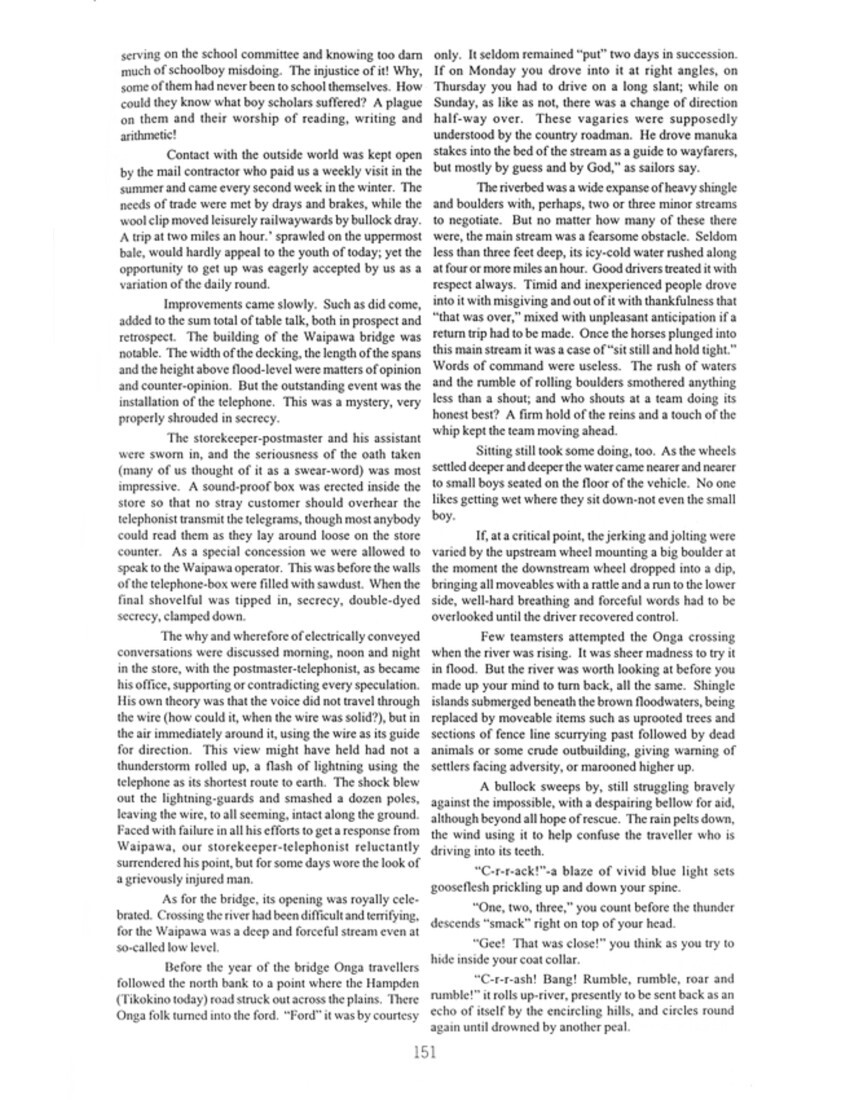
Page 152
The rain descends faster and thicker than ever, bouncing up from the road when it strikes. Another flash and another flare across the sky, every suspended raindrop a glittering diamond for the fraction of a second. Crash upon crash the thunder roars until a small boy, with six miles to go, clings to the mane of his horse and whimpers with loneliness.
Presently, standing before the kitchen fire, wet clothes strewn all round him, and in the comfort of a good rub-down at the hands of a kindly aunt, he recalls something of the scene in which he has been one insignificant item. Lightning slipping from cloud to cloud; the deafening thunder-claps; the roar of the gale; the rain flying in sheets; the river entering the gorge, mad with power! Each comes back to him in turn, the whole a vision of Nature at her magnificent, fearsome worst.
Apart from lessons, school life is interesting, beginning with the arrival of pupils from distant farms. A patient old horse who knows his business better than his riders ambles up to the gate. The kids slide off and a volunteer jockey gallops him off to the school paddock. Five nippers perched along the back of an old grey mare would be sensational today, but we thought little of it. Oldest sister sits in front (on the saddle if there is one), with oldest brother on the rump. In between, each of the smaller children clings to the one in front. Once on, the riders have to stay on unless there is a fence or gate handy to serve as a dismounting-block. There are streams to cross, sliprails to let down and put up, and other difficulties to overcome. There are no accidents, and pupils who ride are far more punctual than those who walk.
The latter had varied excuses for their tardiness. These were rarely accepted. Someone with accurate knowledge told on them and there were whispers about “meanness,” and threats of “You look out!”
Our women teachers passed in quick review. If promotion did not hurry them on, marriage removed them from our midst. One lady of uncertain years (this is being polite-all the girls knew the year of her birth) stayed long enough, however, to be a permanent memory. She was probably ahead ofher time. We irreverently said she was mad. Having read up folk-lore, she added this, with appropriate kindergarten exercises, to the school programme. Much to the grievance of the older boys (she accepted no excuse), they had to play kids’ games in schooltime, singing the appropriate infantile ditties. The village thoroughly enjoyed this interlude, and the more the boys raged the more they were teased. The committee entered into the spirit of the thing too, and this merry can-can continued for quite a spell.
Outside school we went where we pleased. Hunger was our clock, darkness our curfew. In bed we slept three abreast, or “topped and tailed” when there were four. Should there be five, we, “topped and tailed” sideways on- there was always room for one more in that voluminous bed. Merciful adults looked in at “lights out” and adjusted blankets over the flank occupants, offering up a fervent prayer for the boys to “sleep in tomorrow morning.” Vain hope. The early bird had hardly got on the trail of the early worm when this skirmish line wriggled into action. First awake grabbed the upper blankets, to stand siege against the drowsy and disgruntled. Then followed pillow fights, to the great annoyance of one- last-turnover adults. Threats of penalties at breakfast- time weighed not at all. The boys were first to table and well away before grumbling adults put in an appearance.
We were regarded as owners’ proxies by sundry dogs, and it was a common feature of the summer landscape to see half a dozen lads with a dog apiece on their way to the swimming-hole. When we got there, our immediate desire was to escape the opprobrium “stinker” attaching to the last into the water. Pesky buttons and knotted boot-laces got short shrift under this urge. The dogs joined our merry band, either as volunteers or conscripts, the action of sharp claws on sun burned shoulders adding sting to the general hilarity.
Dogs have characters, though they may usually pass unnoticed. Sturdy dogs, lazy dogs, friendly dogs, surly dogs, hard-working dogs, and aristocrats who did nothing useful joined us as the spirit moved them. Each was welcome. There was one exception-Moses. He had a rat complex, and unless boys were prepared to spend all their time rat-hunting he had no use for boys. He once caught a rat by rushing into the feed-house when the door was opened. Ever after, let anyone place his hand on the latch of the feed-house door, and there would be Moses, anxious for business. His excitement was so demonstrative, however, that he never caught another that way.
We did occasionally take pity on him and set the wire cage rat trap. Evena haul of two or three at once did not make him a friend, and he positively did not like the swimming-hole. He had his own sideline.
He took the keenest interest in dog-fighting and was better at starting one than any dog of our extended acquaintance. On mail days he had a wonderful time. People from the outbacks rolled up for their mail and our dog population mounted in proportion. Single dogs did not interest Moses. He bided his time. But when a drover with a full string turned up, this was Moses’s moment for action. Darting out of the hedge, he slipped into the procession, treacherously nipping the heels of the dog ahead. That outraged animal turned in wrath to vent his displeasure on the next in line; Moses, being small, passed unnoticed.
Start two dogs fighting and every dog within earshot remembers bygone insults and rushes to join in the fray. On the outskirts of the general conflict hovered Moses, getting in many satisfactory bites on legs tensed with action. The row would be terrific, with Moses’s yelps of satisfaction a gay crescendo to the general racket. Moses was in his glory; also three small spectators in the loft of grandfather’s workshop.
The drover’s horse has taken fright and bolts down the road, doing all it knows to leave its rider behind. Presently the drover regains control, digs in his spurs and returns at a gallop, cursing capably, his stockwhip a writhing, swirling, 10-foot length of stinging reprisal.
The horses at the hitching-rail with one accord
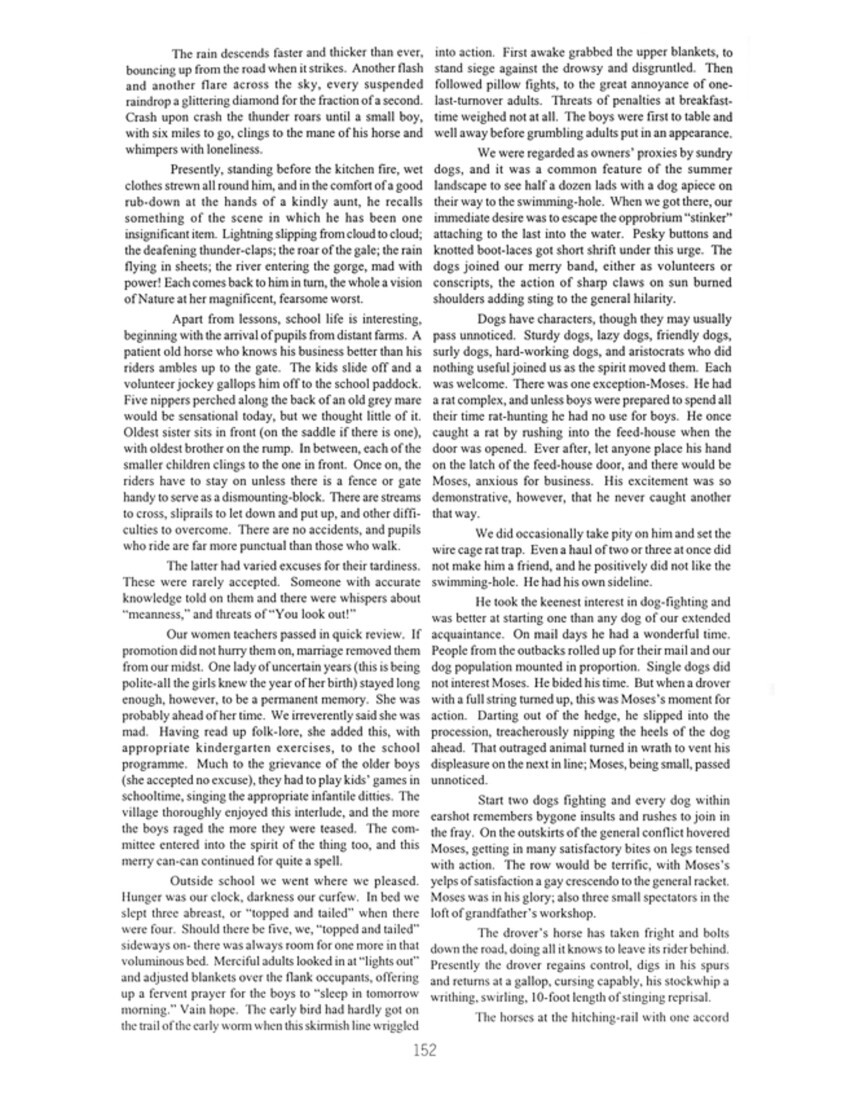
Page 153
snap their bridles and leave for home, while the store doorway is jammed with leggings, oilskins, whiskers and language as irate owners burst forth in pursuit of flying – steeds.
Moses was a great little dog. He never owned a boy. He could have. Three of them, watching the turmoil from the workshop, thought the world of him.
The storekeeper was another eccentric. Where Moses was devoted to his two purposes in life, the storekeeper was devoted to every interest other than storekeeping. This was the last thing in his world that he gave any real attention to. Everything else, for ten miles round, kept him interested and, on most occasions, busier than a one-armed paperhanger.
He was a bachelor, and “fed out” when he could find someone to put up with his irregular habits, and slept in the attic above the shop. This was entered through a trapdoor. A chaff-filled mattress and blankets out of stock made for comfortable sleeping. Every spring he made concession to laundry needs with a general wash. Plenty of hot water, plenty of soap, a galvanised-iron bath, and in went his blankets. With his trousers rolled up, he stepped in on top of them and, by a treading process, washing went ahead. We approved the general idea, and, on a basis of bribery, took over the treading job. It was alleged he sometimes omitted to remove his boots and was rather peeved when an interested customer called attention to it. As this eye-witness had a reputation for “stretching,” the story need only be accepted if the reader wishes.
His crazes were many. One which appealed to the boy population was a passion for fireworks. With his one-track enthusiasm, he dropped routine storekeeping. Customers knocked loud and long for attention and then, in despair, walked behind the counter to help themselves. If unable to find what they wanted, they chased the storekeeper to his lair in the kitchen-dining-room-office-sitting- room behind the shop. As like as not they would be drawn into the business of fireworks-making, to the despair of womenfolk waiting for a couple of pounds of salt, a tin of mustard, or currants and raisins essential to the midday meal.
Fierce debate raged round his decision to blend gunpowder with blasting-powder. Eventually the ayes had it, and a really lively explosive resulted. Reducing blasting-powder to the right size presented difficulties, but enthusiasm rose superior to this obstacle. Trial and error-often surprising in its consequences – proved that grinding in a coffee-mill in water would do it.
After grinding came drying. The sun was sure, but slow; so the open-hearth system was adopted. A dozen soup-plates were withdrawn from stock, spread with the powder paste mixture, and placed within (estimated) drying distance of a good matai fire.
The adjournment was then taken and the hard- worked experimenters left to partake of the dinner which awaited salt, or mustard, or currants, or raisins to round it off. They had hardly settled down when, with a rattle and a roar, a cloud of smoke and sparks shot out of the store chimney across the road. Everybody rushed to the rescue, but they could have saved themselves their hurry. When the smoke cleared away, inspection showed the sum total of the damage was many busted soup-plates and an enlarged fireplace. A spark had touched off the refined blasting-powder; all that work to do over again.
The right mixture of sulphur and charcoal, blasting and gunpowder was eventually found and, with iron filings from the smithy added (as per textbook), the village was summoned to see the outcome. This summons was peremptory, even when awkwardly timed. As each rocket was finished, the itch to see “how she would go” was irresistible. Be it lowering dusk or darkest midnight, our storekeeper rang his bell, counted heads, and, with the populace duly accounted for, touched her off, retreating smartly to watch results. “Retreat” is the right word. There was no knowing what might happen. Should it burst like a bomb or refuse to leave the ground there were sighs of relief from the women spectators. But in the absence of one or other of these faults the problem of direction occasioned apprehension.
But, as the storekeeper went to most of the trouble and shouldered all the expense, it was churlish in the extreme to refuse to attend, or fail to applaud when the odd rocket in ten sailed gracefully skywards.
The school did duty as church, and most everybody within buggy distance rolled up to the services. These alternated thus: first and third Sundays, the Church of England; second Sunday, the Presbyterian faith; fourth Sunday, the Wesleyan parson. What happened in a month of five Sundays is off the record! Nobody was in the least fussy about whose Sunday it was; everyone responded heartily to the prayers and sang lustily, after the song-leader had tapped his tuning-fork and set the pitch for soprano and bass.
Before church there was Sunday school, with the storekeeper in command. He was a Presbyterian of the Covenanter type, but, as he liked bossing Sunday school, he softened prejudice so far as to conform to the doctrines of the other sects. His methods were practical and small boys were encouraged to attend with rewards of lollies out of his stock. These were much appreciated, especially on Presbyterian Sundays, which were reserved for the issue of special confections known as Scotch mixtures. Their variety was wide and all of them were good, though perhaps the best was an item of hard sugar candy surrounding a core of liquid honey. Thus was the mind of youth inclined and Christian faith instilled.
Onga Onga had had its connection with Maori war days. At the Hampden crossing (on the back road) trenches had been dug against Hau Hau raiders. Most times these passed unnoticed, but, in the spring, the difference in the colouring of the turf was easily picked up froma nearby hillside. Another relic of the Maori wars was the clay and straw house of three rooms which stood on a low plateau a mile or so outside the township on the Hampden road. Rumour had it that this served as shelter for the Armed Constabulary of those troubled days. In our time it was occupied by a family of schoolmates and their parents.
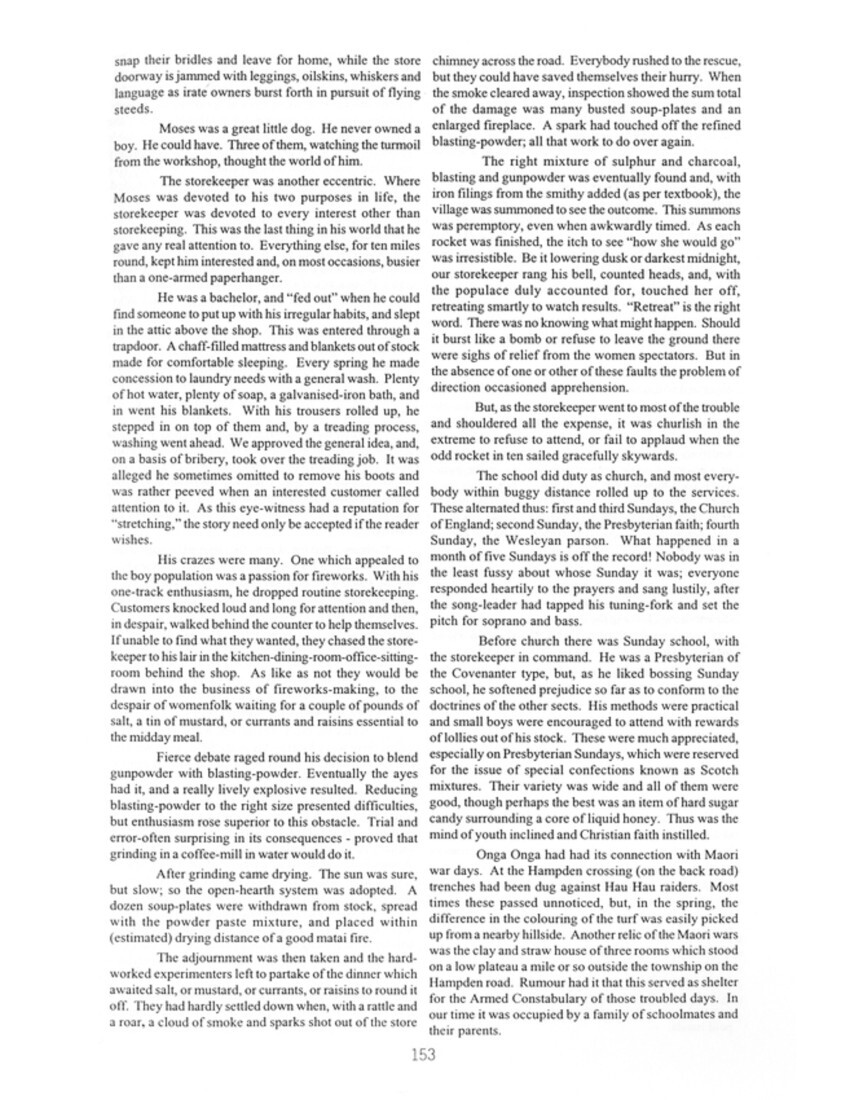
Page 154
It will be noticed the “parents” are put last. With good reason. A more self-effacing couple it would be hard to come across. There was a cliff at the end of their hay paddock crowned with blue gums. At the foot of this cliff was a water-hole which held water in the driest of dry summers. All else failing, into this we scuttled, and out of it we crawled to lie on the hot sand until Red Indians would have welcomed us as blood brothers.
The food problem solved itself. Self-invited, we turned up at the clay house, took our seats at table, and were served as a matter of course out of the stockpot hanging from the hook in the fire place. No matter how many of us, nor how often we came, the open hospitality of that house never failed us.
It had a thatched roof. Indeed, it had several layers of thatched roof. This thatch was an entomologist’s paradise. It harboured the widest variety of bugs, insects and crawling creatures one could hope for in such small space.
Temptations of the table found many of them as eager and willing as the self-invited guests. Hot tea was a certain magnet, but milk and sugar and butter also attracted some. Out of their quarters they tumbled in a most haphazard, reckless way. Imagine a twisting insect, with forty dozen wriggling legs, invading the sugar-basin; or a spider of noble proportions landing on the butter. Well, such things were sent to try us, but didn’t try us much. We were fed and, hurrying back to our swimming- hole, took with us such male youth as could get out of sight before their defection from jobs on hand was noticed.
We were not a dead loss to this easy-going family, however, for we joined wholeheartedly in any harvesting that was in progress. Enthusiastic boys make a wonderful difference during hay-making and grass-seeding. Turning the windrows, loading the dray, spreading and tramping on the stack need enthusiasm to be properly done. Horseplay didn’t matter. Hay is all the better for extra tossing.
Grass-seeding was a different proposition. When the seed was ripe and the sheet spread, out came the flails. It was a wise farmer who saw to it that there was a spare set on hand. Every boy expected to be supplied. If left to their own devices-well, the binding of an improvised flail was never too sure and, the flying end ofa flail landing anywhere on one’s anatomy makes a painful impression. When all was ready, away we went as if the next minute was our last.
When we tired (this did not take long), more skilled hands took over. It was fascinating watching them. No matter how small the sheet, there was always room for another beater. In turn, and to time, the flails circled overhead, to come down whop, whop, whop on the appointed spot. Each man struck the same area as the leader as they circled slowly round the sheet. Then the hay was tossed and round they went again until, the seedheads properly beaten out, the straw was thrown aside and the seed sieved into a sack. No power on earth could keep schoolboy holiday-makers away from such activity, and, if they did drink more than their share of oatmeal-water, they perspired as volunteers and not as paid hands.
Onga held its race meeting on New Year’s Day. A totalisator meeting it was, too. In its small way it was like The Downs on Derby Day. There was every sort of scheme for coaxing money out of sportsmen’s pockets, Quoits- “one more wanted for a ten-bob pool”; the gentlemen with the American cloth covering a trestle table who defied the world to throw a ring so as to completely encircle a number which would enrich the world by five hundred percent. The world never quite succeeded, though many tried hard enough.
The man with the three thimbles and the pea — ”Come on, ladies, and gentlemen! It’s easy! Here’s the pea. I move the thimbles, so, and-which one is it under, jack? Your name’s Harry? A good name, too. The boy’s right! There it is and all! It’s easy. Gents! You saw the boy do it! Take a whirl at it! Under that one, son? Why, so itis! You’re too smart for me. Here’s sixpence. Get yourself some lemonade. Now, gents, an even quid you can’t do what the boy did! Will I let the boy pick for you? Of course I will! Here’s my quid! Cover it, mate! Here’s the little pea! The quickness of the hand deceives the eye! Which one is it under, Jack? Harry? Why, the boy’s wrong this time!”
Then there was the toy-stall, mostly popguns and dolls, and the wizard who made candy floss while you watched. Three penn’ orth filled a large paper cone and lasted only a minute. There was the publican’s booth and the sandwich-and-pie stall. All lively centres of interest, but nothing could quite equal the charm of the totalisator.
It provided for twenty-four starters, though a six- horse field was a big one with us. The proprietor stood behind a rail, with a satchel dripping with notes slung in front ofhim. As the investor made his bet, the appropriate handle was turned, a bell tinkled, the number moved ona notch, and so did the grand total. If there was enough business, the race could be half over before the proprietor remembered to close down. Base persons alleged he was in league with the bookmakers who did open business at such times, but he staunchly denied such collusion. Were they not taking away his business?
As for the races themselves, we paid small heed unless there was a local neddy in the field. Then we were keenly partisan and cheered loudly if our colours came in first.
Race day was a great day for the whole countryside. People in their best (their best not very grand) arrived by horse, by buggy, by sulky, by dogcart, by express-load, with the humble dray doing a turn, too. Womenfolk compared children. “Hasn’t he grown!” “She’s just a little dear!” and so on and so forth. Men, as became the sterner sex, drifted over to the bar, reasonably indignant over the fall in the price of dry ewes, or expecting spuds to fetch a better price this year. All oil holiday bent; boiling the billy; picnicking in the hot sun, or under the trees. A day of bliss, with plenty of spending- money from generous winners.
Next day, a dozen kids returned to the scene to give the grounds a thorough “once-over” in the hope of
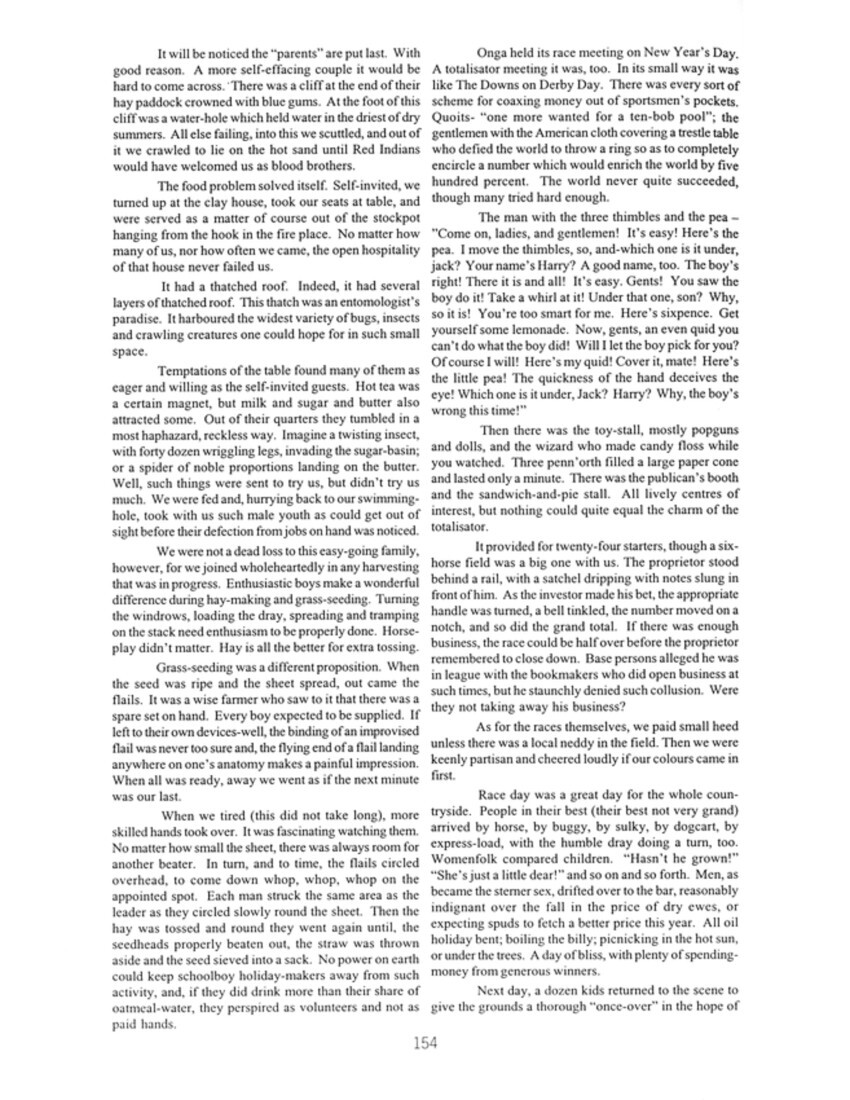
Page 155
raisin stray coins and clearing up such trifles as unfinished bottles of lemonade, and thrashing the well-thrashed theme of the difference made by our jockey losing his- stirrup as he came into the straight. “She should have romped in if-if-if—” Oh, those ifs!
Who amongst you has seen, read or heard of the “Penny Dreadful”? Onga loved it-more especially as it was banned. “Filling the boys’ heads with a lot of rubbish.” We swapped them and smuggled them into bed with us, to read them until the candle guttered out. “Deadwood Dick,” “Buffalo Bill,” “Calamity Jane,” “Faro Nell.” had their adventures for thirty-two pages, finishing with bandits in full retreat and virtue scraping home to its just reward in the very last paragraph. We were held breathless and excited by hold-ups, robberies, lynchings and near-lynchings and such like he-man adventures. It never occurred to us that the end of the story was determined by the exigencies of the printing craft, the presses being set to print thirty-two pages of that size at once. Thirty-two such pages for a penny was not bad measure, anyway.
Parents complained bitterly, and their pleas for something better were answered by the R.T.S. people. They tried us first with “The Pansy Series.” These failing, as too “goody-goody,” they switched to The Boy’s Own Paper. This was something like. Published once a week, it was bound into quarterly parts for overseas readers. The serials broke off in the most intriguing places and the waits between quarterlies were almost beyond bearing. Lucky the boy who spotted the new issue ahead of his brothers. His was first read, by right of possession. Objections to breathing over shoulders and turnings of corners of the pages ahead by faster readers ended with:
“I’ll take that book while you boys get on with your homework!”
Strangely, that B.O.P. disappeared for days until adult readers had brought themselves up-to-date. Chapter Five: Napier
Chapter Five: Napier
WE HAD migrated to Makotuku from Napier – it was our birth-town. The failure of the Glasgow Bank had had reactions which set us adrift, but exactly how or why was beyond our knowledge. Napier had watched us go (or did it?) without protest. It noted our return without raising an eyebrow. All the excitement was on our side. After seven years of inland life, the sea drew like a magnet, especially as there was an on-shore gale. Every free moment was spent on the Parade, watching huge rollers assault the gravel beach. While the tide was out this was interesting enough, but when it turned interest increased. The waves thundered and roared nearer and nearer to the sea-wall. We speculated where they would stop. They were sweeping up the step openings and ripping the footpath when we left for dinner. An hour later the tide was still “making,” and the gale so stiff one could lean against it. Furious rain-squalls swept across the bay, shutting out the Kidnappers and most of the bay itself. The path was constantly washed with sea-water, and an occasional outsize roller, scorning step openings, hurled itself over the wall and chased us (shrieking with dismay if we started too late) down into Hastings Street. An exciting day, a day “out on its own,” closed with much scolding over the plight of clothes and headshaking about possible colds.
Next day was a duplicate of the first; the storm, if anything, more furious than ever. As an added interest, we saw the Rotomahana battle her way out to sea, the captain having decided in favour of ample sea room as against a lee shore.
Another day, with the gale going down and the sea flattening out, saw the Rotomahana back in the bay and a party of boys trudging the road to the “Iron Pot.” to board the tender Ahuriri, which would take them out to open roadstead and the big steamer. In due course we were manoeuvred alongside, to be landed on the deck and hustled below, without ceremony, as the best way of disposing of us.
The Rotomahana made good use of the hours of darkness, and early next morning was giving us our first look at Poverty Bay. To our right, or, being at sea, on our starboard side (the tail end of the gale was still brisk), were the grey cliffs of Young Nick’s Head, Captain Cook’s landfall. They seemed to rise straight out of the sea, and, though smaller, were like the cliffs of Kidnappers in the bay we had left behind. On our left-beg pardon, on our port side-the Kaiti hill guarded a rocky coastline which ended in a tiny island Tuahine Point. Astern was a half- moon beach of yellow sands.
In the centre the breakwater hid the entrance to the river on whose banks the town rested. Presently, from under its protecting corner, shot the tiniest of steamers, the Snark, which steamed steadily towards us. It was so small w sometimes lost sight of it in the trough of the waves. We wondered what its business could be until we found, to our amazement, that, if we wanted to go ashore, this was our means of doing so.
We watched her roll and pitch, to be presently held in position at a respectful distance, for the Rotomahana was doing some rolling on her own account. A contraption called a chair was rigged (it looked a maze of ropes), and shore-bound adventurers were, one at a time, deftly seated in it. At the right moment the winch hoisted the aloft and, again at the right moment, steamer an tender being both steady, let them down with a run, to be grabbed by expert hands and release before the chair swung aloft again.
This breath-taking experience was hardly over when it was forgotten in the miseries of seasickness brought on by the hot engine smell of the tiny cabin into which we were thrust.
Hours later (so it seemed) we cast off and, sliding down the backs of in-rolling waves, made for the breakwater. It looked for all the world as though we were to be wrecked on its outermost corner, but, again at the right moment, a dexterous turn of the tiller took us clear of this danger, to ride a smaller wave over the bar into the river.
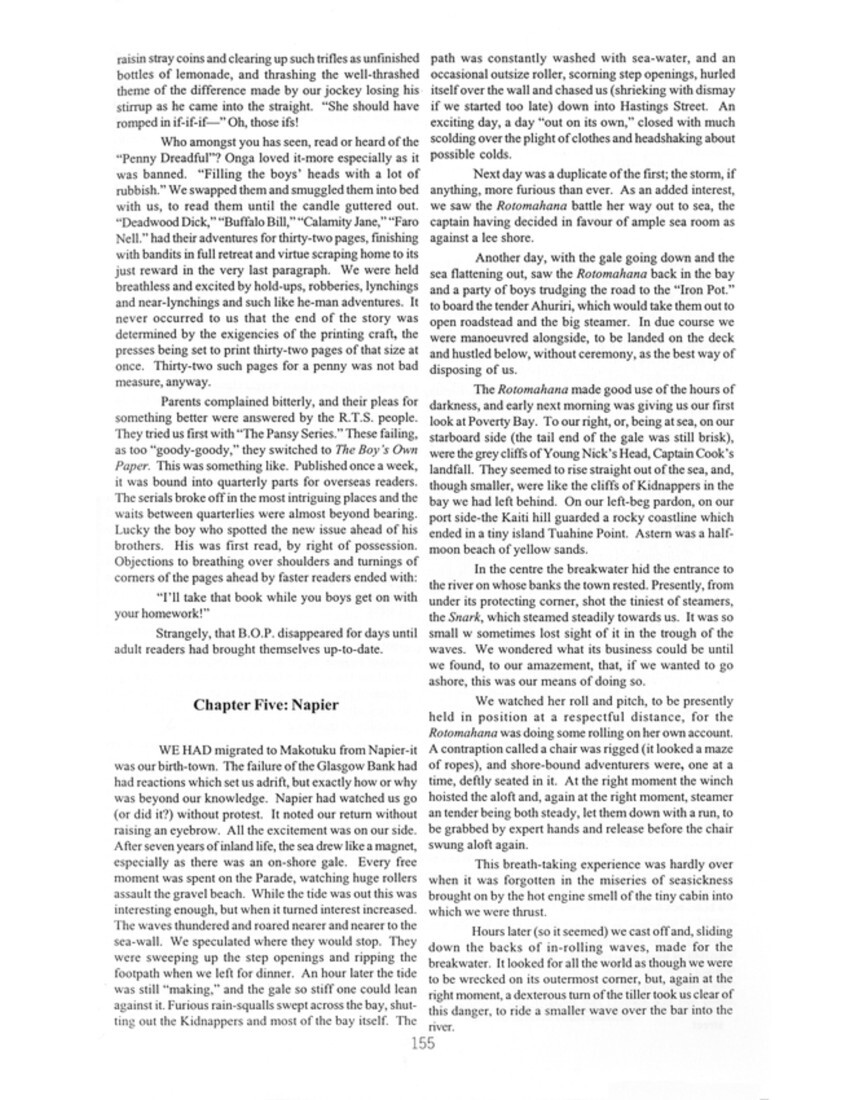
Page 156
Presently the landing-wharf came into sight, carrying a reception committee of curious citizens. Said one of our fellow passengers:
“Half the town has come to look us over.”
“Half the town! Gosh! This must be a big place if only half the town is here!”
We had arrived at-
Chapter Six: GISBORNE
AS THE port of entry, storehouse and rendezvous for a wonderfully productive district, Gisborne, in the ‘nineties, was a boom-and-bust town, if ever New Zealand had one. It spent every copper it could beg, borrow, or steal, on speculations of one sort or another. It promoted companies to get oil from the Ngatapa hills, greatly to the advantage of the promoters. It juggled with “preference” and “promoters” and “guaranteed” shares to the point where it was impossible to decide whether an approaching citizen was stone motherless broke or a near-millionaire. When the funds were exhausted (“promotion” costs quite a lot), the oil company was left with much miscellaneous machinery on its hands, and a derrick in the hinterland of no use to anybody.
This did not stop Gisborne speculating. No gold was found in the district, but chunks of it were being dug up in Thames. Mining promoters descended upon us, and oilfield promoters handed over considerable loose cash. Well-thumbed paragraphs from the mining column of Auckland papers were read optimistically, while quartz specimens of undoubted “colour” were dug out of vest pockets and passed from hand to hand.
“I shouldn’t show you that, but you’re a friend of mine. It’s out of the Wild Cat Reef… The shares are low today. Get in!”
Such confidences, combined with assay reports written on letterheads as brilliant as the printer’s art could make them, set Gisborne agog and made the business of tracing share transfers one of great difficulty.
When “The Thames” fly petered out as a share- selling proposition, interest shifted to Otago and the weekly tally of gold from the Molyneux dredges had a corner of its own in the daily paper. Indeed, this news rivalled racing results in interest. And Gisborne supported two racing clubs.
Behind this froth more solid controversy raged, pro and con, over inner harbour improvement. When pro won, someone, for a fee, went off somewhere and floated a loan and country ratepayers took their financial belts in a hole, pending receipt of the next rate demand.
The loan raised and the contract let, the town settled down to a boom in trading, and commercial buildings moved two paces to the west, along Gladstone Road.
The loan money exhausted, the boom collapsed and empty shops again marred the splendour of the main street.
Presently, cautiously, timidly, diffidently, Mr. Pro raised his voice again and urged, with undimmed optimism, the need for sixteen or twenty feet of water at the town wharf and in the channel out to sea. Practical evidence, if such be needed that hope does spring eternal in the human breast.
There followed a terrific war of words in street and mart and newspaper column. Traders (in the name of progress) quite willing to try again; settlers (anxious to let sleeping dogs lie) professing themselves content to pay high lightering charges for the rest of their days rather than send good money after bad.
But Old Man Ribber. He don’t say nothin’; he must know somethin’; he just keep rollin’ along. Filling up the holes gouged out of his bed, disdainful alike of extensions to breakwater and groyne and depth of water on the bar.
Fortunately, neither optimism nor despair concerned those hundreds of hard-working men and women, who did the town’s work, reared families numerous enough to fill the school’s eight classrooms, and leavened trade with their weekly earnings. This rearing of families was not easy. There was work in plenty, but the amenities needed in a closely settled area were absent. There was no water supply, and therefore no drainage. Diphtheria and scarlet fever were common, while a dozen typhoid cases were accepted as normal in late summer. As there were few wells, residents depended on rain-water stored in tanks. With dry spells running into weeks, rigid economy had to be observed, schoolboys getting away with “a lick and a promise” without reproof. Should a house be endowed with two tanks, then water was borrowed by “one-tankers,” the carrying being the wearisome chore of the boy fool enough not to keep out of sight.
Gladstone Road lay ankle-deep in dust, and satisfactory clouds were raised by boys who aped the ways of railway engines. In reverse, this dust turned to liquid mud in winter, which, being scraped to the edges, distressed incautious people trying short cuts. Side roads looked after themselves unless they could boast a councillor in residence.
But what cared the youngsters? There were rivers to swim in, surf to float over, and sands to; race on. Christmas and Easter tents were unfolded on the Upper Waimata. Given a flat-bottomed boat for transport, a good time was had by all. If, in settling the age-old problem of “whose turn is it to go?” “I went yesterday,” the laying- in of stores was irregular, what matter? Mullet and an occasional kawhai could be caught at high tide. Fresh out of the water and straight into the frying pan no finer meal could be served. Should there happen to be an orchard on the opposite bank, as, strange to say, there usually was, fruit in season figured on the menu too.
At the head of the Turanganui, Nelson Brothers had established their freezing-works when this industry was in swaddling-clothes. No doubt “trial and error” had had a major influence on its architecture. Certainly a more miscellaneous aggregation of buildings would be hard to
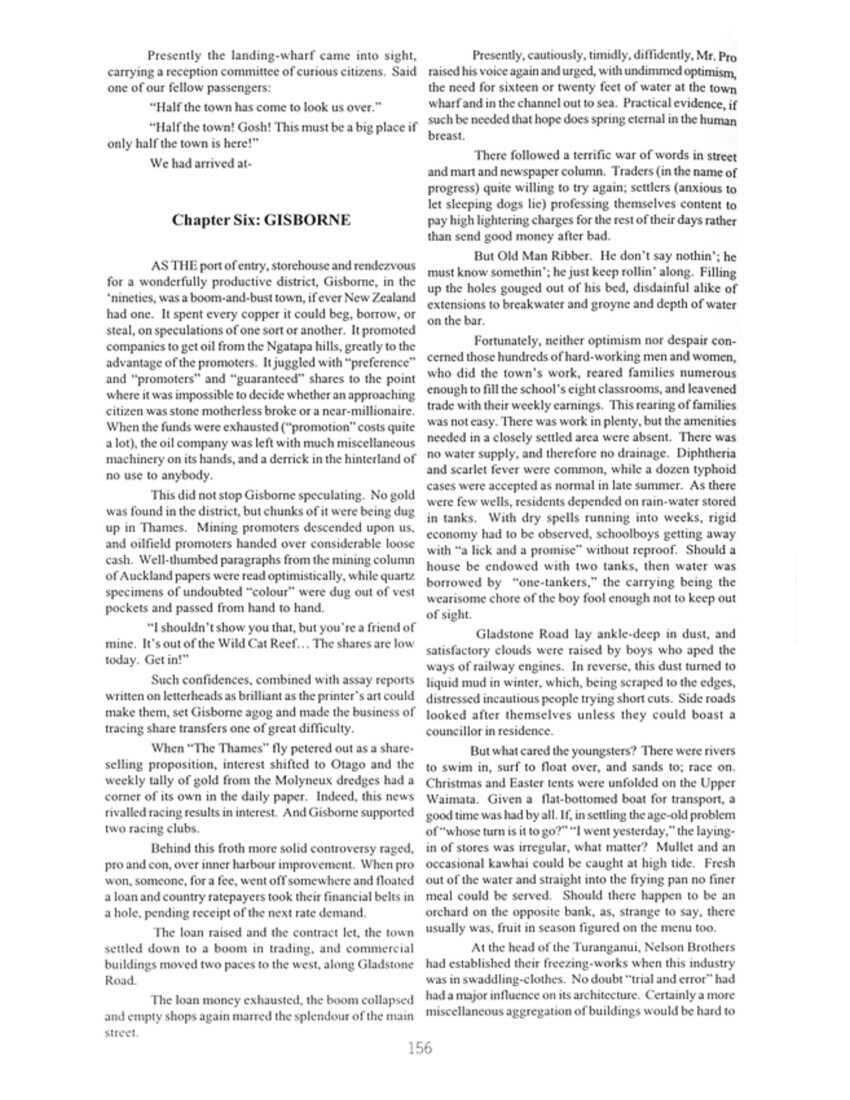
Page 157
imagine. To a stranger the effect was that of a lot of lean- to’s propping up the main building. For many years this pioneering firm had this enterprise to itself. When a frozen-meat steamer dropped anchor in the Bay, the tug Tuna would churn its way downstream with a string of barges in tow, to the joy of small swimmers who liked the waves it caused.
Three bridges spanned the river between the works and the Bay. A movable section in each provided for tug and schooner traffic. But the Tuna scorned these conveniences. The funnel was hinged and, at the right moment, the deck-hands swung it back until the bridge was cleared. At such moments the engineer-fireman was generous with fuel, and nasty words reflecting on his parentage passed through the engine-room skylight.
We did, on one occasion, see two of the bridges “swing,” a schooner-rigged trading scow having goods to discharge at an up-river wharf. Foreknowledge of this event reaching the school, the day’s detention squad was multiplied tenfold, as authority’s reprisal.
The town straggled countrywards. Roebuck Road (a mile from the Post Office) bein reckoned suburban. Aberdeen Road, which square off from the north end of Roebuck, was definitely country. The houses there were not cheek by jowl, or familiar in matters of domestic lendings as in the town, but select and apart and on visiting terms only on first Tuesdays or third Wednesdays, as the case might be.
In this wasteland of unsold sections, broom and gorse and tea-tree held sway; a happy hunting-ground for disciples of Deerfoot the Shawnee and Chingachgook the Mohican. No safer retreat was available to a boy needed to chop some wood or to fetch some water. Stalking one another in emulation of our Red Indian heroes, we seldom remembered that, nearby, lived men who had stalked and been stalked in deadly earnest. The Old Men’s Home, consisting of half-a-dozen cottages, stood there. It sheltered veterans of the Maori and other wars.
One old chap was reputed to have been unhorsed in the Charge of the Light Brigade. He never confirmed this claim, but, as he had a sabre-scar reaching from shoulder to hip, we reckoned it was true. Another said he had watched Te Kooti land on the coast on his return from the Chathams and helped chase that warrior into the Urewera after the Waerenga-a-hika massacre. Adults had no patience with his vivid stories; so youth, too, showed him scant respect.
But if this constabulary man was sniffed at Te Kooti himself was respected. Although his raid had occurred years before, and he had been granted a full pardon, in the meantime, rumour of his presence in the ranges, or of his coming down the coast, gave imaginative youngsters fear some tremors if sent messages after dark. Happily our Gordon setter deemed it a privilege to accompany us at all times. With him on leash, we felt delightfully reckless.
Not that Gisborne was defenceless. Far from it. Our Hussars swanked it on parade and in training camp in most convincing style. Their uniforms were gorgeous, being copied in detail from those of one of England’s smartest regiments. In full dress, with busby aloft and carrying heavy swords, they were a sight to make the gods rejoice. Boys and girls thought a lot of them; but not the defence authorities. An inspecting colonel stopped off at Gisborne during their annual exercises, put them through their paces, and, after telling them what he thought of them-this was quite a lot, and all of it unpleasant-pulled a paper from his pocket, read it through in a voice to make the earth tremble, and told them they were disbanded.
Gisborne answered back, as only a lonely, injured town could, and telegraphed and petitioned higher authority, but without avail. Much to the disappointment of the schoolboy population (who visualised themselves as some day swaggering it in those resplendent uniforms), neither argument nor petition disturbed the Defence Minister. The Gisborne Hussars became a memory.
Some time later a Maori hui was held at Te Arai, ten miles out of town. It lasted many weeks. To help proceedings it had a band. This band was gorgeously arrayed in what looked like Gisbome’s Hussar uniforms. It is possible that they were.
Let us return to Roebuck Road and its no-man’s land. There were lots of unusual happenings in its well- screened recesses. Physical combats and other trials of strength, both spontaneous and stage-managed, were brought off here and gave those familiar with its by-paths lively satisfaction. Pitch-and-toss, New Zealand’s brand of “two-up,” had regular devotees. But cock-fighting was the most exciting, if the noise of the spectators was a guide. I had no other, because males of tender years were kept at a distance.
Saturdays were given over to beach picnics, to excursions over the Whantaupoko hills, or to canoeing on the rivers. Of these there were two the Turanganui, the wider of the two, and the Waimata. The first was more estuary than river. At high tide no nobler inland water could be asked for. At low tide the streams narrowed to less than fifty feet, flanked with ugly mud-flats. Foul mud it was, too, as we found to our cost when retrieving caps and other possessions flung on it by bullying mates. The Waimata had deep waters, and its steeper mudbanks were a great joy to swimmers. Face down, they slid “splosh” into the cool waters below. Once started, nothing could stay the slide. Did a cockle-shell edge upwards obtrude- well, it had to be put up with a cheerfully as might be.
Rob Roy canoes were in high favour, and boy owners drove some hard bargains. Despite their tiny size, the canoeists ventured over the bar an out into the Bay. We all wanted to be able to say that we had made this voyage. From the end of the breakwater out to the outermost buoy (the red one) was the standard laid down, but, ifa steamer lay at anchor, paddling round her was an additional triumph. Should the mariner tie up to and board one of the wool ships-well, he was in the same class as Christopher Columbus an Vasco da Gama. Capsizes were not unusual, but, beyond wet clothes and lost boots, there were no serious consequences.
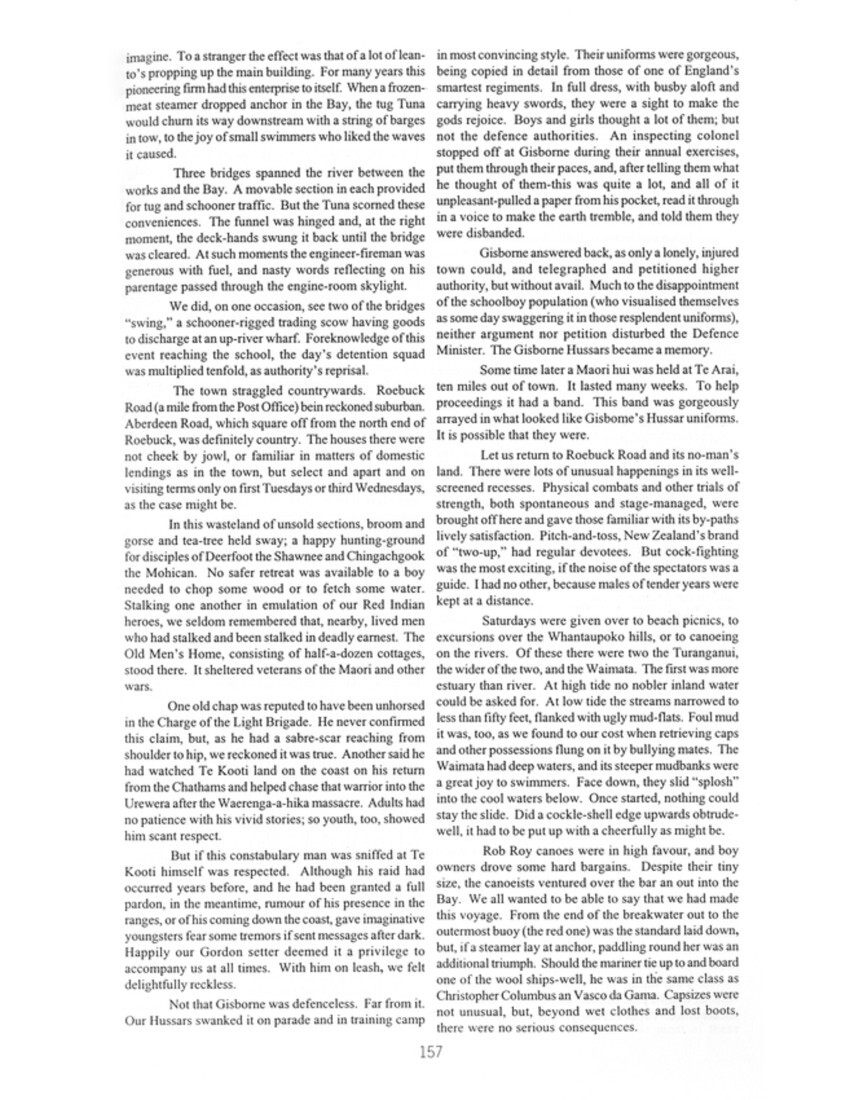
Page 158
For out-of-school-hours entertainment we depended on ourselves, our house or someone else’s being thrown open one evening each week. Bands of Hope were popular sidelines with all the churches, and, as each respected the other’s dates, this helped a lot. The instruction hammered home the horrors of drink and the difficulty of refusing the second glass after the first had been taken. Youngsters were pressed to sing or recite, but most of the items were given by adults. There were good voices, too, which would never have been heard but for this opportunity.
One gentleman in particular favoured us a lot. He took the pledge about once a month, kept it for a couple of weeks and sang to us on request. The third week he slipped a bit and sang to us whether he was asked to or not. He was the whole programme. Good and all as he was, this was too much. Pea-shooters and pearl barley were brought into action, with his mouth as target. His downfall was sure.
Temperance lecturers came and went. They hired the town theatre, and the Blue Ribbon Army took the stage behind them. One notable visitor was an elocutionist who (so it was said) recited his lectures. He chucked in Hamlet’s soliloquy and bits of Tennyson; so we were allowed to go, for the uplift. His hair was lank and long and black. He had a sallow complexion (the girls called it “olive”), and when with vigorous gesture he swept his hand through his locks the phalanx of lady supporters went into raptures. When he called for men brave enough to outface ridicule, from their fellows, to accept the blue ribbon of defiance to alcohol and all its lures, every engaged young man stepped forward. This was the only way to secure peace in the nightly courting and so out-distance rivals.
Missioners and evangelists looked in, too. They had good audiences. Their stock-in-trade was emotionalism. Those converted at the beginning of the meeting sat beside the unyielding during the prolonged prayers, steadily suggesting the need to be saved. Why, boys who could swear like troopers and did not hesitate to steal marble gave in like anything!
At the end of a week or so, twenty or thirty converts were hard at it. At the point where citizens were greeted with “Praise the Lord; are you saved, brother?” by neighbours of shocking ways, the town cooled off and the mission was left to enthusiasts.
This sort of thing kept us entertained, but was not in the same street as a touring company. One such happened our way when the town’s fortune were low. It failed to earn enough to pay the theatre rent, or the hotelkeeper or the carrier, the pianist, and it seemed likely to owe them still more if it didn’t get away by the next boat. Most of the townsfolk accepted the situation philosophically, but not so the people set out above. They were very spirited in their efforts to help these lame stage- folk over their stiles.
The theatre proprietor came down hard for a special benefit performance with himself seated at the ticket office. The actors thought this a good idea, but not so their other creditors. They thought it would be better to sell tickets from door to door. Being a working majority, they had their own way and, as a committee of ways and means, they put the town council to shame. Their canvass reached the portals of the school. Result a gallery ticket to “Conn the Shaughran,” our first real-to-goodness play, It was the best show ever. The choice bits were bandied about for many a long day. “Oh, Conn! Why did ye die?”; the keening cries; the wagging feet; the sly nips at the bottle of potheen; the indignation (very lively with us) over the villain’s plot to inveigle the heroine into a runaway adventure (how we trembled when she agreed); Conn’s uncanny knowledge of all that was in the wind; his successful interferences; well-weeks of rehashing (all the boys wanted to be Conn) never cooled our enthusiasm. Months later, the cry, “Why did ye die?” would conjure forth a keening yell which told of gallery tickets well used.
There was some talk (not to say scandal) over the adjustment of the accounts, but sufficient was set aside for steamer passage money to be met. The carrier’s son assured us, in confidence, “The old man did all right,” while the publican’s four year-old sported a new tricycle in the sight of the envious. However, the players got away, leaving Conn a ripple on the pool of school life.
At this school we, for the first time, experienced a dividing line between classes. Perhaps the luxury of one class one teacher, one teacher one room, had something to do with this. Brothers in higher classes hardly recognised younger brethren, and an air of authority was adopted in the backyard if juniors lowered their guard for a moment.
When the senior crossed the road to the High School the barrier was between scholars and school kids. Challenges and jibes flung through the palings, even if pointed and painfully personal, were ignored. Buta little patronising notice might be taken of the junior when he had an odd sixpence to spend. If he could be persuaded to visit a certain orchardist, all the better. This man hada weaknesses love of Euclid. A lower-school sixpence went as far with him as an upper, if properly handled. Possessed of that sum, a small boy would be persuaded to play up to this enthusiast’s weakness. How the dickens do you cross the Ass’s Bridge? Over goes the barrow. A dusty path is smoothed off. With a twig the proposition is duly set out. As soon as the pair are intimately engrossed, the conspirators put in their appearance. Their request for sixpenny worth of figs, or peaches, or apples, or plums, receives scant attention. This is the moment for the puzzled student to become obtuse-obtuse to the point where an anxious instructor dismisses importunate customers to serve themselves. An excellent sixpennyworth is eaten by all, the actual purchase being handed over to the student as compensation for his self- denial. It was his six pence, anyway.
The stranding of the Moa was badly timed; so early that all good schoolboys were asleep. She came into the Bay with a wild southerly on her tail and, against all precedent, tried to clear the bar at low tide, hoping the waves in the river would lift her over. They wouldn’t.
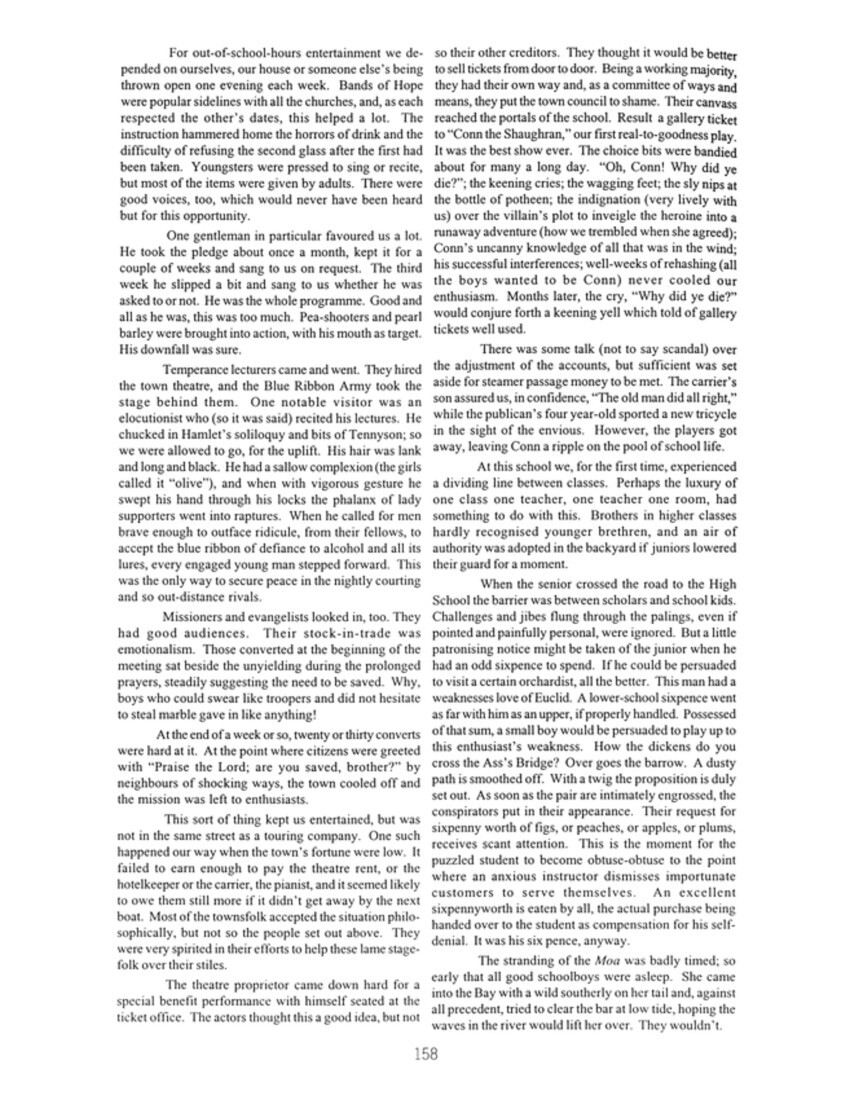
Page 159
This was an event out of scale with the normal, but our master treated it with extraordinary indifference. The headmaster came to the rescue. He was a whale for weekend compositions, and granted an hour’s release, clouding this generosity with his usual imposition to balance the loss of school time.
We got away at ten o’clock and returned at three, the little matter of four unauthorised hours not weighing too heavily. The southerly had hardened during the day and, the deck cargo of timber getting loose, we got busy hauling piece after piece above high-tide mark. The call to all hands to heave on some salvage-line found us strung out to the surf’s edge. We must all be in everything, and no one thought of letting go, even when the cry, “Hold tight, all!” told of an outsize roller sweeping in on the rescue gang.
The hours sped by. We couldn’t return to school while the excitement lasted. Eventually consciences played their part. Wet through with rain and spray, the advance guard, a little apprehensive, yet full of pride in well-doing, presented itself with an explanation that explained nothing. Six stinging cuts on each cold hand was the master’s answer. The main body rolled in ten minutes later, but the edge of the master’s wrath was turned. A bare two cuts apiece. Schoolmasters should be just. His name was mud. But, anyhow, what fools we were not to have kept with the main body! Unity means strength.
But we had a real wreck. The Spray, a topsail schooner, entered the Bay with all sails set. A shift of wind made the beach a dead lee-shore. The Spray tried to beat her way out, but each tack brought her nearer the breakers. There was some difficulty in shortening sail, schooners of the ‘nineties being manned for fine-weather trips, so the anchor could not be dropped.
The school gathered on the sandhills and waited with bated breath for the moment when she would touch. This she eventually did, but without any fuss. We could only tell by the waves sweeping over her as she lay broadside to the rollers.
There was a great to-do. A volunteer to take a lifeline presented himself. Smeared with oils, he entered the waves and struck out, his head appearing on the crest of rollers, or disappearing as he dived through them when they curled over. Ten minutes (we all claimed it seemed like thirty) and he reached the Spray. To our confusion he stood up, handed his precious lifeline to the mate, turned and waded ashore. In between the breakers the depth was only some four feet. We might have thought of this, for the Spray drew very little more. The crew clewed up the sails and presently waded ashore too.
Next day: “Which of you boys saw the Spray come ashore yesterday?” Half the class signalled. “I expect a two-hundred-line essay from you on Monday about what you saw.” Darn it! Rank injustice. We witnessed the event in our own time!
We forgave him. He had one redeeming bad habit- a passion for golf. His enthusiasm got him out of our bad books on many an occasion. He was steadily reducing his handicap and “stop in after school” meant nothing to us. At 3.30 p.m. (closing time) he shouldered his clubs and left. A minute later the detention squad followed suit. He never looked behind. He had the rudiments of a gentleman in him even though he was a schoolmaster.
The school had a reputation for success at examinations. The big test of the year was “the Scholarship,” open to Standards VI throughout the Education Board’s district-East Cape to Woodville. Year after year Gisborne topped the list. This was a source of great satisfaction to the town and particularly to the teachers. Their reputations were enhanced and the committee’s recommendation for a better job had so much extra pull.
The secret behind this yearly success was “forced feeding.” The Standards Examinations came off in August, while the Scholarship test (two days) was held in December. The candidates sitting for this higher examination we heroes (or heroines) in the intervening week. They worked when all the rest were free, an reports of preliminary try-outs in this or that subject were freely discussed.
When the two days’ written papers were handed in and the heroes appeared once more in the playground, they were pointed out as of a race apart. This continued until the results were published in the Herald. Those who topped the list (ahead of rival schools) were congratulated enthusiastically; those who won their scholarship but allowed a boy from another school to gain higher marks were made to feel they had let the school down a bit; while those who, failed to win a scholarship Just made their way out into the workaday world and no more to-do about it.
The choice of careers was limited. The banks between them took on one junior a year. There were no large insurance offices; only agents. The legal profession was mostly a father-and-son arrangement. Apprentices were two a penny and that was about the wage paid, too.
The school curriculum took small note of the more obvious openings. General labouring and farm work, with a spell at the freezing-works in the season, required no scholarship. Neither did shearing, mustering and shepherding on the surrounding sheep stations. These vacancies were filled on happy-go-lucky principles; so the boy was lucky whose father was able to give him a start with definite prospects. He was “lucky” in another sense if he was placed on a sheep-run except as a roustabout. There was competition from overseas; many run-holders had cadets, whose people paid premiums for them to learn this business. If this premium was paid on the instalment plan, such youths were kept busy as cheap labourers until their parents got tired. Should it be paid in a lump sum, then the cadet stayed on until his employer could locate another premium. A suitable excuse (or no excuse at all) was found for sending the youth about his business. It would never do for the next new chum to compare notes with him. The discharged cadet competed in the unskilled labour market until the opportunity offered to stow away on one of the four or five wool ships lying in the roadstead. Short-handed as most of these
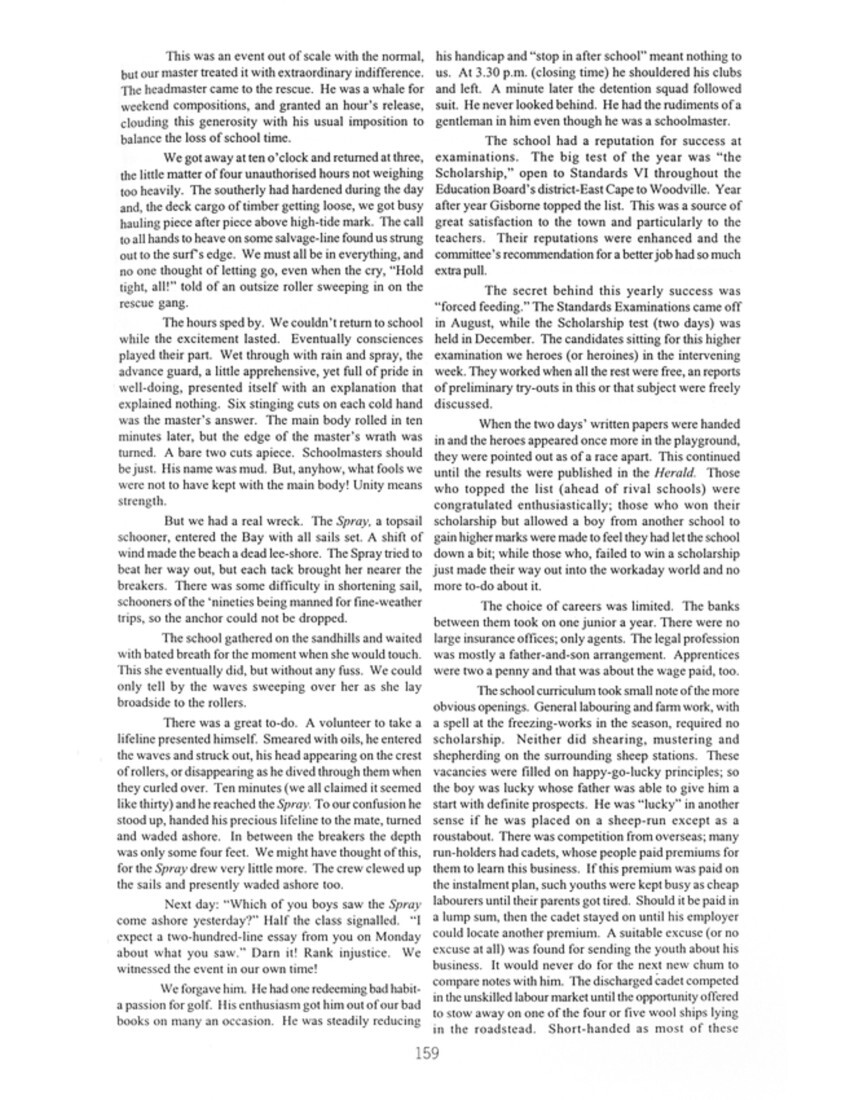
Page 160
windjammers were, a husky youth, at a shilling a month, was more than welcome.
Some of these cadets got their own back, to the delight of the townsfolk. One particularly unscrupulous employer of this cheap labour had an “instalment” boy on his hands for an unusually long spell. If there was an awkward way to do a job, this boy chose it. (Possibly it was his way of getting even.) The pair were busy setting a new strainer. The boss was at the bottom of the hole, easing it into position while the cadet steadied the post as it slid over the edge. The boy was small and the post got away, finishing its downward journey at lightning speed, and taking a swipe at the boss’s shin before it finished up on his foot. When the moans and curses had subsided somewhat, our cadet looked down the hole and, in a voice quivering with anxiety, asked:
“Did I hurt you, Sir?”
Complete silence, tense with emotion for a full minute, then this crescendo of feeling:
“Did you hurt me?
“Did you hurt me?
“DID YOU HURT ME?
“SIR!!!”
This story got on the move, as such stories will, and with embellishments to suit almost any occasion,’ greeted the wounded run-holder wherever he went. So, instalment due, overdue, or not due, that boy got his walking ticket.
Local apprenticeships were in demand. They gave some certainty of employment. The wages were poor; boys in their fourth year could not keep themselves.
But if the boys had a tough spin, girls were even worse off. The boys did get a few shillings a week from the start. The girls got nothing, being “on trial” for some months. Then they received half-a-crown per week, rising by multiples of that coin until, at the end of two years, they might be receiving as much as seven and sixpence. It was a bold girl who asked for a further rise. She was mostly refused. (“Times are too bad just now.”) But if it was granted, she was more than likely to get a week’s notice – with the first payment. Girl labour was plentiful.
For myself, my luck was in. The government instituted its policy of cheap telegrams-twelve words for sixpence-and an additional telegraph messenger was put on to cope with the expected increase in business. I got the job at the (then) unheard of commencing salary of ten-bob-a-week, paid monthly.
So ended my school days.
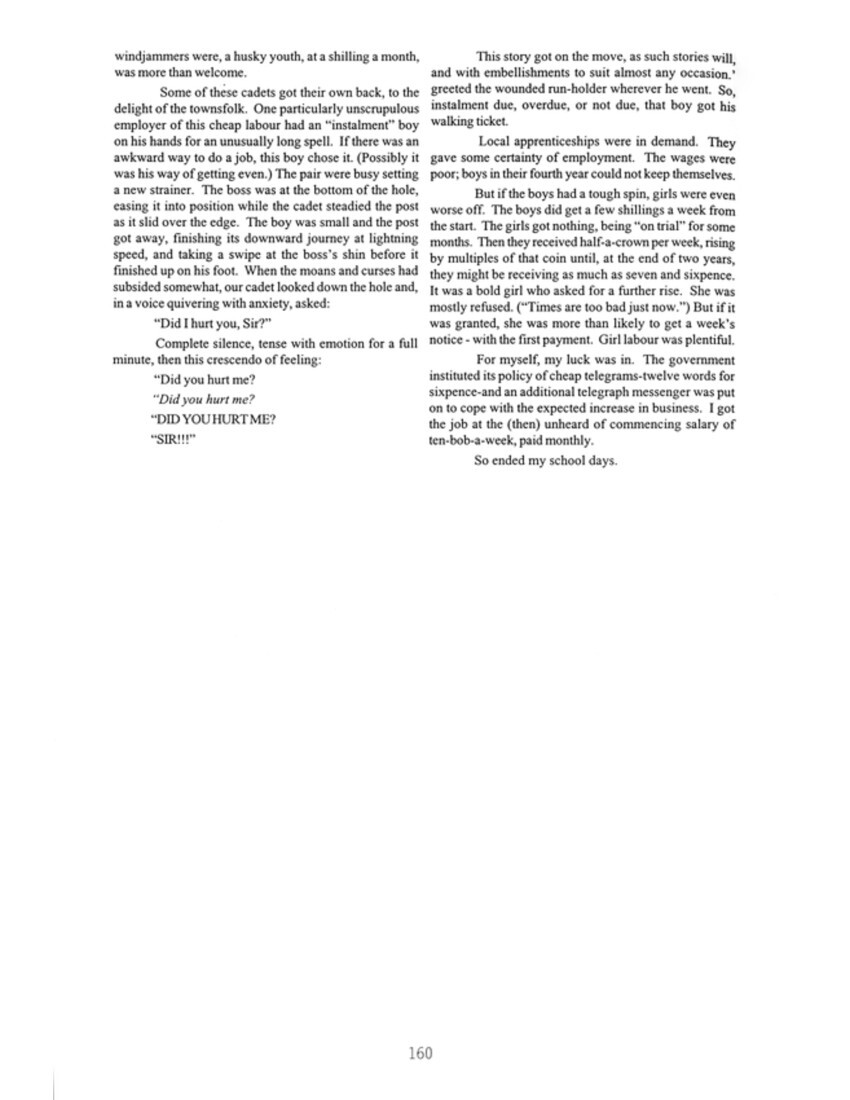
Page 161
COLES, Clara Jane
m to QUIGLEY, William James
Herbert Sydney McGowan
= (1) HERBERT, Adeline Winifred
QUIGLEY, Alma Elaine
= KITT, John Herman
QUIGLEY, Jack Herbert
= MARR, Eileen Margaret Bella
= (2) HAYWARD, Muriel Rose
QUIGLEY, Richard John Hayward
Ada Mary
= COMBS, Willis Ide
Cynthia Elaine =BARKER, George
William Edward
= KENDERDINE, Brenda Mary
QUIGLEY. Margaret
= MILNE, Mitchell Rober
QUIGLEY, John Kenderdine
= ROBINSON, Pamela Mary
Freda Clara
Irvine James
= BRUTON, Lillias Hamilton
QUIGLEY, Noela Elizabeth (Betty)
= THOMPSON, Claude Goodwin
QUIGLEY, Ngaire Lillias
= SPENCER, David Charles
QUIGLEY, Wilfred Irvine
= BALL, Patricia Mary
QUIGLEY, Vivienne Enid
Frank Martin
= BENTON, Cora Cecilia
QUIGLEY, Barbara Muriel
= (1) WILLIAMS, Alan Vincent
= (2) COULAM, Ivan Roy
QUIGLEY, Ross Barry
= LYNCH, Vera Ellen
QUIGLEY, Neville Benton
COLES, Clara Jane = QUIGLEY, William James (cont)
Athol Andrew (Attila)
= CURTIS, Ellen
QUIGLEY, Nola Elizabeth
= FARLEY, ??
Middleton Stanley
= LANE, Ina Lottie
QUIGLEY, Rona
= (1) BUCKNELL, Colin Douglas
= (2) TRANGMAR, Frank Clarence
= (3) GRIEVE, Leonard Robert
QUIGLEY, Pamela Elaine
= (1) WHIBLEY, Alan James
= (2) BELLERBY, Roger Graham
QUIGLEY. Yvonne Audrey
= LEE, Charles Louis
QUIGLEY, Terance
= BEETS, Eve
QUIGLEY, Brian
= NEWPORT, Gail
Jessie Rebecca
= KING, Arthur William Herbert
KING, Jocelyn
KING, John Herbert
= JONES, Marjorie Beth Alwyn
KING, Audrey Ruth
= MOATES, John Frank
KING, Marjorie Alison
= REDGRAVE, James Alister
KING, David William
= LIND, Mary Gwendoline (Molly)
KING, Dennis Edward Randle
= (1) BISHOP, Leigh
= (2) DAVIS, Jillian Louise
Olive Phillis
= CROOKS, David Low
CROOKS, Margaret Learmont
= HOGG, John Quintin
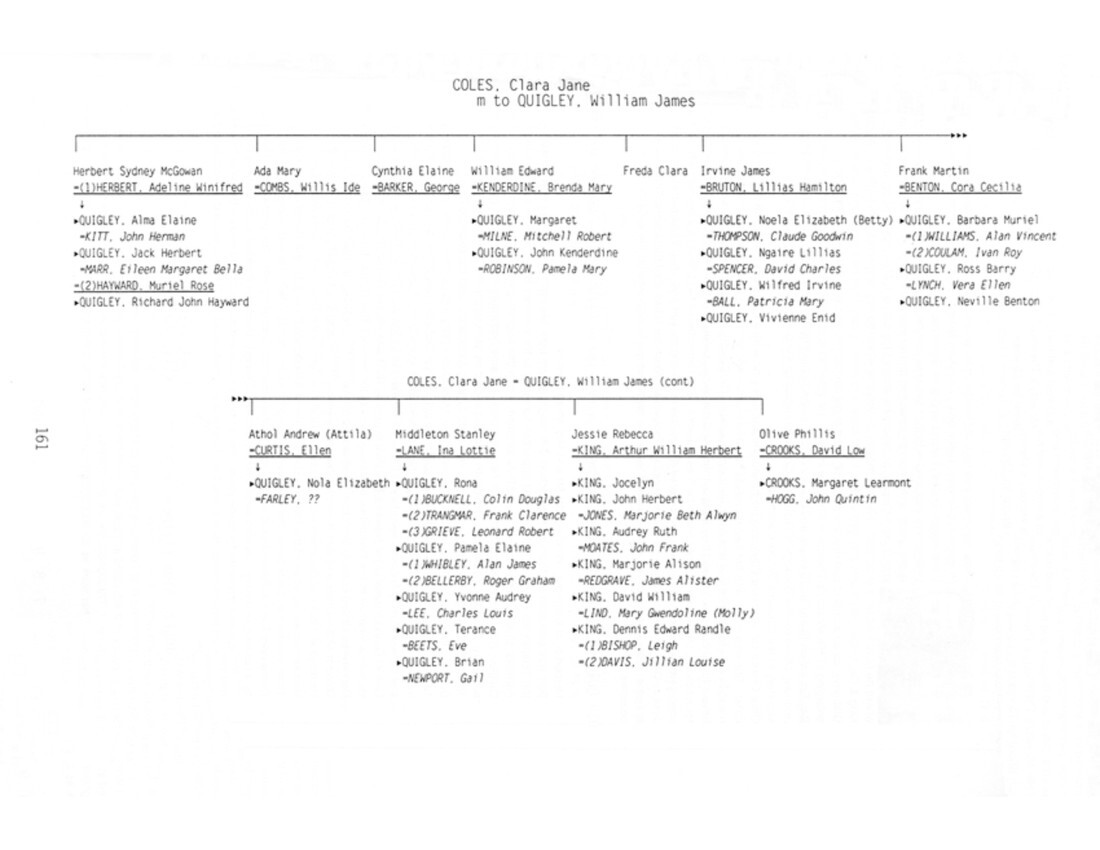
Page 162
Descendants of COLES, Edward Purkis and BARTON, Clara Louisa
COLES, Clara Jane and QUIGLEY, William James
03> COLES, Clara Jane m on 19.05.1879 to QUIGLEY, William James
b 11.12.1858 d 09.04.1929 b 18.01.1854 d 27.09.1905
Clara registered and bap. at Droxford, Hampshire, England, and m. at St Andrew’s Presbyterian Church, Gisborne by Rev John McAra. William, s/o James Quigley, b. at Castlereagh, Belfast, Ireland, and d. at Gisborne.
William was educated in Belfast and later articled to Mr James McDowell, architect of Birmingham, with whom he remained for five years. In 1875 he came to Auckland on the ship “British Empire” and there he entered the firm of E Mahoney & Sons, architects, where he remained for a short time. He then moved to Gisborne where he was employed in the office of William King & Co, timber merchants and also worked for W Adair, merchant. From 1882 he practised in Gladstone Road, Gisborne, as an architect and quantity surveyor. One of his notable projects was the remodelling and enlarging of His Majesty’s Theatre in Gisborne in 1903. He acted as architect in Poverty Bay for the Hawkes Bay Education Board for 15 years, and also as clerk of works to the Public Works Department. He was also returning officer for the Borough of Gisborne, directors’ auditor for the Gisborne Building Society, and secretary to the Gisborne School Committee.
Olive Crooks remembered Clara as a bright and cheerful lady who wore a beautiful lace cap and a high bone collar. She was clever with her hands and did beautiful needlework: smocking, point lace, crochet etc and made clothes for the children and items for their ttouseaus. On Sunday evenings the children were allowed to have a friend home for tea and they sang hymns round the piano. Later, when she went to stay with her mother for a holiday, she always brought books back as presents. She remembered her father as a big man who was a keen gardener. On one occasion she watered the garden in the midday sun and when William asked who did it, Jess or Ollie, he got no reply – so he measured the footprints! When her father died there were nine children at home. Some were working and Jess and Olive were still at home. To help support them, Clara took in boarders.
01> QUIGLEY, Herbert Sydney McGowan m on 06.01.1906 to (1) HERBERT, Adeline Winifred
b 28.02.1880 d 25.11.1951 b 04.09.1884 d 19.01.1971
Herbert b. at Gisborne. Winifred, d/o Mr and Mrs Alfred Herbert.
Bert was educated at Gisborne High School and taught school from 1897 to 1919. While he was teaching at the Tipapakuku School in 1919, he was appointed secretary to the Hawke’s Bay branch of the New Zealand Farmers’ Union and the Dannevirke A&P Association. From this beginning was built the accountancy firm of Quigley, Allen and Hayward. When the Farmers’ Union became Federated Farmers, Bert continued as secretary, a position he held until his death. He also served as secretary to the Dannevirke District Jersey Cattle Club, the Southern Hawke’s Bay Herd Testing Association, and the Ruahine Club. Bert was initiated into the Gisborne Juvenile Lodge, Manchester Unity Independent Order of Oddfellows in 1894 at the age of 14. In 1898 he was transferred to the Loyal Gisborne Lodge and two years later passed through the chairs of that lodge. In 1901 he represented his lodge at the Auckland District Conference and he was elected financial secretary of the Loyal Dannevirke Lodge in 1911. In 1922 he became Deputy District Grand Master of the Hawke’s Bay District and in 1923 was elected Grand Master of the district. He was a member of the Committee of Management of the Hawke’s Bay District from 1914 and secretary of the Dannevirke United Friendly Societies’ Dispensary from its inception in 1927. In 1924 he was elected Director of the Order and was re-elected two years later. He was appointed Deputy Grand Master at Hastings in 1928 and Dominion Grand Master in 1930. He formed the Dannevirke Juvenile Lodge. Bert served as secretary of the Hawke’s Bay War Relief Association from 1916 until it was disbanded in 1950, and he was secretary of the Dannevirke Patriotic Society during WW2. He was secretary of the Dannevirke Electric Power Board from its inauguration until 1927, resigning when the position was filled by a full-time secretary. He also served on the Borough Council. He was a member of the Dannevirke Rotary Club and a director for some years. For 21 years he served as Southern Hawke’s Bay Ward member on the Hawke’s Bay Education Board, and for 23 years was a member of the Dannevirke High School Board of Governors.
01> QUIGLEY, Alma Elaine m on 29.07.1931 to KITT, John Herman
b 19.03.1908 d 30.01.1966 b 14.04.1907 d **.**.****
Elaine b. and d. at Dannevirke and bd. at Mangatera Cemetery, Dannevirke.
Elaine was educated at Tipapakuku and North Primary Schools in Dannevirke, and at Solway College in Masterton. Throughout her life she showed a very real interest in all Dannevirke affairs but was best known for her work as an accompanist for musical items and major musical productions. During the war (cont…)
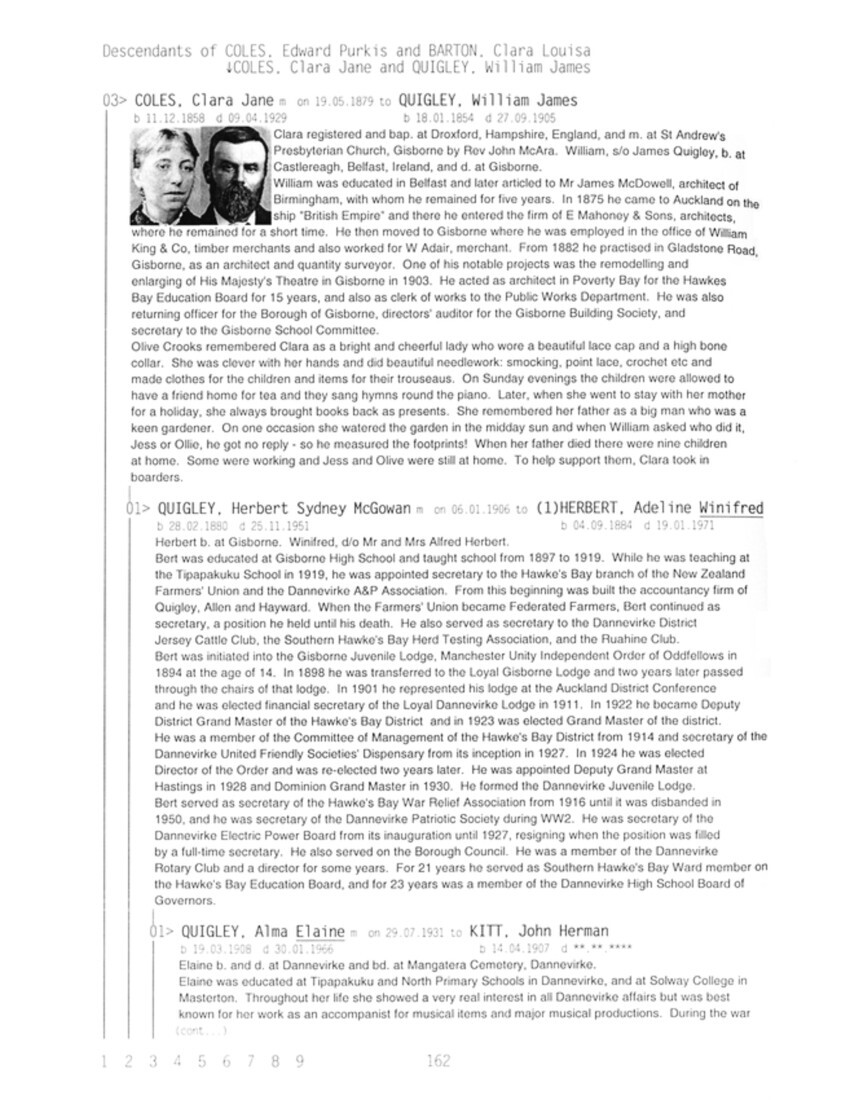
Page 163
Descendants of COLES, Edward Purkis and BARTON, Clara Louisa
COLES, Clara Jane and QUIGLEY, William James
QUIGLEY, Herbert Sydney McGowan and HERBERT, Adeline Winifred
QUIGLEY, Alma Elaine and KITT, John Herman (cont…)
years she took an active part in the Young Women’s Auxilliary, assisting with camp organisation, dances and other social functions. A keen sportswoman, she played hockey, tennis and golf and was a capable swimmer. In later years she took an interest in cricket and golf. In 1965 Elaine was made a life member of the Dannevirke Choral and Operatic Society for her work in the production of “Wildflower”. She frequently acted as producer, accompanist and occasionally composer. She also had a long association with the Dannevirke Drama Society. Also, for many years, she taught music at Dannevirke High School.
[…]

Page 164
Descendants of COLES, Edward Purkis and BARTON, Clara Louisa
COLES, Clara Jane and QUIGLEY, William James
QUIGLEY, Herbert Sydney McGowan and HERBERT, Adeline Winifred
QUIGLEY, Alma Elaine and KITT, John Herman
KITT, Terry and HULENA, Diane
[…]
02> QUIGLEY, Jack Herbert m on **.**.1942 to MARR, Eileen Margaret Bella
b 11.09.1910 d 19.03.1978 b 04.07.1911 d 04.11.1999
Jack b. at Dannevirke and d. at Napier. Eileen, d/o Gordon Begarie and Susan Elizabeth Marr, b. at Dublin, Ireland and d. at Napier.
Jack grew up and was educated at Dannevirke. He was a pupil at North School where he was Dux, and at Dannevirke High School. He was keenly interested in sport and was particularly good at swimming and rugby. He started work with the Bank of New Zealand in Dannevirke in 1928 and was with them in Palmerston North for three years prior to the outbreak of WW2. He enlisted and served for six years with the New Zealand Artillery 2nd NZEF. He commenced service in the Middle East as a 2nd Lieutenant and was Brigade Major from the Battle of Alamein to the end of the North African Campaign under General Sir Stephen Weir who was commanding the Divisional and Corps Artillery. Jack also served under Generals Wavell and Freyberg and Jack and Eileen maintained a friendship with Lord and Lady Freyberg after the end of the war. Jack saw further war service in the United Kingdom before he returned to New Zealand in 1946. He returned to work for the Bank of New Zealand at Dannevirke, Hastings and Napier from where he retired in 1971 as head security clerk. His 40 years of banking service set a provincial bank record and he was well respected by his banking associates and peers. Jack and Eileen met in London during the war. Eileen was educated in Dublin until the age of ten when she moved with her parents and sister Annie and brother Ken to Margate in England. At the age of 14 she was apprenticed as a hairdresser and at that time her hobbies were sewing, knitting and needlework. She had a brief marriage in her late teens then, after her divorce, she worked on ocean liners, travelling extensively. When war broke out she made London her home and, after meeting Jack about 1942, they married after a courtship of two weeks. She came to New Zealand as a war bride on the “Rangitoto” and settled in Dannevirke until Jack’s transfer to Napier. She established a hair salon and a school of hairdressing, continuing this work until she was near 72.
Following his retirement, Jack assisted Eileen with the hairdressing business and pursued his interests in gardening, boating, fishing and his pet dogs. He was a member of the Napier Sailing Club where he was secretary/manager for six years until his sudden death from a CVA.
Home, garden and spinning filled Eileen’s retirement days. She was a generous lady with a host of risque dittys and always a full bottle of gin or whisky on offer. She had a love of animals and children and although she and Jack had no family of their own, the girls who trained under Eileen, and their many friends were as family to them.
01> QUIGLEY, Herbert Sydney McGowan m on **.**.1939 to (2) HAYWARD, Muriel Rose
b 28.02.1880 d 25.11.1951 b 22.06.1902
Herbert m. and d. at Dannevirke. Muriel, d/o George and Ellen Laura Hayward, b. at Saffron Walden, Essex, England.
Muriel grew up and was educated at Saffron Walden and after leaving school she trained as a kindergarten teacher and then as a nursery governess. She obtained fortunate and “interesting positions with various aristocratic families of the time, looking after and | assisting with the education of their children. She then held a position as a companion secretary with a spinster, assisting with her business and personal needs and travelling to various parts of the world in the course of her employment. It was while staying at the Wentworth Hotel in Sydney, Australia, in 1938 that she met Bert Quigley who was also staying at the hotel on business/holiday. Whilst they were guests at the hotel, a serious fire assisted to cement the relationship. Muriel travelled to New Zealand to experience what life was like ‘down under’ before returning to UK to settle her affairs. Despite various obstacles, such as having her passport stolen, she managed to obtain a ticket on one of the last commercial flights from the UK to New Zealand before the outbreak of war, ‘hip hopping’ across the Atlantic and Pacific Oceans, flying at low altitude to avoid possible enemy detection. (cont…)
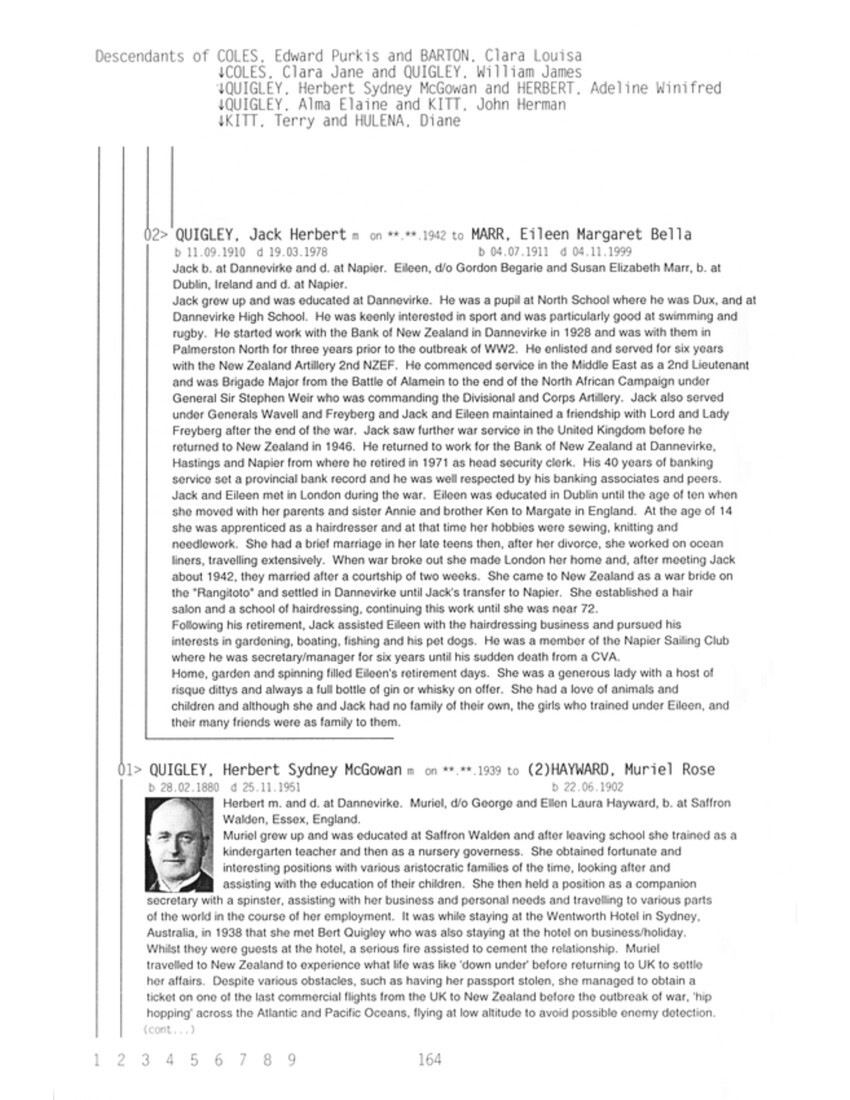
Page 165
Descendants of COLES, Edward Purkis and BARTON, Clara Louisa
COLES, Clara Jane and QUIGLEY, William James
QUIGLEY, Herbert Sydney McGowan and HAYWARD, Muriel Rose (cont…)
She and Bert were married at Dannevirke in the latter part of 1939 at the home of Herman and Elaine Kitt. Muriel settled into semi-rural life at Dannevirke assisting her teacher/accountant husband with the many demands of business, local body administration, the rearing of her son Richard and the emigration of her parents from Cambridge, England to Dannevirke in 1948. After Bert’s death from cancer, Muriel moved herself and family to Napier, settling by the sea at Port Ahuriri and tending to her growing son, elderly grandparents and home through varied circumstances and financial constraints.
Until 1997 Muriel was actively involved in the local Knox Presbyterian Church and Opportunity Shop and took a real interest in the local environment. With neighbours and supporters and with the assistance of a lawyer, she was involved in lobbying the Council and other local bodies to change the Industrial designation of Ahuriri to Residential, thus helping to establish the base that led to the beautification of the area in subsequent years.
From 1997 Muriel became a resident of Hettye Charles Presbyterian Support Home on the Napier Hill and was recently transferred to Atawhai Presbyterian Support Elder Home in Gloucester Street, Taradale. She continues to take a-sharp interest in family business affairs, the Quigley and extended family North and South of Napier, her family home, Napier and Dannevirke. At the time of writing this biography, Muriel is the oldest living member of the associated Quigley family.
01> QUIGLEY, Richard John Hayward
b 30.06.1944
Richard b. at Dannevirke. Address: 58 Mt Roskill Road, Mt Roskill, Auckland.
After his father’s death in 1951, Richard moved to Napier in 1952 with his mother and his Hayward grandparents. He was educated at Port Ahuriri School, Napier Intermediate and Napier Boys’ High School, leaving in the latter part of 1960. He served an apprenticeship with the New Zealand Post Office and qualified as an automotive engineer then joined British Petroleum (BP) in 1970. He travelled extensively throughout New Zealand doing public relations work until the end of 1974 when he was made redundant as a consequence of the first fuel crisis that hit New Zealand in 1974. He was living in Christchurch at the time so returned to Napier for a short time then went to Auckland to study Naturopathy and Osteopathy with the South Pacific College of Natural Therapeutics and the New Zealand Register of Osteopaths Inc. Since graduating in 1981, he has practised full time, firstly at Balmoral in Auckland, then at Mt Roskill where he is currently practising and managing a busy health centre with several others on the staff. Since 1988 he has travelled extensively overseas attending occupation related courses and touring. He also maintains the family home and small business interests in Napier.
Richard’s interests include continual medical education, Napier and Hawkes Bay, classic cars, 20th century history, martial arts, gardening, dogs and travel.
02> QUIGLEY, Ada Mary m on 19.10.1910 to COMBS, Willis Ide
b 11.08.1883 d 18.10.1966 b 22.11.1879 d 31.05.1920
Ada d. at Palmerston North. Willis, s/o Willis Edmund Combs and Annie Clara Coles. Refer to Willis’ entry in this book for biographies and descendants of Ada and Willis.
03> QUIGLEY, Cynthia Elaine m on **.**.**** to BARKER, George
b 27.11.1881 d **.**.**** b **.**.**** d **.**.****
Cynthia b. at Gisborne and d. at Wellington.
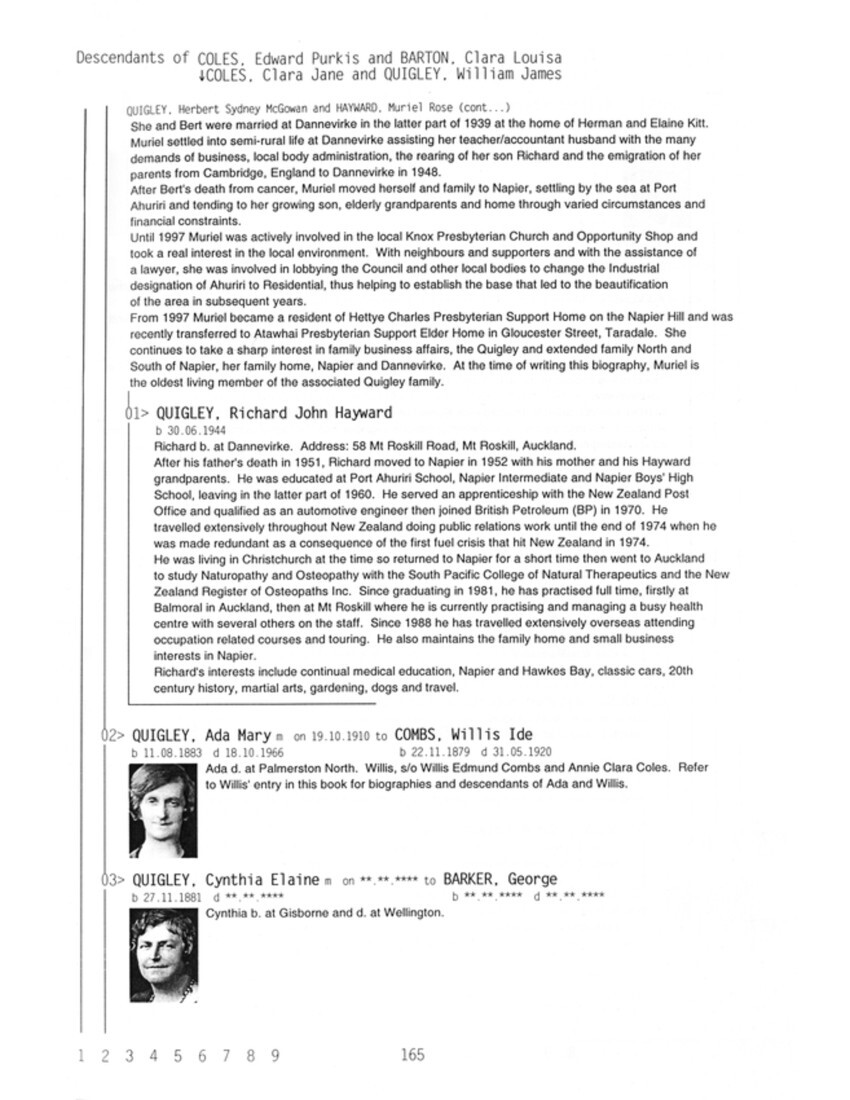
Page 166
Descendants of COLES, Edward Purkis and BARTON, Clara Louisa
COLES, Clara Jane and QUIGLEY, William James
04> QUIGLEY, William Edward m on 05.07.1916 to KENDERDINE, Brenda Mary
b 20.10.1885. d 06.02.1959 b 13.01.1892 d 12.11.1977
William b. at Gisborne, d. at Wellington and bd. at the Soldier’s Lawn Cemetery, Karori. Brenda b. and d. at Auckland. William and Brenda divorced in the 1920s.
01> QUIGLEY, Margaret m on 12.08.1936 to MILNE, Mitchell Robert
b 21.05.1917 b 27.08.1908
Margaret b. and m. at Auckland. Mitchell b. at Thames. Address: 36 Mangakiekie Avenue, Greenlane, Auckland.
Margaret was educated at St Cuthbert’s College, Auckland, where her special interests were sport and music. After her marriage she was involved in design and art then, following a long illness with osteomyelitis in the leg, she took up pottery and working with clay. She set up a studio for both creating and teaching pottery and she exhibited in New Zealand and overseas. Later she was one of a group of five chosen to travel to Japan, China and Korea to make cultural contact with their governments.
Mitchell was educated at Thames High School, the Thames School of Mines, and the University of Auckland. He then became a telecommunications engineer with the New Zealand Post Office. He served as an elected member of the Auckland Electric Power Board and eventually became chairman. His interests included sport, education and welfare agencies.
01> MILNE, Roderick Ian m on 31.03.1973 to BUTLER, Irene Faith
b 14.01.1942 b 14.11.1947
Roderick b. at Auckland. Address: 17 Ferryhill Road, Mount Eden, Auckland.
[…]
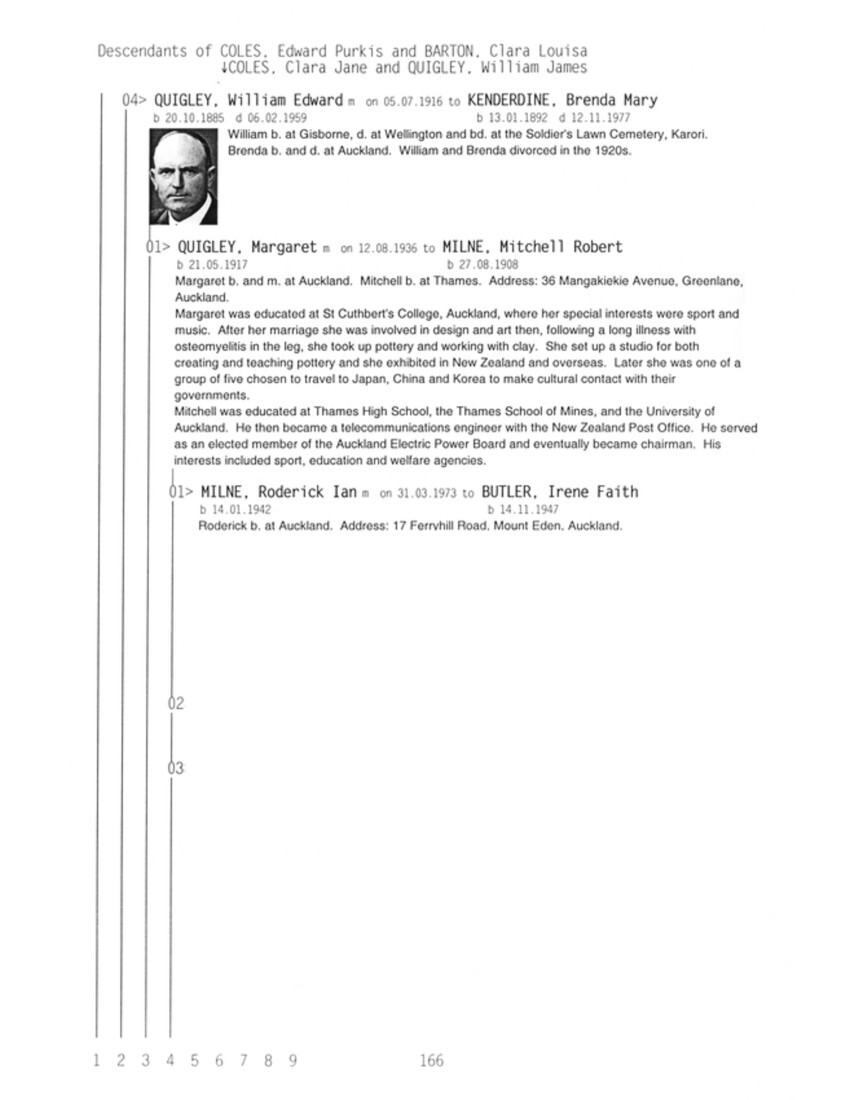
Page 167
Descendants of COLES, Edward Purkis and BARTON, Clara Louisa
COLES, Clara Jane and QUIGLEY, William James
QUIGLEY, William Edward and KENDERDINE, Brenda Mary
QUIGLEY, Margaret and MILNE, Mitchell Robert
MILNE, Andrew Kenderdine and WATSON, Janice Ruth
[…]
02> QUIGLEY, John Kenderdine m on 21.03.1945 to ROBINSON, Pamela Mary
b 16.05.1921 d 03.04.1993 b 04.04.1924
John b. at Oamaru, m. at Dunedin and d. at Auckland. Pamela b. at Christchurch. Address: 2/3 Kinder Place, Meadowbank, Auckland. John was educated at King’s College, Auckland. He farmed at Clevedon where his love of horses gave him an interest in harness driving and in the Riding for the Disabled programme. He served in 40 Squadron RNZAF during WW2.
[…]
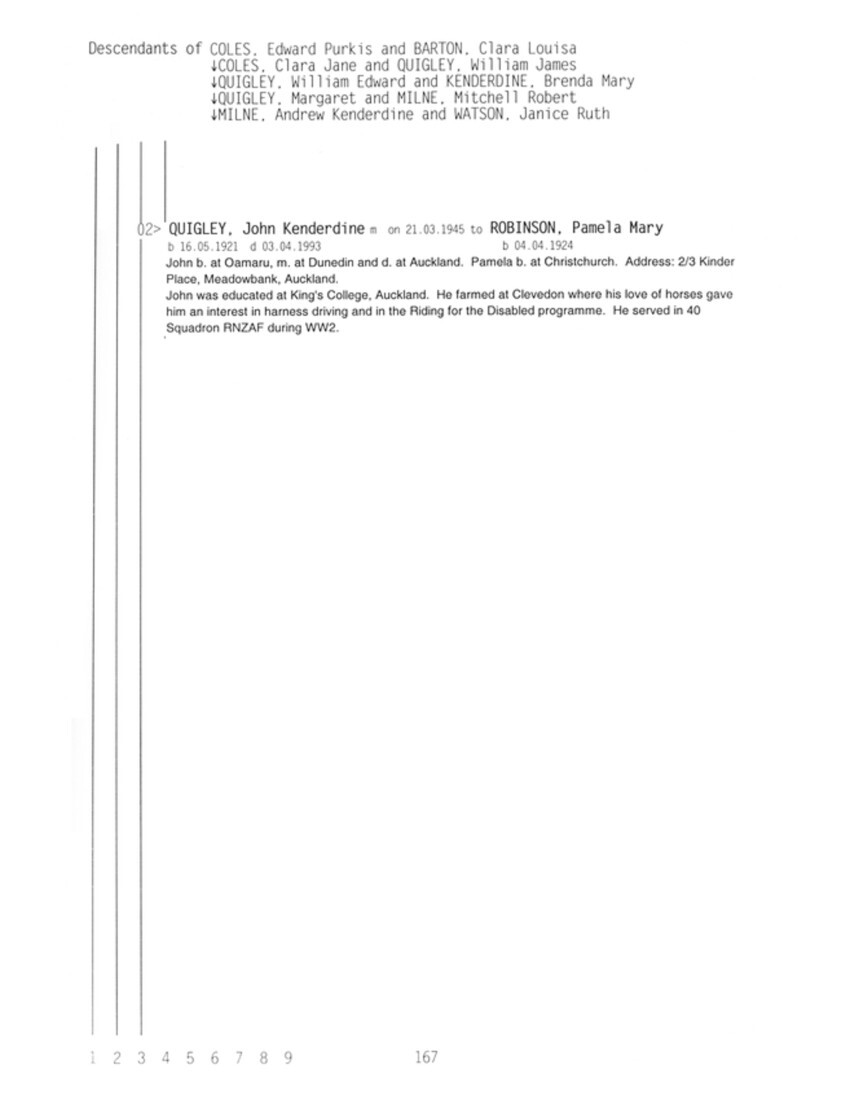
Page 168
Descendants of COLES, Edward Purkis and BARTON, Clara Louisa
COLES, Clara Jane and QUIGLEY, William James
05> QUIGLEY, Freda Clara
b 13.09.1886. d 26.11.1941
Freda b. and d. at Gisborne. She was educated at Gisborne Central and Technical Schools and started work with the “Gisborne Herald” before travelling overseas. During the years of WW1 she worked in Melbourne and after he return she worked with her brother Sydney in Dannevirke. In 1931 she was appointed accountant to the Gisborne Gas Company, and later became secretary of the company.
As an active member of St Andrew’s Presbyterian Church, Freda was a leader in the senior girls’ Bible class and during the Depression years she was involved in welfare work.
06> QUIGLEY, Irvine James m on 17.07.1916 to BRUTON, Lillias Hamilton
b 07.01.1889 d 26.10.1971 b 09.05.1893 d 10.06.1987
Irvine b. at Gisborne, m. at St Andrew’s Church, Dunedin, by Rev A C Randerson, and d. at Gisborne. Lillias, d/o Mr and Mrs R J Bruton of Dunedin, b. at Dunedin and d. at Gisborne.
Irvine started work in 1905 in the service of the New Zealand Shipping Company in Gisborne as a clerk and was transferred to the Company’s Timaru office as accountant in 1915. Shortly after his marriage in 1916 he left for overseas with the First New Zealand Expeditionary Force and Lillias spent the period of his absence with an aunt in Christchurch. After his return, Irvine rejoined the staff of the New Shipping Company in Dunedin, but was there only a short time before returning to Gisborne in 1920, when he joined the shipping branch of the Gisborne Sheepfarmers’ Frozen Meat and Mercantile Company Ltd. He and Lillias lived in the house that they built in Iranui Road, Gisborne.
Irvine may be best remembered for his life-time association with the shipping industry and, through this, his long and distinguished service as a member of the Gisborne Harbour Board. Elected to the Board as a city representative in 1935, he had completed 27 years service on the board when he retired in 1962. For the last 12 years of his board membership he was board chairman after serving five years as deputy chairman. He also served on the national body of harbour board members.
In his commercial life, Irvine was manager for many years of the Gisborne Lightering and Stevedoring Company and was Gisborne representative of the Blue Star Line for some 30 years. He served six years as a member of the Gisborne Borough Council and was a member of the Gisborne Fire Board for four years. He was concerned for the welfare of returned servicemen and served for many years on the executive of the Gisborne Returned Services Association and as a member and chairman of the East Coast Patriotic Council. He was the district representative on the New Zealand Patriotic Fund Board. During WW2 he was a member of the National Military Reserve. He served on the district Rehabilitation Committee from its inception and was chairman of the board until the Rehabilitation Board’s office in Gisborne was closed. He was a member and past president of both the Gisborne Chamber of Commerce and the Gisborne Rotary Club. He was awarded the MBE in the New Year’s Honours of 1962.
Lillias was a teacher in Dunedin before her marriage. Later she undertook supervision of Bible classes and camps and did youth group work for the Victoria League. She was also treasurer for the Heni Materoa Children’s Home for many years.
Irvine and Lillias were both keen supporters of the National Party and Lillias served as secretary/treasurer of the women’s section for a period.
01> QUIGLEY, Noela Elizabeth (Betty) m on 18.05.1949 to THOMPSON, Claude Goodwin
b 27.04.1917 b 15.03.1913 d 04.03.2000
Elizabeth b. at Dunedin and m. at St Andrew’s Presbyterian Church, Gisborne. Claude, s/o James Thomas Thompson and Mary Jane Goodwin, b. at Opotiki. Address: 2 Lilburn Street, Warkworth. Betty was educated at Kaiti Primary School (1922-29) and Gisborne High School (1930-33) then trained as a school dental nurse in 1937-40.
Claude was educated at Opotiki District High School (1918-28) and served as an Airforce pilot during WW2. He is the author a book titles “Into the Sun”, published in 1996.
[…]
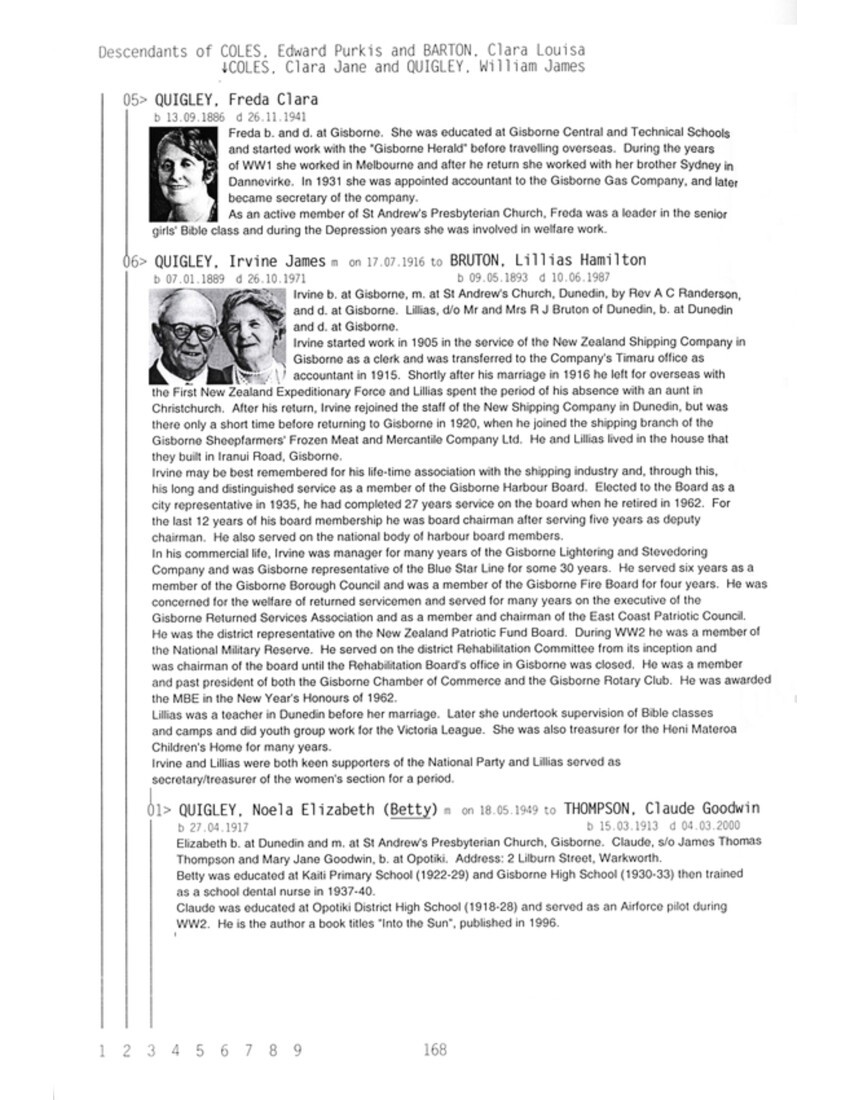
Page 169
Descendants of COLES, Edward Purkis and BARTON, Clara Louisa
COLES, Clara Jane and QUIGLEY, William James
QUIGLEY, Irvine James and BRUTON, Lillias Hamilton
QUIGLEY, Noela Elizabeth (Betty) and THOMPSON, Claude Goodwin
THOMPSON, Peter Goodwin and ??, Janet Margaret
[…]
02> QUIGLEY, Ngaire Lillias m on 04.01.1945 to SPENCER, David Charles
b 13.07.1922 b 05.12.1915
Lillias b. at Gisborne and m. at St David’s Presbyterian Church, Gisborne. David, s/o Seymour Charles Frederick Spencer and Alice Hamilton Ker, b. at Wellington. Address: 10/36 Disraeli Street, Gisborne. Lillias was educated at Kaiti Primary School, Gisborne High School and Christchurch Teachers’ College (1941-42). She taught as a probationary assistant at Manutuke School and gained her Teachers’ C Certificate in 1943. She then taught for a year at Whatatutu School for the Hawke’s Bay Education Board until her marriage.
David was educated at Nelson Central Primary School and Nelson College then gained his BA at (cont…)
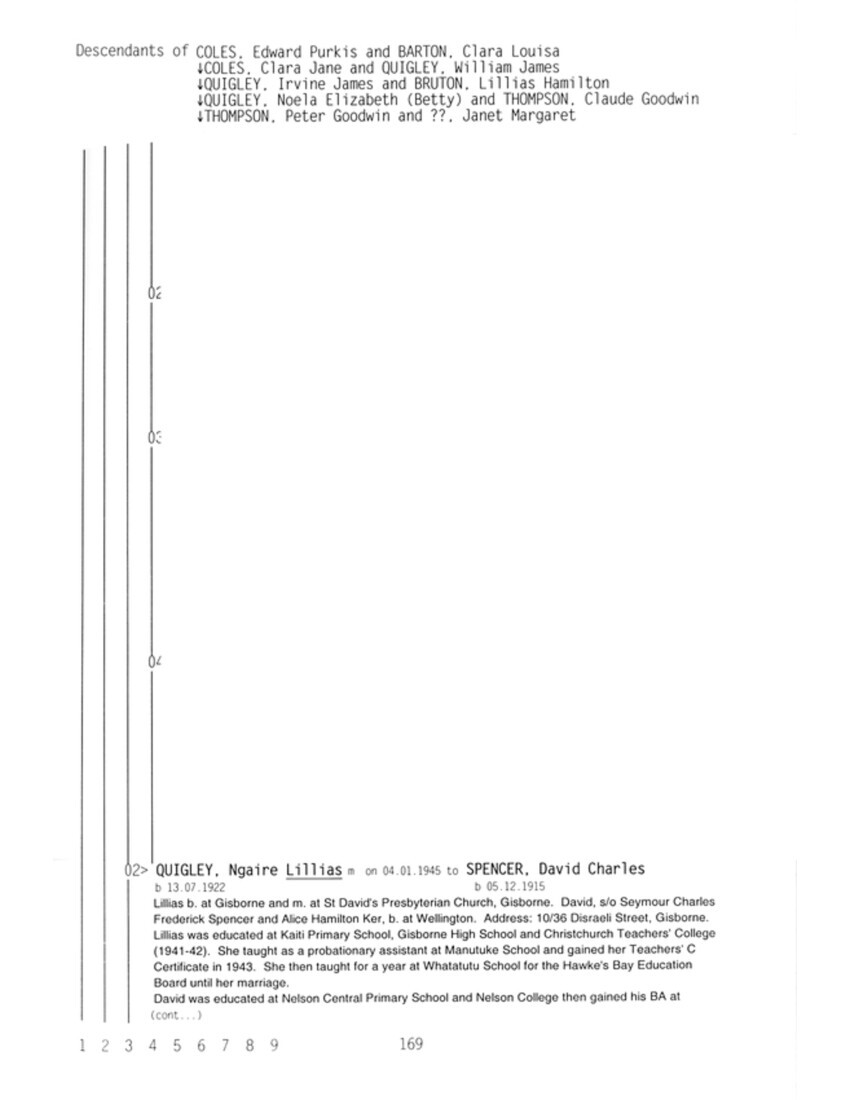
Page 170
Descendants of COLES, Edward Purkis and BARTON, Clara Louisa
COLES, Clara Jane and QUIGLEY, William James
QUIGLEY, Irvine James and BRUTON, Lillias Hamilton
QUIGLEY, Ngaire Lillias and SPENCER, David Charles (cont…)
Canterbury College. He attended Knox College Theological Hall and was ordained on 17 December 1940. Following their marriage, Lillias held various relieving positions including at Solway College whilst David served as a Captain Chaplain with the 25th New Zealand Battery, J-Force. She then taught at some Wellington Schools before sailing to Britain with David for overseas experience in 1953. Whilst keeping up with David’s parish work in the East End, she taught for 18 months at Orchard Infant School in Hackney and also found time for sightseeing, a royal garden party at Buckingham Palace, and seats in the Mall for the Coronation Procession. Back in New Zealand in 1954, they settled in the parish of St Enoch’s in New Brighton. Lillias was fully occupied with their children and her interest was in kindergarten. In 1959 the family moved to Palmerston North where David was appointed second minister at St Andrew’s. Lillias answered an appeal for married women to return to teaching and was appointed to College Street Primary School where the girls attended. Their next move was to St Andrew’s in Wairoa in 1964 where she relieved at all three primary schools before gaining an appointment to Wairoa Primary. Finally, they moved back to Gisborne where David taught at Gisborne Girls’ High School and Lillias became Supervisor of Junior Classes at Kaiti Primary School. During the 1970s she taught for three years as Senior Teacher Junior Classes at the new open plan school, Deanwell, and for part of this time she was Acting Principal. They then moved north to Albany where she was appointed Principal at the Albany Open Plan School. With retirement near, David was supplying in the vacancy at St Cuthbert’s, East Coast Bays, as they built their retirement home at Snells Beach.
Early retirement from teaching in 1976 freed Lillias to enjoy other interests with David, but he was soon called upon to supply in vacant parishes and together they enjoyed many years supplying anything between three and 15 months in different parts of the North Island. It was a case of living in empty manses with a minimum of lent furniture and basic equipment, but was very rewarding in friendships and in getting to know areas such as Ohakune/Raetihi, Kerikeri/Kaeo, Coromandel/Whitianga, Matamata and Dannevirke. Finally it was back to churches in Gisborne, in particular to Matawhero where David was ordained as a young man. David was a founding member of the Fergusson Trust in Palmerston North. Following David’s death, Lillias now lives in a pleasant retirement complex where she follows an interest in fabric work and water-colour painting. She has completed two large family hangings and some pulpit falls.
[…]
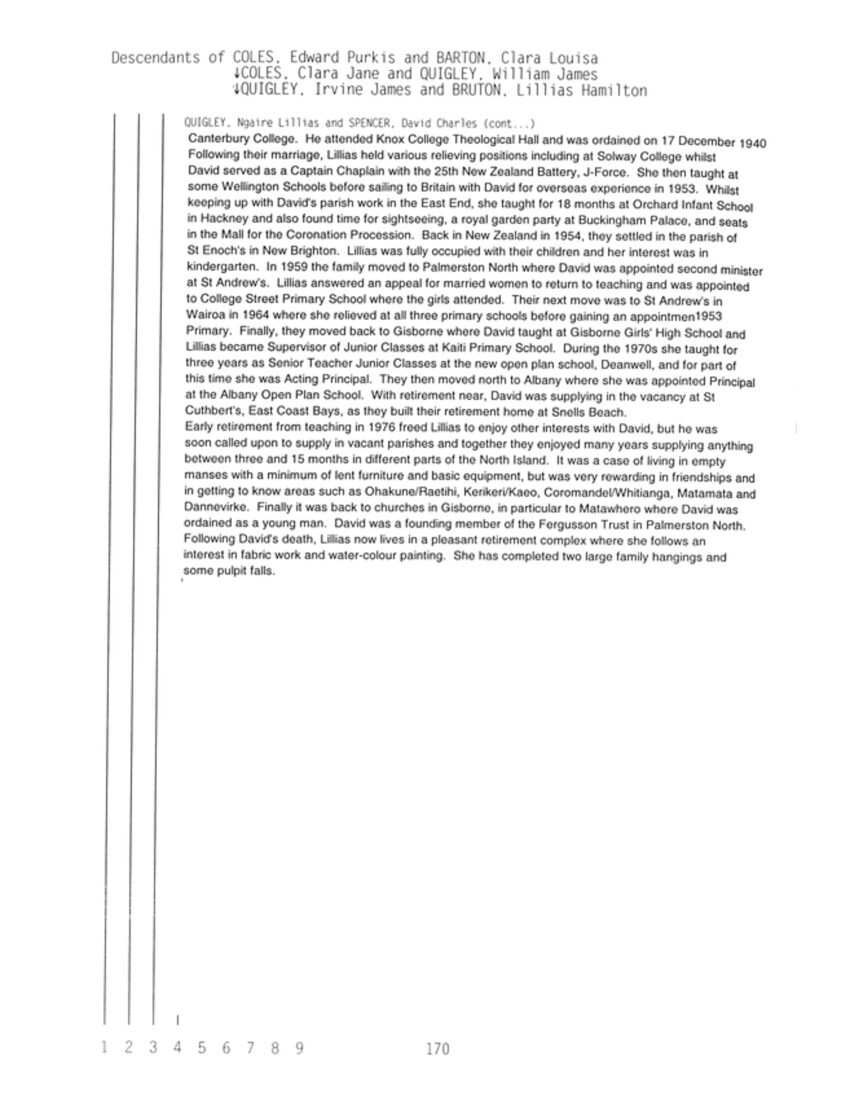
Page 171
Descendants of COLES. Edward Purkis and BARTON, Clara Louisa
COLES, Clara Jane and QUIGLEY, William James
QUIGLEY, Irvine James and BRUTON, Lillias Hamilton
03> QUIGLEY, Wilfred Irvine m on 19.09.1953 to BALL, Patricia Mary
b 13.07.1925 d 03.04.1981 b 20.01.1933
Irvine b. at Gisborne, m. at Knox Presbyterian Church in Gisborne and d. and cremated at Hamilton. Patricia, d/o Henry Russell Ball and Althea Georgina Johnstone, b. at Gisborne. Address: 64a Edgecumbe Road, Tauranga.
Irvine was educated in Gisborne and did his electrical apprenticeship training at Cook Hospital in Gisborne. He had his own electrical shop and contracting business and after giving it up he worked for the Gisborne Freezing Works as a maintenance electrician. He moved to Huntly where he worked for Downers as a maintenance electrician at their coal mines. He then moved to Hamilton where he worked for the Hamilton City Council as an electrical inspector, then joined the New Zealand Electricity Department as a test technician. He was a member of St John Ambulance in both Huntly and Hamilton. Patricia was educated in Gisborne and trained to do office work. She did this until the family arrived and after the children went to school she worked with the Crothall Group for ten years and for a canvas company for 15 years. She retired to Tauranga. Her interests include outdoor bowls and cake decorating.
[…]
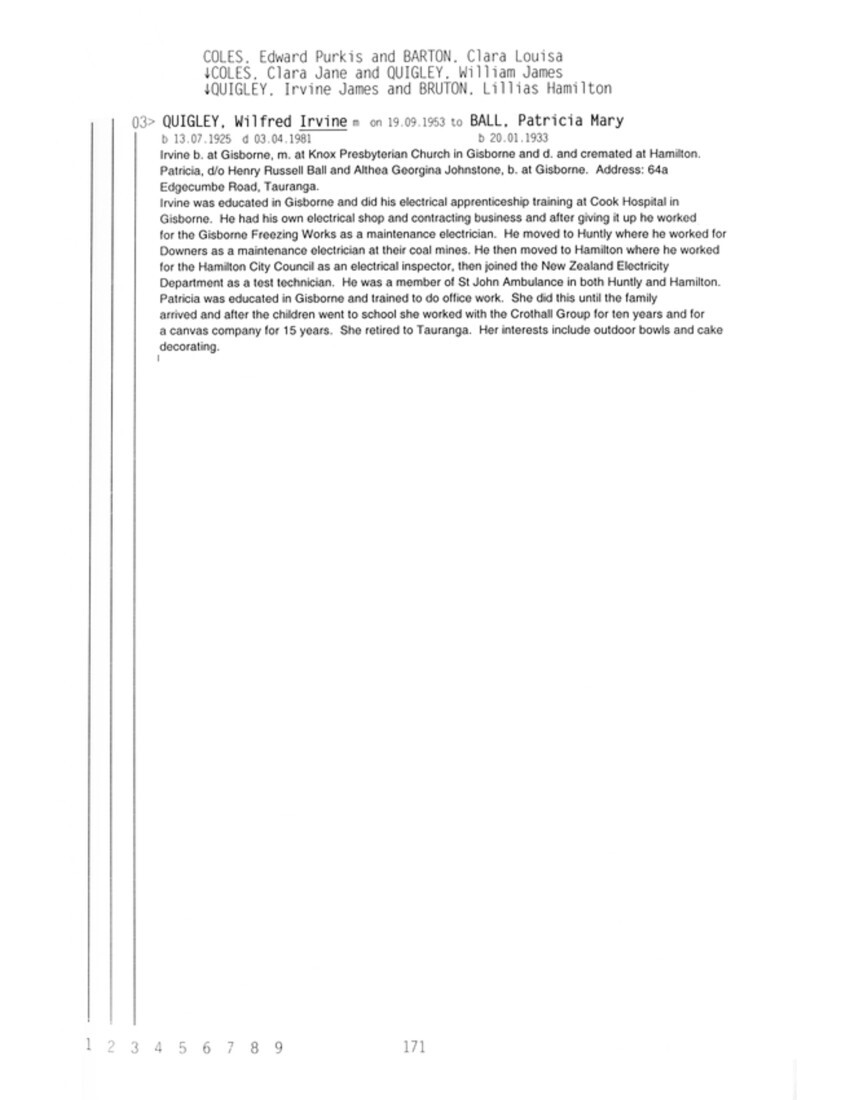
Page 172
Descendants of COLES, Edward Purkis and BARTON, Clara Louisa
COLES, Clara Jane and QUIGLEY, William James
QUIGLEY, Irvine James and BRUTON, Lillias Hamilton
QUIGLEY, Wilfred Irvine and BALL, Patricia Mary
QUIGLEY, Stuart Gary and McEWEN, Katrina May
[…]
04> QUIGLEY, Vivienne Enid
b 20.01.1929
Vivienne b. at Gisborne. Address: 6/31 Carnarvon Street, Gisborne.
Vivienne was educated at St Winifred’s Girls’ School, Gisborne Central School, Gisborne Intermediate School and Gisborne High School. She is a keen amateur musician, playing the violin solo and in orchestras and chamber music groups, and also plays the piano. She holds life memberships in the Gisborne Operatic Society and Gisborne Music Society and is a Trustee of the Charles Wilkinson Musical Trust established in 1974 to assist young musicians in Gisborne. She is a also an Elder of St Andrew’s Presbyterian Church.
Vivianne worked in the book trade for 37 years and in 1987 she became the third owner of C W Muir Ltd before retiring in October 1990. The shop is now Muir’s Bookshop. Her lifelong interests in music and books continues into her retirement.
07> QUIGLEY, Frank Martin m on **.**.1918 to BENTON, Cora Cecilia
b 03.03.1891 d **.**.1942 b 19.06.1894 d 14.08.1969
Frank b. at Gisborne and d. at Napier.
01> QUIGLEY, Barbara Muriel m on 21.08.1943 to (L)WILLIAMS, Alan Vincent
b 20.07.1919 d 07. 05.1996 b 11.03.1916 d 23.10.1964
Barbara b. at Hastings and m. at St Augustine’s Church in Napier. Alan, s/o Charles Herbert Williams and Mabel Ann Norman of Taradale. Barbara was educated at Napier Central Primary School and Napier Girls’ High School. At the age of 11 years, and the first day of the new school year, she experienced the Napier Earthquake on 3 February, 1931.
At 15-16 years Barbara learned singing from Madam Mercer in Cameron Road, an interest which she would pursue throughout her life. She worked at McGruers as a cashier from 1936-42, before she joined the Army where she was locally involved with office duties. She attended the YWCA for sporting events and socials. She loved dancing and was described as a “smooth dancer”. Alan lived at 8 Peddie Street in Taradale and was educated at Taradale Primary School and Napier Technical College. He was at College when the Earthquake struck in 1931. In his WW2 Army days, Alan served in Egypt as a Gunner in the 2nd NZ Expeditionary Force. He trained as an accountant and worked for Sainsbury, Logan & Williams, Laws & Laws and Robert Holt & Sons until his untimely death in 1964. Alan played hockey for the Army and for his local Kiwi Hockey Club. He also enjoyed tennis and in his later years he played golf. Music was a big part of his life and he was the pianist, at the age of (cont…)
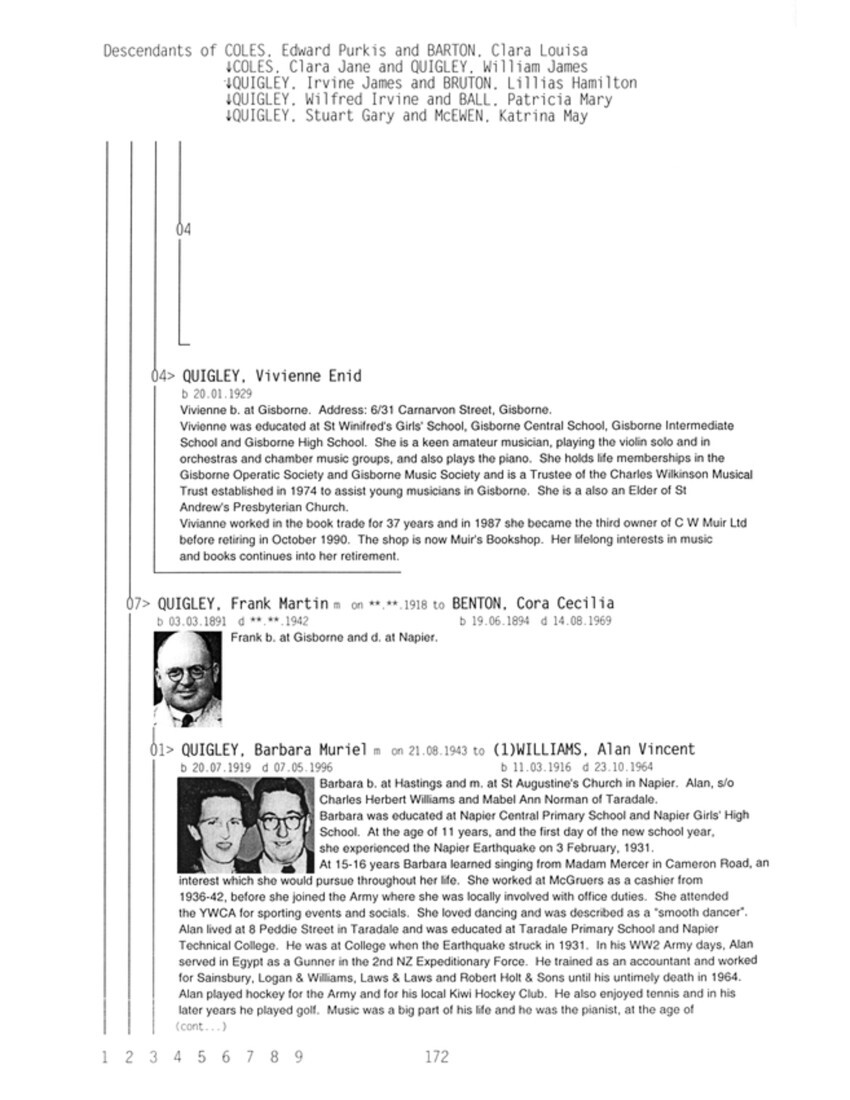
Page 173
Descendants of COLES, Edward Purkis and BARTON, Clara Louisa
COLES, Clara Jane and QUIGLEY, William James
QUIGLEY, Frank Martin and BENTON, Cora Cecilia
QUIGLEY, Barbara Muriel and WILLIAMS, Alan Vincent (cont…)
16-17 years, for a pre-war dance band in the late 1930s. Alan displayed a keen sense of humour and he, too, loved dancing. Like his father, Charles, Alan was a Grandmaster of the Omarunui Masonic Lodge in 1953.
Barbara and Alan lived on the hill in Bay View Road for a short time before moving to 4 MacDonald Street in Napier for the rest of their married life. They had two sons, Roger and Tony, who grew up with their aunts, grandmother and great grandmother in close proximity at 39 Carnell Street, Napier. Barbara was a “Florence Nightingale” to everyone, in particular to her mother and to her two husbands. Barbara and Alan enjoyed entertaining family and friends at home, singing around the piano. Barbara was a stirling background worker for the Nelson Park School Committee and a long time supporter of St Augustine’s Church, in whose choir she sang for many years. As a family they enjoyed camping, in particular at Murray Williams’ property at Eskdale River and with family and friends at Longney’s bach in Taupo. Alan died prematurely at the age of 48 years in 1964, in an Auckland Hospital.
[…]
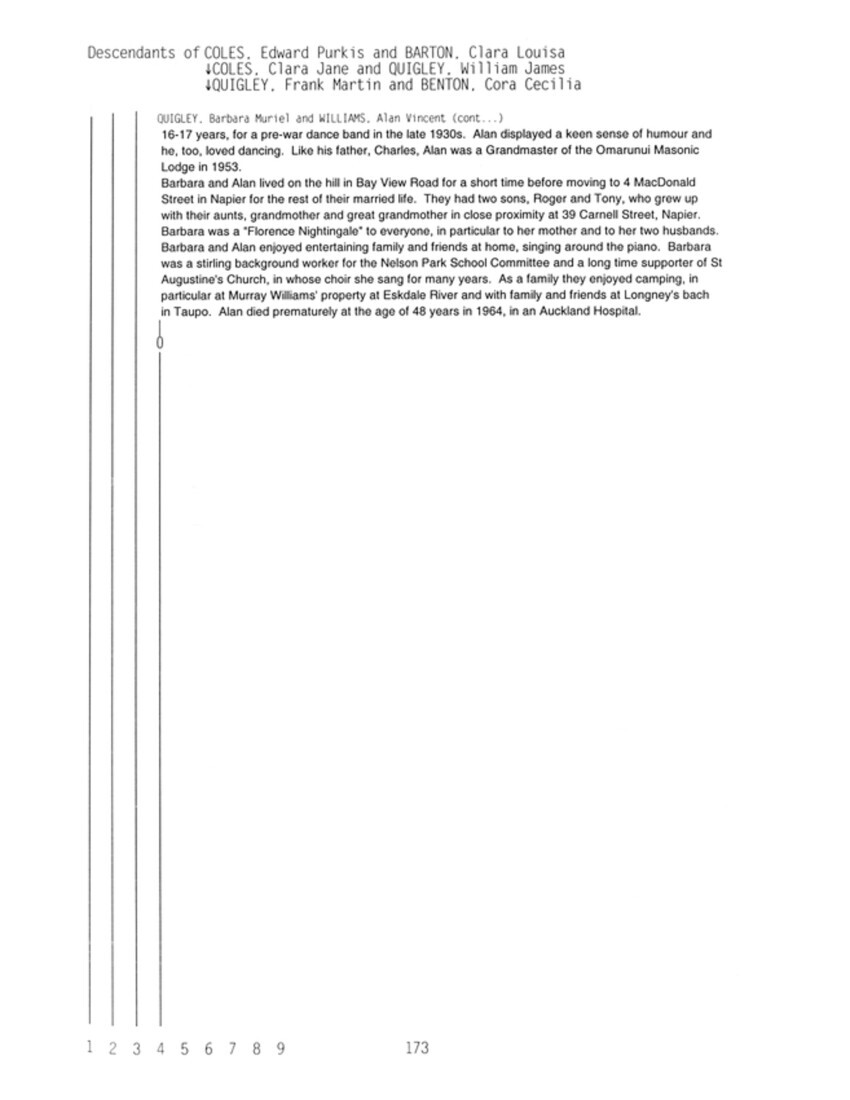
Page 175
Descendants of COLES, Edward Purkis and BARTON, Clara Louisa
COLES, Clara Jane and QUIGLEY, William James
QUIGLEY, Frank Martin and BENTON, Cora Cecilia
QUIGLEY, Barbara Muriel and WILLIAMS, Alan Vincent
[…]
01> QUIGLEY, Barbara Muriel m on 17.06.1967 to (2) COULAM, Ivan Roy
b 20.07.1919 d 07.05.1996 b 30.09.1913 d 30.11.1981
Barbara m. at Napier then moved down the road into Ivan’s home at 68 MacDonald Street.
Ivan owned one of the first newly opened shops in the Marewa Shopping Centre, New City Drapery. He enjoyed sailing and rugby in his younger days and golf in his later years. Barbara and Ivan enjoyed their retirement, visiting their bach in Taupo, and were very close to their eight Coulam and Williams grandchildren. After lvan’s death Barbara visited Australia several times and made a trip to America with friends.
02> QUIGLEY, Ross Barry m on **.**.1955 to LYNCH, Vera Ellen
b 06.04.1929 b **.**.****
Ross b. at Hastings. Divorced. Address: 226 Waimarie Road, Matarangi, RD 2, Whitianga.
[…]
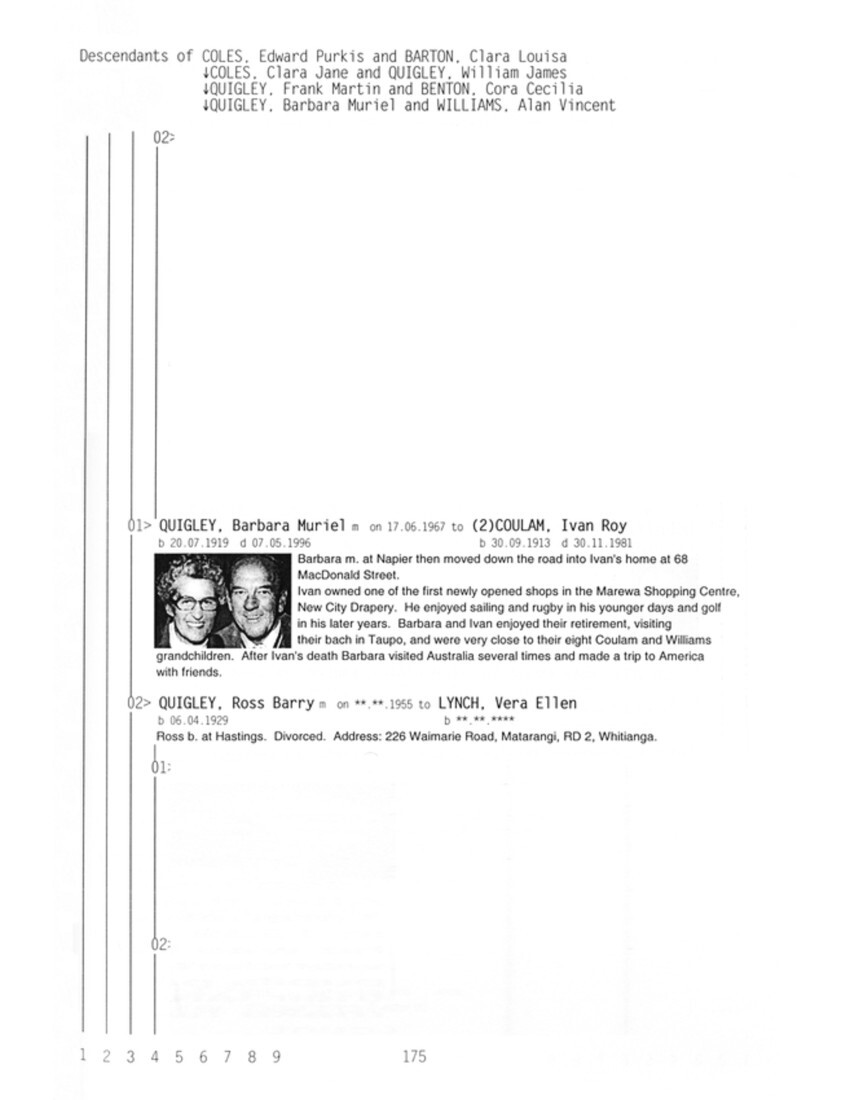
Page 176
Descendants of COLES, Edward Purkis and BARTON, Clara Louisa
COLES, Clara Jane and QUIGLEY, William James
QUIGLEY, Frank Martin and BENTON, Cora Cecilia
QUIGLEY, Ross Barry and LYNCH, Vera Ellen
QUIGLEY, Roslyn Louise and MUNRO, Timothy
[…]
03> QUIGLEY, Neville Benton
b 12.11.1924 d 21.03.1945
Neville served as a pilot officer in the RNZAF in WW2.
08> QUIGLEY, Athol Andrew (Attila) m on **.**.*** to CURTIS, Ellen
b 05.03.1893 d **.**.**** b **.**.**** d **.**.****
Athol b. at Gisborne.
01> QUIGLEY, Nola Elizabeth m on **.**.**** to FARLEY, ??
b **.**.**** d 25.01.1997 b **.**.****
Nola d. at Auckland.
09> QUIGLEY, Middleton Stanley m on **.08.1928 to LANE, Ina Lottie
b 09.04.1895 d 09.01.1966 b 05.10.1906
Middleton b. and m. at Gisborne and d. and bd. at Otaki. Ina, d/o Reuben Charles Lane and Lottie Sarah Monk, b. at Otane. Address: C/- Peria House, Richard Street, Opotiki. As a young man Middleton volunteered for service in WW1 and served with distinction as a signaller with the Anzac Forces at Gallipoli, where he was wounded. After recovery he served in France, where he was gassed. On returning to New Zealand he entered the teaching profession and became an assistant at Hutt Primary School. At the time of his marriage in 1928 he was teaching at the Muriwai School and Ina was nanny to the children of the hotel proprietors. After their marriage, they stayed at the hotel until Middleton became headmaster at Oanui School in Taranaki and they shifted there. Eight years later he became assistant headmaster at Waiwhetu School and in 1939 he was appointed headmaster of Otane school in Central Hawkes Bay. From 1949 until his retirement he was headmaster of Trentham School. His interests included shooting, bowls and tennis and he was a wonderful organiser for the latter sport. He was very interested in the Maori people, and many Maori pupils passing through his hands, and it was his pleasure to follow and advise many of these pupils in their later careers. He was also very interested in Maori affairs and leant the language well enough to make himself understood. He had a collection of greenstone, kauri gum and artifacts but they were lost (cont…)
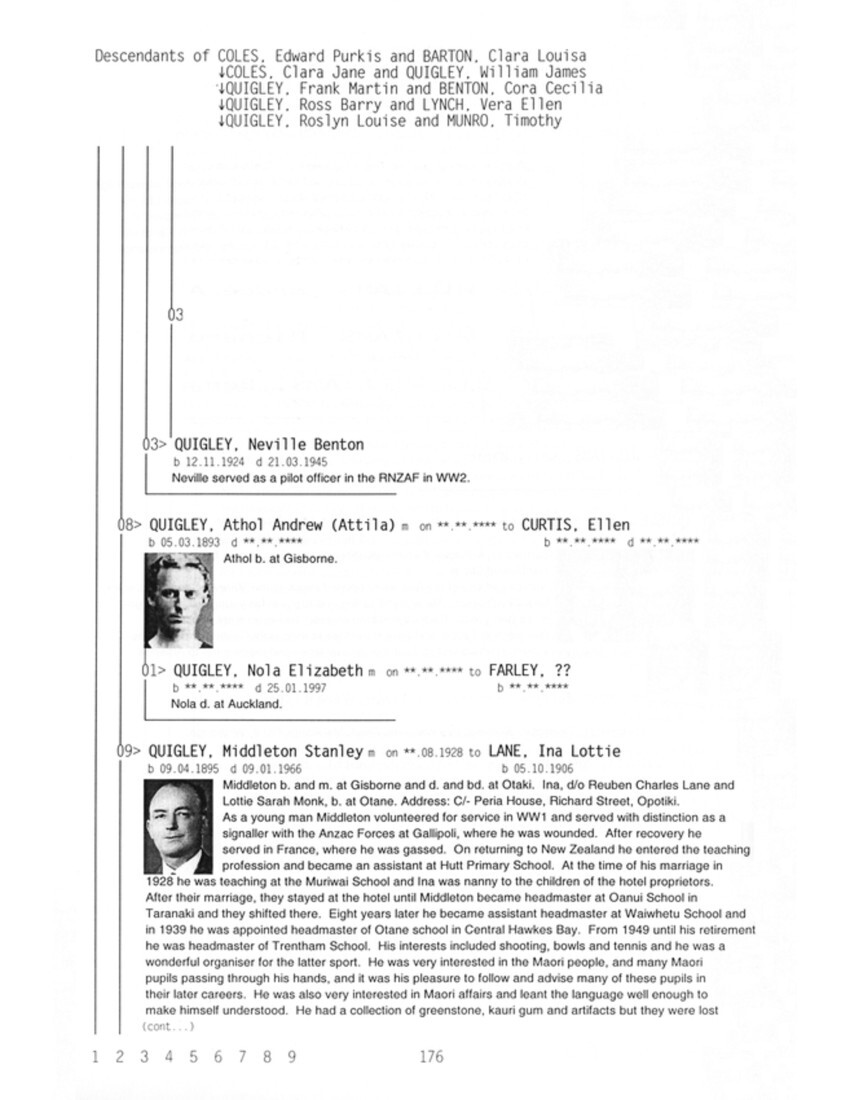
Page 177
Descendants of COLES, Edward Purkis and BARTON, Clara Louisa
COLES, Clara Jane and QUIGLEY, William James
QUIGLEY, Middleton Stanley and LANE, Ina Lottie (cont…)
when their house in Oanui burnt down. He served as president of the Otaki Bowling Club and died of a stroke on the bowling green.
Ina lived with Leo Prideaux for 25 years and changed her surname to Prideaux by deed poll. He died at age 95 and Ina, although almost deaf and almost blind, is still alert at 93.
01> QUIGLEY, Rona m on 07.09.1952 to (1)BUCKNELL, Colin Douglas
b 20.04.1929 b 04.09.1928
Rona b. at Opunake and m. at Upper Hutt. Colin, s/o Douglas Charles Bucknell and Winifred Ethel Benge, b. at Upper Hutt.
Refer to “The Descendants of David Benge and Philadelphia (Sarah) Roberts of Upper Hutt” published by Evagean Publishing in 1992 for information on Colin’s family.
[…]
01> QUIGLEY, Rona m_ on **.**.**** to (2) TRANGMAR, Frank Clarence
b 20.04.1929 b 21.04.1919 d **.**.1976
Rona m. at Auckland.
01> QUIGLEY, Rona m on 31.07.1993 to (3)GRIEVE, Leonard Robert
b 20.04.1929 b 14.05.1925
Rona m. at Hahei, Thames. Address: PO Box 487, Opotiki.
Rona went to high school in Waipawa. She lived at Upper Takaka, Nelson, during her first marriage and during her second marriage she lived and worked in Auckland. After being widowed she bought her mother’s house at Waiomu Valley on the Thames Coast. Whilst there she became a very active member of the Thames Coast Protection Society and campaigned against mining in the area. This they achieved by legal means and they have gone on to almost achieve possum control and to grow and plant native trees on the Coast. In 1989 Rona moved to Opotiki to be able to help her sister look after their mother. Since her marriage to Leonard they have lived at a local camp for five years and enjoy the freedom of their lifestyle. They are involved in several service organisations and enjoy surf fishing and whitebaiting. Rona is a member of the local art society and is well-known for her collage paintings.
02> QUIGLEY, Pamela Elaine m on 26.02.1950 to (1) WHIBLEY, Alan James
b 28.07.1930 b 27.08.1922
Pam b. at Opunake and m. at Trentham. Separated 1978. Alan b. at Te Aroha.
Alan was a builder until 1962, a dairy farmer until 1972, had an orchard at Pakowhai until 1976, was a builder in Napier until 1980 and returned to Dannevirke in 1988. He now lives on his 10-acre farmlet (cont…)
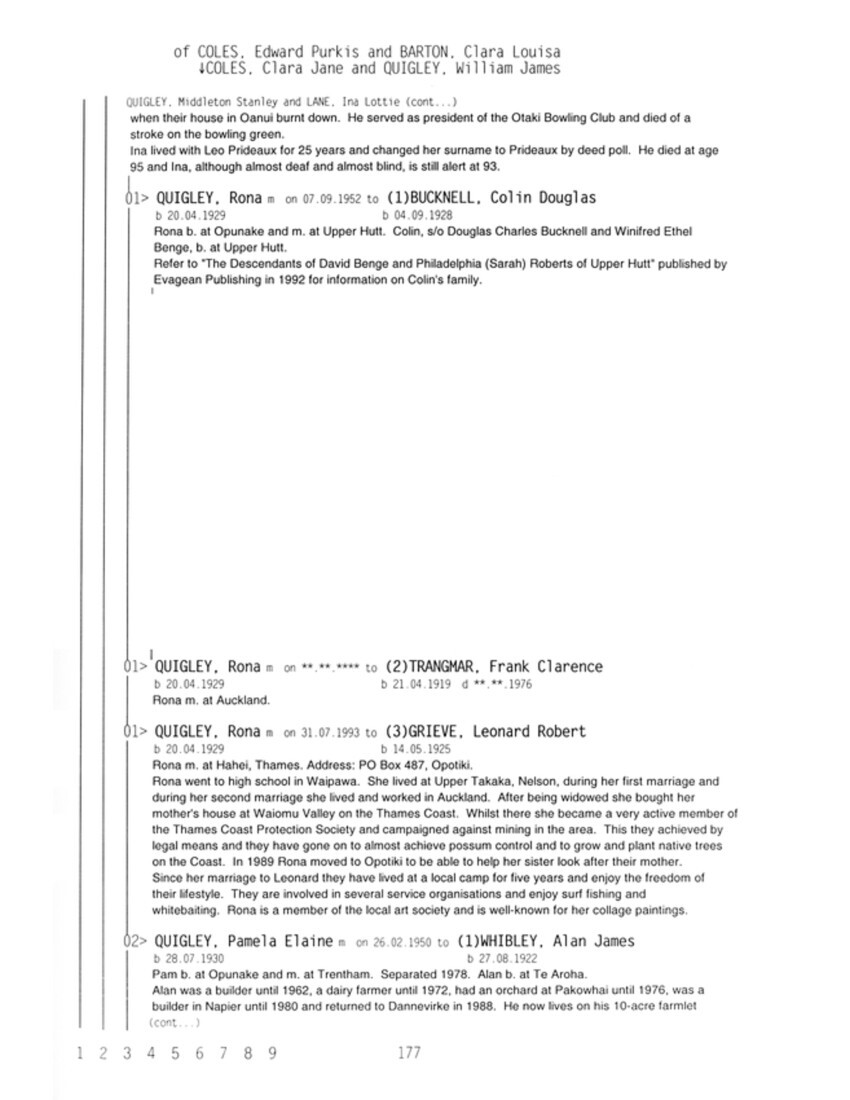
Page 180
Descendants of COLES, Edward Purkis and BARTON, Clara Louisa
COLES, Clara Jane and QUIGLEY, William James
QUIGLEY, Middleton Stanley and LANE, Ina Lottie
QUIGLEY, Pamela Elaine and WHIBLEY, Alan James
WHIBLEY, Dianne Maree and BULLED, Ross James
[…]
02> QUIGLEY, Pamela Elaine m on 22.12.1990 to (2) BELLERBY, Roger Graham
b 28.07.1930 b 09.06.1928
Address: PO Box 469, Opotiki.
03> QUIGLEY, Yvonne Audrey m on 21.02.1950 to LEE, Charles Louis
b 16.05.1932 b 23.03.1951 d 16.09.1964
Yvonne b. at Opunake. Address: Apt 7a Tower 2, 1 Marine Parade, Mount Maunganui. Yvonne started school at Waiwhetu Primary School in Lower Hutt in 1937 and continued at Otane School where her father was principal. Her secondary education was at Waipawa District High School (1945-47) and Hutt Valley High School (1947-48). She worked for a year at the State Insurance office in Wellington in 1949. Yvonne writes:
“In the 1947-48 school holidays I met Charles Lee, a widower with two very young children. My father and Charles had been at Gallipoli together and had met again in Petone at the end of 1947. At my father’s suggestion he took his children and his caravan to Kairakau Beach in Hawkes Bay for the holidays. I was 15 at the time and fell in love with him and loved his little son and daughter – he was then 55 years old. I started training college in 1950 but all I wanted was to marry Charles and give the children real family life. Eventually he agreed. Our Cynthia was born the following year, a sick premature baby, not able to come home until she was five months old. In spite of 40 years difference in our ages, the marriage was a good one. Charles developed glaucoma about 1957 and lost most of his sight, so I became his driver full-time and Cynthia went to boarding school. He died in 1964, aged 72 years.
In 1965 I went to commercial college for a few months and eventually became a computer operator with the Waterfront Industry Commission working on the early model computers. In 1969, after building a new home in Lower Hutt, I decided to stop working. At the end of that year I met Frederick Eric Williams, a widower with one teenage daughter. At that stage I was working for Burroughs Ltd at their Lower Hutt demonstration centre. I started part-time but soon became full-time and supervised all the scheduling of new customers daily use of the machine whilst waiting delivery of their own computer, plus training their operators. Eric and I became partners after his daughter’s marriage in 1975. We did numerous trips overseas, the most memorable being in the year that Eric retired. We went to London, bought a campervan and lived in it for 8% months, travelling around the United Kingdom and Europe before returning to New Zealand. We sold our houses in Lower Hutt and bought a house in Ohope in 1981, then built a new house at Ohope in 1986. Eric had heart surgery in 1993, then several small strokes, and was admitted to Golden Pond Rest Home in Whakatane in 1995. I bought an apartment at Mount Maunganui in 1996. Eric was moved by ambulance to Oakland Rest Home where he died in 1997, aged 74 years. The apartment is ideal for me and allows me to do some extensive overseas travelling.”
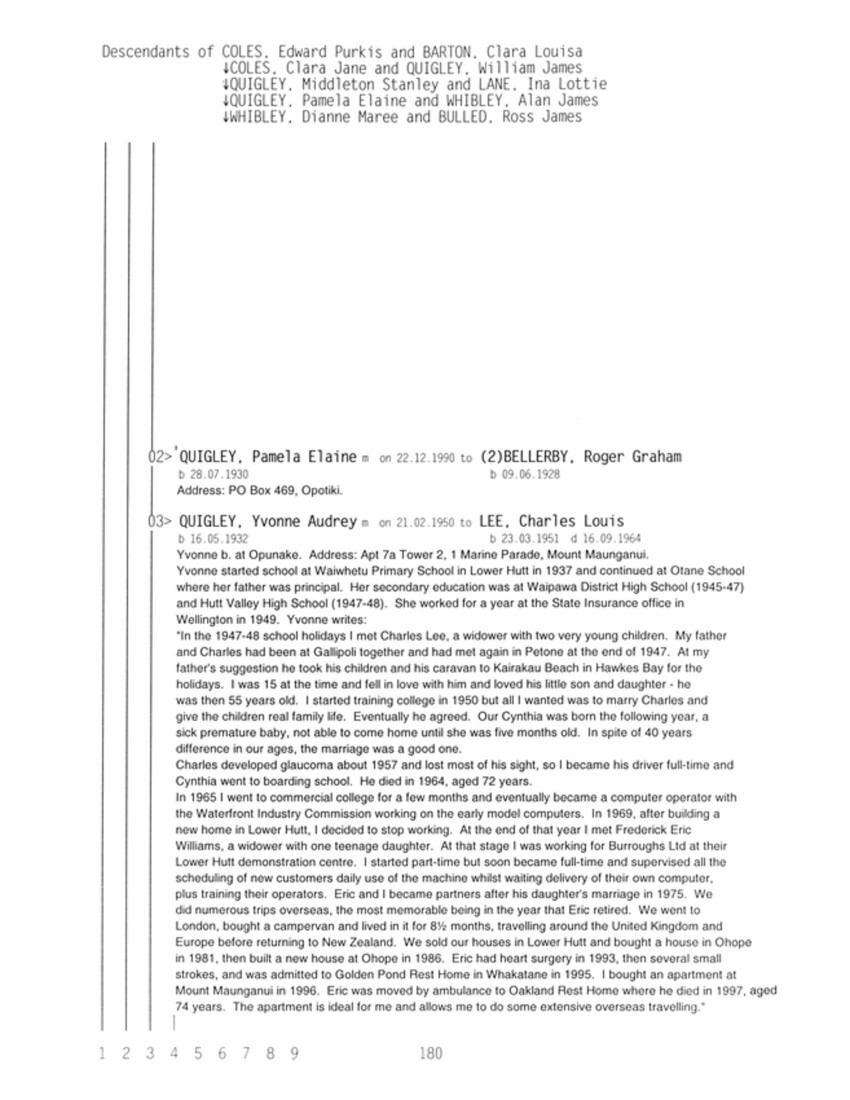
Page 182
Descendants of COLES, Edward Purkis and BARTON, Clara Louisa
COLES, Clara Jane and QUIGLEY, William James
10> QUIGLEY, Jessie Rebecca m on 30.10.1923 to KING, Arthur William Herbert
b 26.11.1897 d 15.10.1976 b 16.06.1892 d 14.03.1958
Jessica b. at Gisborne, m. at Dannevirke and d. at Napier. Herbert, s/o Henry Hastings King and Francis Mary Algar, b. at Napier.
Jessie worked in Gisborne then in Napier at Bestall and Griffin before her marriage. She was later involved in community work and helped to start the Innerwheel (Rotary) in Napier. She was also a keen gardener.
Bert was educated at Napier Main School then joined the firm of D S Laing and Sons in 1908. He later transferred to Ellison and Duncan Ltd at Port Ahuriri and was associated with them for 49 years, 35 of them as Managing Director, before retiring in 1956. In his earlier years he was a member of the Napier Garrison Band and the Hawke’s Bay Regimental Band. He also assisted other musical organisations in the city, including the Napier Orchestral Society and the Napier Frivolity Minstrels. His sporting interests included rugby, swimming and surf-lifesaving. He was an executive member of the Hawke’s Bay Rugby Union for some years and was a keen competitive swimmer with the Napier Swimming Club. In later years he devoted much of his time to the Royal Life-Saving Society with which he was associated from 1910 to 1949. He was chairman of the Hawke’s Bay Centre of the Royal Life-Saving Society from 1921 to 1949 and was president from 1944 to 1949.
Bert had a long involvement with the Napier Chamber of Commerce and served as president for two years, receiving an honorary life membership. He was a member of the Napier Rotary Club, an executive member of the Hawke’s Bay Employers’ Association, a member of the Napier Central School Committee, a director of the Napier Land, Building and Investment Society, and chairman of the Hawke’s Bay Wholesale Merchants’ Association.
01> KING, Jocelyn
b 23.08.1924 d 29.03.1992
Jocelyn b. and d. at Napier. Jocelyn was a registered music teacher. She taught at St Michael’s, Petworth, Sussex, England and at Woodford House.
02> KING, John Herbert m on 22.01.1949 to JONES, Marjorie Beth Alwyn
b 27.03.1926 b 03.08.1925 d 07.12.1999
John b. at Napier and m. at St Paul’s Church, Napier. Marjorie, d/o John Jones and Ruby May Lange, b. at Napier. Address: 317 Kennedy Road, Napier. John was educated in Napier having commenced his schooling at Napier Central School on the day of the Napier earthquake on 3rd February 1931. Owing to the extent of damage to schools and home, he was transferred to Ongaonga to live with the William Edward Coles family for the following several weeks until it was s possible o return to his home. During his time in Ongaonga he spent some time travelling through the district on a Coles Bros truck, driven by his cousin Vernon Coles, delivering materials for repairs to homes in the district. Back in Napier, John continued his education at Napier Central School, Napier Intermediate and Napier Boys’ High School.
John started work with Williams and Kettle at the head office of their Merchandise Department. This was interrupted by the war when he joined and served with the Royal New Zealand Airforce. Following discharge from the forces after the war, he rejoined Williams and Kettle and after moving up the ranks through various positions of responsibility he was appointed to the position of Manager of the company’s Waipawa Branch Merchandise, Produce and Trading Departments. He was after he had settled in and established himself in his new position that he and Marjorie were married. They settled in 4 Waipawa and took up residence in a company owned house on Windsor Hill where they remained for the next 12 years, until John was transferred back to Napier to head up the company’s Merchandise and Trading Departments at the head office.
John retired from Williams and Kettle after 44 years service. He then joined George Fistonich of Villa Maria Wines of Auckland to undertake special projects for the company and he eventually managed production and operations at their winery in Mangere. After 4 1/2 years in Auckland, he retired fully. Marjorie also started school on the day of the Napier earthquake and she was evacuated to New Plymouth with a brother. After returning to Napier she attended Nelson Park Primary School, Napier Intermediate and Napier Girls’ High School. She started work at Bestalls in Napier before moving to the Ministry of Works as a shorthand typist where she worked throughout the war years and until her marriage. (cont…)
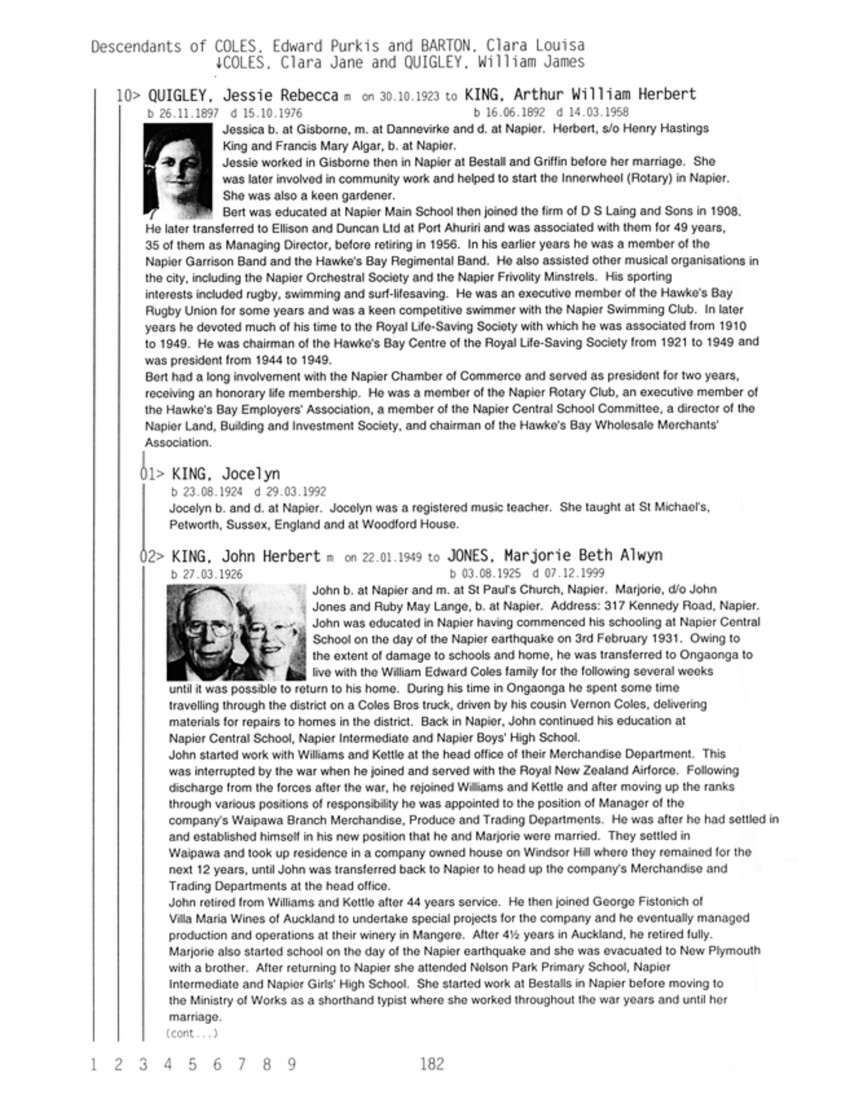
Page 183
Descendants of COLES, Edward Purkis and BARTON, Clara Louisa
COLES, Clara Jane and QUIGLEY, William James
QUIGLEY, Jessie Rebecca and KING, Arthur William Herbert
KING, John Herbert and JONES, Marjorie Beth Alwyn (cont…)
John and Marjorie enjoyed several trips overseas and numerous vacations throughout their retired life.
[…]
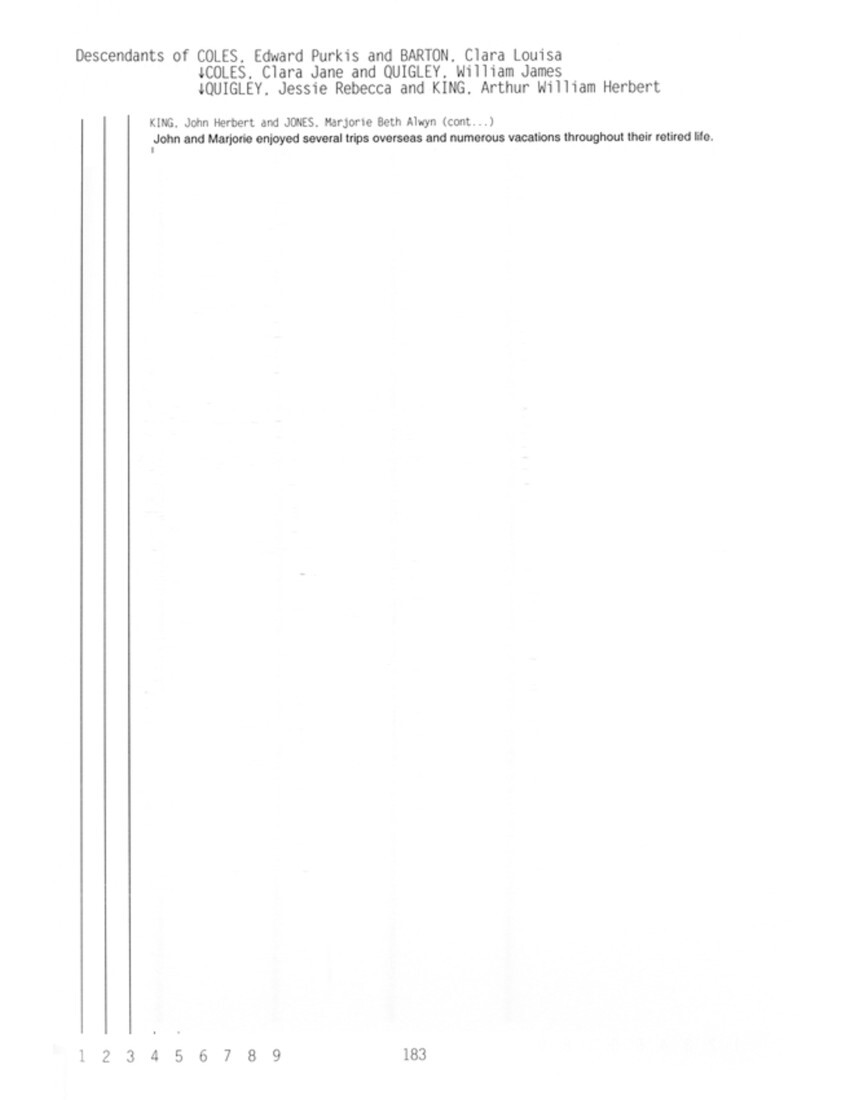
Page 184
Descendants of COLES, Edward Purkis and BARTON, Clara Louisa
COLES, Clara Jane and QUIGLEY, William James
QUIGLEY, Jessie Rebecca and KING, Arthur William Herbert
KING, John Herbert and JONES, Marjorie Beth Alwyn
KING, Joanna Margaret and DELANY, Stephen
[…]
03> KING, Audrey Ruth m on 25.11.1950 to MOATES, John Frank
b 15.08.1928 b 04.02.1929
Audrey b. and m. at Napier. Divorced. John, s/o Frank Moates and Ruth Rogers, b. at Wellington. Address: 19 Wairere Road, Torbay, Auckland.
Audrey was educated at Napier Girls’ High School then trained as a school dental nurse in Wellington. John was educated at Rongotai College and Napier Boys’ High School and worked as a nurseryman. Both are keen gardeners.
[…]
04> KING, Marjorie Alison m on 18.05.1957 to REDGRAVE, James Alister
b 17.04.1930 b 18.11.1926
Alison b. and m. at Napier. James, s/o Arthur Francis Redgrave and Evelyn Agnes Macalister, b. at Napier. Address: 22 Simla Avenue, Havelock North.
Alison was educated at Napier Central and Intermediate Schools and Napier Girls’ High School then trained at Wellington Hospital as a registered nurse. She did her maternity training at North Auckland and later worked at London the Napier.
James was educated at Mahora Primary School and Wanganui Collegiate School. For the past 46 years has worked in the family business.
[…]
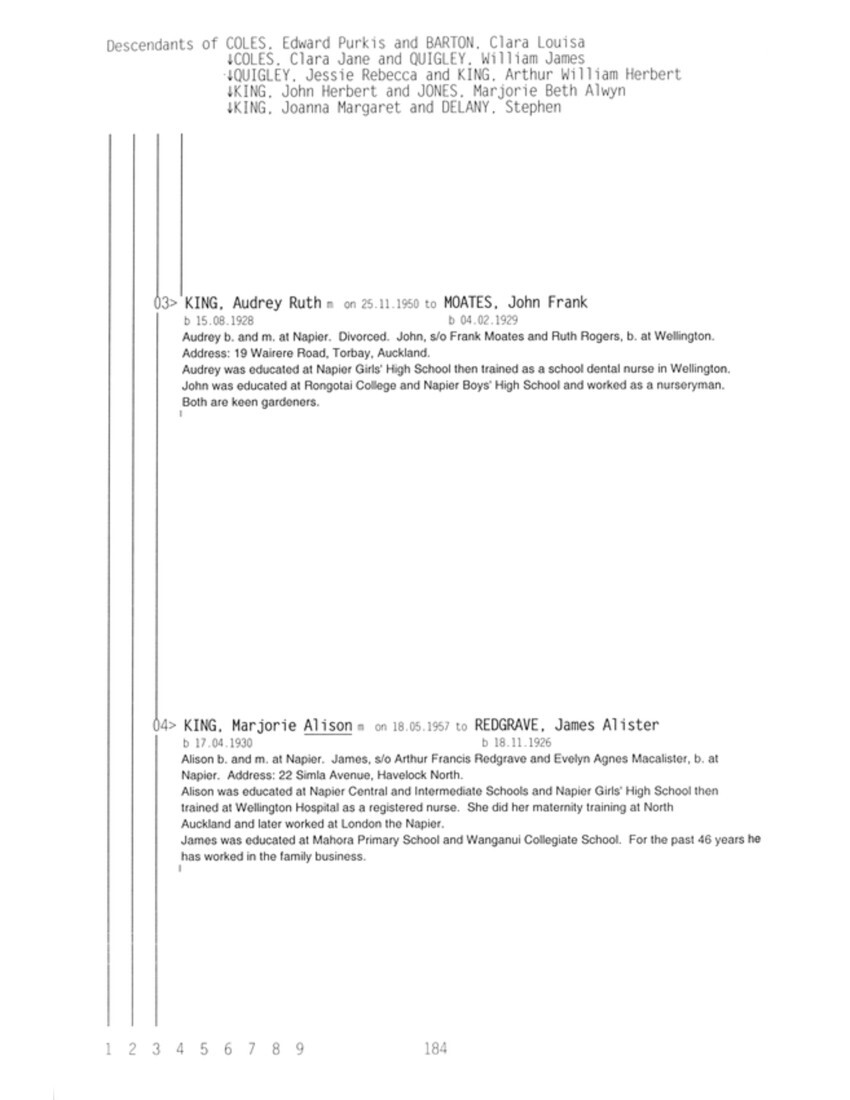
Page 186
Descendants of COLES, Edward Purkis and BARTON, Clara Louisa
COLES, Clara Jane and QUIGLEY, William James
QUIGLEY, Jessie Rebecca and KING, Arthur William Herbert
KING, David William and LIND, Mary Gwendoline (Molly)
[…]
06> KING, Dennis Edward Randle m on **.05.1969 to (1)BISHOP, Leigh
b 07.06.1942 d 14.10.1999 b 22.07.1947
Dennis b. at Napier.
06> KING, Dennis Edward Randle m on 18.03.1985 to (2)DAVIS, Jillian Louise
b 07.06.1942 d 14.10.1999 b 07.10.1945
Dennis m. at St David’s Church, Gisborne, and d. at Seapoint Road, Napier. Jillian, d/o Louis Henry Raymond Crosby and Mona Lorna Hilda Golding, b. at Gisborne. Address: 26 Seapoint Road, Napier. Dennis was educated at Napier Boys’ High School and at the age of 16 he joined the head office of Williams and Kettle at Onekawa as an office junior. A year later he transferred to the Napier branch. For the next ten years he worked as a salesman, calling on hotels, restaurants, clubs and dairies in Wairoa, Napier, Hastings and Waipukurau. At one time his area also included Taupo, and he moved the company into confectionery. He was then transferred to Gisborne and asked to sort out a few problems and became Merchandise Manager there. The Town and Country Store became a thriving concern. After 2 years with the company he sought a change and was appointed to the position of Merchandise Manager with Farmlands at the company’s head office in Hastings. For 16 years he fostered relationships with suppliers, customers and the people he worked with.
Jill was previously married to Elliott Neil Davis on 14 October 1967 at Holy Trinity Church, Gisborne. They had a son, Alistair Neil Davis, b.16.05.1973, and a son, Julian Andrew Davis, b.27.10.1974. Dennis had a love of the sea and built his own yacht. Later he owned an 18ft fibreglass launch and enjoyed fishing and water skiing. He was an active member of Rotary.
[…]
11> QUIGLEY, Olive Phillis m on **.**.**** to CROOKS David Low
b 08.03.1900 d 18.06.1990 b **.**.1904 d 28.04.1954
Olive b. at Gisborne and d. at Feilding. David b. at Kilmarnock, Scotland, d. at Dannevirke and bd. at Mangatera Cemetery.
01> CROOKS, Margaret Learmont m on 10.12.1949 to HOGG, John Quintin
b 07.02.1926 b 10.10.1925
Margaret b. and m. at Dannevirke. Quintin b. at Invercargill. Address: 12 Te Maku Grove, Waikanae.
[…]
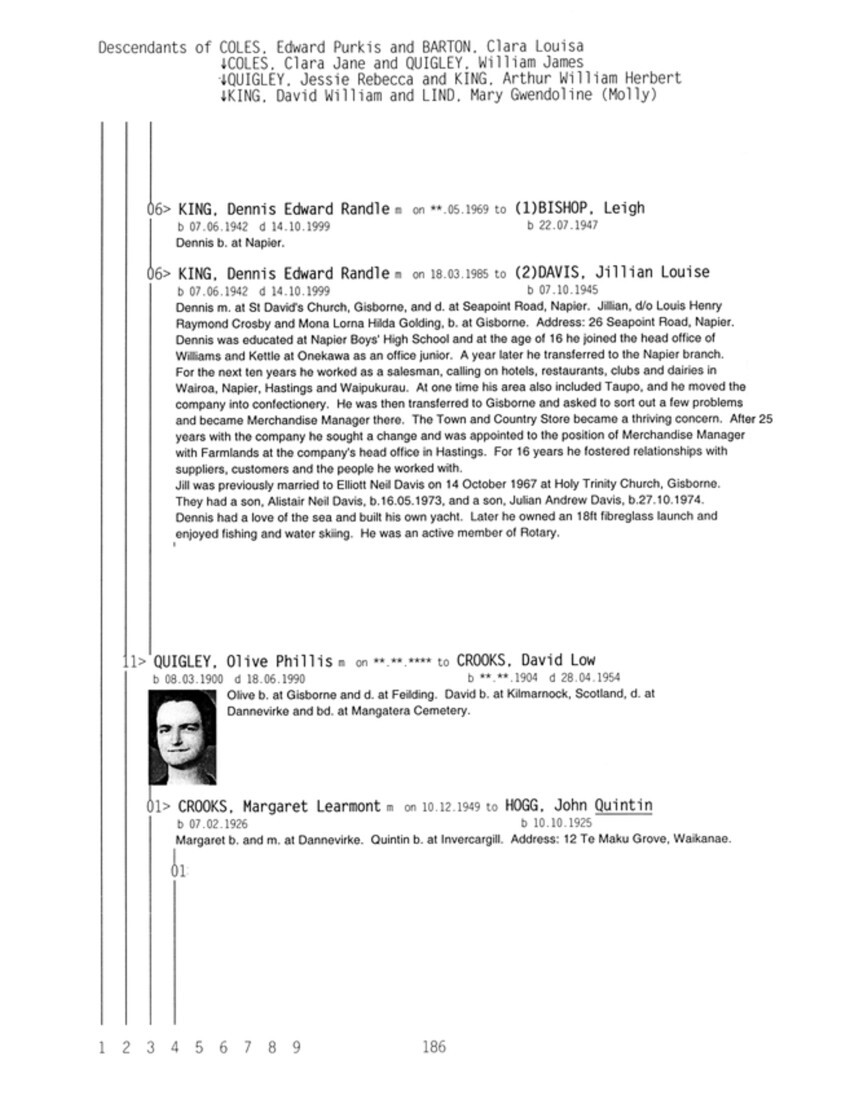
Page 189
The Descendants of Clara Jane and William James Quigley
Roger Neville WILLIAMS […], Janice Margaret WILLIAMS […] nee MILLYNN, Stephen Ross BUTLER […],
Nicola Anne (Nicky) BUTLER […] nee WILLIAMS, Mark Justin WILLIAMS […].
Photo from: Mr R Williams
Irvine James QUIGLEY (1889-1971), Olive Phillis CROOKS (1900-1990) nee QUIGLEY,
Ada Mary COMBS (1883-1966) nee QUIGLEY, Jessie Rebecca KING (1897-1976) nee QUIGLEY,
Middleton Stanley QUIGLEY (1895–1966).
Photo from: Miss V Quigley
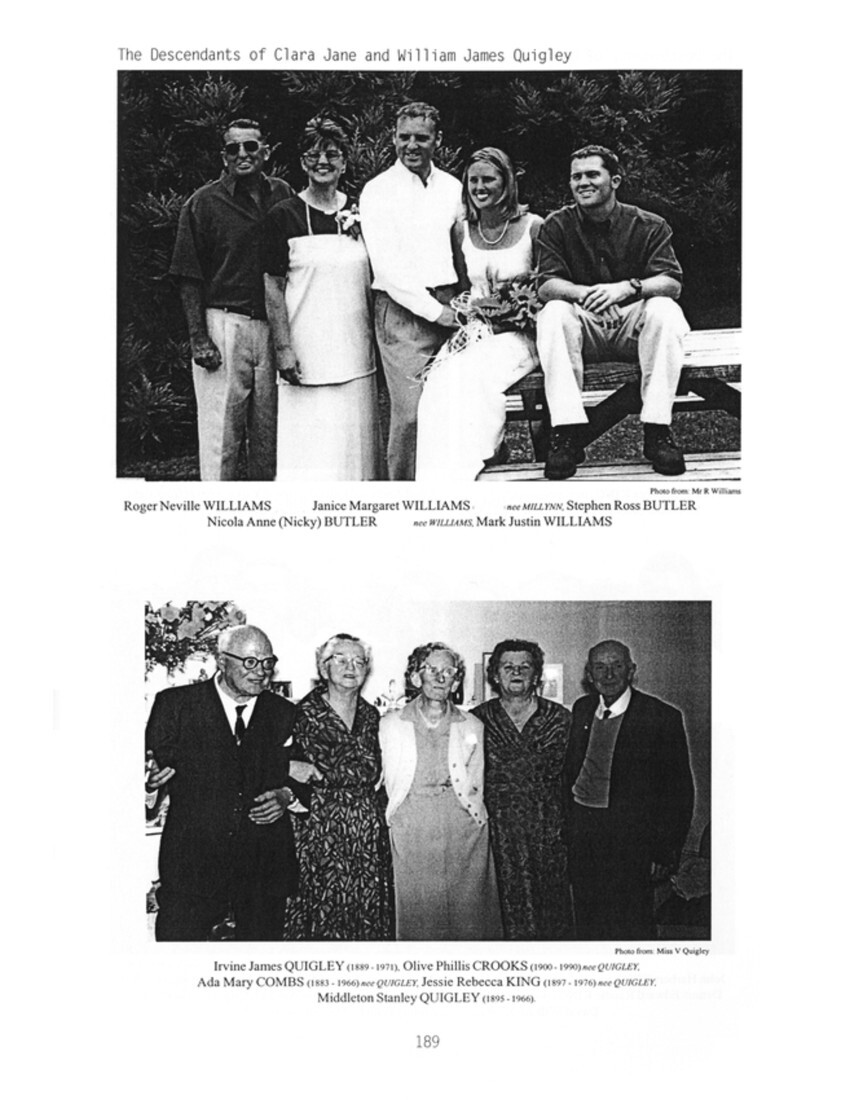
Page 190
The Descendants of Clara Jane and William James Quigley
Jessie Rebecca KING (1897-1976) nee QUIGLEY,
Olive Phillis CROOKS (1900-1990) nee QUIGLEY.
Photo from: Miss V Quigley
Athol Andrew (Attila) QUIGLEY (1893-****) at front right.
With rowing team
Photo from: Miss V Quigley
John Herbert KING (1926- ), Arthur William Herbert KING (1892-1958), Jessie Rebecca KING (1897-1976) nee QUIGLEY,
Dennis Edward Randle KING (1942-1999), Jocelyn KING (1924-1992), Marjorie Alison KING (1930- ) md REDGRAVE,
David William KING (1933- ), Audrey Ruth KING (1928- ) md MOATES.
Photo from: Mrs S E Peppiatt
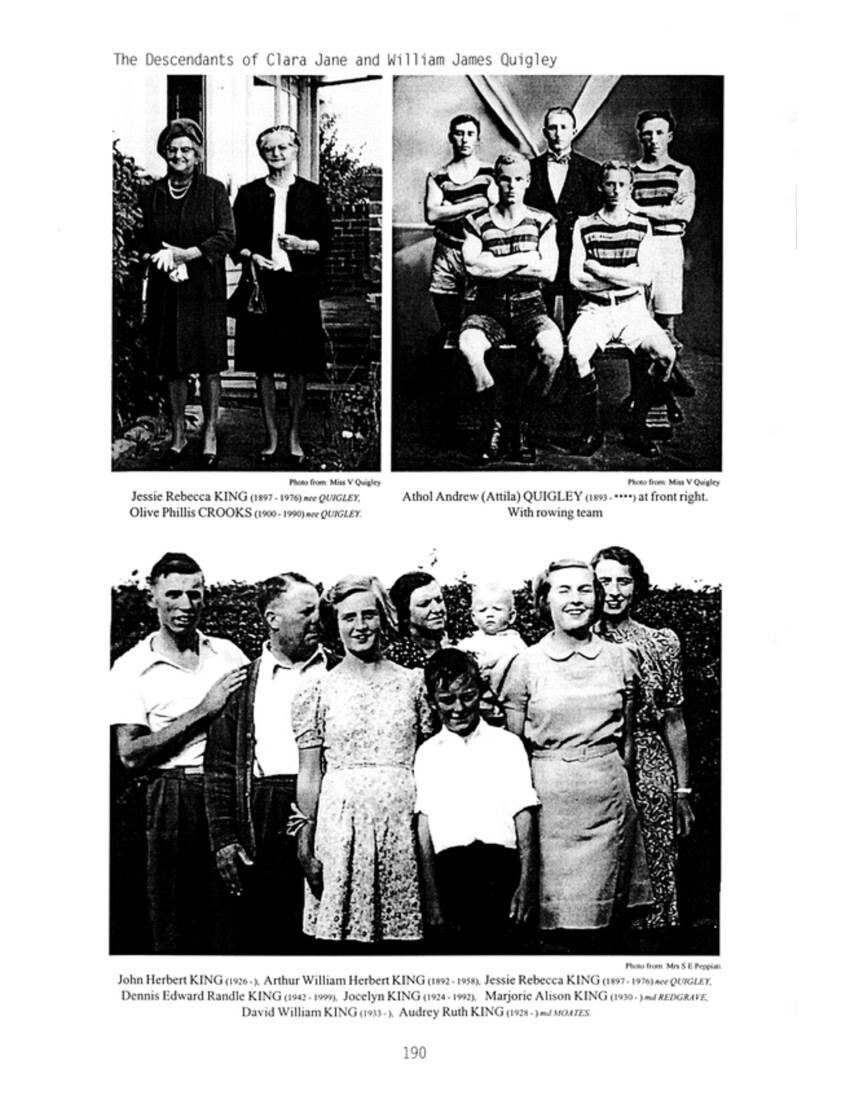
Page 191
COLES, William Edward
m to O’NEIL, Minnie Frances
Edward William Perkis
= BRETHERTON, Mary Margaret
COLES, Mary Margaret
= HARTING, Ivan Ronald
COLES, Dorothy Grace
= KELLY, Thomas Patrick
Ruth Clara
Audrey Eleanor
= KEEHAN, Thomas James
KEEHAN, William Patrick
= GOSLING, Dorothy
KEEHAN, Christopher Michael
= FLETCHER, Sarie Jennifer (Niki)
KEEHAN, Audrey Marie Therese
Emma Lavinia (Vinnie)
= (1) BRETHERTON, Joseph Bartholomew
= (2) MCLAUGHLAN, Martin Norman
Dorothy Matilda
Gladys Mabel
Gladys Winifred Mabel
COLES, William Edward = O’NEIL. Minnie Frances (cont.)
Meta Honora Vernon Francis
= BROCK, Marion Olga
COLES, David Vernon
= ROGERS, Charlotte
COLES, Peter William
= WALSHE, Teresa Mary
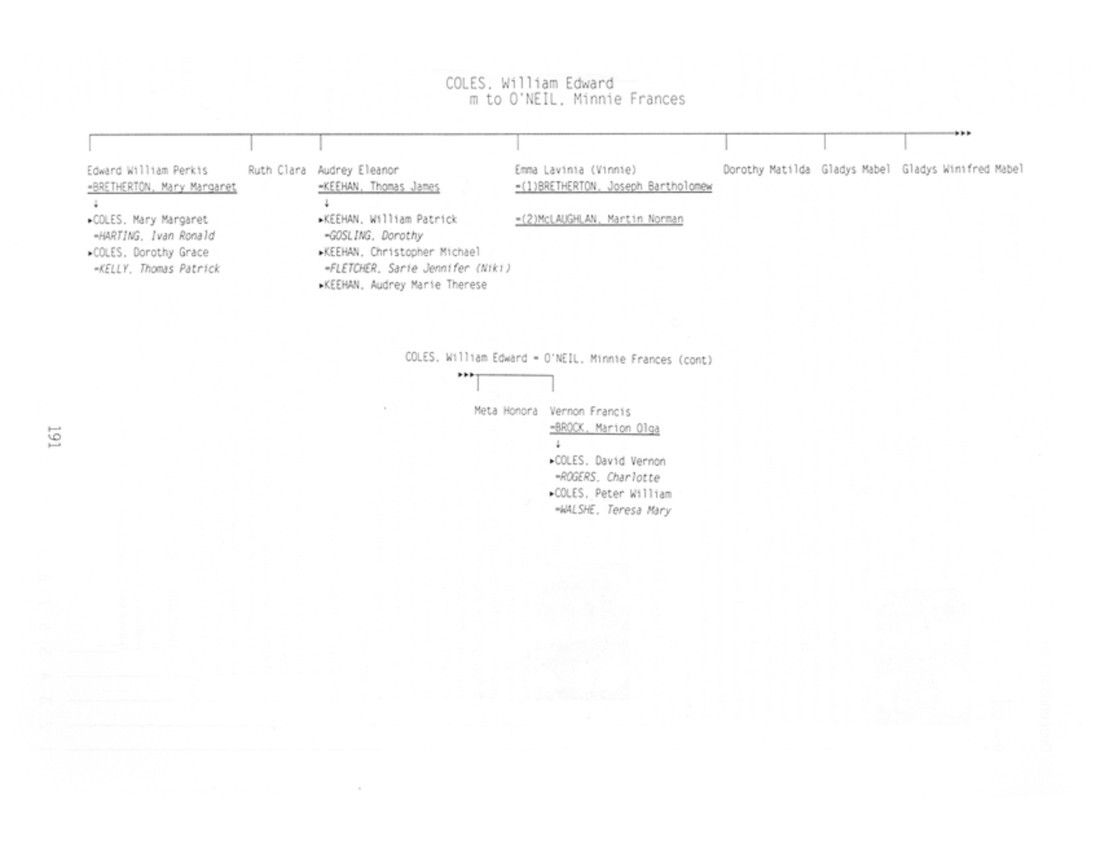
Page 192
Descendants of COLES, Edward Purkis and BARTON, Clara Louisa
COLES, William Edward and O’NEIL, Minnie Frances
05> COLES, William Edward m on 19.11.1888 to O’NEIL, Minnie Frances
b 11.04.1862 d 07.06.1942 b 17.03.1865 d 05.04.1946
William registered at Droxford, England, bap at St Jude’s Church, Southsea, England, and m. at the Church of the Sacred Heart, Hastings. Minnie, d/o Captain Francis O’Neil and Ellen Loaney, b. at Mallow, Ireland.
Minnie’s father managed an estate in Cork for an English absentee landlord. As a result of his preaching home rule for Ireland, he had to leave in a hurry and went to -™ America. Minnie came to New Zealand with her sister Julia as assisted immigrants on the ship, “Victory”, arriving at Wellington on 25 May 1884. They found work as dressmakers. It is thought that they had letters of introduction to the Ormond family, and worked in Hastings.
William was the senior partner in the firm of Coles Brothers, builders, in Ongaonga. He served his apprenticeship with his father and afterwards gained further experience with Harold Holt in Napier. He converted to Roman Catholicism in order to marry Minnie, and after they settled in Ongaonga, their household became the centre of Catholic life in the district.
William was a member of the Builders’ Union, treasurer of the Ongaonga Sports Club and a member of the local school committee.
In 1914 Minnie bought land when the Springhill Station Settlement was balloted. Springhill Station comprised 6,239 acres owned by the Rhodes brothers, Laurie, Leo and Melbourne. A total of 15 blocks were sold with Minnie buying Section 3 “Kotiri” Block 3. It comprised 363 acres of ‘2nd Class’ land and had a capital value of £4,030.
01> COLES, Edward William Perkis m on 14.04.1926 to BRETHERTON, Mary Margaret
b 22.09.1889 d 12.01.1978 b 29.06.1887 d 14.02.1962
Edward b. at Ongaonga. Mary was a sister to Joe Bretherton who married Edward’s sister, Vinnie. Ted attended Ongaonga Primary School, leaving when he was 13, then completed his secondary education by correspondence. He entered the family business in Ongaonga and learnt the trade of cabinet making but his work there was interrupted by the outbreak of WW1. He joined the Second Canterbury Regiment and fought as a machine gunner in France, seeing service in Flanders and the Battle of the Somme. During this time he suffered from gas and shrapnel wounds and a bullet wound to the shoulder.
After his return from the war, Ted continued in the family business for several years before buying a farm at Springhill. He cleared the property of scrub and developed it into a tidy and productive unit. He loved trees and nature in general, and planted many native trees on the farm. During his time on the farm he qualified in engineering and carpentry to an American standard and won a scholarship to further his studies in America but circumstances never allowed him to take up the opportunity. Ted was a very religious man, an intellectual and sensitive person with a kind and thoughtful nature. Mary was a gentle and caring person and played a supportive organising role in the family order. She was from a family of eight children and, being a woman of the old world, was a fantastic cook and very skilled at embroidery.
01> COLES, Mary Margaret m on 11.06.1949 to HARTING, Ivan Ronald
b 11.03.1927 b 05.12.1925
Margaret b. at Waipukurau and m. at St Patrick’s Church, Waipawa. Ivan, s/o William Henry Harting and Grace Matilda Freeman, b. at Wanganui. Address: 2/805 Heretaunga Street E, Hastings. Margaret was educated at Springhill Primary School and Sacred Heart Convent in Wanganui. She worked at the Palmerston North Post Office for a few years prior to her marriage.
Ivan was educated at Nukumaru and Wanganui Intermediate Schools then worked on farms before joining the Airforce in WW2. After the war he farmed a dairy unit at Tutira, later developing it into a mixed farm. He and Margaret retired to Hastings.
[…]
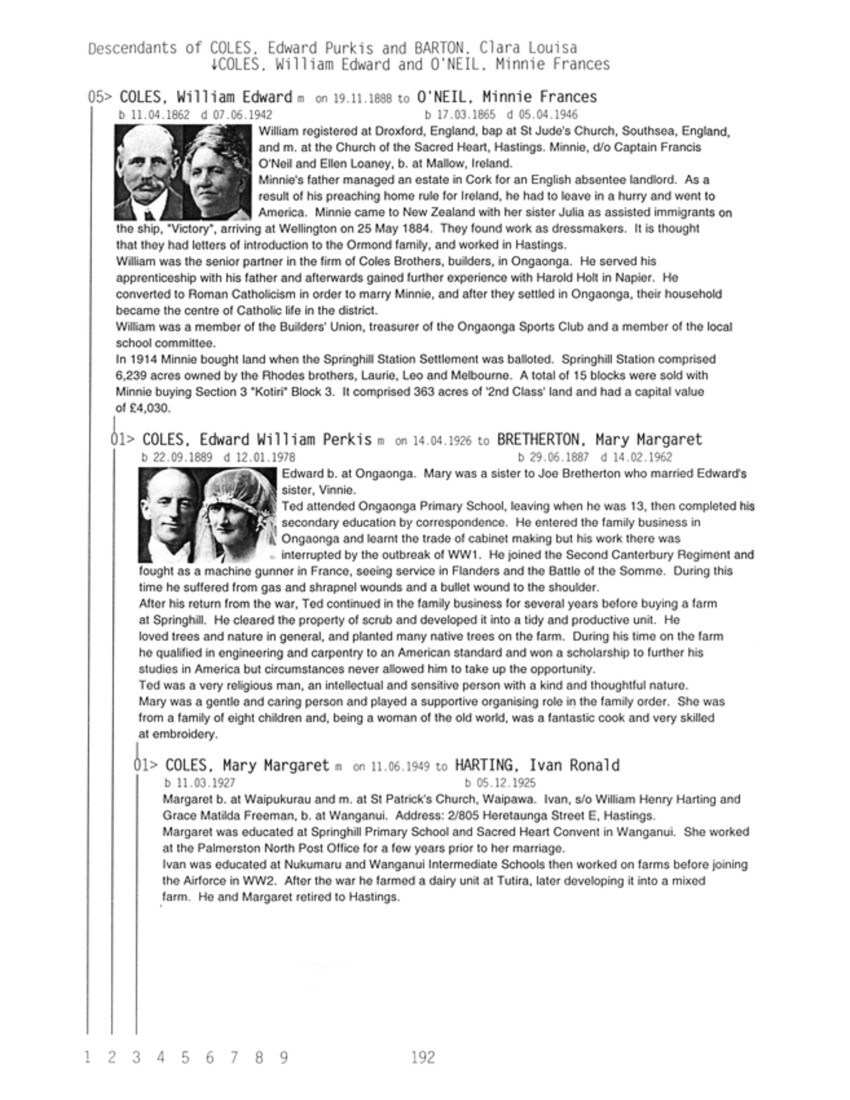
Page 194
Descendants of COLES, Edward Purkis and BARTON, Clara Louisa
COLES, William Edward and O’NEIL, Minnie Frances
COLES, Edward William Perkis and BRETHERTON, Mary Margaret
COLES, Mary Margaret and HARTING, Ivan Ronald
HARTING, Maureen Carol and LILLEY, David
[…]
02> COLES, Dorothy Grace m on 24.07.1954 to KELLY, Thomas Patrick
b 03:1271929 b 24.10.1926
Dorothy b. at Waipawa and m. at St Patrick’s Church, Waipawa. Tom, s/o William Martin Kelly and Henrietta Burke, b. at Dannevirke. Address: 7/2 Hamilton Drive, Waiuku, South Auckland. Dorothy was educated at Springhill Primary School and then went to Sacred Heart Convent in Wanganui for three years. She nursed at Hastings for a year and then at Dannevirke Public Hospital for three years where she met Tom.
Tom was educated in Dannevirke at Te Rehunga and then Dannevirke High School. He had to leave at the age of 13 to run his father’s farm when his older brothers went to the war. Tom served in the Home Guard and the Air Training Corps until the end of the war. Tom was married to Dorrie and still working on his father’s farm until his father died. He then moved with his family to Whakatane and worked in the Whakatane Board Mills for 14 years. They returned to Ongaonga and managed Dorrie’s father’s farm at Springhill for three years then moved to Waiuku where Tom worked for New Zealand Steel on the casting machine for 14 years. Their next moved was to Napier where Tom worked at Weldwell Central Store for nine years and where Dorrie resumed nursing and care of the elderly. They have now retired to Waiuku where Tom is caretaker of 15 retirement flats.
[…]
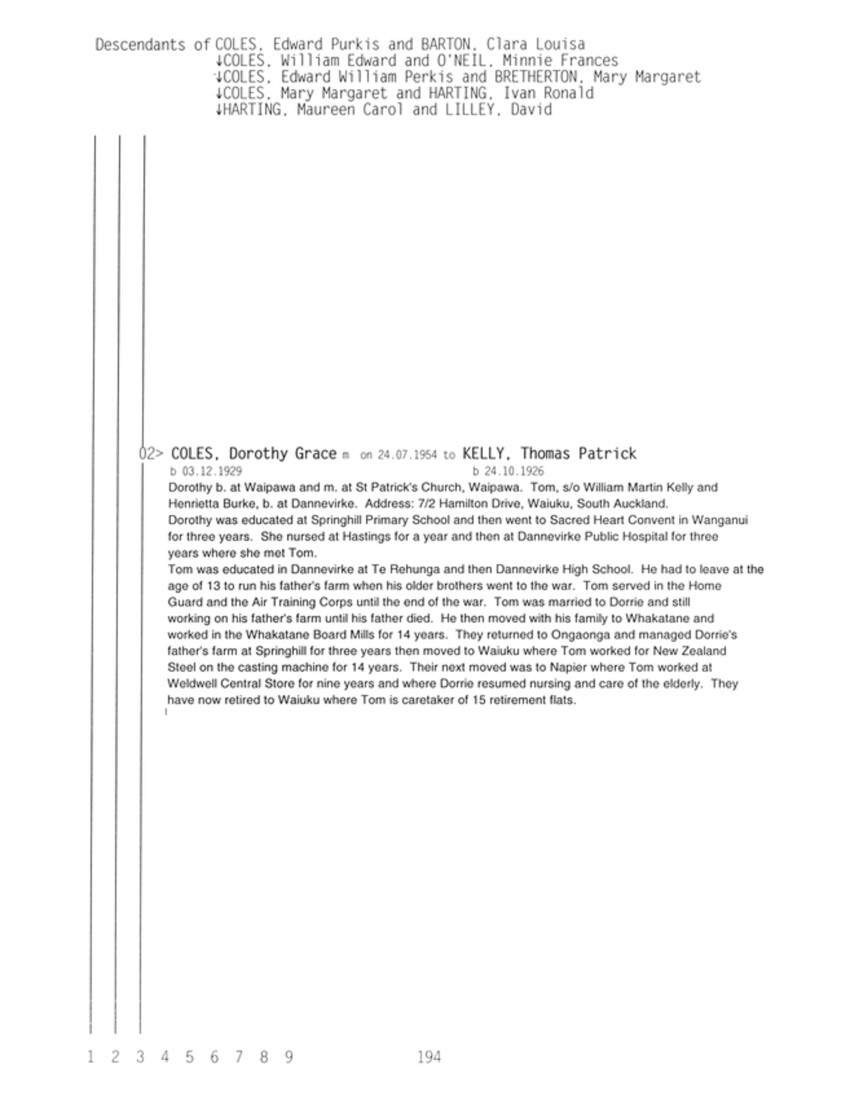
Page 195
Descendants of COLES, Edward Purkis and BARTON, Clara Louisa
COLES, William Edward and O’NEIL, Minnie Frances
COLES, Edward William Perkis and BRETHERTON, Mary Margaret
COLES, Dorothy Grace and KELLY, Thomas Patrick
KELLY, Shona Mary and METCALFE, Greg
[…]
02> COLES, Ruth Clara
b 22.09.1889 d 17.03.1942
Ruth b. and d. at Ongaonga. She kept house for her brother Vernon before he married, and then lived at home with her parents.
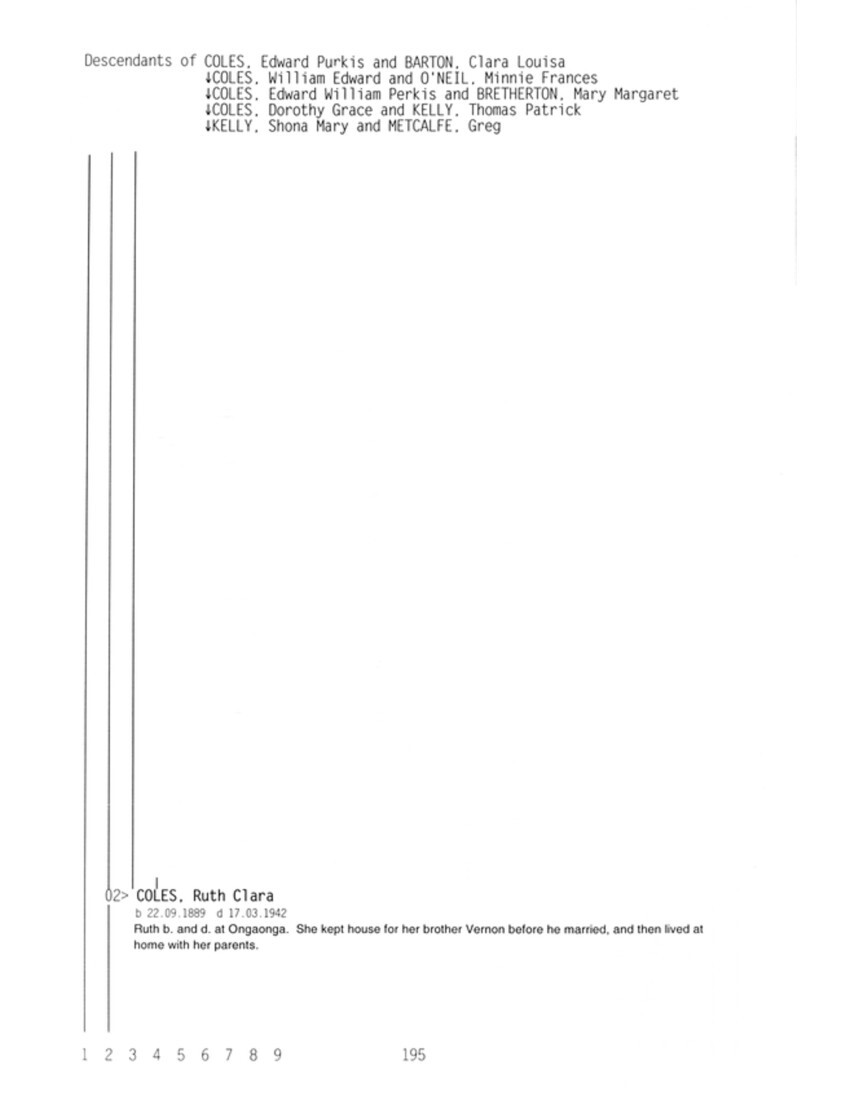
Page 196
Descendants of COLES, Edward Purkis and BARTON, Clara Louisa
COLES, William Edward and O’NEIL, Minnie Frances
03> COLES, Audrey Eleanor m on 04.05.1930 to KEEHAN, Thomas James
b 09.08.1891 d 07.08.1972 b 19.12.1886 d 31.05.1961
Audrey b. at Ongaonga and m. at Thomas’ residence at Waikokopu. Thomas was previously married on 03.12.1915 to Anne (Nancy) Fogarty who died on 13.11.1922. They had children Brigid Mary (1916-63), John Douglas (1917-42), Thomas Joseph and Kevin Barry (1921- ). Parish records show that Tom’s children, Brigid and John, were witnesses to the marriage performed by Fr Augustin Galerne, SM.
Tom initially had the barber shop in Ongaonga but sold up and later had a grocery business at Waikokopu. But when work on the railway line to Wairoa was stopped because of the depression, this radically affected the business. He was informed by his major supplier, Stephenson’s Trading Company, that the Tuai Store, where the Waikaremoana Power Project was well underway, had gone into receivership, presumably through bad management. A good eye for business by both parties, and a gentleman’s agreement with Stephenson’s, enabled Tom and his family to successfully run the Tuai Store for many years.
Before her marriage, Audrey was worked in the office of Coles Brothers joinery factory and was an excellent draughtswoman. Later, with three small children of their own, Audrey had help with the housework and also did the books for the store for many years. She was a kind and gracious mother to her step-children and, in the tradition of her own mother, strove very hard to pass on to them her deep Catholic spirituality.
Audrey and Tom retired to Westshore, Napier where Tom died in 1961 and Audrey eleven years later. They are both buried at Park Island Cemetery, Napier, and their daughter, Audrey is buried with them.
01> KEEHAN, William Patrick m on **.**.** to GOSLING, Dorothy
b **.**.**** b **.**.**** d **.**.****
Address: PO Box 584, Taupo.
Bill completed his primary education at Tuai Village then boarded with the Marist Brothers at Sacred Heart College in Auckland.
01> KEEHAN, John
b **.**.**** d **.**.****
02> KEEHAN, Michael
b **.**.**** d **.**.****
03> KEEHAN, Peter
b **.**.**** d **.**.****
04> KEEHAN, Robyn m on **.**.**** to O’NEILL, Gavin
b **.**.**** b **.**.****
Address: 39 Vogel Street, Cambridge.
01> O’NEILL, Erin
b **.**.****
62 King Street, Cambridge.
02> KEEHAN, Christopher Michael m on 19.06.1965 to FLETCHER, Sarie Jennifer (Niki)
b 17.10. 1935 d 10.06.1992 b 03.04.1944
Christopher b. at Wairoa, m. at St Francis de Sales Church, Ongaonga, d. at Greenmeadows and bd. at Pendle Hill, the Fletcher family cemetery at Wakarara. Niki, d/o Samuel James Fletcher and Annie Anice Gillespie, b. at Waipawa. Address: 18 Clement Place, Greenmeadows.
Chris completed his primary eduction at Tuai Village then went on to boarding school with the Marist Brothers at Sacred Heart, Auckland. He studied for year at the University a Canterbury then worked as a draughtsman for the Hydro Electricity Department. He spent several years in the Police Force before buying into Napier Taxis.
Chris and Niki were the last couple to be married in the Church of St Francis de Sales in Ongaonga in June 1965. This was appropriate as the both came from early pioneering families in the district. (cont…)
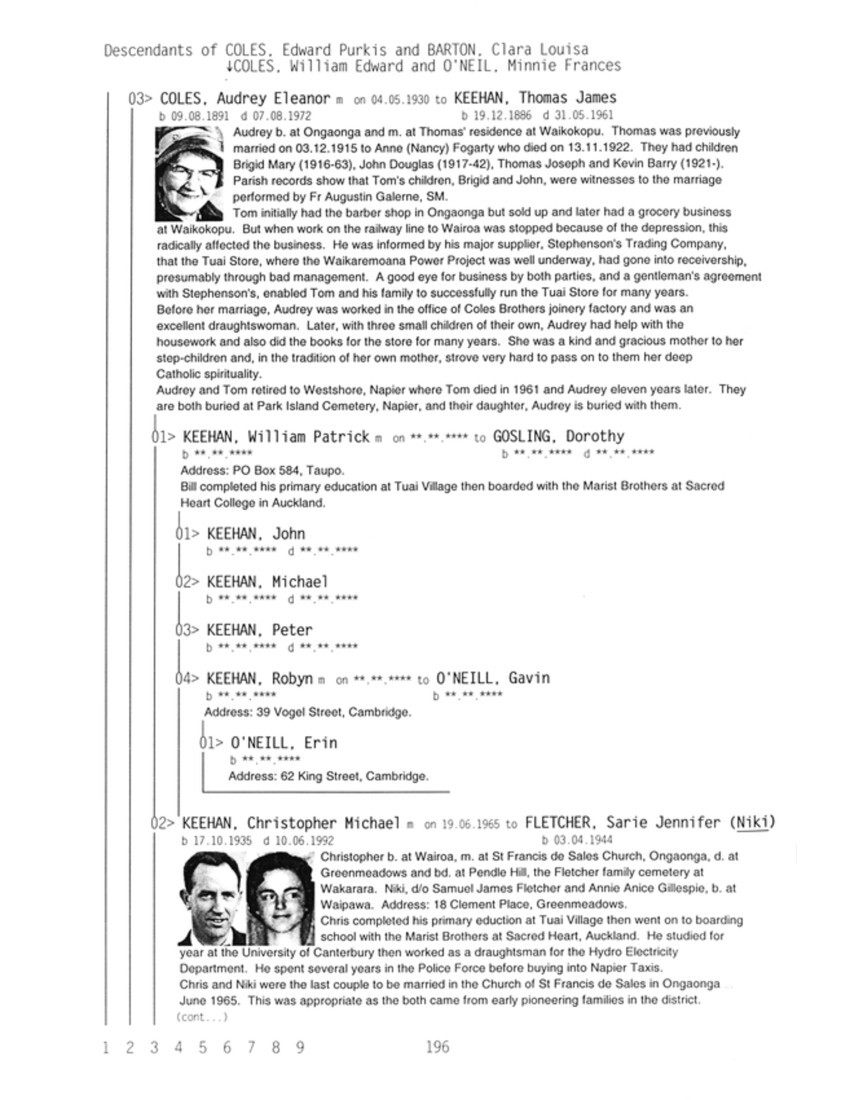
Page 197
Descendants of COLES, Edward Purkis and BARTON, Clara Louisa
COLES, William Edward and O’NEIL, Minnie Frances
COLES, Audrey Eleanor and KEEHAN, Thomas James
KEEHAN, Christopher Michael and FLETCHER, Sarie Jennifer (Niki) (cont…)
Chris worked at various owner operated businesses in Napier until 1981 when, with a family of five they moved to the Pakowhai Store on the main road between Napier and Hastings. They ran a good business with the help of their children, in the tradition of Tom and Audrey. At Pakowhai Chris did the books and managed the petrol sales whilst Niki minded the shop and kept house. They traded well through the difficult 1980s, Sunday opening of supermarkets, deregulation of the petrol retailing industry and the closure of Whakatu meat works.
Niki now lives at Greenmeadows where she is a sometime writer and a keen gardener. She works for Presbyterian Support and is involved with St Mary’s parish in Greenmeadows.
[…]
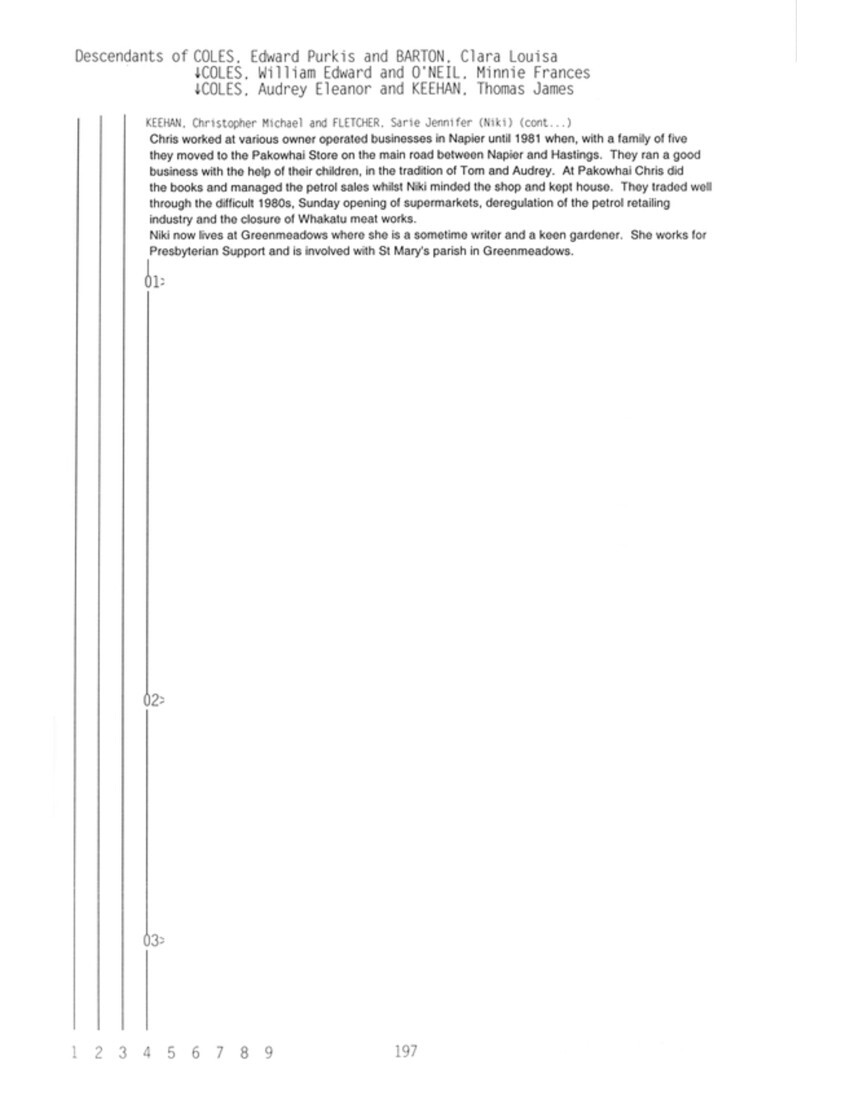
Page 198
Descendants of COLES, Edward Purkis and BARTON, Clara Louisa
COLES, William Edward and O’NEIL, Minnie Frances
COLES, Audrey Eleanor and KEEHAN, Thomas James
KEEHAN, Christopher Michael and FLETCHER, Sarie Jennifer (Niki)
[…]
03> KEEHAN, Audrey Marie Therese
b 23.01.1931 d 26.11.1988
Audrey was educated at Tuai Primary School then boarded at Sacred Heart College in Napier and later at St Mary’s College in Wellington on account of their art department. She worked as a law clerk in Napier and spent some years working for the Third Order of St Francis in Auckland where she pursued her painting interests. An exhibition of her religious art was well received by “Zealandia” in 1965.
The best of her works are hung in the parish hall of the Sacred Heart Parish in Hastings, and in the stairwell of the Barbier Block at Sacred Heart College in Napier where Audrey was a boarding pupil.
04> COLES, Emma Lavinia (Vinnie) m on **.**.1939 to (1) BRETHERTON, Joseph Bartholomew
b 01.05.1894 d 06.06.1979 b**.**.**** d **.**.1942
Lavinia b. at Ongaonga, bap. by Fr M A Keegan, and d. at Napier. Joseph died of a brain tumour three years after his marriage to Vinnie.
Joseph was a farmer and after his death, Vinnie attempted to run the farm on her own.
04> COLES, Emma Lavinia (Vinnie) m on **.**.**** to (2) MCLAUGHLAN, Martin Norman
b 01.05.1894 d 06.06.1979 b **.**.**** d **.**.****
Lavinia d. at Napier. Martin was the manager on Joe Bretherton’s farm.
05> COLES, Dorothy Matilda
b, **. ** 1896 d **.**. 1983
Dorothy b. at Ongaonga, bap. by Fr P Power, and d. at Dunedin. Dorothy was a teaching sister, M Camillus of the Dominican Order. She made her full profession in 1920 and taught mainly in the Otago province. She celebrated the Golden Jubilee of her profession in 1970 and her Diamond Jubilee in 1980.
06> COLES, Gladys Mabel
b **.**.1896
Gladys b. and d. at Ongaonga. She was baptised by Fr P Power.
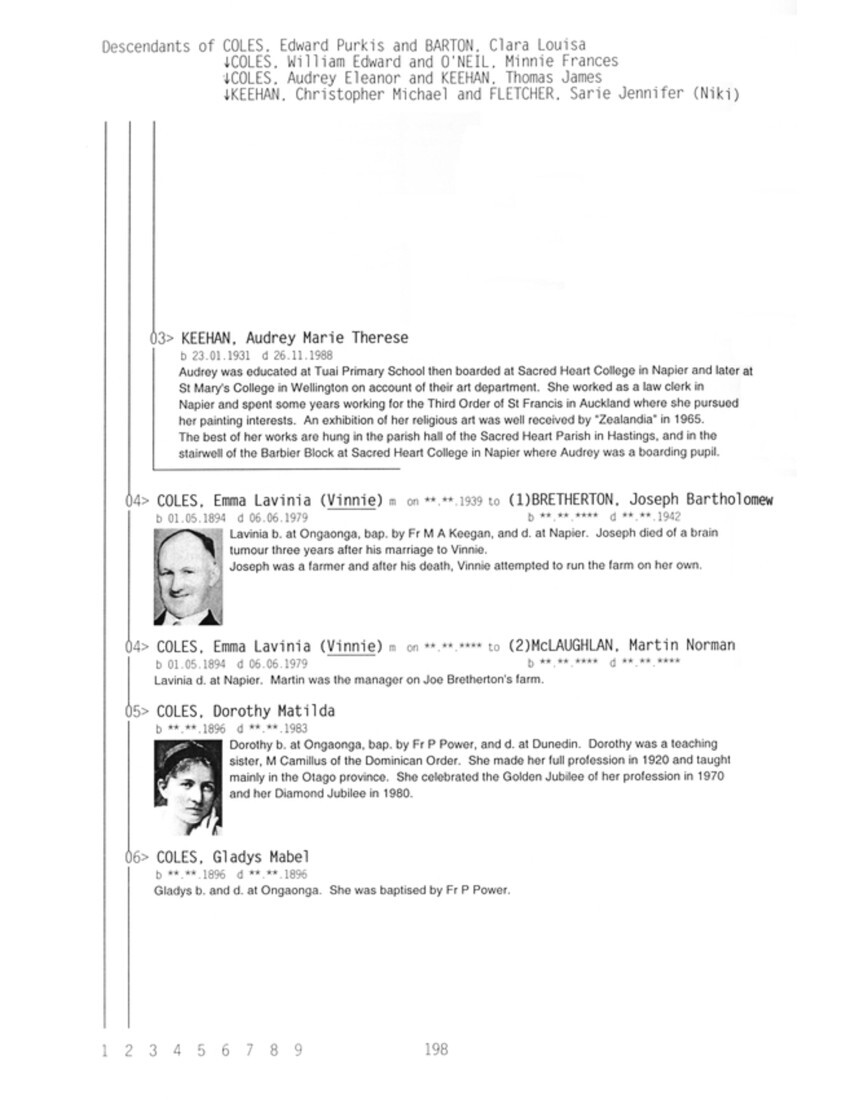
Page 199
Descendants of COLES, Edward Purkis and BARTON, Clara Louisa
COLES, William Edward and O’NEIL, Minnie Frances
07> COLES, Gladys Winifred Mabel
b **.**.1899 d 14.06.1975
Gladys b. at Ongaonga. She was sister M Gonzaga of the Order of St Joseph and was a music teacher in Hawera and later in Waipawa.
08> COLES, Meta Honora
v **.**. 1901 d 20.02.1955
Meta b. at Ongaonga and bap. by Fr P Power. She worked in the office of Coles Brothers joinery factory and then was the postmistress in Ongaonga for many years. She played the organ at the Catholic Church.
09> COLES, Vernon Francis m on 20.07.1940 to BROCK, Marion Olga
b 29.08. 1903 d 24.10.1994 b 29.07.1911 d 15.03.1971
Vernon b. at Ongaonga, m. at St Mary’s Catholic Church, Wanganui, d. at Hastings and bd. at Waipawa Cemetery. Marion, d/o Humphrey Ogle Brock and Mary Alice Waddington, b. at Feilding. Vernon was educated at Ongaonga Primary School and Sacred Heart College, Auckland. After leaving school, he worked for a time at the Coles factory helping his father with many tasks including that of undertaker. His mother Minnie had bought 363 acres of the Springhill Station and Vernon farmed this land for the rest of his working life. He developed the land by clearing scrub and removing stumps. Initially he milked cows but later farmed mainly sheep. He met and married Marion when she was teaching at the Ongaonga Primary School. Marion died after a short battle with cancer and they son Peter and his new wife, Teresa, lived with Vernon until their new house was completed. Vernon remained on the farm, helping Peter who eventually took over the farm.
In 1988 Vernon bought a flat in Hastings but at this stage his health was not the best. He had to inject himself every day for diabetes and he had pernicious anaemia and poor eysight but his spirits were always high. In 1989 he suffered a slight stroke which necessitated a move to Otatara Heights Rest Home in Taradale for a time, until there was a vacancy at the Little Sisters of the Poor Rest Home in Hastings. It was there that he lived until his death at the age of 91.
01> COLES, David Vernon m on 05.11.1973 to ROGERS, Charlotte
b 10.06.1942 b 01.10.1946
David b. at Waipawa and m. at St Michael’s Catholic Church, Rotorua. Charlotte, d/o Rawiri Rogers and Hera Wiipiti, b. at Cambridge. Address: Ohurakura Road, RD 2, Napier.
David was educated at Springhill Primary School and St Patrick’s College, Silverstream (1955-58). On leaving school he worked for his father for two years then worked as a shearer in the North and South Islands for the next 12 years. In 1972 he purchased 540 acres at Te Pohue, running sheep and beef cattle. In 1990 he purchased another 260 acres adjoining and is now running mostly deer with supporting sheep and cattle.
Charlotte was brought up with her grandfather and attended Otaua Primary School near Kaikohe then went to Spotswood College, New Plymouth, whilst boarding at Rangiatea Maori Girls’ Hostel. She trained for 18 months at Ardmore Teachers’ Training College then spent 2 1/2 years with the Tourist and Publicity Department in Rotorua. She met David when she was on a working holiday with Barry Baker’s shearing gang.
David enjoys fishing and golf and Charlotte’s interests are travel, gardening and golf. She has been involved in local community affairs for a number of years.
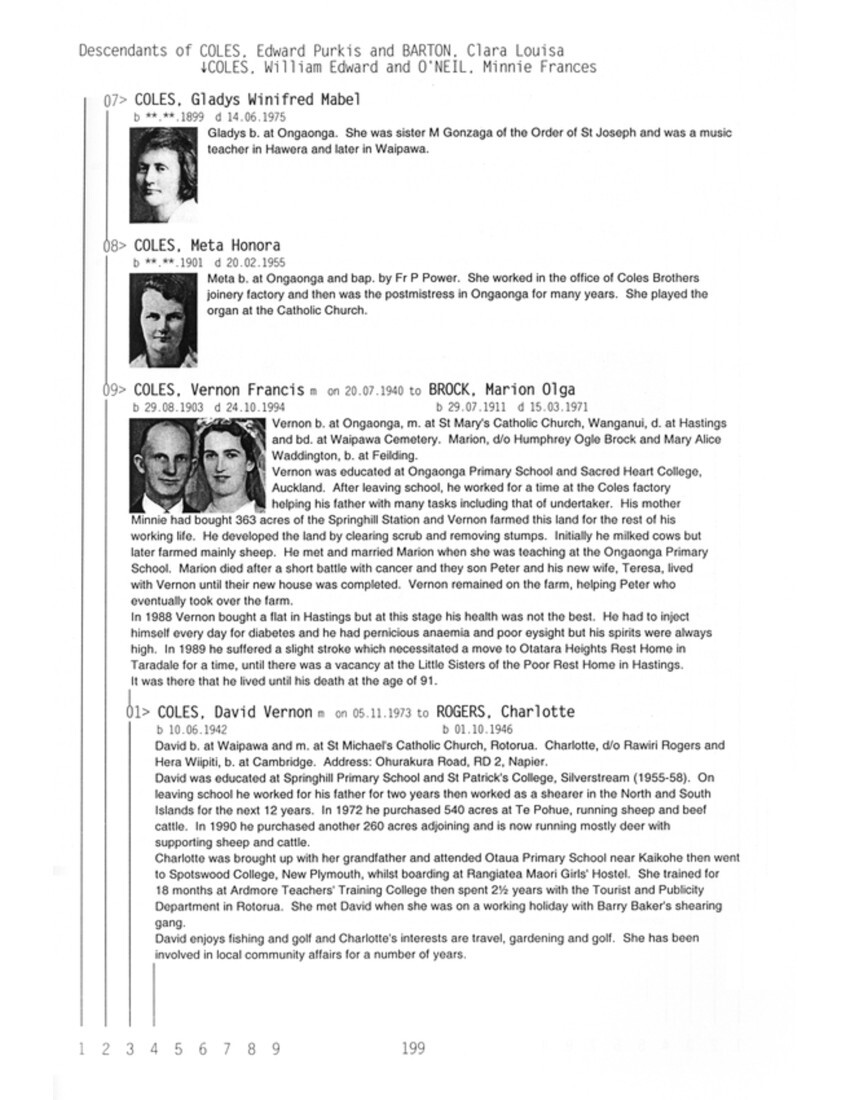
Page 200
Descendants of COLES, Edward Purkis and BARTON, Clara Louisa
COLES, William Edward and O’NEIL, Minnie Frances
COLES, Vernon Francis and BROCK, Marion Olga
COLES, David Vernon and ROGERS, Charlotte
[…]
02> COLES, Peter William on 21.11.1970 to WALSHE, Teresa Mary
b 22.06.1944 b 10.06.1944
Peter b. at Waipawa and m. at St Joseph’s Church, Dannevirke. Teresa, d/o Michael Joseph Walshe and Dorothy Lavinia (Billie) Mabbett, b. at Dannevirke. Address: Wakarara Road, RD 2, Ongaonga, Hawkes Bay.
Peter grew up on the family farm at Springhill, on the banks of the Waipawa River about 20 kilometres north west of Waipukurau. His formal education was initially at Springhill Primary School, just a short distance from his home, and then as a boarder at St Patrick’s College, Silverstream, for about three years. After leaving school, Peter remained at home working on the family farm, and also for a time cropping for a local Ongaonga farmer. A member of the Tikokino Young Farmers’ Club, Peter held positions as secretary/treasurer and chairman. He was also a keen footballer, playing for the local Onga Tiko Club, and he first met Teresa after an inter-provincial match in Napier in 1969.
Teresa was educated at Umutaoroa Primary School, St Joseph’s Convent in Dannevirke and then at Dannevirke High School for 2 1/2 years. She learnt Highland dancing for eight years, dancing at concerts and A&P Shows. After leaving school, she worked in the home for a time before taking a part-time position in the Post Office store at Mangatera, Dannevirke. She joined the local Operatic and Choral Society and took parts in several productions including The Mikado, The Boyfriend, Sweethearts and The Desert Song. She was also a member of the Ruahine Country Girls’ Club where she served as secretary, treasurer, vice-chairperson, chairperson and district chairperson. She took part in debating, speaking and drama competitions. From 1968 to 1970, Teresa also taught Christian doctrine at the Dannevirke Convent on one day a week.
After their marriage, Peter and Teresa lived on the farm at Springhill with Peter’s father (his mother was terminally ill at that time). Eventually Peter took over the farm. Initially he raised sheep, a few cattle, and grew crops of wheat, barley and peas, firstly for Watties and later for Growers then McCains Canneries at Hastings. Later the sheep flock was disposed of in favour of more beef cattle. He also does contract harvesting and round hay bailing, in addition to running the farm.
Teresa became involved with the Wakarara Country Women’s Institute and has served on the committee as well as being president and treasurer. In 1998 she received their 25-year Gold Service Badge. As the children grew, Teresa became involved with the Ongaonga Playcentre and served as secretary during 1978-80, and also as a supervisor for two terms. After the girls started school she helped with Brownies and Guides and served as treasurer of the Onga-Tiko sub-branch.
Peter served on the Springhill School Committee for several years and was chairman for eight years. Later he took on this position again prior to the closure of the school in August 1993. Teresa compiled and had printed a book, “The Last Years”, after the closure of the school.
Peter’s interests included flying and small-bore rifle shooting until golf took over. At present Peter and Teresa both play golf at the Ongaonga Golf Club and both are on the committee. Peter has served as club captain for two years and is also on the Ongaonga Domain Board.
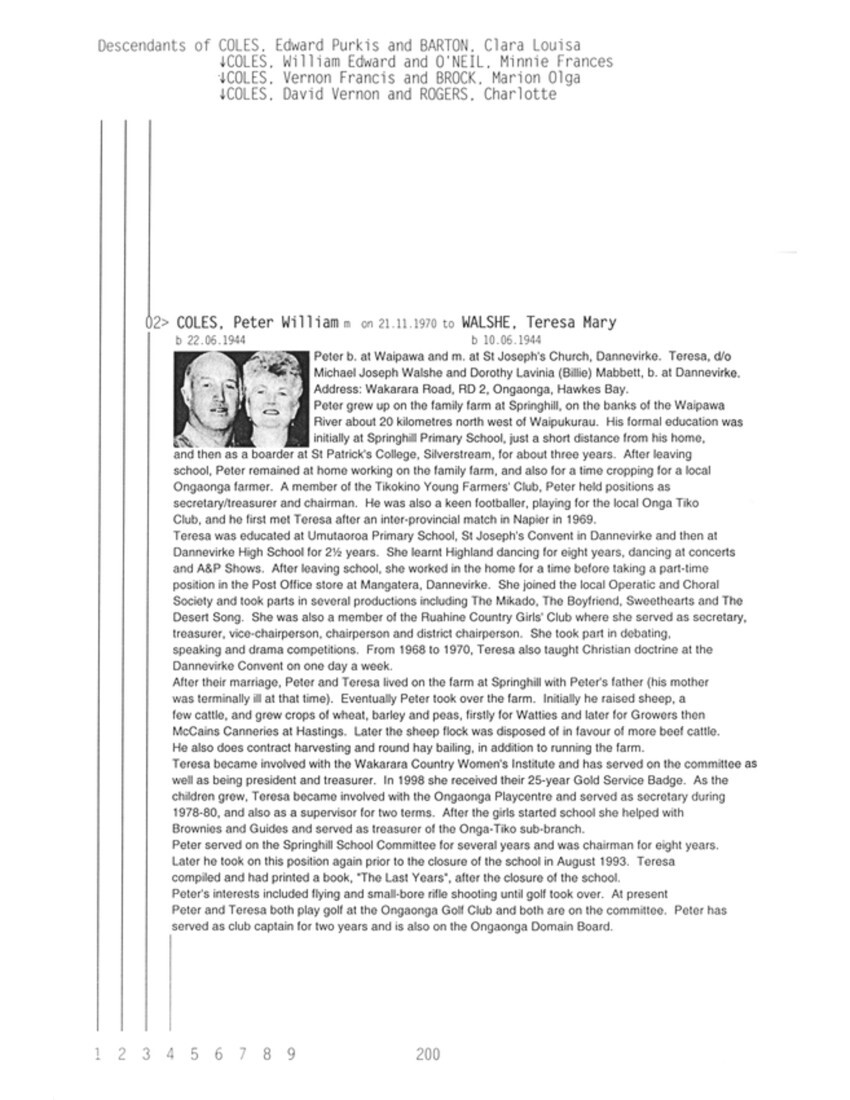
Page 202
Descendants of COLES, Edward Purkis and BARTON, Clara Louisa
COLES, William Edward and O’NEIL, Minnie Frances
COLES, Vernon Francis and BROCK, Marion Olga
COLES, Peter William and WALSHE, Teresa Mary
[…]
Gavin WINCHESTER (****- ),
Bridgette Therese WINCHESTER ([…]) nee COLES,
Caitlyn Rose WINCHESTER ([…]),
Teresa Mary COLES (1944- ) nee WALSHE,
Peter William COLES (1944- ),
Christina Marion COLES […]).
Photo from: Mr P W Coles
Angela Mary COLES ([…]).
Photo from: Mr P W Coles
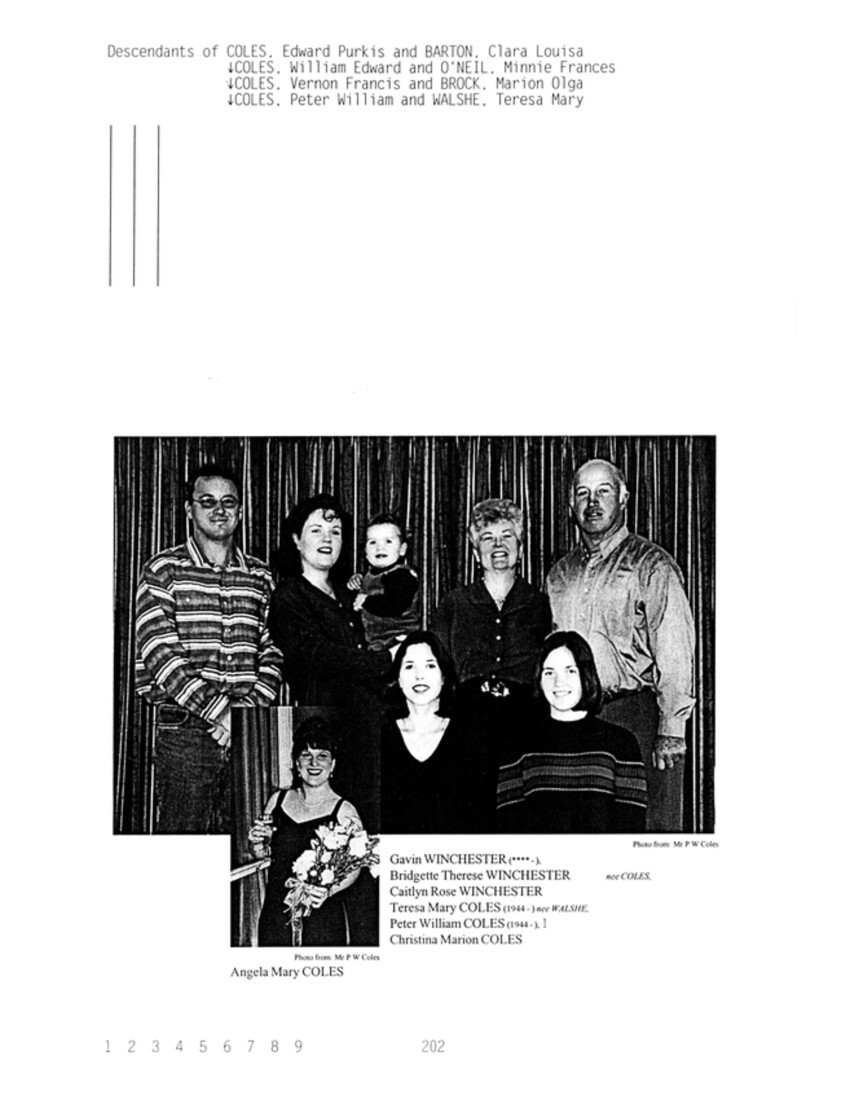
Page 203
The Descendants of William Edward and Minnie Francis Coles
Guide Rangi at Whakarewarewa
William Edward COLES (1862-1942),
Minnie Frances COLES (1865-1946) nee O’NEIL,
Ruth Clara COLES (1889-1942), Vernon Francis COLES (1903-1994),
Meta Honora COLES (1901-1955).
Photo from: Mrs M Harting
Vernon Francis COLES (1903–1994).
Photo from: Mr P W Coles
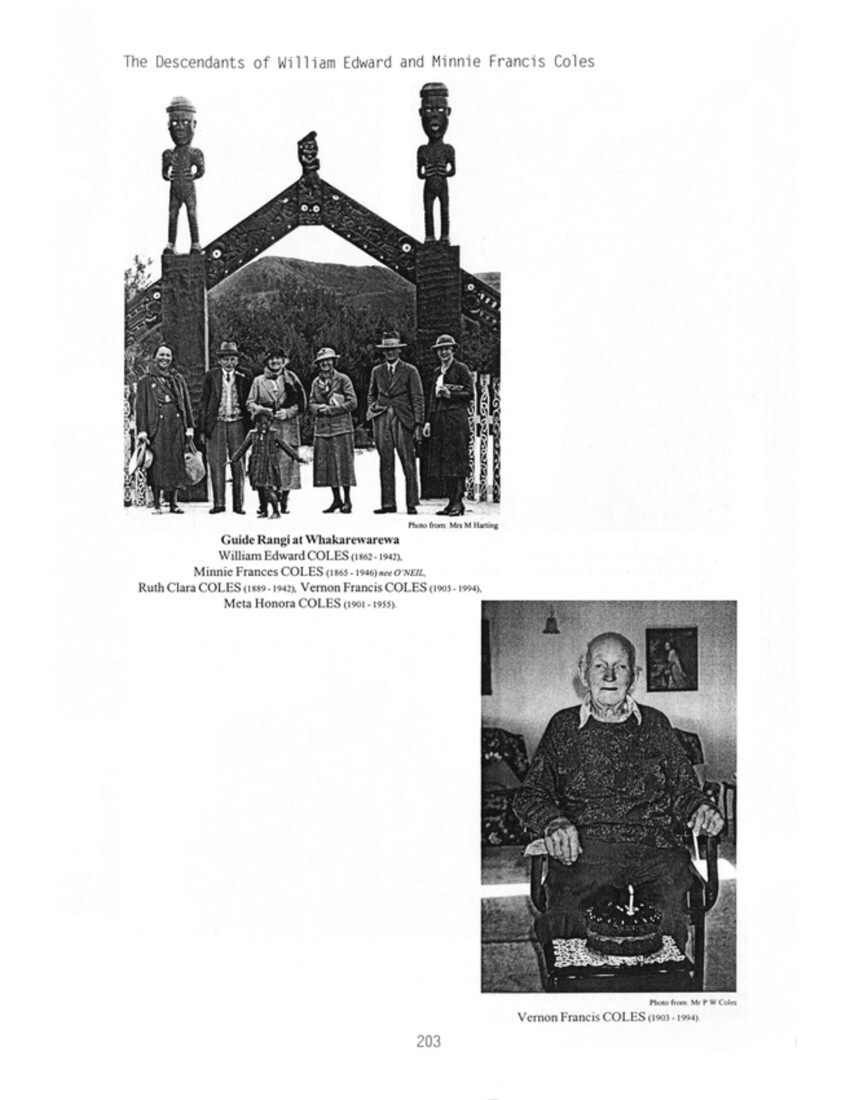
Page 204
The Descendants of William Edward and Minnie Francis Coles.
Christopher Michael KEEHAN (1935-1992),
Sarie Jennifer (Niki) KEEHAN (1944- ) nee FLETCHER.
Photo from: Mrs N Keehan
Emma Lavinia (Vinnie) McCLAUGHLAN (1894-1979) nee COLES,
Martin Norman McLAUGHLAN (****_****).
Photo from: Mrs N Keehan
Audrey Eleanor KEEHAN (1891-1972) nee COLES, Edward William Perkis COLES (1889-1978),
Christopher Michael KEEHAN (1935-1992).
Photo from: Mrs N Keehan
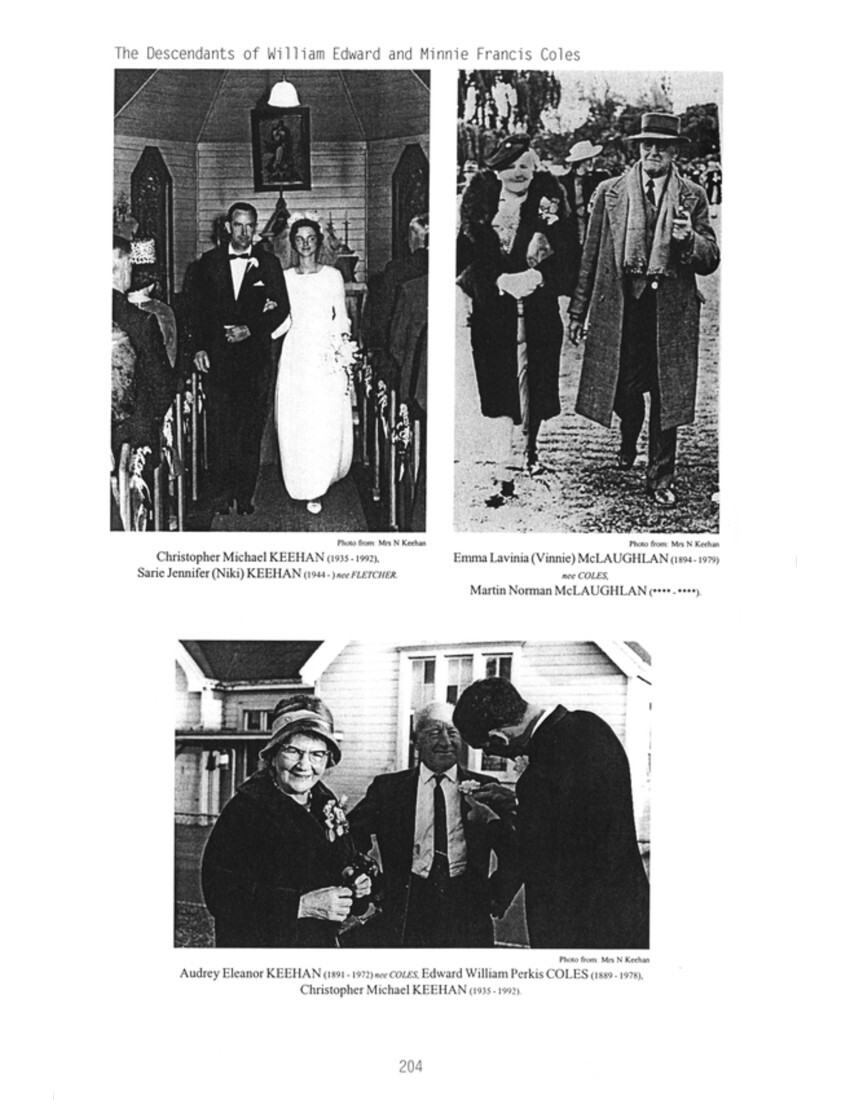
Page 205
THE DUCHESS
By Niki Keenan [Keehan]
“Do come in. I’m so gald you’ve called.”
“Thank you. I waited till you were settled before I popped over, It’s such a dear old house. I’m sure you’ll be happy here.”
“We’ve settled in quite well, but with the hours my husband’s working I’m alone often, and the house creaks and groans at night. Seems spooky at times.”
“And you’re wondering if you’ve got a ghost?”
“Yes. I heard in the village stories about old Mrs Billy Coles who built the house. She was known as a bit of a tartar. They called her the Duchess behind her back I was told, and she ruled her family with a rod of iron.”
“Yes that’s right. She was a strong minded woman. I knew the family well. Lived here in this house all her married life. Only two of the daughters married: two in the convent and two old maids. The youngest, Meta, was the post mistress in the village for years. The two sons chose to be farmers instead of carpenters.”
“Do fill me in. Stay for a coffee and tell me all you know.”
“Most of it’s only gossip and hearsay. I was at primary school with the older children and I knew Audrey and Vinnie quite well. Vinegar Vin they called her at school on account of her red hair. What sort of things do you want to know ?”
“Start with the two girls who married – did they become the wives of rich and famous station owners?”
“I think Minnie their mother would have been very happy if they had. They were the two I knew best. It’s going back a long way now, and some of it’s only hearsay.
Audrey married first. It must have been during the depression. Tom Keehan had the barber shop in the village – sold up and went to run the store at Waikokopu. They were building the railway at the time and he was doing very well as a shop keeper. A widower with four very lively youngsters. Bit of a rough diamond from the South Island. No family connections, all he had in his favour was his Catholicism. Audrey climbed out the window, took the train to Wairoa and married him at his house in Waikokopu with only his children as witnesses. It was said Minnie had hysterics when she heard. She lay on the floor and kicked and screamed for a week! So they said in the village. Willy Coles was seen in town looking as though there had been a death in the family. When asked what was wrong he told how Audrey’s marriage had upset her mother. For years Audrey’s name was never mentioned, but at some stage she was reconciled because her children stayed for holidays, and adored their Grandparents. Thank God good sense prevailed.”
“Goodness me it sounds so romantic. What about the other daughter’s marriage?”
“Well I believe Vinnie was engaged to Joe Bretherton without her parent’s knowledge or consent and wore her beautiful ring when she was out of the house. I know because I was told by someone who saw her put it on at the Hawke’s Bay Show! Her parents must have come round and accepted Joe because they were married from home with their blessing. Ted we called him, the oldest son had a twin sister Ruth. At school we teased him dreadfully, he was baptised ‘Edward William Perkis’. Apparently some uncle in South Africa promised to make him his heir if he was named after him. To my knowledge he never inherited money and was given an odd name to no purpose. His wife Mary Margaret, and Joe Bretherton were brother and sister. Ted was wounded in the War and went farming some time after. He couldn’t stand work in the joinery factory when he came back from overseas.
There was a story in the village about love letters left in a hollow tree for admirers. I can’t remember whether it was supposed to be Audrey and Vinnic or another family. But it does sound romantic.”
“What else do you know about the family?”
“Audrey, Minnie’s daughter once told me – “Mother used to talk about a Governess who was supposed to take them for brisk walks in the park, but she would just sit on a bench. The children were expected to look rosy cheeked from exercise so she would rub their cheeks briskly with a handkerchief before they came in sight of the front door.’ Minnie claimed descent from Hugh O’ Neill
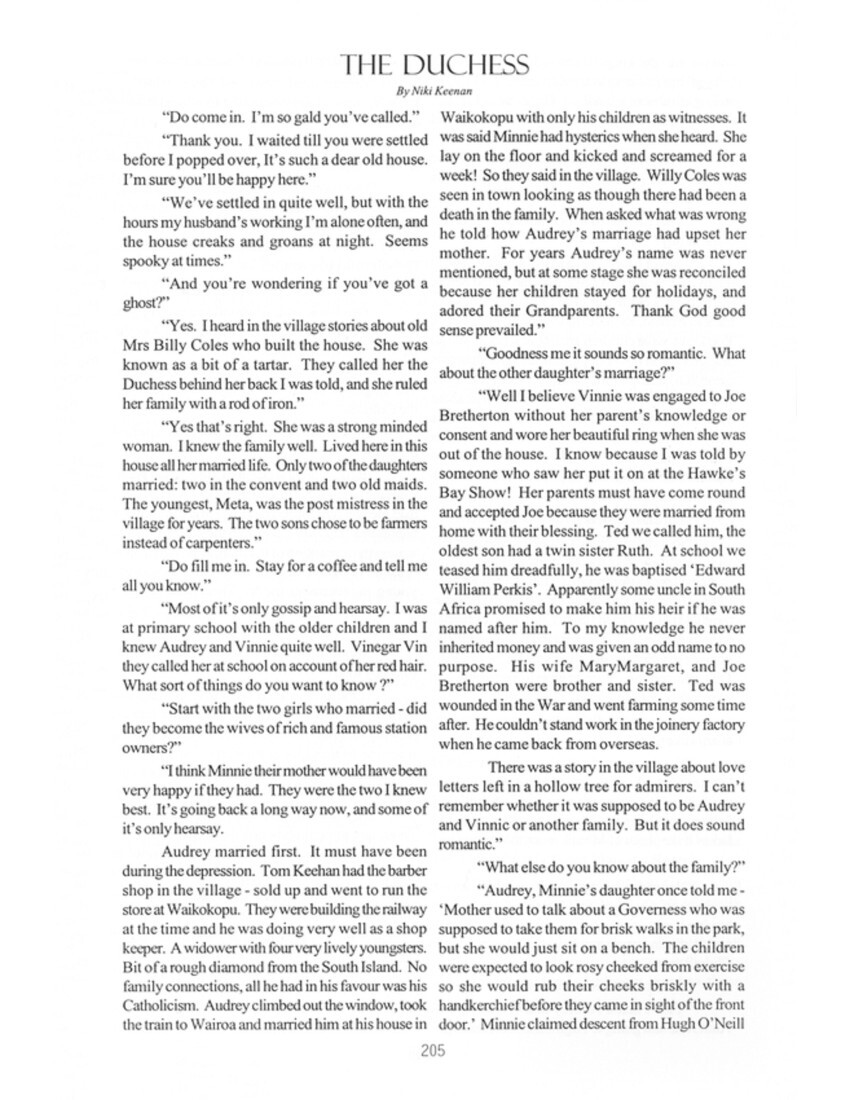
Page 206
and the ancient kings of Ireland. Captain Frank O’Neill her father managed an estate in Cork for an English absentee landlord. He spoke out against the Government preaching Home Rule for Ireland and left for America in a hurry. Minnie was born in Mallow: Her mother’s name, Ellen Loaney. Minnie and her sister Julia came out and found work as dressmakers.”
“What happened to her mother and the rest of the family?”
“I never heard. Perhaps Ellen stayed with relatives in Waterford? She may have died before the two girls came out here. I heard Julia went back to Ireland, so there may be family there still. You know what children are like at school. We all bragged about how our parents and grandparents came out, and Minnie sounded so much more colourful than other parents. The girls told us about her riding across the countryside on her favourite pony with her cloak streaming behind her – and at a family party how she lifted her petticoats to demonstrate the intricate steps of a traditional Irish jig to her children and guests.”
“She must have been quite a lady then?”
“Sounds very grand to have had a governess, and the village felt the reference to her as ‘the Duchess’ was appropriate. Their life must have changed dramatically for she and Julia to emigrate. I was told old Willy and Emily Leach from Springhill once took Minnie to a funeral in Hastings, she had a couple of whiskies and – ‘Down with the English.’ This amused the Leaches who never drank and were rather dour folk from Yorkshire.”
“How come she ended up in a country district like this?”
“The story goes that the two girls arrived with letters of introduction to the Ormond family, and worked in Hastings as dressmakers. Minnie and Julia would have been quite sought after young ladies if the photo of Minnie is anything to go by.”
“Did she meet William in Hastings?”
“Hastings was a small town, and William was there often on business for Coles Brothers Builders buying hardware, timber etc for the firm. Minnie and William were married in the Sacred Heart Church there.”
“Did both the sisters marry?”
“Yes. I heard Audrey talk of staying with Aunt Julia and going to High School in Hastings.”
“That sounds modem for those times.”
“Minnie must have been well educated herself, she certainly believed in educating her daughters.” “And so they came to live happily ever after here in Onga Onga?”
“You know as well as I that’s the beginning for most people. William must have been captivated by her. He converted to Roman Catholicism to marry her. Their household was the centre of Catholic life in the district.”
“More coffee? Another piece of cake?”
“Yes thank you. Remind me to give you Vinnie’s recipe for shortbread sometime. Once the babies started coming the original house was too small, and as the business prospered they built on. The biggest houses in the village were all built by the Coleses.”
“How many babies were there? It’s quite a big house.”
“Eight. The first babies, Edward and Ruth, were the twins surviving to maturity. Vinnie once told me she remembered seeing one of mother’s babies in a little white coffin in the kitchen. There was no more mention of the baby afterwards. This must have been Dorrie’s twin. Vinnie was too young to remember more. There was a boy at each end of the family, and the six girls fitted in between.” “Minnie must have missed her mother when the baby died?”
“If she did she never showed it. She worked very hard to feed, clothe and educate her family. Sewing late into the night on her treadle sewing machine to dress them properly. An excellent seamstress herself, she expected excellence in the standard of her family’s sewing and housekeeping.
They all attended the primary school in Onga Onga, and sometimes boarded one of the teachers. The older girls went to the Convent school in Waipawa once a week for music lessons. A major undertaking in those days, it being at least a three hour trip there and back in a horse and trap. The younger girls went to Teschemakers, to the Dominican Sisters for their secondary schooling. Dorrie entered the Convent straight from school. They only came home for the summer holidays – because of the distances and costs of travel. Vinnie told me she was not sent to boarding school
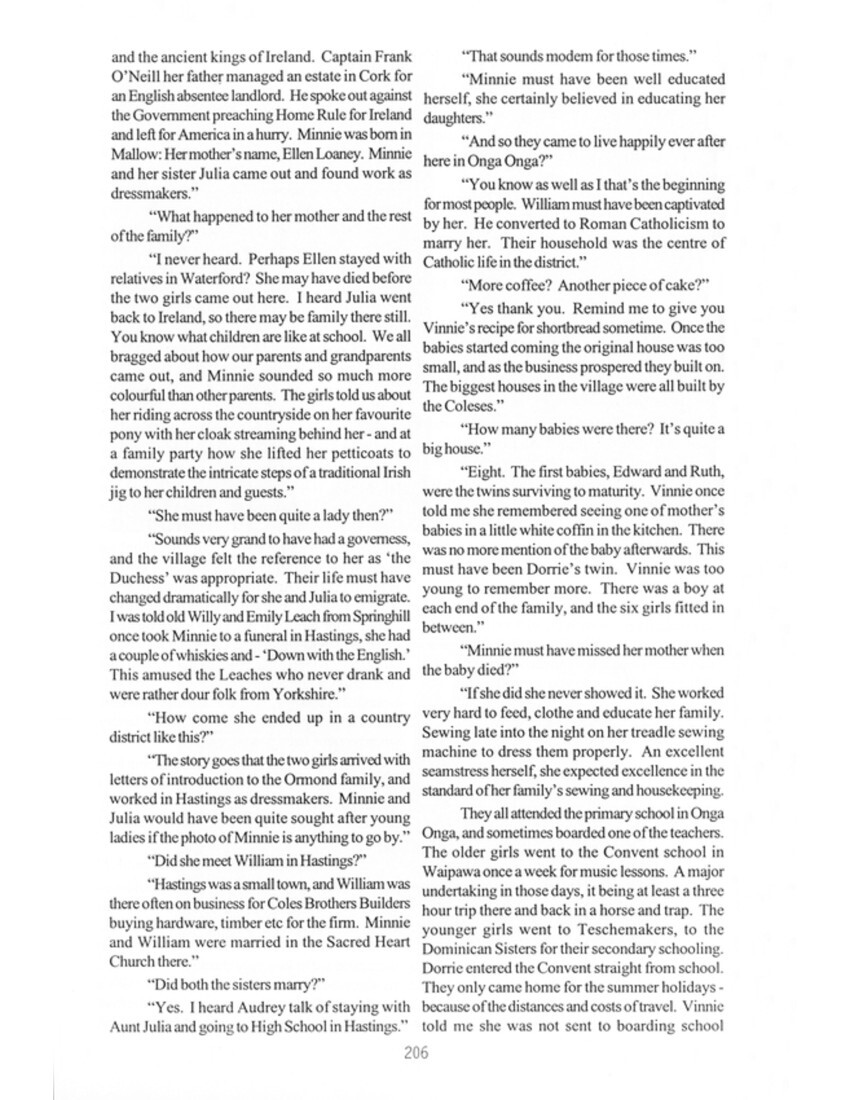
Page 207
because father had difficulties in business at that time. I believe she enjoyed life in the village running the house for mother. Minnie was ‘at home’ to callers once a week and baking all had to be done by herself and her daughters.”
“It does sound as though Minnie ran things, what about William?”
“Life must have been difficult for William, his Anglican family disapproved of his conversion to Roman Catholicism on his marriage to Minnie. Nevertheless, Coles Brothers built the Roman Catholic Churches in Onga Onga and Waipawa. Building churches for all denominations was good for business.”
“How did the community cope for services before they started building churches?” “Well the Anglicans and Presbyterians probably used the school or hall. But I did hear the Catholics did their Baptisms at the Onga Onga Hotel. Perhaps it was the only local residence big enough and the publican was a Catholic. For many years William took responsibility for the care and maintenance of the church. Once when the Parish Priest was away he organised the laying of a much needed concrete path. When the Parish Priest came back from his trip he was furious. The path had been laid without his permission being sought or granted. William was relieved of all responsibilities in caring for the church after that.”
“Goodness that seems mean!”
“I think it meant in his later years he was free to take holidays and devote more time to travelling to visit his daughters the nuns. He was a lovely gentle man. He died in 1942.”
“Fill in the details of the others if you can?”
“I can’t tell all, but of the three younger daughters, Dorrie became a teaching sister with the Dominicans, and Gladys entered the Black Joe’s. She excelled as music teacher in Hawera and Waipawa, Ruth kept house for her brother Vern before he married, and then she lived at home with her parents. Meta worked in the office at the joinery factory before she became the local Postmistress and she played the organ in the church. Come to think of it, Audrey worked in the office for her father and I heard she was an excellent draughtswoman.”
“What an asset to the firm, a bunch of educated daughters.”
“People said mean things, that Minnie wanted them all at home to look after her in her old age. I think she wanted to protect them from the world; having seen enough of it in her youth. Certainly Vinnie was too well protected for her own good.”
“What’s this about Vinnie?”
“I told you she married Joe Bretherton,”
“Yes, what happened. Was he a rotter?”
“No he was a lovely man, but he died of a brain tumour after three years of marriage.” “Goodness how sad!”
“It was tragic. Vinnie thought she could cope on the farm and stay in her lovely house and garden with her memories of Joe. She gave her manager free reign with everything cheques – accounts – you know. Mac was a gambler and nearly ruined her. She married him. Perhaps she thought the love of a good woman would help change his gambling habits.”
“I guess it didn’t?”
“No, but they always seemed happy enough.”
“I’m so glad I asked you about the Coleses – how much more do you know about them?”
“It’s hard to say, I might start making up stories to entertain if you’re not careful. I always loved visiting here as a child, and I could tell you about the garden. Vinnie’s walnuts pickled for Father, amazing sponges, musical evenings, the piano their father bought for the girls, and Minnie’s exquisite hand sewing.”
“I don’t believe we’re haunted by sad ghosts, just memories of family life and real people. Do let me have the shortbread and sponge recipe if I may?”
“Yes and another reminiscence of my own. My brother and I once saw two of the little grand daughters standing on the verandah as we passed in the old Model A. He said they looked like the princesses Elizabeth and Margaret Rose.”
“Lovely thought, true or not. Come again soon. The night noises will be homely friendly sounds now.”
“Yes you may be certain any ghosts are well laid to rest in the Waipawa cemetery. Only the wind rattles Audrey’s bedroom window these days.”
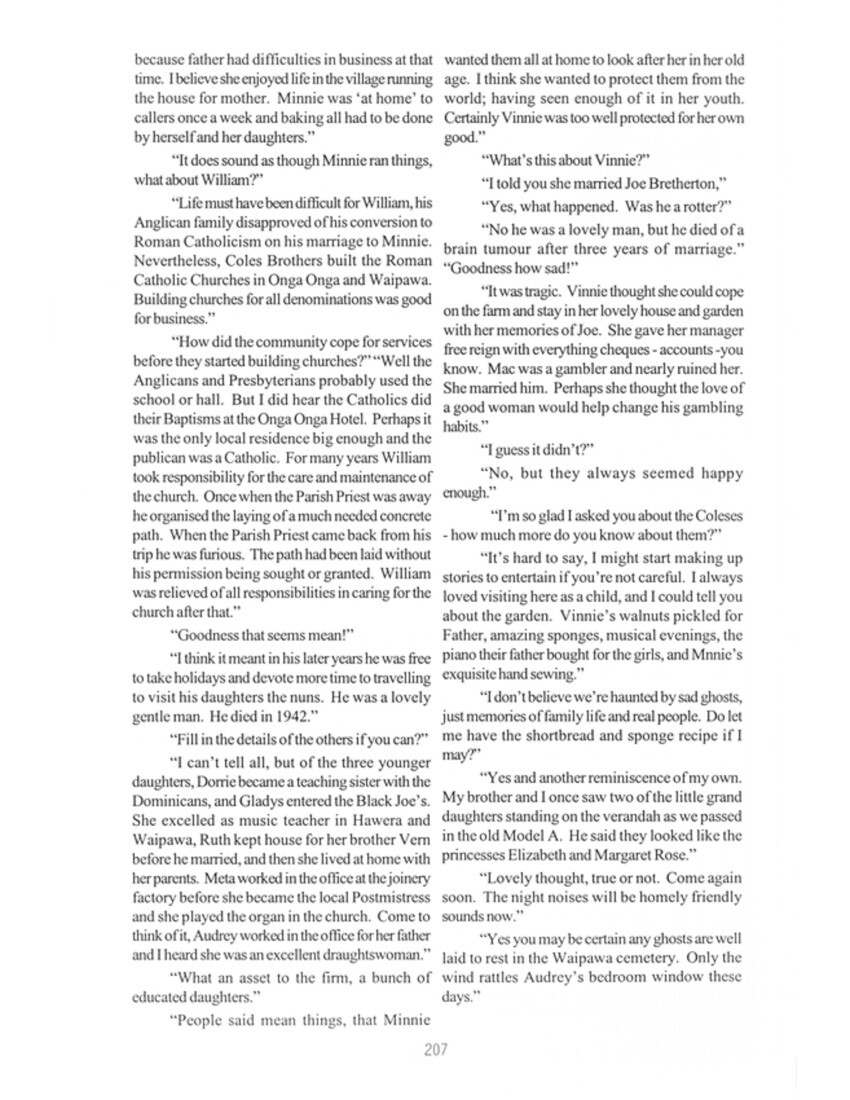
Page 208
Descendants of COLES, Edward Purkis and BARTON, Clara Louisa
COLES, Louisa and LIVICK, William Dixon
06> COLES, Louisa m on 24.05.1886 to LIVICK, William Dixon
b 05.10.1863 d 14.03.1940 b 10.04.1852 d 30.09.1909
Louisa registered at Droxford and bap. at St Paul’s Church, Southsea, England. William worked in the Post Office and worked in Gisborne, Thames, and Nelson.
01> LIVICK, Ella
b **.**.****
02> LIVICK, Beryle m on **.**.**** to BRAYTON, William Grindal
b 12. 08.1889 d 31.10.1958 b 28.08.1890 d 03.10.1969
William b. in Fiji. He was managing director of a F G Smith, customs agents in Napier. Started in the bank.
01> BRAYTON, Theo m on 28.02.1941 to GRANT, John Bradford
b 18.11.1918 b 15.07.1917
Theo m. at St John’s Cathedral, Napier. Address: 1/74 Kitchener Road, Milford, North Shore, Auckland.
[…]
02> BRAYTON, Betty m on 14.10.1946 to MENDELSSOHN, Joseph Harold
b 13.01.1921 b 01.03.1908
Address: 40 Elsmore Crescent, Pakuranga Park Village, Pakuranga, Auckland.
03> BRAYTON, Patricia m on 21.08.1944 to MENDELSSOHN, Louis Gabriel
b 01.08.1922 b 01.03.1911 d 27.10.1999
Patricia b. and m. at Napier. Louis, s/o Emanuel Mendolssohn and Leagh Rogers, b. and d. at Auckland. Address: 5/68 Florence Avenue, Orewa, Hibiscus Coast.
Patricia was educated at Napier Girls’ High School then worked as a photographer’s assistant. Louis went to Wellington as a child, and then to Napier. He was educated at Napier Boys’ High School and Massey College in Palmerston North. He returned to Napier after the earthquake and went farming then served in the armed forces during WW2.
After their marriage, Patricia and Louis lived in Hastings where Louis worked as a photographer and later as a builder. They moved to Wellington in 1962 and became owners of a millinery factory.
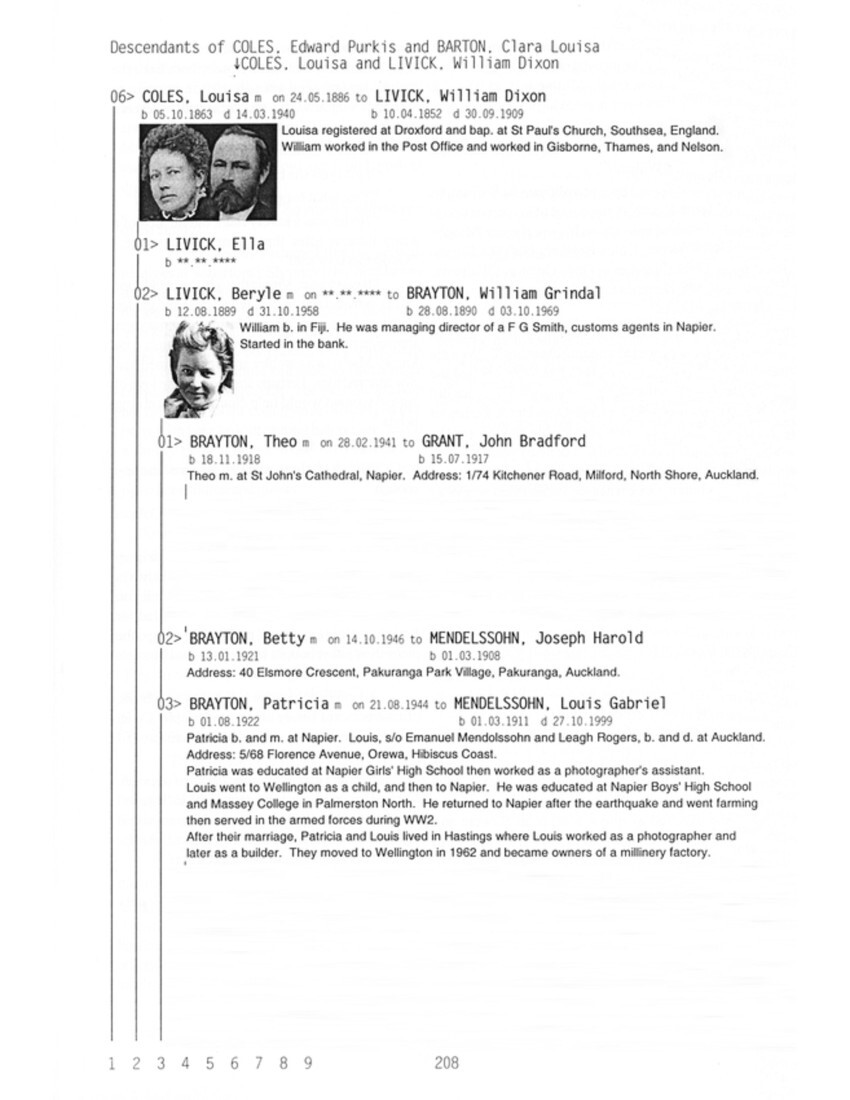
Page 209
Descendants of COLES, Edward Purkis and BARTON, Clara Louisa
COLES, Louisa and LIVICK, William Dixon
LIVICK, Beryle and BRAYTON, William Grindal
BRAYTON, Patricia and MENDELSSOHN, Louis Gabriel
[…]
04> BRAYTON, Joan A m on 24.08.1944 to BISHOP, William Henry Enos
b 05.07.1924 b 19.09.1919
Address: 37 Coventry Avenue, Tamatea, Napier.
[…]
03> LIVICK, Ivan
b **.**.****
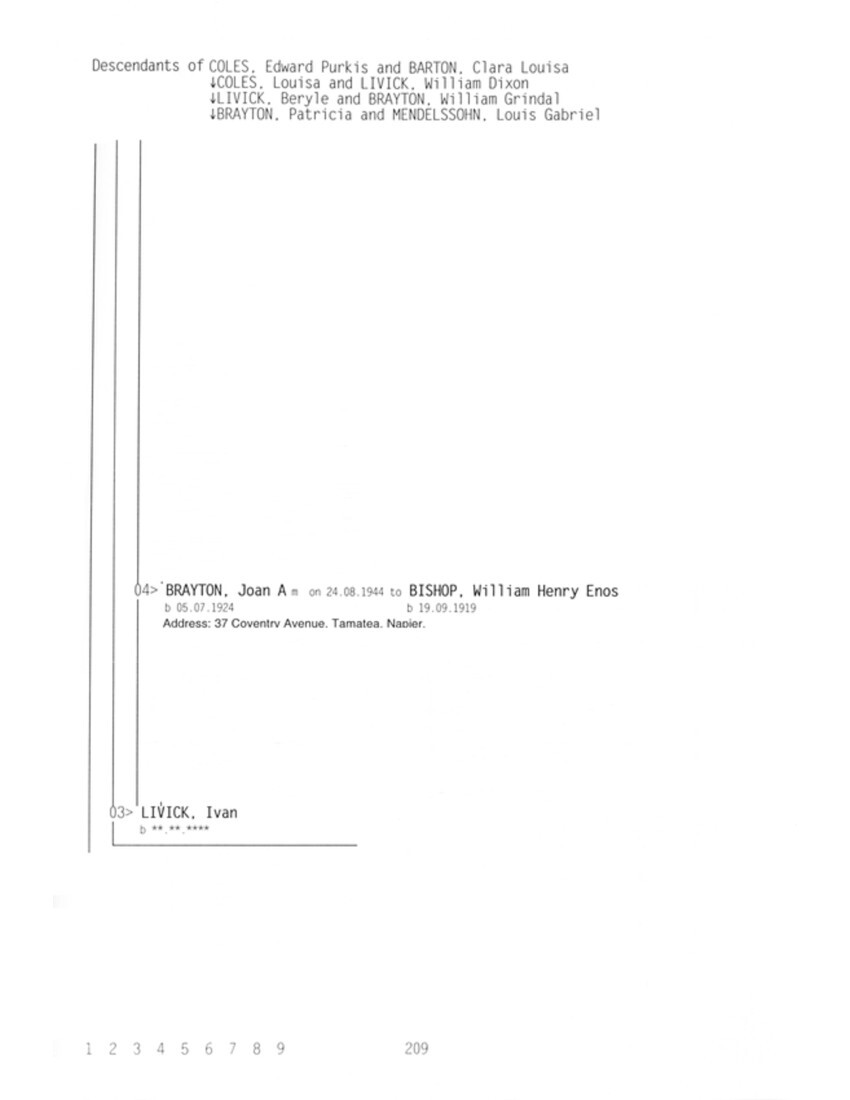
Page 210
COLES, Charles Robey
m to THODSEN, Amalie Elizabeth (Emily)
John Barton (Jack)
= SHEPHERD, Annie McGregor
COLES, James Russell
COLES, Ian
= CHEER, Joyce
Cecil Ernest
= CHARTERS, Rosanna Maye
COLES, Mary Evelyn Charters (Effie)
= CUMMING, James Alexander
COLES, Gretta Patricia
= MCDERMOTT, Bryan Noel
COLES, Colleen Terris
= HARDING, Ralph Taylor
COLES, Cecil Royston
= (1) JOEL, Audrey Blanche
= (2) RADFORD, Lena Merina
Mona
= MACFARLANE, Leslie Mace
MACFARLANE, Betty
= CLAY, Leendert
MACFARLANE, Peter
= McLEOD, Florence
Frank Charles
= SIMPSON, Irene Mabel
COLES, Janet
= KOENDERS, Antonius Johannes
COLES, Cherie Robin
= COOKE, David Edwin
COLES, Mark Anthony
= BRANT [BRANDT], Ingrid Dorothee
Nora
= HARDY, John Laurence
HARDY, Elizabeth Anne
= (1) HOOKHAM, Fredrick James
= (2) STEWART, Ross
HARDY, Margaret Nora
= (1) JOSLING, John Ross
= (2) A CHILLES, John Francis
HARDY, Charles George
= DAVIES, Mary Joy
HARDY, John Searight
= (1) HANDCOCK, Pauline
= (2 ) MANNING, Maxine
HARDY, Kenneth Niall Alan
=LEATHEM, Janice Marie
HARDY, Robert Maxwell
= BOOTH, Carole Anne
COLES, Charles Robey
= THODSEN, Amalie Elizabeth (Emily) (cont)
Olga
= CLARK, Arthur Charles
CLARK, David Charles
= (1) HALL, Margaret
= (2) MARTIN, Patricia Eileen
CLARK, Michael Robin
Ada
= PARKER, Francis Raymond
PARKER, Terence Raymond
= (1)HAMILTON, Irene
= (2) ??, Beryl Josephine
PARKER, Catherine Gaynor
= GUILFORD, Owen Tracey
PARKER, Judith Mary
= HELM, John Bissell
PARKER, Bernadette Pamela
= SIVITER, Albert Leonard
PARKER, Jennifer Margaret
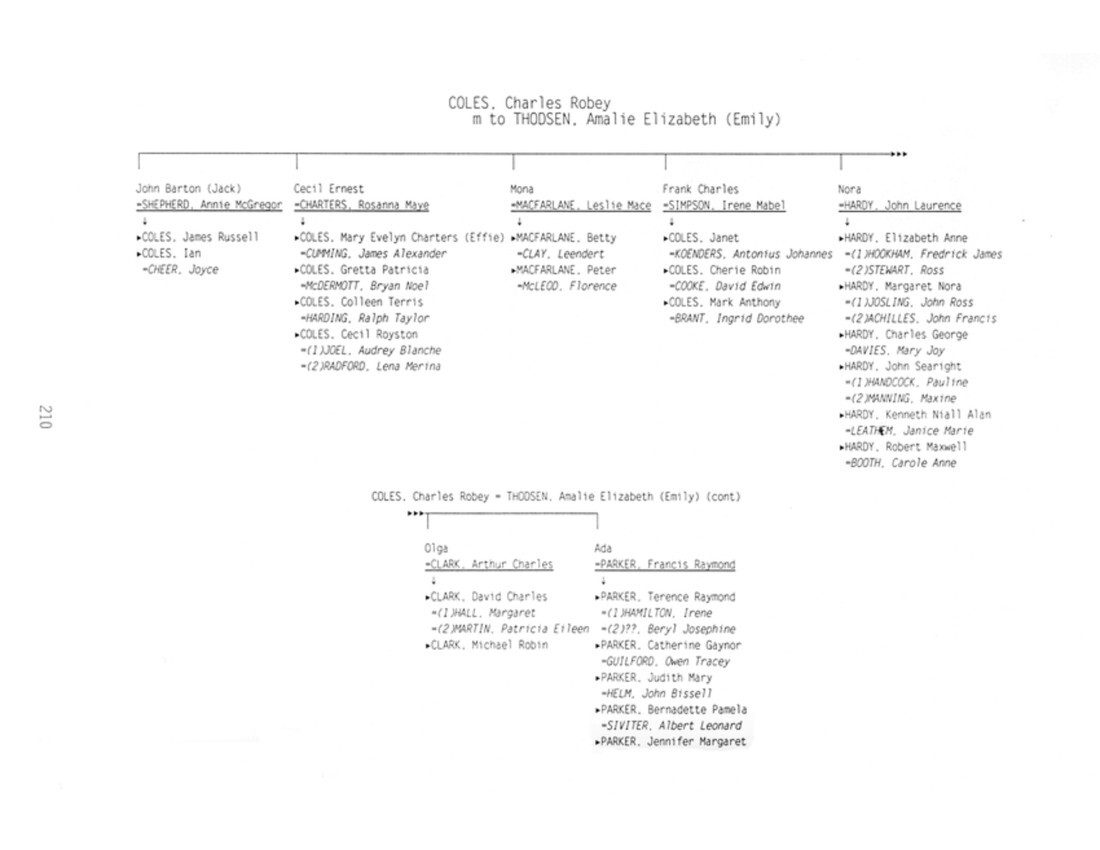
Page 211
Descendants of COLES, Edward Purkis and BARTON, Clara Louisa
COLES, Charles Robey and THODSEN, Amalie Elizabeth (Emily)
08> COLES, Charles Robey m on **.**.1894 to THODSEN, Amalie Elizabeth (Emily)
b 25.03.1867 d 09.07.1959 b 25.08.1871 d 20.09.1932
Charles registered and bap. at Droxford, Hampshire, England. Amalie, d/o Johan Christian Thodsen and Caroline Elise Knudsen, b. at Stege, Denmark. Her family arrived from Denmark as assisted immigrants on the “Fritz Reuter” on 17 March 1875. She lived in Norsewood before her marriage.
Charles and Emily lived in Ongaonga and raised their family there. After Emily’s death Charles went to live in Wellington with his daughter Nora. Later he stayed with Miss Evett (it is thought that Amalie may have been a boarder at her house), who was then living by herself and needed assistance and company for a fellow-boarder who was confined to a wheelchair and couldn’t manage for himself. He kept an excellent garden and in his old age he made beautiful tapestry bags. His daughters and older granddaughters were each given one of these.
The following cameo was contributed by grandson, Michael Clark:
“Charles Robey was a lovely old man. A pity I wasn’t old enough to pump him for information when I was a young boy and saw him occasionally at Island Bay, or when he visited us, and came to Christmas afternoons at our Aunty Nora’s. He had a missing finger on his left hand, the result, I think, of a circular saw injury.
He spoke with the dropped ‘h’ of the South of England which I’ve heard is a survival of Norman French. Hence, “Ow are you, Michael?” and, “Give us a toone”, from my fiddle playing days. He told how, as a boy before coming out to New Zealand, he played the wag from school in Droxford and walked the considerable miles to Southampton where he visited an uncle who gave him some apples to take home to his parents. When he got home, he had to reveal, of course, where he had been and, I suppose, got a fair ‘toone-up’ from his father. He also told the story of being called out by some ‘M’lord’, “Here boy, hold my horse!” To which he replied, “Here man, hold it yourself!” So he must have been nobody’s fool, and had a fair sense of adventure.
“As well as the tapestry handbags mentioned above, he did some much larger flower and landscape pictures, some used for fire screens. And, as well as having an excellent vege garden, he grew carnations which he sold to a Wellington florist, thus supplementing his small pension and providing, maybe, tobacco for his pipe. He was a good reader in his retirement and told me he liked adventure and travel stories. He mentioned Ryder Haggard, a writer from his own era and I remember him being very chuffed with the 1950s book, “Elephant Bill”, a tale of logging in Burma.
“He must have been a multi-talented craftsman – builder, metalworker and miller to name a few. But I only learned a few years back, from our Aunt Nora, that he was an engineer and ‘worked very hard’.
01> COLES, John Barton (Jack) m on **.**.**** to SHEPHERD, Annie McGregor
b 20.02.1896 d 13.01.1983 b **.** 1892 d 04.07.1971
John b., d. and bd. at Ongaonga. Annie b. in Scotland and came to New Zealand with Jack after their marriage.
Jack worked in the family business with his brothers. He was very clever with his hands and built beautiful furniture for their home in Ongaonga. They lived in the house next door to the hall.
Jack enlisted and served in France during WW1 (Reg # 5/667) and he married while overseas and brought Annie home as a war bride. He rejoined Coles Bros and worked there until he retired.
Annie was a keen gardener and had a lovely flower garden and a large vegetable garden. She never lost her lovely Scotish accent. Jack had a very dry sense of humour and was quite an inventor.
01> COLES, James Russell
b **.**.1921 d 11.04.1945
James b. at Ongaonga. He was educated at Ongaonga Primary School and Waipawa High School then worked at Coles Bros before enlisting. He served in WW2 (Reg # 273886) and died in Italy.
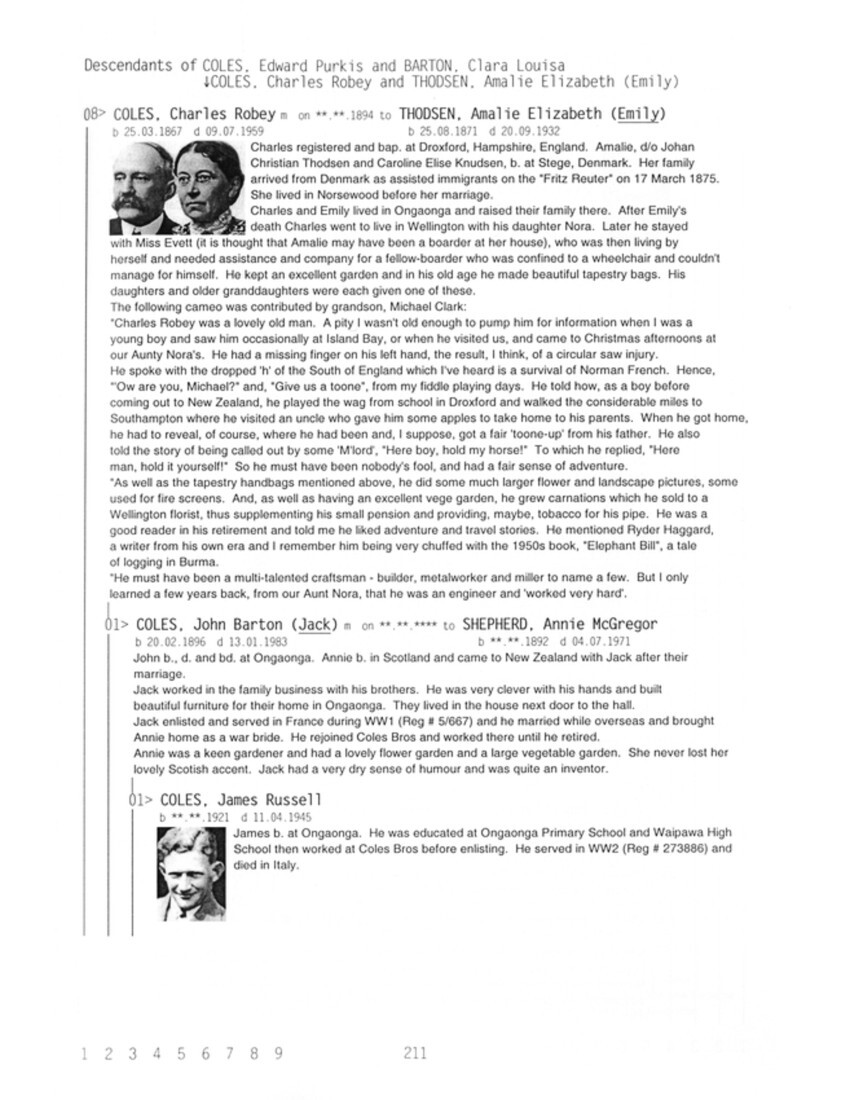
Page 212
Descendants of COLES, Edward Purkis and BARTON, Clara Louisa
COLES, Charles Robey and THODSEN, Amalie Elizabeth (Emily)
COLES, John Barton (Jack) and SHEPHERD, Annie McGregor
02> COLES, Ian m on 13.04.1948 to CHEER, Joyce
b 28.04.1924 b 18.03.1919
Ian b. at Ongaonga and m. at Waipawa. Joyce, d/o Harry Cheer and Lucy Haycock, b. at Elsthorpe. Address: 67a Bowen Street, Cambridge.
Ian was educated at Ongaonga Primary School and Waipawa High School then trained as a farm cadet at Smedley. He managed farms at Elsthorpe, Glen Murray and Cambridge. Joyce was educated at Elsthorpe then trained as a Karitane Nurse. The family moved to Cambridge in 1964.
[…]
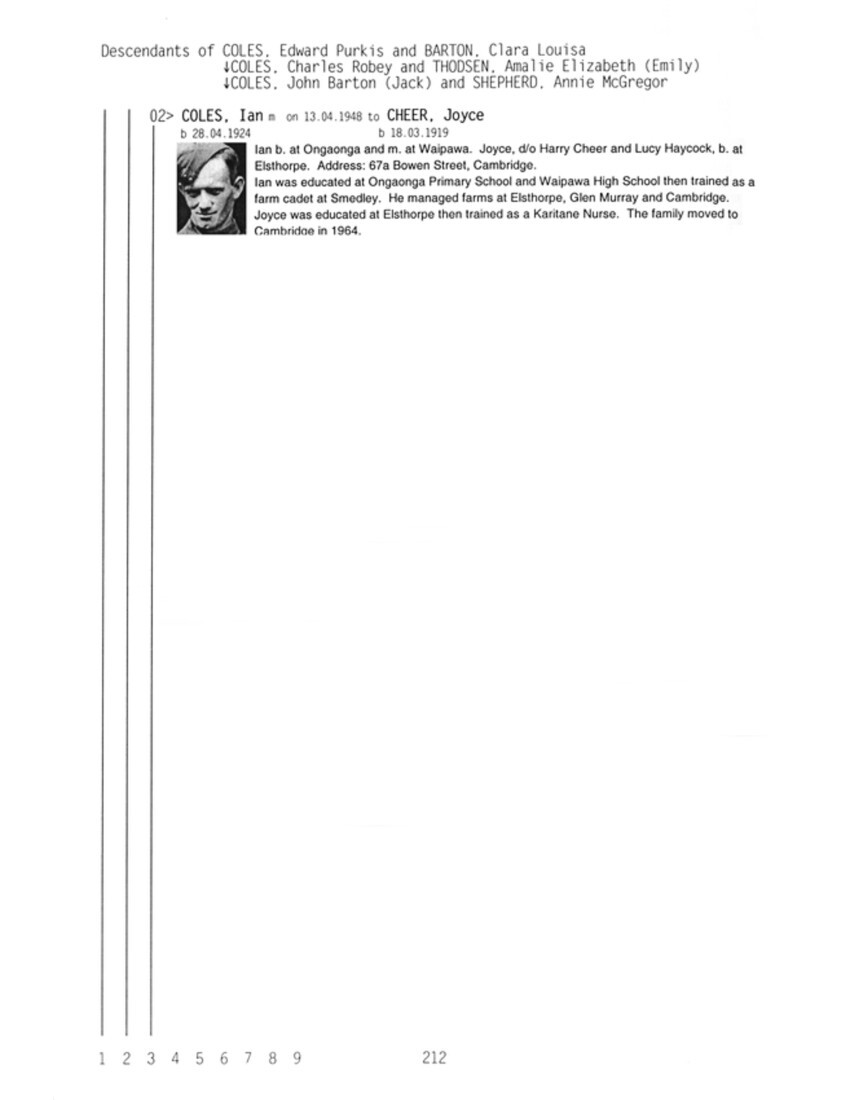
Page 213
Descendants of COLES, Edward Purkis and BARTON, Clara Louisa
COLES, Charles Robey and THODSEN, Amalie Elizabeth (Emily)
COLES, John Barton (Jack) and SHEPHERD, Annie McGregor
COLES, Ian and CHEER, Joyce
[…]
02> COLES, Cecil Ernest m on 21.03.1923 to CHARTERS, Rosanna Maye
b 13.06.1898 d 20.06.1982 b 31.01.1900 d 28.10.1969
Cecil b. at Ongaonga and d. at Auckland. Rosanna, d/o W Charters of Springhill, b. at Glasgow, Scotland.
Cecil (Earnie) was educated at Ongaonga and went off to WW1 with the 2nd New Zealand Expeditionary Force at the age of 17. He was a prisoner of war for two years and celebrated his 21st birthday on the boat coming home. After returning to Ongaonga, he married Rosanna and moved to Hastings where he built homes in Riverslea Road. Later he worked for Ross Dysart and McLean in the motor industry. He experienced the Hawkes Bay earthquake in 1931 and during the Depression he did some relief work before moving to Gisborne about 1937 to work for Krebs and Co, motor body builders. During WW2 he served on guard duty in Wellington. Later he worked on the engineering staff at Cook Hospital until his retirement. In his youth he was keen on motor bikes and shooting and in later years he enjoyed rug making, winning prizes at the local show.
Rosanna moved to Hawkes Bay with her family who farmed at Springhill. She worked for a time at Harry Whyte’s store in Ongaonga and after her marriage she lived in Hastings and then Gisborne. She was a keen member of the National Party and was president of the Women’s Bowling Club and also a bowls referee. She also belonged to the Country Women’s Institute and was a member of their drama group. She did voluntary work during WW2.
01> COLES, Mary Evelyn Charters (Effie) m on 24.01.1948 to CUMMING, James Alexander
b 30.12.1924 b 13.03.1924 d **.**.****
Effie b. at Hastings and m. at Gisborne. James, s/o William Cumming and Mary Harmon, b. at Napier. Address: 1/26 Fitzwater Place, Henderson, Auckland.
Effie started her schooling at Parkvale, Hastings then, after the family moved to Gisborne in 1937, she went to Gisborne Central School and Gisborne High School. She joined the Airforce in 1942 as a wireless operator and was discharged in 1945 when war ended. She then worked as company secretary to Grundy and Scott, a large furniture firm, until her marriage. They moved to Napier and then to Dannevirke before returning to Gisborne in 1967. Effie then worked as senior clerk to an accounting firm and did some social work studies.
In 1979 Effie was appointed field officer to PARS and was awarded a warrant as a court conciliator. She was appointed a Justice of the Peace in 1980 and a marriage celebrant in 1982. In 1985 she became a lay reader and preacher at St Mark’s Anglican Church and in 1988 was appointed to the Gisborne (cont…)
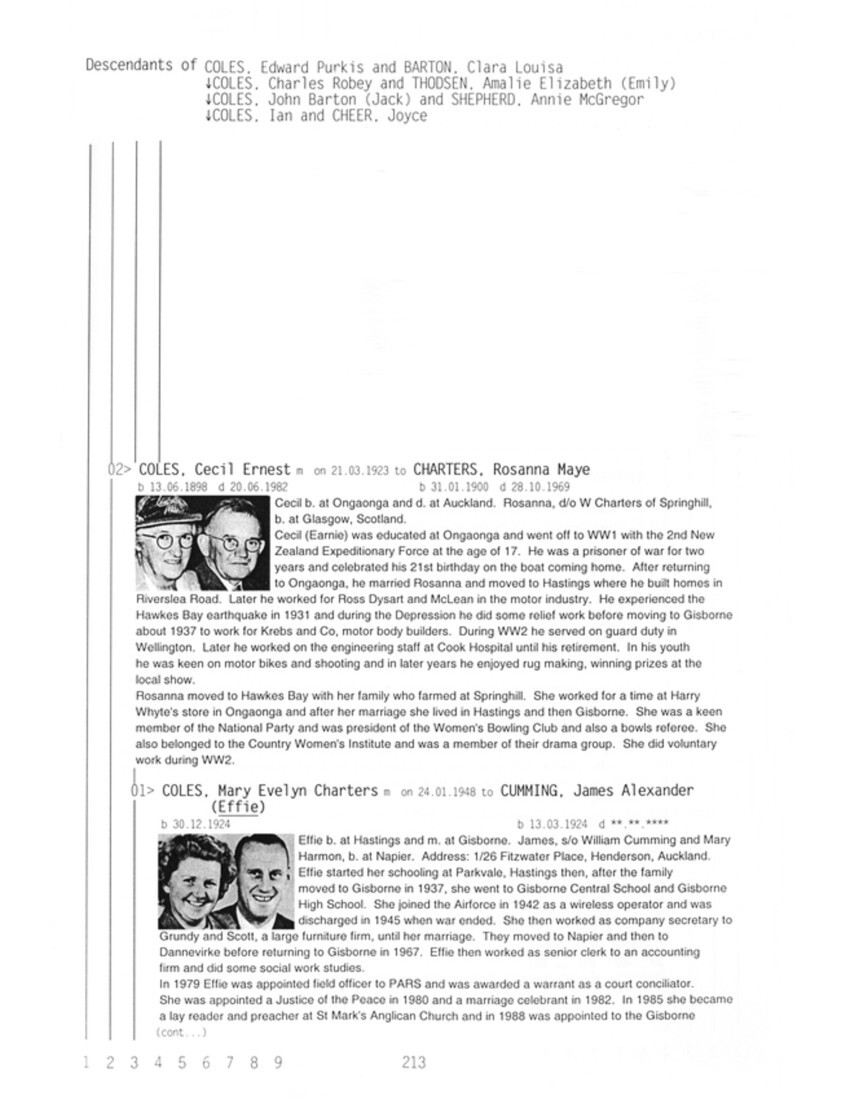
Page 214
Descendants of COLES, Edward Purkis and BARTON, Clara Louisa
COLES, Charles Robey and THODSEN, Amalie Elizabeth (Emily)
COLES, Cecil Ernest and CHARTERS, Rosanna Maye
COLES, Mary Evelyn Charters (Effie) and CUMMING, James Alexander (cont…)
Criminal Justice Advisory Council for a three year term. She retired in 1990 and moved to Auckland.
[…]
02> COLES, Gretta Patricia m on 13.02.1954 to MCDERMOTT, Bryan Noel
b 05.04.1930 b 14.12.1928 d 17.02.1976
Pat b. at Hastings and m. at Gisborne. Bryan, s/o John Thomas McDermott and @ Mary Ellen Heffran, b. at Auckland. Address: 3/175 Riddell Road, Glendowie, ® Auckland.
Pat was educated at Gisborne High School then graduated BA from the University of Auckland. She also represented the university at basketball. She studied art and painting in a variety of media.
Bryan was educated at Sacred Heart College, Auckland, and became a chartered accountant. He was Company Director with Green and McCahill, Auckland.
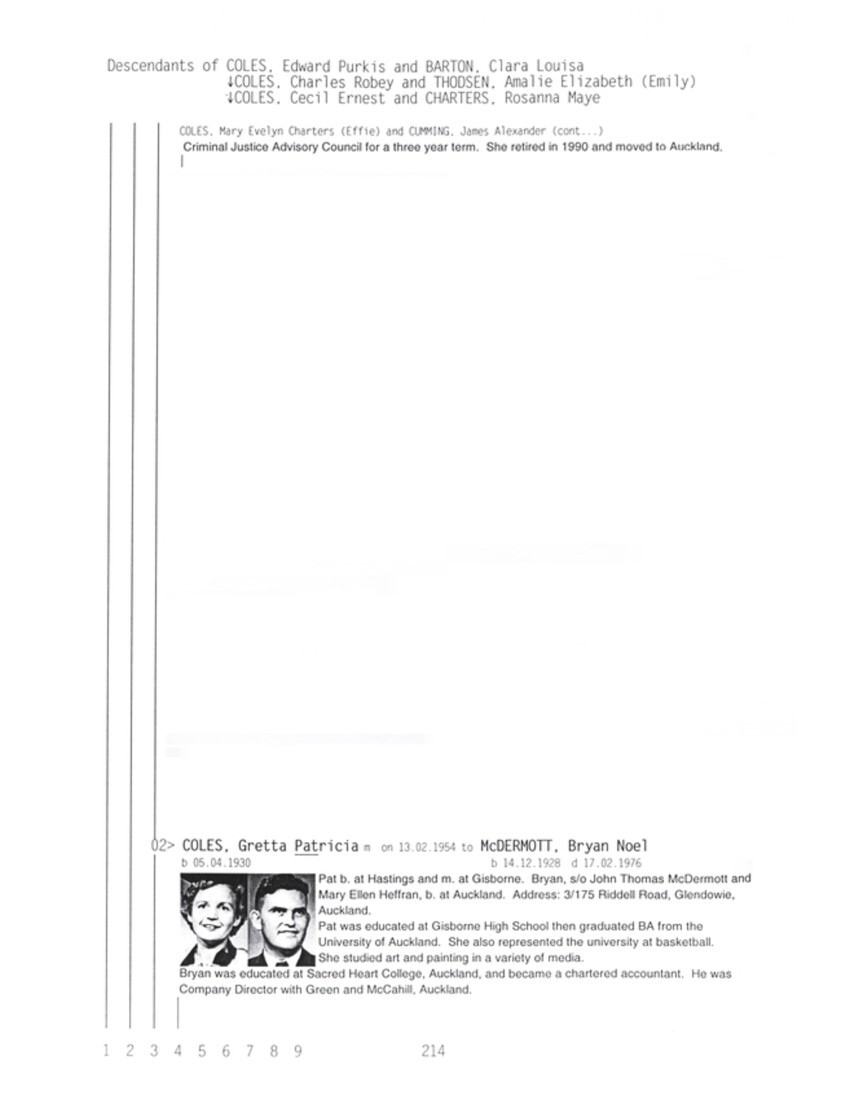
Page 217
Descendants of COLES, Edward Purkis and BARTON, Clara Louisa
COLES, Charles Robey and THODSEN, Amalie Elizabeth (Emily)
COLES, Cecil Ernest and CHARTERS, Rosanna Maye
COLES, Gretta Patricia and McDERMOTT, Bryan Noel
McDERMOTT, Elizabeth Maye and SCHICKER, Lawrence
[…]
03> COLES, Colleen Terris m on **.**.**** to HARDING, Ralph Taylor
b 16.06.1932 b 26.04.1928
Colleen b. at Sydney, Australia. Ralph, s/o Edric Caldwell Harding and Mabel Taylor-England, b. at Gisborne. Address: (Ralph) 264 Ormond Road, Gisborne.
Colleen worked for a local shipping company. She is involved with her church bible class and enjoys dressmaking.
After completing his education at Gisborne High School, Ralph worked as a farm hand then completed an adult apprenticeship as a motor technician. He later worked as a farm manager.
[…]
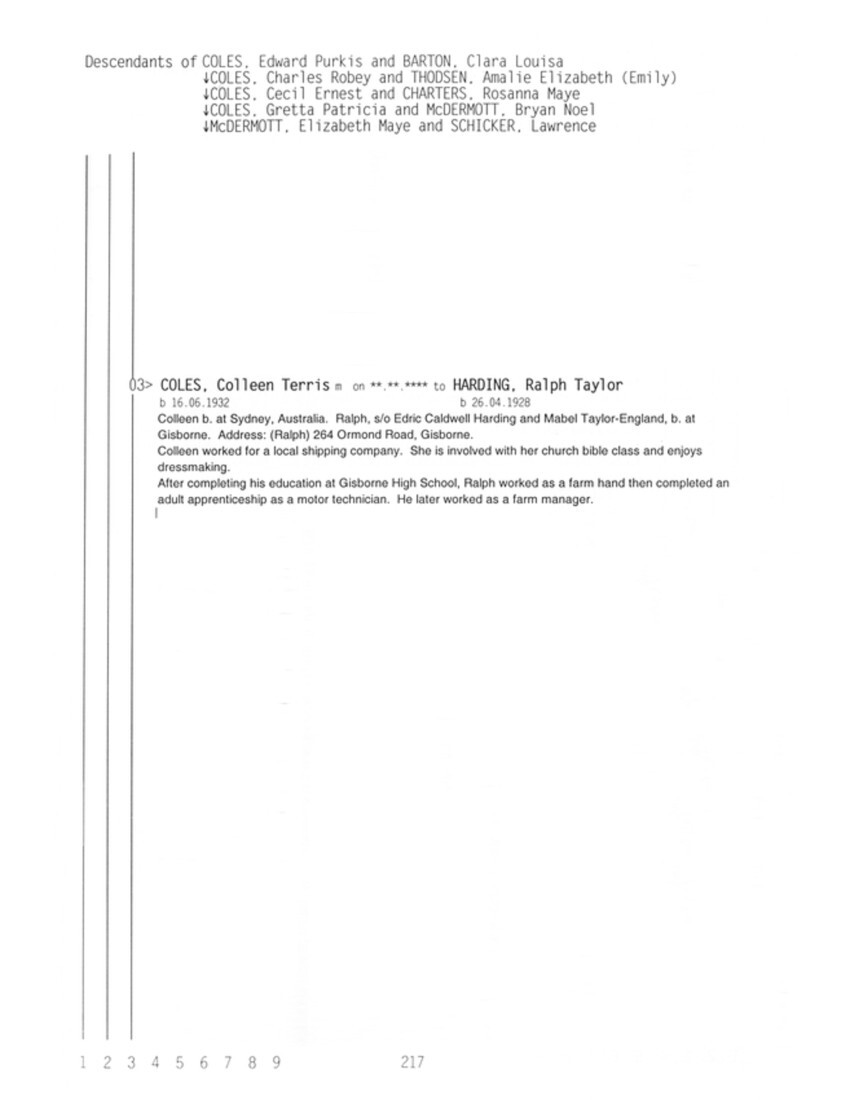
Page 218
Descendants of COLES, Edward Purkis and BARTON, Clara Louisa
COLES, Charles Robey and THODSEN, Amalie Elizabeth (Emily)
COLES, Cecil Ernest and CHARTERS, Rosanna Maye
04> COLES, Cecil Royston m on 20.03.1954 to (1) JOEL, Audrey Blanche
b 20.04.1934 b 19.09.1931
Roy b. at Hastings and m. at Gisborne. Divorced 13.06.1991. Audrey, d/o Robert Joel and Sadie Ennis, b. at Gisborne.
Audrey was educated at Ormond and Te Karaka Schools then nursed in Australia and Gisborne. She moved to Australia in 1999 and now lives with Valerie and David James.
[…]
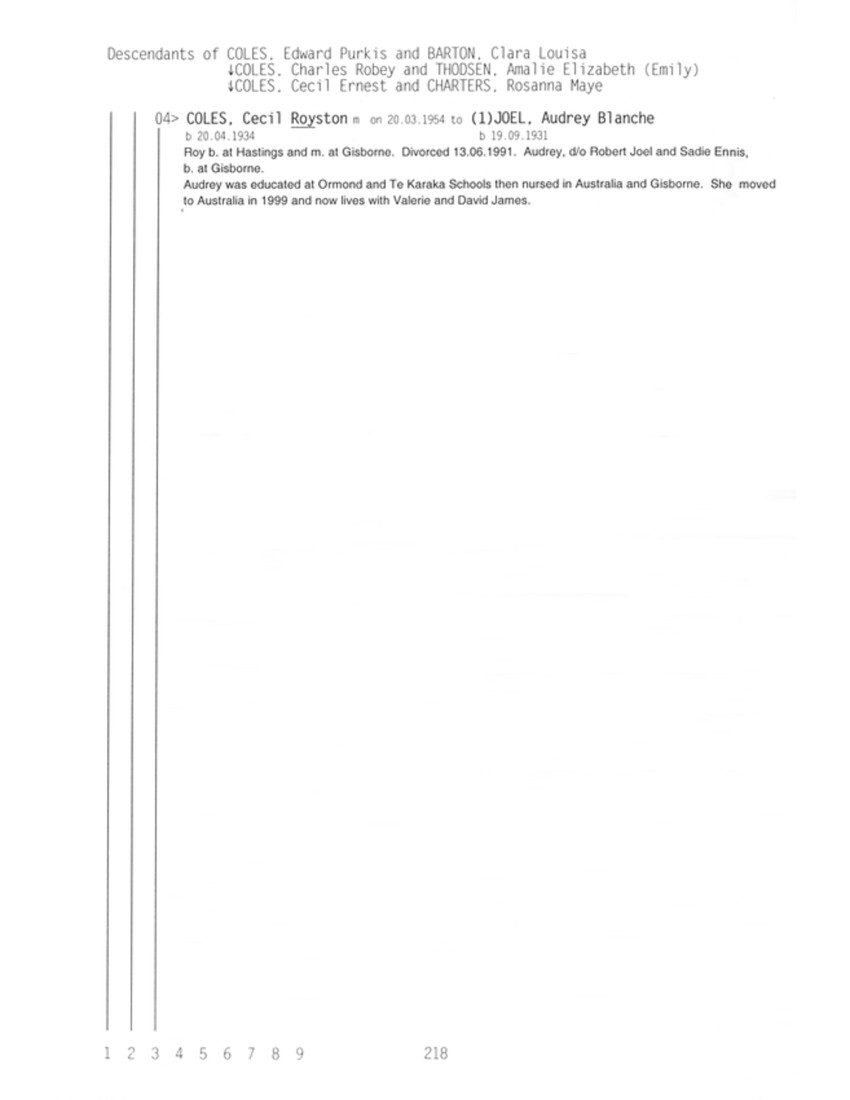
Page 219
Descendants of COLES, Edward Purkis and BARTON, Clara Louisa
COLES, Charles Robey and THODSEN, Amalie Elizabeth (Emily)
COLES, Cecil Ernest and CHARTERS, Rosanna Maye
COLES, Cecil Royston and JOEL, Audrey Blanche
[…]
04> COLES, Cecil Royston m on **.**.**** to (2) RADFORD, Lena Merina
b 20.04.1934 b **.**.****
Address: 7 Peter Snell Street, Whakatane.
Roy moved to Gisborne with his family in 1936 and was educated at Central and Mangapapa , Primary Schools, Gisborne Intermediate and Gisborne High School. He served an electrical apprenticeship at Cook Hospital and saw military service in the RNZAF at Taieri and Ohakea.
After his marriage to Audrey, Roy worked for six years with the State Hydro Electric Department as an electrical fitter at Tuai, and operator fitter at Khandallah and a control room operator at Wairakei. He returned to Gisborne to work for G J Habcroft Ltd followed by three years as an electrical contractor. He then became branch manager for P C Blenkarne, electrical wholesalers, remaining with them for 16 years. He was branch manager of NEECO for two years, then warehouse manager for J Streeter, a Kawerau firm. At this stage he went to live in Whakatane where he is now working for electrical contractors, Awakeri Electrical. His hobbies include vintage cars, motorbikes, wood turning, golf and dancing.
03> COLES, Mona m on 10.12.1924 to MACFARLANE, Leslie Mace
b 06.10.1899 b 13.06.1899 d 21.03.1984
Mona b. at Ongaonga and m. at Hastings. Leslie b. at Makaretu. Mona now lives at the Salvation Army Home in Taupo.
Leslie served his carpentry apprenticeship with Coles Bros in Ongaonga. He and Mona spent most of their married life in Hastings.
01> MACFARLANE, Betty m on 26.03.1955 to CLAY, Leendert
b 09.03.1926 b 27.02.1928 d 02.03.2000
Betty b. at Waipukurau and m. at Hastings. Leendert, s/o Ari Clay and Leentje Kraft, b. at Holland and d. and bd. at Hastings. Address: C/- Mrs M Wallace, 1197 Middle Road, RD 11, Hastings. Betty left school at 14 and worked part-time in a grocery store until her marriage.
Leen came to New Zealand at age 21 after spending time in Indonesia. He worked in engineering for (cont…)
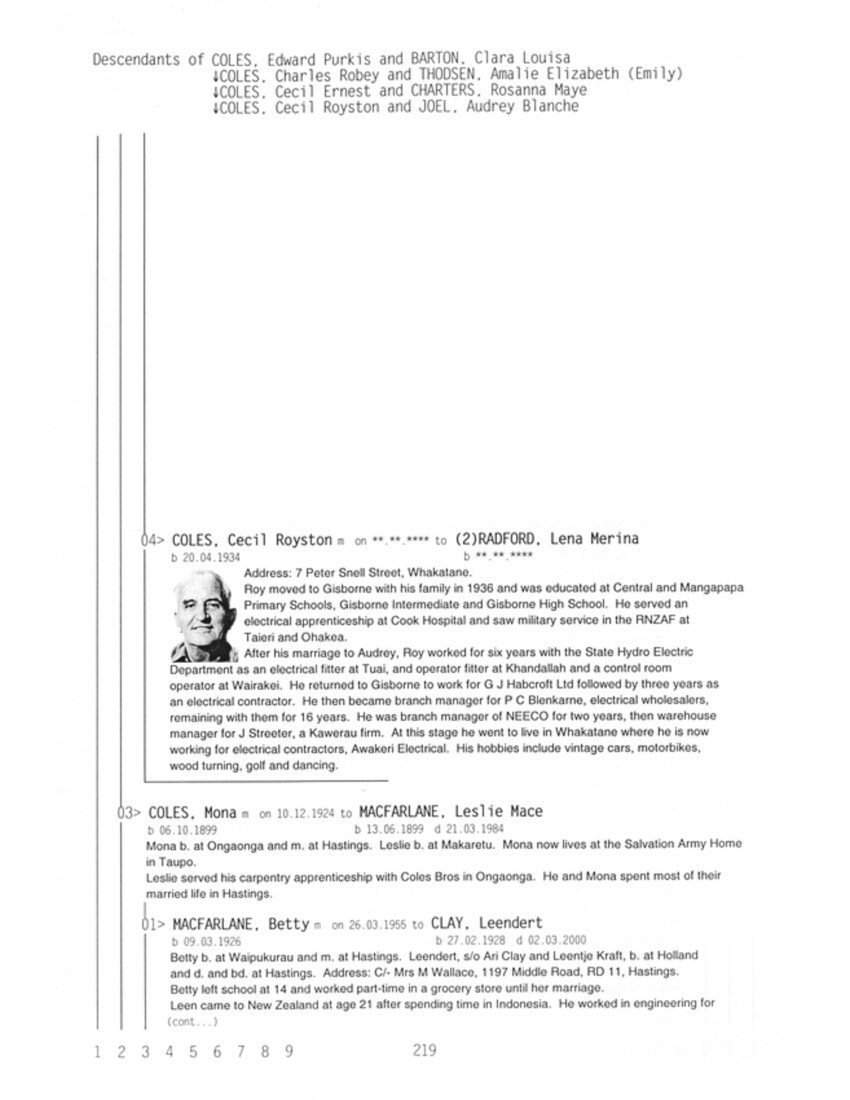
Page 220
Descendants of COLES, Edward Purkis and BARTON, Clara Louisa
COLES, Charles Robey and THODSEN, Amalie Elizabeth (Emily)
COLES, Mona and MACFARLANE, Leslie Mace
MACFARLANE, Betty and CLAY, Leendert (cont…)
several years before becoming a successful poultyry farmer.
[…]
02> MACFARLANE, Peter m on 31.05.1952 to MCLEOD, Florence
b 20.05.1928 b 26.09.1925
Peter b. at Waipukurau and m. at Lower Hutt. Florence, d/o Bertie McLeod and Barbara Grace Knilands, b. at Petone. Address: 12 Victoria Street, Taupo.
During his childhood, Peter lived in Hastings and, for short periods, in Ongaonga. He was educated at Parkvale (Hastings) and Ongaonga Primary Schools and then went on to Hastings High School. In 1945 he moved to Petone and started work with the New Zealand Railways as an apprentice fitter. Between 1950 and 1961 he worked for a short period as a draughtsman for NZR in Wellington and then as a fitter and (cont…)
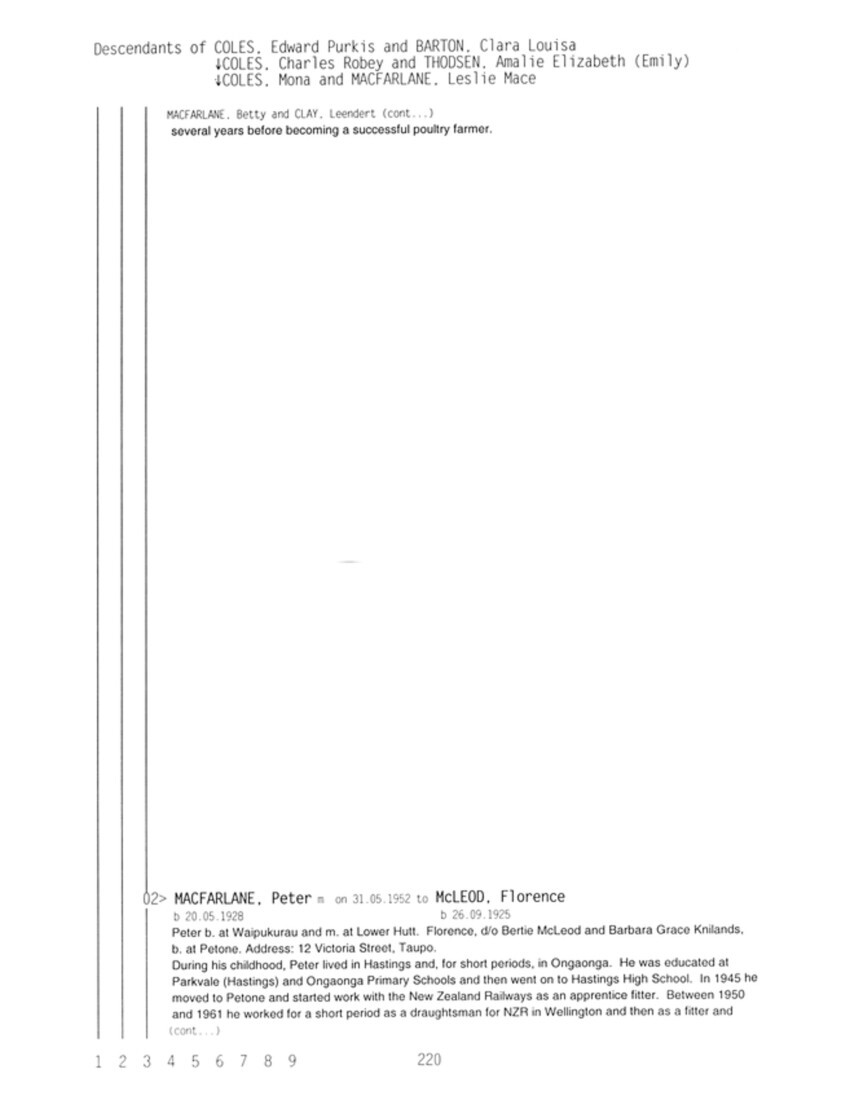
Page 221
Descendants of COLES, Edward Purkis and BARTON, Clara Louisa
COLES, Charles Robey and THODSEN, Amalie Elizabeth (Emily)
COLES, Mona and MACFARLANE, Leslie Mace
MACFARLANE, Peter and McLEOD, Florence (cont…)
turner at Mangakino and Hamilton. For the final 26 years before his retirement, he was employed as an engineering technician by a research group controlled by the New Zealand meat export industry and during this period he gained tertiary engineering qualifications.
Florence was educated at Wilford and Petone Central Primary Schools and Hutt Valley Memorial Technical College then worked in Wellington as a cutter in the clothing industry before her marriage. She has always maintained a strong interest in her church, including 15 years in a leadership role with the Girls’ Life Brigade.
Peter’s interests include rowing, table tennis, snooker and woodturning whilst Flo enjoys marching, table tennis, walking and line dancing.
[…]
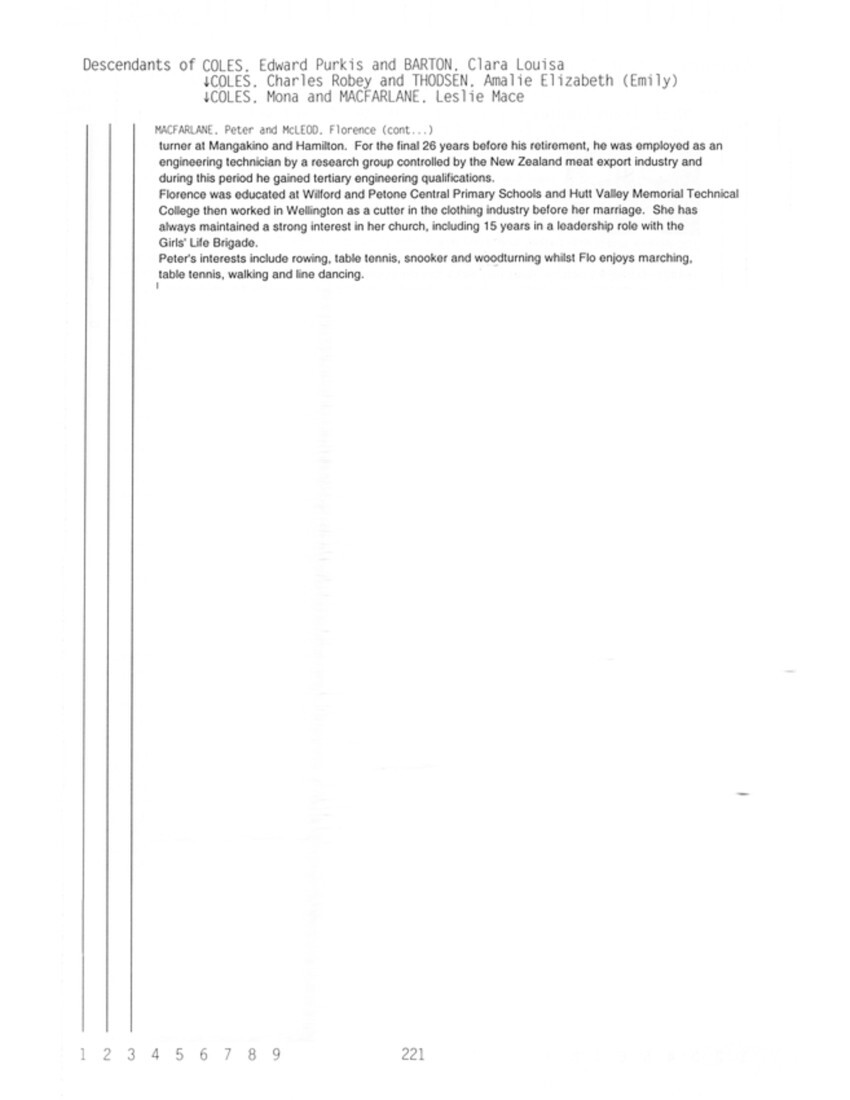
Page 222
Descendants of COLES, Edward Purkis and BARTON, Clara Louisa
COLES, Charles Robey and THODSEN, Amalie Elizabeth (Emily)
04> COLES, Frank Charles m on 24.05.1928 to SIMPSON, Irene Mabel
b 01.12.1902 d 10.10.1981 b 29.09.1904 d 12.06.1994
Frank b. at Ongaonga and m. at Waipukurau. Irene, d/o Lawrence William Simpson and Annie Gosling, b. in England.
Frank lived in Ongaonga as a child, in the house opposite the village hall. As a young man, he was ill with Rheumatic Fever and spent some time recovering from this working for Alex Inglis on his Ashley Clinton farm. Joining the Coles Bros firm in his late teens he served his time and worked for his uncle Ernest in Papatoetoe, and then in Sydney and Melbourne.
Frank and Irene purchased a building site on the corner of Chambers and Gillean Streets in Havelock North in 1927. During the next five years they built a two storey concrete block house with blocks hand made on site. About 1935 Frank and Irene and daughter Janet moved to Ongaonga and lived in what is now the village store. They moved to the house to the east of the old post office in 1918. Frank purchased the business from Coles Bros in 1937 and after the lean years of the 1930’s, business and staff numbers increased. World War Il saw four young men, Basil Dassler, Jim Coles, George Watts and Len Watts leave for war service. Frank employed up to 18 staff over the period of 1936-58. Many of those years were made difficult by shortages caused by rationing of building materials as a result of wartime demands. Working weeks were long with afterhours time spent drawing plans and doing office work from an office table at one end of the family kitchen.
In 1957, Frank had an accident at work, breaking his arm and several ribs which failed to heal normally, taking 2 years to return to full use. Business declined progressively and ceased in 1963. Irene came to Christchurch with her mother and father, a draper from London, in 1904. Work opportunities took the family to Kaiapoi, Norsewood (1912) and finally Ongaonga, where the family moved in 1917. The family purchased the local general store and drapery. Irenes older brothers Lawrence and James returned to Ongaonga at the end of their service in World War 1. The Simpson lived in the house as the east end of the village hall.
The following are the written thoughts of Ted Bibby in a letter to Irene after Franks death.
“There are few of my friends, with whom I had so much in common. The ideal that both our lives and our work should be as one, and to the community.
I like to see the work and what men strive to achieve, although many now, have been “long gathered to their fathers”. I know in the short time left for me, I will see much of Frank’s efforts.”
01> COLES, Janet m on 25.10.1958 to KOENDERS, Antonius Johannes
b 08.05.1932 b 16.10.1927
Janet b. at Waipawa and m. at Ongaonga. Antonius, s/o Johannes Wilhelmus Koenders and Wilhelmina Maria Nibbeling, b. at Doetinchem, Holland. Address: 633 Te Aute Road, RD 2, Hastings.
Janet was educated at Ongaonga Primary School and Waipawa High School then worked in the office of Coles Brothers factory and then at the Ongaonga General Store. Anton was educated in Doetinchem, Holland, followed by five years of evening classes, two of them in New Zealand. In Holland he started work as a milk boy and testing cow’s milk. He went into the Dutch Army at 18 years of age and served in Indonesia for three years. He was back in Holland for two years before emigrating to New Zealand. He worked in the freezing works for two years and as an engineer for five years.
After their marriage, Janet and Anton had a poultry farm for 20 years then took up orcharding where they have been for the last 20 years. They have done a share of community work and served on various committees and they both enjoy gardening and reading and seeing the sights of New Zealand. They made a trip to Holland in 1976.
[…]
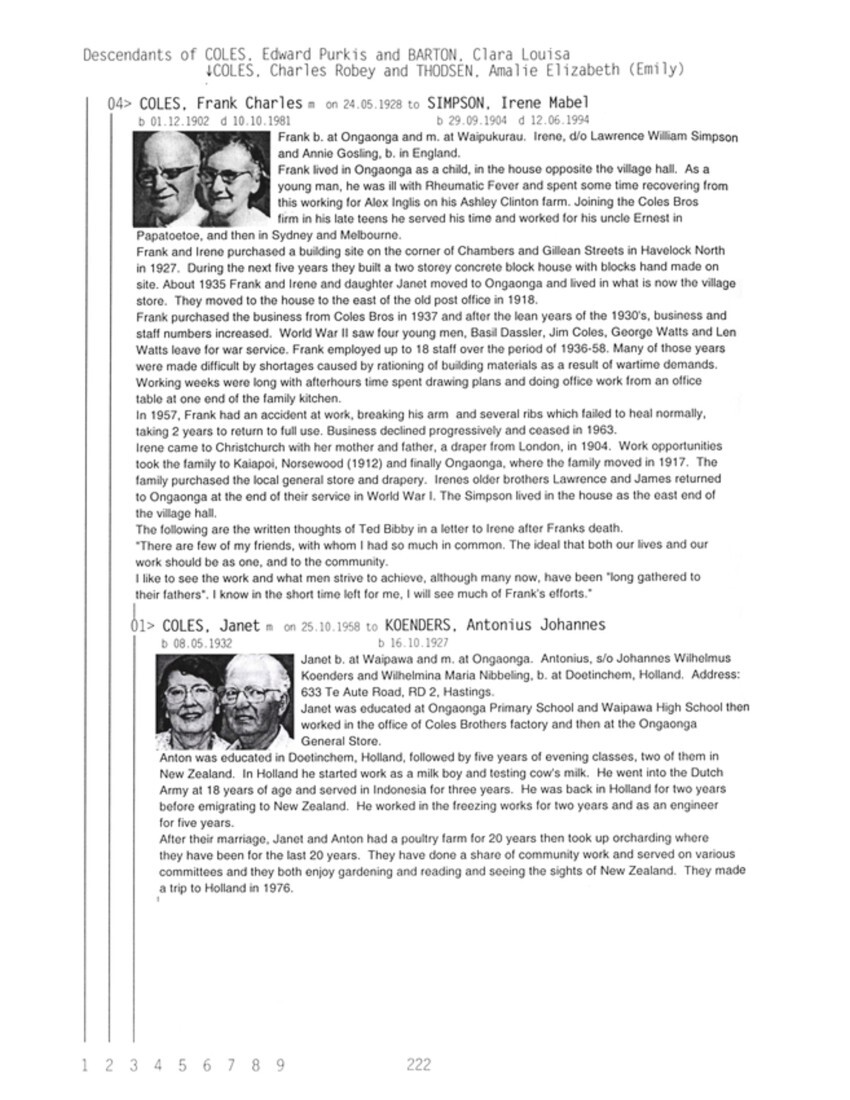
Page 223
Descendants of COLES, Edward Purkis and BARTON, Clara Louisa
COLES, Charles Robey and THODSEN, Amalie Elizabeth (Emily)
COLES, Frank Charles and SIMPSON, Irene Mabel
02> COLES, Cherie Robin m on 21.11.1964 to COOKE, David Edwin
b 09.11.1943 b 20.09.1943
Cherie b. at Waipawa and m. at Ongaonga. David, s/o Raymond Albert Cooke and Phyllis Millner, b. at Levin. Address: 18A White Street, Taradale.
Cherie was educated at Ongaonga Primary School, Waipawa High School and Central Hawkes Bay College then went to Wellington Teachers’ College for two years. She subsequently taught at Waipukurau, Island Bay and Westshore. After their marriage, she and David lived in Wellington until 1966 when they moved to Napier. They established their home in Taradale in 1968. After having their family, Cherie took up ticket writing for shops and was a merchandiser for a biscuit company. She was a freelance ticket writer and window dresser in Napier and Hastings and a tutor at the Hawkes Bay Polytechnic in these skills. A ten-year member of the Taradale-Otatara Lions Club, she was president in 1998-99. Cherie and David left Taradale in August 1999 for an extended working holiday in the United Kingdom.
Refer to “John and Elizabeth Harper of Christchurch and their Descendants” published by Evagean Publishing in 1994 for information on David’s family.
[…]
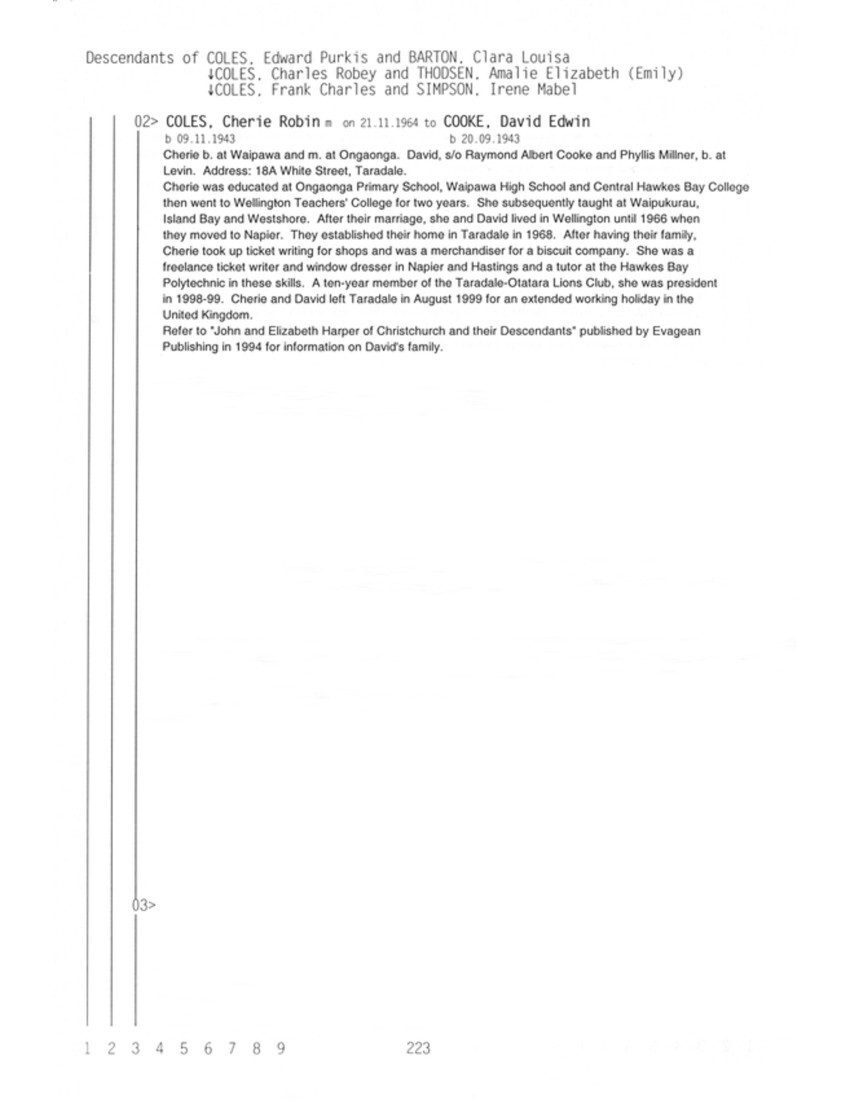
Page 224
Descendants of COLES, Edward Purkis and BARTON, Clara Louisa
COLES, Charles Robey and THODSEN, Amalie Elizabeth (Emily)
COLES, Frank Charles and SIMPSON, Irene Mabel
[…]
05> COLES, Nora m on 29.09.1926 to HARDY, John Laurence
b 14.11.1904 d 26.05.1996 b 17.06.1895 d 25.09.1974
Nora m. at the Presbyterian Church, Ongaonga and d. at Wellington. John, s/o Charles Albert Creary Hardy, b. at Rakaia and d. at Wellington.
Nora went about making a house into a home and everyone in it feeling loved and important. She had a knack of making people feel important when in her presence. Nothing was too much trouble and no time was inconvenient. (cont…)
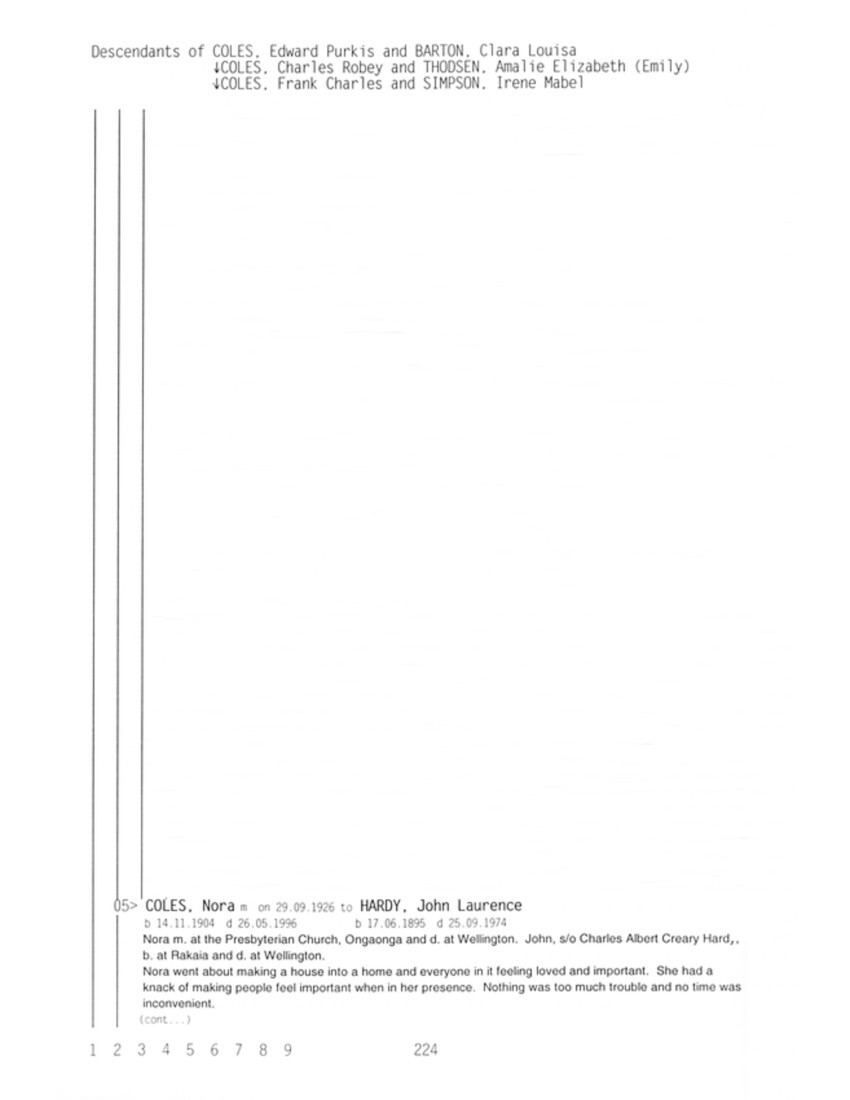
Page 225
Descendants of COLES, Edward Purkis and BARTON, Clara Louisa
COLES, Charles Robey and THODSEN, Amalie Elizabeth (Emily)
COLES, Nora and HARDY, John Laurence (cont…)
Unfortunately, no biographical material has been received for Nora and John. Nora was a very good pianist and organist and had an ATCL in piano. She played with exceptional touch and interpretation, and played for St Hildas Anglican Church for about 60 years. The children had great memories of musical evenings in their lounge when she played the piano as the sun set slowly over the South Island mountains. She used to go about her very busy days softly whistling tunes, seemingly comforted and never alone with her attendant music.
John was a civil engineer and worked for State Hydro and New Zealand Electricity Department. After completing his BE he was engaged in field work in Hawkes Bay where he met Nora. His sons Charles and Ken followed in his track as civil engineers while brother Bob was an electrical engineer and brother John was an accountant. He was a very keen bowler and spent most of his weekends at it. He was also a good chess player and got involved heavily as a player, administrator and supplier of tobacco products for the chess club. He used to ride his bike everywhere, including ten miles to work and back each day. He had a great sense of humour and was quite a character. Nora used to say that he never failed to tell her each day that he loved her.
The following are extracts from a letter that Nora wrote to the Ongaonga Historical Society on 11 June 1992:
“I corresponded from time to time with Mr Ted Bibby and discussed Onga news. I remember when he used to teach Sunday school and Bible classes at the Presbyterian Church, where I used to play the organ until I married in 1926. I remember the church being built and also the manse and the ministers, Revs Mr Jyle, Mercer, Smith and Lankshear.
“My father attended the little school which is now the museum.
“The old Coles family home has gone and latterly the butcher’s shop moved. I remember when that was erected and the folk who were there – Mr Symonds, Mr Hook and later Bill Ross.
“I wonder if the old bell still exists? It used to hang on the eastern end of the roof of the factory and was rung on six days of the week each morning at 7.30 by my father who went down to stoke the coke furnace which never went out. As children we loved to get rides on the old trolley which was used to take the shavings and sawdust down to the back of the factory into a little valley by the stream there. I remember the huge engine and the great roar of the machines. Dad ran that part and had his engineering certificate which we still have. At one time he did that work at the flour mill.
“I have lived here by the sea at Island Bay for 66 years in November. My house overlooks Cook Strait and we have a beautiful view of the South Island mountains… I have very happy thoughts of it all [Ongaonga] and a very happy childhood there. I learned the piano and taught music for a while before I married and came to Wellington. I have been organist at Kt Kilda’s Anglican Church in the Bay for many years. But now I play only on some occasions at the church but have my own instrument here.”
01> HARDY, Elizabeth Anne m on **.06.1947 to (1) HOOKHAM, Fredrick James
b 18.07.1927 b 05.03.1920 d 05.02.1983
Elizabeth b. and m. at Wellington. Frederick b. at Wellington and d. at Foxton.
[…]
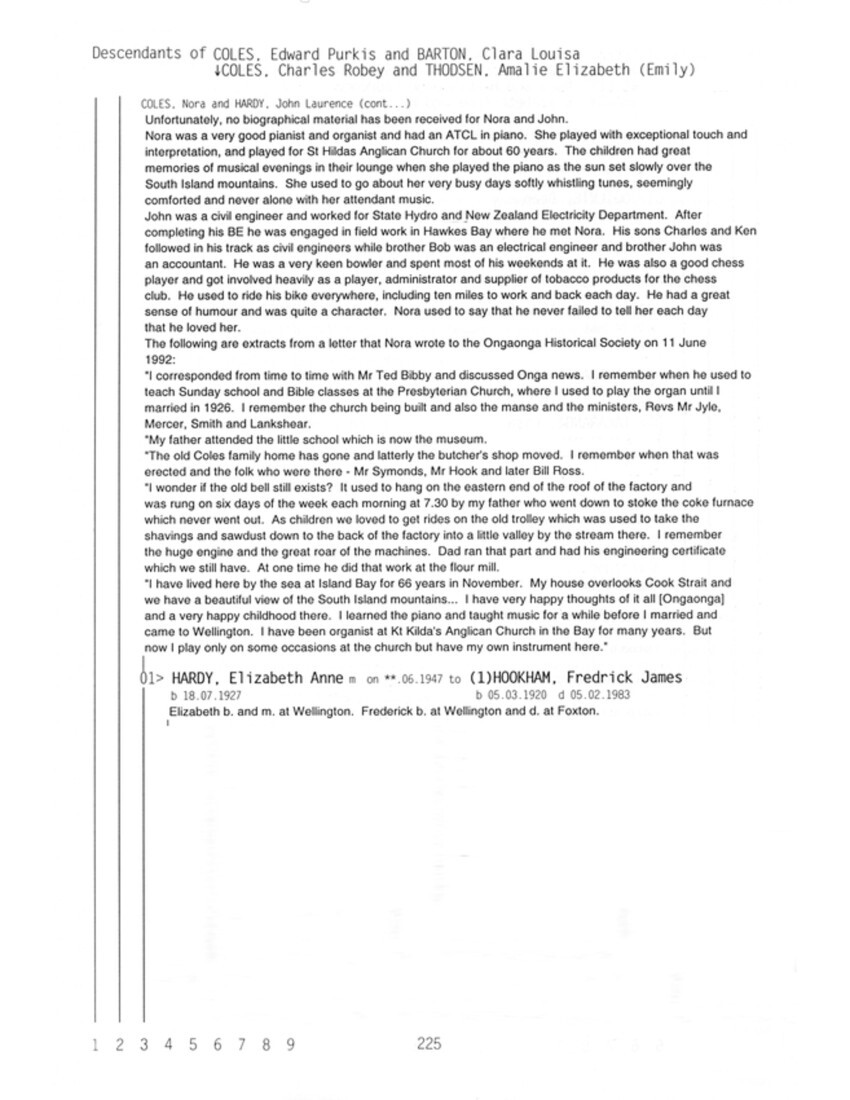
Page 226
Descendants of COLES, Edward Purkis and BARTON, Clara Louisa
COLES, Charles Robey and THODSEN, Amalie Elizabeth (Emily)
COLES, Nora and HARDY, John Laurence
HARDY, Elizabeth Anne and HOOKHAM, Fredrick James
[…]
01> HARDY, Elizabeth Anne m on 14.11.1987 to (2) STEWART, Ross
b 18.07.1927 b **.**.****
Elizabeth m. at Foxton. Address: 1 Purcell Street, Foxton.
02> HARDY, Margaret Nora m on 04.11.1950 to (1) JOSLING, John Ross
b 18.10.1928 b 27.01.1926 d 07.03.1980
Margaret b. and m. at Wellington. John, s/o John Otway Josling and Mary Ross, b. at Wellington.
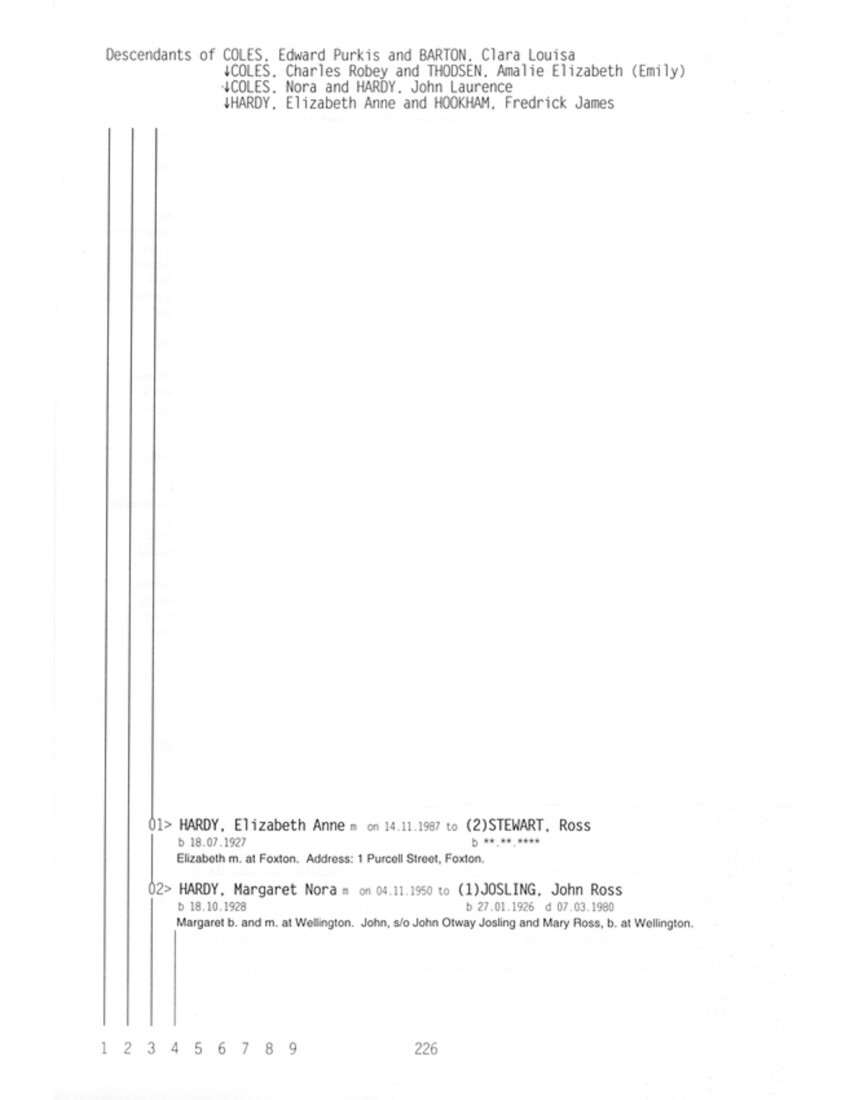
Page 227
Descendants of COLES, Edward Purkis and BARTON, Clara Louisa
COLES, Charles Robey and THODSEN, Amalie Elizabeth (Emily)
COLES, Nora and HARDY, John. Laurence
HARDY, Margaret Nora and JOSLING, John Ross
[…]
02> HARDY, Margaret Nora m on 07.02.1981 to (2) ACHILLES, John Francis
b 18.10.1928 b 26.09.1929
Margaret m. at Wellington. John, s/o John Patrick Achilles and Mary Ann Sullivan, b. at Aldershot, England. Address: 196 Derwent Street, Island Bay, Wellington 2.
John was previously married to Dorothy Mary Lindsay who died in 1972. They had children John Patrick (b.18.01.1954), Kevin Barry (b.10.03.1955), Teresa Mary (b.28.09.1956), Peter Michael (b.09.11.1957), Terrance Francis (b.01.11.1960) and Gwendoline Margaret (b.29.06.1964).
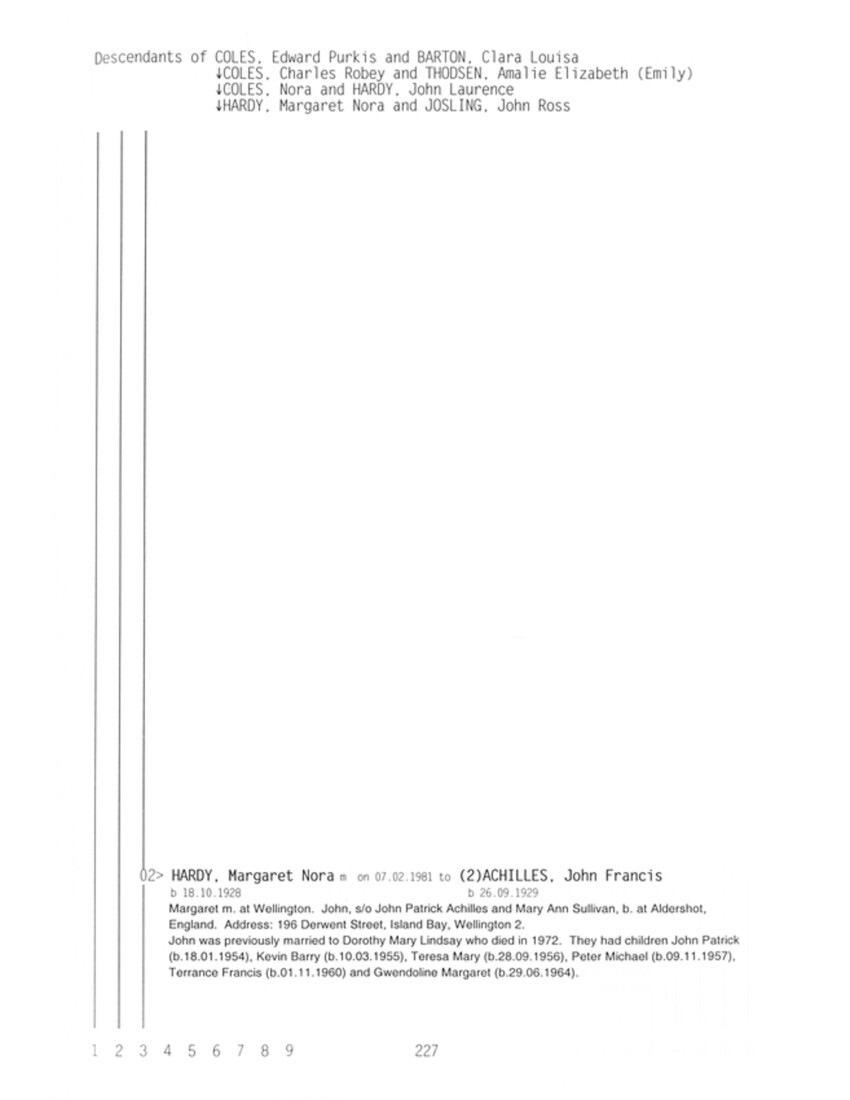
Page 228
Descendants of COLES, Edward Purkis and BARTON, Clara Louisa
COLES, Charles Robey and THODSEN, Amalie Elizabeth (Emily)
COLES, Nora and HARDY, John Laurence
03> HARDY, Charles George m on 12.12.1959 to DAVIES, Mary Joy
b 17.08.1931 b 26.07.1932
Address: 67 Friend Street, Karori, Wellington.
Charles was a Civil Engineer.
[…]
04> HARDY, John Searight m on 10.11.1956 to (1) HANDCOCK, Pauline
b 05.07.1933 b**.**.****
John b. and m. at Wellington. Divorced.
[…]
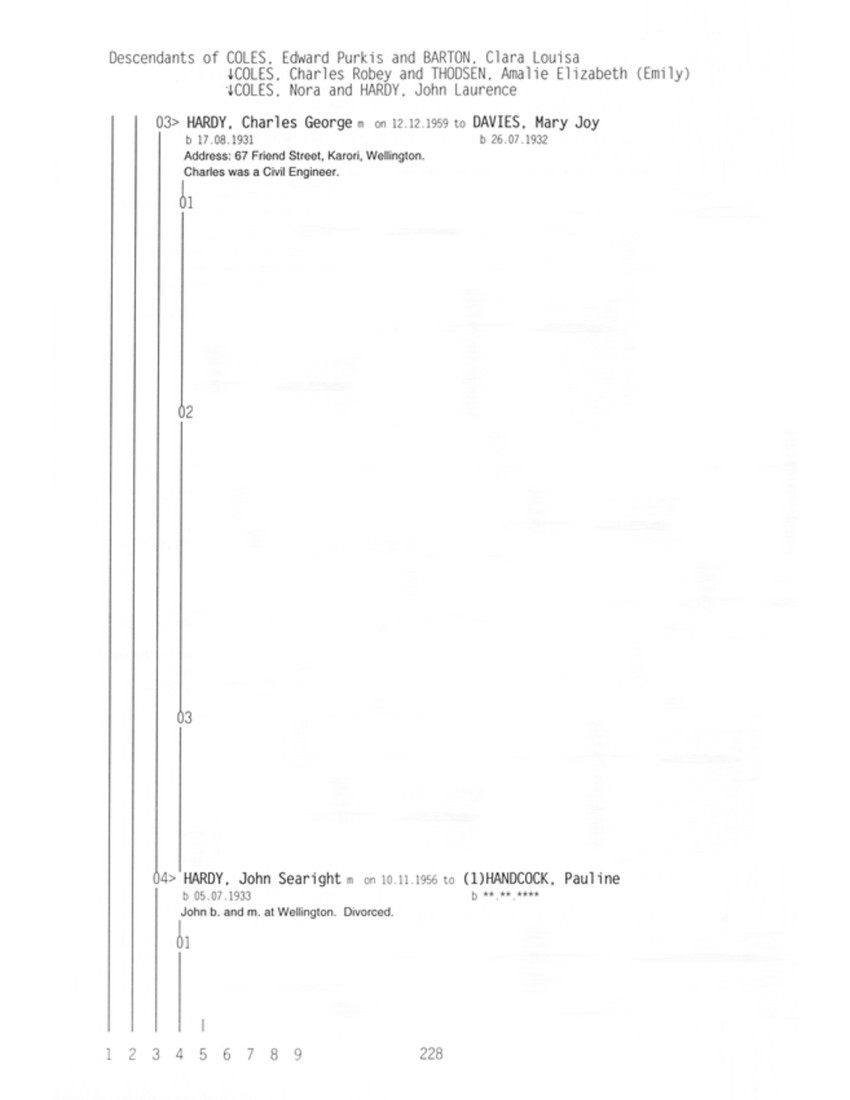
Page 230
Descendants of COLES, Edward Purkis and BARTON, Clara Louisa
COLES, Charles Robey and THODSEN, Amalie Elizabeth (Emily)
COLES, Nora and HARDY, John Laurence
HARDY, John Searight and HANDCOCK, Pauline
HARDY, Alan Grant and NEBAUER, Janelle Ann
[…]
04> HARDY, John Searight m on **.**.**** to (2) MANNING, Maxine
b 05.07.1933 b **.**.****
Address: PO Box 22, Hastings Point, NSW 2489, Australia.
John writes:
“I was born rather handicapped with opposing hemispheres of my brain fighting for supreme position – one, the expressive side, inherited from my mother, and the other, the mechanical, practical side, from my father. The resultant conflict let to playing one off against the other, and I was fairly unsuccessful at both fields. Probably the best part is now, where I am playing bass each Saturday at a jazz jam session and a bit of cocktail piano here and there. I am also into music education through computer programmes. Prior to this I spent the last 13 years of my working life as Financial Controller of a family badge and medal making company (90 employees), taking them out of the stone age with the aid of my designed accounting and manufacturing and CAD computer systems, to be a fairly liquid “cash cow”. Which leads to the question, “What is success?””
05> HARDY, Kenneth Niall Alan m on 03.04.1961 to LEATHEM, Janice Marie
b 18.01.1937 b 29.11.1939
Kenneth b. at Wellington and m. at Christchurch. Janice b. at Eltham. Address: 17 Sampson Street, Orange 2800, NSW, Australia. Ken was a Civil Engineer.
[…]
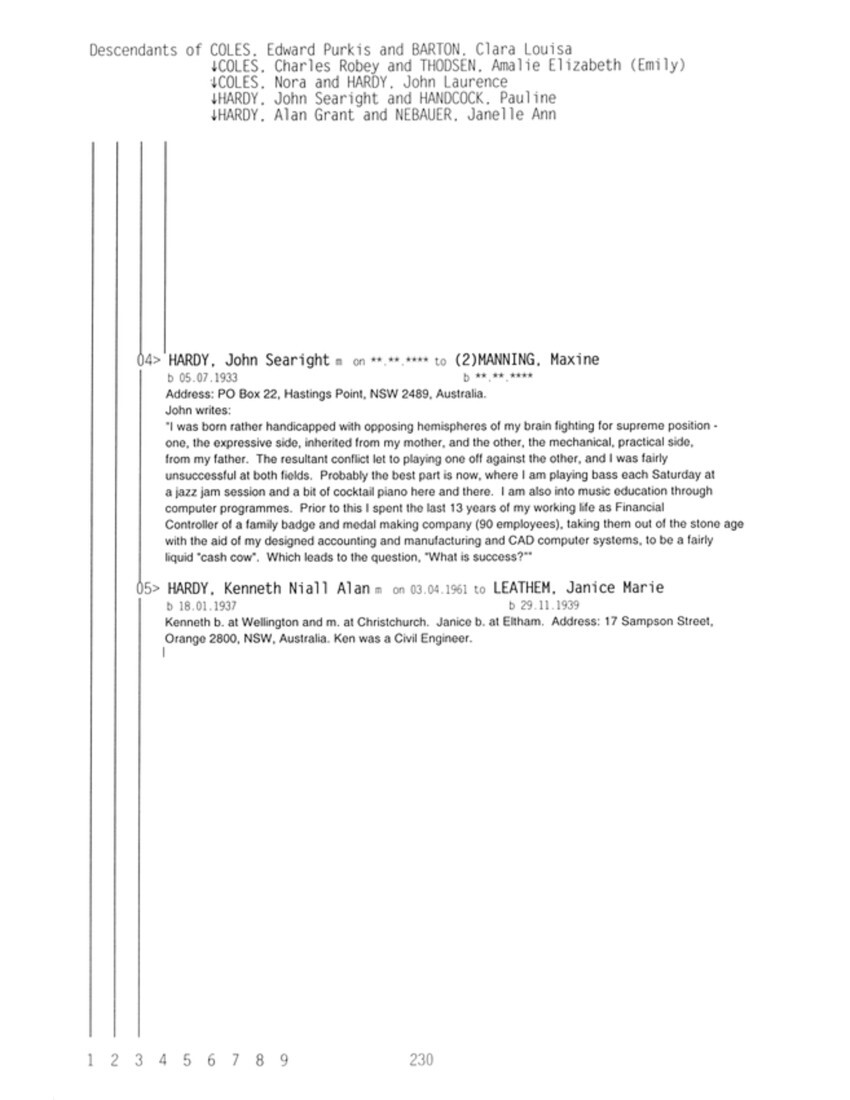
Page 231
Descendants of COLES, Edward Purkis and BARTON, Clara Louisa
COLES, Charles Robey and THODSEN, Amalie Elizabeth (Emily)
COLES, Nora and HARDY, John-Laurence
HARDY, Kenneth Niall Alan and LEATHEM, Janice Marie
[…]
06> HARDY, Robert Maxwell m on 20.08.1965 to BOOTH, Carole Anne
b 08.03.1943 b 18.08.1945
Robert b. and m. at Wellington. Carole b. at Wellington. Address: 17 Branscombe Street, Johnsonville, Wellington.
[…]
06> COLES, Olga m on **.**.*** to CLARK, Arthur Charles
b 11.06.1907 d 19.06.1997 b **.10. 1898 d **.**. 1960
Olga was anything but a self-promoting extrovert but she was capable in many directions, like the rest of her family. Her main interests were music, piano, reading, dressmaking and sewing, gardening, church affairs, and shopping in Wellington with her sister Nora and other friends of many years. She was a good walker and enjoyed mostly very good health. She combined extreme shyness with great strength – a curious combination. She was very cool-under-fire – or earthquakes. She got quietly on with works of charity, learned Braille at one stage, produced several books and did numerous kind things for other people. She (cont…)
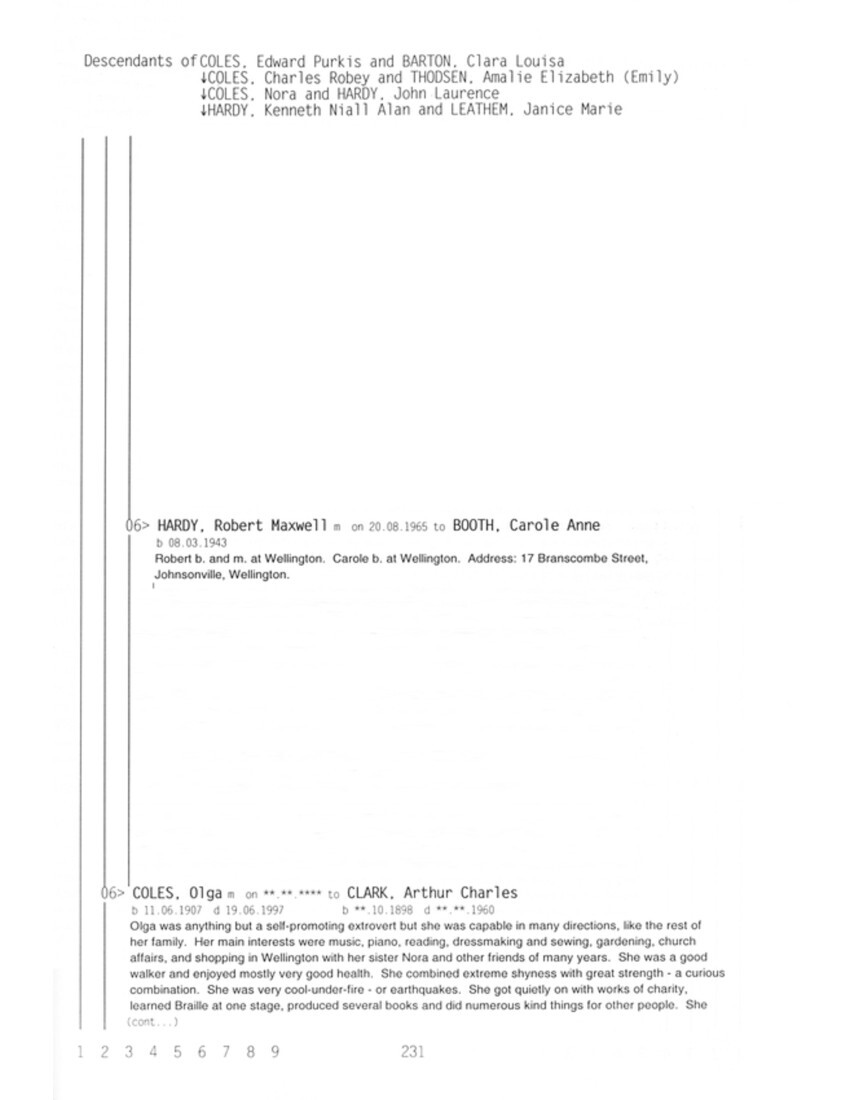
Page 232
Descendants of COLES, Edward Purkis and BARTON, Clara Louisa
COLES, Charles Robey and THODSEN, Amalie Elizabeth (Emily)
COLES, Olga and CLARK, Arthur Charles (cont…)
was bored rigid by sport, the New Zealand religion, preferring the non-competitive fine arts of painting, music and reading. She was a good homemaker and belonged to the ‘make-something-out-of-nothing’ generation. She was a superior seamstress and made all her own clothes, coats and hats, and many things for her family, including suits and jackets. She attended Waipawa High School where she excelled in several subjects, English amongst them. She was lucky enough to have as teacher, and later, friend in Wellington, Francis Irvine Smith, about whom it was said, “Never a greater teacher walked into a classroom” (When she taught at Wellington Teachers’ Training College). The chores of houskeeping didn’t fill Olga with unbounded joy – she would have preferred to have been a painter or potter, if her life and times had allowed it.
Arthur was born in London and stayed frequently in Southern England for his health’s sake. He later recalled with nostalgia places like Wiltshire, Surrey, Salisbury Plains and Glastonbury, places that he never saw again after coming to New Zealand a few years after WW1. He arrived in Ongaonga to stay with his uncle and aunt, Lawrence William and Annie Simpson, and his cousins (his cousin, Rene, also married into the Coles family).
After their marriage, Olga and Arthur moved to Wellington to live. Arthur trained as a draughtsman with the State Hydro Electricity Department and worked there for the next thirty or so years, alongside his engineer brother-in-law, ‘Skip’ Hardy. His life interest was music and he was a remarkably fine lyric tenor and accompanied himself on the piano. His singing and music-making were inspirational and still vividly remembered. He was remarkably self-contained and self sufficient and claimed that he could happily live on a desert island. He came from the specialising background of a big city and had none of the hands-on abilities of the Coles family, especially those thrown into Colonial New Zealand where versatility was a necessity. He didn’t enjoy great health, and had a sometimes volcanic temper; but who cares when a man is holding aloft the very best and loveliest of English, Welsh, Irish and Scottish song? “Proud remnants of a visionary race”.
01> CLARK, David Charles m on 28.08.1954 to (1) HALL, Margaret
b 20.10.1930 b 22.07.1932 d 04.07.1980
David b. and m. at Wellington. Margaret, d/o Malcolm Hall and May Craighead, b. at Wellington, d. at Tauranga and bd. at Te Puke.
Margaret worked as a nurse, clerk and dairy farmer.
[…]
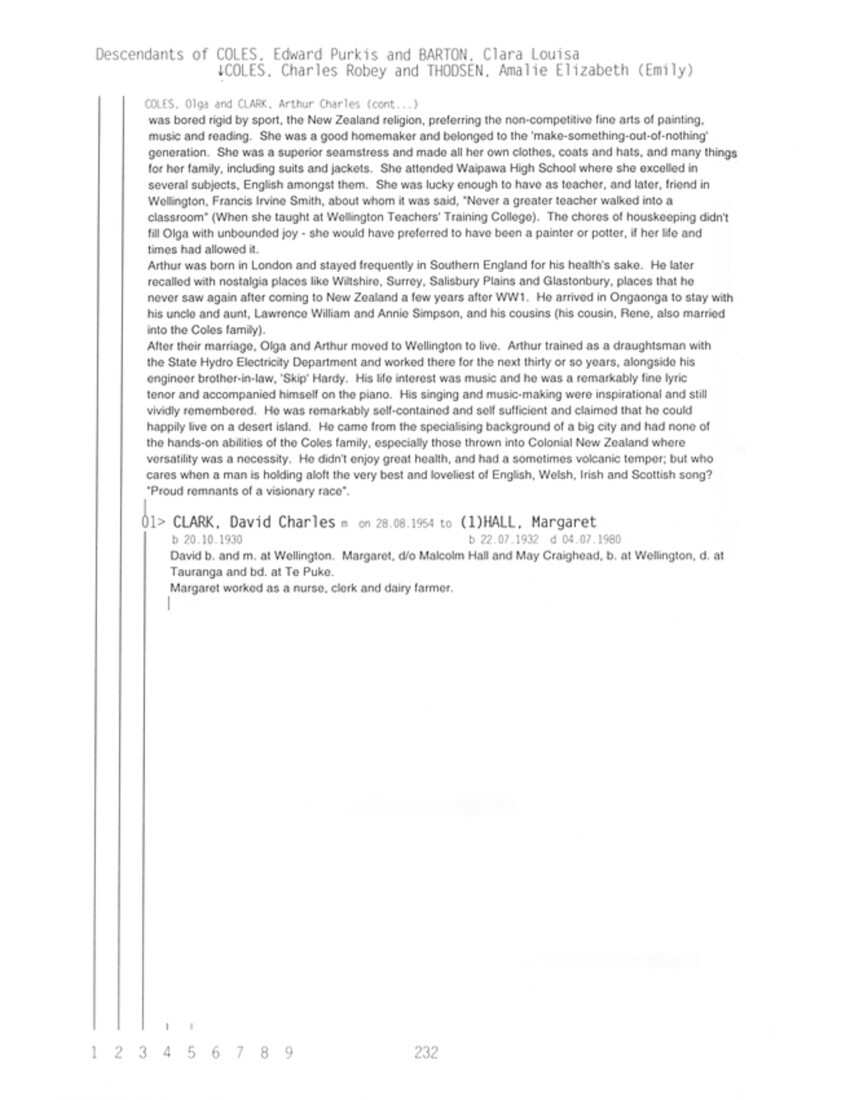
Page 233
Descendants of COLES, Edward Purkis and BARTON, Clara Louisa
COLES, Charles Robey and THODSEN, Amalie Elizabeth (Emily)
COLES, Olga and CLARK, Arthur Charles
CLARK, David Charles and HALL, Margaret
CLARK, Robert Michael and RIWAKA, Rawinea
[…]
01> CLARK, David Charles m on 06.02.1982 to (2) MARTIN, Patricia Eileen
b 20.10.1930 b 28.12.1937
David m. at Te Puke. Pat, d/o Desmond Cosgrave and Eileen Cunliffe, b. at Wellington. Address: 238 Wilson Road North, RD 9, Te Puke.
David has worked as an insurance clerk, wood and coal merchant, farm worker, sharemilker, dairy farm owner and kiwifruit orchardist. Pat has been a grocery assistant and grocery manager.
02> CLARK, Michael Robin
b 09.08.1934
Michael b. at Wellington. Address: Coach Road, Eketahuna.
Michael is a dyed-in-the-wool romantic, having been surrounded since birth by music, principally the lyric songs of England, Ireland, Wales and Scotland sung by his father, and by the piano playing of his mother who loved music equally. He studied art for seven years, then starved in a garret for the following forty, to confirm his father’s words, “You’ve chosen a hard life, boy”. For thirty-two years he has been a happy dweller in the southern reaches of The Seventy Mile Bush – the Coles lived at the northern border, both towns having been on the edge of the ‘jungle’ in 1875. He decided early in life to work to live rather than to live to work. Michael is a devotee of music, food, old gardens, the outdoors, wild nature – mountains, hills and rivers -, restoration, reading, wood, wood fires. He made a crust at anything that came along. Michael identifies with a fragment of a sonnet written, perhaps, by his namesake, Michael Angelo.
“Racked by all that to the eyes is fair,
Yet desirous of the joys that truly bless,
My eye can find no stair to climb to Heaven,
Save earth, and earth’s loveliness.”
07> COLES, Ada m on **.**.**** to PARKER, Francis Raymond
b 07.02.1909 d 31.12.1982 b 21.08.1904 d 06.07.1986
Ada and m. at Ongaonga, m. in the Ongaonga Catholic Church and d. and bd. at Hastings. Raymond, s/o James Charles Parker and Mary Margaret Murphy, bd. at Hastings.
Refer to “The Descendants of Michael and Sarah Lawlor” published by Evagean Publishing in 1998 for information on Raymond’s family.
01> PARKER, Terence Raymond m on **.**.**** to (1) HAMILTON, Irene
b 12.08.1929 d 09.05.1996 b **.**.****
Terence b. at Hastings.
01> PARKER, Jillian m on **.**.*** to ELDRED, Gregory
b **.**.**** b **.**.****
Address: 712 Jervois Street, Hastings.
Jillian is Irene Hamilton’s daughter. Terry tried to adopt her but her father is unknown. Terry always treated Jillian as his own, as he did with her children also.
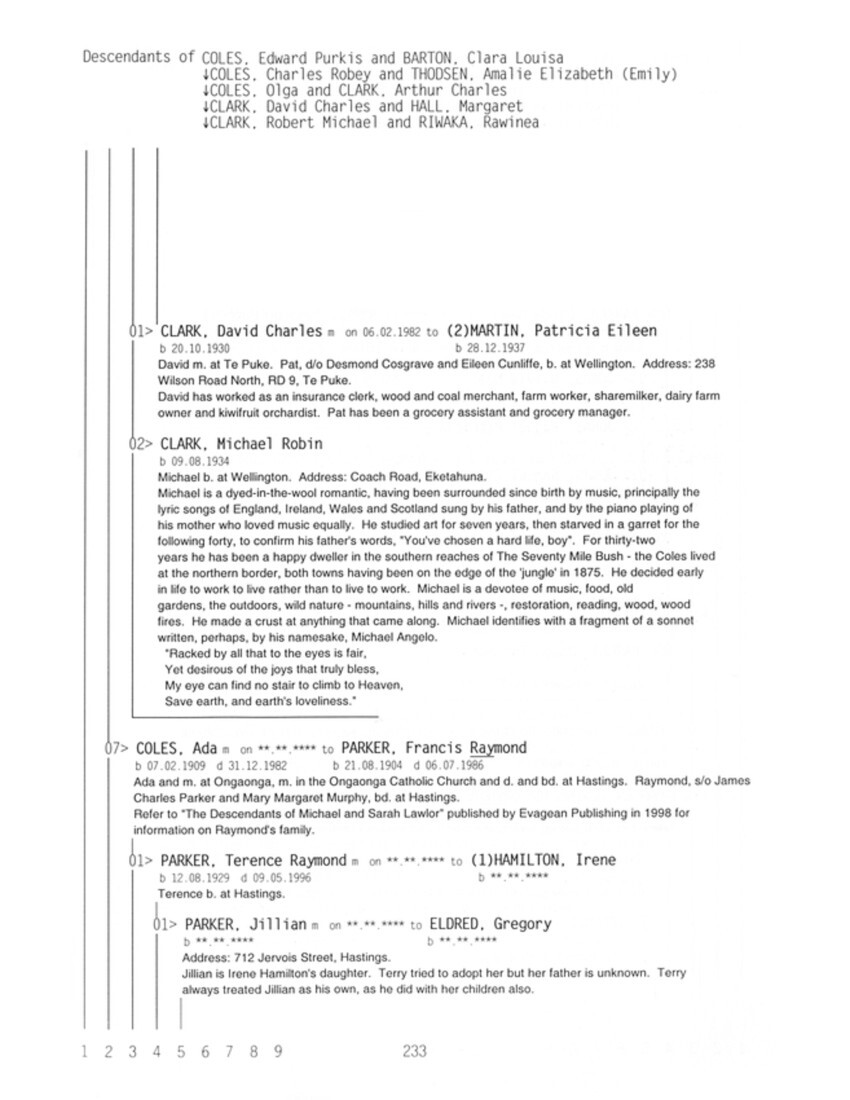
Page 234
Descendants of COLES, Edward Purkis and BARTON, Clara Louisa
COLES, Charles Robey and THODSEN, Amalie Elizabeth (Emily)
COLES, Ada and PARKER, Francis Raymond
PARKER, Terence Raymond and HAMILTON, Irene
PARKER, Jillian and ELDRED, Gregory
01> ELDRED, Simon
b **.**.****
02> ELDRED, Trudy
b **.**.****
03> ELDRED, Lincoln
b **.**.****
[…]
01> PARKER, Terence Raymond m on **.**.**** to (2) ??, Beryl Josephine
b 12.08.1929 d 09.05.1996 b **.**.****
Terence d. at Athenree.
02> PARKER, Catherine Gaynor m on 09.02.1952 to GUILFORD, Owen Tracey
b 26.05.1931 b 18.09.1929
Gaynor b. at Ongaonga and m. at Hastings. Address: 48 Durham Drive, Havelock North.
[…]
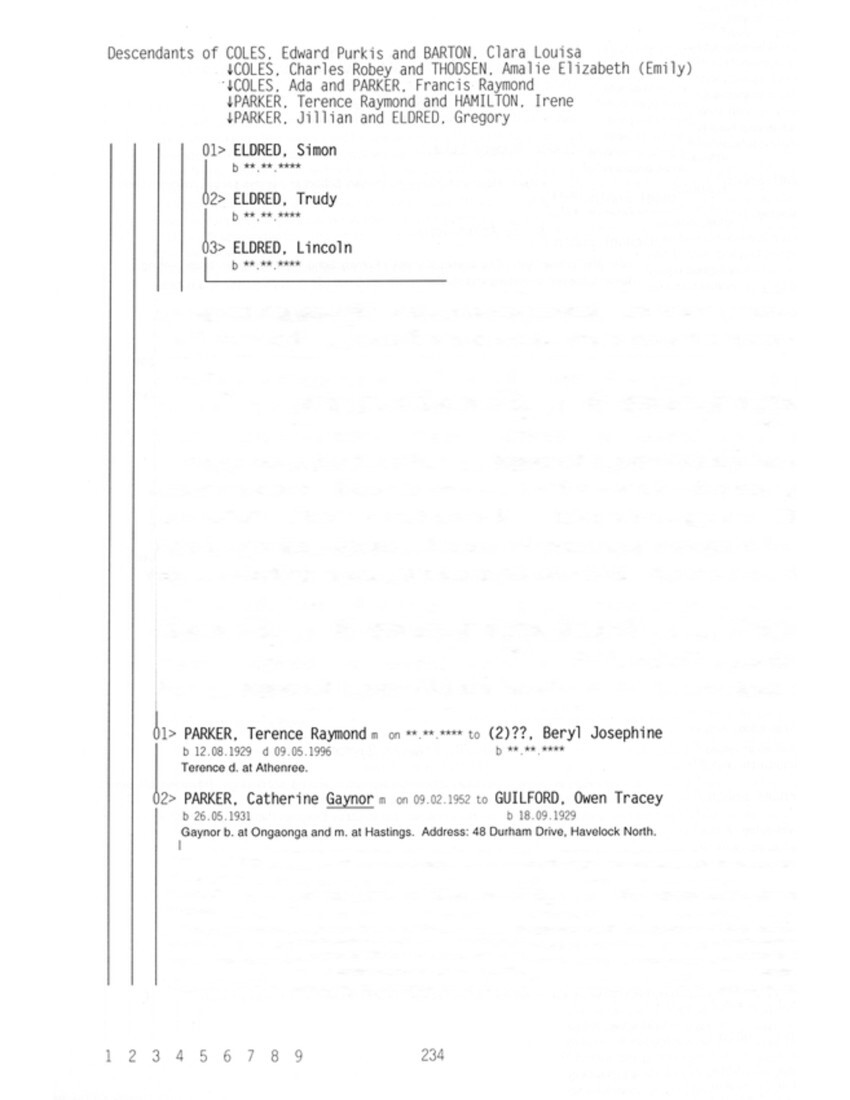
Page 235
Descendants of COLES, Edward Purkis and BARTON, Clara Louisa
COLES, Charles Robey and THODSEN, Amalie Elizabeth (Emily)
COLES, Ada and PARKER, Francis Raymond
PARKER, Catherine Gaynor and GUILFORD, Owen Tracey
GUILFORD, Judith Donna and RENDLE, Graeme Irwin
[…]
03> PARKER, Judith Mary m on 13.11.1954 to HELM, John Bissell
b 30.03.1933 b 24.08.1931
Judith b. at Waipawa and m. at Hastings. John, s/o John Bissell Helm and Patricia Jones, b. at Hastings. Address: 403a Gascgoine Street, Hastings.
[…]
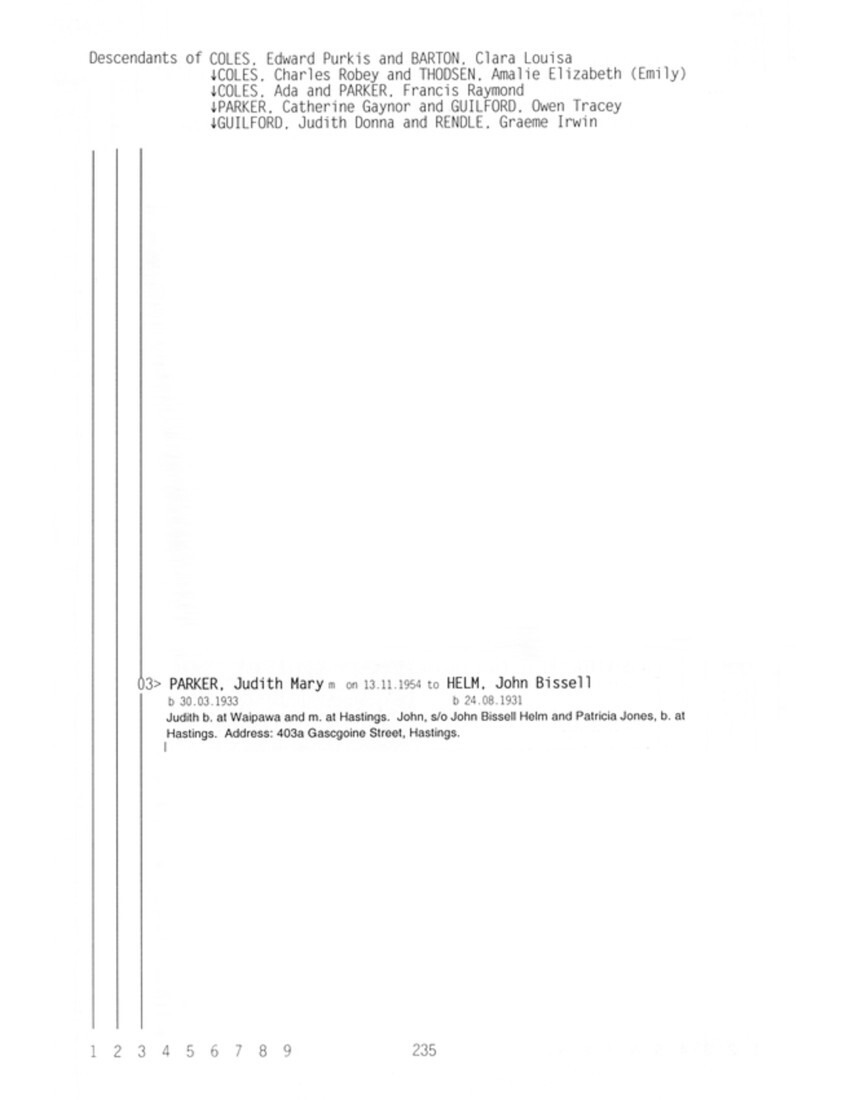
Page 236
Descendants of COLES, Edward Purkis and BARTON, Clara Louisa
COLES, Charles Robey and THODSEN, Amalie Elizabeth (Emily)
COLES, Ada and PARKER, Francis Raymond
PARKER, Judith Mary and HELM, John Bissell
HELM, Wendy Mary and MENZIES, Richard John
[…]
04> PARKER, Bernadette Pamela m on **.**.**** to SIVITER, Albert Leonard
b 22.03.1937 b 10.04.1932
Pamela b. and m. at Hastings. Leonard, s/o Albert Oliver Siviter and Annie Brough, b. in England.
[…]
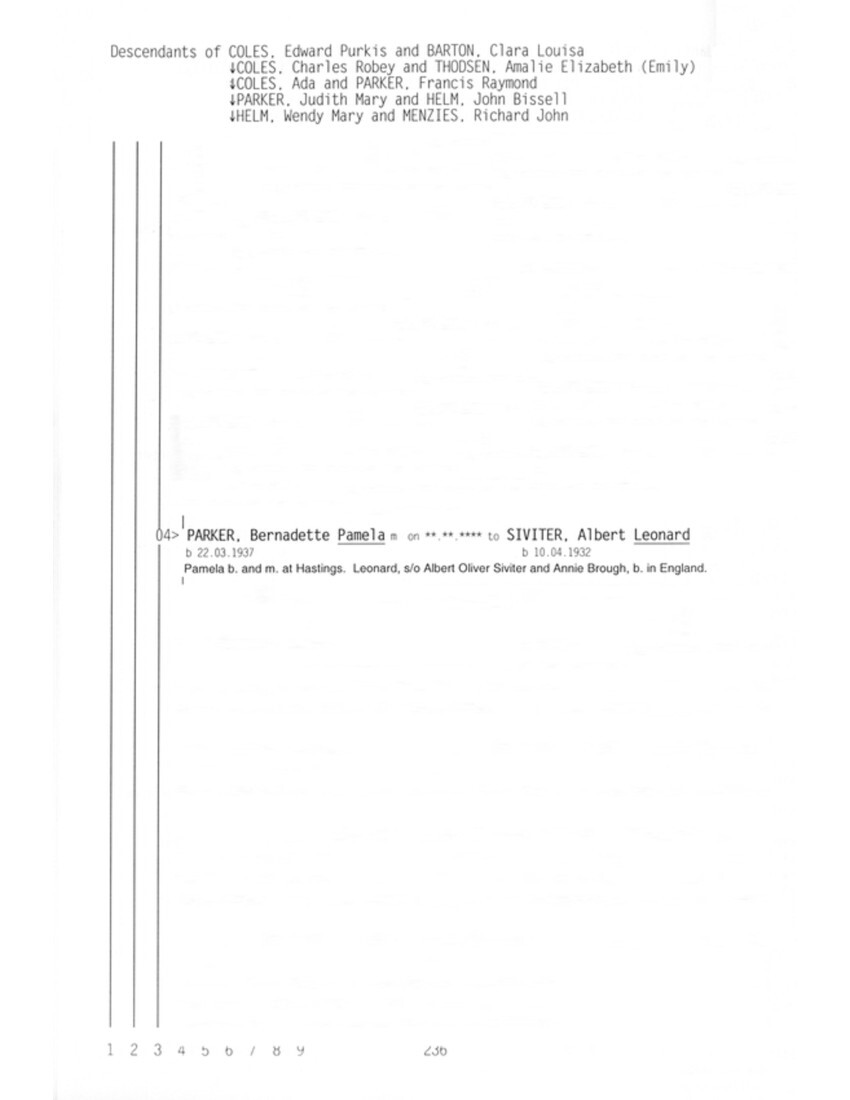
Page 237
Descendants of COLES, Edward Purkis and BARTON, Clara Louisa
COLES, Charles Robey and THODSEN, Amalie Elizabeth (Emily)
COLES, Ada and PARKER, Francis Raymond
05> PARKER, Jennifer Margaret
b 12.12.1940 d 29.06.1946
Jennifer b. and d. at Napier.
Martha Emma RUSSELL (1874-****) nee COLES, Louisa LIVICK (1863-1940) nee COLES,
George COLES (1869-1941), Mary Jane MILNE (1871-1945) nee COLES, Alice GLENNY (1881-1963) nee COLES,
Kate Emily WHYTE (1872-1945) nee COLES.
Photo from: Mrs R Arlidge
Ian COLES (1924- ),
James Russell COLES (1921–1945).
Photo from: Mr I Coles
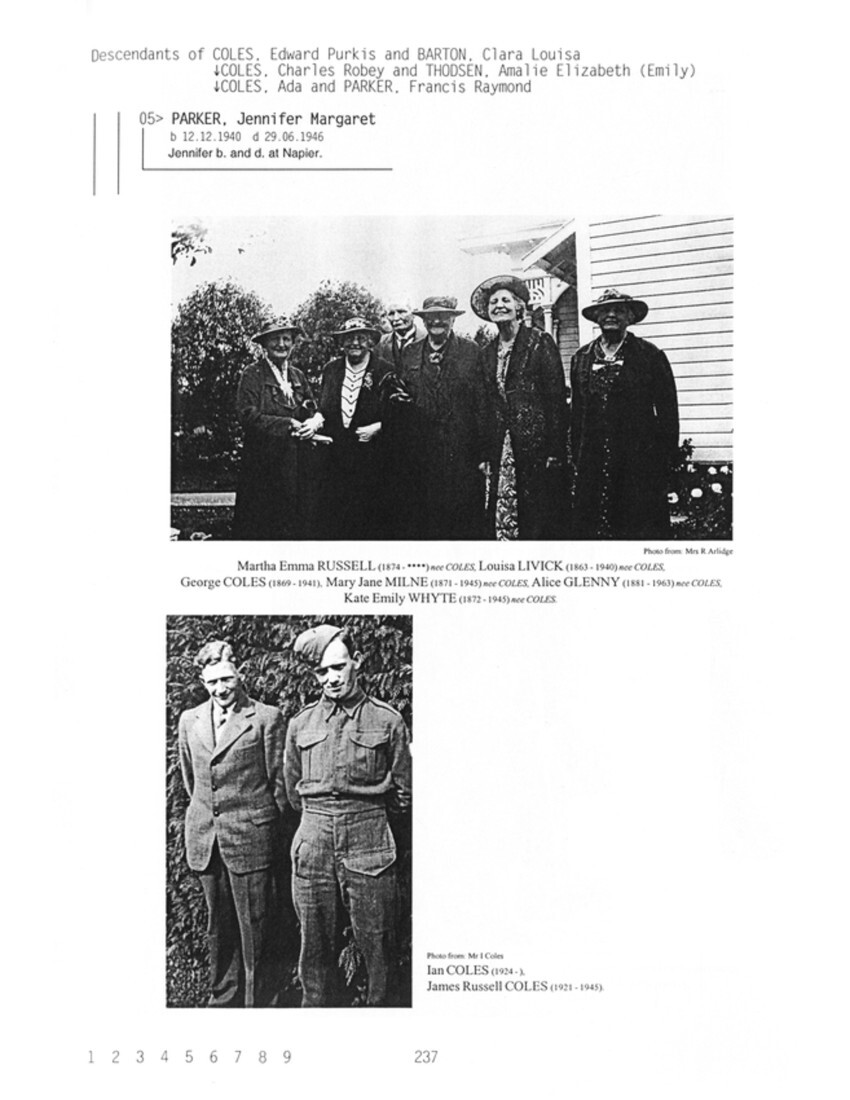
Page 238
The Descendants of Charles Robey and Amalie Elizabeth Coles
Rosanna Maye COLES (1900-1969) nee CHARTERS, Bryan Noel MCDERMOTT 1928-1976),
Cecil Ernest COLES (1898-1982), Gretta Patricia MCDERMOTT (1930- ) nee COLES.
Photo from: Mrs M M Jarvie
James Alexander CUMMING (1924-****),
Mary Evelyn Charters (Effie) CUMMING (1924- ) nee COLES,
Alyson Brenda CUMMING (1950- ) md KING.
Photo from: Mrs M E C Cumming
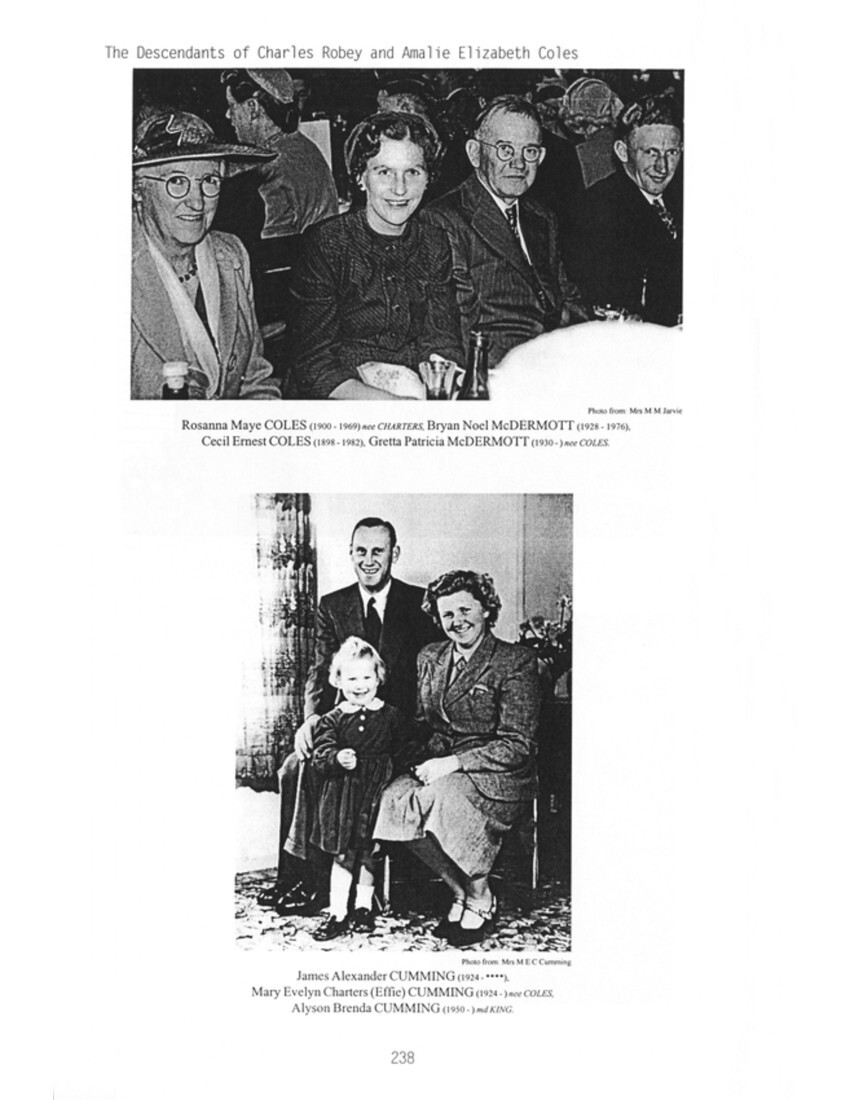
Page 239
The Descendants of Charles Robey and Amalie Elizabeth Coles
Paul Stephen McDERMOTT […], Cary Margaret McDERMOTT (1902- ),
Anne Patricia GOMMERS […] nee McDERMOTT, Gretta Patricia MCDERMOTT (1930- ) nee COLES,
John Bryan McDERMOTT […], Mark James McDERMOTT […],
Elizabeth Maye McDERMOTT […] md SCHICKER.
Photo from: Mrs G P McDermott
Valerie Rosanna JAMES […] nee COLES,
David Warwick JAMES […].
Photo from: Mrs V R James
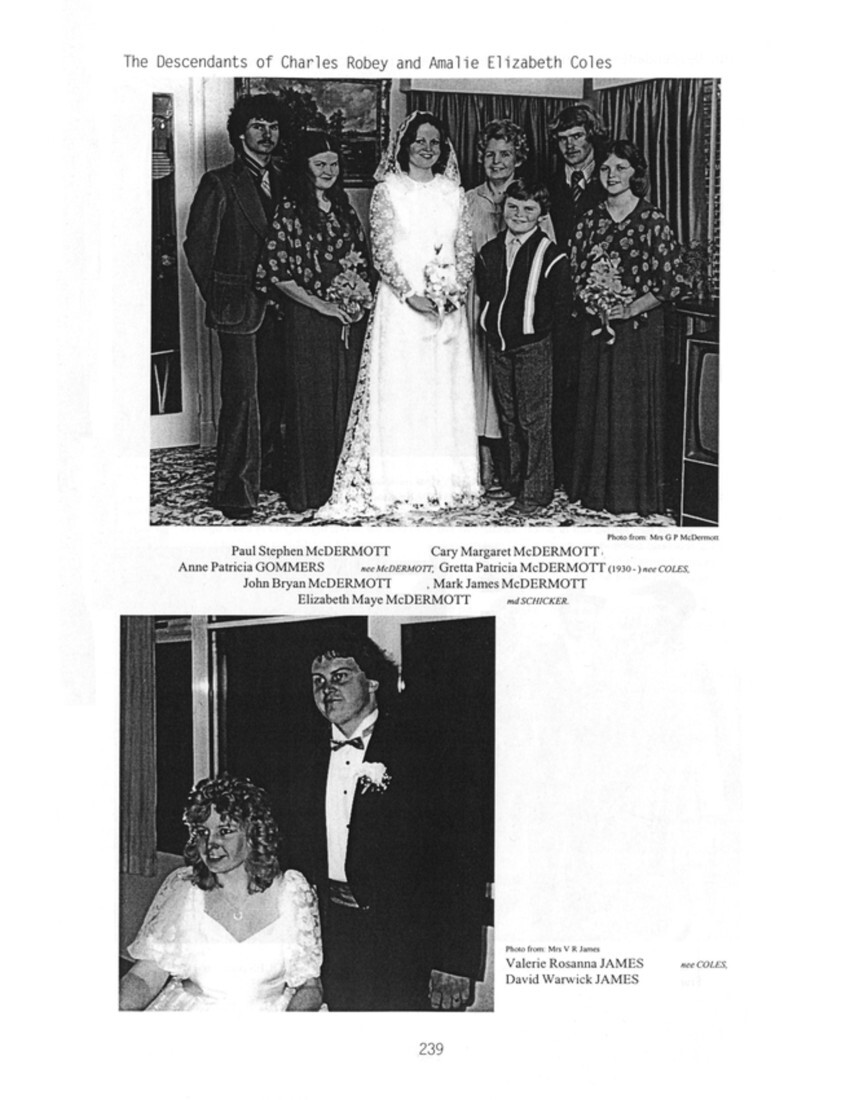
Page 240
The Descendants of Charles Robey and Amalie Elizabeth Coles
Frank Charles COLES (1902-1981), Nora HARDY (1904-1996) nee COLES, Charles Robey COLES (1867-1959),
Ada PARKER (1909-1982) nee COLES, John Barton (Jack) COLES (1896-1983), Mona MACFARLANE (1899- ) nee COLES,
Cecil Ernest COLES (1898-1982).
Photo from: Mr M A Coles
Irene Mabel COLES (1904-1994) nee SIMPSON,
Frank Charles COLES (1902-1981).
Photo from: Mr M A Coles
Frank Charles COLES (1902–1981).
Photo from: Mr M A Coles
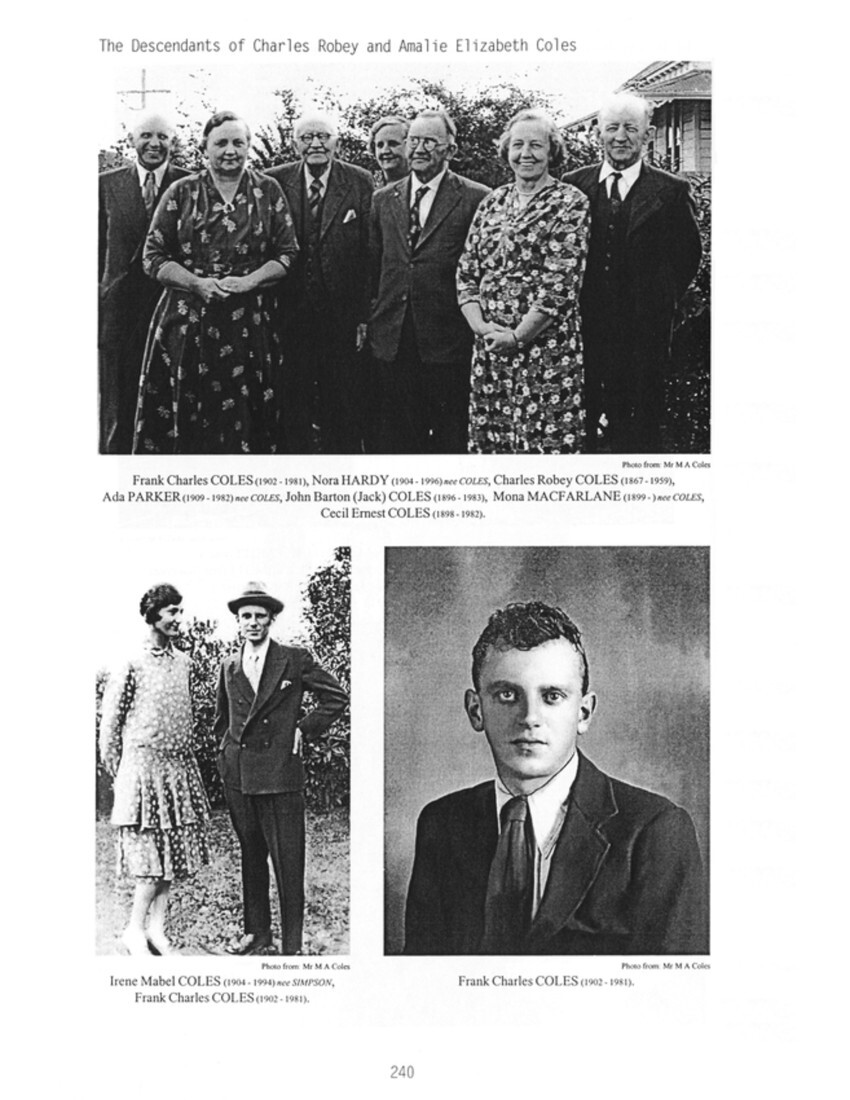
Page 241
COLES, George
m to CANTLE, Adeline
Kathleen
= BAILEY, Frederick William (Bill)
Maurice
= COSSAR, Vera
COLES, Rae Valerie
=ARLIDGE, Colin Trevor
COLES, Brian George
= MACDONALD, Merle Gwendolyn
COLES, Harley Maurice
= (1) MEREDITH, Evelyn Joy
= (2) WILSON, Maureen
COLES. Roger Neale
= NICHOLS, Rosina Gwendoline
COLES. Michael John
= SCOTT, Yvonne
Descendants of COLES, Edward Purkis and BARTON, Clara Louisa
09> COLES, George m on 04.03.1900 to CANTLE, Adeline
b 30.05.1869 d 26.04.1941 b 25:02.1872 d **.**. 1964
George registered and bap. at Droxford, Hants, England, m. at the residence of Edward Coles, Ongaonga, and d. and bd. at Ongaonga. Adeline, d/o William Cantle and Martha Mary Louisa Bartholomew, b. at Portsmouth, England.
George lived in Ongaonga all his life and built the two-storied home in Mill Street that is now owned by Doug and Shona Simpson. He was a partner in Coles Brothers, building business and was thought to have been the painter and paperhanger. He was also very skilled at making furniture and some of the family still have examples of his work. His hobby was bee-keeping and he built a centrifuge in the back shed which is still in working order.
Adeline was a tailoress before her marriage and in later life she passed this skill on to her granddaughter, Rae Arlidge. She and George went to the Anglican church and were always very strict about the observance of Sundays.
Their niece, Betty Carr, in her memoir of life in Ongaonga, wrote:
“We loved Uncle George who told us stories and played gramophone records for us – his favourite was a negro minstrel, “Dem Golden Slippers” – and he often took us in his Model T Ford all the way to Takapau to meet his schoolteacher daughter when she came home for the school holidays. He owned a lovable, curly-haired dog, a spaniel named Tim, who rode on the running board and we travelled at slow speed so that if Tim spied a rabbit, he just jumped down and took off across the paddocks after it. Uncle would be yelling, “Go get him Tim” and never mind the driving – the car would almost follow Tim. Never mind it was the wrong side of the road and thank goodness traffic was non-existent. Somehow no harm came to us or the car. Sundays, after Sunday school, we would visit them to show off a new dress or hat, and it was a thrill to climb the stairs to Kath’s room to look out the windows and be able to see so far. In winter we could see the Takapau hills covered in snow, if there had been a storm. Maurice, her brother, had a tiny box-like room, like an attic bedroom. Uncle kept bees and had a honey house. A visit to the honey house was great fun, watching the process of extracting honey and making new frames with sheets of wax, which made the whole place smell of honey comb and, of course, we usually went home with some – delicious. There was a ladder to the loft and on day Uncle made 2 large, realistic spider from wax and bristles and suspended it from the ladder in front of Lo standing beneath. The screams brought Aunty running and poor Uncle was so sorry that his joke really terrified Lo who had always been afraid of moths, spiders and creepy crawlies.”
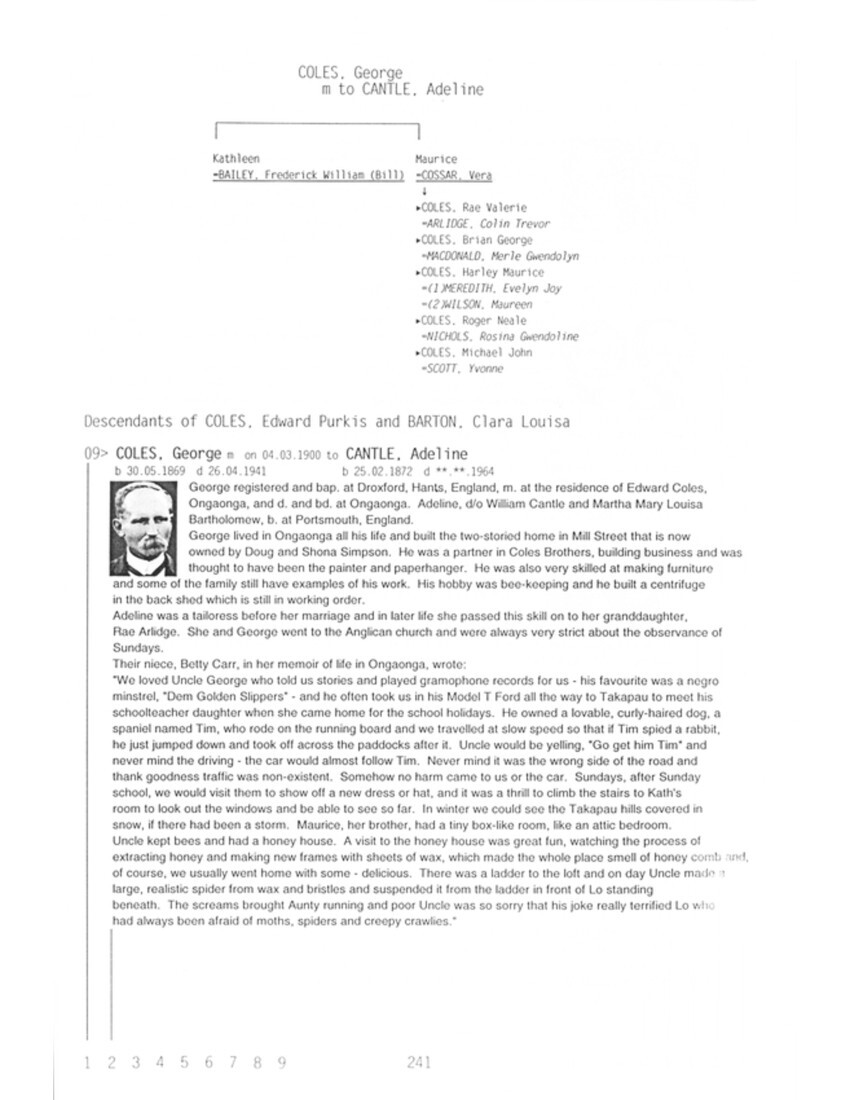
Page 242
Descendants of COLES, Edward Purkis and BARTON, Clara Louisa
COLES, George and CANTLE, Adeline
01> COLES, Kathleen m on **.**.1967 to BAILEY, Frederick William (Bill)
b 04.03.1902 d 16.11.1991 b **.**.**** d **.**.****
Kathleen b. at Ongaonga and m. at Hastings.
Kathleen was educated at Ongaonga and trained as a teacher. She taught at Dannevirke South, Mahora, Maungateretere and part-time at Hereworth. She was involved with the Hastings Primary Schools Choirs for many years and was deputy conductor and pianist in 1948 and many years afterwards. She was active in Red Cross. In the early 1960s life she cared for her mother in Hastings. She went on a trip to Europe and it was on the boat that she met Bill, an Auckland surveyor, and after their marriage they lived in Auckland. After Bill’s death Kath lived in Selwyn Village.
02> COLES, Maurice m on 12.09.1929 to COSSAR, Vera
b 23.05.1908 d 19. 09.1978 b 01.03.1909 d 16.05.1981
Maurice b. at Ongaonga, d. at Waipukurau and bd at Waipawa Cemetery. Vera, d/o George Cossar and Nellie Kearney, b. at Waipawa, d. at Hastings and bd. at Waipawa.
Maurice was educated at Ongaonga Primary School, Napier Boys’ High School for a year and Waipawa High School. He started work with Coles Brothers in Ongaonga and became their painter and paperhanger. Later in life he worked in the same trade on his own account. He lived in Ongaonga all his working life and retired to Waipawa.
Maurice was a keen tennis player and helped to built the tennis and became a life member of the tennis club. He also assisted with the public library and was a golfer.
Vera was a nurse and she used to assist to lay out the bodies of residents when they died. She was secretary of the Forest Gate Domain Board, the Bridge Park Reserve and the public hall.
01> COLES, Rae Valerie m on 27.03.1954 to ARLIDGE, Colin Trevor
b 27.09.1929 b 06.03.1933 d 01.08.1997
Rae b. at Waipawa and m. at Waipukurau. Colin, s/o John Frederick Arlidge and Ethel Halford, b. at Waipukurau. Address: 4/23 Higgins Street, Napier. Rae was educated at Ongaonga Primary School and Waipawa High School then worked as a nanny out of Waipukurau and later in a similar job near Te Pohue. She returned to Waipukurau and worked as a shop assistant in the china and hardware departments of Hawkes Bay Farmers until her marriage.
Colin was educated at Waipukurau Primary and High Schools then completed his apprenticeship as a mechanic with Gay and Mason in Waipukurau. After his marriage to Rae, they went to Hastings where he worked for Barclays and learned to be a tractor mechanic. They later moved back to Waipukurau and built their own home. Colin joined the Ford garage as a car salesman for a short time, then moved to the foothills behind Tikokino where he worked for Punch Wilson as a mechanic on Kanui Station for four years. Education for the children was a problem in this remote area so they moved to Napier and Colin worked at the vehicle testing station. From there he went to John Hill’s automotive shop in Hastings and then to Hastings Motors as foreman of the tractor department. He took over and ran a driving school business in the final years before he retired due to poor health.
Being interested in gardening, Rae worked for many years in a market garden in Taradale and then had a job with a flower grower and florist. She joined the Taradale RSA Concert Party in 1982 and has been in the cast ever since. She has also been dress designer with the show during some of that time. Until she was 60 she worked as a domestic at the Napier Hospital, first at McHardy Home and then in the doctors’ quarters.
[…]
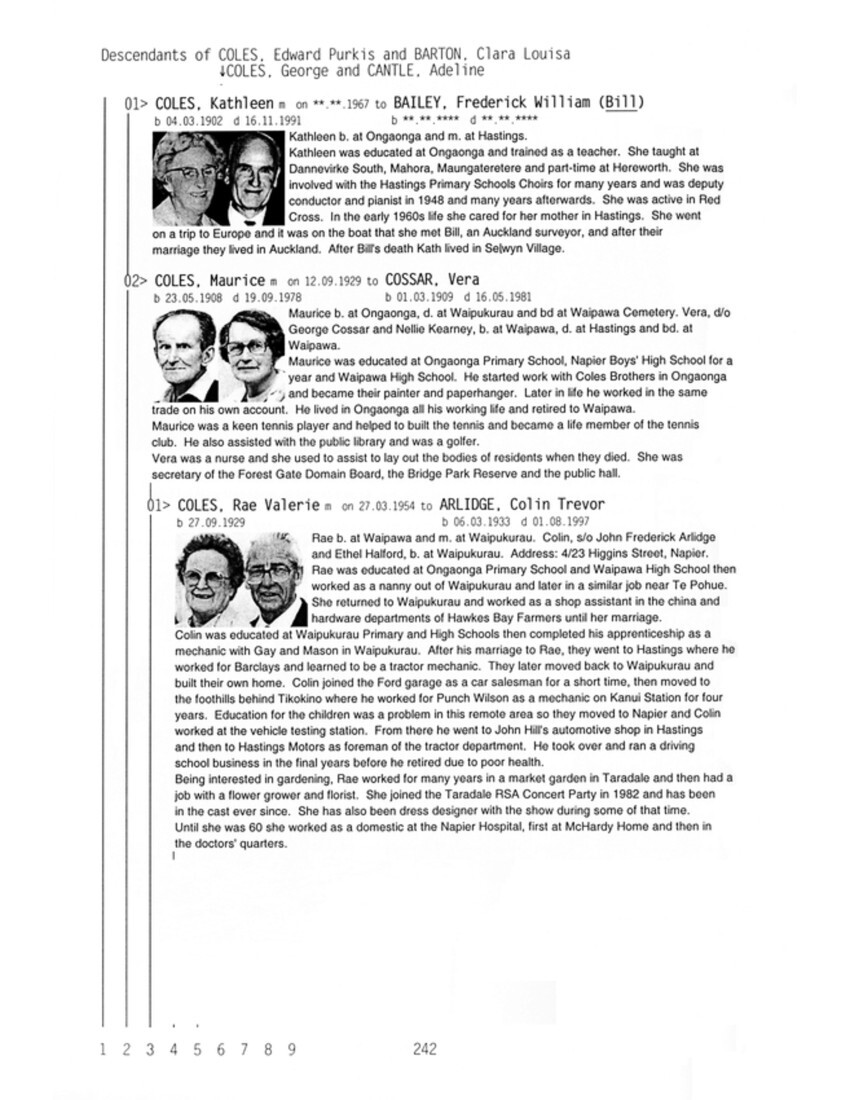
Page 243
Descendants of COLES, Edward Purkis and BARTON, Clara Louisa
COLES, George and CANTLE, Adeline
COLES, Maurice and COSSAR, Vera
COLES, Rae Valerie and ARLIDGE, Colin Trevor
ARLIDGE, Warren John and HOUSTON, Sharon Gail
[…]
02> COLES, Brian George m on 18.12.1954 to MACDONALD, Merle Gwendolyn
b 06.06.1931 b 09.07.1930
Brian b. at Waipawa and m. at Mataura. Merle, d/o William Macdonald and Inez Annie Walker, b. at Invercargill. Address: 156 Pohutukawa Avenue, Ohope, Bay of Plenty.
Brian was educated at Ongaonga Primary School and Waipawa High School then worked as a clerk for Williams and Kettles in Waipawa for three year, and in Tokomaru Bay. He then worked as a stock agent for ten years in Masterton and Hunterville.
Merle was educated at Mataura Primary School and as a boarder at Timaru Girls’ High School before entering Ardmore Teachers’ Training College. Her first teaching post was at Waipawa Primary School and it was whilst there that she met Brian. Moving to Masterton, she taught there until just before their first daughter was born.
The family moved to Kawerau in 1962 where Brian took a position at Tasman Pulp and Paper Company and worked there for the next 31 years, the last 20 as foreman, until his retirement in 1994. After a seven year break, Merle resumed teaching until more or less retiring in 1990. They have lived at Ohope Beach since 1987.
Brian has always been interested in sport, particularly rugby, and follows the world news closely. Merle was interested in various crafts and all sports, particularly netball. She developed an interest in learning Japanese and she now teaches English privately to a number of Japanese students in return for lessons in Japanese.
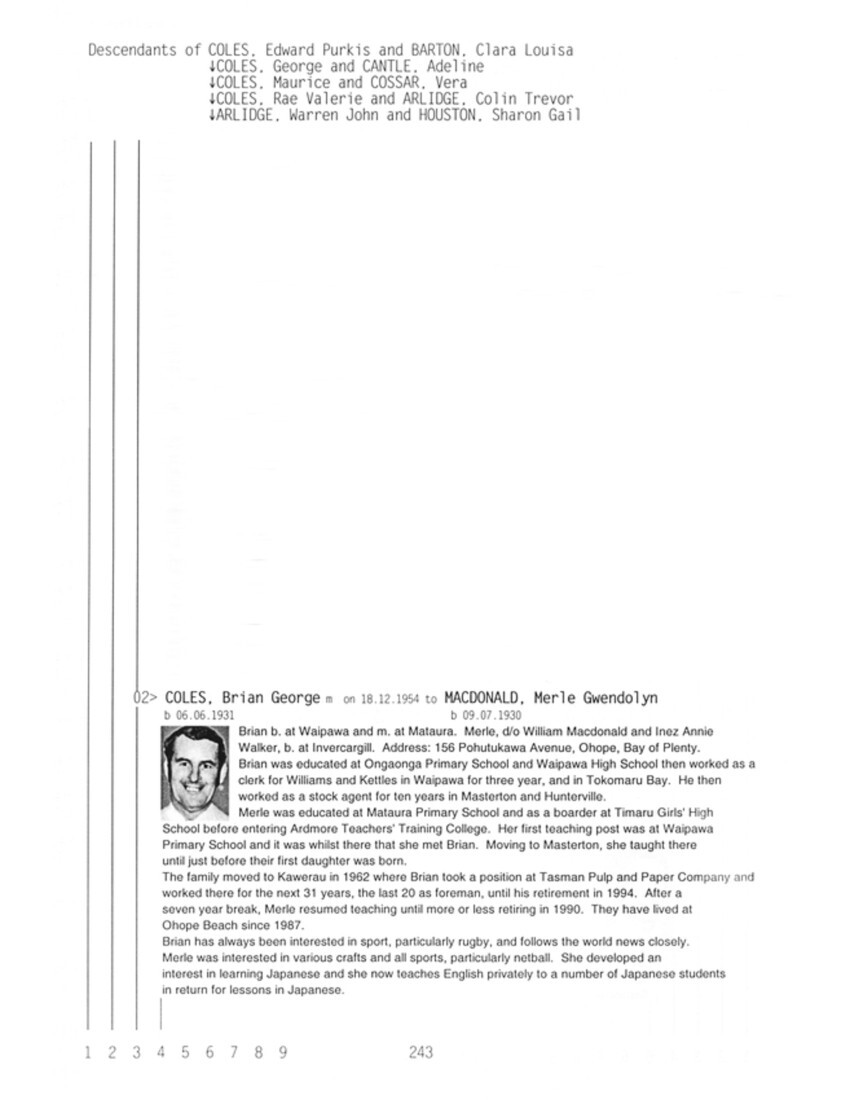
Page 244
Descendants of COLES, Edward Purkis and BARTON, Clara Louisa
COLES, George and CANTLE, Adeline
COLES, Maurice and COSSAR, Vera
COLES, Brian George and MACDONALD, Merle Gwendolyn
[…]
03> COLES, Harley Maurice m on 09.06.1956 to (1) MEREDITH, Evelyn Joy
b 03.11.1933 b 14.11.1934 d 21.07.1974
[…]
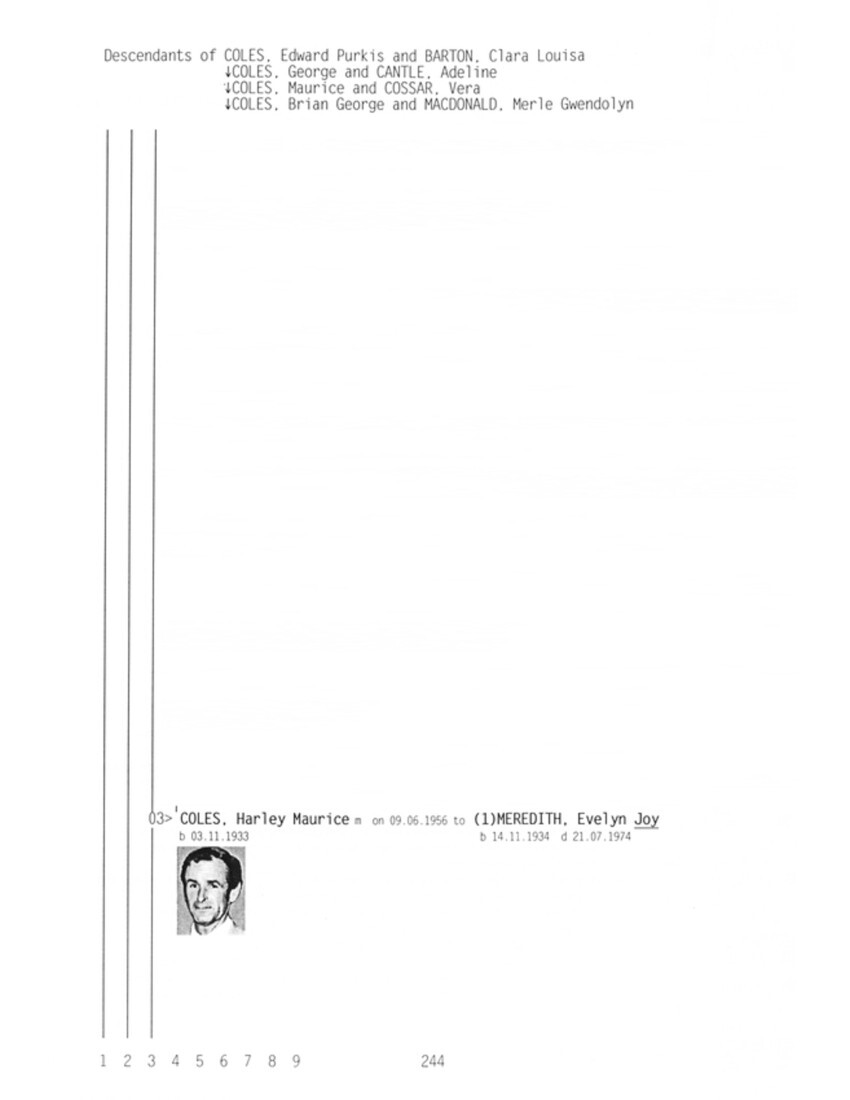
Page 246
Descendants of COLES, Edward Purkis and BARTON, Clara Louisa
COLES, George and CANTLE, Adeline
COLES, Maurice and COSSAR, Vera
COLES, Harley Maurice and MEREDITH, Evelyn Joy
[…]
03> COLES, Harley Maurice m on 27.03.1978 to (2)WILSON, Maureen
b 03.11.1933 b **.**.**** d 15.09.1994
04> COLES, Roger Neale m on 16.09.1961 to NICHOLS, Rosina Gwendoline
b 18.09.1937 b 12.02.1938
Roger b. at Waipawa and m. at Masterton. Rosina b. at Masterton. Address: 16 Vine Avenue, Tauranga.
Roger was educated at Ongaonga Primary School and Waipawa High School. He moved to Masterton in 1954 and started his own drainage contracting business in 1973. He moved to Whakatane with his family at the end of 1979 and set up a drainage contracting business there, selling it in 1996 when he moved to Tauranga. He is still in the drainage business.
Rosina worked for the National Bank in Masterton before her marriage. Later she worked as bookkeeper for Roger’s businesses in Masterton and Whakatane and also worked part-time for the National Bank in Whakatane.
[…]
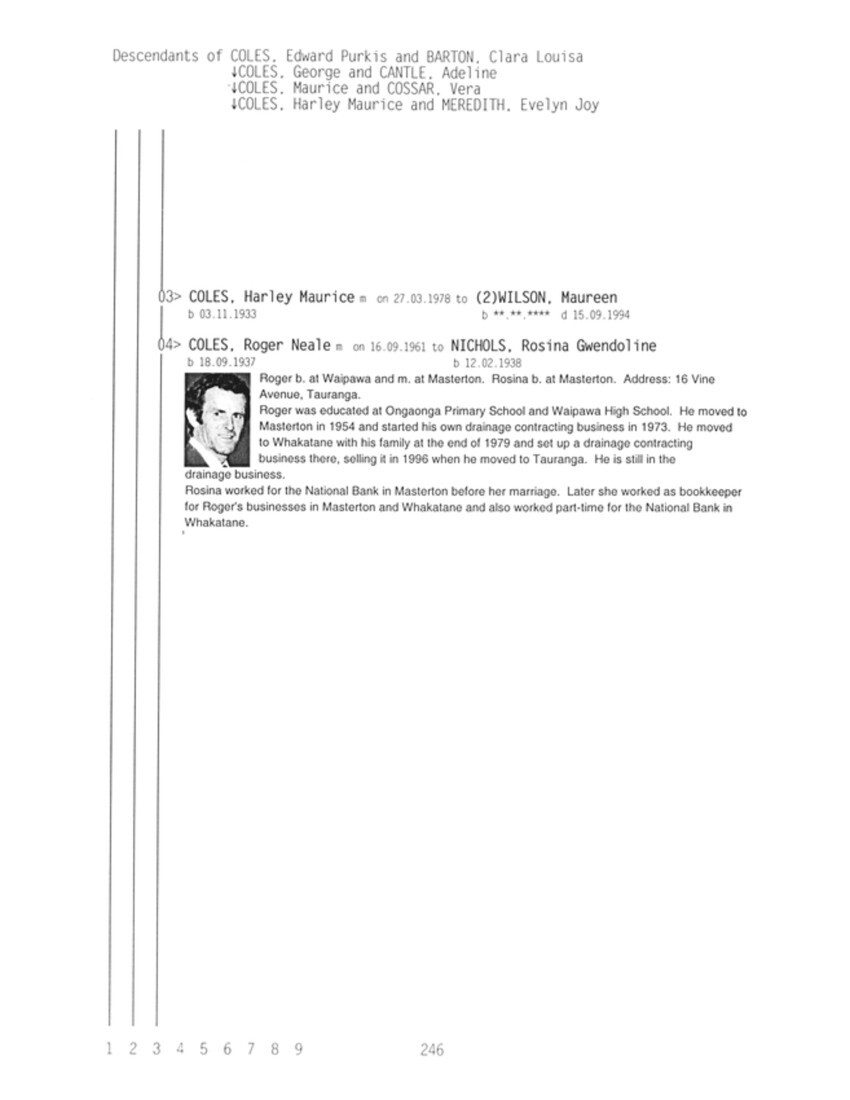
Page 248
The Descendants of George and Adeline Coles
George COLES (1869-1941).
Photo from: Mr B G Coles
Roger Neale COLES (1937- ), Michael John COLES (1947- ), Rae Valerie ARLIDGE (1929- ) nee COLES,
Brian George COLES (1931- ), Vera COLES (1909-1981) nee cossar, Harley Maurice COLES (1933- ).
Photo from: Mrs R Arlidge
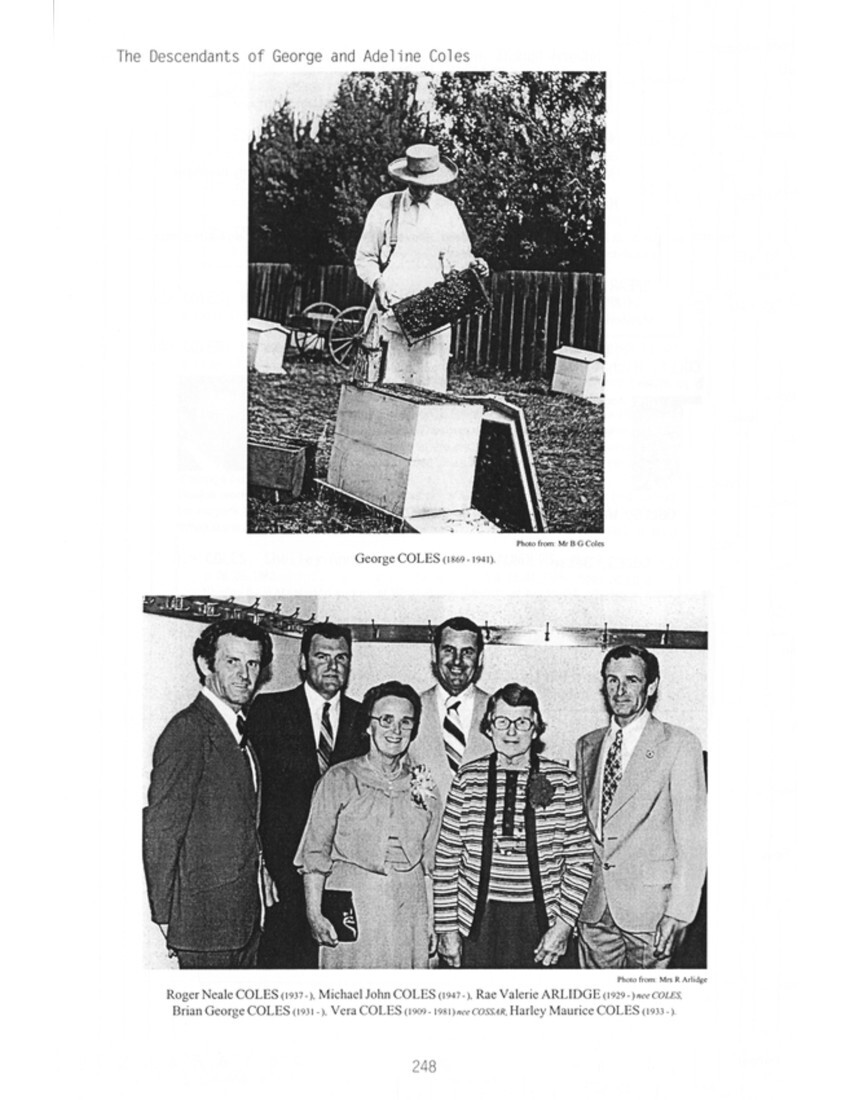
Page 249
The Descendants of George and Adeline Coles
Maurice COLES (1908–1978),
Vera COLES (1909-1981) nee COSSAR,
Brian George COLES 1931- ),
Rae Valerie COLES (1929- ) md ARLIDGE.
Photo from: Mrs R Arlidge
Rae Valerie COLES (1929- ) md ARLIDGE,
Brian George COLES 1931- ).
Photo from: Mrs R Arlidge
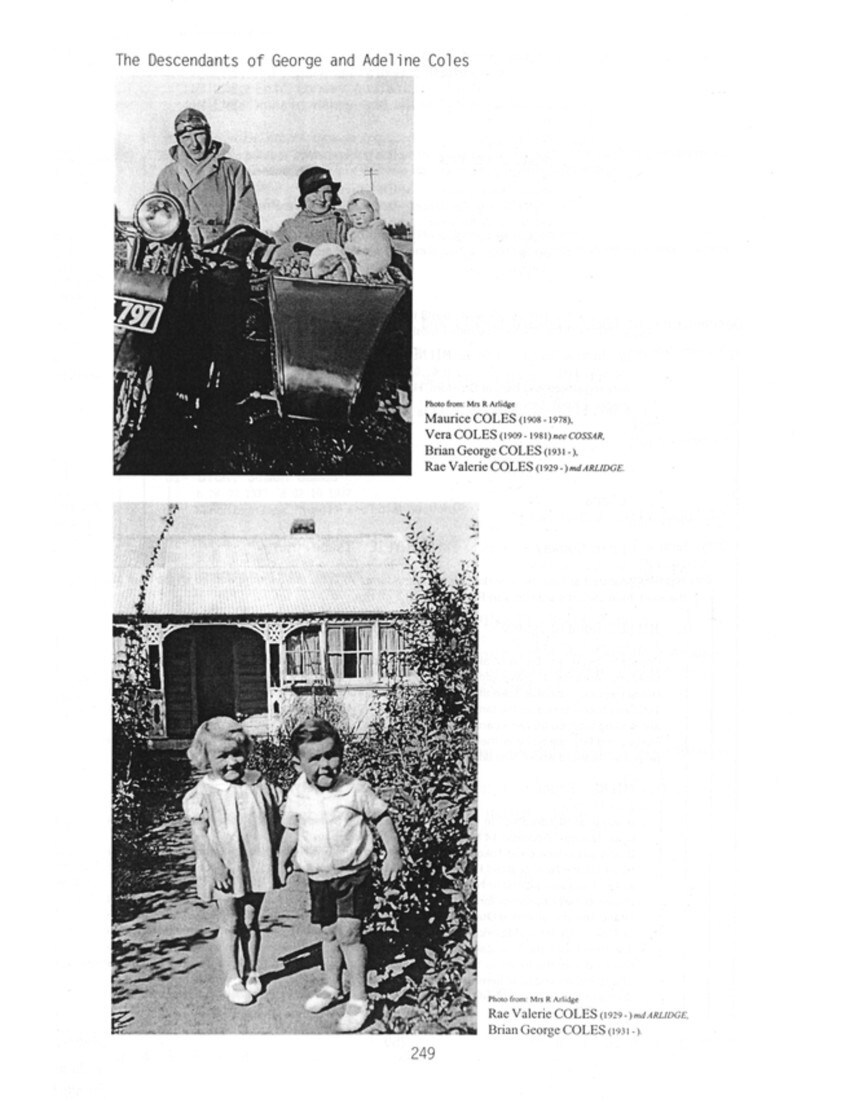
Page 250
COLES, Mary Jane
m to MILNE, Henry
Clara
Eric Conway
= WYLIE, Isabel Mary
MILNE. Ronald Henry
= WALKER, Fay Constance
MILNE. Elva Margaret
= WHITTINGTON, John
MILNE, Shirley May
= MITCHELL, Jim
Ernest
= EVEREST, Mary
MILNE, David Henry
= ANDERSON, Celia Irene Mary
MILNE, John Ernest
Descendants of COLES, Edward Purkis and BARTON, Clara Louisa
10> COLES, Mary Jane m on 23.09.1896 to MILNE, Henry
b 24.01.1871 d 27.06.1945 b 01.03.1859 d 02.03.1951
Mary registered and bap. at Droxford, Hampshire, England, and m. at Waipawa. Henry b. at SN Knockers Knoll, Devonshire, England.
01> MILNE, Clara
b 24.06.1897 d 21.09.1964
02> MILNE, Eric Conway m on 15.07.1925 to WYLIE, Isabel Mary
b 21.02.1902 d 21.06.1985 b 14.05.1899 d 03.02.1980
Eric was educated at Toko then worked on the home farm. After his marriage he worked on the farm across the road, then owned it until his son Ronald bought it off him.
01> MILNE, Ronald Henry m on 24.06.1950 to WALKER, Fay Constance
b 26.06.1927 d 10.04.1990 b 09.08.1928
Ronald b., m., d. and bd. at Stratford. Fay, d/o Harold Lawrence Walker and Moira Elsie Savage, b. at Stratford. Address: 1/12 Webster Street, Westown, New Plymouth.
Ronald went to school at Toko then worked as a labourer before his marriage. Fay was educated at Tututawa then worked on the family farm for a time. She also went to the South Island picking hops and sorting tobacco for two years before her marriage.
Ronald and Fay milked cows then owned their own sheep and beef farm in Waiwiri Road, Toko. They retired to Stratford where Ronald worked with a builder until he was too ill to continue.
[…]
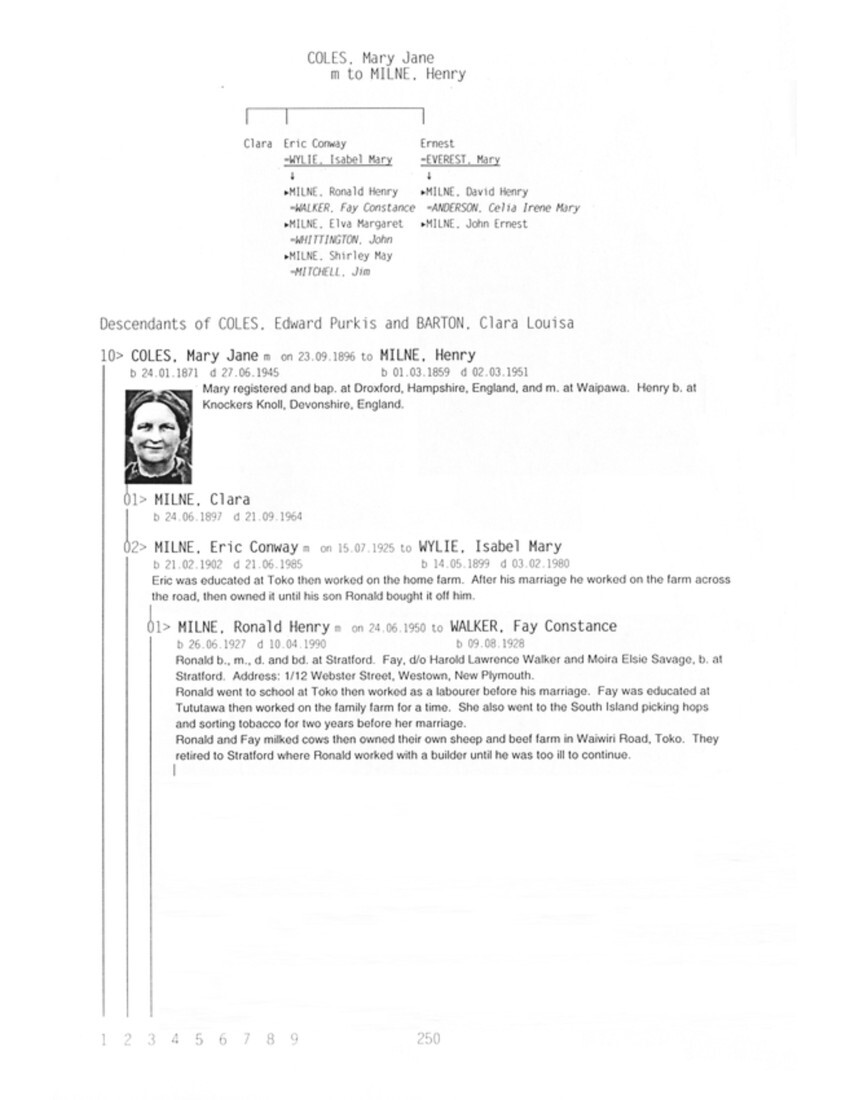
Page 251
Descendants of COLES, Edward Purkis and BARTON, Clara Louisa
COLES, Mary Jane and MILNE, Henry
MILNE, Eric Conway and WYLIE, Isabel Mary
MILNE, Ronald Henry and WALKER, Fay Constance
MILNE, Bruce and ATKINS, Bronwyn (cont…)
Bruce enjoys outdoor bowls, walking and rugby and is involved in many community organisations as part of his occupation. Bronwyn’s interests include music, gardening and walking.
[…]
02> MILNE, Elva Margaret m on 10.07.1950 to WHITTINGTON, John
b 29.03.1929 b 02.07.1925 d 11.10.1997
Address: 244 High Street, Eltham.
03> MILNE, Shirley May m on 06.01.1951 to MITCHELL, Jim
b 26.09.1930 b 06.01.1926
Address: 23 Bertram Street, Rotorua.
03> MILNE, Ernest m on **.**.1943 to EVEREST, Mary
b 31.10.1904 d 10.06.1971 b 12.12.1912 d 03.07.1990
Ernest farmed at Waiwiri Road, Toko until retiring to Bell Block in 1968.
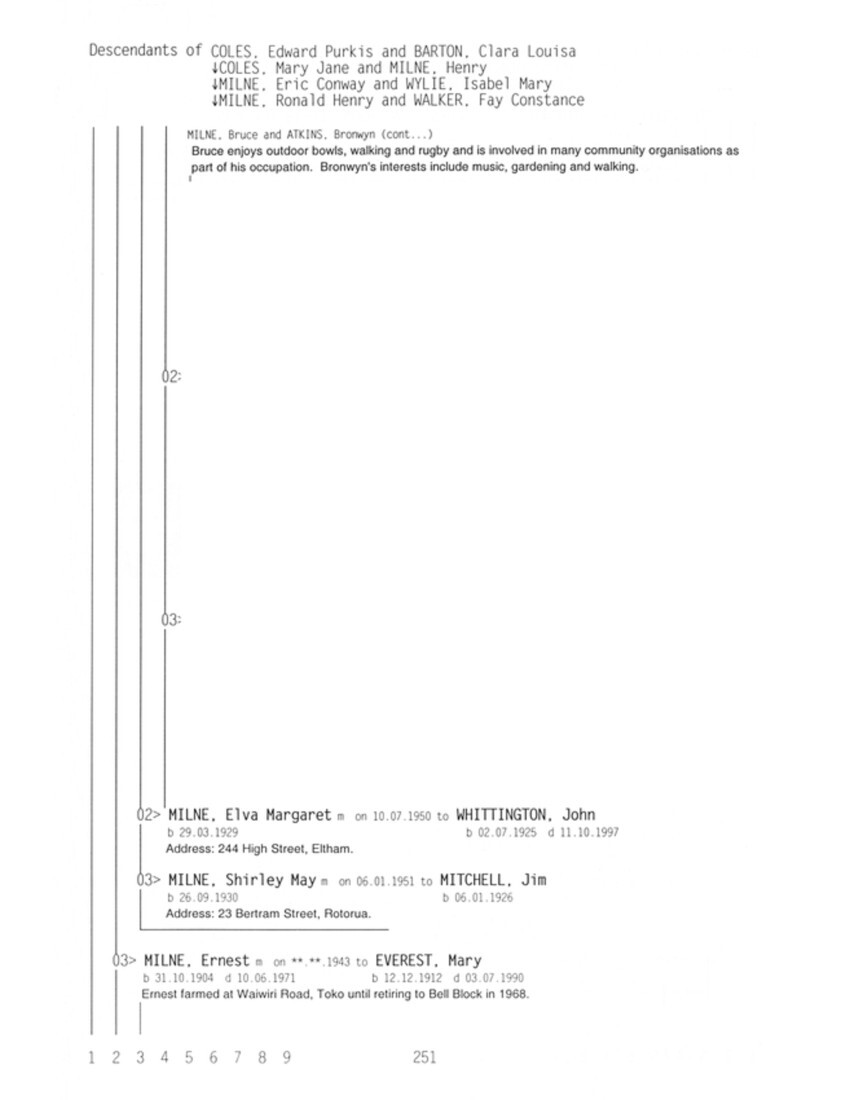
Page 253
COLES, Kate Emily
m to WHYTE, Harry James William Strachan
Harry
= BULL, Ruby
WHYTE. Keith
WHYTE, Beth
= ??. ??
WHYTE. Marie
= WHITEHEAD, Les
Ernest Robert
= GLAZEBROOK, Nora
WHYTE, Julia Jane
= STROUD, Harold
WHYTE, Sarah Elizabeth (Sal)
WHYTE, Jerome Glazebrook
= ??, Ann
Vera
= McNEILL, Alex
MacNEIL, John
MacNEIL, Margaret
= MAXWELL, Graham
Charles Russell
= WHITE, Eila Jessie
WHYTE, Mary
= MEEUWS, Lucien Desire
WHYTE. Jeannie Margaret
= HUNT, Jack Peter
WHYTE, Terence Charles
= LLEN, Judith Rae
WHYTE. Desmond Russell
= NORTHE, Rosa
WHYTE. Philippa Douglas
= (1) MARSDEN, Francis Watson
= (2 )McCORD, John
WHYTE. Beverly Ann
Descendants of COLES, Edward Purkis and BARTON, Clara Louisa
11> COLES, Kate Emily m on **.**.**** to WHYTE, Harry James William Strachan
b 14.09.1872 d 31.08.1945 b **.**.1870 d 19.11.1943
Kate registered at Droxford, Hampshire, England.
Harry Whyte built a store in Bridge Street, Ongaonga, across the road from Coles joiner factory. An early photograph shows that he was a “Direct Importer” and that he sold drapery and boots and shoes. The building later became Simpson’s general store and in the 1970s was a bazaar. After lying derelict for twelve years, it was bought in 1999 by Evagean Publishing who are presently restoring it and using it is as a base for their publishing business.
Harry and Kate subsequently owned a store in Havelock North and eventually retired to Kenilworth Road, Hastings.
01> WHYTE, Harry m on **.**.**** to BULL, Ruby
b 27.12.1895 d ***.**. 1985 b **.**.**** d **.**.****
01> WHYTE, Keith
b **.**.****
02> WHYTE, Beth m on **.** *** to ??, ??
b **.**.**** b **.**.****
03> WHYTE, Marie m on **.**.**** to WHITEHEAD, Les
b **.**.**** b **.**.****
02> WHYTE, Ernest Robert m on **.10.1928 to GLAZEBROOK, Nora
b 07.04.1900 d 05.01.1988 b 12.02.1900 d **.**.1973
Robert was a dentist and earned the distinction of being New Zealand’s oldest dental practitioner when he retired from his practice in Clive at age 84.
01> WHYTE, Julia Jane m on 20.01.1962 to STROUD, Harold
b 17.04.1930 b 24.08.1921 d 25.02.1991
Julia b. at Hastings and m. at London. Harold, s/o Ernest Clark Stroud and Elizabeth Earnshaw, b. at London, England. Address: Meadow Cottage, Hawkhurst, Kent, England.
Julia graduated MA from the University of Otago then left for the United Kingdom in 1954. She then worked in publishing. (cont…)
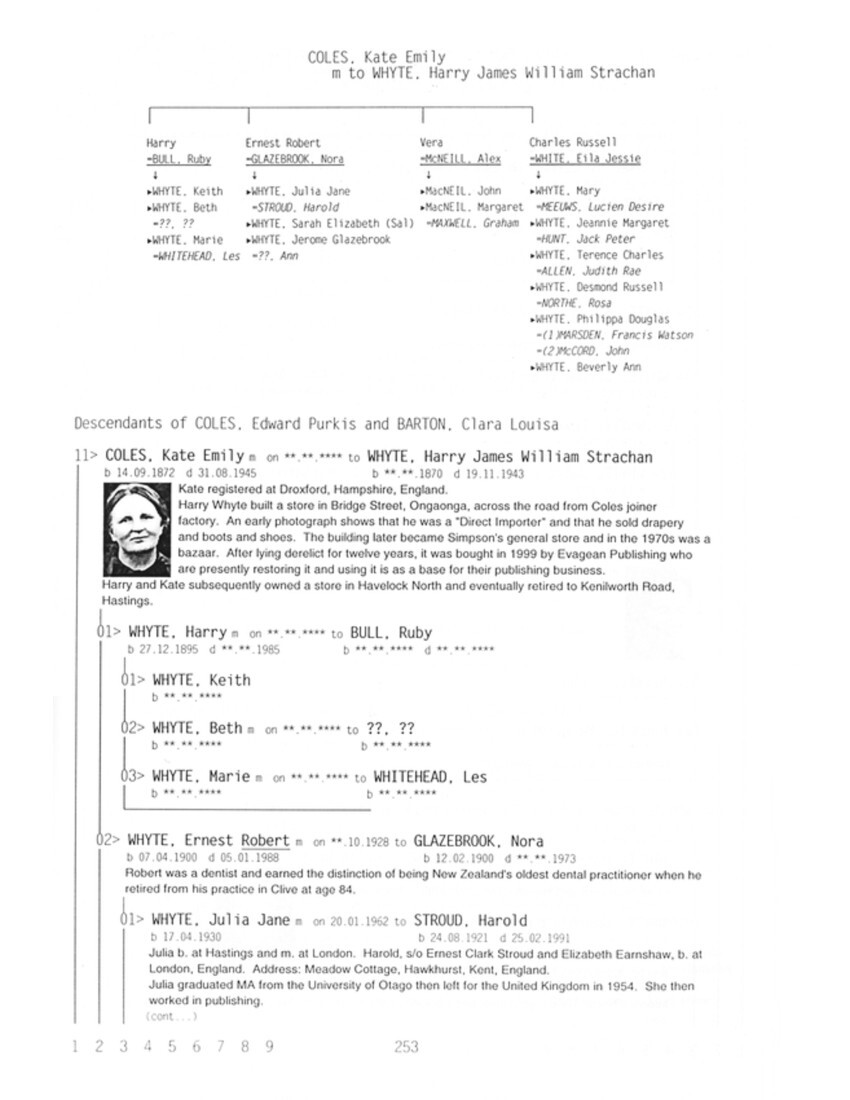
Page 254
Descendants of COLES, Edward Purkis and BARTON, Clara Louisa
COLES, Kate Emily and WHYTE, Harry James William Strachan
WHYTE, Ernest Robert and GLAZEBROOK, Nora
WHYTE, Julia Jane and STROUD, Harold (cont…)
Harold served in the RAF during WW2. He worked in import/export and set up a manufacturing business.
[…]
02> WHYTE, Sarah Elizabeth (Sal)
b 06.04.1932
Address: 74 Main Road, Clive, Hawkes Bay.
03> WHYTE, Jerome Glazebrook m on **.**.1962 to ZOHRAB, Ann
b 16.12.1932 b 28.03.1937
[…]
03> WHYTE, Vera m on **.**.**** to MCNEILL, Alex
b **.**.**** d **.**.**** b **.**.**** d **.**.1949
Alex was a farmer at Waimarama.
01> MacNEIL, John
b **.**.****
02> MacNEIL, Margaret m on **.**.**** to MAXWELL, Graham
b **.**.**** b **.**.****
Graham was a dentist in Wellington.
04> WHYTE, Charles Russell m on 16.01.1931 to WHITE, Eila Jessie
b 13.12.1906 d 11.09.1981 b 27.08.1912 d 02.06.1989
01> WHYTE, Mary m on **.**.**** to MEEUWS, Lucien Desire
b **.**.**** b **.**.****
Have three sons and two daughters. No further information available.
02> WHYTE, Jeannie Margaret m on 03.04.1954 to HUNT, Jack Peter
b 25.01.1933 b 26.07.1929 d 17.10.1996
Jeannie b. at Hastings and m. at Napier. Jack, s/o Harold H Hunt and Marjory M Allan, b. at Napier and bd. at Havelock North Cemetery. Address: 13B White Street, Taradale.
Jeannie lived in Havelock North until she was nine, when she moved with her family to Napier. She attended Napier Girls’ High School and represented the school at cricket and athletics. She started (cont…)
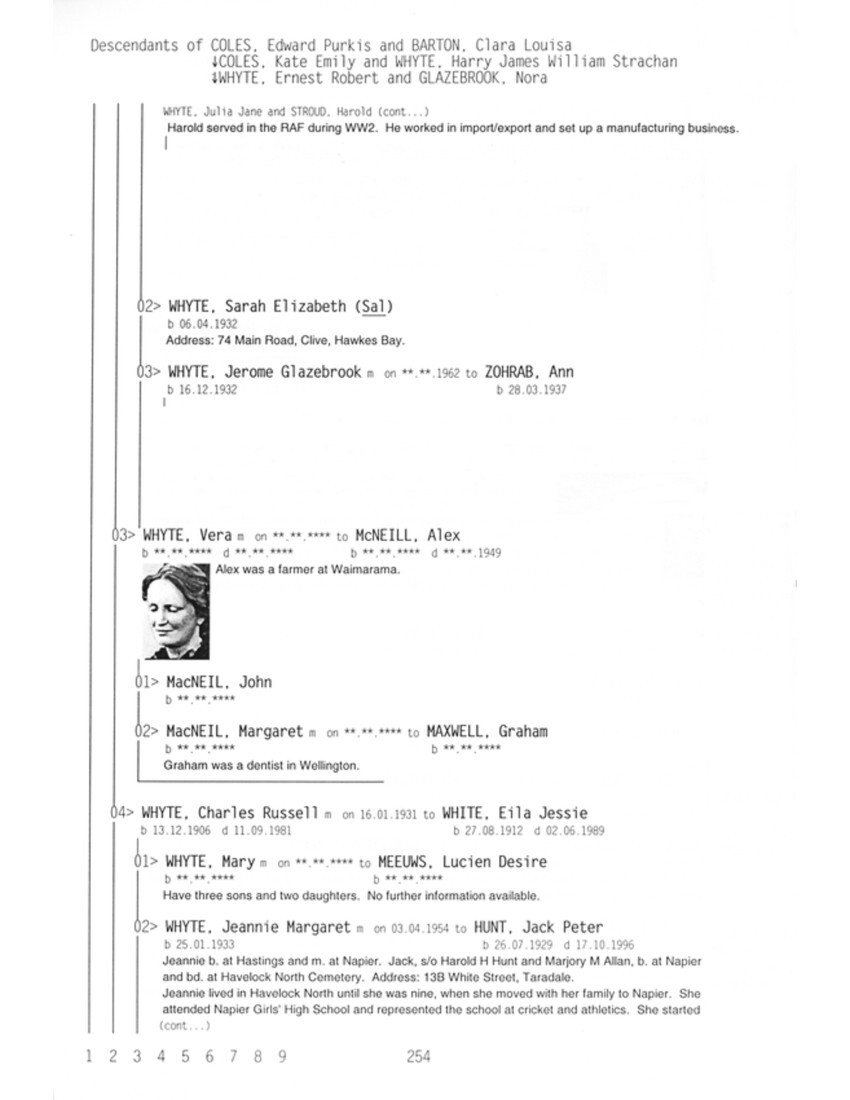
Page 255
Descendants of COLES, Edward Purkis and BARTON, Clara Louisa
COLES, Kate Emily and WHYTE, Harry James William Strachan
WHYTE, Charles Russell and WHITE, Eila Jessie
WHYTE, Jeannie Margaret and HUNT, Jack Peter (cont…)
work in a book shop and later went to work for the Marsden Book Co Ltd, remaining there until her retirement in 1988. She is a member of the New Zealand Founders’ Society Inc and the Caledonian Society (the Highland clans of Scotland are prominent on her mother’s side of the family).
Jack was brought up and educated at Taradale then went to Napier Boys’ High School. His first job was with Eric Wiig, painters and decorators of Napier, and later worked for 25 years with the maintenance department of the Napier Hospital. He was a keen sportsman and wrestler and also played cricket and represented Hawkes Bay at rugby in the 1950s.
[…]
03> WHYTE, Terence Charles m on 15.04.**** to ALLEN, Judith Rae
b 06.03.1934 b 20.04.1940
No further information available.
04> WHYTE, Desmond Russell m on **.**.**** to NORTHE, Rosa
b 15.04.1935 d 12.02.1992 b **.**.****
Have two sons and four daughters. Rosa now lives overseas.
05> WHYTE, Philippa Douglas m on 06.09.1958 to (1) MARSDEN, Francis Watson
b 29.10.1936 b 01.05.1923 d 14.04.1994
Philippa b. at Havelock North and m. at Napier. Francis, s/o Ernest Edward Marsden and Janet (Jenny) Watson Walker Scrimgeour, b. at Napier. After leaving school, Philippa went to Auckland where she worked as a milliner before returning to Napier and working as a telephone exchange operator until her marriage.
Francis (known as Frank) was educated at Hastings Street School and Napier Boys’ High School where he excelled at Maths. During WW2 he served overseas with the 22nd Battalion. At the time of his marriage he was running the family business, Marsden Book Co Ltd.
Frank’s hobby was kitset modelling and their house in Napier was like a little museum, home to whole (cont…)
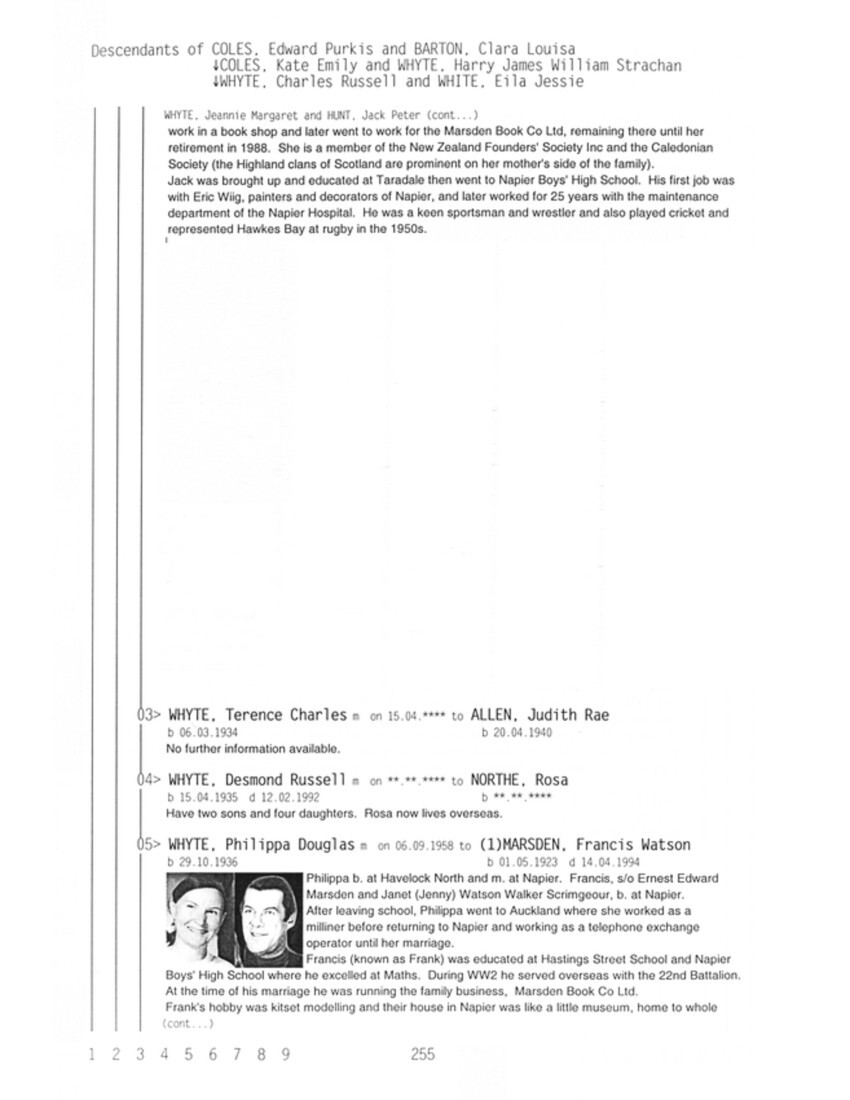
Page 256
Descendants of COLES, Edward Purkis and BARTON, Clara Louisa
COLES, Kate Emily and WHYTE, Harry James William Strachan
WHYTE, Charles Russell and WHITE, Eila Jessie
WHYTE, Philippa Douglas and MARSDEN, Francis Watson (cont…)
armies. There were some 68 model ships which are now in the Devonport Naval Base Museum. Also many planes and army models, including several tanks, which have been given to the Waipukurau RSA for display. A model of the Columbia shuttle and lauching complex was gifted by Philippa and her family to the Napier Planetarium at Napier Boys’ High School.
[…]
05> WHYTE, Philippa Douglas m on 20.02.1999 to (2) McCORD, John
b 29.10.1936 b 14.08.1923
Philippa m. at Chinese Garden, Hastings. John, s/o Campbell McCord and Gladys Thelma Rose, b. at Hastings. Address: 46 Hospital Terrace, Napier.
John grew up in Wellington and had careers in the Army and in the clothing industry. He enjoys theatre and music and has a rich baritone voice.
Philippa is very musical and is a member of a small choir known as Harmony Singers whilst John has been singing with The Colonials for the last five years. For 14 years, Philippa has had an art table at Care and Craft – when travelling around she takes her sketch pad with her and often stops to “catch a moment in time”. She has also been involved with Hawkes Bay Astronomy for many years and is a member of the Hawkes Bay Peace Group, the Caledonian Society and the Founders Society.
06> WHYTE, Beverly Ann
b 27.08.1938
Beverly b. at Hastings.
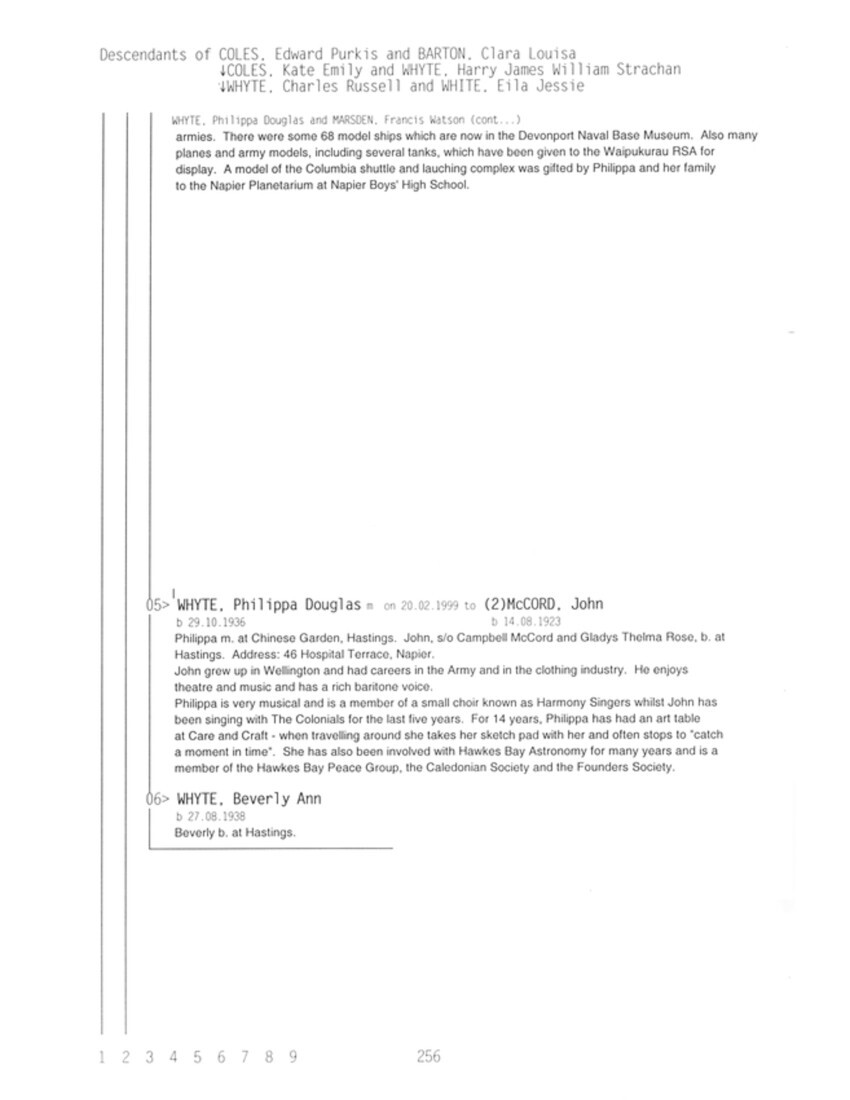
Page 258
COLES, Frederick Purkis
m to VESTY, Alice
Nancy Gwendoline
= ROBERTSON, George Alexander
ROBERTSON, Jean Lynette
= WALLIS, Arnold Robert
ROBERTSON, Shirley Kay
= ALLEN, Granville (Greg)
ROBERTSON, Heather Mary
ROBERTSON, Raewyn Helen
= DUMBLETON, Alastair
Guy Kenneth
= RYBURN, Daisy Lorraine
COLES, Judith
= SCHNELL, David
COLES, Douglas Leo
= GOLDSTONE, Adrianne
COLES, Richard
= LUSK, Marilyn
Sidney Purkis
= DARROCH, Karine Marjorie
COLES, Brian Robert
= MARSH, Christine
COLES, Alison Elizabeth
= McGREGOR, Robin
COLES, John Sidney
= CHIA, Susan
Jessie Mavis (Jaye)
=ROBERTSON, Andrew Douglas
ROBERTSON, Susan Alice
= SCHOFIELD, Wayne Roy
ROBERTSON, Graham Douglas
ROBERTSON, Barry Alexander
= WOOD, Christine Elizabeth
Bruce Barton
= HILDRETH, Peggy
COLES, Justine
= TAPPER, Michael James Purcell
COLES, Peter Barton
= SMEATH, Rosemary Jane
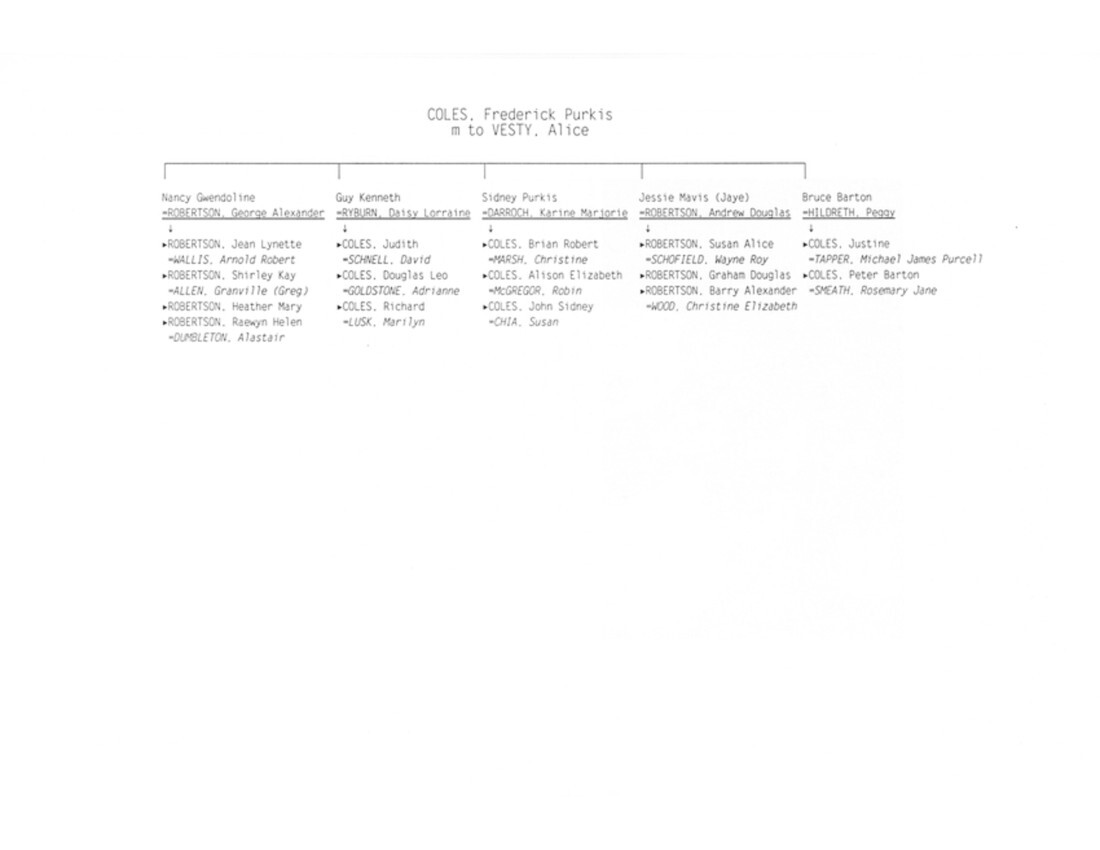
Page 259
Descendants of COLES, Edward Purkis and BARTON, Clara Louisa
COLES, Frederick Purkis and VESTY, Alice
14> COLES, Frederick Purkis m on 26.01.1910 to VESTY, Alice
b 08.09.1877. d 06.08.1925 b 02.04.1888 d 24.09.1973
Frederick b. at Waipawa, m. at Ongaonga and d. at Hastings. Alice, d/o Matthew W (Sam) Vesty and Mary Watson McLeod, b. at Waipawa. Alice remarried Septimus Ashcroft in 1942. Both bd. at Hastings Cemetery.
Frederick trained as a carpenter in the family business in Ongaonga but soon after his marriage to Alice he took up mixed farming on Blackburn Road near the Vesty property. However there was little profit in farming at that time so Fred took his family to Hastings where he returned to his trade. He built and bought several houses in the district and also invested in a Twyford farm by way of a mortgage.
Unfortunately Fred died suddenly, leaving Alice (known as Lal) with five children, the eldest being thirteen. At first the rentals from the houses and the interest from the farm mortgage enabled them to live fairly comfortably, but things changed in the 1930s. During the Great Depression, all house rentals were reduced by ten percent and some mortgages were wiped out entirely. Nancy went on to Hastings High School and became head prefect then did her nursing training. Guy, after one year at Hastings High School, went to work, Jessie became a nurse, Sid worked in the office at Hawkes Bay Farmers and Bruce went to Smedley and then went farming.
After Alice’s first grandchild was born, she became known to everyone as “Gray” which she considered much better than “Granny”.
01> COLES, Nancy Gwendoline m on 07.12.1938 to ROBERTSON, George Alexander
b 14.06.1912 d 13.12.1973 b 15.10.1911 d 01.08.1996
Nancy b. at Ongaonga, m. at St Andrew’s Church, Hastings and d. at Bay View, Napier.
Nancy trained in Dannevirke as a nurse. She was a chronic asthmatic. She and Alex had an orchard in Bay View, known as Rannoch Orchard, which they ran in partnership with Nan’s sister Jessie and her husband Andrew who was Alex’s brother.
01> ROBERTSON, Jean Lynette m on 08.05.1965 to WALLIS, Arnold Robert
b 01.05.1940 b 02.10.1939
Jean b. and m. at St Paul’s Presbyterian Church, Napier. Robert, s/o Douglas Wallis and Beatrice Greathead, b. at Palmerston North. Address: 20 Toro Street, Wanganui.
Jean grew up at Bay View and was educated at Eskdale Primary School and Napier Girls’ High School. She trained as a primary school teacher in Wellington and taught at Westshore, Takapau, Wellington and Wanganui. Since her marriage she has lived in Wanganui and is now is an ESOL Home Tutor Scheme coordinator.
Robert was brought up in Masterton, attended Wairarapa College and gained a Law degree at Victoria University of Wellington. He is now a partner in Jack Riddet Tripe in Wanganui. He is active in debating and Rotary and both he and Jean are members of the Methodist Church.
[…]
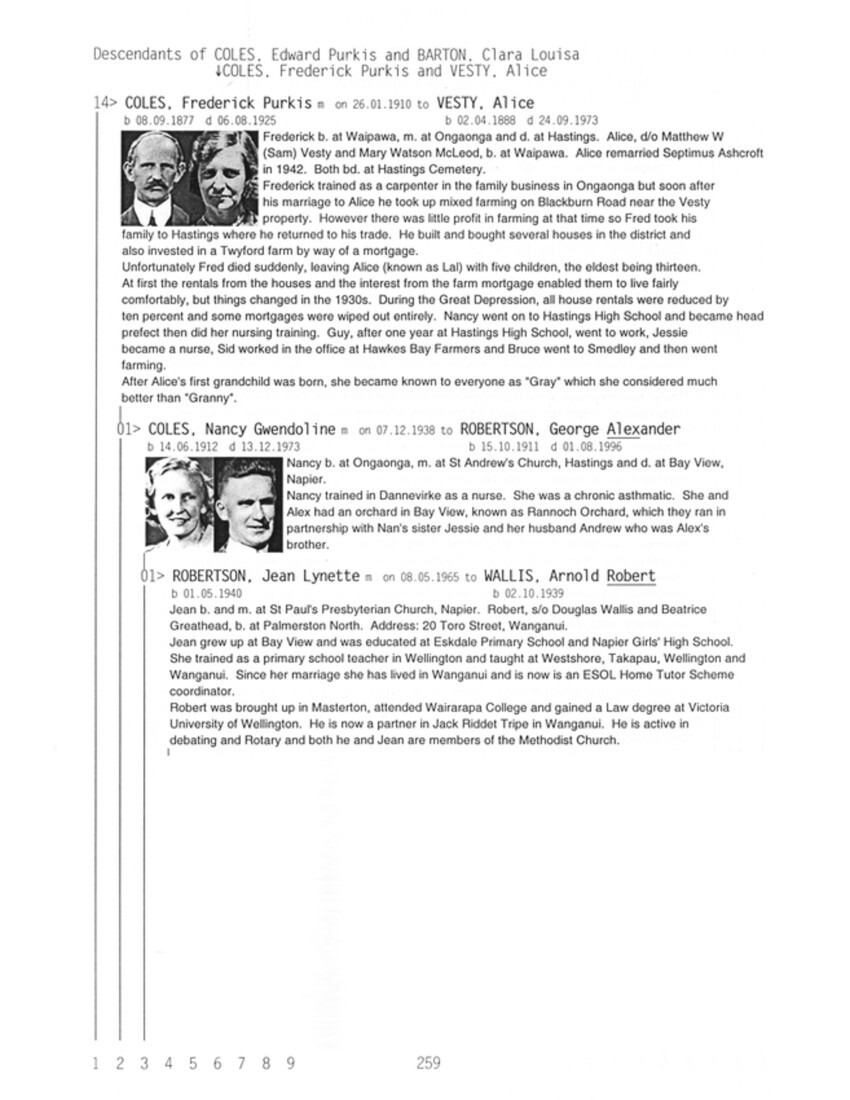
Page 260
Descendants of COLES, Edward Purkis and BARTON, Clara Louisa
COLES, Frederick Purkis and VESTY, Alice
COLES, Nancy Gwendoline and ROBERTSON, George Alexander
ROBERTSON, Jean Lynette and WALLIS, Arnold Robert
[…]
02> ROBERTSON, Shirley Kay m on 18.03.1972 to ALLEN, Granville (Greg)
b 24.06.1942 b 19.07.1931 d 04.12.1989
Shirley b. at Napier and m. at Eskdale Church. Greg, s/o Earnest Charles Allen and Rose Howe, b. at Luton, Beds, England. Address: 2 Regal Court, 2a Spriggs Crescent, Greenmeadows, Napier.
Shirley grew up on the family orchard at Bay View and went to Eskdale Primary School and Napier Girls’ High School. Leaving at the end of 1959, she started nursing training at Palmerston North Hospital in 1960 and graduated as a Registered General and Maternity Nurse in 1963. She was appointed Acting Ward Sister then Ward Sister of Ward 5 in November 1963. A year later she went to England on the P&O ship, “Canberra”. With the help of one of the first New Zealand Churchill Fellowship grants, she did a Charge Nursing course at the Royal College of Nursing in Edinburgh, then a year’s training at Crichton Royal Hospital, Dumfries, to qualify as a Mental Nurse on the Scottish Register of trained nurses. After working for 14 months at Guy’s Hospital in London, she returned in 1969 to work at the Psychiatric Unit at Hastings Memorial Hospital where Greg was Charge Nurse. In 1970 she worked at Sunnyside Hospital in Christchurch for six months, on an exchange programme, to gain New Zealand Psychiatric Nurse registration, and now recognised as being a Registered Comprehensive Nurse, with both registrations.
When first married, Shirley and Greg lived in Hastings. Greg’s two sons, Maku (b. 1964) and Roger (b. 1965) lived with them from 1973. They moved to Napier when Greg was working at Springhill Centre for treatment of alcoholism and other addictions. Greg was instrumental in setting up this service, new to Hawkes Bay. They initially lived at 66 MacDonald Street in a house that was owned by Garrett relatives (on the Vesty side of the family) at the time of the 1931 earthquake. They lived in one other house in Latham Street before moving to Haumoana in 1983. Shirley moved to Havelock North in 1990, shortly after Greg’s death. She had been working in a general medical ward in Napier at that time, then in 1993 she changed to work in the new Psychiatric Unit. While working at Ballantyne House, adjacent to the main psychiatric unit, Shirley worked on the planning committee for Kakariki House, a hostel for Level 4 (long term psychiatric patients). In 1997 she was appointed Clinical Nurse for that hostel.
In 1998, both girls having left home, Shirley moved to a small townhouse in Greenmeadows East. She is a member of Twin City Sounds, the Hawkes Bay Chapter of Sweet Adelines International, a USA-based women’s organisation that sings four-part unaccompanied harmony, barbershop style. She attended the 50th anniversary competitions and convention in New Orleans in 1995.
[…]
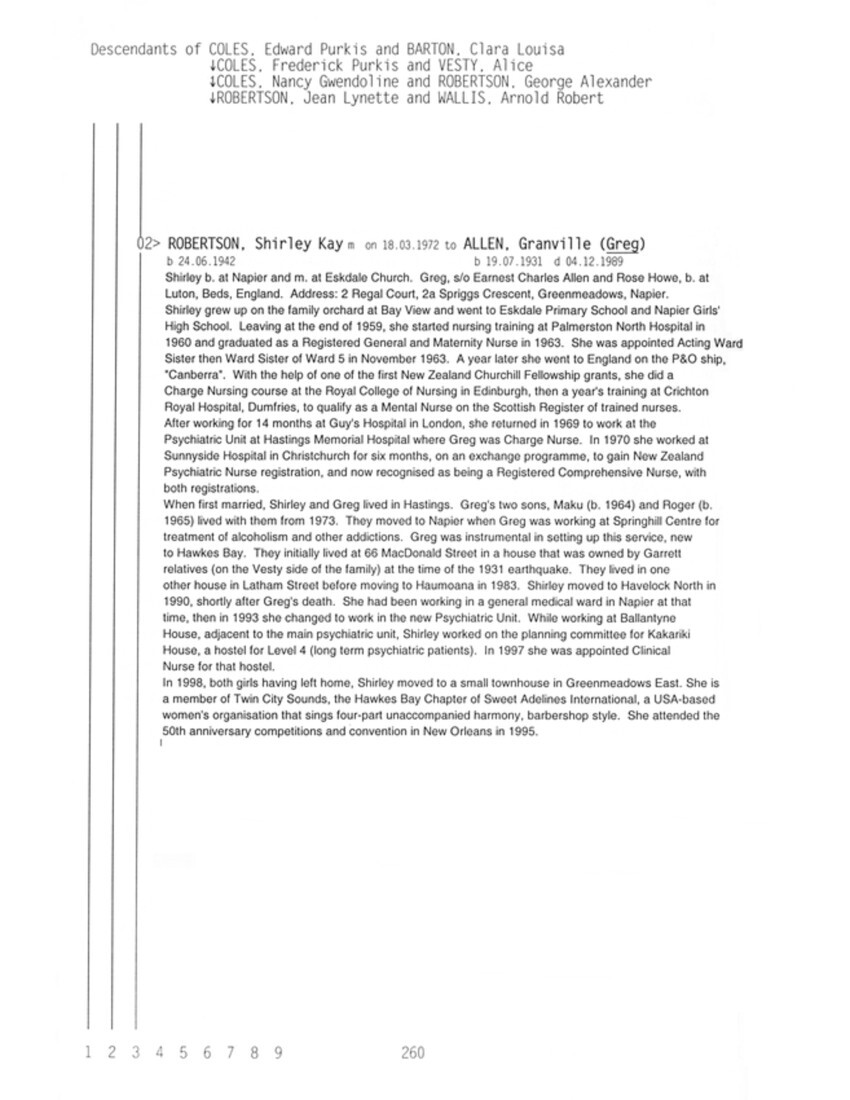
Page 261
Descendants of COLES, Edward Purkis and BARTON, Clara Louisa
COLES, Frederick Purkis and VESTY, Alice
COLES, Nancy Gwendoline and ROBERTSON, George Alexander
[…]
02> COLES, Guy Kenneth m on 14.08.1943 to RYBURN, Daisy Lorraine
b 19.06.1914 d 19.06.1986 b 13.02.1920 d 12.09.1998
Guy b. at Ongaonga, m. at All Souls Church, Clevedon, and d. at Hastings.
Guy was educated at Mahora School where he excelled at swimming. During the depression years he worked on farms and also did some gold prospecting in the South Island. At the outbreak of WW2 he went overseas with the New Zealand Army and was attached to the Sixth Field Regiment in an artillery unit. After fighting in Greece, they were evacuated by ship to Egypt and later they took part in the battles of Tobruk and Maisa Matruh. They were evacuated to New Zealand on furlough in 1943. Lorraine was from a farming family in Clevedon and after their marriage she and Guy had an orchard in St Andrews Road, Havelock North. Lorraine was a keen golfer and represented Hawkes Bay on several occasions.
[…]
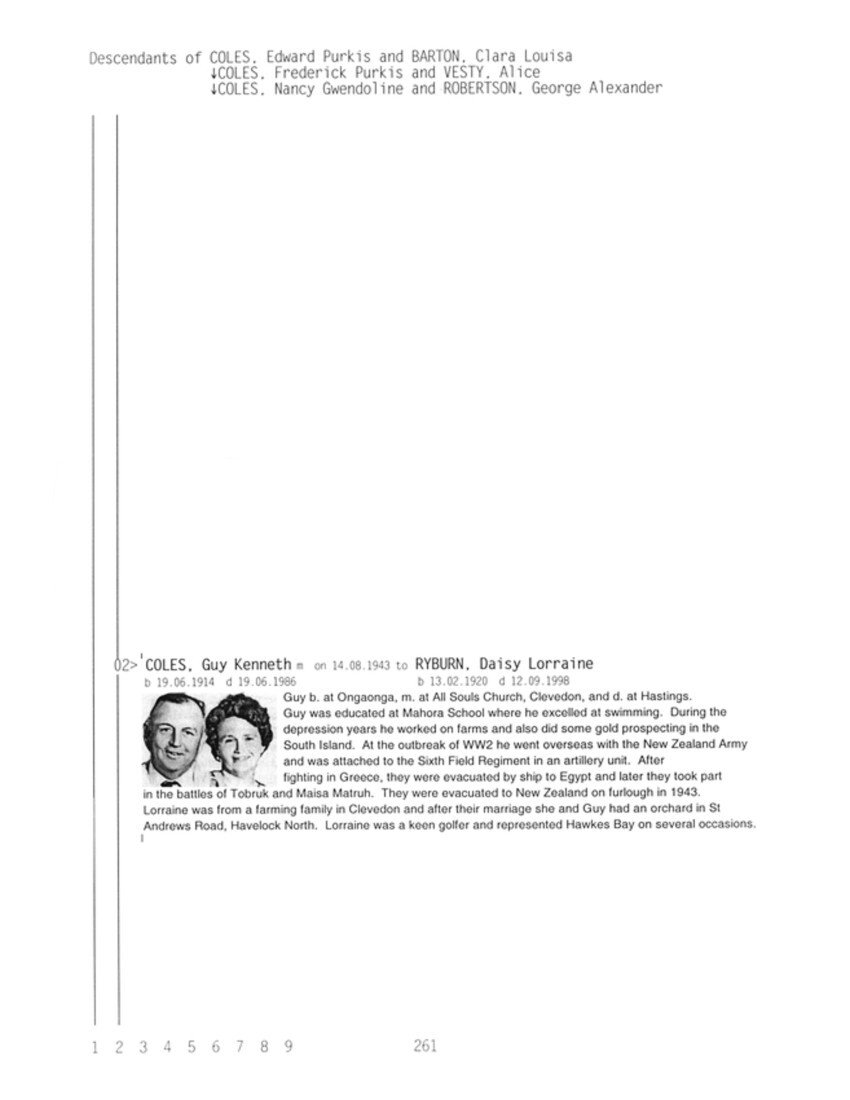
Page 262
Descendants of COLES, Edward Purkis and BARTON, Clara Louisa
COLES, Frederick Purkis and VESTY, Alice
COLES, Guy Kenneth and RYBURN, Daisy Lorraine
COLES, Judith and SCHNELL, David
[…]
03> COLES, Sidney Purkis m on 09.12.1944 to DARROCH, Karine Marjorie
b 12.02.1916 b 23.07.1914
Sidney b. at Ongaonga and m. at St John’s Presbyterian Church, Wellington. Marjorie, d/o Eneas Darroch and Linda Walton, b. at Timaru. Address: 3/515 § Cornwall Road, Hastings.
Sidney worked in the office of Hawkes Bay Farmers before WW2 then during the war he served overseas in the Sixth Field Regiment and took part in campaigns in Greece, North Africa and Italy. He returned to New Zealand in October 1944. He then worked 4 in a sports shop and was later in partnership in a jewellers shop. After selling that, he worked for K O Garland and Sons, also jewellers, for some years.
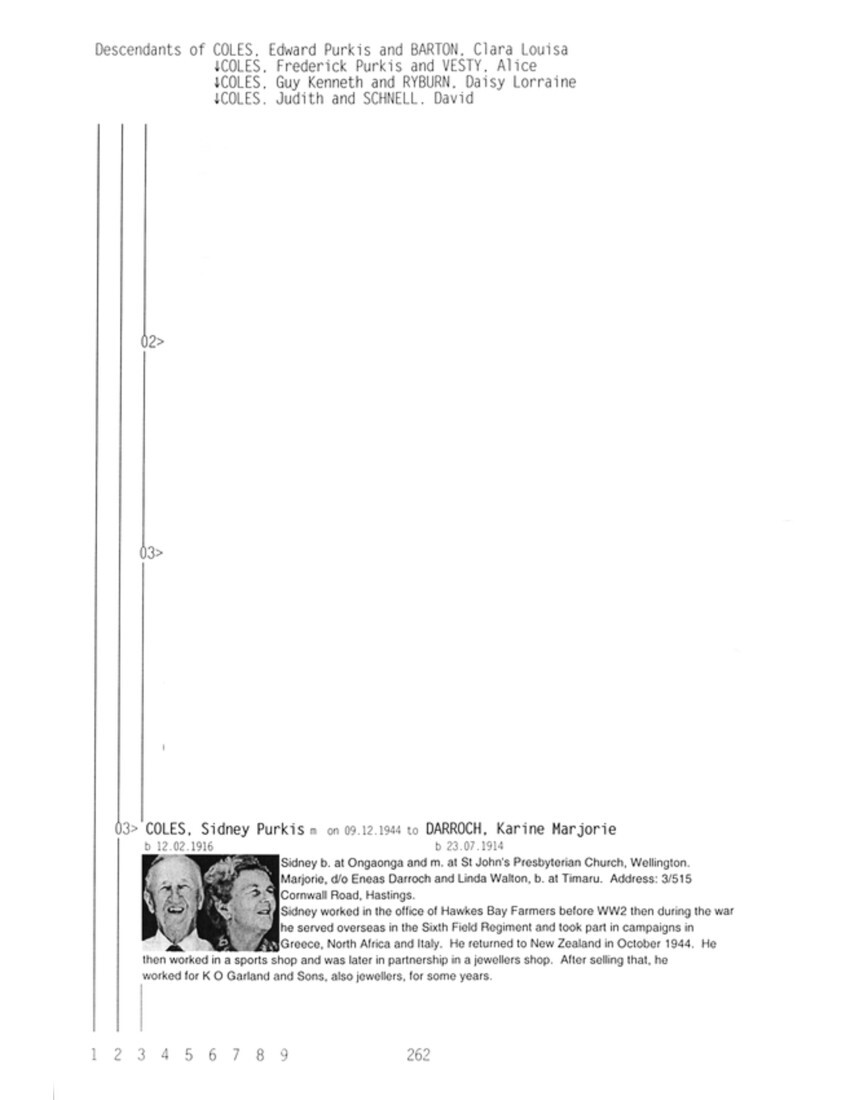
Page 264
Descendants of COLES, Edward Purkis and BARTON, Clara Louisa
COLES, Frederick Purkis and VESTY, Alice
COLES, Sidney Purkis and DARROCH, Karine Marjorie
COLES, Alison Elizabeth and McGREGOR, Robin
[…]
04> COLES, Jessie Mavis (Jaye) m on 02.04.1941 to ROBERTSON, Andrew Douglas
b 26.05.1918 b 05.01.1914 d **.**.1976
Jessie b. at Ongaonga and m. at St Andrew’s Presbyterian Church, Hastings. Doug, s/o Alexander Morris Robertson and Ellen Baird, b. at Hastings, d. at Bay View and bd. at Eskdale. Address: Rannoch Orchard, RD 2, Napier.
Jaye moved to Twyford with her family after her younger brother Bruce was born. Shortly afterwards they moved to Hastings where she attended Mahora Primary School and Hastings High School. She started work in the glasshouses at Wilson’s Nurseries and this gave her a life-long interest in plants and gardens. She started nursing training at Napier Hospital but had to give it up after a year on account of suffering from eczema in both hands. She did some private nursing until her marriage. Doug left for camp in Trentham not long after their marriage and was away for four years. Jaye got a job in Lower Hutt until Doug went overseas and then she returned home to live with her mother and work for a dentist.
After Doug’s return they built a house at Bay View and went into partnership in an orchard with Jaye’s sister Nan and her husband, Alex, who was Doug’s brother. The two families worked well together. In 1960 (cont…)
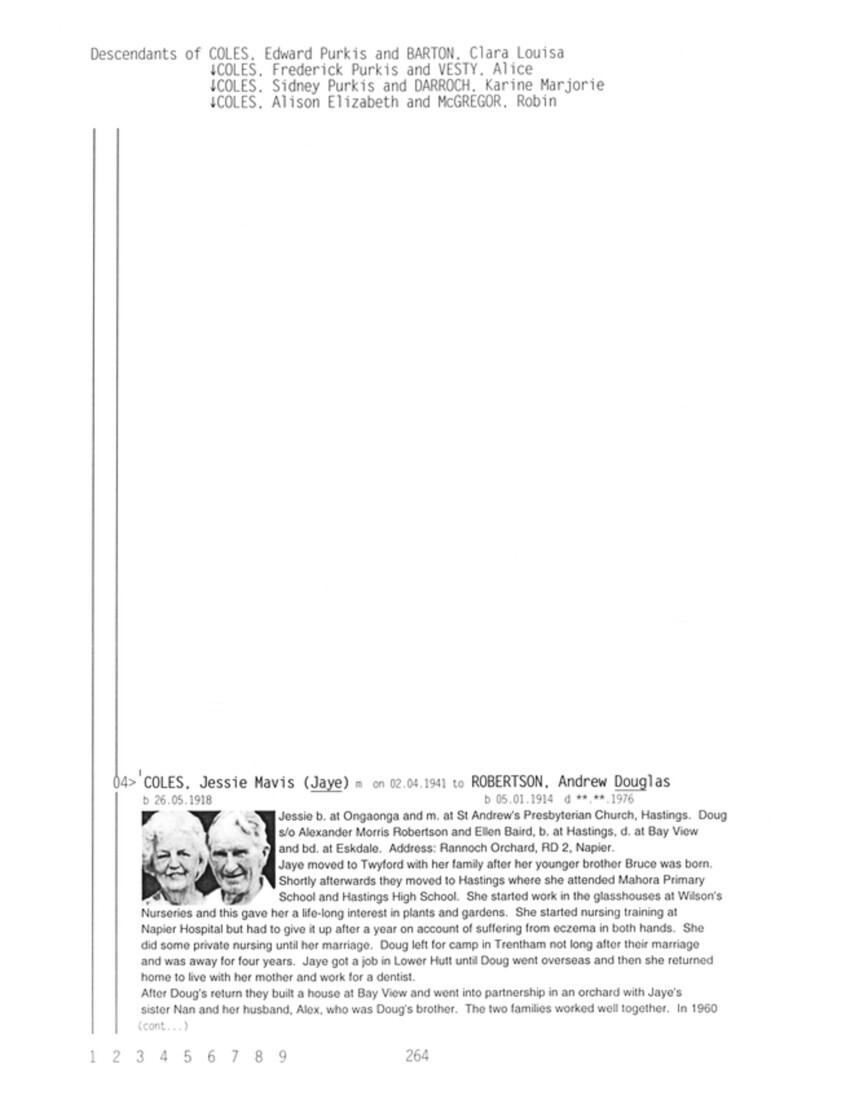
Page 265
Descendants of COLES, Edward Purkis and BARTON, Clara Louisa
COLES, Frederick Purkis and VESTY, Alice
COLES, Jessie Mavis (Jaye) and ROBERTSON, Andrew Douglas (cont…)
Jaye and Doug built a new house where Jessie still lives. In 1976 they spent 3 1/2 months touring in the UK and Europe during which Doug was able to visit some of his cousins in Scotland. A couple of years later they also toured in Australia.
When Alex retired from the orchard, he sold his share to Jaye and Andrew and they carried on until 1976 when they leased the orchard but continued to live in their home there. Doug was a very keen photographer and in later years he and Jaye enjoyed golf.
[…]
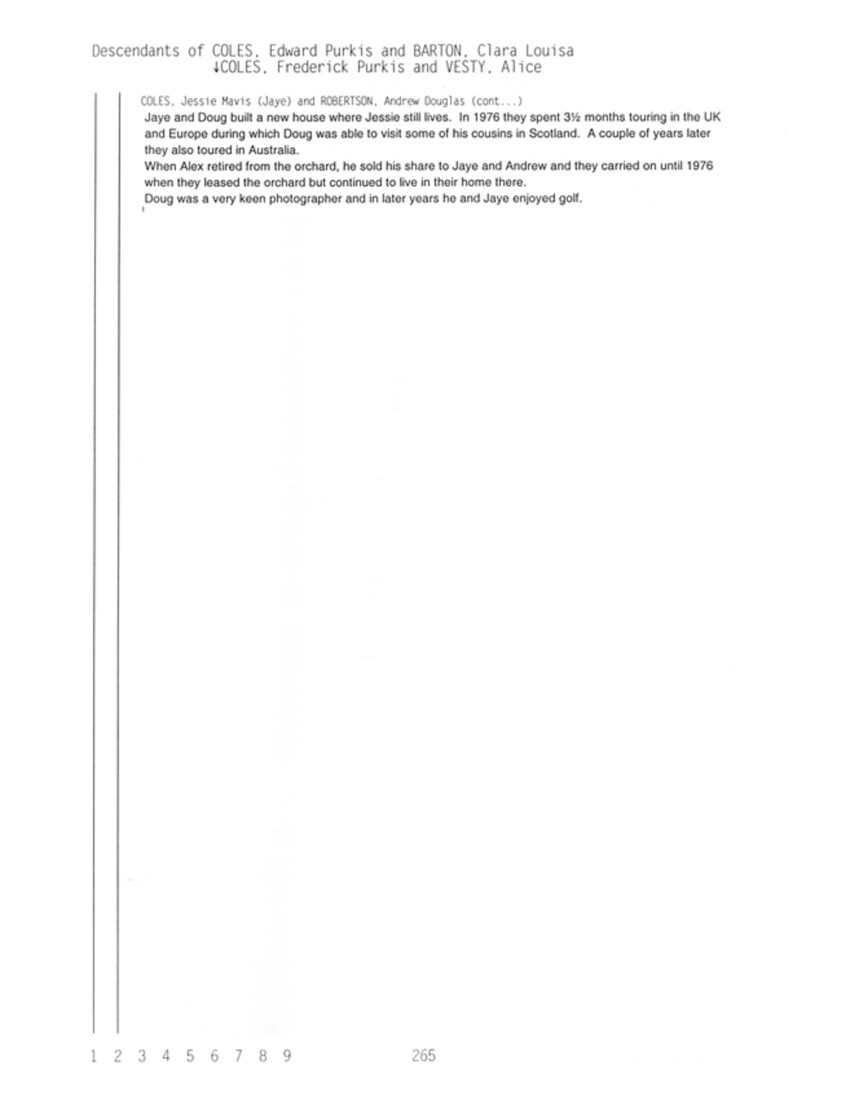
Page 266
Descendants of COLES, Edward Purkis and BARTON, Clara Louisa
COLES, Frederick Purkis and VESTY, Alice
COLES, Jessie Mavis (Jaye) and ROBERTSON, Andrew Douglas
[…]
05> COLES, Bruce Barton m on 13.09.1952 to HILDRETH, Peggy
b 02.08.1920 b 09.03.1930
Bruce b. at Hastings and m. at St Matthew’s Church, Hastings. Peggy, d/o Frank Hildreth and Mary Jane Aitcheson, b. at Hastings. Address: 14 Park Road, Dargaville.
Bruce was educated at Mahora School then trained as a farm cadet at Smedley in 1936-37. He then worked for D H Stewart at Waimarama. He joined the Army in 1940 and was trained at Linton then served in the Sixth Field Regiment in Egypt and Italy. He was discharged in 1945 and worked for N Campbell, Hastings. In 1954 he drew a balloted farm block at Omamari Farm Settlement near Dargaville and in 1970 he enlarged his holding by buying another farm next door. He sold the combined farm to his son Peter in 1982. He has continued to live in the same farm residence since 1954.
Peggy started her education through the Correspondence School then went to Queenswood School, Hastings, and Iona College, Havelock North. She completed her general nursing training at Hastings Memorial Hospital in 1951 and her maternity nursing training in Timaru in 1952.
[…]
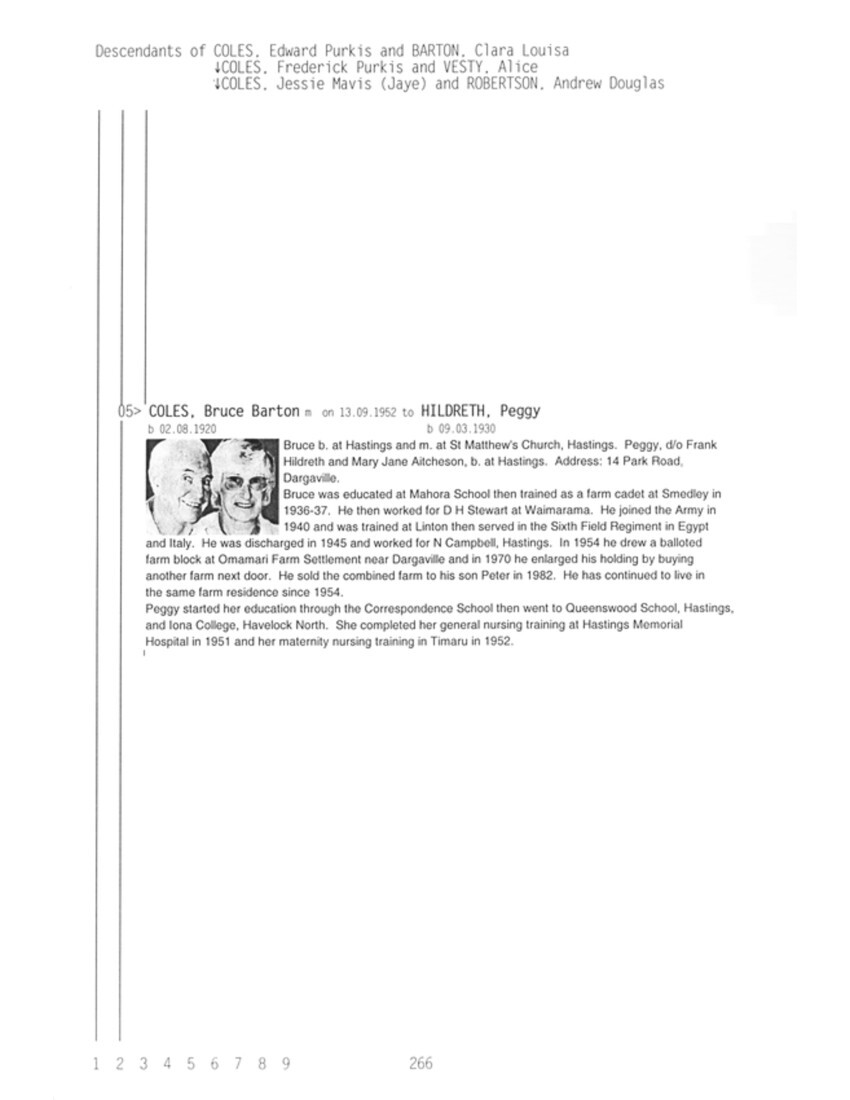
Page 267
Descendants of COLES, Edward Purkis and BARTON, Clara Louisa
COLES, Frederick Purkis and VESTY, Alice
COLES, Bruce Barton and HILDRETH, Peggy
COLES, Justine and TAPPER, Michael James Purcell
[…]
Guy Kenneth COLES (1914-1986), Nancy Gwendoline COLES (1912-1973) md ROBERTSON,
Bruce Barton COLES (1920- ), Jessie Mavis (Jaye) COLES (1918- ) md ROBERTSON,
Alice COLES 1888- 1973) nee vesTy, Sidney Purkis COLES 1916- ).
Photo from: Mrs J M Robertson
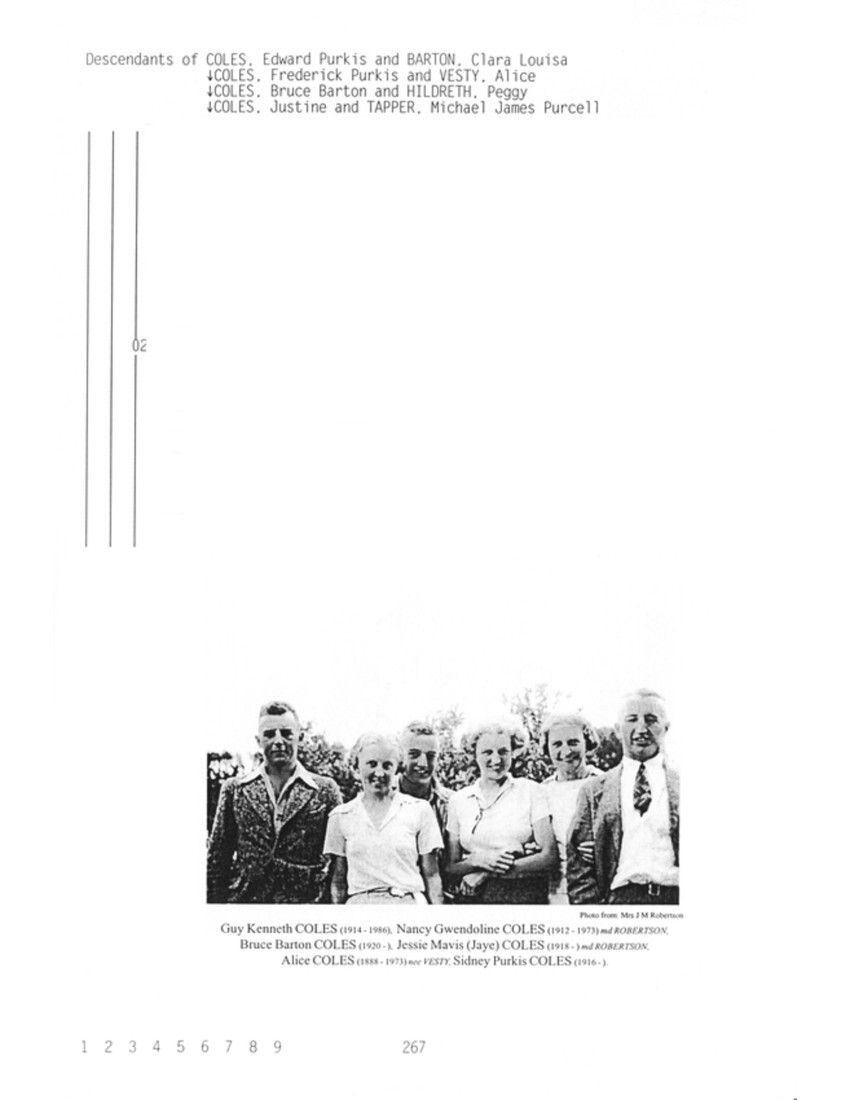
Page 268
The Descendants of Frederick Purkis and Alice Coles
Sidney Purkis COLES 1916- ),
Frederick Purkis COLES (1877-1925),
Guy Kenneth COLES (1914-1986).
Photo from: Mrs J M Robertson
Jessie Mavis (Jaye) COLES (1918- ) md ROBERTSON,
Alice COLES (1888-1973) nee VESTY,
Nancy Gwendoline COLES (1912-1973) md ROBERTSON.
Photo from: Mrs S K Allen
Nancy Gwendoline ROBERTSON (1912-1973) nee COLES, Guy Kenneth COLES (1914-1986),
Sidney Purkis COLES (1916- ), Jessie Mavis (Jaye) ROBERTSON (1918- ) nee COLES,
Bruce Barton COLES (1920- ).
Photo from: Mrs J M Robertson
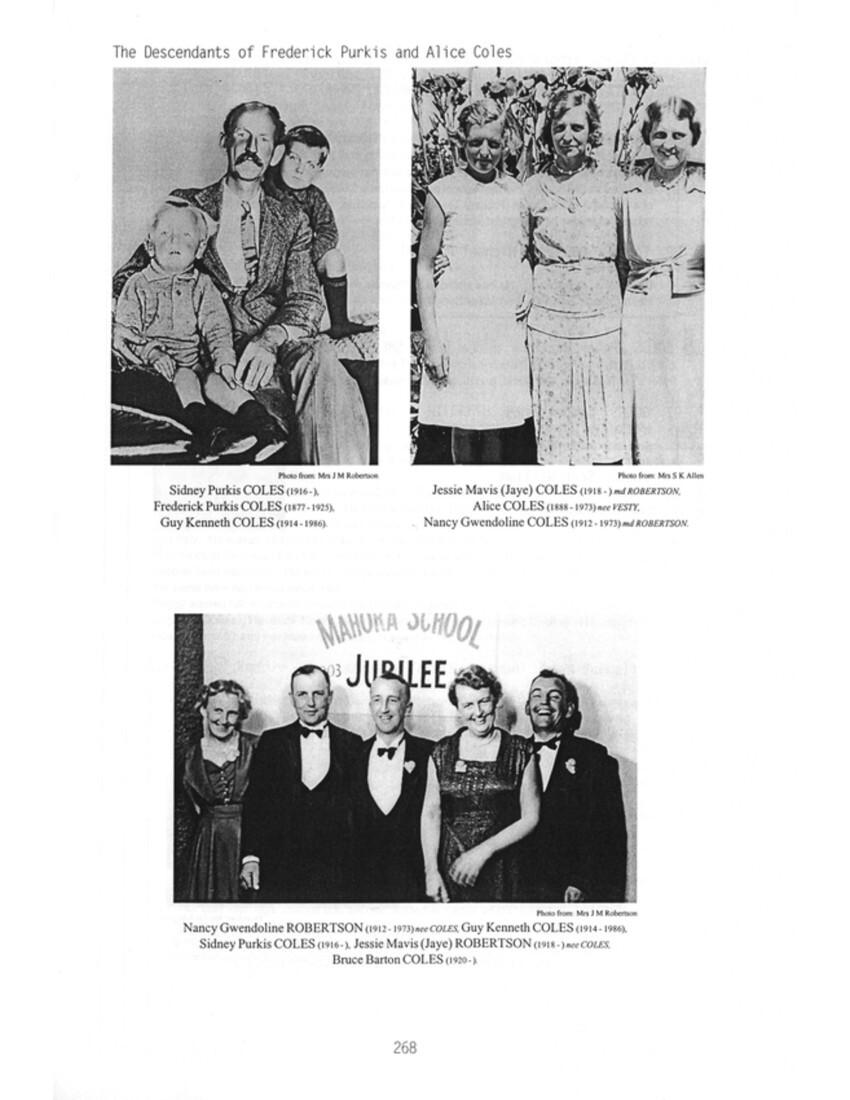
Page 269
The Descendants of Frederick Purkis and Alice Coles
Jessie Mavis (Jaye) COLES (1918- ) md ROBERTSON, Sidney Purkis COLES (1916- ),
Guy Kenneth COLES (1914-1986), Nancy Gwendoline COLES (1912- 1973) md ROBERTSON,
Bruce Barton COLES (1920- ).
Photo from: Mr B B Coles
Judith COLES […] md SCHNELL, Douglas Leo COLES […],
Daisy Lorraine COLES (1920-1998) nee RYBURN, Richard COLES […],
Guy Kenneth COLES (1914–1986).
Photo from: Mrs J M Robertson
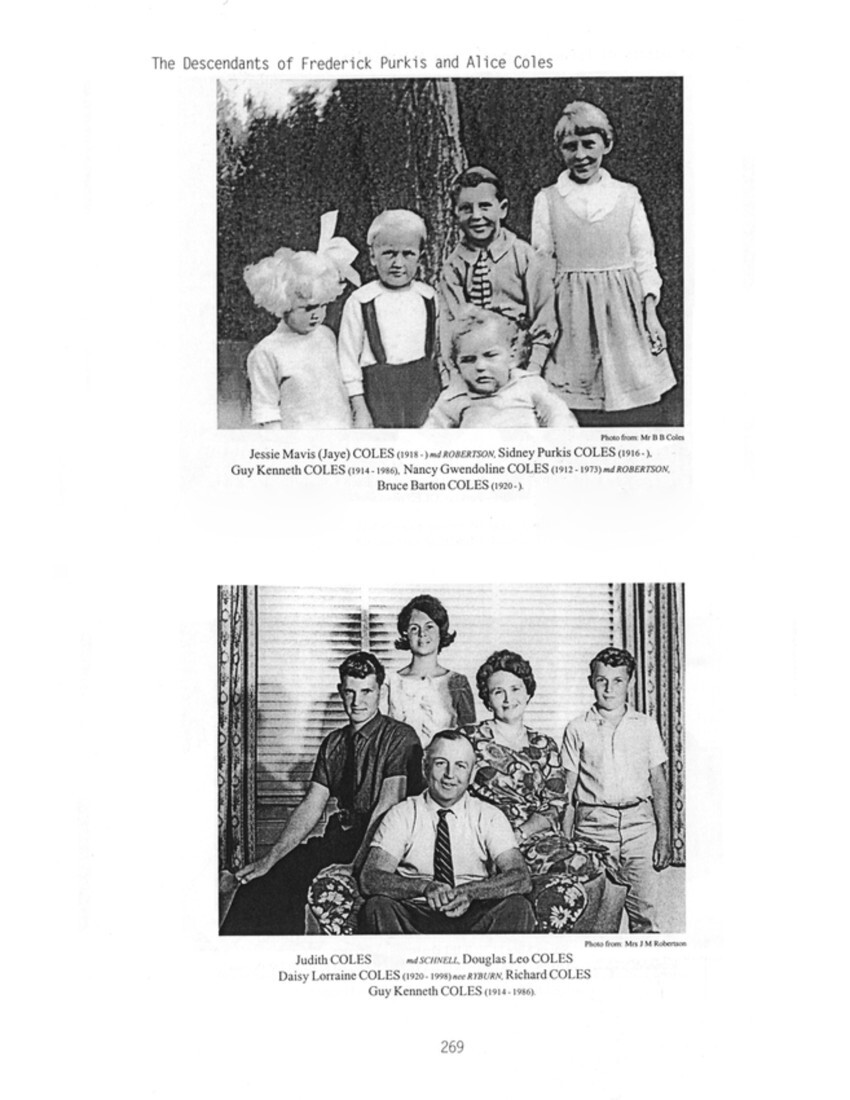
Page 270
The Descendants of Frederick Purkis and Alice Coles
Brian Robert COLES […], Alison Elizabeth McGREGOR […] nee COLES,
John Sidney COLES […], Karine Marjorie COLES (1914- ) nee DARROCH,
Sidney Purkis COLES (1916- ).
Photo from: Mrs J M Robertson
Barry Alexander ROBERTSON […], Andrew Douglas ROBERTSON (1914- 1976),
Susan Alice SCHOFIELD (1942- ) nee ROBERTSON,
Jessie Mavis (Jaye) ROBERTSON (1918- ) nee coLes, Graham Douglas ROBERTSON […].
Photo from: Mrs J M Robertson
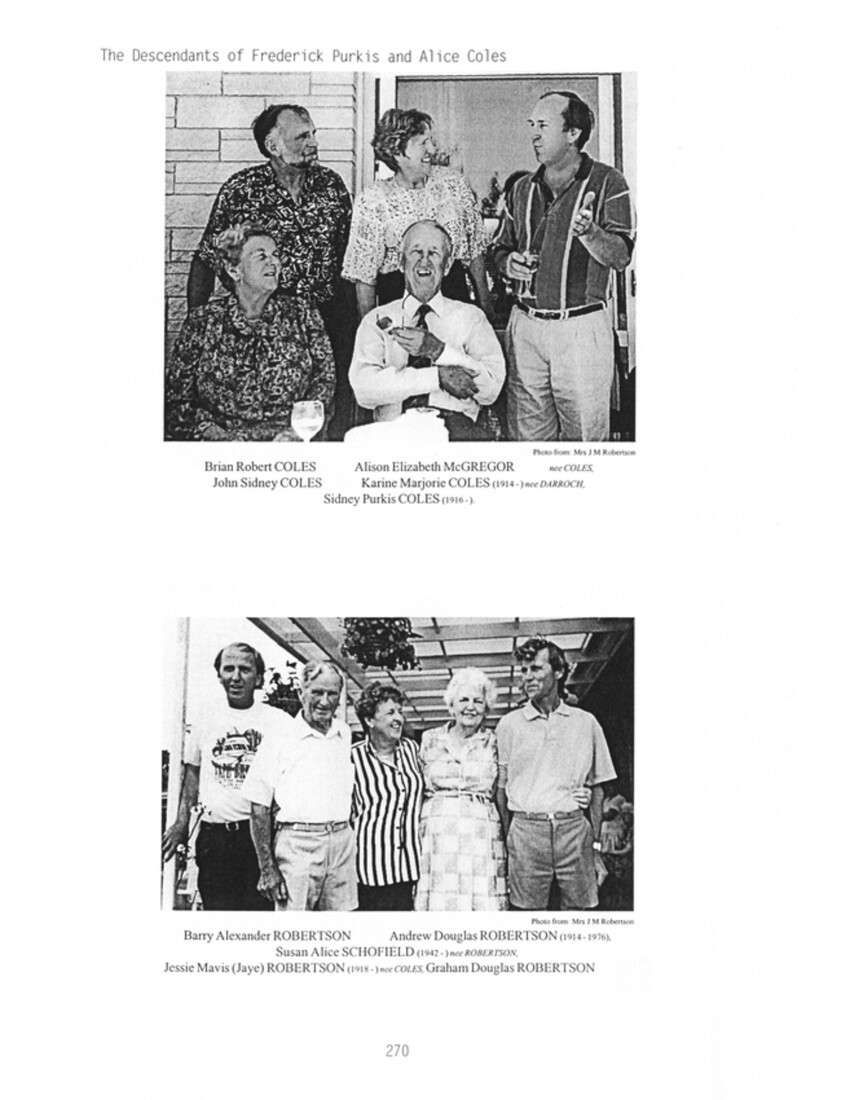
Page 271
The Descendants of Frederick Purkis and Alice Coles
Susan Alice SCHOFIELD (1942- ) nee ROBERTSON, Nicholas Andrew SCHOFIELD […], Wayne Roy SCHOFIELD (****- ), Kirsten Alice SCHOFIELD […], Rebecca Susan SCHOFIELD […].
Photo from: Mrs S A Schofield
Bruce Barton COLES (1920- ), Peggy COLES (1930- ) nee HILDRETH, Peter Barton COLES […],
Samuel Lee COLES […], Sean William COLES […].
Photo from: Mrs J M Robertson
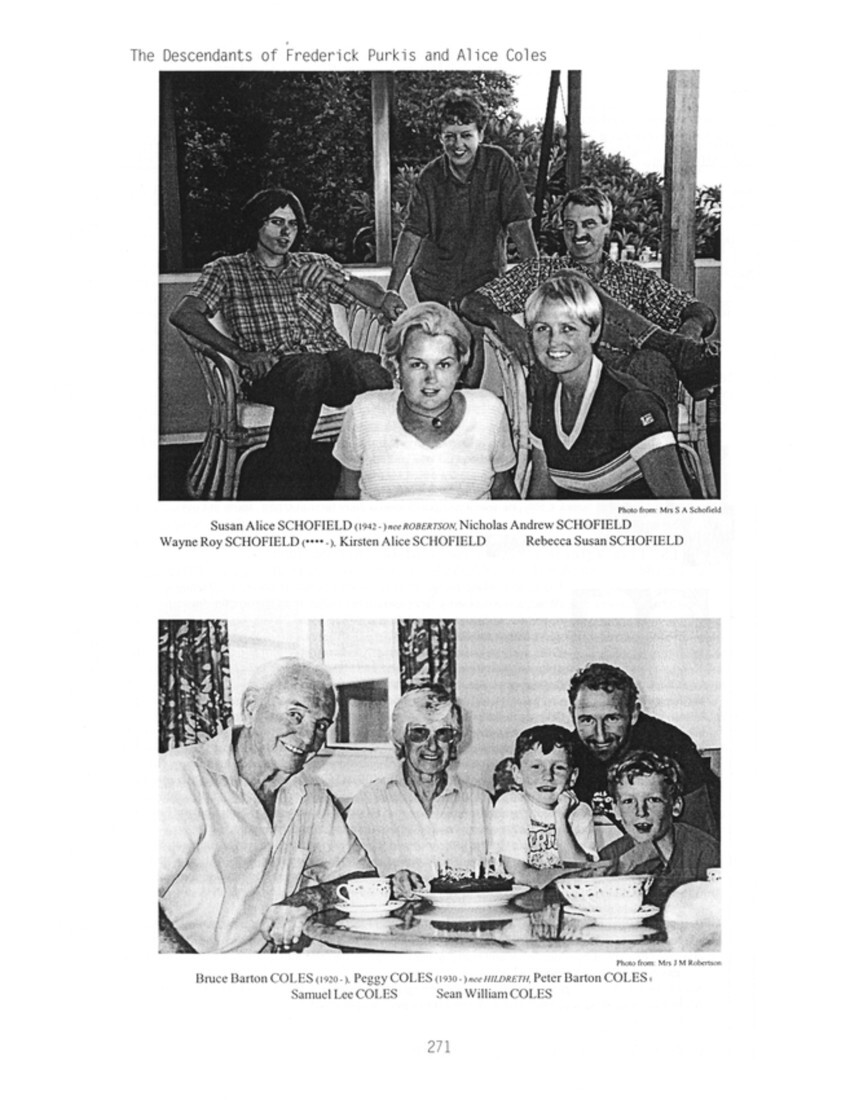
Page 272
COLES, Samuel Arthur
m to VESTY, Margaret
Ella Valerie
= NICOL, Alfred John
NICOL, Lyall Ross
= JOHNSON, Judith Anne
NICOL. Patricia Helen
= ALEXANDER, Kevin Douglas
NICOL, Janice Barbara
= MacKAY, Leonard Stanley
NICOL, John Samuel
= PRESTON, Kaye Lesley
Madge
Phillis Barton
= HARKNESS, William Leslie
HARKNESS, Bruce McGregor
= MITCHELL, Janet
HARKNESS, Leslie Anne
HARKNESS, Ian Ranwick
HARKNESS, Graeme Roger
= (1) HOBART, Marilyn Elizabeth
= (2 ) MATHIESON, Anne Marie
HARKNESS, John Murray
= SMITH, Lynn Marie
Mary Barton
= STONE, William Henry
STONE, Margaret Vesty
= MOSS, Henry
STONE, Maureen Barton
= BRERETON, Kevin Phillip
STONE, Lesley Jean
= BUTLER, Colin Armigel
STONE, William Henry Gardner
Lyall Barton
= BRODIE, Margaret
COLES, Murray Lyall
Descendants of COLES, Edward Purkis and BARTON, Clara Louisa
15> COLES, Samuel Arthur m on 04.09.1907 to VESTY, Margaret
b 24.06.1880 d 10.03.1943 b 27.11.1875 d 12.09.1955
Samuel b. and m. at Ongaonga and bd. at Tiro Tiro Cemetery, Levin. Margaret b. at 4, Hampden, England and bd. at Tiro Tiro Cemetery, Levin.
Samuel initially farmed at Forrest Hills before selling and moving to Napier to work. He later bought another farm in the Ongaonga district but, not having the capital to stock it fully, he sold it and purchased a dairy farm at Ohau, south of Levin.
Margaret was the sister of Alice Vesty, wife of Fredrick Purkis Coles.
01> COLES, Ella Valerie m on 27.04.1940 to NICOL, Alfred John
b 21.09.1909 b 24.01.1909 d 29.01.1991
Ella b. at Tikokino and m. at St Andrew’s Church, Ballarat, Vic, Australia. Alfred, s/o John Henry Nicol and Agnes Slater, b. at Linton, Vic, Australia, and d. and bd. at Skipton, Vic. Address: 1/232 Albert Street, Sebastopol, Ballarat 3356, Vic, Australia.
Ella’s early life was spent on a dairy and cropping farm two or three miles from Ongaonga on the Takapau Road and she started her education at Ongaonga School. Her family moved to the Hastings area about 1918 and stayed there for about four years. During this time her father worked as a house painter and learnt the carpentering trade. When they returned to farming, Ella once again attended Ongaonga School, then went to Waipawa High School for three years. When she was 18 1/2 years old, Ella began her nursing training at Napier Public Hospital. During her third year she experienced the Napier Earthquake, a very traumatic experience. At the end of 1931 she went to Blenheim to finish her training and whilst there she also completed one year of maternity training. She returned to the North Island and spent two or three years at Levin Hospital and also nursed at a private hospital in Palmerston North. In 1938 she travelled to Australia to represent her family at the marriage of her sister Mary to Harry Stone and whilst there she met Alfred. She returned to New Zealand but crossed the Tasman again in 1940 to marry Fred and start her new life in Australia.
When Fred was only a few months old, his father took up the position of manager of Burrumbeep Station at Maroona, a rural area near Ararat, Victoria. Fred began school at Maroona then rode his horse 12 miles each way to attend Ararat High School. He completed a course in wool classing at the Gordon Institute in Geelong and during this time he travelled to various properties in Victoria and New South Wales as part of his training. He also played football in Geelong.
In 1928 his father purchased land at Bradvale, Victoria, and Fred began to run the farm, where he was to live for 63 years. He played football for Bradvale/Derrinallum, winning a premiership in 1930. He so often told Ella about how ‘he, Snow and Harry’ played the game that she thought they were the only three players in the team! Ella didn’t actually ever see him play.
After their marriage, Fred and Ella spent their honeymoon travelling around the coast of Victoria into South Australia. This was Ella’s first look around this picturesque coastline. (cont…)
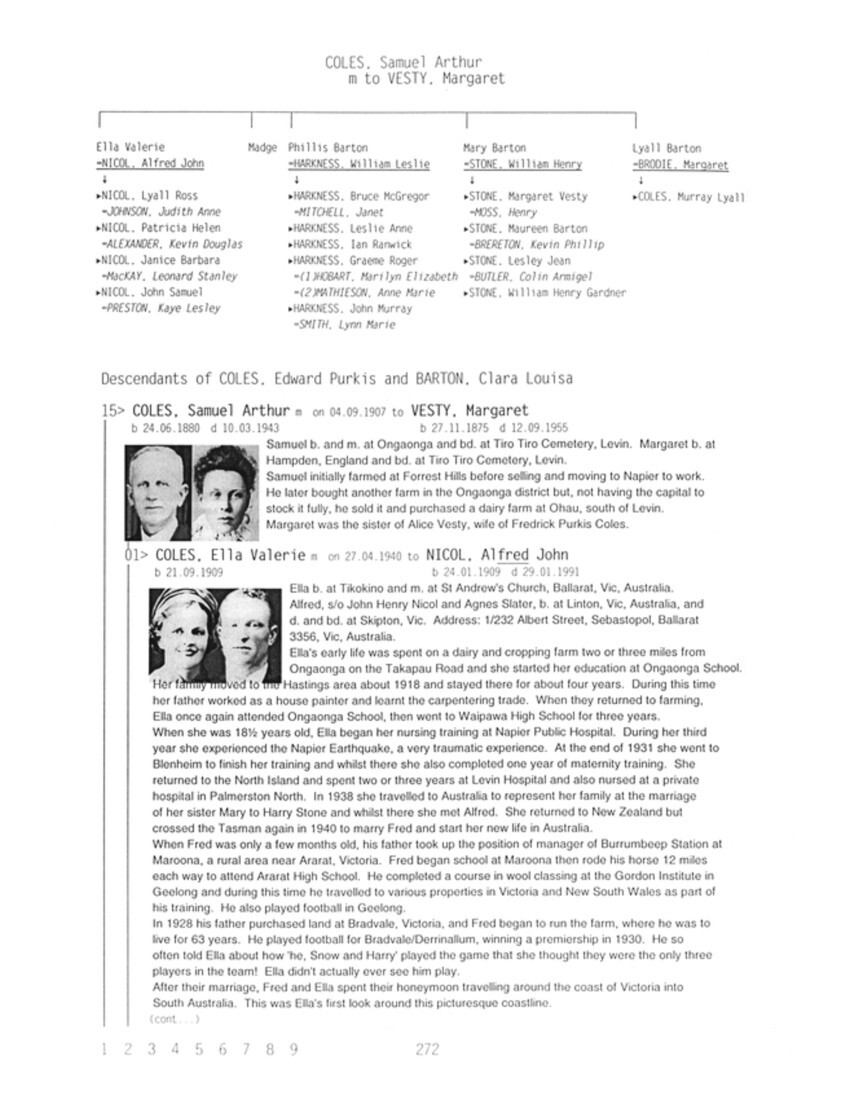
Page 273
Descendants of COLES, Edward Purkis and BARTON, Clara Louisa
COLES, Samuel Arthur and VESTY, Margaret
COLES, Ella Valerie and NICOL. Alfred John (cont…)
Ella’s father died early in 1943 but it was war time and she was not able to return to New Zealand at that time. Shortly afterwards, they experienced another tragedy. On 12 January 1944, on an extremely hot and windy day, a huge bush fire wiped out the district. It engulfed the Nicol’s home and farm and they lost most of their stock and all their possessions, including precious photos from New Zealand. The family moved to nearby Skipton for nine months, until their new home was built. As it was still war time, building materials were in scarce supply. One of Fred’s first tasks was to erect 11 1/2 miles of fencing on his own before the farm could be restocked. He lived in an old tram or train carriage on the farm during the week and returned to spend the weekends with his family in Skipton. The difficulties seemed to continue, as the following year, 1945, was a drought year and Fred obtained only 20 lambs from 800 ewes he had bought. In 1948 Ella returned to New Zealand for a holiday. She was going to take her son Ross with her but, due to a polio epidemic in New Zealand at that time, he was unable to go. Ella brought her mother to Australia and she stayed for a year.
The 1950s were good years for the family. Wool prices were booming, enabling Ella and Fred to send their children away to boarding school, starting with Ross in 1955. At one time, three of the children were at Geelong College together. Ella and Fred enjoyed several more visits to New Zealand, including to their daughter Jan’s wedding in 1971. They also travelled throughout Australia and to Hong Kong. They celebrated their Golden Wedding anniversary in 1990. Ella’s sporting interests have included tennis, golf and bowls. She has been Associate Bowls Champion and also B Grade Golf Champion.
Following Fred’s death, Ella moved to a unit in Ballarat. During this time she completed many tapestries and crosswords, played bowls, delivered Meals on Wheels and attended day centre where she enjoyed a variety of crafts and the company of others. She also began painting lessons, which became an absorbing pastime until her eyesight began to deteriorate. This has also prevented her from enjoying many of her former interests but she still attends Kelaston, a low vision day centre, each week and is being assisted to write her life story. Ella listens to most sports and recently won the AFL football tipping competition at day centre. She takes a keen interest in the activities of her family, friends and current affairs and was pleased to be able to attend her granddaughter’s wedding in Queensland at the end of 1999.
01> NICOL, Lyall Ross m on 26.01.1973 to JOHNSON, Judith Anne
b 12.08.1941 b 30.05.1948
Ross b. at Skipton, Vic, Australia, and m. at Skipton Presbyterian Church.
Judith b. at Beeac, Vic, Australia.
Ross began his education at the small local school at Bradvale where there were about 15 students and one teacher. Ross and his siblings rode horses to school. His secondary education was completed at Geelong College where he was a boarder. He had to complete Leaving Certificate exams in hospital as he had the mumps. In 1959 Ross came home to begin farming on the family farm. He moved on to his own farm nearby in 1961 where he had sheep and cattle and grew crops. He played football for Bradvale for many years, the highlight being the winning of a premiership in 1965. He was coach of their junior team for two years. He also played cricket for many years, winning two premierships. He has held office in the Bradvale Football Club, Lismore Cricket Club, Skipton Golf Club, Mingay Fire Brigade, Bradvale Recreation Reserve and the Skipton Masonic Lodge.
Judy is a primary school teacher. In 1997 Ross and Judy sold their farm to Victoria Plantations Corporation and bought a home and large garden on six acres at Smythes Creek near Ballarat. Ross, with the help of their carpenter son Rohan, has been renovating the farmhouse which has been moved from the farm and onto a five acre block near where he lives. Ross’ other interests include gardening, sport and reading. Judy enjoys casual replacement teaching and also teaching swimming at the Ballarat Aquatic Centre. She also enjoys gardening, family history, tennis and crafts.
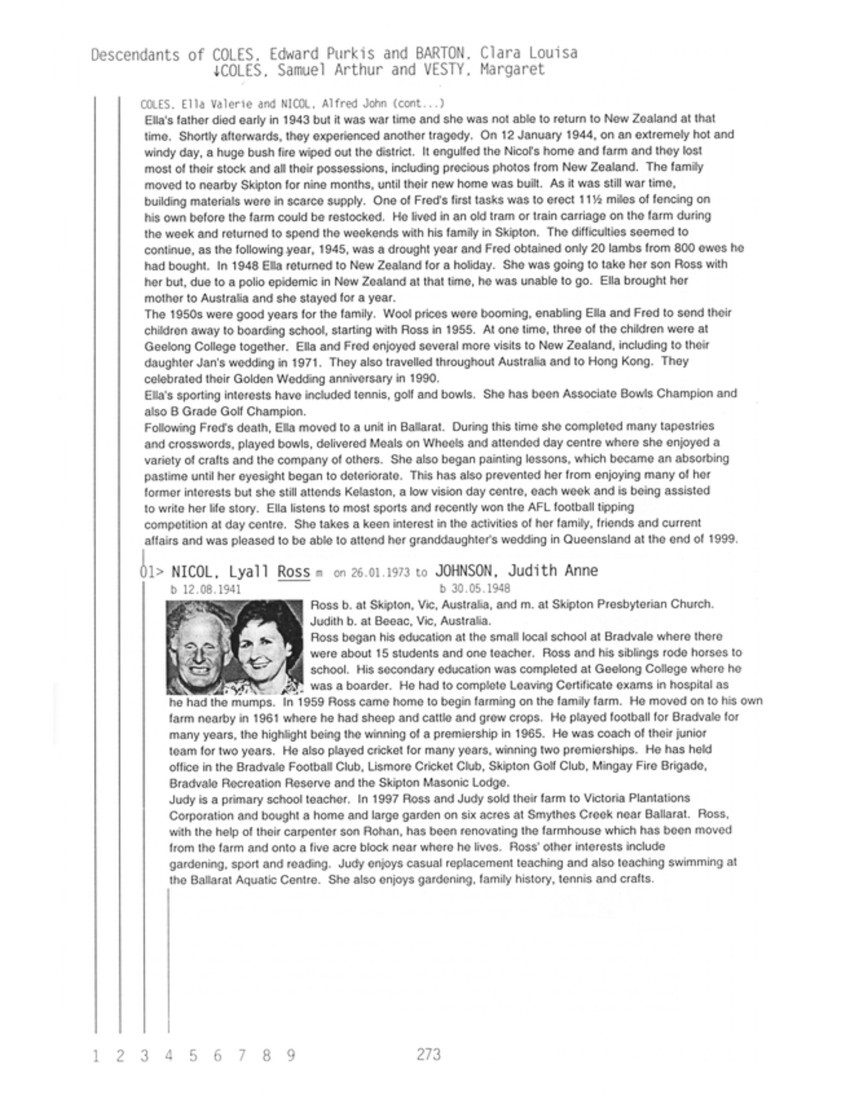
Page 274
Descendants of COLES, Edward Purkis and BARTON, Clara Louisa
COLES, Samuel Arthur and VESTY, Margaret
COLES, Ella Valerie and NICOL, Alfred John
NICOL, Lyall Ross and JOHNSON, Judith Anne
[…]
02> NICOL, Patricia Helen m on 22.02.1964 to ALEXANDER, Kevin Douglas
b 28.08.1942 b 16.02.1937
Patricia b. at Skipton, Vic, Australia, and m. at St Andrew’s Church, Ballarat, Vic, Australia. Address: 14 Pacific Way, Tura Beach 2598, NSW, Australia.
Pat attended school at Derrinallum and Bradvale State Schools then boarded at Morongo Presbyterian Girls’ College in Geelong. She then completed her nursing training at Geelong Hospital and later worked for a time at Beaufort Hospital.
Pat and Kevin lived in Skipton before moving onto the Alexander family farm, “Kelvin”, near Skipton. During this time Pat nursed part-time at Skipton Hospital. In 1985 they sold their share of the farm and bought a home in Ballarat. Pat worked with the Ballarat District Nursing Society and Kevin had gardening clients and worked on a farm. In 1998 they retired to Tura Beach, New South Wales, and moved into their newly built home at the end of that year.
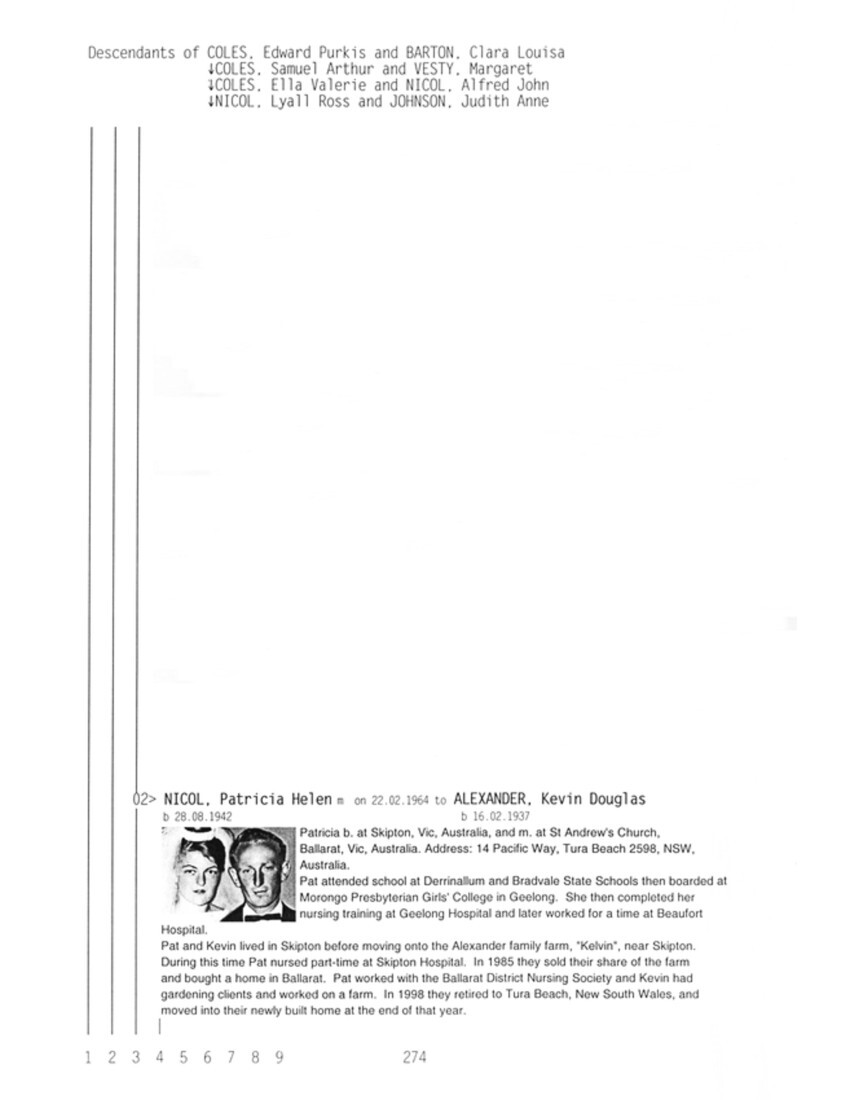
Page 275
Descendants of COLES, Edward Purkis and BARTON, Clara Louisa
COLES, Samuel Arthur and VESTY, Margaret
COLES, Ella Valerie and NICOL, Alfred John
NICOL, Patricia Helen and ALEXANDER, Kevin Douglas
[…]
03> NICOL, Janice Barbara m on 13.03.1971 to MacKAY, Leonard Stanley
b 20.10.1943 b: ** .**.1942
Janice b. at Skipton, Vic, Australia and m. at St Andrew’s Church, Palmerston North. Address: 21 Argol Street, Browns Plain, Brisbane, Qld, Australia.
[…]
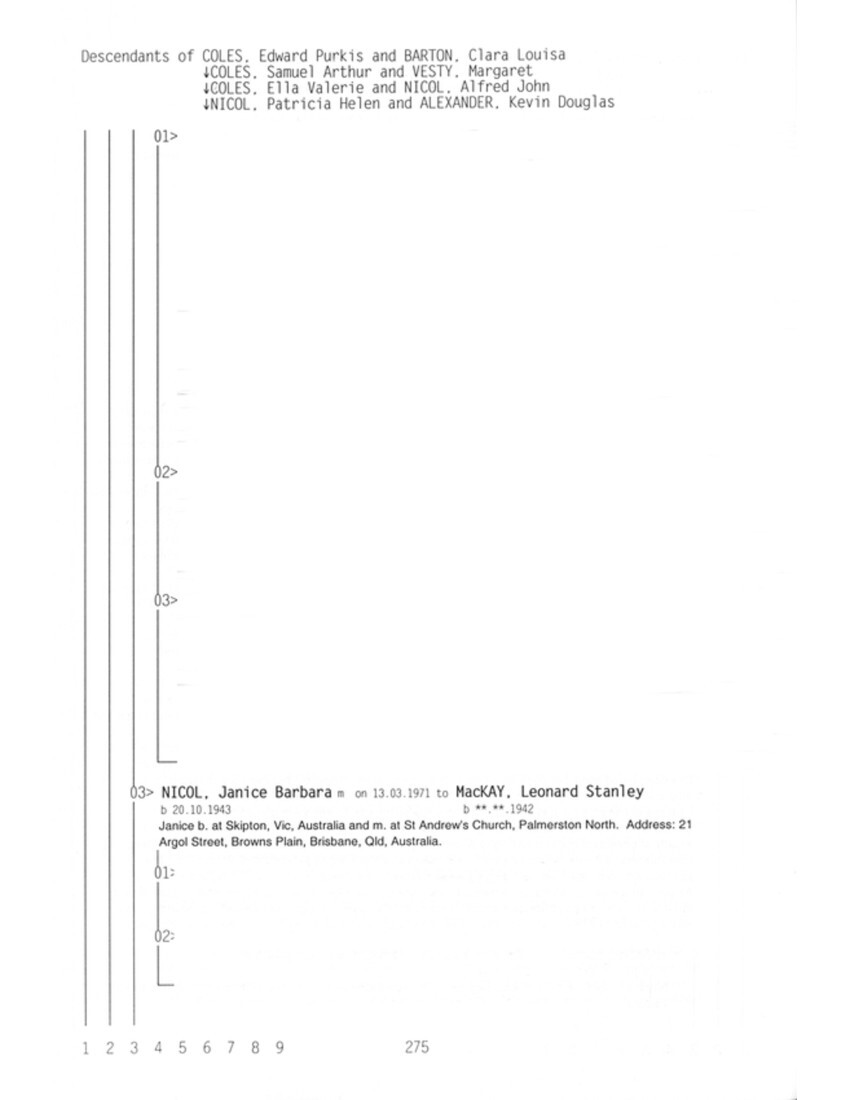
Page 276
Descendants of COLES, Edward Purkis and BARTON, Clara Louisa
COLES, Samuel Arthur and VESTY, Margaret
COLES, Ella Valerie and NICOL, Alfred John
[…]
02> COLES, Madge
b **.**.1910 d 18.08.1918
03> COLES, Phillis Barton m on 03.06.1936 to HARKNESS, William Leslie
b 07.02.1911 d 22.12.1994 b **.**.1908 d **.**.1978
Phyllis b. at Ongaonga, m. at St Andrew’s Presbyterian Church, Levin, d. at Palmerston North and cremated at Kelvin Grove, Palmerston North. Phyllis and William lived at 16 Manawatu Street, Palmerston North. Phyllis attended primary school in Ongaonga. When her parents sold their farm at Ongaonga and moved to Napier, she went with them, and then to Ohau where they purchased a dairy farm. During the depression she helped to work the farm.
It was while she was at home at Ohau that she met her future husband when he came to board with them while working at the Ohau dairy factory. This was part of the dairy diploma that he was doing at Massey College. After they were married they moved to Kaponga in the Taranaki where they lived for about five years before moving to Palmerston North. They lived for a number of years next to the New Zealand Dairy Research Institute factory at Massey College. Les had taken a position as cheese and butter manger. Later they purchased a house at 120 Pahiatua Street in Palmerston North. When the house and grounds (1/4 acre) became too much for her to manage, Phyllis subdivided off the back part of the section and built herself a home unit. After doing so she wondered why she had not done it earlier when Les was still alive.
Phyllis and Les travelled several times to Australia with his job which allowed them to see not only her sisters but also a large part of the country. After Les’ death in 1978, Phyllis travelled there several more times to visit her sisters who were farming in Victoria around Ballarat and later retired to Ballarat. The year that she died she had spent several months there. Her interests were the family and she enjoyed having them around to visit and visiting them. She also enjoyed gardening and indoor and outdoor bowls. She was a member of St Andrew’s Presbyterian Church and for many years she helped with Meals on Wheels.
In the latter years her eyesight was not the best with her central vision going. This meant that she was unable to drive and had to give up outdoor bowls but continued to play indoor bowls at the local school. She complained about her eyes from time to time to her family. They told her that they still would not drop a $20 note on the ground in front of her. She would just laugh and say, “Try me”.
With two of her sons living in the Auckland area she spent a bit of time visiting them and her grandchildren. She used to travel up by train, bus or air. Just before one visit she had a car accident. Shortly afterwards she was travelling to Auckland by bus when it was involved in a accident about 20km from Palmerston North. It was suggested to her that it might be better if she didn’t fly for a while. She just laughed at the suggestion and said, “Why not?”
As you can see, she had a wonderful sense of humour which was probably developed having to put up with three sons. It appeared that nothing would worry her, especially when things happened in the family. She was a great walker, especially after she was unable to drive, and enjoyed good health up until her death.
01> HARKNESS, Bruce McGregor m on 17.04.1962 to MITCHELL, Janet
b 10.04.1939 b **.**.****
Bruce b. at Kaponga, Taranaki, and m. at St Andrew’s Church, Palmerston North. Address: PO Box 70, Tuakau.
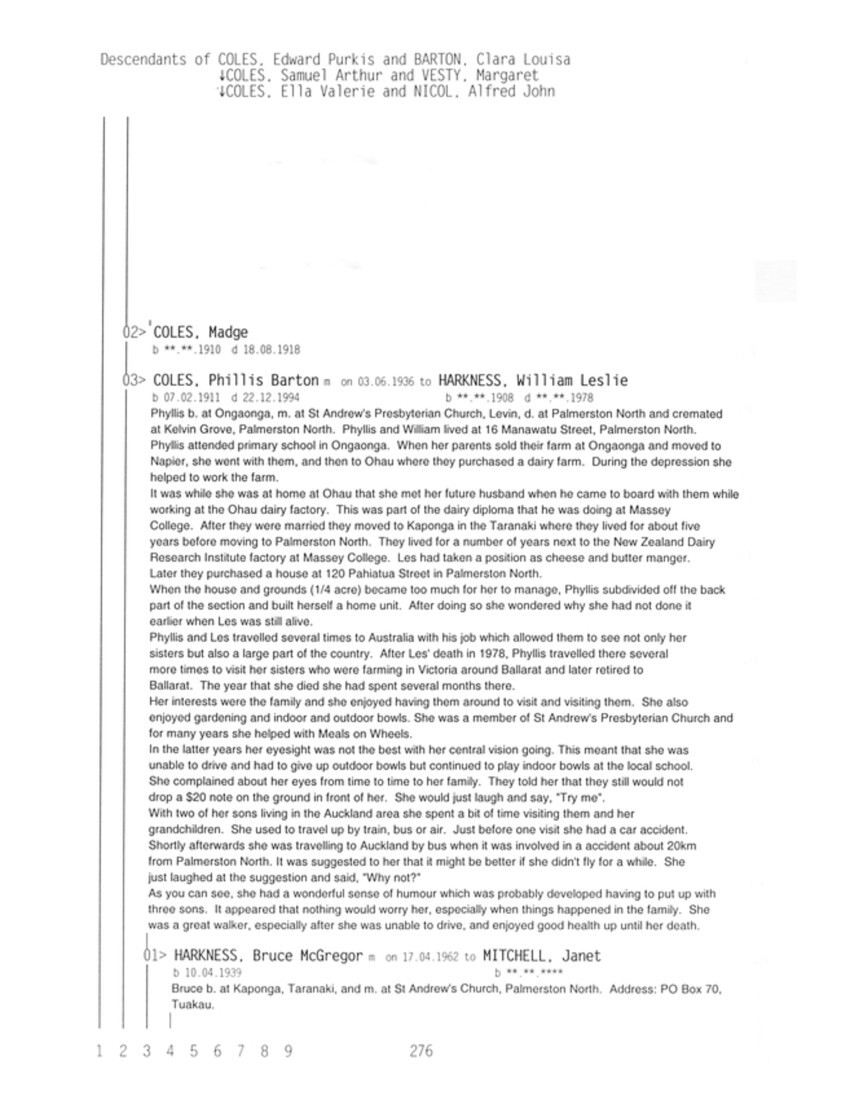
Page 277
Descendants of COLES, Edward Purkis and BARTON, Clara Louisa
COLES, Samuel Arthur and VESTY, Margaret
COLES, Phillis Barton and HARKNESS, William Leslie
HARKNESS, Bruce McGregor and MITCHELL, Janet
[…]
02> HARKNESS, Leslie Anne
b 05.11.1943 d 03.09.1944
Lesley b. at Ohau, south of Levin, bap. at St Andrew’s Church, Palmerston North and bd. at Palmerston North Cemetery.
[…]
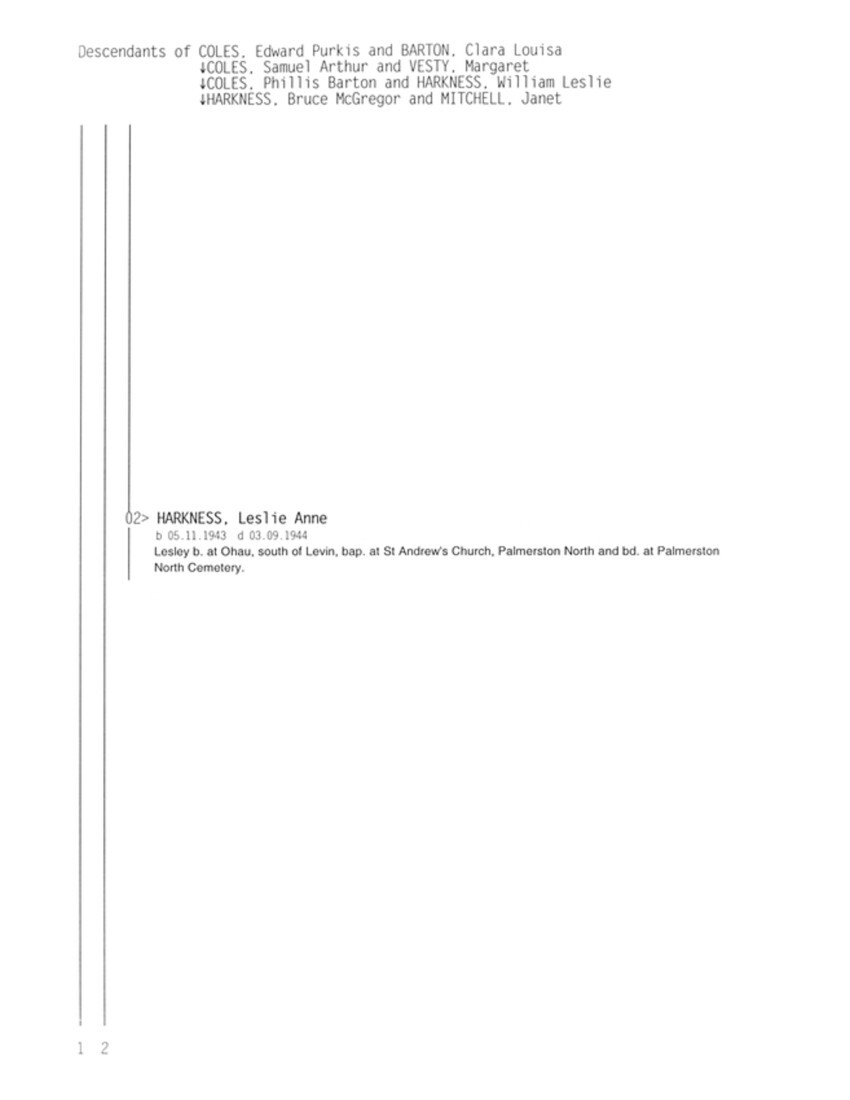
Page 280
Descendants of COLES, Edward Purkis and BARTON, Clara Louisa
COLES, Samuel Arthur and VESTY, Margaret
COLES, Mary Barton and STONE, William Henry
STONE, Lesley Jean and BUTTLER, Geoffrey Armigal
BUTTLER, Michael John and PITKITHLY, Jenni Maree
[…]
05> COLES, Lyall Barton m on **.**.**** to BRODIE, Margaret
b **.**.**** d **.**.**** b **.**.**** d 11.07.1981
Lyall d. at Levin.
01> COLES, Murray Lyall
b **.**. 1950 d 26.10.1968
Murray d. at Levin as a result of a car accident when he was hit by a train. He is bd. at Tiro Tiro Cemetery, Levin.
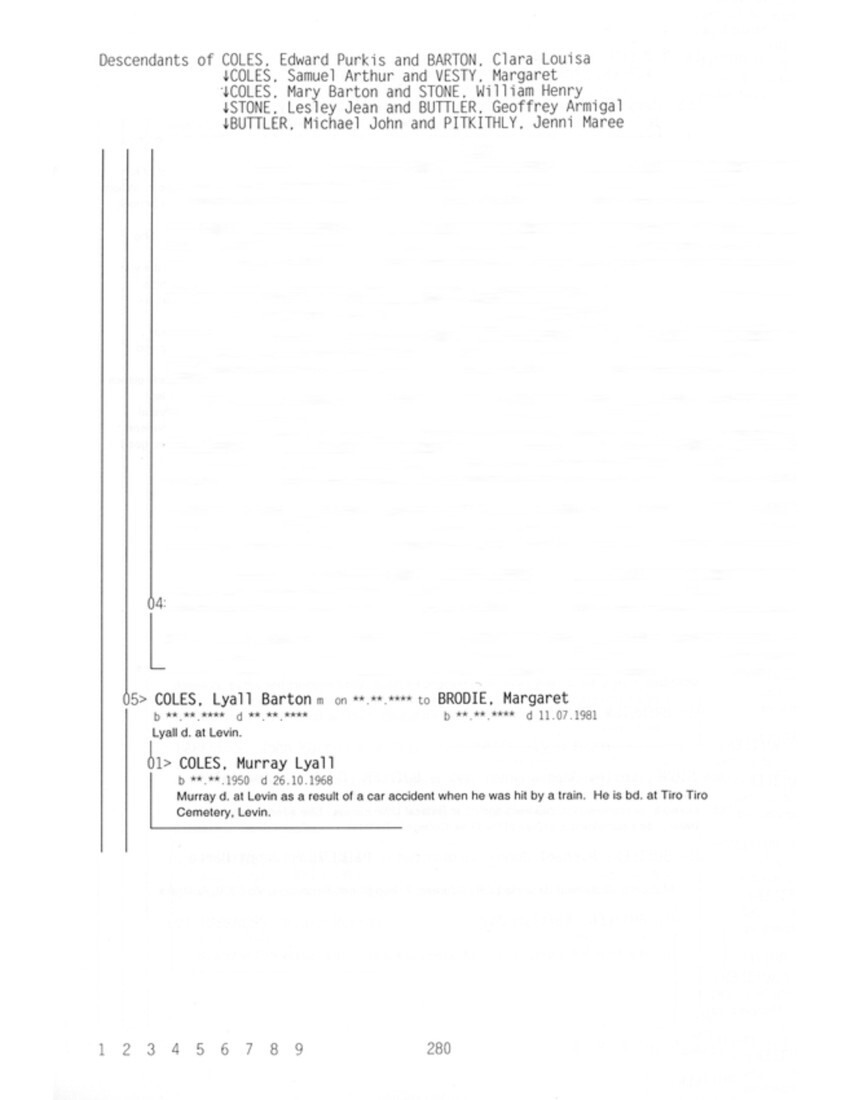
Page 281
The Descendants of Samuel Arthur and Margaret Coles
Lyall Ross NICOL (1941- ), Janice Barbara MacKA Y (1943- ) nee NICOL, Patricia Helen ALEXANDER (1942- ) nee NICOL,
Ella Valerie NICOL (1909- ) nee COLES, Alfred John NICOL (1909-1991), John Samuel NICOL (1945- ).
Photo from: Mrs E V Nicol
Lyall Ross NICOL (1941- ), Patricia Helen ALEXANDER (1942- ) nee NICOL,
Janice Barbara MacKAY (1943- ) nee NICOL, John Samuel NICOL (1945- ),
Ella Valerie NICOL (1909- ) nee COLES.
Photo from: Mr L R Nicol
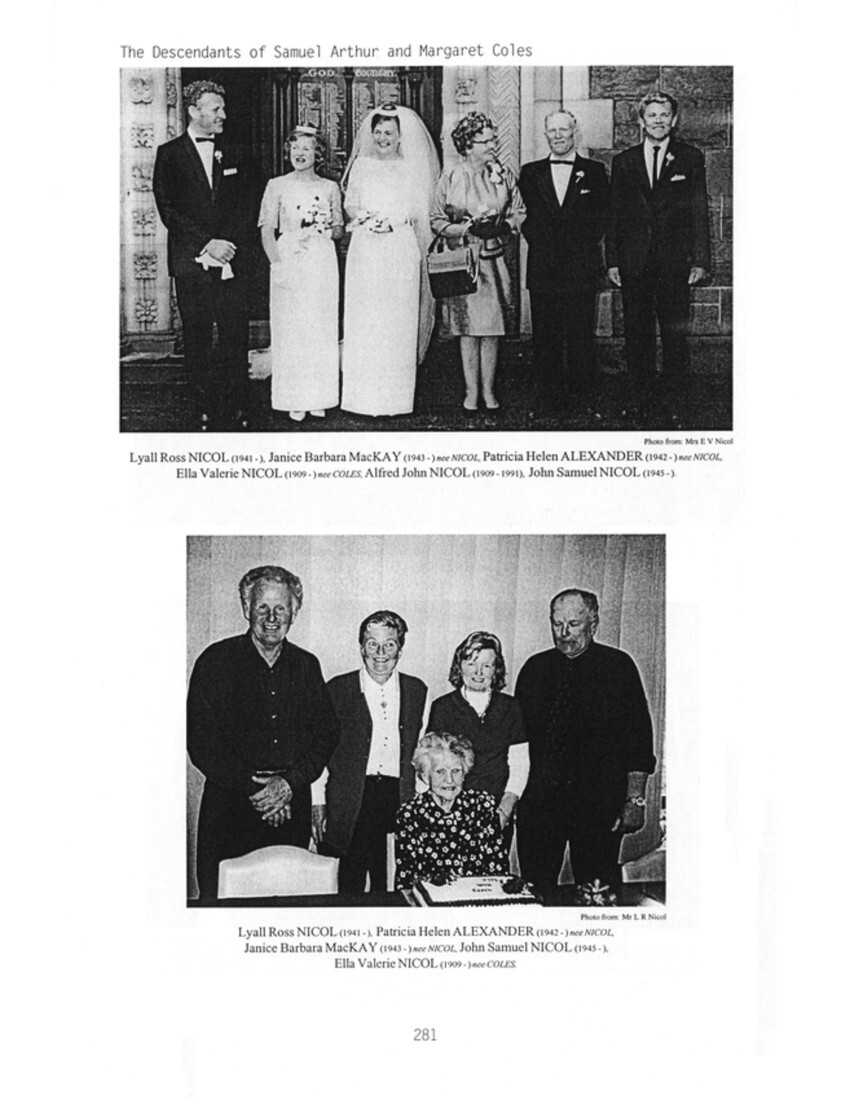
Page 282
The Descendants of Samuel Arthur and Margaret Coles
Kevin Douglas ALEXANDER (1937- ), Patricia Helen ALEXANDER (1942- ) nee NICOL, Timothy John ALEXANDER […], Thomas ALEXANDER […], Gregory Ross ALEXANDER […],
Sandra Leanne ALEXANDER […], Adele ALEXANDER (****- ) nee LAIRD,
Laura Grace ALEXANDER […], Ella Valerie NICOL (1909- ) nee COLES.
Photo from: Mr L R Nicol
Colin Laurance BUTLER […], David Geoffrey BUTLER […], Michael John BUTLER […],
Lynn Maree BUTLER […], Lesley Jean BUTLER (1942- ) nee STONE, Colin Armigel BUTLER (****- ).
Photo from: Mr L R Nicol
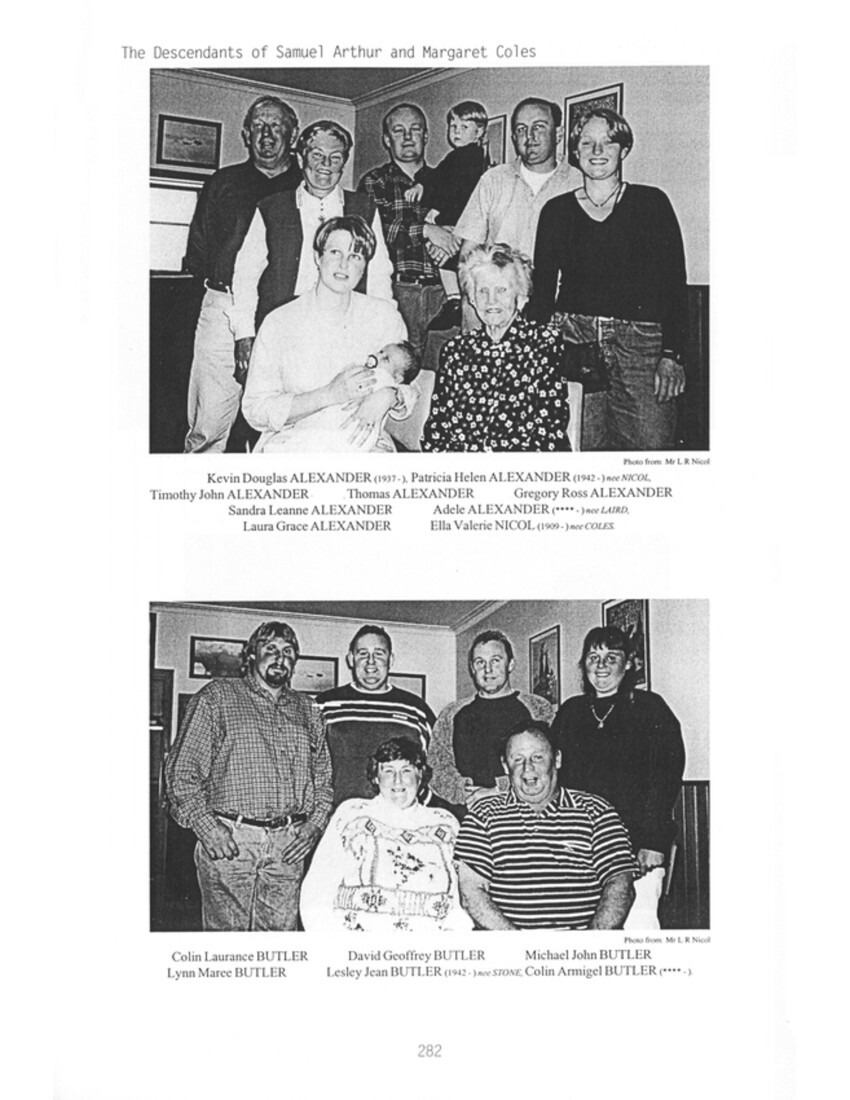
Page 283
The Descendants of Samuel Arthur and Margaret Coles
Cameron Lyall NICOL […], Judith Anne NICOL […] nee JOHNSON, Emma Jayne NICOL […],
Lyall Ross NICOL (1941- ), Rohan Christopher NICOL […].
Photo from: Mrs E V Nicol
Ella Valerie NICOL (1909- ) nee COLES,
Mary Barton STONE (1912- ) nee COLES.
Photo from: Mr L R Nicol
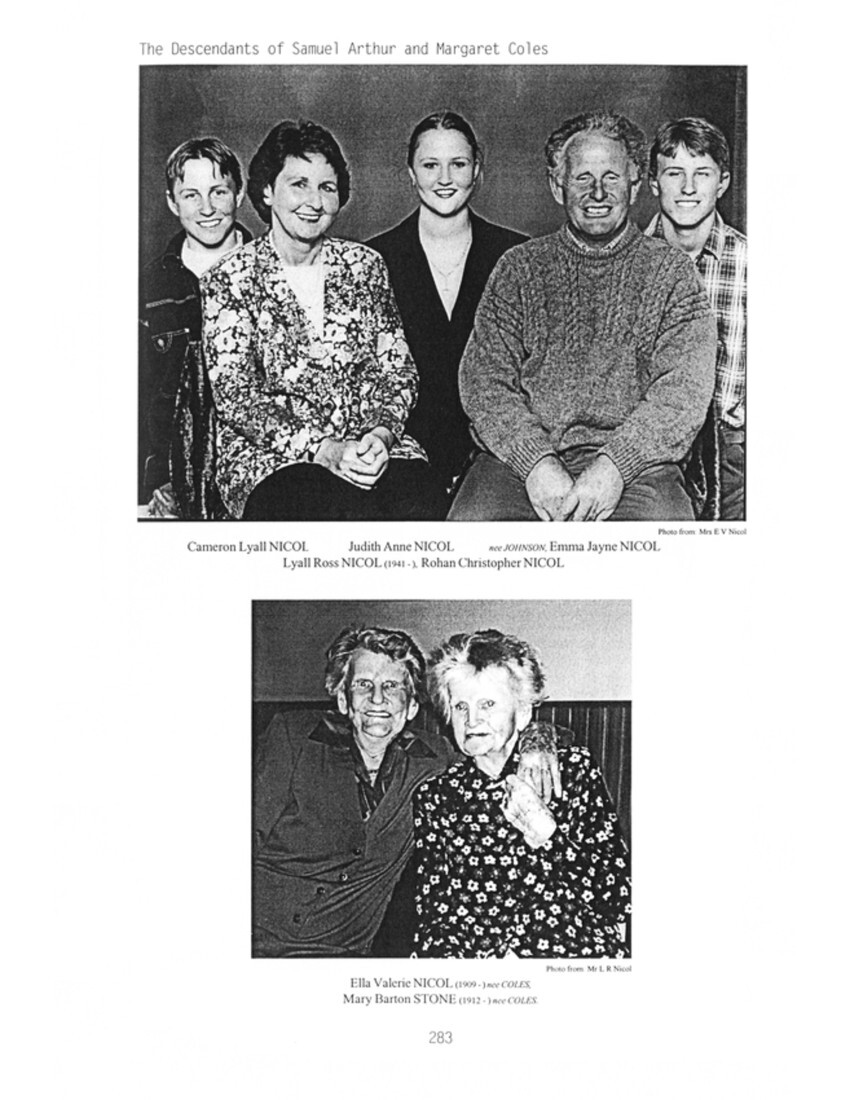
Page 284
The Descendants of Samuel Arthur and Margaret Coles
William Henry Gardner STONE […],
Maureen Barton BRERETON (1940- ) nee STONE,
Lesley Jean BUTLER (1942- ) nee STONE,
Mary Barton STONE (1912- ) nee COLES.
Photo from: Mr L R Nicol
Leonard Stanley MacKAY (1942- ),
Janice Barbara MacKAY (1943- ) nee NICOL.
Photo from: Mrs E V Nicol
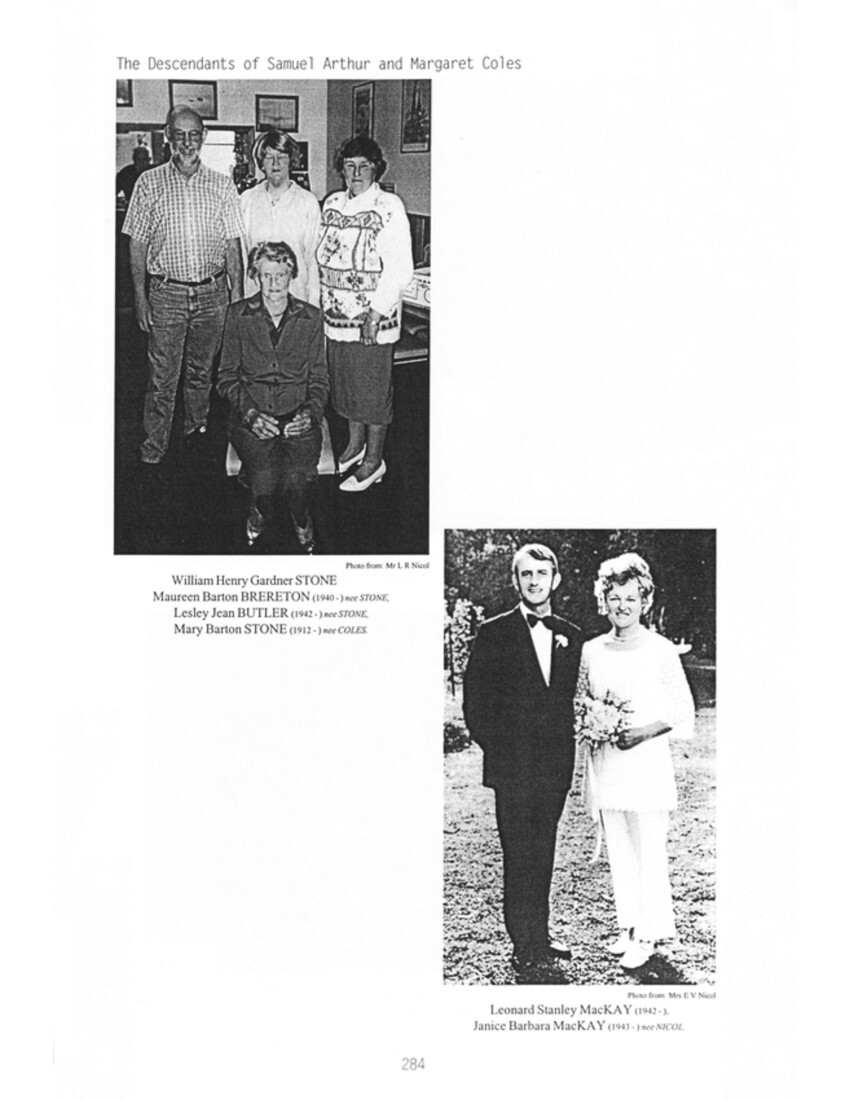
Page 285
COLES, Alice
m to GLENNY, Albert Frank
Edward Purkis (Ted)
Basil
= RIACH, Margaret
GLENNY. Suzanne
= SAUNDERS, Alan Henry
Dulcie Mavis
=BOHM, John Richard Fulton
BOHM, Peter Richard
= ??. ??
BOHM, Alan
= GJORDING, Anne C
BOHM, John Harvey
= FINLAYSON, Dorothy Rae
BOHM, Helen Julie
= CHESTERMAN, Peter
June Alison
= GROGAN, Maurice Patrick (Mick)
GROGAN, John
= TERRY, Margaret
GROGAN, Barbara
= HILTON, Barry
GROGAN, Dianne
= ROBERTSON, Kevin
GROGAN, Colleen
= SHORT, Terrence John
GROGAN, Brian
= COOPER, Deborah
GROGAN, Joy
= ATWOOD, Keith
GROGAN, Margaret
= CURRIE, David
GROGAN, Gary
= FREEMAN, Riki
Descendants of COLES, Edward Purkis and BARTON, Clara Louisa
16> COLES, Alice m on 17.04.1906 to GLENNY, Albert Frank
b 09.10.1881 d 21.06.1963 b 10.08.1882 d 16.08.1975
Alice b. at Waipawa, m. at Ongaonga in a double wedding with her sister, Martha, and d. at Wellington. Frank wrote notes on the Glenny family’s arrival in New Zealand aboard the “John Scott”, arriving at Auckland on 5 March 1859.
Refer to “The Descendants of Alexander and Deborah Glenny “published by Evagean Publishing in 1999 for information on Frank’s family.
01> GLENNY, Edward Purkis (Ted)
b **.04.1907 d 15.03.1927
Edward d. aged 20 years.
02> GLENNY, Basil m on 02.11.1935 to RIACH, Margaret
b 25.10.1908 d 29.01.1971 b 11.01.1910 d 02.11.1985
01> GLENNY, Suzanne m on 23.09.1961 to SAUNDERS, Alan Henry
23.10.1939 b 17.04.1939
Suzanne b. and m. at Wellington. Separated. Alan, s/o Frederick Edward Saunders and Evelyn Spiers, b. at Wellington. Address: 46 Windoma Circle, Papatoetoe, Auckland.
Suzanne lived in Wellington for 32 years, Christchurch 9 1/2 years and has been living in Auckland since 1982.
[…]
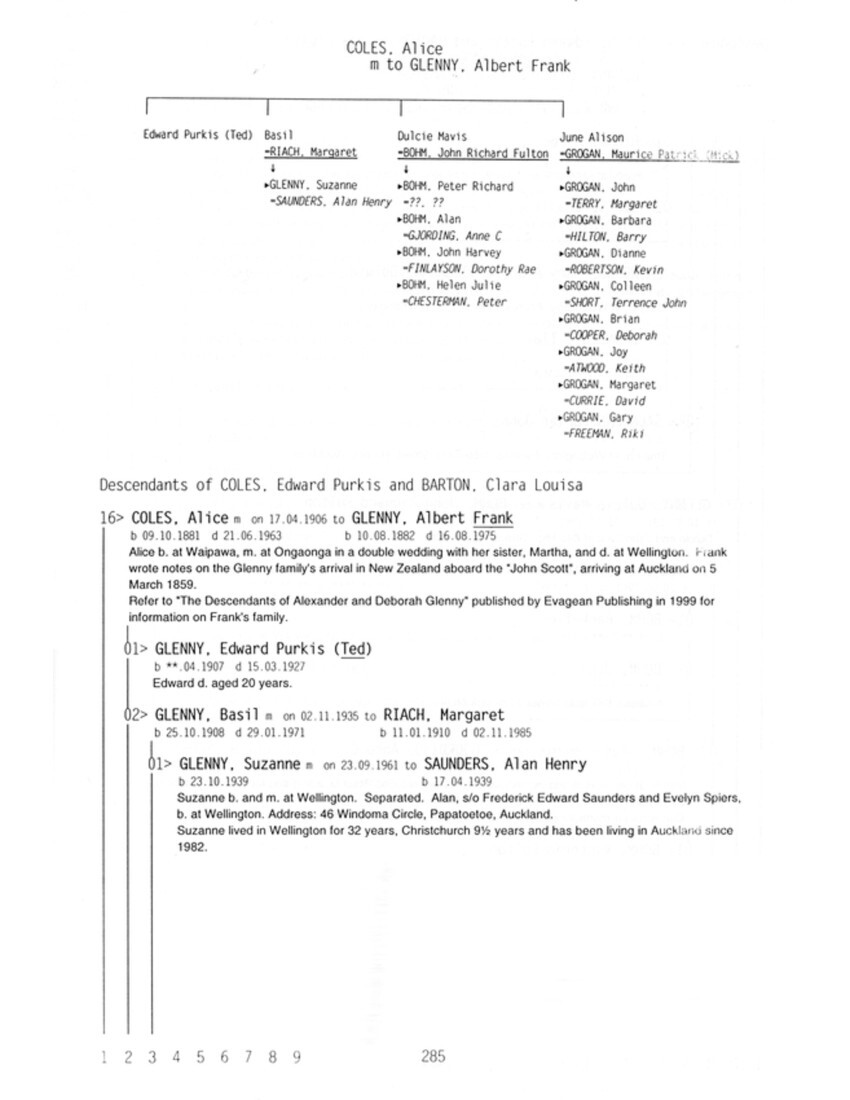
Page 286
Descendants of COLES, Edward Purkis and BARTON, Clara Louisa
COLES, Alice and GLENNY, Albert Frank
GLENNY, Basil and RIACH, Margaret
GLENNY, Suzanne and SAUNDERS, Alan Henry
SAUNDERS, Julia Ann and HICKS, Dean Vernon
[…]
03> GLENNY, Dulcie Mavis m to BOHM, John Richard Fulton
b 10.07.1912 d 15.10.1962 b 24.06.1909 d 15.12.1995
Dulcie and John lived at 645 High Street, Lower Hutt.
01> BOHM, Peter Richard m on **.**.**** to ??, ??
b 20.08.1940 d 16.07.1991
01> BOHM, Rachelle
b **.**.****
02> BOHM, John
b **.**.****
Address: 8 Gillean Street, Havelock North.
02> BOHM, Alan m on **.**.**** to GJORDING, Anne C
b 07.08.1942 b 30.08.1946
Alan b. at Lower Hutt and m. at Suva, Fiji. Anne, d/o Eric Peter Gjording and Mollie Joan Kitching, b. at Wellington. Address: PO Box 469, Masterton.
Alan is owner manager of Wagg and Harcombe in Dixon Street, Masterton.
[…]
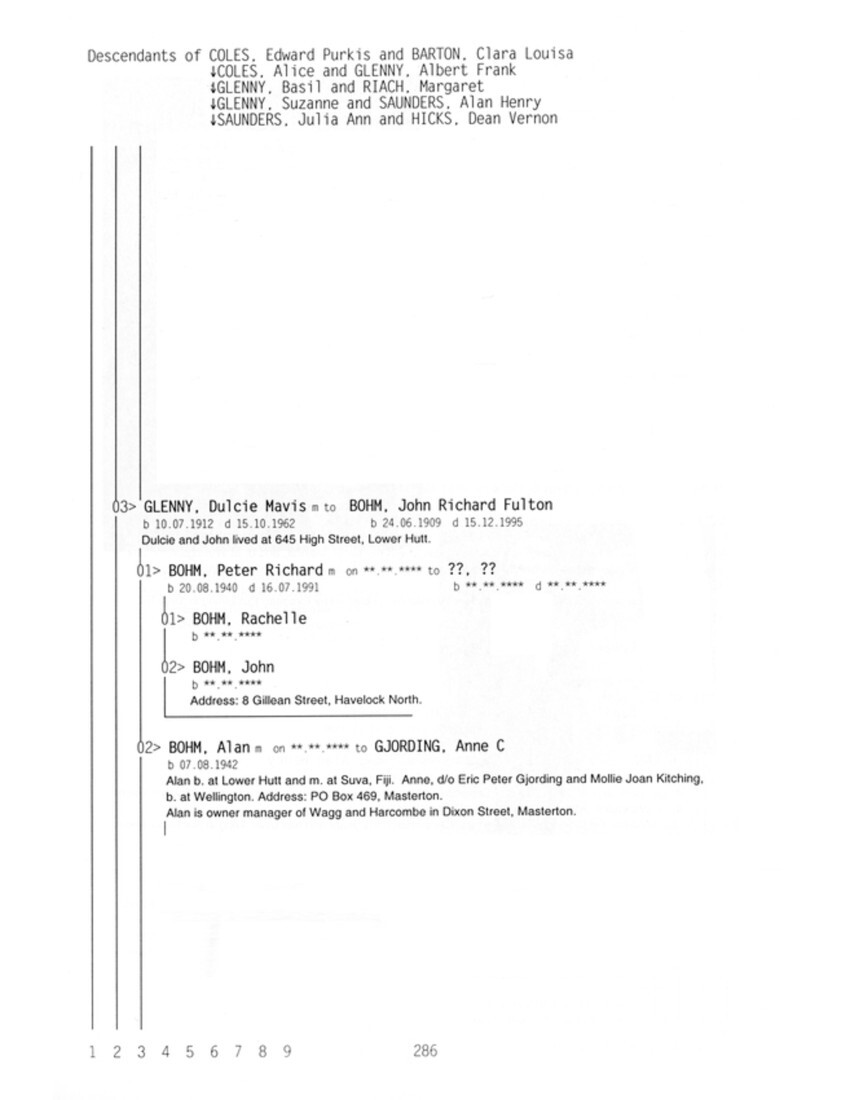
Page 288
Descendants of COLES, Edward Purkis and BARTON, Clara Louisa
COLES, Alice and GLENNY, Albert Frank
04> GLENNY, June Alison m on 19.12.1942 to GROGAN, Maurice Patrick (Mick)
b 22.06.1922 b 12.05.1919
June b. and m. at Hastings. Mick, s/o Maurice Grogan and Hilda Street, b. at Wanganui. Address: 27 Fitzroy Street, Papatoetoe.
June attended Parkvale Primary School and after one year at Hastings High School, went to Iona College in Havelock North as a boarder. On leaving after 3 years, she started hairdressing in Napier for the Maeder chain of shops, transferring to relieve at various branches, ending up in Wanganui where she met Maurice. They lived in Hastings for 12 months, before Mick moved to his father’s horse stud farm as manager at Buckland, Pukekohe. Mick and June later bought their own farm where they milked cows as well as growing vegetables, cropped extensively for the Packing Corporation for the USA Forces. During this time they raised their family of 8 and in 1967 they moved to 27 Fitzroy Street, Papatoetoe and have remained to this day.
June’s interests involve sport, playing tennis and badminton. In 1980 she commenced lawn bowls and still enjoys the game. She has 3 Auckland Centre Titles, and has won many club competitions. June is also a badged coach and has also served on committees and in the entertainment group. Mick was educated at Westmere Primary School and Wanganui Tech for 5 years, ending as house prefect and school councillor. He played rugby and 1st XVI for the last 3 years. He also made the rowing team and the athletic senior team. When he left, he worked for his father on his father’s horse stud farm. Mounted Rifles were about to be formed, and Mick was drafted to form the camps in Waiouru and Foxton. Some 1800 horses in each camp. Mick was drafted to the Veterinary Corps to study the course in Sydney University.
Camps were soon disbanded, and Mick was then drafted to attend to the care of the unwell horses. This was graded to Foxton Flats and lasted 2 years and on leave to Wanganui, he met June. He was then drafted to Tank Brigade Ordinance, Waiouru. He was dismissed from the Army on medical grounds. While Mick and June were farming, he started to make concrete blocks in his spare time, and later used these to build a 3 bedroomed house on the farm.
Mick played rugby for Hawke’s Bay Senior Representatives as well as Wellington and King Country Seniors. He took up lawn bowls and became the first President of the Auckland Greenkeepers Association, also President of his local bowling club and directed construction of several new clubs and their greens. He is called ‘Mick’ to distinguish him from his father, Maurice.
[…]
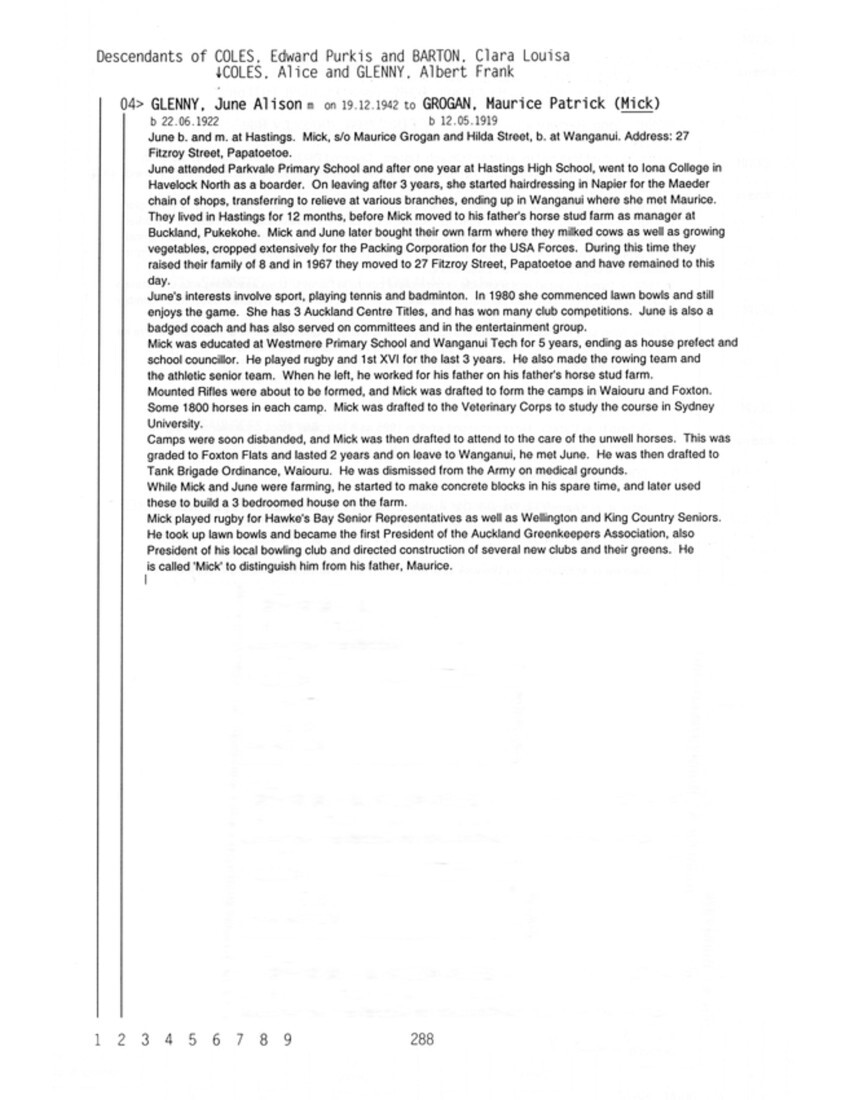
Page 291
Index of Names
??, ?? […] 177
m to BUCKNELL, Adrian John
??, ?? […] 244
m to COLES, Jillian Janine
??, ?? […] 253
m to WHYTE, Beth
??, ?? […] 286
m to BOHN, Peter Richard
??, Beryl Josephine […] 234
m to PARKER, Terence Raymond
??, Janet Margaret […] 168
m to THOMPSON, Peter Goodwin
??, Mavis […] 77
m to BUCKNELL, Michael Rowan
??, Monique Kerry […] 245
m to COLES, Brent Harley Willis
??, Robyn […] 178
m to WHIBLEY, Peter
ACHILLES, John Francis 26.09.1929 227
m to HARDY, Margaret Nora
ADAMS, Heather […] 212
m to COLES, Howard Harry
AINSWORTH, Kenneth Allan […] 245
m to COLES, Debra Joy
AINSWORTH, Luke Allan […] 245
ALEXANDER, Gregory Ross […] 275
ALEXANDER, Kevin Douglas […] 274
m to NICOL, Patricia Helen
ALEXANDER, Laura Grace […] 275
ALEXANDER, Sandra Leanne […] 275
ALEXANDER, Thomas […] 275
ALEXANDER, Timothy John […] 275
m to LAIRD, Adele
ALLEN, Granville (Greg) 19.07.1931 260
m to ROBERTSON, Shirley Kay
ALLEN, Gwendoline Roslyn […] 260
ALLEN, Judith Rae 20.04.1940 255
m to WHYTE, Terence Charles
ALLEN, Kaylie Jane […] 260
ANDERSON, Celia Irene Mary […] 252
m to MILNE, David Henry
ARLIDGE, Colin Trevor 06.03.1933 242
m to COLES, Rae Valerie
ARLIDGE, Dylan Heaton […] 243
ARLIDGE, Grant Colin […] 243
m to DALZIEL, Deanna
ARLIDGE, Greer […] 243
ARLIDGE, Hilton […] 243
ARLIDGE, Jackson Houston […] 242
ARLIDGE, Jacob Blair […] 243
ARLIDGE, Katrina Rae […] 243
m to (1) TODD, Lance
ARLIDGE, Katrina Rae […] 243
m to (2) LEPPER, William John
ARLIDGE, Lee Maurice […] 243
m to DILLON, Jeanette Elizabeth
ARLIDGE, Ryan Lee […] 243
ARLIDGE, Tomas Halford […] 242
m to HOUSTON, Sharon Gail
ASHTON, ?? […] 209
m to BISHOP, Sharon Anne
ASHTON, Sarah Louise […] 209
ASSEFI, Zhaaleh Susan […] 209
m to CLERKE, Jason Ronald
ATKINS, Bronwyn […] 250
m to MILNE, Bruce
ATKINS, Jack Colin Leonard […] 236
ATKINS, Rosie May […] 236
ATKINS, Steven […] 236
m to SIVITER, Lisa
ATWOOD, Keith […] 289
m to GROGAN, Joy
ATWOOD, Lauren […] 289
ATWOOD, Liam […] 289
BAGNALL, Julie Anne […] 169
m to THOMPSON, James Goodwin
BAILEY, Frederick William (Bill) […] 242
m to COLES, Kathleen
BALL, Patricia Mary 20.01.1933 171
m to QUIGLEY, Wilfred Irvine
BALLARD, ?? […] 221
m to STOREY, Nicola Kay
BARASSO, James Mark […] 194
BARASSO, Mark […] 194
m to KELLY, Shona Mary
BARKER, George […] 165
m to QUIGLEY, Cynthia Elaine
BARTON, Clara Louisa 05.12.1837 94
m to COLES, Edward Purkis
BASSETT, David John […] 252
m to MILNE, Mariese Ann
BASSETT, Kate Ann […] 252
BAYLIS, Anna Jane […] 179
BAYLIS, Justin […] 179
BAYLIS, Russell David […] 179
m to WHIBLEY, Lynette
BAYLIS, Stephen Daniel […] 179
BEETS, Eve […] 181
m to QUIGLEY, Terance
BELL, Stephen […] 261
m to SCHNELL, Kara
BELLERBY, Roger Graham 09.06.1928 180
m to QUIGLEY, Pamela Elaine
BENTON, Cora Cecilia 19.06.1894 172
m to QUIGLEY, Frank Martin
BEST, Alison Kathrine […] 197
m to KEEHAN, Michael Dominic
BEVERIDGE, Bridget Jane […] 216
BEVERIDGE, William […] 216
and McDERMOTT, Elizabeth Maye
BISHOP, Leagh Deborah […] 209
m to KING, ??
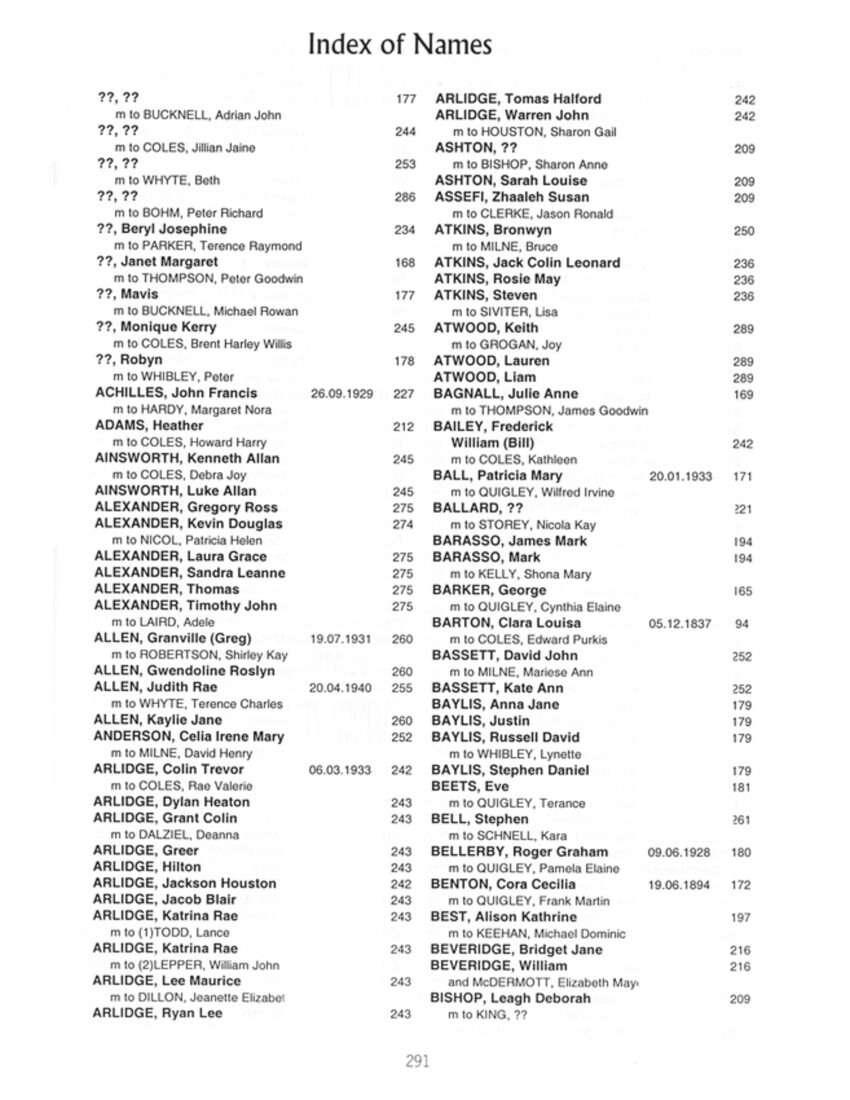
Page 292
BISHOP, Leigh […] 186
m to KING, Dennis Edward Randle
BISHOP, Sharon Anne […] 209
m to ASHTON, ??
BISHOP, William Henry Enos 19.09.1919 209
m to BRAYTON, Joan A
BOHM, Alan […] 286
m to GJORDING, Anne C
BOHM, Dennis Michael […] 287
BOHM, Helen Julie […] 287
m to CHESTERMAN, Peter
BOHM, Jamie David […] 287
BOHM, John […] 286
BOHM, John Harvey […] 287
m to FINLAYSON, Dorothy Rae
BOHM, John Richard Fulton 24.06.1909 286
m to GLENNY, Dulcie Mavis
BOHM, Matthew Alan […] 287
BOHM, Peter Richard 20.08.1940 286
m to ??, ??
BOHM, Rachelle […] 286
BOHM, Rebecca Jane […] 286
BOHM, Richard John […] 287
BOHM, Valerie Anne […] 287
BOHM, Victoria Fulton […] 286
BOOTH, Carole Anne […] 231
m to HARDY, Robert Maxwell
BOWDEN, Loretta […] 187
m to HOGG, David Quintin
BOYLE, Ann […] 217
m to HARDING, David
BRADY, Aaron […] 198
m to KEEHAN, Miriam Jane
BRANT, Ingrid Dorothee (Addy) 28.11.1942 223
m to COLES, Mark Anthony
BRAYTON, Betty 13.01.1921 208
m to MENDELSSOHN, Joseph Harold
BRAYTON, Joan A 05.07.1924 209
m to BISHOP, William Henry Enos
BRAYTON, Patricia 01.08.1922 208
m to MENDELSSOHN, Louis Gabriel
BRAYTON, Theo 18.11.1918 208
m to GRANT, John Bradford
BRAYTON, William Grindal 28.08.1890 208
m to LIVICK, Beryle
BRERETON, Kevin Phillip […] 279
m to STONE, Maureen Barton
BRERETON, Phillip Scott […] 279
BRETHERTON, Joseph
Bartholomew […] 198
m to COLES, Emma Lavinia (Vinnie)
BRETHERTON, Mary Margaret 29.06.1887 192
m to COLES, Edward William Perkis
BROCK, Marion Olga 29.07.1911 199
m to COLES, Vernon Francis
BRODIE, Margaret […] 80
m to COLES, Lyall Barton
BRUTON, Lillias Hamilton 09.05.1893 168
m to QUIGLEY, Irvine James
BUCKNELL, Adrian John […] 177
m to ??, ??
BUCKNELL, Colin Douglas 04.09.1928 177
m to QUIGLEY, Rona
BUCKNELL, Inekite […] 77
BUCKNELL, Michael Rowan […] 177
m to ??, Mavis
BUCKNELL, Raymond David […] 177
BUCKNELL, Sandy […] 177
m to CAMPKIN, ??
BUCKNELL, Te Aroha […] 177
BULL, Helen Margaret […] 167
m to QUIGLEY, Nicholas John Kenderdine
BULL, Ruby […] 253
m to WHYTE, Harry
BULLED, Carl Nathan […] 179
BULLED, Kim Shayna […] 180
BULLED, Michael David […] 179
BULLED, Ricky Aaron […] 179
BULLED, Ross James […] 179
m to WHIBLEY, Dianne Maree
BUTLER, Irene Faith […] 166
m to MILNE, Roderick Ian
BUTLER, Stephen Ross […] 174
m to WILLIAMS, Nicola Anne (Nicky)
BUTTLER, Brock Geoffrey […] 280
BUTTLER, Colin Laurence […] 280
m to DANIEL, Malissa Jane
BUTTLER, David Geoffrey […] 280
BUTTLER, Geoffrey Armigal 03.03.1940 279
m to STONE, Lesley Jean
BUTTLER, Jack Laurence […] 280
BUTTLER, Kaitlyn Jay […] 79
BUTTLER, Lynn Maree […] 280
BUTTLER, Michael John […] 279
m to PITKITHLY, Jenni Maree
CAMPBELL, Benjamin […] 114
CAMPBELL, Jane […] 114
CAMPBELL, Jane Mabel 04.04.1936 112
m to CUMMING, Alistair Craig
CAMPBELL, Margaret Louise **.**.1942 114
m to GASCOIGNE, David
CAMPBELL, Peter Frank 16.04.1937 114
m to DOOGUE, Winifred
CAMPKIN, ?? […] 177
m to BUCKNELL, Sandy
CANTLE, Adeline […] 95
m to COLES, George
CANTLE, Adeline 25.02.1872 241
m to COLES, George
CHAPMAN, Donna Marie […] 231
m to HARDY, Nicholas Anthony
CHARLTON, Alexandra
Jennifer (COOKE) […] 223
CHARTERS, Rosanna Maye 31.01.1900 213
m to COLES, Cecil Ernest
CHEER, Joyce 18.03.1919 212
m to COLES, Ian
CHESTERMAN, Julie […] 287
CHESTERMAN, Peter […] 287
m to BOHN, Helen Julie
CHESTERMAN, Stephen […] 287
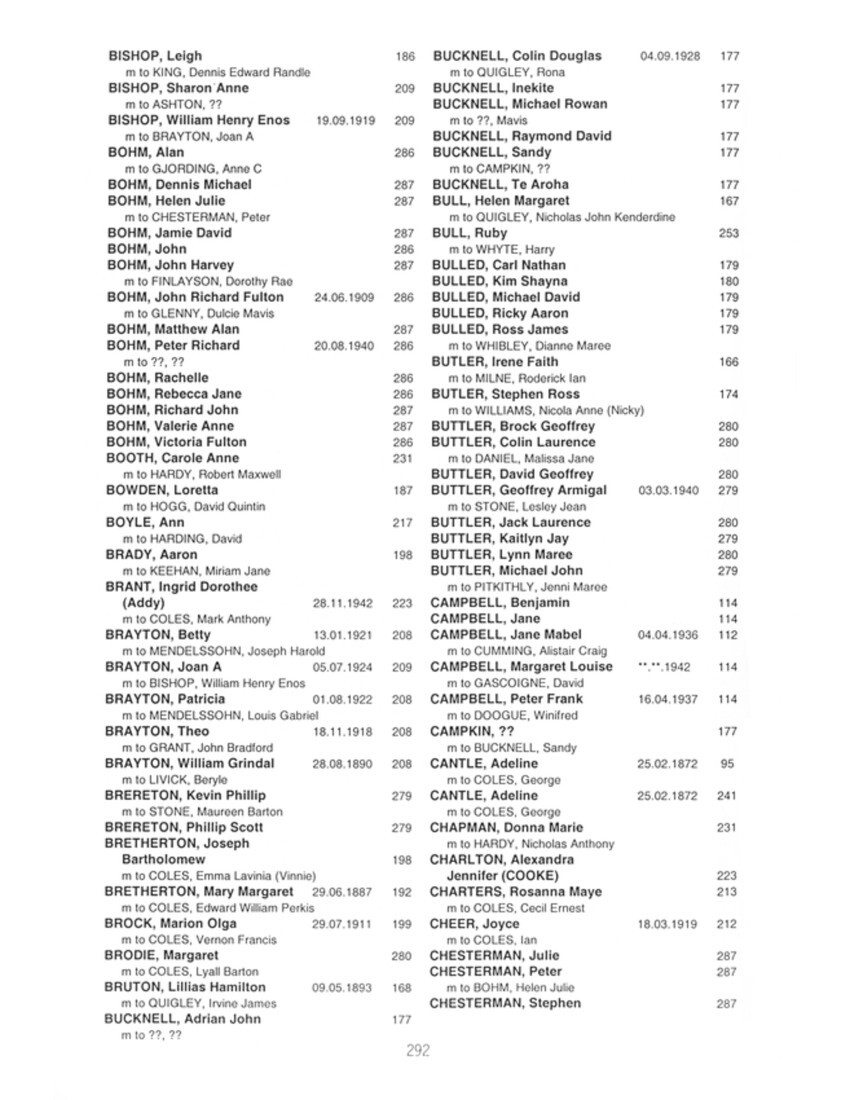
Page 293
CHIA, Susan […] 264
m to COLES, John Sidney
CHRYSTALL, Richard […] 254
m to WHYTE, Julia
CLARK, Arthur Charles **.10.1898 231
m to COLES, Olga
CLARK, David Charles 20.10.1930 232
m to (1) HALL, Margaret
CLARK, David Charles 20.10.1930 233
m to (2) MARTIN, Patricia Eileen
CLARK, Hemi William
Nicholas […] 232
CLARK, Janet Ann […] 232
CLARK, Kaye […] 232
m to QUINTAL, ??
CLARK, Michael Robin 09.08.1934 233
CLARK, Robert Michael […] 232
m to RIWAKA, Rawinea
CLARK, Sarah […] 181
m to QUIGLEY, Derek
CLAY, Chris […] 220
m to VERSEY, John
CLAY, Dave […] 220
m to JAGER, Christel
CLAY, Doreen […] 20
m to DELLAWAY, Ross
CLAY, Karen […] 220
m to JOHNSTON, Erroll
CLAY, Leendert 27.02.1928 219
m to MACFARLANE, Betty
CLAY, Margaret […] 220
m to WALLACE, Ken
CLENDON, Alhana Ruth […] 118
CLENDON, Ben Alfred […] 119
CLENDON, Daniel George […] 119
CLENDON, Diana Rose […] 118
and LYALL, John Leroy
CLENDON, Edward John […] 119
CLENDON, Fiona Margaret […] 118
m to (1) SMILLIE, Robert
CLENDON, Fiona Margaret […] 118
m to (2) SHERIDAN, Michael
CLENDON, Grace Barbara […] 118
CLENDON, James Douglas […] 119
CLENDON, Jeffery Ewan […] 118
m to WILLIAMSON, Barbara Mary
CLENDON, Julia Catherine […] 118
CLENDON, Kate Elizabeth […] 119
and TAYLOR, David Wayne
CLENDON, Nicholas Keith […] 119
CLERKE, Brayton Tyler […] 209
CLERKE, Jason Ronald […] 209
m to ASSEFI, Zhaaleh Susan
CLERKE, Ronald Archibald […] 208
m to MENDELSSOHN, Jill
CLERKE, Timothy James […] 209
CLIFF, Debra Anne […] 228
m to HARDY, Stephen John
COLES, Ada 07.02.1909 233
m to PARKER, Francis Raymond
COLES, Ada Barton 10.08.1860 94
m to KEMSLEY, George Vincent
COLES, Aimee Joy […] 218
COLES, Alice 09.10.1881 95
m to GLENNY, Albert Frank
COLES, Alice 09.10.1881 285
m to GLENNY, Albert Frank
COLES, Alicia Dianne […] 245
COLES, Alison Elizabeth […] 263
m to McGREGOR, Robin
COLES, Andrew Rawiri […] 200
COLES, Angela Mary […] 201
COLES, Anna Susan 15.07.1981 264
COLES, Annie Clara 12.03.1856 94
m to COMBS, Willis Edmund
COLES, Annie Clara 12.03.1856 97
m to COMBS, Willis Edmund
COLES, Anthony Paul Maurice (Tony) […] 245
COLES, Audrey Eleanor 09.08.1891 196
m to KEEHAN, Thomas James
COLES, Belinda Rosina […] 246
m to SMITH, Bruce Graeme
COLES, Brent Harley Willis […] 245
m to ??, Monique Kerry
COLES, Brian George 06.06.1931 243
m to MACDONALD, Merle Gwendolyn
COLES, Brian Robert […] 263
m to MARSH, Christine
COLES, Brian Tamaki […] 244
COLES, Bridgette Therese […] 201
m to WINCHESTER, Gavin
COLES, Bruce Barton 02.08.1920 266
m to HILDRETH, Peggy
COLES, Caroline Maritha […] 263
COLES, Cecil Ernest 13.06.1898 213
m to CHARTERS, Rosanna Maye
COLES, Cecil Royston 20.04.1934 218
m to (1) JOEL, Audrey Blanche
COLES, Cecil Royston 20.04.1934 219
m to (2) RADFORD, Lena Merina
COLES, Charles Robey 25.03.1867 95
m to THODSEN, Amalie Elizabeth (Emily)
COLES, Charles Robey 25.03.1867 211
m to THODSEN, Amalie Elizabeth (Emily)
COLES, Cherie Elaine […] 218
COLES, Cherie Robin 09.11.1943 223
m to COOKE, David Edwin
COLES, Chloe […] 262
COLES, Christina Marion […] 202
COLES, Clara Jane 11.12.1858 94
m to QUIGLEY, William James
COLES, Clara Jane 11.12.1858 162
m to QUIGLEY, William James
COLES, Colleen Terris 16.06.1932 217
m to HARDING, Ralph Taylor
COLES, Daisy […] 262
COLES, David Vernon 10.06.1942 199
m to ROGERS, Charlotte
COLES, Debra Joy […] 245
m to AINSWORTH, Kenneth Allan
COLES, Donald Royston […] 218
m to (1) GRANTHAM, Barbara Joy
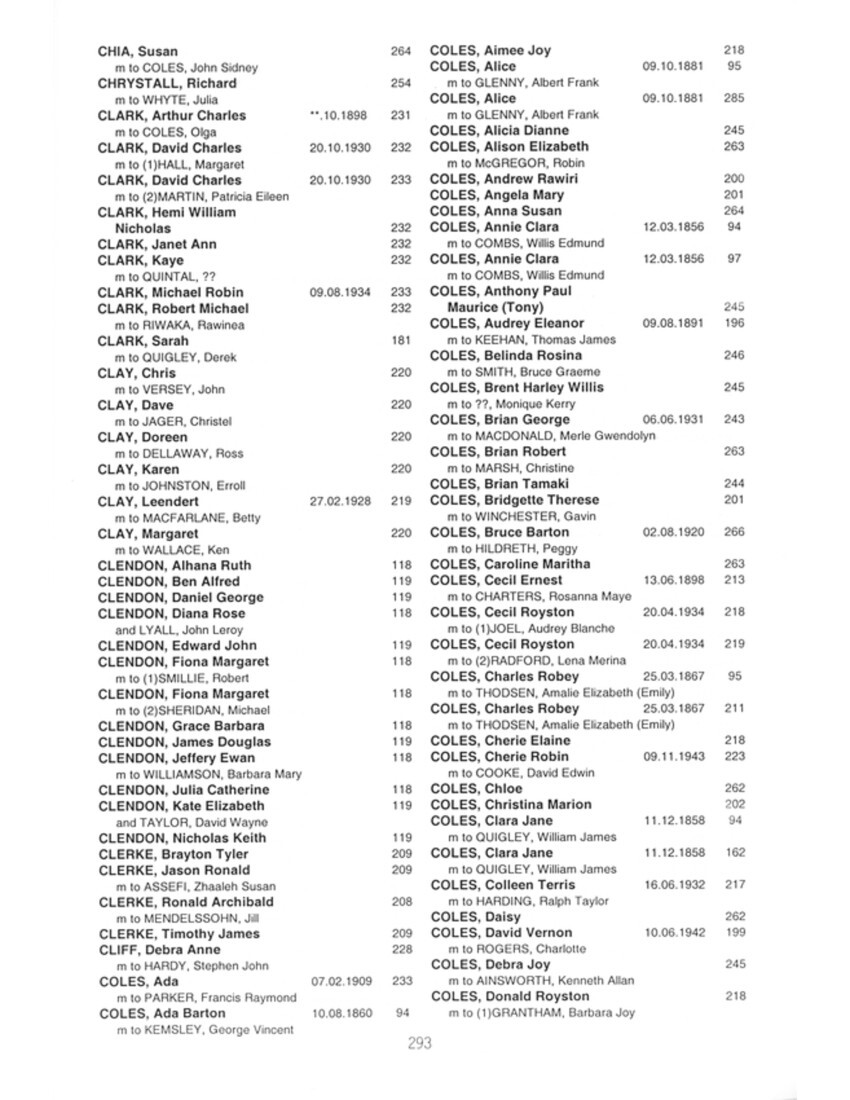
Page 294
COLES, Donald Royston […] 218
m to (2) JONES, Carol Elaine
COLES, Donald Royston […] 218
m to (3) KILPATRICK, Elizabeth
COLES, Dorothy Grace 03.12.1929 194
m to KELLY, Thomas Patrick
COLES, Dorothy Matilda **.**.1896 198
COLES, Douglas Leo […] 262
m to GOLDSTONE, Adrianne
COLES, Edith 06.11.1875 95
m to HURFIT, Jack
COLES, Edward Purkis 04.07.1830 94
m to BARTON, Clara Louisa
COLES, Edward William Perkis 22.09.1889 192
m to BRETHERTON, Mary Margaret
COLES, Ella Valerie 21.09.1909 272
m to NICOL, Alfred John
COLES, Emma Lavinia (Vinnie)
m to (1) BRETHERTON, Joseph Bartholomew
COLES, Emma Lavinia (Vinnie)
m to (2) McLAUGHLAN, Martin Norman
COLES, Ernest 17.06.1865 94
m to GRANT, Jessie
COLES, Frank Charles 01.12.1902 222
m to SIMPSON, Irene Mabel
COLES, Frederick Purkis 08.09.1877 95
m to VESTY, Alice
COLES, Frederick Purkis 08.09.1877 259
m to VESTY, Alice
COLES, George 30.05.1869 95
m to CANTLE, Adeline
COLES, George 30.05.1869 241
m to CANTLE, Adeline
COLES, Georgina […] 262
COLES, Gladys Mabel **.**.1896 198
COLES, Gladys Winifred Mabel **.**.1899 199
COLES, Gretta Patricia 05.04.1930 214
COLES, Guy Kenneth 19.06.1914 261
m to RYBURN, Daisy Lorraine
COLES, Harley Maurice 03.11.1933 244
m to (1) MEREDITH, Evelyn Joy
COLES, Harley Maurice 03.11.1933 246
m to (2) WILSON, Maureen
COLES, Henry […] 262
COLES, Howard Harry […] 212
m to (1) McKELVY, Susan
COLES, Howard Harry […] 212
m to (2) ADAMS, Heather
COLES, Ian 28.04.1924 212
m to CHEER, Joyce
COLES, Idelle […] 212
COLES, James Peter […] 212
and NUESTROSKY, Heather
COLES, James Russell **.**.1921 211
COLES, Janet 08.05.1932 222
m to KOENDERS, Antonius Johannes
COLES, Jesse […] 247
COLES, Jessie Mavis (Jaye) 26.05.1918 264
m to ROBERTSON, Andrew Douglas
COLES, Jillian Jaine […] 244
m to (1) ??,??
COLES, Jillian Jaine […] 244
and (2) MacDONALD, Bruce
COLES, Joanie Hinemarie Yuki […] 244
COLES, John Barton (Jack) 20.02.1896 211
m to SHEPHERD, Annie McGregor
COLES, John Sidney […] 264
m to CHIA, Susan
COLES, Josephine […] 262
COLES, Joshua Brent […] 45
COLES, Judith […] 261
m to SCHNELL, David
COLES, Julia 21.07.1857 94
COLES, Justine […] 266
m to TAPPER, Michael James Purcell
COLES, Kate Emily 14.09.1872 95
m to WHYTE, Harry James William Strachan
COLES, Kate Emily 14.09.1872 253
m to WHYTE, Harry James William Strachan
COLES, Kate Ingrid […] 224
m to WOTHERSPOON, Robert Malcolm
COLES, Kathleen 04.03.1902 242
m to BAILEY, Frederick William (Bill)
COLES, Kiri Rebecca […] 264
COLES, Lily Grace […] 224
COLES, Louisa 05.10.1863 94
m to LIVICK, William Dixon
COLES, Louisa 05.10.1863 208
m to LIVICK, William Dixon
COLES, Lyall Barton […] 280
m to BRODIE, Margaret
COLES, Madge **.**.1910 276
COLES, Marianne May […] 212
m to JARVIE, Murray James
COLES, Marise Kay […] 247
m to SPEAR, Steven Wayne
COLES, Mark Anthony […] 223
m to BRANT, Ingrid Dorothee (Addy)
COLES, Martha Emma 24.05.1874 95
m to RUSSELL, Robert
COLES, Mary Barton 19.08.1912 279
m to STONE, William Henry
COLES, Mary Evelyn
Charters (Effie) 30.12.1924 213
m to CUMMING, James Alexander
COLES, Mary Jane 24.01.1871 95
m to MILNE, Henry
COLES, Mary Jane 24.01.1871 250
m to MILNE, Henry
COLES, Mary Margaret 11.03.1927 192
m to HARTING, Ivan Ronald
COLES, Maurice 23.05.1908 242
m to COSSAR, Vera
COLES, Meta Honora **.**.1901 199
COLES, Michael John […] 247
m to SCOTT, Yvonne
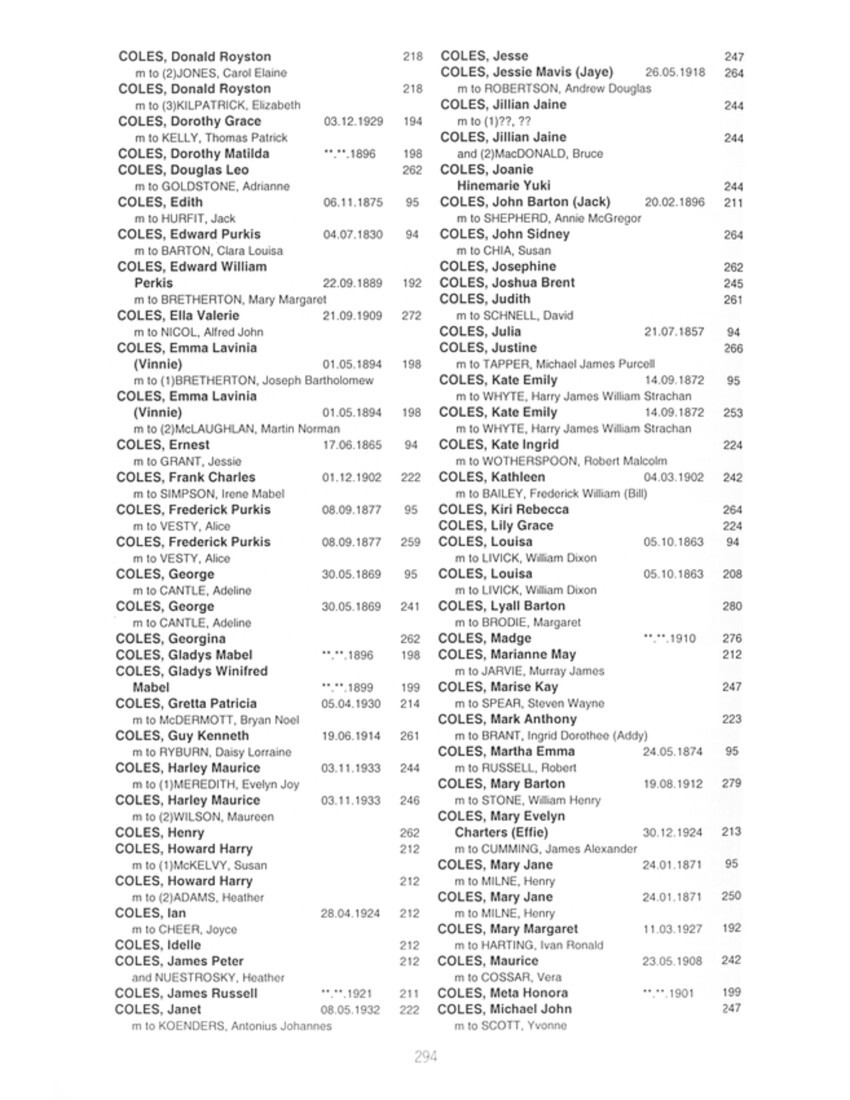
Page 295
COLES, Michael Manoa […] 263
COLES, Michelle Anne […] 201
COLES, Mona 16.10.1989 219
m to MACFARLANE, Leslie Mace
COLES, Murray Lyall […] 280
COLES, Nancy Ann […] 224
m to McPHERSON, David Ian
COLES, Nancy Gwendoline 14.06.1912 259
m to ROBERTSON, George Alexander
COLES, Neale Jay […] 247
COLES, Nicola Susan […] 246
m to ISSA, Norman
COLES, Nora 14.11.1904 224
m to HARDY, John Laurence
COLES, Olga 11.06.1907 231
m to CLARK, Arthur Charles
COLES, Patricia Anne […] 244
m to PARKES, Robert Bruce
COLES, Peter Barton […] 267
m to SMEATH, Rosemary Jane
COLES, Peter William […] 200
m to WALSHE, Teresa Mary
COLES, Phillis Barton 07.02.1911 276
m to HARKNESS, William Leslie
COLES, Rachelle Anne […] 200
COLES, Rae Valerie 27.09.1929 242
m to ARLIDGE, Colin Trevor
COLES, Richard […] 262
m to LUSK, Marilyn
COLES, Roger Neale 18.09.1937 246
m to NICHOLS, Rosina Gwendoline
COLES, Ruth Clara 22.09.1889 195
COLES, Sally-Anne […] 244
m to STEPHENS, Brian
COLES, Samuel Arthur 24.06.1880 95
m to VESTY, Margaret
COLES, Samuel Arthur 24.06.1880 272
m to VESTY, Margaret
COLES, Samuel Lee […] 267
COLES, Sandra Joanne […] 245
m to TREACHER, Brent Robert
COLES, Sarah Barbara Maye […] 218
COLES, Sean […] 247
COLES, Sean William […] 267
COLES, Shelley Anne […] 246
m to SAUNDERS, Mark
COLES, Shirley Lana […] 224
COLES, Sidney Purkis 12.02.1916 262
m to DARROCH, Karine Marjorie
COLES, Theresa […] 212
m to RILEY, Carl
COLES, Tracy Marie […] 247
COLES, Valerie Rosanna […] 219
m to JAMES, David Warwick
COLES, Vanessa Audrey […] 219
m to REYNOLDS, Craig
COLES, Vernon Francis 29.08.1903 199
m to BROCK, Marion Olga
COLES, Wayne […] 247
m to SKEWS, Deidre
COLES, William Edward 11.04.1862 94
m to O’NEIL, Minnie Frances
COLES, William Edward 11.04.1862 192
m to O’NEIL, Minnie Frances.
COLES, William Maurice […] 244
m to REHU, Ana TeRira
COLES, Yvonne Shirley […] 2212
COMBS, ?? […] 115
COMBS, Akuhata Charles
Raymond Nikau […] 128
m to (1) PYE, Brenda
COMBS, Akuhata Charles
Raymond Nikau […] 128
m to (2) McCLEAN, Anisa
COMBS, Alison
m to (1) MARSHALL, David Ashmead
COMBS, Alison […] 06
m to (2) RAYNHAM, Charles (Viscount)
COMBS, Annette Sandra […] 98
and HASSELL, Andrew Paul
COMBS, Aragorn […] 102
COMBS, Barbara Faith 20.04.1920 109
m to MARSHALL, George James Stewart Ogilvy Latta
COMBS, Barbara Willis […] 121
m to DAVIES, John Llewellen
COMBS, Benjamin John […] 99
COMBS, Carlos Thorvald […] 129
COMBS, Carmille Gretel […] 131
m to SHAFFER, Raymond Joseph
COMBS, Cathryn Ann […] 21
COMBS, Charles Michael […] 129
COMBS, Charles Thomson 27.04.1912 115
m to ANDERSON, Margaret Aileen deLancy
COMBS, Cherie […] 128
COMBS, Christine Martin […] 125
m to HEALY, Jeffrey Raymond
COMBS, Clare Patricia Delancy […] 122
m to SMITH, David Rangihoua
COMBS, David […] 115
m to ??, Jenny
COMBS, David James […] 121
COMBS, Edward Charles P 06.06.1912 98
m to FLEMING, Clara
COMBS, Elizabeth Gwendolyn […] 101
m to PUDDLE, Ian Churchill
COMBS, Elizabeth Jane […] 120
m to RYAN, Nigel Graham
COMBS, Elizabeth Thomson (Betty) **.06.1919 131
m to KENNEDY, Phipps
COMBS, Emma Caitlin […] 99
COMBS, Ezra John […] 129
m to EVERSON, Merle
COMBS, Florence Marjory (Molly) 11.02.1918 106
COMBS, Frank Livingston 19.07.1882 111
m to THOMSON, Louise Florence Leys
COMBS, Frank Spence 13.05.1916 130
m to MURRAY, Hazel
COMBS, Harry Ernest 14.01.1881 107
m to WEBSTER, Ethel Bessie
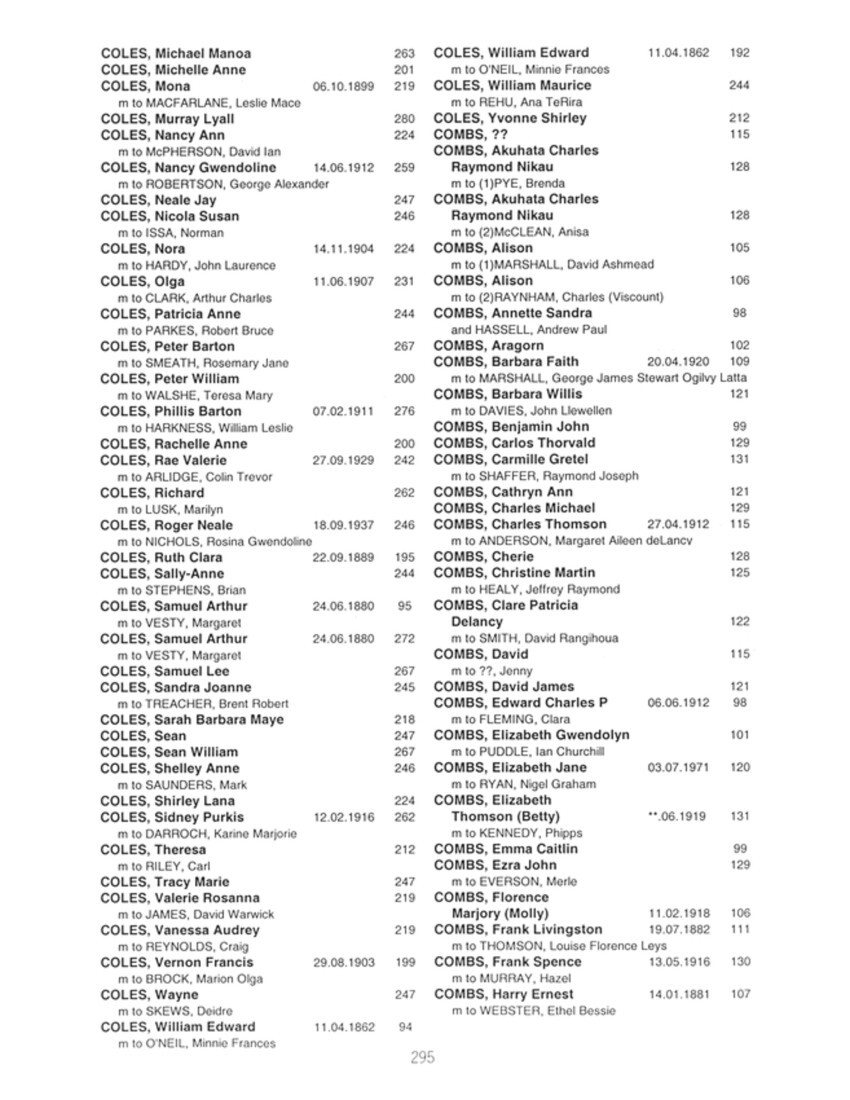
Page 296
COMBS, Hayden […] 102
COMBS, Hazel Elvia Athena […] 129
COMBS, Helen Kathleen 06.11.1940 99
m to McGREGOR, John Morison
COMBS, Irvine Hanby (Ike) 14.04.1914 102
m to HOULKER, Audrey Marie
COMBS, Janet Barbara 18.02.1943 102
m to (1) PIGOTT, James Francis Gillery
COMBS, Janet Barbara 18.02.1943 104
m to (2) SKUBLICS de VELIKE et de BESENYO, Ernest
COMBS, Jean Livingston **.**.1909 115
m to BUCKLEY, Desmond
COMBS, Joan Dorothy 05.01.1911 107
m to STEVENS, John Reginald (Jack)
COMBS, John Augustine Christopher […] 128
m to BARWICK, Marilyn Suzanne
COMBS, John Douglas […] 102
m to ??, Dawn
COMBS, Jonathan […] 129
COMBS, Joseph Thomson 24.11.1917 131
COMBS, Joshua Blair Lloyd […] 120
COMBS, Juliet Linda […] 130
m to ??, ??
COMBS, Justin […] 122
COMBS, Katrina Maree […] 99
COMBS, Krystal-Lee […] 128
COMBS, Llewellyn Moana […] 129
COMBS, Louise […] 115
COMBS, Louise Annie (Nancy) 13.09.1908 112
m to CAMPBELL, Arnold Everitt
COMBS, Marjory Ethel 31.08.1909 107
COMBS, Martin […] 122
m to ??, Heidi
COMBS, Mary Louise Lavery 08.09.1938 116
m to THORNBURY, Robert Ernest
COMBS, Michael Frank Thomson 20.04.1942 119
m to LIVINGSTONE, Penelope Jane
COMBS, Miriam Louise Raphael […] 129
COMBS, Natasha […] 122
COMBS, Nathaniel David Francis […] 129
COMBS, Olan Cerridywn […] 129
COMBS, Patrick John 16.05.1939 98
m to RATCLIFFE, Marilyn May
COMBS, Philip Gordon Joseph […] 130
m to JIMENEZ, Ruth
COMBS, Rachel Marie […] 102
COMBS, Richard […] 115
m to ??, Leah
COMBS, Robert Charles Spence […] 122
m to PAGE, Sherridan
COMBS, Ross Neil […] 99
m to MacKINNON, Karen Ann
COMBS, Sally Margaret […] 121
COMBS, Samuel […] 126
m to BRAITHWAITE, Pennie
COMBS, Samuel Michael Thornton […] 120
COMBS, Sara […] 115
COMBS, Selena Rachel Ishmaeleth […] 129
COMBS, Sheila Margaret Thomson 19.05.1940 117
m to CLENDON, Ewen Keith
COMBS, Stephen John […] 99
and BLATCH, Kiley Ann
COMBS, Tania Alison […] 99
m to SHAW, Wayne Lendon
COMBS, Timothy Michael Blair […] 120
COMBS, Vivien Mary […] 101
m to CRANE, Trevor John
COMBS, Wendy […] 115
m to ??,??
COMBS, Willis Edmund 10.09.1845 94
m to COLES, Annie Clara
COMBS, Willis Ide 22.11.1879 97
m to QUIGLEY, Ada Mary
COMBS, Willis Ide 14.01.1914 102
COMBS, Willis Ide 22.11.1879 165
m to QUIGLEY, Ada Mary
COMBS, Willis Ide (Bill) 06.05.1916 103
m to WILLIS, Grace
COMBS, Willis Livingston **.**.1911 115
m to ??, Gladys
COOKE, David Edwin 20.09.1943 223
m to COLES, Cherie Robin
COOKE, Jonathan Trevor […] 223
COOKE, Rachael Mary […] 223
COOKE, Samuel James […] 223
m to NEWTON, Helen
COOKE, Timothy David […] 223
COOPER, Deborah […] 289
m to GROGAN, Brian
COSSAR, Vera 01.03.1909 242
m to COLES, Maurice
COULAM, Ivan Roy
m to QUIGLEY, Barbara Muriel
CRANE, Jenny Maree […] 102
CRANE, Michael John […] 101
CRANE, Peter Raymond […] 102
CRANE, Steven Trevor […] 02
CROOKS, David Low **.**.1904 186
m to QUIGLEY, Olive Phillis
CROOKS, Margaret Learmont 07.02.1926 186
m to HOGG, John Quintin
CUMMING, Alyson Brenda […] 214
m to KING, Peter
CUMMING, Benjamin Joseph […] 113
CUMMING, Daniel John […] 113
CUMMING, David Arnold […] 113
m to MACFARLANE, Colleen
CUMMING, Heather Lorraine […] 214
CUMMING, Jacqueline Melanie […] 214
CUMMING, James Alexander 13.03.1924 214
m to COLES, Mary Evelyn Charters (Effie)
CUMMING, John Eric […] 113
m to BRUNNING, Derryn Rosene
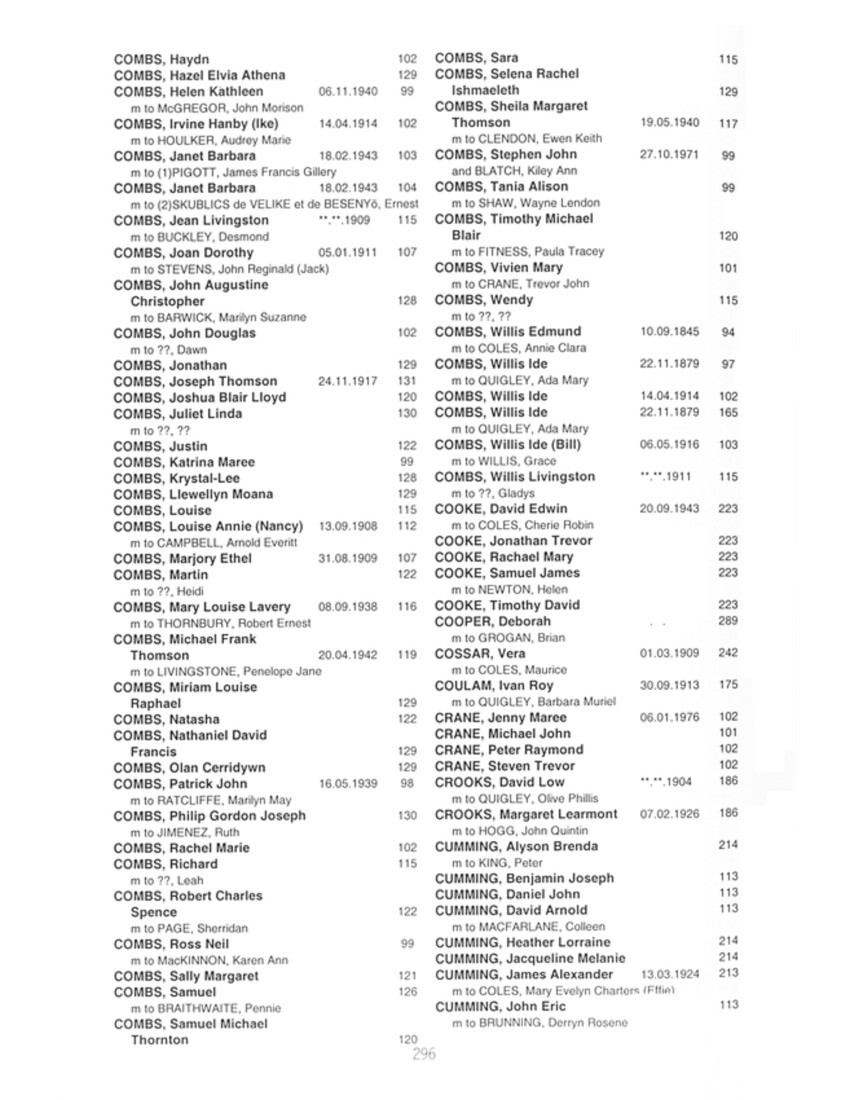
Page 297
CUMMING, Michael Peter […] 113
and DORNE, Andrea
CUMMING, Moira Jean […] 113
CUMMING, Ruth Louise […] 114
m to WILD, Neville
CUMMING, Sandra Dianne […] 214
m to EMMS, Donald Francis
CURRIE, David […] 289
m to GROGAN, Margaret
CURTIS, Ellen […] 176
m to QUIGLEY, Athol Andrew (Attila)
DALZIEL, Deanna […] 243
m to ARLIDGE, Grant Colin
DANIEL, Malissa Jane […] 280
m to BUTTLER, Colin Laurence
DARROCH, Karine Marjorie 23.07.1914 262
m to COLES, Sidney Purkis
DAVENPORT, Ashleigh Jane […] 227
DAVENPORT, James Bruce […] 227
m to JOSLING, Wendy Anne
DAVIES, Anthony […] 122
and COCKBURN, Joe
DAVIES, Mary Joy 26.07.1932 228
m to HARDY, Charles George
DAVIES, Matthew Laurie Comb […] 22
DAVIES, Thomas Charles John […] 121
and KEALL, Sue
DAVIS, Jillian Louise […] 186
m to KING, Dennis Edward Randle
DELANY, Charlotte Ruby King […] 184
DELANY, Finn Patrick King […] 184
DELANY, Mack John King […] 184
DELANY, Stephen […] 183
m to KING, Joanna Margaret
DELLAWAY, Ross […] 220
m to CLAY, Doreen
DEW, David […] 183
m to KING, Elizabeth Mary
DEW, Hannah Mary […] 183
DEW, Phillippa Jane […] 183
DIB, Jaoa […] 185
m to REDGRAVE, Anne Caroline
DIB, Miguel James […] 185
DIB, Olivia Maria […] 185
DIB, Sarah Francisca […] 185
DIB, Tomas […] 185
DICK, Alistair Maxwell […] 251
m to MILNE, Margaret Constance
DICK, Jonathon Maxwell […] 251
DICK, Simon James […] 251
DILLON, Jeanette Elizabeth […] 243
m to ARLIDGE, Lee Maurice
DIXON, Anna Joy […] 228
DIXON Matthew Allan […] 228
DIXON, Roger Allan […] 228
DORNE-CUMMING, William […] 113
DUMBLETON, Alastair […] 261
m to ROBERTSON, Raewyn Helen
DUMBLETON, Jane Alice […] 261
DUMBLETON, Robert Jack […] 261
ELDRED, Gregory […] 233
m to PARKER, Jillian
ELDRED, Lincoln […] 234
ELDRED, Simon […] 234
ELDRED, Trudy […] 234
EMMS, Donald Francis […] 214
m to CUMMING, Sandra Dianne
EVANS, ?? […] 226
m to HOOKHAM, Kay Margret
EVANS, Maree Elena […] 215
m to McDERMOTT, John Bryan
EVEREST, Mary 12.12.1912 251
m to MILNE, Ernest
FARLEY, ?? […] 176
m to QUIGLEY, Nola Elizabeth
FINLAYSON, Dorothy Rae […] 287
m to BOHM, John Harvey
FLETCHER, Sarie Jennifer (Niki) […] 196
m to KEEHAN, Christopher Michael
FREEMAN, Riki […] 289
m to GROGAN, Gary
GARDEN, Ashleigh Claire […] 221
GARDEN, Gina Michelle […] 221
GARDEN, Patrick James […] 221
GARDEN, Phillip […] 221
m to MACFARLANE, Kay Barbara
GASCOIGNE, Joanna […] 114
GASCOIGNE, Timothy […] 114
GEE, Kevin […] 236
m to HELM, Deborah Judith
GEE, Rochelle […] 236
GILLETTE, Amanda Cherie […] 209
GILLETTE, Brayton Kenneth […] 209
GILLETTE, Kenneth Maxwell […] 209
m to MENDELSSOHN, Elizabeth
GJORDING, Anne C […] 286
m to BOHM, Alan
GLAZEBROOK, Nora 12.02.1900 253
m to WHYTE, Ernest Robert
GLENNY, Albert Frank 10.08.1882 95
m to COLES, Alice
GLENNY, Albert Frank 10.08.1882 285
m to COLES, Alice
GLENNY, Basil 25.10.1908 285
m to RIACH, Margaret
GLENNY, Dulcie Mavis 10.07.1912 286
m to BOHM, John Richard Fulton
GLENNY, Edward Purkis (Ted) **.04.1907 285
GLENNY, June Alison 22.06.1922 288
m to GROGAN, Maurice Patrick (Mick)
GLENNY, Suzanne 23.10.1939 285
m to SAUNDERS, Alan Henry
GOLDSTONE, Adrianne […] 262
m to COLES, Douglas Leo
GOMMERS, Benjamin […] 216
GOMMERS, Eugene J […] 215
m to McDERMOTT, Anne Patricia
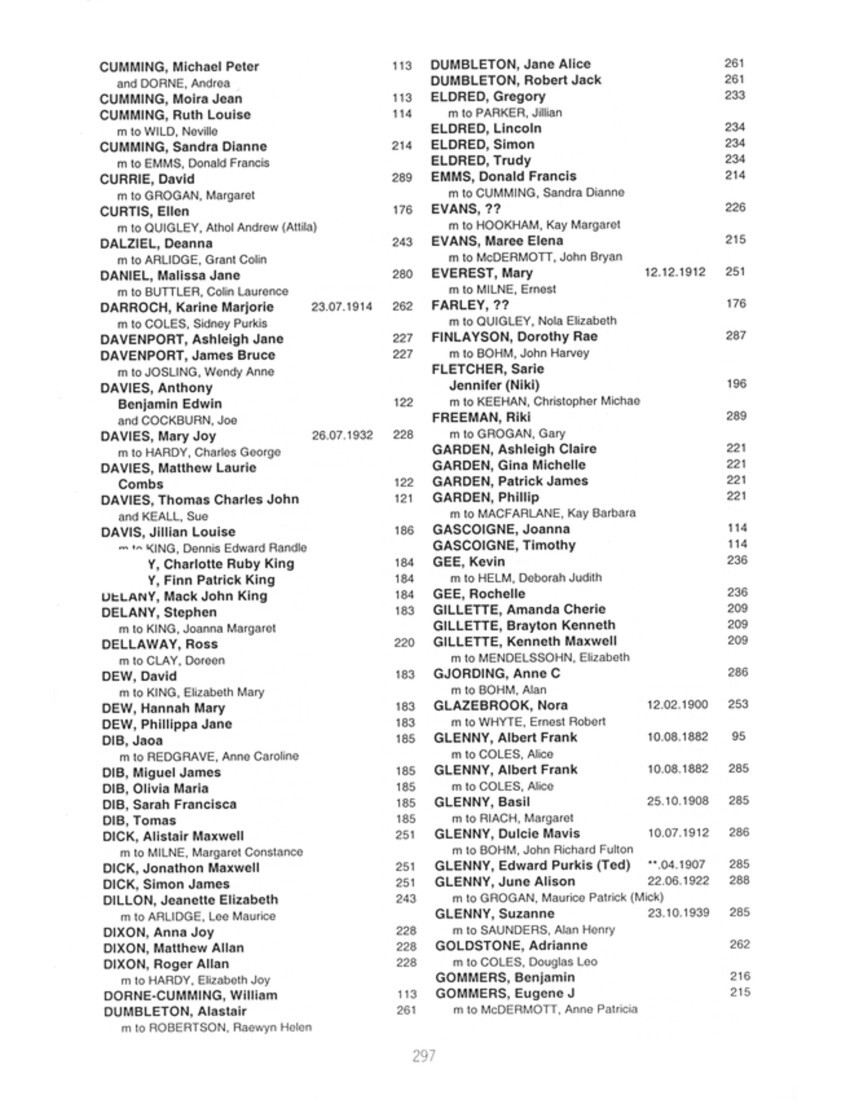
Page 298
GOMMERS, Gabrielle […] 216
GOMMERS, Isaac […] 216
GOMMERS, Jessica […] 216
GOMMERS, Samuel […] 216
GOODMON, Daniel John […] 100
GOSLING, Dorothy […] 196
m to KEEHAN, William Patrick
GRACE, Lewis Newton […] 195
GRACE, Newton […] 195
m to KELLY, Yvonne Margaret
GRACE, Todd Patrick […] 195
GRANT, Caroline […] 208
m to HEATH, Graham
GRANT, Jessie […] 94
m to COLES, Ernest
GRANT, John Bradford 15.07.1917 208
m to BRAYTON, Theo
GRANTHAM, Barbara Joy […] 218
m to COLES, Donald Royston
GRAY, Abigail Lucy Anne Grace […] 104
GREGORY, Kevin Leslie […] 226
m to HOOKHAM, Pauline Nora
GRIEVE, Leonard Robert 14.05.1925 177
m to QUIGLEY, Rona
GROGAN, Amber […] 289
GROGAN, Andrew […] 288
GROGAN, Autumn […] 289
GROGAN, Barbara […] 288
m to HILTON, Barry
GROGAN, Brian […] 289
m to COOPER, Deborah
GROGAN, Colleen […] 289
m to SHORT, Terrence John
GROGAN, Corey […] 290
GROGAN, Dianne […] 289
m to ROBERTSON, Kevin
GROGAN, Gary […] 289
m to FREEMAN, Riki
GROGAN, Gina […] 289
GROGAN, Hayley […] 288
GROGAN, John […] 288
m to TERRY, Margaret
GROGAN, Joy […] 289
m to ATWOOD, Keith
GROGAN, Margaret […] 289
m to CURRIE, David
GROGAN, Maurice Patrick (Mick) 12.05.1919 288
m to GLENNY, June Alison
GUILFORD, Christopher Raymond Tracey […] 235
m to (1) PATTERSON, Rosalind Louise
GUILFORD, Christopher
Raymond Tracey […] 235
m to (2) PELL, Joanne Doreen
GUILFORD, Gemma Frances […] 235
GUILFORD, Joseph Tracey […] 235
GUILFORD, Judith Donna […] 234
m to RENDLE, Graeme Irwin
GUILFORD, Michael David […] 235
and LILEY, Rachelle
GUILFORD, Owen Tracey 18.09.1929 234
m to PARKER, Catherine Gaynor
GUILFORD, Tasenka Leigh […] 235
HALL, Margaret 22.07.1932 232
m to CLARK, David Charles
HAMILTON, Irene […] 233
m to PARKER, Terence Raymond
HANDCOCK, Pauline […] 228
m to HARDY, John Searight
HARDING, David […] 217
m to BOYLE, Ann
HARDING, Dawn […] 217
HARDING, Gaye […] 217
HARDING, Glen […] 217
HARDING, Ian […] 217
m to ROSS, Judi
HARDING, Joy […] 217
HARDING, Nicholas […] 217
HARDING, Ralph Taylor 26.04.1928 217
m to COLES, Colleen Terris
HARDING, Victoria […] 217
HARDY, Alan Grant […] 229
m to NEBAUER, Janelle Ann
HARDY, Andrew Laurence […] 230
m to WASHINGTON, Kate Rebecca
HARDY, Caroline Marie […] 231
HARDY, Charles George 17.08.1931 228
m to DAVIES, Mary Joy
HARDY, Christopher John […] 230
HARDY, David James […] 230
HARDY, Elizabeth Anne 18.07.1927 225
m to (1) HOOKHAM, Frederick James
HARDY, Elizabeth Anne 18.07.1927 226
m to (2) STEWART, Ross
HARDY, Elizabeth Grace […] 230
HARDY, Elizabeth Joy […] 228
m to DIXON, Roger Allan
HARDY, Ella Rose […] 231
HARDY, Frances Catherine […] 229
HARDY, Grant Maxwell […] 231
HARDY, Joanna Leigh […] 229
HARDY, Joanna Mary Cecelia […] 228
m to RUSSELL, Andrew Wakefield
HARDY, John Laurence 17.06.1895 224
m to COLES, Nora
HARDY, John Searight 05.07.1993 228
m to (1) HANDCOCK, Pauline
HARDY, John Searight 05.07.1993 230
m to (2) MANNING, Maxine
HARDY, Jordan Isabelle […] 231
HARDY, Joseph Michael […] 229
HARDY, Kade Alexander […] 231
HARDY, Kenneth Niall Alan 18.01.1937 230
m to LEATHEM, Janice Marie
HARDY, Liam Thomas […] 231
HARDY, Margaret Nora 18.10.1928 226
m to (1) JOSLING, John Ross
HARDY, Margaret Nora 18.10.1928 227
m to (2) ACHILLES, John Francis
HARDY, Matthew James […] 230
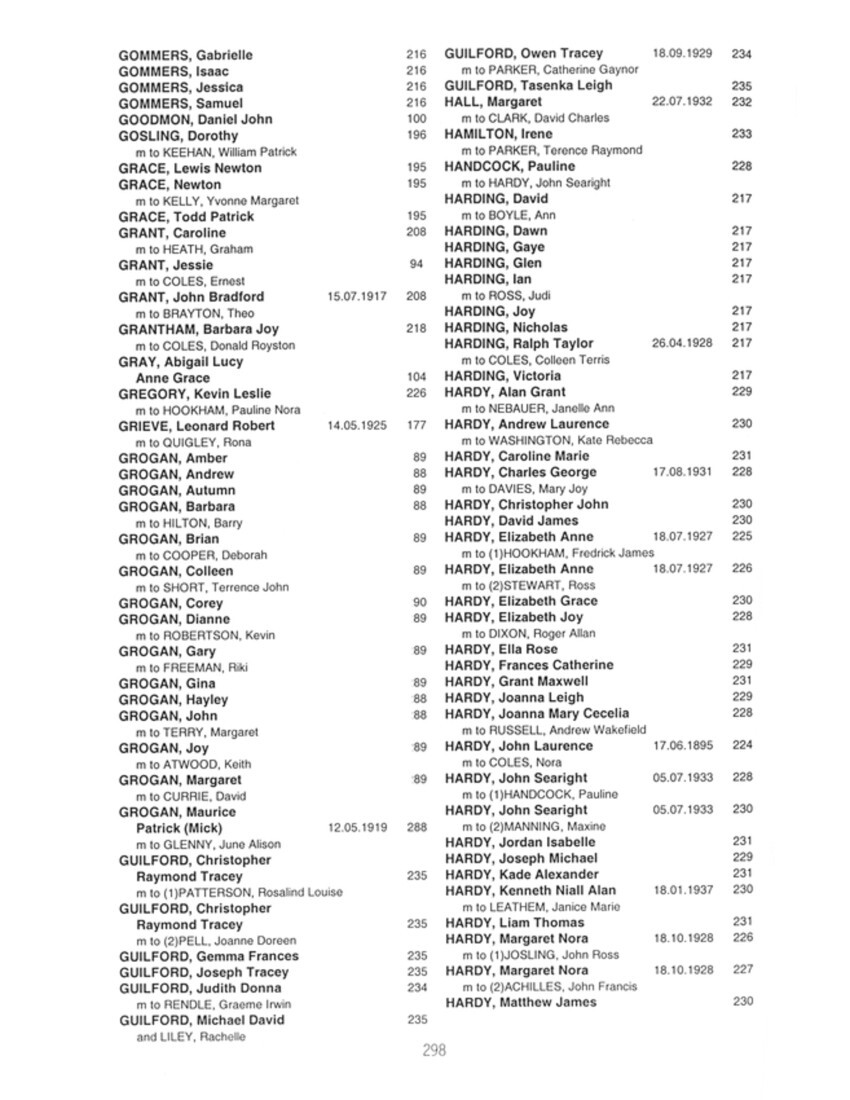
Page 299
HARDY, Max Peter […] 231
HARDY, Michael John […] 230
HARDY, Nicholas Anthony […] 231
m to CHAPMAN, Donna Marie
HARDY, Philippa Ann […] 228
m to VAN BLOMMESTEIN, John
HARDY, Raymond Robert […] 231
and THOMPSON, Tessa
HARDY, Richard Kenneth […] 231
HARDY, Robert Maxwell 08.03.1943 231
m to BOOTH, Carole Anne
HARDY, Samantha Joy […] 229
HARDY, Simon Desmond […] 230
m to MOORE, Catherine Anne
HARDY, Stephen John […] 228
m to CLIFF, Debra Anne
HARKNESS, Blair Murray […] 278
HARKNESS, Bruce McGregor 10.04.1939 276
m to MITCHELL, Janet
HARKNESS, Erica Jane […] 278
HARKNESS, Gordon John […] 277
m to MAGNUSSON, Nicola Anne
HARKNESS, Graeme Roger […] 277
m to (1) HOBART, Marilyn Elizabeth
HARKNESS, Graeme Roger […] 277
m to (2) MATHIESON, Anne Marie
HARKNESS, Ian Ranwick […] 277
HARKNESS, John Murray […] 278
m to SMITH, Lynn Marie
HARKNESS, Leslie Anne 05.11.1943 277
HARKNESS, Robert Bruce […] 277
HARKNESS, Shona Lesley […] 277
m to (1) LYNESS, Ian
HARKNESS, Shona Lesley […] 277
m to (2) POPPE, Malcolm
HARKNESS, William Leslie **.**.1908 276
m to COLES, Phillis Barton
HARRIS, Angela 12.02.1974 175
m to Williams, Richard John
HARRIS, Peter […] 221
m to MACFARLANE, Heather Joy
HARRISON, Beau-Harley Rawiri Hone […] 123
HARTING, Amanda Clair […] 193
HARTING, Anthony Edward […] 192
m to (1) WESTON, Donna
HARTING, Anthony Edward […] 193
m to (2) THOMPSON, Debbie
HARTING, Belinda Jane […] 93
HARTING, Ivan Ronald 05.12.1925 192
m to COLES, Mary Margaret
HARTING, Mathew John […] 193
HARTING, Maureen Caro […] 193
m to (1) LILLEY, David
HARTING, Maureen Carol […] 194
and (2) O’MAHONEY, Gary
HARTING, Patricia Maree […] 193
HARTING, Patrick Gerard […] 193
m to KEMP, Mandy Patricia
HARTING, Timothy Patrick […] 193
HASSELL, James Scott Andrew […] 98
HAY, Corrine […] 259
m to WALLIS, Roger Frederick
HAYWARD, Muriel Rose 22.06.1902 164
m to QUIGLEY, Herbert Sydney McGowan
HEALY, Brent […] 126
HEALY, David […] 127
HEALY, Simon […] 127
HEATH, Graham […] 208
m to GRANT, Caroline
HEATH, Sarah […] 208
HELM, Deborah Judith […] 236
m to (1) GEE, Kevin
HELM, Deborah Judith […] 236
m to (2) SINGER, Paul
HELM, John Bissell 24.08.1931 235
m to PARKER, Judith Mary
HELM, Wendy Mary […] 235
m to MENZIES, Richard John
HERBERT, Adeline Winifred 04.09.1884 162
m to QUIGLEY, Herbert Sydney McGowan
HICKS, Aaron […] 286
HICKS, Dean Vernon […] 285
m to SAUNDERS, Julia Ann
HICKS, Sean […] 286
HILDRETH, Peggy 09.03.1930 266
m to COLES, Bruce Barton
HILL, Christine […] 163
m to KITT, Timothy J H
HILTON, Barry […] 288
m to GROGAN, Barbara
HILTON, Sarah […] 288
HILTON, Wendy […] 288
HOBART, Marilyn Elizabeth […] 277
m to HARKNESS, Graeme Roger
HOCKHAM, Hugh Charles […] 226
HOGG, Caroline Wendy […] 188
m to PEARSON, Brent
HOGG, David Quintin […] 187
m to BOWDEN, Loretta
HOGG, Eleni Yianni […] 187
HOGG, Helen Margaret […] 186
m to LYNCH, Peter Russell
HOGG, John Quintin 10.10.1925 186
m to CROOKS, Margaret Learmont
HOGG, Michaela […] 187
HOGG, Phillipa Susan […] 187
m to SHIELL, Bernard James
HOGG, Zachary Quintin […] 187
HOLMES, Bernard […] 181
m to LEE, Cynthia
HOLMES, Charlotte Caroline […] 181
HOLMES, Victoria May […] 181
HOOKHAM, Dale Elizabeth […] 225
m to TROTTER, William Murray
HOOKHAM, Dennis Arthur […] 226
HOOKHAM, Dianne […] 225
HOOKHAM, Eileen Grace […] 226
HOOKHAM, Fredrick James 05.03.1920 225
m to HARDY, Elizabeth Anne
HOOKHAM, Gwendolynne Anne […] 226
m to OGILVIE, Trevor
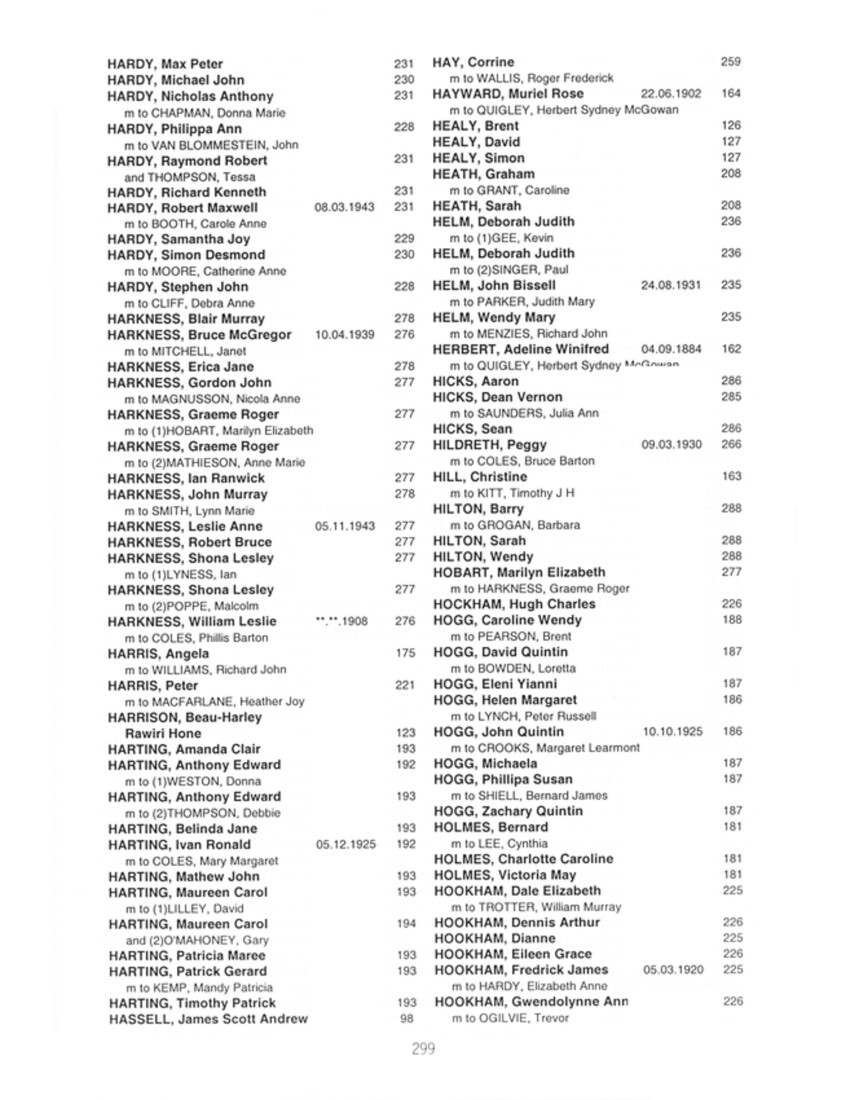
Page 300
HOOKHAM, Kay Margaret […] 226
m to EVANS, ??
HOOKHAM, Mark Frederick […] 225
m to TRUMAN, Julita Mary
HOOKHAM, Pauline Nora […] 226
m to (1) TAKARANGI, William Patara
HOOKHAM, Pauline Nora […] 226
m to (2) GREGORY, Kevin Leslie
HOULAHAN, Delwyn […] 286
and SAUNDERS, Gary Alan
HOUSTON, Marie Lillian […] 175
m to WILLIAMS, Anthony Alan
HOUSTON, Sharon Gail […] 242
m to ARLIDGE, Warren John
HULENA, Diane 12.08.1937 163
m to KITT, Terry
HUNT, Jack Peter 26.07.1929 254
m to WHYTE, Jeannie Margaret
HUNT, Karen Jennifer […] 255
m to (1) SMITH, Dennis A
HUNT, Karen Jennifer […] 255
and (2) PRITCHARD, Martin R
HUNT, Vicki Anne […] 255
m to KERSHAW-LANDY, Colin
HUNT, Wendy Sue […] 255
HURFIT, Jack 12.01.1874 95
m to COLES, Edith
ISSA, Brayden Harley […] 46
ISSA, Jacob Norman […] 246
ISSA, Norman […] 246
m to COLES, Nicola Susan
JACKSON, Thomas Charles […] 100
JAGER, Christel […] 220
m to CLAY, Dave
JAMES, David Warwick […] 219
m to COLES, Valerie Rosanna
JARVIE, Celeste V […] 213
JARVIE, Chantelle M […] 213
JARVIE, Murray James […] 212
m to COLES, Marianne May
JARVIE, Weston John […] 213
JIMENEZ, Diego Alonso Pulido […] 130
JOEL, Audrey Blanche 10.09.1931 218
m to COLES, Cecil Royston
JOHNSON, Judith Anne […] 273
m to NICOL, Lyall Ross
JOHNSTON, Erroll […] 220
m to CLAY, Karen
JONAS, Olivia Mae […] 234
JONAS, Raquel Patricia […] 34
JONAS, Samuel Timothy […] 234
JONAS, Timothy Farbeil […] 234
m to PARKER, Linda May
JONES, Carol Elaine […] 218
m to COLES, Donald Royston
JONES, Marjorie Beth Alwyn 03.08.1925 182
m to KING, John Herbert
JONES, Sarah Helen […] 170
JOSLING, Cathy Marie […] 227
JOSLING, Erena Anne Michelle […] 227
JOSLING, John Paul […] 227
m to KEELAN, Bronwyn Denise
JOSLING, John Ross 27.01.1926 226
m to HARDY, Margaret Nora
JOSLING, Susan Linda […] 227
m to WEST, Dale
JOSLING, TeRina Marie […] 227
JOSLING, Wendy Anne […] 227
m to DAVENPORT, James Bruce
KEEHAN, Audrey Marie Therese 23.01.1931 198
KEEHAN, Benjamin James […] 198
KEEHAN, Christopher Michael 17.10.1935 196
m to FLETCHER, Sarie Jennifer (Niki)
KEEHAN, Daniel Joseph […] 197
m to WIIG, Lynley Jane
KEEHAN, Dominic Samuel Tecumseh […] 197
KEEHAN, Jennifer Mary […] 198
KEEHAN, John […] 196
KEEHAN, Michael […] 196
KEEHAN, Michael Dominic […] 197
m to BEST, Alison Kathrine
KEEHAN, Miriam Jane […] 198
m to BRADY, Aaron
KEEHAN, Peter […] 196
KEEHAN, Robyn […] 196
m to O’NEILL, Gavin
KEEHAN, Sarah Anne […] 197
KEEHAN, Thomas James 19.12.1886 196
m to COLES, Audrey Eleanor
KEEHAN, William Patrick […] 196
m to GOSLING, Dorothy
KEELAN, Bronwyn Denise […] 227
m to JOSLING, John Paul
KELLY, Edward Brian […] 195
KELLY, Kristal Angeline […] 195
KELLY, Mary Ruth […] 195
m to (1) SENIOR, Alan
KELLY, Mary Ruth […] 195
m to (2) MOONEY, Shaun Richard
KELLY, Michael Vincent […] 195
m to TOMASI, Diana
KELLY, Nathan […] 195
KELLY, Paul Thomas […] 194
KELLY, Shona Mary […] 194
m to (1) BARASSO, Mark
KELLY, Shona Mary […] 194
m to (2) METCALFE, Greg
KELLY, Teresa Dorothy […] 195
KELLY, Thomas Patrick 24.10.1926 194
m to COLES, Dorothy Grace
KELLY, Travis […] 195
KELLY, Yvonne Margaret […] 195
m to GRACE, Newton
KEMP, Mandy Patricia […] 193
m to HARTING, Patrick Gerard
KEMSLEY, George Vincent […] 94
m to COLES, Ada Barton
KENDERDINE, Brenda Mary 13.01.1892 166
m to QUIGLEY, William Edward
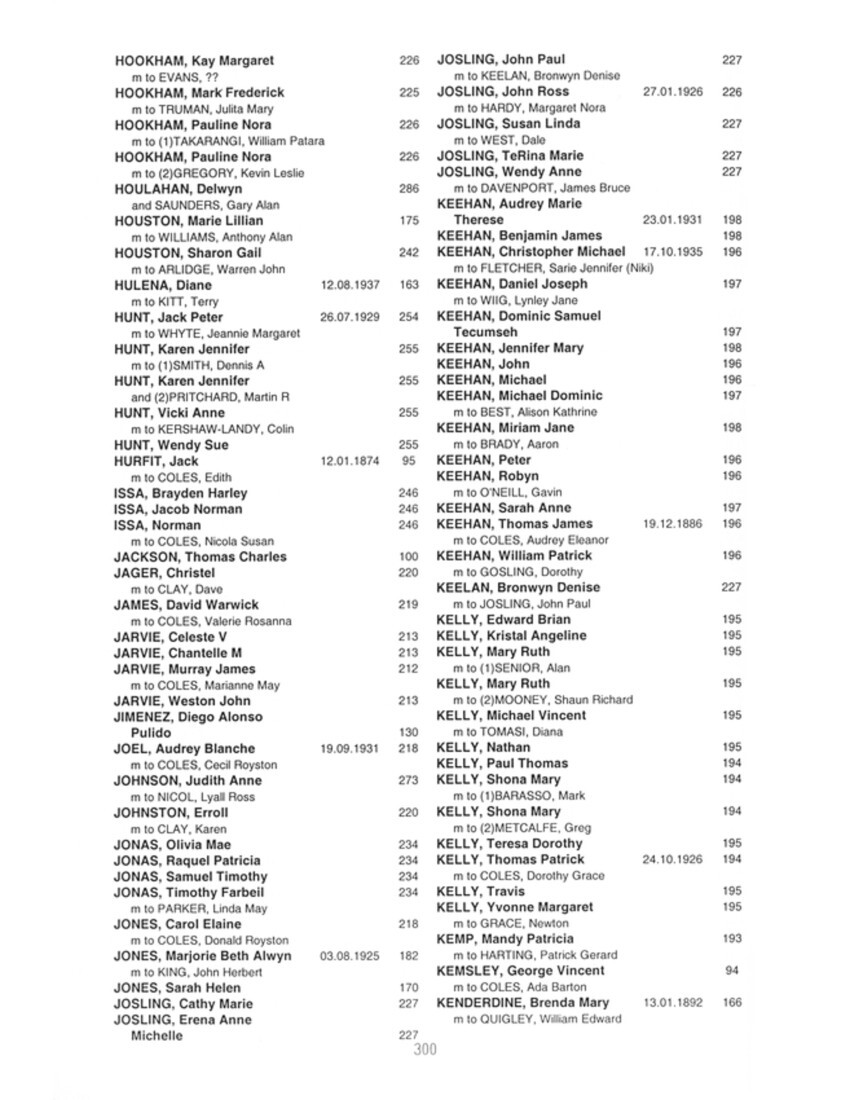
Page 301
KERSHAW-LANDY, Colin […] 255
m to HUNT, Vicki Anne
KILPATRICK, Elizabeth […] 218
m to COLES, Donald Royston
KILPATRICK-COLES, Elana Mary […] 218
KING ?? […] 209
m to BISHOP, Leagh Deborah
KING, Andrew William Jonathon […] 186
KING, Arthur William Herbert 16.06.1892 182
m to QUIGLEY, Jessie Rebecca
KING, Audrey Ruth 15.08.1928 184
m to MOATES, John Frank
KING, Christopher David […] 185
KING, David William 05.06.1933 185
m to LIND, Mary Gwendoline (Molly)
KING, Dennis Edward Randle 07.06.1942 186
m to (1) BISHOP, Leigh
KING, Dennis Edward Randle 07.06.1942 186
m to (2) DAVIS, Jillian Louise
KING, Elizabeth Mary […] 183
m to DEW, David
KING, Jeremy David […] 185
KING, Joanna Margaret […] 183
m to DELANY, Stephen
KING, Jocelyn 23.08.1924 182
KING, John Herbert 27.03.1926 182
m to JONES, Marjorie Beth Alwyn
KING, Kirsty Louise […] 186
KING, Marjorie Alison 17.04.1930 184
m to REDGRAVE, James Alister
KING, Michael […] 214
KING, Peter […] 214
m to CUMMING, Alyson Brenda
KING, Phillippa Louise […] 183
m to MILDON, Eric
KING, Rosemary Jane […] 183
m to VIGOR-BROWN, Robert
KING, Sara […] 214
KING, Simon David […] 185
KITT, Dylan Richard […] 163
KITT, Jeremy M […] 163
m to PENNALL, Tracey
KITT, John Herman 14.04.1907 162
m to QUIGLEY, Alma Elaine
KITT, Jonathan A […] 164
KITT, Lachlan James Hamilton […] 163
KITT, Liam Thomas […] 163
KITT, Richard Charles H […] 163
KITT, Simone Jacinda […] 163
KITT, Terry 21.10.1933 163
m to HULENA, Diane
KITT, Timothy J H 09.09.1961 163
m to HILL, Christine
KOENDERS, Antonius Johannes 16.10.1927 222
m to COLES, Janet
KOENDERS, Martin […] 222
LAIRD, Adele […] 275
m to ALEXANDER, Timothy John
LANE, Ina Lottie 05.10.1906 176
m to QUIGLEY, Middleton Stanley
LEATHEM, Janice Marie 29.11.1939 230
m to HARDY, Kenneth Niall Alan
LEE, Charles Louis […] 180
m to QUIGLEY, Yvonne Audrey
LEE, Cynthia […] 181
m to HOLMES, Bernard
LEPPER, William John […] 243
m to ARLIDGE, Katrina Rae
LILEY, Rachelle […] 235
and GUILFORD, Michael David
LILLEY, Daniel Joseph […] 194
LILLEY, David […] 193
m to HARTING, Maureen Carol
LIND, Mary Gwendoline (Molly) 28.07.1940 185
m to KING, David William
LIVICK, Beryle 12.08.1889 208
m to BRAYTON, William Grindal
LIVICK, Ella […] 208
LIVICK, Ivan […] 209
LIVICK, William Dixon 10.04.1852 94
m to COLES, Louisa
LIVICK, William Dixon 10.04.1852 208
m to COLES, Louisa
LUSK, Marilyn […] 262
m to COLES, Richard
LYALL, Holly Jade […] 118
LYNCH, Emma Louise […] 187
LYNCH, Heidi Jane […] 187
LYNCH, Peter Russell […] 186
m to HOGG, Helen Margaret
LYNCH, Vera Ellen […] 175
m to QUIGLEY, Ross Barry
LYNESS, Erin Patricia […] 277
LYNESS, Ian […] 277
m to HARKNESS, Shona Lesley
MacDONALD, Bruce […] 244
and COLES, Jillian Jaine
MACDONALD, Merle Gwendolyn 09.07.1930 243
m to COLES, Brian George
MacDONALD, Timothy James 17.01.1991 244
MACFARLANE, Betty […] 219
m to CLAY, Leendert
MACFARLANE, Grant Leslie […] 221
m to WOOD, Lesley
MACFARLANE, Heather Joy […] 221
MACFARLANE, Heather Joy […] 221
m to (2) HARRIS, Peter
MACFARLANE, Kay Barbara […] 221
m to GARDEN, Phillip
MACFARLANE, Kirsty […] 221
MACFARLANE, Leslie Mace 13.06.1899 219
m to COLES, Mona
MACFARLANE, Peter 20.05.1928 220
m to McLEOD, Florence
MACFARLANE, Vicki […] 221
MacKAY, Aaron David […] 275
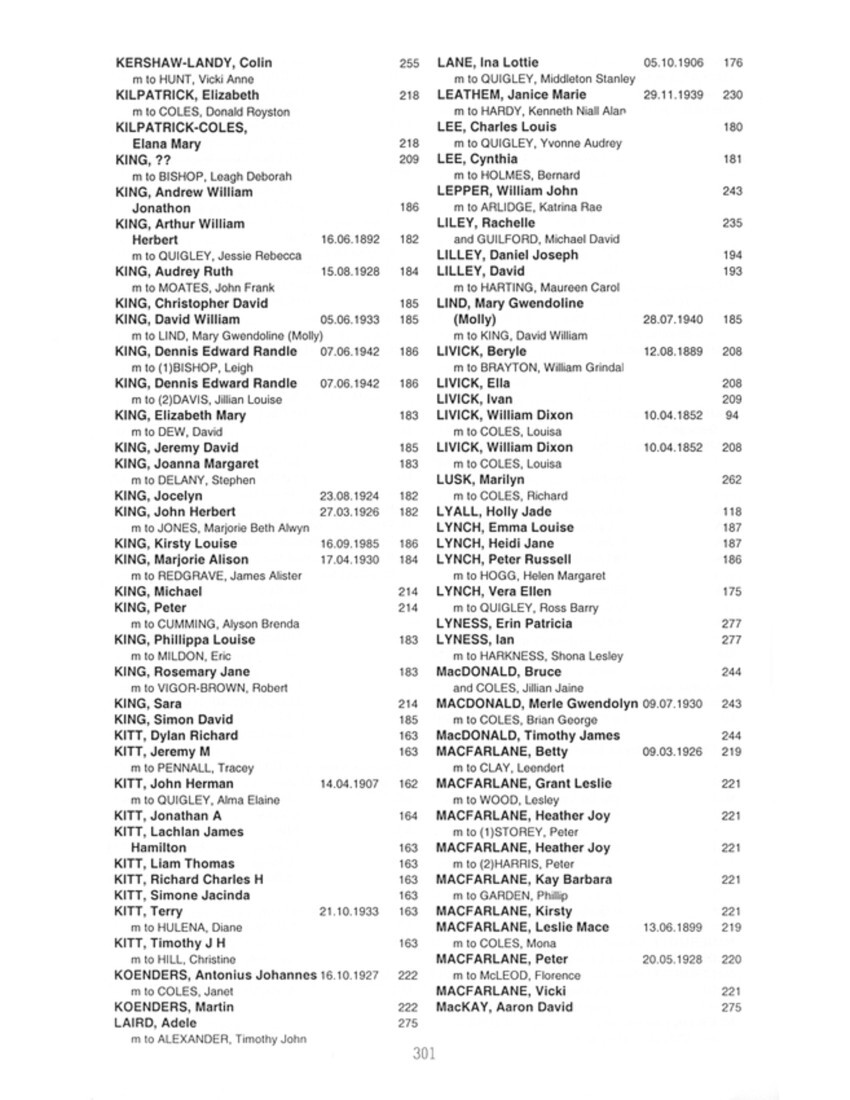
Page 302
MacKAY, Heather Margaret […] 275
MacKAY, Leonard Stanley **.**.1942 275
m to NICOL, Janice Barbara
MacNEIL, John […] 254
MacNEIL, Margaret […] 254
m to MAXWELL, Graham
MAGNUSSON, Nicola Anne […] 277
m to HARKNESS, Gordon John
MANNING, Maxine […] 230
m to HARDY, John Searight
MARR, Eileen Margaret Bella 04.07.1911 164
m to QUIGLEY, Jack Herbert
MARSDEN, Belinda Jennifer […] 256
and SANDFORD, Peter
MARSDEN, Celia Rose […] 256
m to TOWGOOD, Michael
MARSDEN, Francis Watson 01.05.1923 255
m to WHYTE, Philippa Douglas
MARSDEN, Juliet Kay […] 256
m to WATT, David
MARSH, Christine […] 263
m to COLES, Brian Robert
MARSHALL, Alan Matthew George […] 110
MARSHALL, Alexander Willis Ashmead […] 106
MARSHALL, Alison Joan […] 110
m to TAYLOR, John
MARSHALL, Honor Imogen […] 105
MARSHALL, Katy Louise […] 110
MARSHALL, Laura Jean […] 110
MARSHALL, Stewart Keith […] 109
m to GIBBONS, Denise Catherine
MARTIN, Patricia Eileen 28.12.1937 233
m to CLARK, David Charles
MATHIESON, Anne Marie 15.02.1943 277
m to HARKNESS, Graeme Roger
MAXWELL, Graham […] 254
m to MacNEIL, Margaret
McCORD, John 14.08.1923 256
m to WHYTE, Philippa Douglas
McDERMOTT, Anne Patricia […] 215
m to GOMMERS, Eugene J
McDERMOTT, Bryan Noel 14.12.1928 214
m to COLES, Gretta Patricia
McDERMOTT, Cary Margaret […] 216
McDERMOTT, Charlie De Lacy […] 215
McDERMOTT, Elizabeth Maye […] 216
and (2) BEVERIDGE, William
McDERMOTT, Elizabeth Maye […] 216
and (2) SCHICKER, Lawrence
McDERMOTT, Isabella Tallulah […] 215
McDERMOTT, John Bryan […] 215
m to EVANS, Maree Elena
McDERMOTT, Lauren Zoe […] 15
McDERMOTT, Louis George […] 215
McDERMOTT, Mark James […] 217
McDERMOTT, Paul Stephen […] 215
m to TEMPLETON, Lucinda
McEWEN, Katrina May […] 171
m to QUIGLEY, Stuart Gary
McGREGOR, Andrew Grant […] 264
McGREGOR, David Bruce […] 264
McGREGOR, Graeme Morison […] 100
m to SMIT, Carol Jane
McGREGOR, Hamish Robert […] 264
McGREGOR, Heather Raie […] 100
m to (1) GOODMON, David Douguld
McGREGOR, Heather Raie […] 100
m to (2) JACKSON, Christopher Charles
McGREGOR, Margaret Anne […] 100
m to GODFREY, Colin Francis
McGREGOR, Nicolle
Stephanie Lydia Helen […] 100
McGREGOR, Robin […] 263
m to COLES, Alison Elizabeth
McGREGOR, Stuart John […] 264
McKELVY, Susan […] 212
m to COLES, Howard Harry
McLAUGHLAN, Martin Norman […] 198
m to COLES, Emma Lavinia (Vinnie)
McLEOD, Florence 26.09.1925 220
m to MACFARLANE, Peter
McMEEKIN, Robbie Paul […] 280
McNEILL, Alex […] 254
m to WHYTE, Vera
McNICOL, Amber Jehane […] 170
McNICOL, Kenneth John […] 70
m to SPENCER, Caroline Ruth
McNICOL, Letitia Ella […] 170
McPHERSON, Annah Ruby […] 224
McPHERSON, Benjamin Mark […] 224
McPHERSON, David Ian […] 224
m to COLES, Nancy Ann
McPHERSON, Emily Kate […] 224
MEEUWS, Lucien Desire […] 254
m to WHYTE, Mary
MENDELSSOHN, Elizabeth […] 209
m to GILLETTE, Kenneth Maxwell
MENDELSSOHN, Jill […] 208
m to CLERKE, Ronald Archibald
MENDELSSOHN, Joseph Harold 01.03.1908 208
m to BRAYTON, Betty
MENDELSSOHN, Louis Gabriel 01.03.1911 208
m to BRAYTON, Patricia
MENZIES, Chadwick Richard […] 235
MENZIES, Felicity Jane […] 236
MENZIES, Richard John […] 235
m to HELM, Wendy Mary
MENZIES, Soren John […] 235
MEREDITH, Evelyn Joy 14.11.1934 244
m to COLES, Harley Maurice
METCALFE, Edward Bali […] 195
METCALFE, Greg […] 194
m to KELLY, Shona Mary
METCALFE, Mallika Dorothy […] 194
MILDON, Eric […] 183
m to KING, Phillipp Louise
MILDON, Harriet Piki King […] 183
MILDON, Hemi Gemmel King […] 183
MILDON, Jed Kahu […] 183
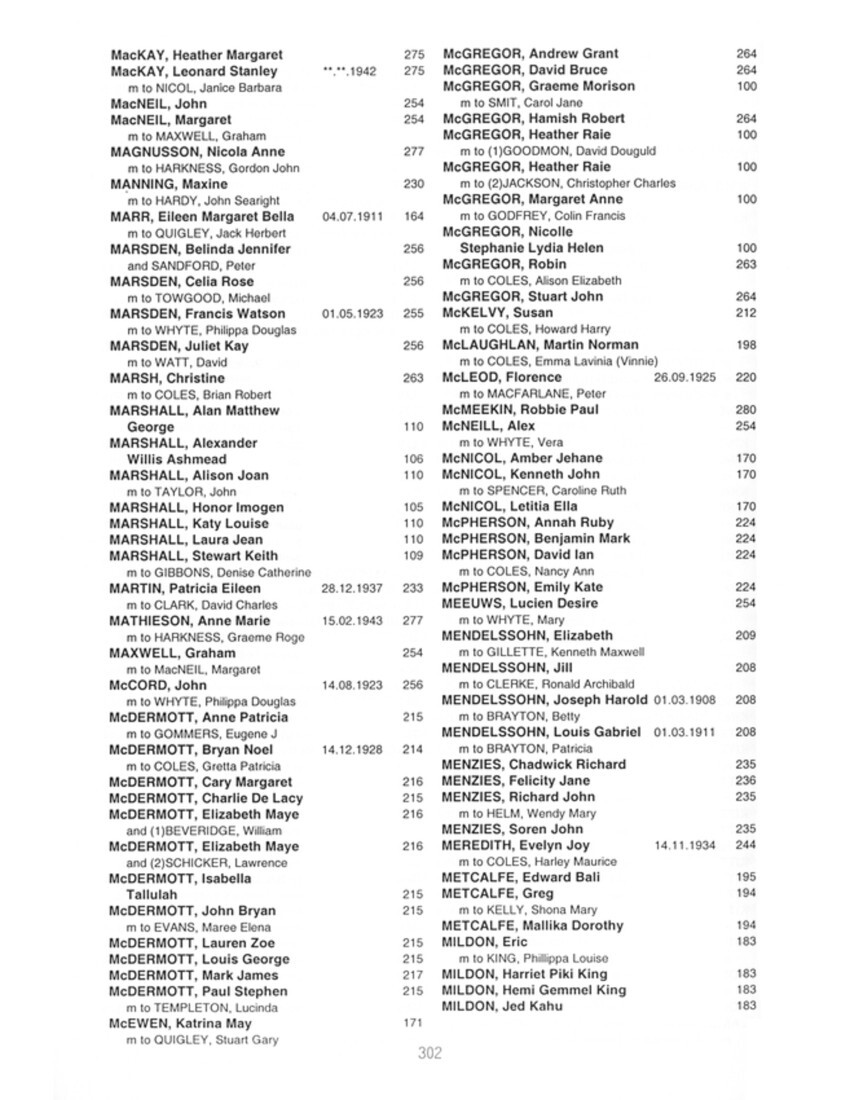
Page 303
MILDON, Lilly Aroha King […] 183
MILDON, Mutu Eric King […] 183
MILDON, Sophie Ratua King […] 183
MILLYNN, Janice Margaret […] 173
m to WILLIAMS, Roger Neville
MILNE, Alister Robert […] 166
MILNE, Andrew Kenderine […] 166
m to WATSON, Janice Ruth
MILNE, Bruce […] 250
m to ATKINS, Bronwyn
MILNE, Clara 24.06.1897 250
MILNE, David Henry 22.08.1944 252
m to ANDERSON, Celia Irene Mary
MILNE, Elva Margaret 29.03.1929 251
m to WHITTINGTON, John
MILNE, Eric Conway 21.02.1902 250
m to WYLIE, Isabel Mary
MILNE, Ernest 31.10.1904 251
m to EVEREST, Mary
MILNE, Henry 01.03.1859 95
m to COLES, Mary Jane
MILNE, Henry 01.03.1859 250
m to COLES, Mary Jane
MILNE, John Ernest […] 252
MILNE, Katherine Philippa 14.03.1977 166
MILNE, Lee Rebecca […] 251
MILNE, Lucy Margaret Kenderine […] 167
MILNE, Margaret Constance […] 251
m to DICK, Alistair Maxwell
MILNE, Mariese Ann […] 252
m to BASSETT, David John
MILNE, Mitchell Robert 27.08.1908 166
m to QUIGLEY, Margaret
MILNE, Paul Roderick […] 166
MILNE, Roderick Ian 14.01.1942 166
m to BUTLER, Irene Faith
MILNE, Ronald Henry 26.06.1927 250
m to WALKER, Fay Constance
MILNE, Sandra Francis […] 251
m to PINCOTT, Brent Mark
MILNE, Sarah Melanie […] 166
MILNE, Shelley Ann […] 251
MILNE, Shirley May 26.09.1930 251
m to MITCHELL, Jim
MILNE, Virginia Louise […] 166
MITCHELL, Janet […] 276
m to HARKNESS, Bruce McGregor
MITCHELL, Jim 06.01.1926 251
m to MILNE, Shirley May
MOATES, Jennifer Jane […] 184
MOATES, John Frank 04.02.1929 184
m to KING, Audrey Ruth
MOATES, Susan Elizabeth […] 184
m to PEPPIATT, John
MOONEY, Shaun Richard […] 95
m to KELLY, Mary Ruth
MOORE, Catherine Anne […] 230
m to HARDY, Simon Desmond
MOSS, Henry […] 279
m to STONE, Margaret Vesty
MOSS, Kate […] 279
MUNRO, Daniel John […] 176
MUNRO, Matthew Ross […] 176
MUNRO, Oliver […] 176
MUNRO, Timothy […] 175
m to QUIGLEY, Roslyn Louise
MURPHY, Damian Spencer […] 170
NEBAUER, Janelle Ann […] 229
m to HARDY, Alan Grant
NEWPORT, Gail […] 181
m to QUIGLEY, Brian
NEWTON, Helen […] 223
m to COOKE, Samuel James
NICHOLS, Rosina Gwendoline 12.02.1938 246
m to COLES, Roger Neale
NICOL, Alfred John 24.01.1909 272
m to COLES, Ella Valerie
NICOL, Cameron Lyall […] 274
NICOL, Emma Jayne […] 274
NICOL, Janice Barbara 20.10.1943 275
m to MacKAY, Leonard Stanley
NICOL, Jason John […] 276
NICOL, John Samuel […] 276
m to PRESTON, Kaye Lesley
NICOL, Kristy Narelle […] 276
NICOL, Lyall Ross 12.08.1941 273
m to JOHNSON, Judith Anne
NICOL, Patricia Helen 28.08.1942 274
m to ALEXANDER, Kevin Douglas
NICOL, Rohan Christopher […] 274
NORTHE, Rosa […] 255
m to WHYTE, Desmond Russell
NUESTROSKY, Heather […] 212
and COLES, James Peter
O’MAHONEY, Gary […] 194
and HARTING, Maureen Carol
O’NEIL, Minnie Frances 17.03.1865 94
m to COLES, William Edward
O’NEIL, Minnie Frances 17.03.1865 192
m to COLES, William Edward
O’NEILL, Erin […] 96
O’NEILL, Gavin […] 196
m to KEEHAN, Robyn
OGILVIE, Dean […] 226
OGILVIE, Kim […] 226
OGILVIE, Trevor […] 226
m to HOOKHAM, Gwendolynne Anne
OWNLEY, Bonnie […] 175
m to QUIGLEY, Neil Benton
PALMER, Christopher George […] 169
PALMER, Darryl James […] 169
PALMER, Warwick Phillip […] 169
m to THOMPSON, Elizabeth Lillias
PARKER, Benjamin Raymond […] 234
PARKER, Bernadette Pamela 22.03.1937 236
m to SIVITER, Albert Leonard
PARKER, Catherine […] 234
PARKER, Catherine Gaynor 26.05.1931 234
m to GUILFORD, Owen Tracey
PARKER, Francis Raymond 21.08.1904 233
m to COLES, Ada
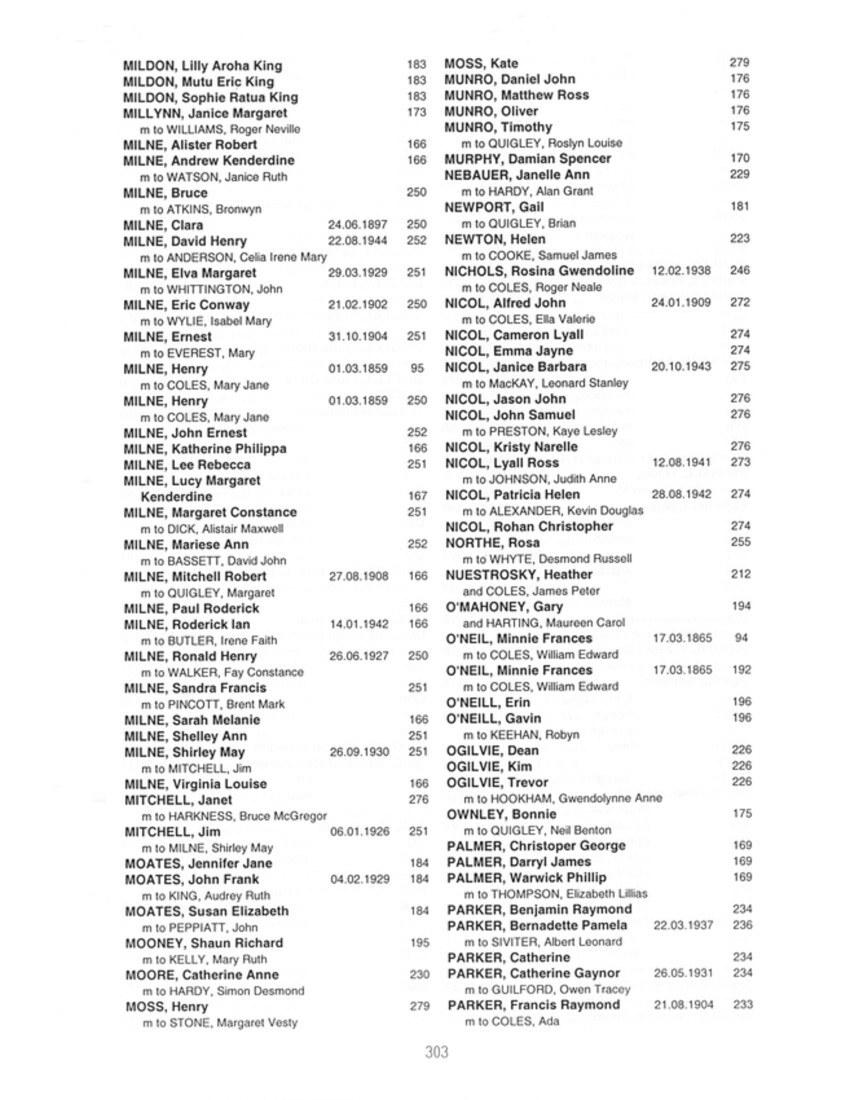
Page 304
PARKER, Jason Terence […] 234
PARKER, Jennifer Margaret 12.12.1940 237
PARKER, Jillian […] 233
m to ELDRED, Gregory
PARKER, Judith Mary 20.03.1933 235
m to HELM, John Bissell
PARKER, Linda May […] 234
m to JONAS, Timothy Farbeil
PARKER, Terence Raymond 12.08.1929 233
m to (1) HAMILTON, Irene
PARKER, Terence Raymond 12.08.1929 234
m to (2) ??, Beryl Josephine
PARKES, Ashleigh Marie […] 244
PARKES, Joshua Shea […] 244
PARKES, Rebecca Grace […] 244
PARKES, Robert Bruce […] 244
m to COLES, Patricia Anne
PATTERSON, Rosalind Louise […] 235
m to GUILFORD, Christopher Raymond Tracey
PEARSON, Andrew James […] 188
PEARSON, Brent […] 188
m to HOGG, Caroline Wendy
PEARSON, Michael John […] 188
PEARSON, Nicholas William […] 188
PELL, Joanne Doreen […] 235
m to GUILFORD, Christopher Raymond Tracey
PENNALL, Tracey […] 163
m to KITT, Jeremy M
PEPPIATT, John […] 84
m to MOATES, Susan Elizabeth
PIGOTT, Anne Katherine Grace […] 104
PIGOTT, Rupert Francis Willis […] 104
PINCOTT, Andrew Mark […] 251
PINCOTT, Brent Mark […] 251
m to MILNE, Sandra Francis
PITKITHLY, Jenni Maree […] 279
m to BUTTLER, Michael John
POPPE, Malcolm […] 277
m to HARKNESS, Shona Lesley
PRESTON, Kaye Lesley […] 276
m to NICOL, John Samuel
PRITCHARD, Courtney Florence […] 255
PRITCHARD, Liam Douglas […] 255
PRITCHARD, Martin R […] 255
and HUNT, Karen Jennifer
PUDDLE, Anthony John […] 101
PUDDLE, Christopher John […] 101
m to COOMBES, Helen Cecelia
PUDDLE, Louise Catherine […] 101
PUDDLE, Phillip Brett […] 101
m to PATERSON, Sharon Marie
QUIGLEY, Ada Mary 11.08.1883 165
m to COMBS, Willis Ide
QUIGLEY, Alma Elaine 19.03.1908 162
m to KITT, John Herman
QUIGLEY, Amanda Caroline […] 167
m to TWINAME, Gregory John
QUIGLEY, Andrew James […] 175
QUIGLEY, Andrew John […] 167
QUIGLEY, Astra Rose […] 171
QUIGLEY, Athol Andrew (Attila) 05.03.1893 176
m to CURTIS, Ellen
QUIGLEY, Barbara Muriel 20.07.1919 172
m to (1) WILLIAMS, Alan Vincent
QUIGLEY, Barbara Muriel 20.07.1919 175
m to (2) COULAM, Ivan Roy
QUIGLEY, Benjamin Ross […] 175
QUIGLEY, Brian […] 181
m to NEWPORT, Gail
QUIGLEY, Cynthia Elaine 27.11.1881 165
m to BARKER, George
QUIGLEY, Derek […] 181
m to CLARK, Sarah
QUIGLEY, Elizabeth Mary […] 167
m to STANLEY, Ian Robert
QUIGLEY, Frank Martin 03.03.1891 172
m to BENTON, Cora Cecelia
QUIGLEY, Freda Clara 13.09.1886 168
QUIGLEY, Herbert Sydney McGowan 28.02.1880 162
m to (1) HERBERT, Adeline Winifred
QUIGLEY, Herbert Sydney McGowan 28.02.1880 164
m to (2) HAYWARD, Muriel Rose
QUIGLEY, Irvine James 07.01.1889 168
m to BRUTON, Lillias Hamilton
QUIGLEY, Jack Herbert 11.09.1910 164
m to MARR, Eileen Margaret Bella
QUIGLEY, Jarrod […] 181
QUIGLEY, Jessie Rebecca 26.11.1897 182
m to KING, Arthur William Herbert
QUIGLEY, Jill Kerri […] 176
QUIGLEY, John Allan […] 171
QUIGLEY, John Kenderine 16.05.1921 167
m to ROBINSON, Pamela Mary
QUIGLEY, Jonathan Irvine […] 171
QUIGLEY, Joshua James […] 172
QUIGLEY, Margaret 21.05.1917 166
m to MILNE, Mitchell Robert
QUIGLEY, Max […] 176
QUIGLEY, Michael Meredith […] 167
QUIGLEY, Middleton Stanley 09.04.1895 176
m to LANE, Ina Lottie
QUIGLEY, Neil Benton […] 175
m to OWNLEY, Bonnie
QUIGLEY, Neville […] 181
QUIGLEY, Neville Benton 12.11.1924 176
QUIGLEY, Ngaire Lillias 13.07.1922 169
m to SPENCER, David Charles
QUIGLEY, Nicholas John Kenderine […] 167
m to BULL, Helen Margaret
QUIGLEY, Noela Elizabeth (Betty) 27.04.1917 168
m to THOMPSON, Claude Goodwin
QUIGLEY, Nola Elizabeth […] 176
m to FARLEY, ??
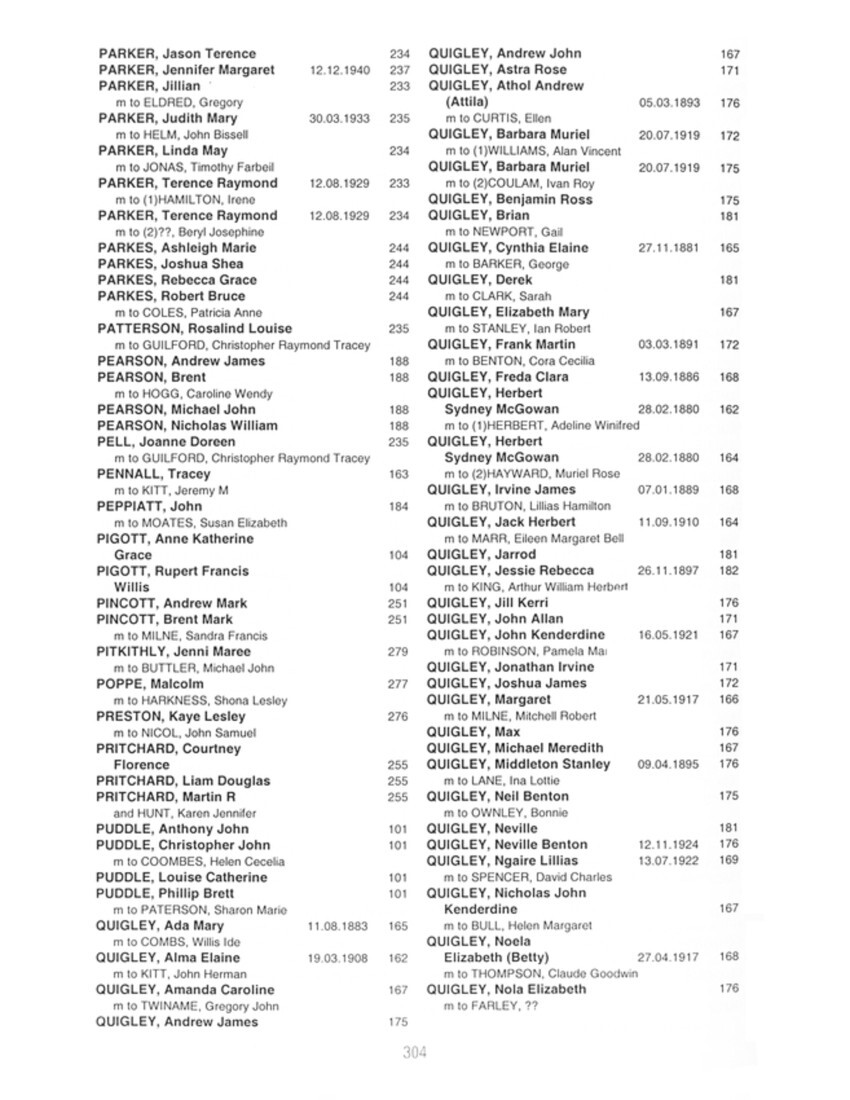
Page 305
QUIGLEY, Olive Phillis 08.03.1900 186
m to CROOKS, David Low
QUIGLEY, Pamela Elaine 28.07.1930 177
m to (1) WHIBLEY, Alan James
QUIGLEY, Pamela Elaine 28.07.1930 180
m to (2) BELLERBY, Roger Graham
QUIGLEY, Richard John Hayward […] 165
QUIGLEY, Rona 20.04.1929 177
m to (1) BUCKNELL, Colin Douglas
QUIGLEY, Rona 20.04.1929 177
m to (2) TRANGMAR, Frank Clarence
QUIGLEY, Rona 20.04.1929 177
m to (3) GRIEVE, Leonard Robert
QUIGLEY, Roslyn Louise […] 175
m to MUNRO, Timothy
QUIGLEY, Ross Barry 06.04.1929 175
m to LYNCH, Vera Ellen
QUIGLEY, Russell Irvine […] 171
QUIGLEY, Sandra Yvonne […] 172
QUIGLEY, Stuart Gary […] 171
m to McEWEN, Katrina May
QUIGLEY, Tania […] 181
m to VAN MARREWIJK, Wilhelmus Johannes
QUIGLEY, Terance […] 181
m to BEETS, Eve
QUIGLEY, Tyran **.**.**** 181
QUIGLEY, Vivienne Enid 20.01.1929 172
QUIGLEY, Wilfred Irvine 13.07.1925 171
m to BALL, Patricia Mary
QUIGLEY, William Edward 20.10.1885 166
m to KENDERDINE, Brenda Mary
QUIGLEY, William James 18.01.1854 94
m to COLES, Clara Jane
QUIGLEY, William James 18.01.1854 162
m to COLES, Clara Jane
QUIGLEY, Yvonne Audrey 16.05.1932 180
m to LEE, Charles Louis
QUINN, Alice Fiona McPherson […] 117
QUINTAL, ?? […] 232
m to CLARK, Kaye
RADFORD, Lena Merina […] 219
m to COLES, Cecil Royston
REDGRAVE, Anne Caroline […] 185
m to DIB, Jaoa
REDGRAVE, Christina Frances […] 184
m to WALKER, Peter
REDGRAVE, James Alister 18.11.1926 184
m to KING, Marjorie Alison
REDGRAVE, Lily-Jean Isobel […] 185
REHU, Ana TeRira […] 244
m to COLES, William Maurice
RENDLE, Anna Mieke Gaynor […] 235
RENDLE, Christiaan Nicolia Harry […] 234
RENDLE, Graeme Irwin […] 234
m to GUILFORD, Judith Donna
REYNOLDS, Craig […] 219
m to COLES, Vanessa Audrey
REYNOLDS, Joseph Aaron […] 219
REYNOLDS, Morgan Fay […] 219
RIACH, Margaret 11.01.1910 285
m to GLENNY, Basil
RILEY, Carl […] 212
m to COLES, Theresa
RILEY, Haydn Brad […] 212
RIWAKA, Rawinea […] 232
m to CLARK, Robert Michael
RIWAKA-CLARK, Kapene Luke […] 233
RIWAKA-CLARK, Te-Ariki Topaz […] 233
ROBERTSON, Andrew Douglas 05.01.1914 264
m to COLES, Jessie Mavis (Jaye)
ROBERTSON, Barry Alexander […] 265
m to WOOD, Christine Elizabeth
ROBERTSON, Geoffrey […] 289
ROBERTSON, George Alexander 15.10.1911 259
m to COLES, Nancy Gwendoline
ROBERTSON, Glen William […] 266
ROBERTSON, Graham Douglas […] 265
ROBERTSON, Heather Mary […] 261
ROBERTSON, Jean Lynette 01.05.1940 259
m to WALLIS, Arnold Robert
ROBERTSON, Kevin […] 289
m to GROGAN, Dianne
ROBERTSON, Raewyn Helen […] 261
m to DUMBLETON, Alastair
ROBERTSON, Scott […] 289
ROBERTSON, Shane Douglas […] 266
ROBERTSON, Shirley Kay 24.06.1942 260
m to ALLEN, Granville (Greg)
ROBERTSON, Susan Alice 02.08.1942 265
m to SCHOFIELD, Wayne Roy
ROBINSON, Pamela Mary 04.04.1924 167
m to QUIGLEY, John Kenderdine
ROGERS, Charlotte […] 199
m to COLES, David Vernon
ROSS, Judi […] 217
m to HARDING, Ian
ROUNTREE, Maureen […] 178
m to WHIBLEY, Graham Stanley
RUSSELL, Andrew Wakefield […] 228
m to HARDY, Joanna Mary Cecelia
RUSSELL, Josiah Liam […] 228
RUSSELL, Lee Teresa […] 228
RUSSELL, Leon Seth […] 228
RUSSELL, Robert […] 95
m to COLES, Martha Emma
RYAN, Annabelle Jane Fia […] 120
RYBURN, Daisy Lorraine 13.02.1920 261
m to COLES, Guy Kenneth
SANDFORD, Peter […] 256
and MARSDEN, Belinda Jennefer
SAUNDERS, Alan Henry 17.04.1939 285
m to GLENNY, Suzanne
SAUNDERS, Brian John […] 86
SAUNDERS, Cameron Thomas Sullivan […] 246
SAUNDERS, Gabrielle Rose […] 246
SAUNDERS, Gary Alan […] 286
and HOULAHAN, Delwyn
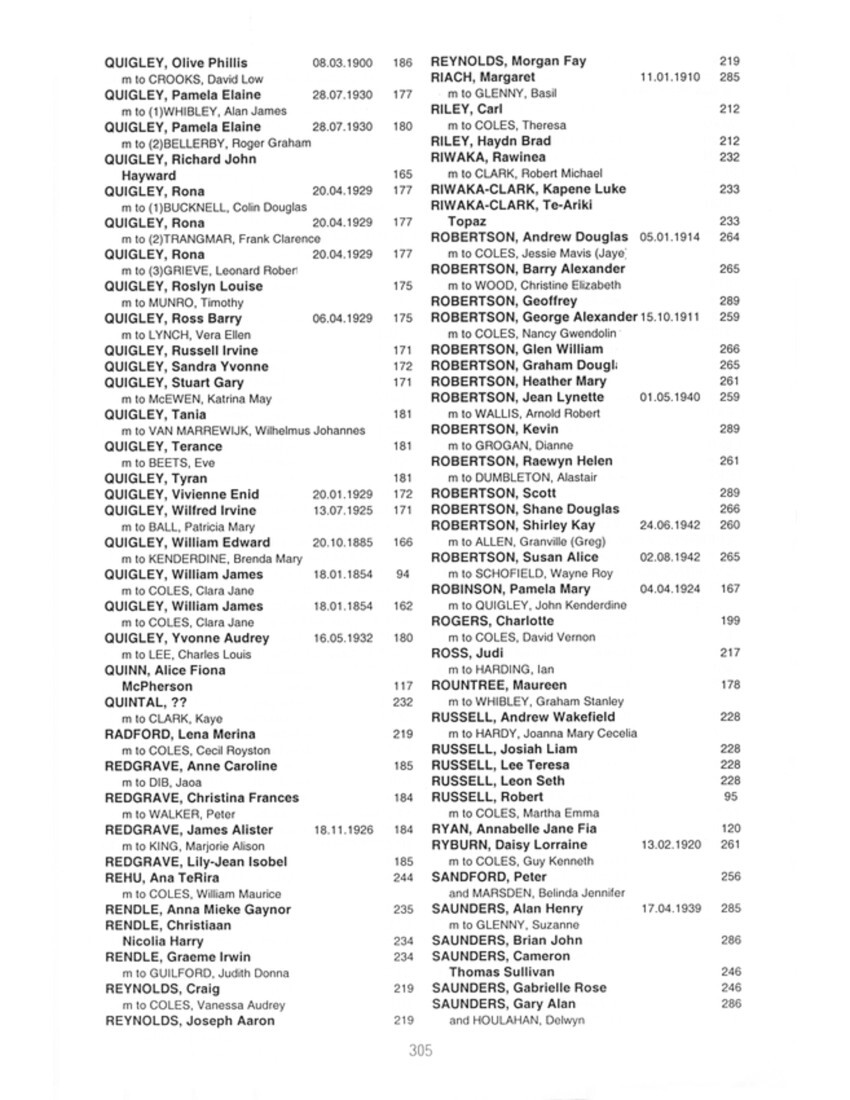
Page 306
SAUNDERS, Julia Ann […] 285
m to HICKS, Dean Vernon
SAUNDERS, Mark […] 246
m to COLES, Shelley Anne
SAUNDERS, Tia […] 286
SCHICKER, Grace Elizabeth […] 217
SCHICKER, Lawrence […] 216
and McDERMOTT, Elizabeth Maye
SCHICKER, Rose Patricia […] 216
SCHNELL, David 07.02.1941 261
m to COLES, Judith
SCHNELL, Kara […] 261
m to BELL, Stephen
SCHNELL, Nicholas […] 62
SCHNELL, Ryan […] 262
SCHOFIELD, Kirsten Alice […] 265
SCHOFIELD, Nicholas Andrew […] 265
SCHOFIELD, Rebecca Susan […] 265
SCHOFIELD, Wayne Roy […] 265
m to ROBERTSON, Susan Alice
SCOTT, Yvonne […] 247
m to COLES, Michael John
SENIOR, Alan […] 195
m to KELLY, Mary Ruth
SENIOR, Lyle Jason […] 195
SHAFFER, Miranda Heidi […] 131
SHAFFER, Peter Alexander […] 131
SHAW, Ellie-Mae […] 99
SHAW, Jack Callum […] 99
SHAW, Maddison Kate […] 99
SHEPHERD, Annie McGregor **.**.1892 211
m to COLES, John Barton (Jack)
SHERIDAN, Ryan Thomas […] 118
SHIELL, Bernard James […] 187
m to HOGG, Phillipa Susan
SHIELL, Jeremy Quintin […] 187
SHIELL, Sarah Kathryn […] 187
SHIELL, Simon James […] 187
SHORT, Crispian […] 289
SHORT, Terrence John […] 289
m to GROGAN, Colleen
SIMPSON, Irene Mabel 29.09.1904 222
m to COLES, Frank Charles
SINGER, Darriann [Darienne] […] 236
SINGER, Michael […] 236
SINGER, Paul […] 236
m to HELM, Deborah Judith
SIVITER, Albert Leonard 10.04.1932 236
m to PARKER, Bernadette Pamela
SIVITER, Lisa […] 236
m to ATKINS, Steven
SIVITER, Sharon Lynette […] 236
m to SIVITER-SMITH, Roland
SIVITER-SMITH, Amy Michele […] 36
SIVITER-SMITH, Emma Louise […] 236
SIVITER-SMITH, Roland […] 236
m to SIVITER, Sharon Lynette
SKEWS, Deidre […] 247
m to COLES, Wayne
SMEATH, Rosemary Jane […] 267
m to COLES, Peter Barton
SMILLIE, Matthew William […] 118
SMITH, Amber Francis […] 124
SMITH, Ariana Tiare […] 124
SMITH, Bruce Graeme […] 246
m to COLES, Belinda Rosina
SMITH, Caroline Margaret Anne […] 123
m to (1) HARRISON, Laurence John
SMITH, Caroline Margaret Anne […] 124
and (2) VEZA, Gregory
SMITH, Christopher Charles Rangihoua […] 123
and KELLY, Celina May
SMITH, Delta Anihera […] 124
SMITH, Dennis A […] 255
m to HUNT, Karen Jennifer
SMITH, Drew Jade […] 125
SMITH, Hamuera Leonard […] 124
m to McLEAN, Honor-Lisa Naumai
SMITH, Heiwari Te Potahi […] 124
SMITH, Jackson Rawiri […] 125
and PETERSON, Queenie Ana
SMITH, Kadesha Lee […] 255
SMITH, Kylie Maree Rosina […] 246
SMITH, Lennox Jordan […] 125
SMITH, Lynn Marie […] 278
m to HARKNESS, John Murray
SMITH, Melanie Whetu Marama […] 124
and (1) KIWIKIWI, Martin
SMITH, Melanie Whetu Marama […] 125
and (2) TATANA, John
SMITH, Rikihana Paul […] 125
and PETERSON, Roberta
SMITH, Rosco Charles […] 124
SMITH, Sade de Lancy […] 125
SMITH, Shaun Jarrod […] 246
SMITH, Terrence Rangihoua […] 124
SMITH, Travis Leonard […] 123
SMITH, Vance Rewi […] 123
SMITH, Wyatt Christopher […] 123
SMITH, Zachariah Patarika […] 123
SPEAR, Madison Rose […] 247
SPEAR, Steven Wayne […] 247
m to COLES, Marise Kay
SPENCER, Caroline Ruth […] 170
m to McNICOL, Kenneth John
SPENCER, David Charles 05.12.1915 169
m to QUIGLEY, Ngaire Lillias
SPENCER, Felicity Anne […] 170
STANLEY, Charlotte Caroline […] 167
STANLEY, Ian Robert […] 167
m to QUIGLEY, Elizabeth Mary
STANLEY, Thomas George […] 167
STEPHENS, Brian […] 244
m to COLES, Sally-Anne
STEPHENS, Callum […] 245
STEPHENS, Hayden […] 245
STEPHENS, Kelly-Ann […] 245
STEPHENS, Sophie […] 245
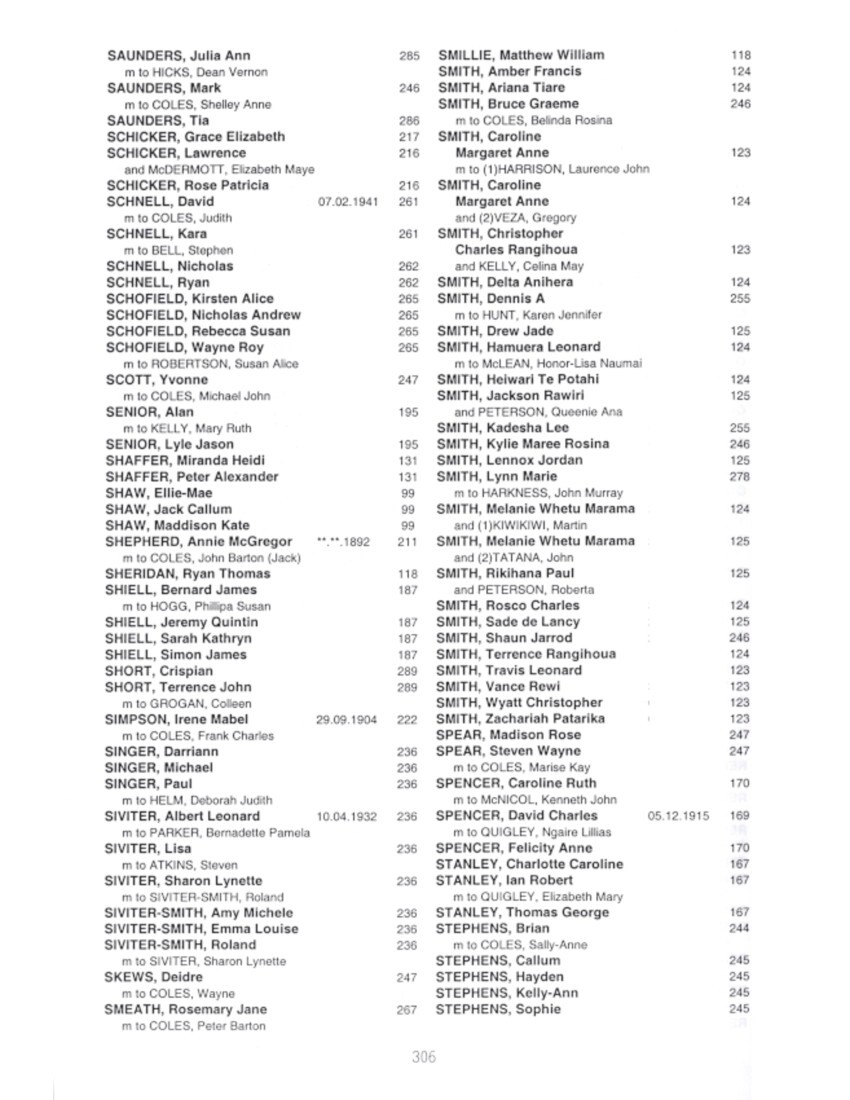
Page 307
STEPHENS, Troy […] 245
STEVENS, Anthony McLardy […] 108
STEVENS, Ashleigh Marie McLardy […] 108
STEVENS, Bruce John […] 108
m to McLARDY, Abbey Leigh
STEVENS, Grant Michael […] 108
STEVENS, Helen Joy […] 109
STEVENS, Jason Henry McLardy […] 108
STEVENS, John Anthony 04.11.1940 108
STEVENS, Jonathan Chad […] 09
STEVENS, Kaleb Jordan McLardy […] 108
STEVENS, Michael Vere 22.10.1943 108
m to COCHRANE, Lois May
STEVENS, Valerie Ann 24.11.1938 107
m to WALSH, David
STEWART, Ross […] 226
m to HARDY, Elizabeth Anne
STONE, Lesley Jean 18.06.1942 279
m to BUTTLER, Geoffrey Armigal
STONE, Margaret Vesty 11.09.1940 279
m to MOSS, Henry
STONE, Maureen Barton 11.09.1940 279
m to BRERETON, Kevin Phillip
STONE, William Henry 10.06.1909 279
m to COLES, Mary Barton
STONE, William Henry Gardner […] 280
STOREY, Anna Lyn […] 221
STOREY, Nicola Kay […] 221
m to BALLARD, ??
STOREY, Peter […] 221
m to MACFARLANE, Heather Joy
STROUD, Catherine Laura Mary […] 254
STROUD, George Robert […] 254
STROUD, Harold 24.08.1921 253
m to WHYTE, Julia Jane
TAKARANGI, Lisa […] 226
TAKARANGI, Sara […] 226
TAKARANGI, William Patara **.**.1934 226
m to HOOKHAM, Pauline Nora
TAPPER, Benjamin Michael Purcell […] 267
TAPPER, Michael James Purcell […] 266
m to COLES, Justine
TAPPER, Rebecca Jane […] 267
TAYLOR, Joshua Rawiri […] 119
TAYLOR, Madeline Lucy […] 110
TAYLOR, Patrick Alan […] 110
TAYLOR, Samantha Catherine […] 110
TAYLOR, Sebastian John […] 110
TAYLOR, Timothy Stewart […] 110
TEMPLETON, Lucinda […] 215
m to McDERMOTT, Paul Stephen
TERRY, Margaret […] 288
m to GROGAN, John
THODSEN, Amalie Elizabeth (Emily) 25.08.1871 95
m to COLES, Charles Robey
THODSEN, Amalie Elizabeth (Emily) 25.08.1871 211
m to COLES, Charles Robey
THOMPSON, Andrew Morris Goodwin […] 169
THOMPSON, Brieana Maree […] 169
THOMPSON, Carl Goodwin […] 169
THOMPSON, Casey […] 193
THOMPSON, Claude Goodwin 15.03.1913 168
m to QUIGLEY, Noela Elizabeth (Betty)
THOMPSON, Debbie […] 193
m to HARTING, Anthony Edward
THOMPSON, Elizabeth Lillias […] 169
m to PALMER, Warwick Phillip
THOMPSON, Ewen Paul […] 169
THOMPSON, James Goodwin […] 169
m to BAGNALL, Julie Anne
THOMPSON, Jay […] 193
THOMPSON, Kent Peter […] 169
THOMPSON, Leah Anne […] 193
THOMPSON, Peter Goodwin […] 168
m to ??, Janet Margaret
THOMPSON, Simon Goodwin […] 169
m to WELCH, Janet Frances
THOMPSON, Tessa […] 231
and HARDY, Raymond Robert
THORNBURY, Clare […] 117
and WEBBER, Jonothan
THORNBURY, Jane […] 117
m to QUINN, Cameron McPherson
THORNBURY, Paul […] 117
m to PETROVIC, Ducica
THORNBURY, Richard […] 117
TODD, Lance […] 243
m to ARLIDGE, Katrina Rae
TOMASI, Diana […] 195
m to KELLY, Michael Vincent
TOWGOOD, Darin Marsden […] 256
TOWGOOD, Michael […] 256
m to MARSDEN, Celia Rose
TRANGMAR, Frank Clarence 21.04.1919 177
m to QUIGLEY, Rona
TREACHER, Brent Robert […] 245
m to COLES, Sandra Joanne
TREACHER, Cameron Meredith […] 245
TREACHER, Jessica Sandra […] 245
TREACHER, Kate Evelyn […] 245
TREACHER, Nicholas Brent […] 245
TROTTER, Tania […] 225
TROTTER, William Murray […] 225
m to HOOKHAM, Dale Elizabeth
TRUMAN, Julita Mary […] 225
m to HOOKHAM, Mark Frederick
TWINAME, Gregory John […] 167
m to QUIGLEY, Amanda Caroline
TWINAME, Matthew James […] 167
UNDERWOOD, Beth Kate […] 280
VAN BLOMMESTEIN, Benjamin Matthew […] 228
VAN BLOMMESTEIN, Christopher Geoffrey […] 228
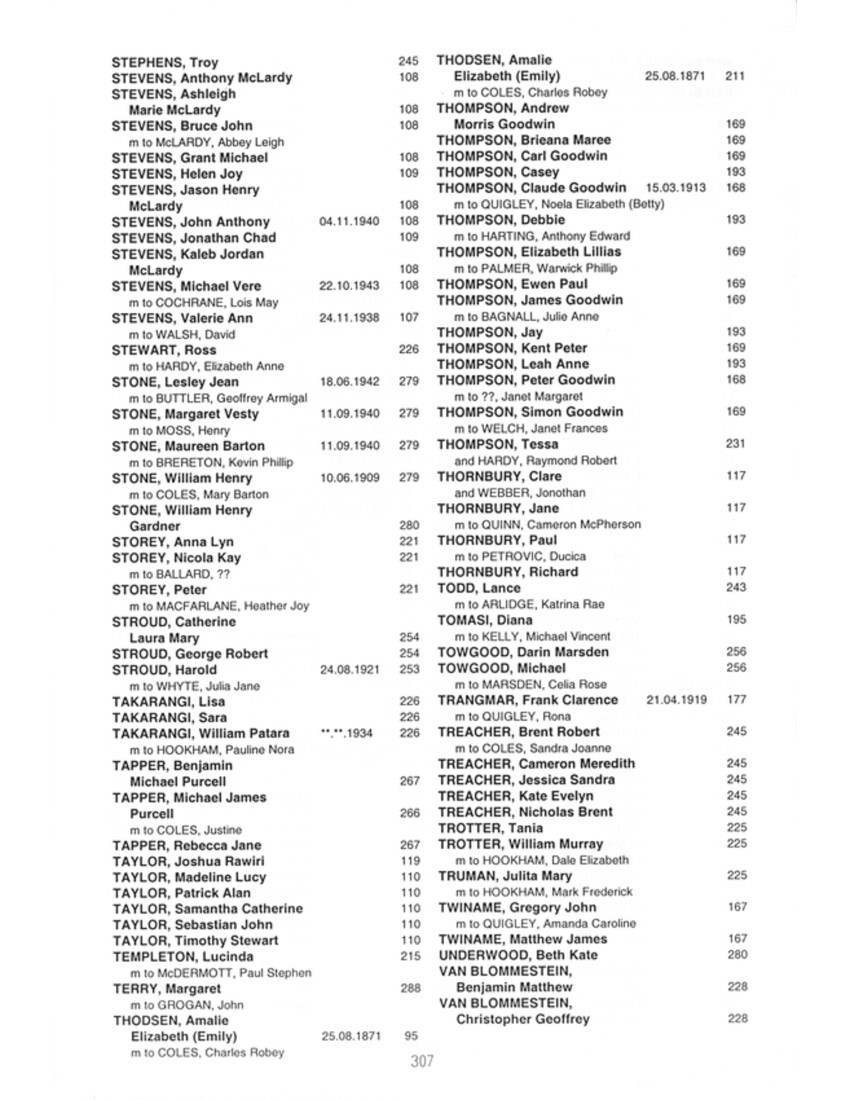
Page 308
VAN BLOMMESTEIN, John […] 228
m to HARDY, Philippa Ann
VAN BLOMMESTEIN, Johnathon William […] 228
VAN BLOMMESTEIN, Katherine Margaret […] 228
VAN BLOMMESTEIN, Rosemary Alice […] 228
VAN HARDENBROEK, Denise […] 178
m to WHIBLEY, John
VAN MARREWIJK, Wilhelmus Johannes […] 181
m to QUIGLEY, Tania
VERSEY, Gavin […] 220
VERSEY, John […] 220
m to CLAY, Chris
VERSEY, Shjaan […] 220
VESTY, Alice 02.04.1888 95
m to COLES, Frederick Purkis
VESTY, Alice 02.04.1888 259
m to COLES, Frederick Purkis
VESTY, Margaret 27.11.1875 95
m to COLES, Samuel Arthur
VESTY, Margaret 27.11.1875 272
m to COLES, Samuel Arthur
VIGOR-BROWN, Nicholas John […] 183
VIGOR-BROWN, Robert 02.05.1954 183
m to KING, Rosemary Jane
VIGOR-BROWN, Thomas Charles […] 183
VIGOR-BROWN, William […] 183
WALKER, Albert Redgrave Ferrier […] 185
WALKER, Fay Constance 09.08.1928 250
m to MILNE, Ronald Henry
WALKER, Peter […] 184
m to REDGRAVE, Christina Frances
WALLACE, Haylee Elizabeth […] 220
WALLACE, Ken […] 220
m to CLAY, Margaret
WALLACE, Kirsty Ann […] 220
WALLACE, Melissa Helen […] 220
WALLIS, Arnold Robert 02.10.1939 259
m to ROBERTSON, Jean Lynette
WALLIS, Linda Claire […] 260
WALLIS, Roger Frederick […] 259
m to HAY, Corrine
WALLIS, Stephen James […] 259
WALSH, Antony David […] 108
WALSH, Lisa Carolyn […] 108
WALSHE, Teresa Mary […] 200
m to COLES, Peter William
WASHINGTON, Kate Rebecca […] 230
m to HARDY, Andrew Laurence
WATSON, Janice Ruth […] 66
m to MILNE, Andrew Kenderine
WATT, Allan Ford […] 256
WATT, David […] 256
m to MARSDEN, Juliet Kay
WATT, Erin Sarah […] 256
WELCH, Janet Frances […] 169
m to THOMPSON, Simon Goodwin
WEST, Dale 25.03.1943 227
m to JOSLING, Susan Linda
WEST, Danielle Sophie […] 180
WEST, Noel Graham […] 180
and WHIBLEY, Dianne Maree
WEST, Tahlia Kacey […] 180
WESTON, Donna […] 192
m to HARTING, Anthony Edward
WHIBLEY, Alan James 27.08.1922 177
m to QUIGLEY, Pamela Elaine
WHIBLEY, Dianne Maree […] 179
m to (1) BULLED, Ross James
WHIBLEY, Dianne Maree […] 180
and (2) WEST, Noel Graham
WHIBLEY, Graham Stanley […] 178
m to ROUNTREE, Maureen
WHIBLEY, Inge Marion […] 178
WHIBLEY, Jack Allan […] 178
WHIBLEY, John […] 178
m to VAN HARDENBROEK, Denise
WHIBLEY, Lisa Marie […] 178
WHIBLEY, Lynette […] 179
m to BAYLIS, Russell David
WHIBLEY, Michael […] 179
WHIBLEY, Paul Jason […] 178
WHIBLEY, Peter […] 178
m to ??, Robyn
WHIBLEY, Rosemary Clare […] 178
WHITE, Eila Jessie 27.08.1912 254
m to WHYTE, Charles Russell
WHITEHEAD, Les […] 253
m to WHYTE, Marie
WHITTINGTON, John 02.07.1925 251
m to MILNE, Elva Margaret
WHYTE, Beth […] 253
m to ??, ??
WHYTE, Beverly Ann 27.08.1938 256
WHYTE, Charles Russell 13.12.1906 254
m to WHITE, Eila Jessie
WHYTE, Desmond Russell 15.04.1935 255
m to NORTHE, Rosa
WHYTE, Edward […] 254
WHYTE, Ernest Robert 07.04.1900 253
m to GLAZEBROOK, Nora
WHYTE, Harry 27.12.1895 253
m to BULL, Ruby
WHYTE, Harry James
William Strachan **.**.1870 95
m to COLES, Kate Emily
WHYTE, Harry James
William Strachan **.**.1870 253
m to COLES, Kate Emily
WHYTE, Jeannie Margaret 25.01.1933 254
m to HUNT, Jack Peter
WHYTE, Jerome Glazebrook 16.12.1932 254
m to ZOHRAB, Ann
WHYTE, Julia […] 254
m to CHRYSTALL, Richard
WHYTE, Julia Jane 17.04.1930 253
m to STROUD, Harold
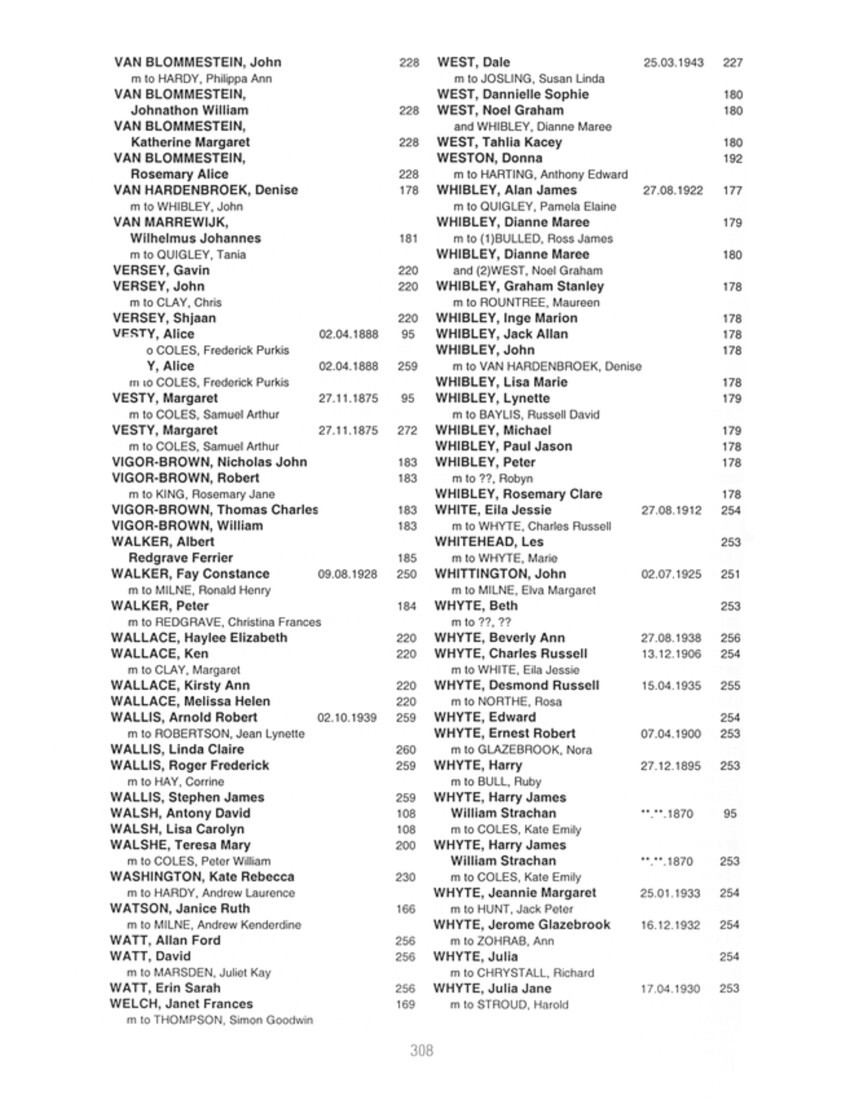
Page 309
WHYTE, Keith […] 253
WHYTE, Marie […] 253
m to WHITEHEAD, Les
WHYTE, Mary […]
m to MEEUWS, Lucien Desire
WHYTE, Philippa Douglas 29.10.1936 255
m to (1) MARSDEN, Francis Watson
WHITE, Philippa Douglas 29.10.1936 256
m to (2) McCORD, John
WHYTE, Sarah Elizabeth (Sal) 06.04.1932 254
WHYTE, Terence Charles 06.03.1934 255
m to ALLEN, Judith Rae
WHYTE, Vera […] 254
m to McNEILL, Alex
WIIG, Lynley Jane […] 197
m to KEEHAN, Daniel Joseph
WILD, Alexander Joseph […] 114
WILD, Madeline Jane […] 114
WILD, Thomas Henry […] 114
WILLIAMS, Alan Vincent 11.03.1916 172
m to QUIGLEY, Barbara Muriel
WILLIAMS, Anthony Alan […] 175
m to HOUSTON, Marie Lillian
WILLIAMS, Benjamin Alan […] 175
WILLIAMS, Bruce Alan […] 175
WILLIAMS, Kelly Marie […] 175
WILLIAMS, Mark Justin […] 174
WILLIAMS, Nicola Anne (Nicky) 05.01.174 xxxx
m to BUTLER, Stephen Ross
WILLIAMS, Richard John […] 175
m to HARRIS, Angela
WILLIAMS, Roger Neville […] 173
m to MILLYNN, Janice Margaret
WILSON, Maureen […] 246
m to COLES, Harley Maurice
WINCHESTER, Caitlyn Rose […] 210
WINCHESTER, Gavin […] 201
m to COLES, Bridgette Therese
WOOD, Christine Elizabeth […] 265
m to ROBERTSON, Barry Alexander
WOOD, Lesley […] 221
m to MACFARLANE, Grant Leslie
WOOD, Sandra Mary […] 266
WOTHERSPOON, Jack Roby […] 224
WOTHERSPOON, Robert Malcolm […] 224
m to COLES, Kate Ingrid
WYLIE, Isabel Mary 14.05.1899 250
m to MILNE, Eric Conway
ZOHRAB, Ann 28.03.1937
m to WHYTE, Jerome Glazebrook
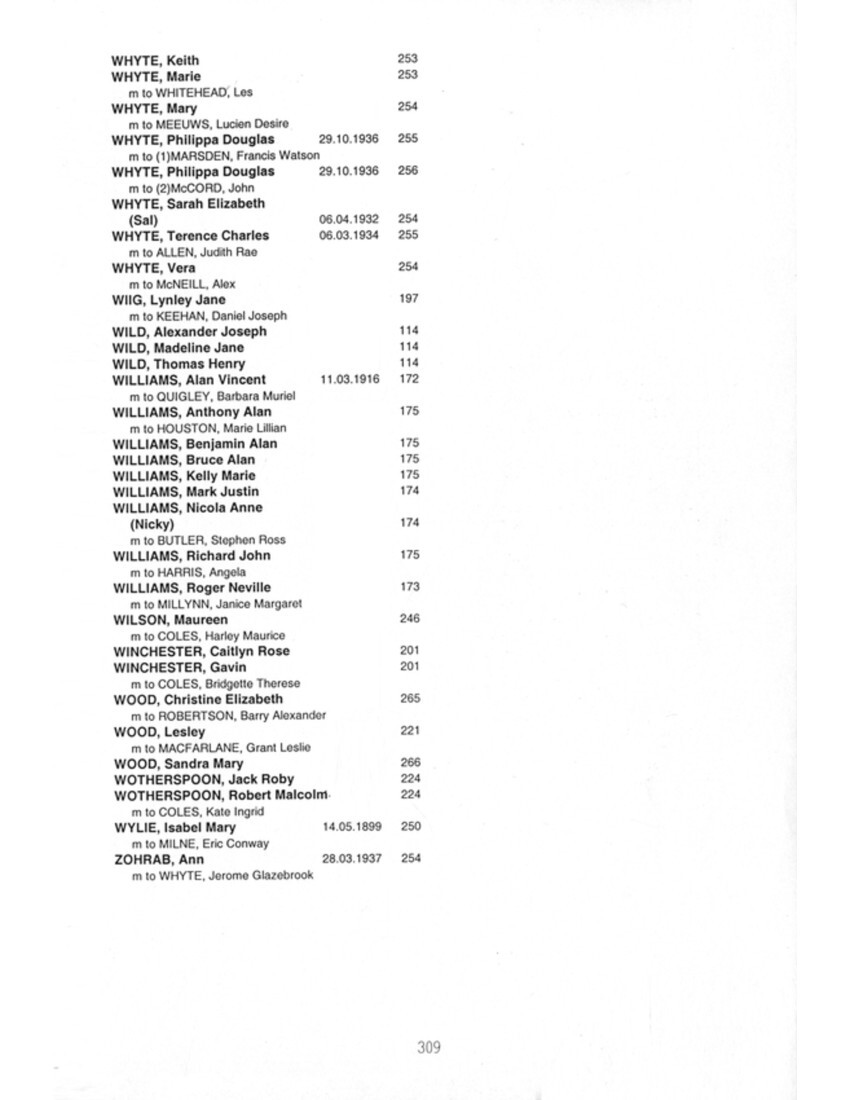
Non-commercial use

This work is licensed under a Attribution-NonCommercial 3.0 New Zealand (CC BY-NC 3.0 NZ).
Commercial Use
Please contact us for information about using this material commercially.Can you help?
The Hawke's Bay Knowledge Bank relies on donations to make this material available. Please consider making a donation towards preserving our local history.
Visit our donations page for more information.
Description
References to birth dates and biographical information about individuals born after 1944 have been redacted in line with the Knowledge Bank’s policy and are indicated in the text by […]. The full version is available from the Knowledge Bank.
Subjects
Tags
Format of the original
Book paperbackDate published
2000Creator / Author
- Rex and Adriene Evans, Evagean Publishing

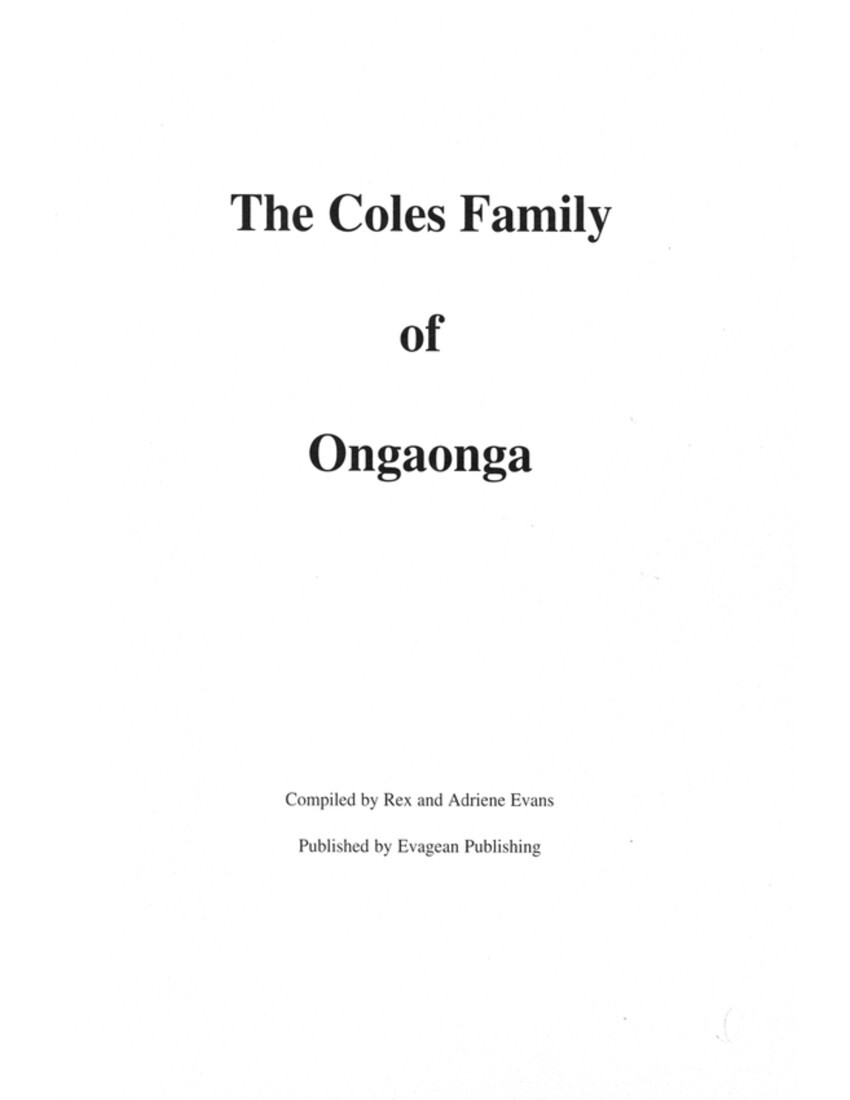
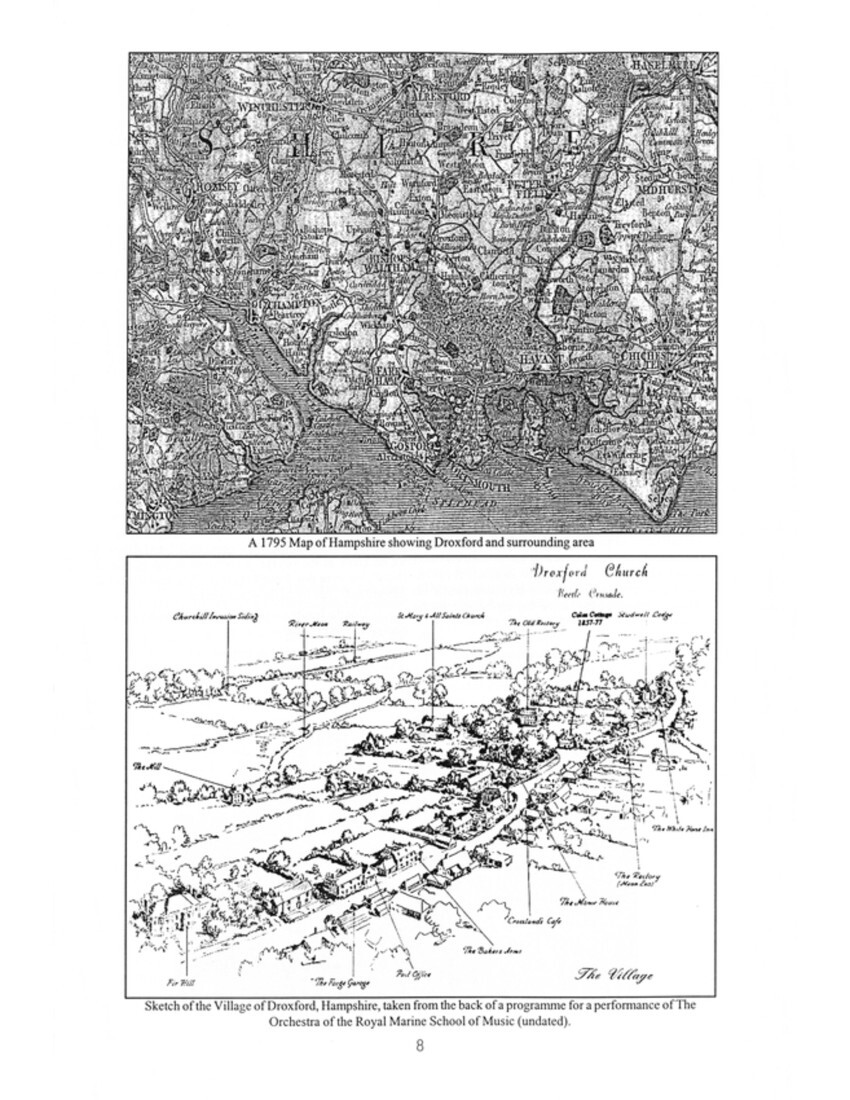
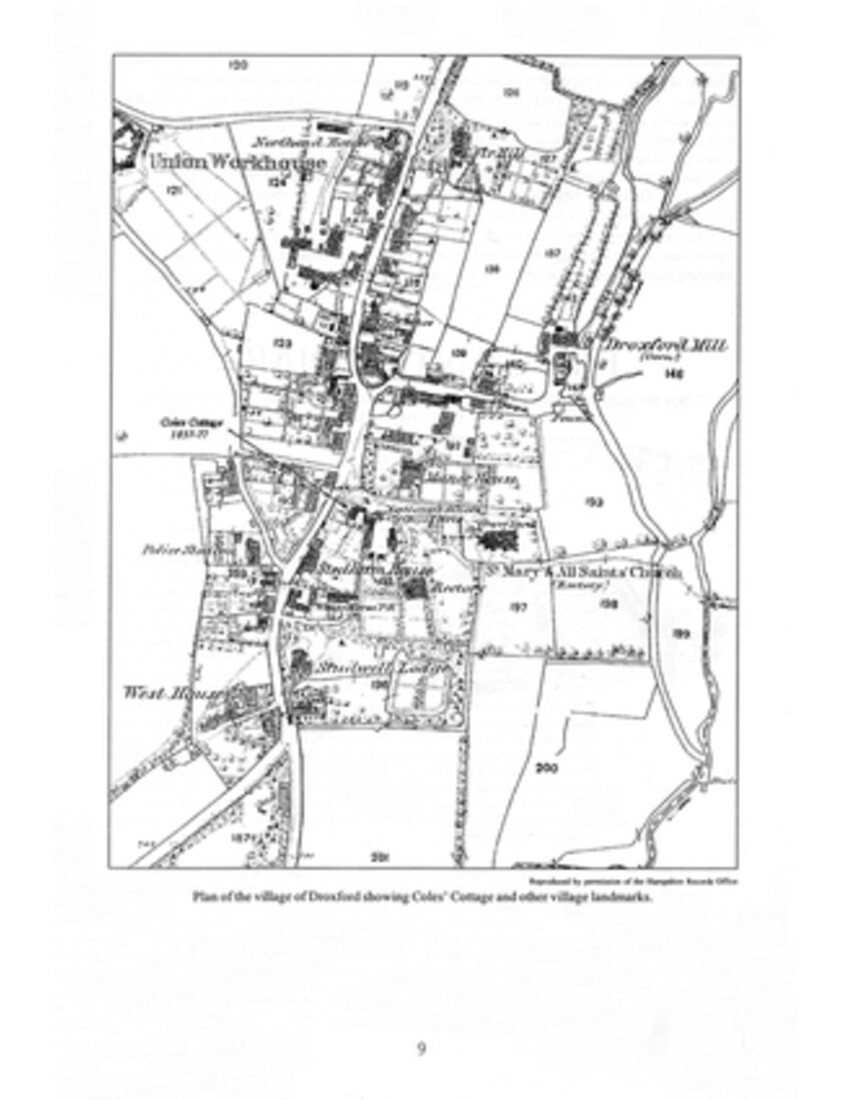
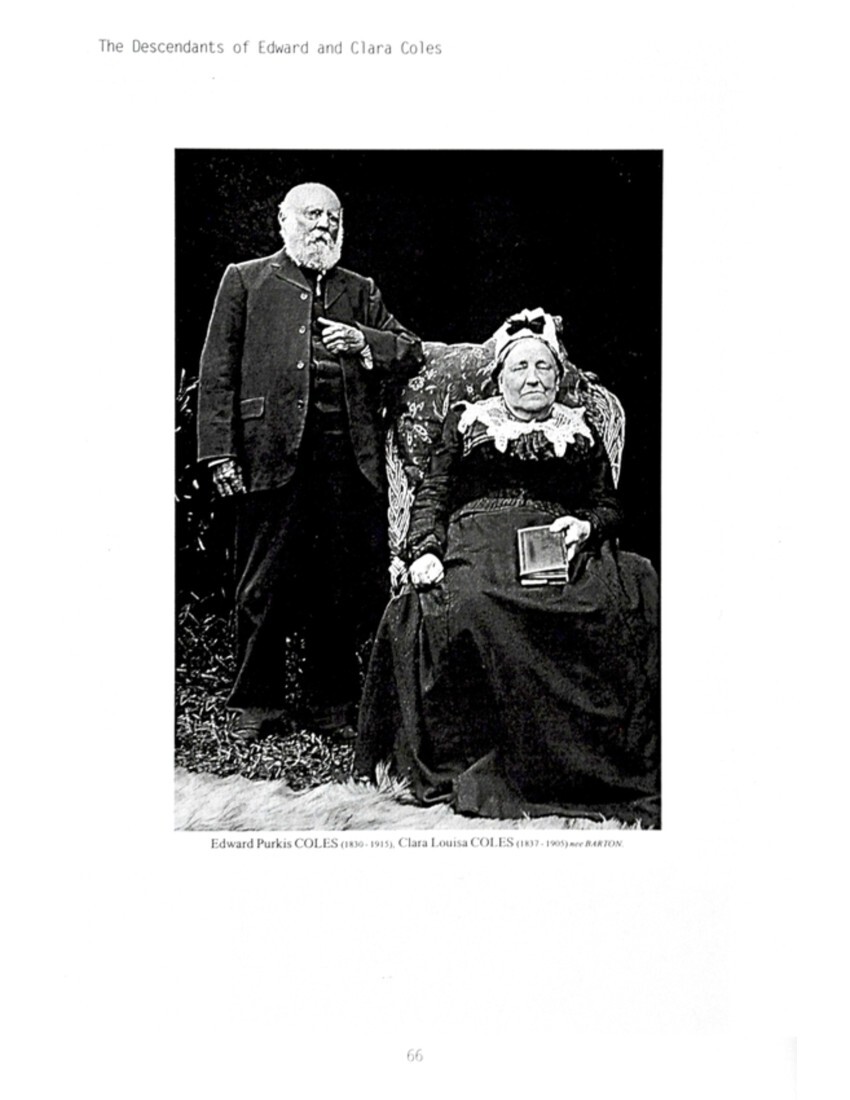
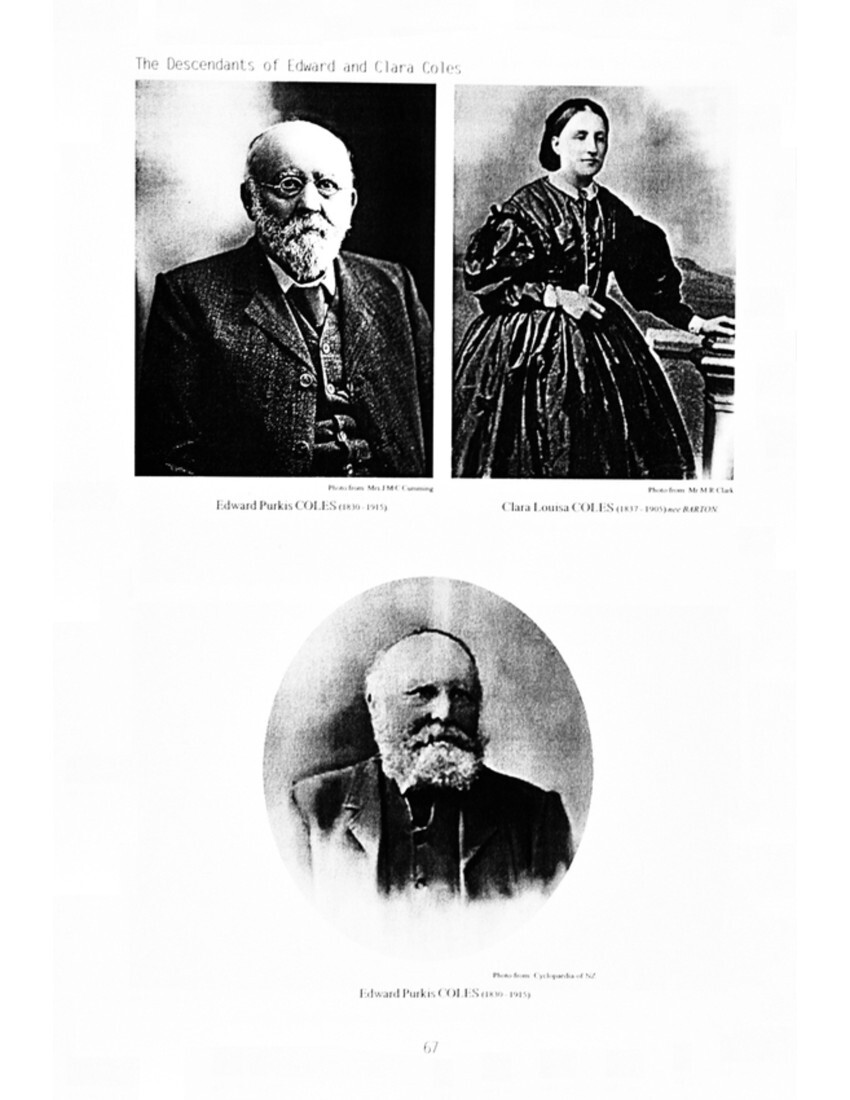
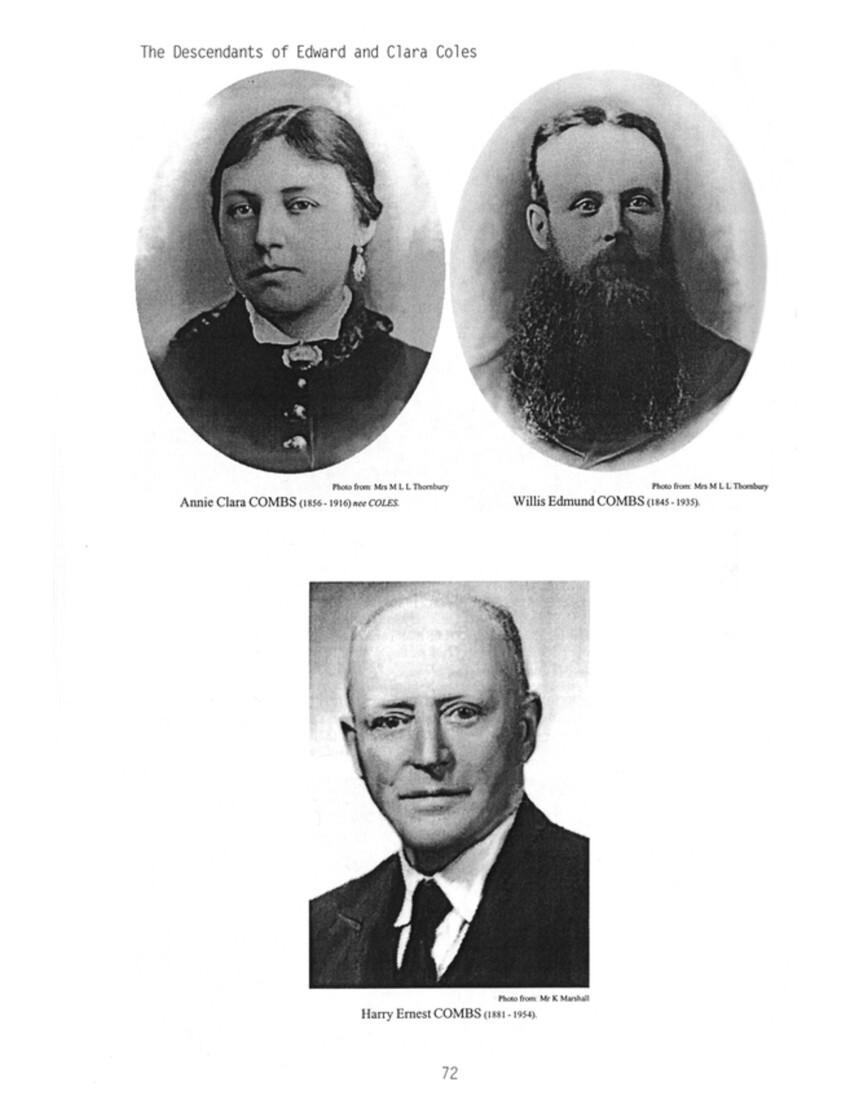
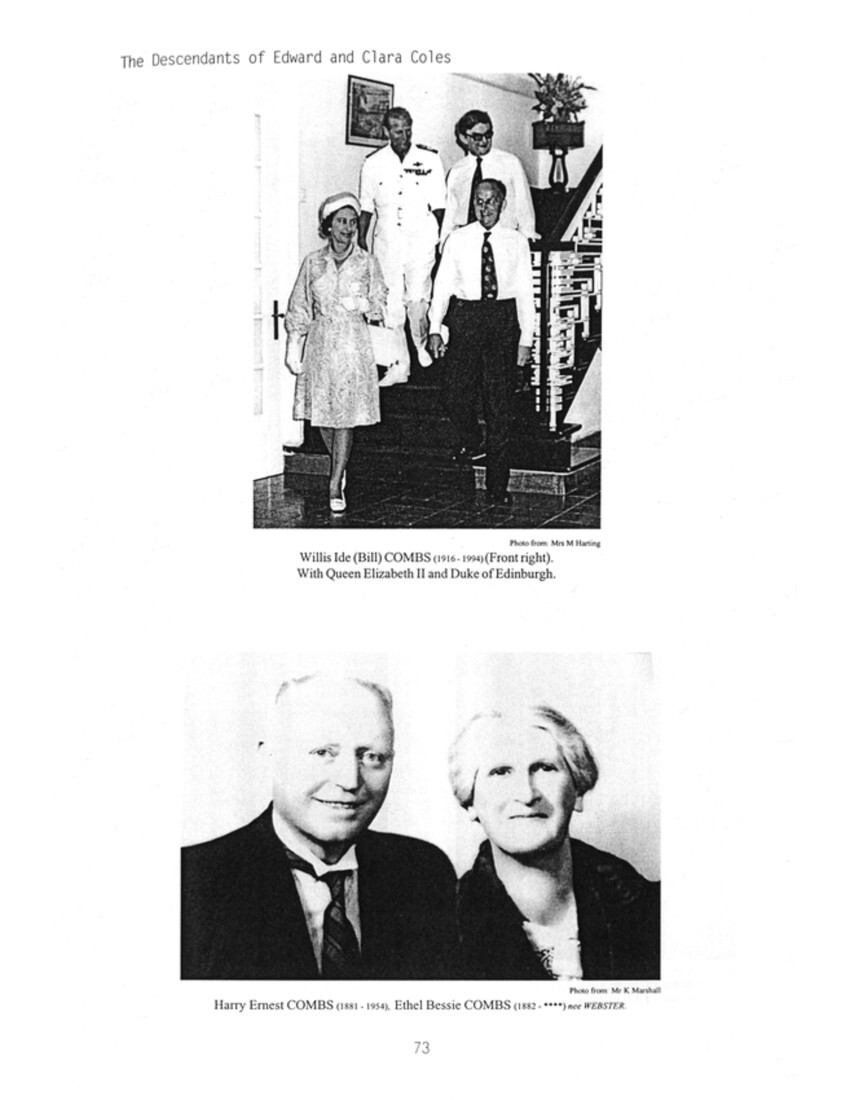
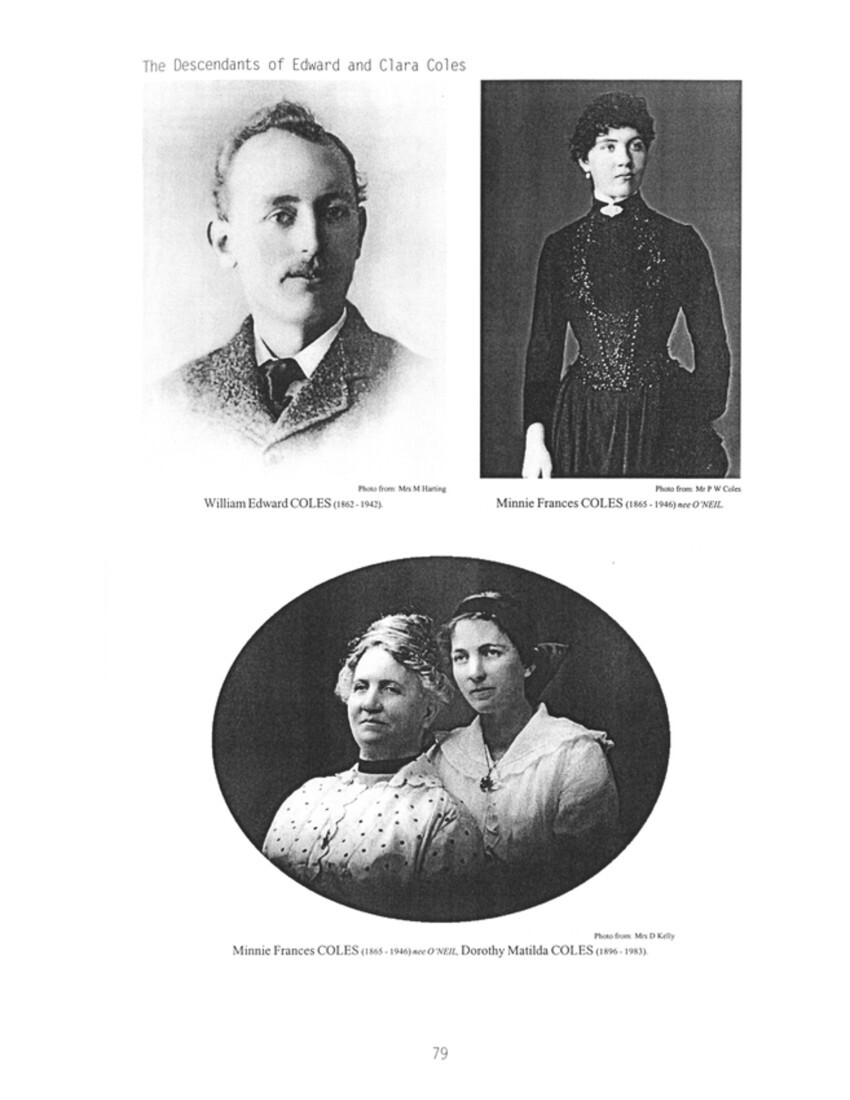
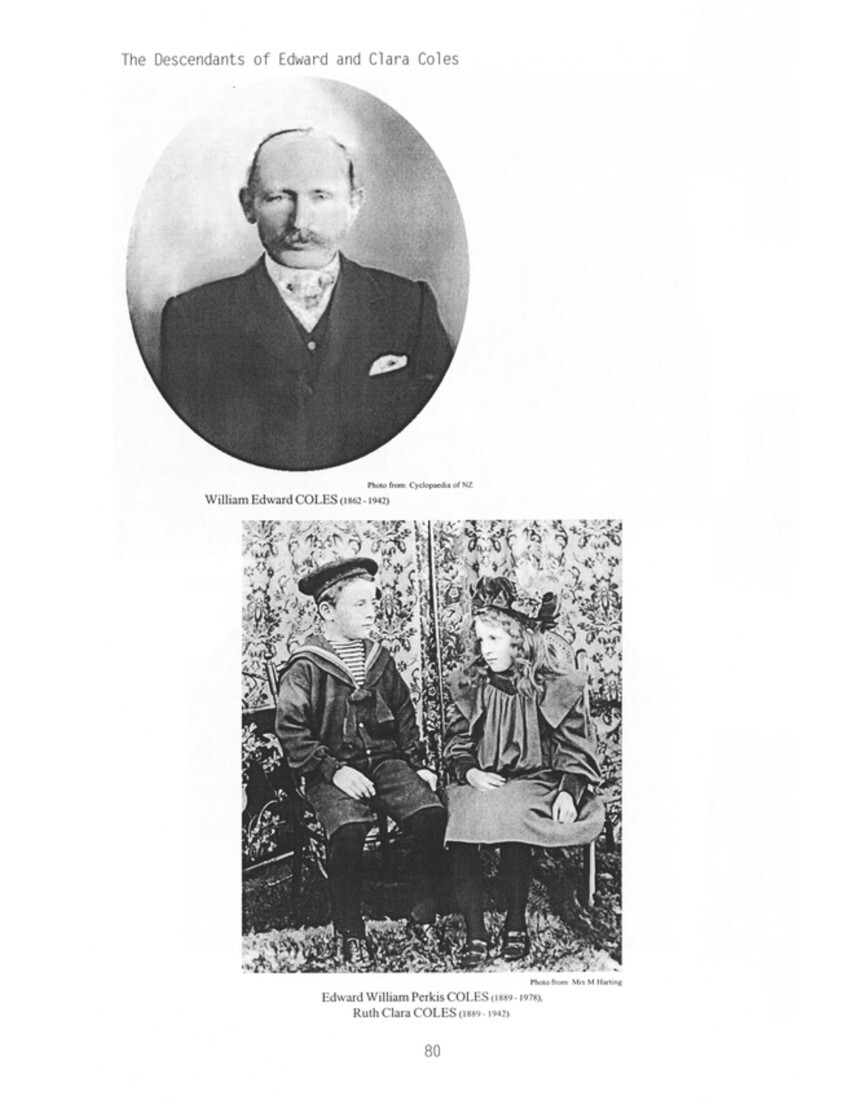
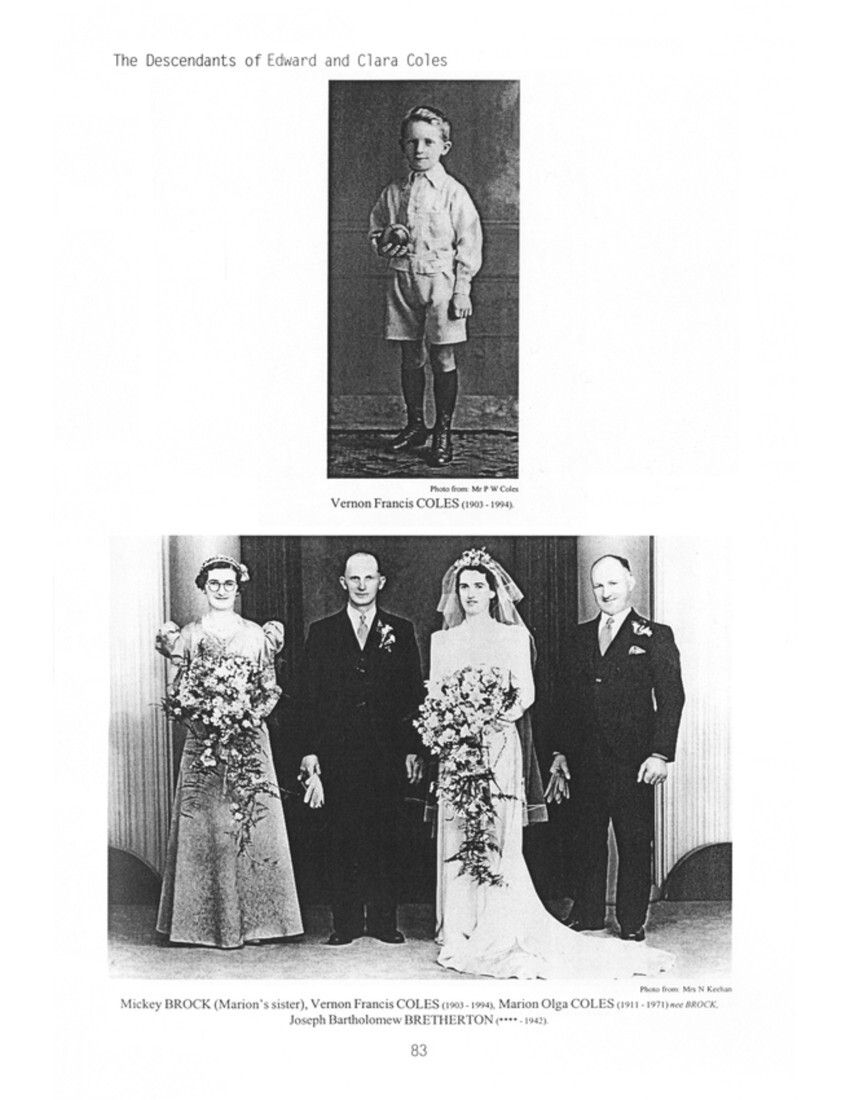
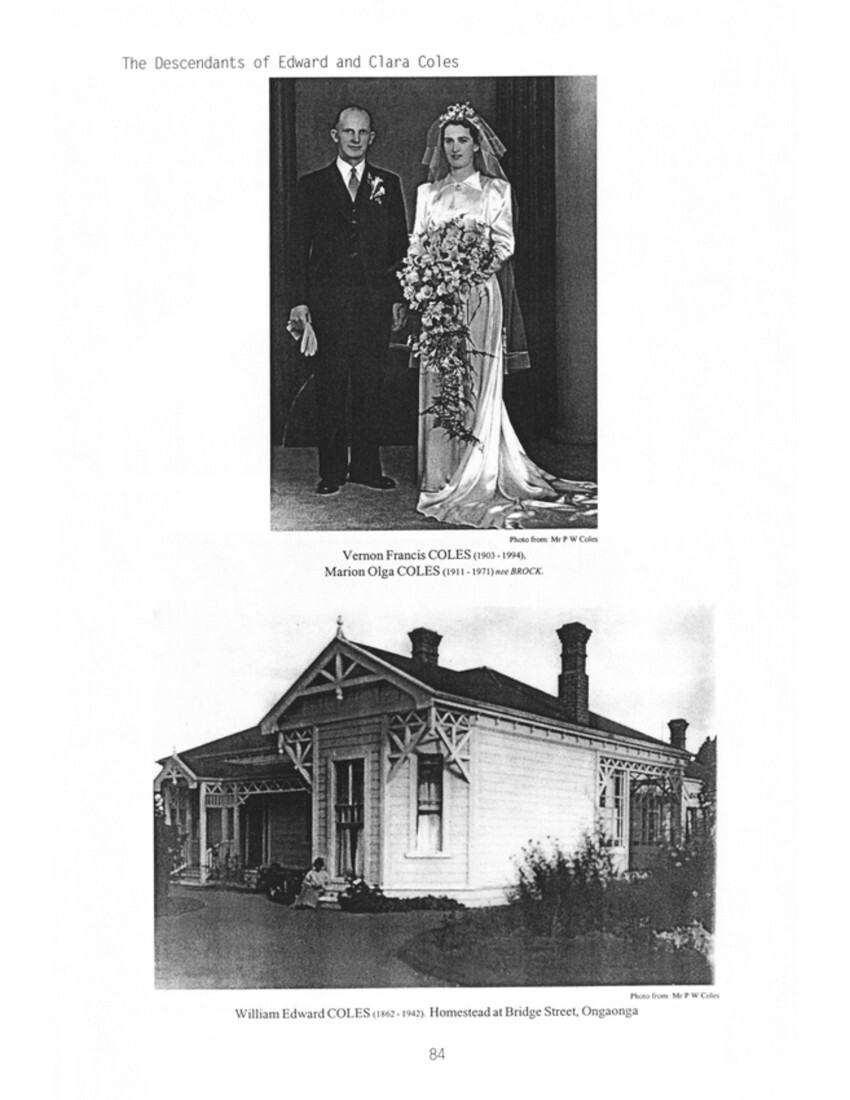
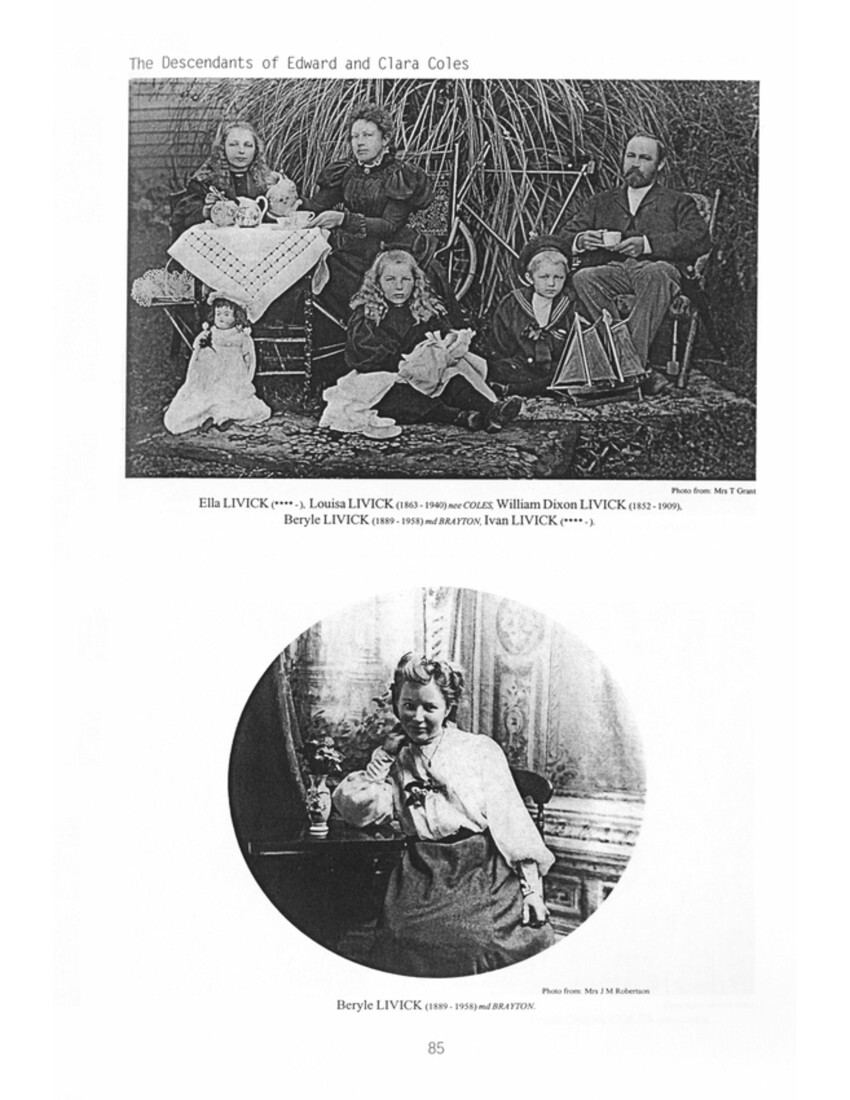
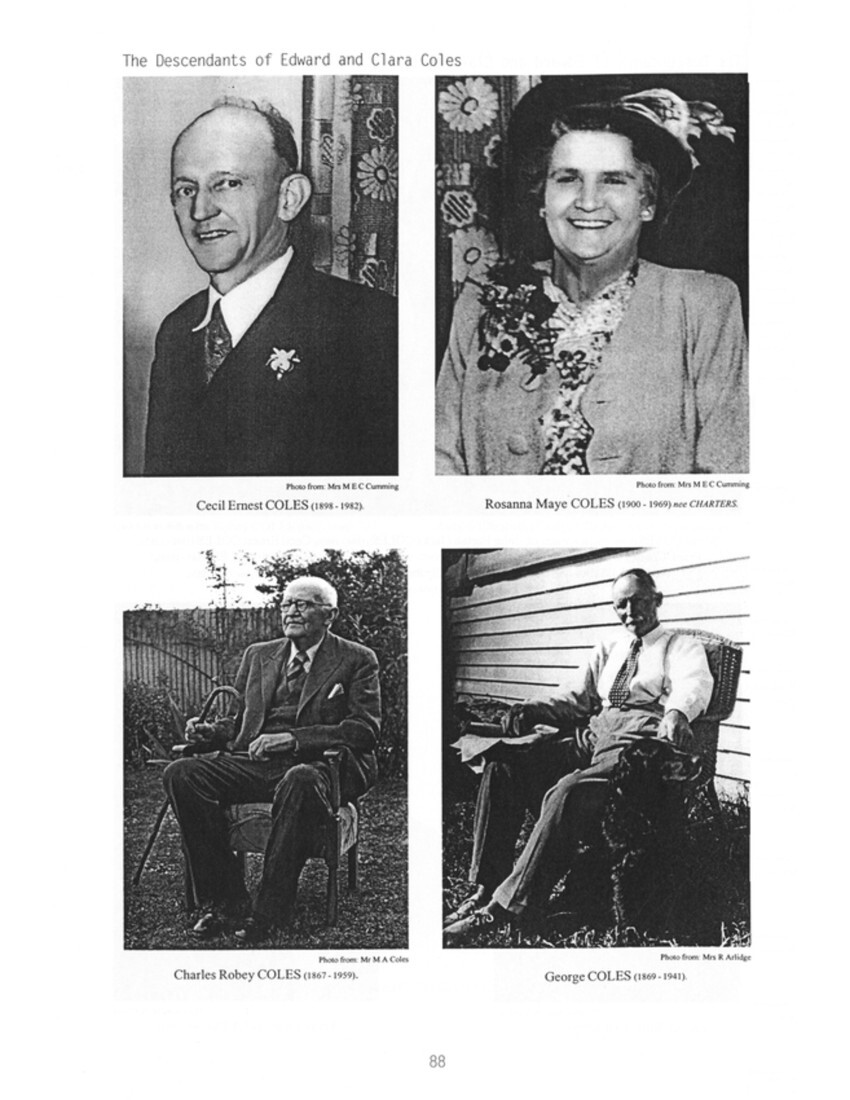

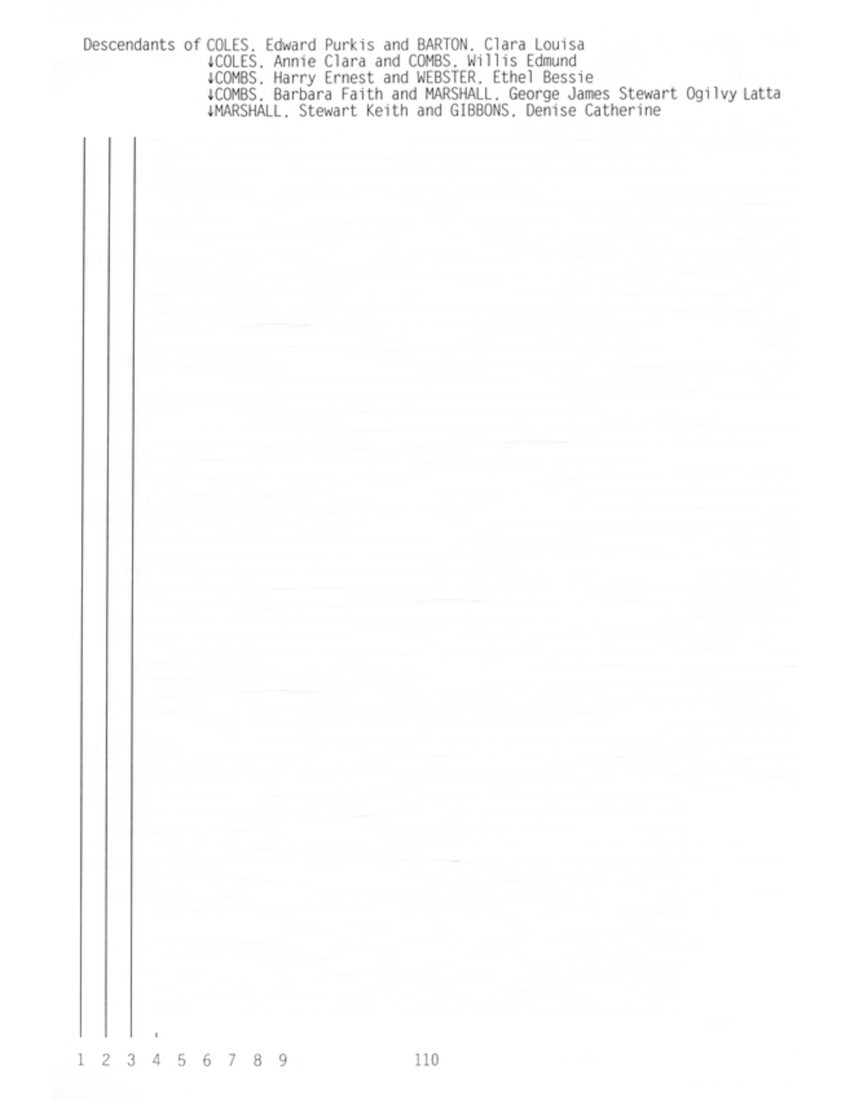

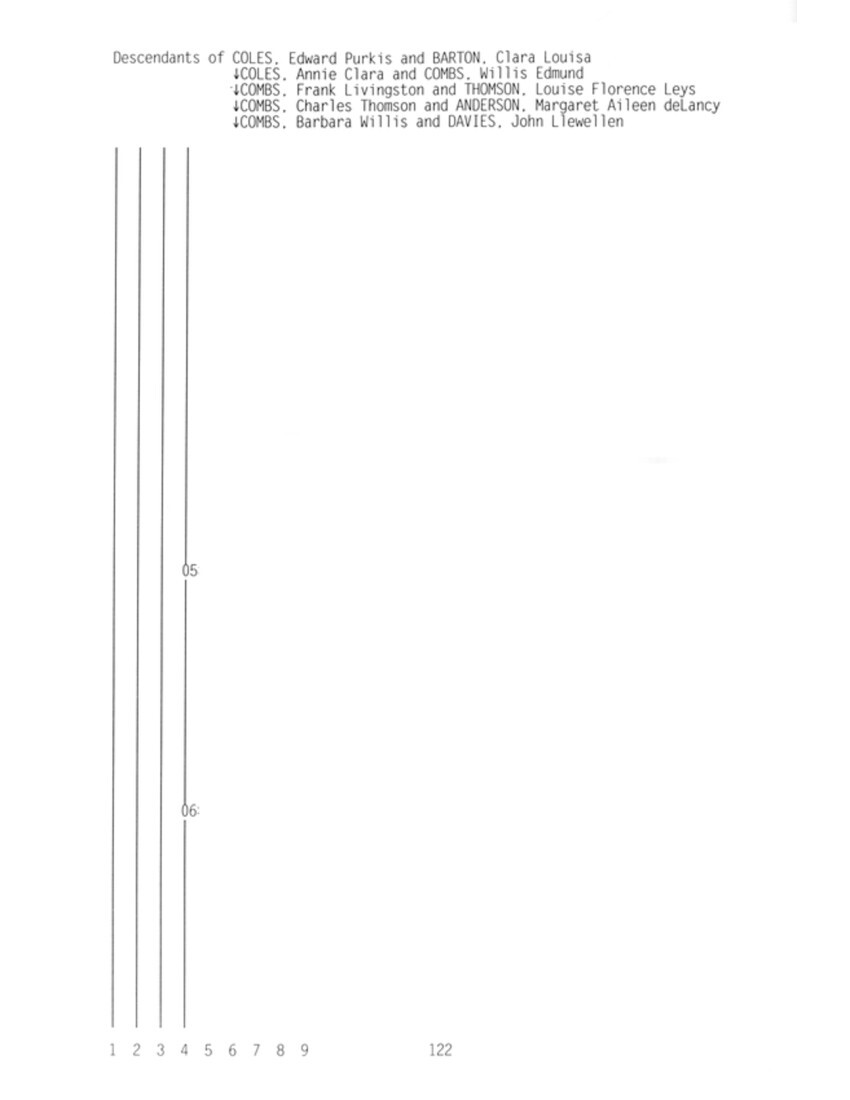





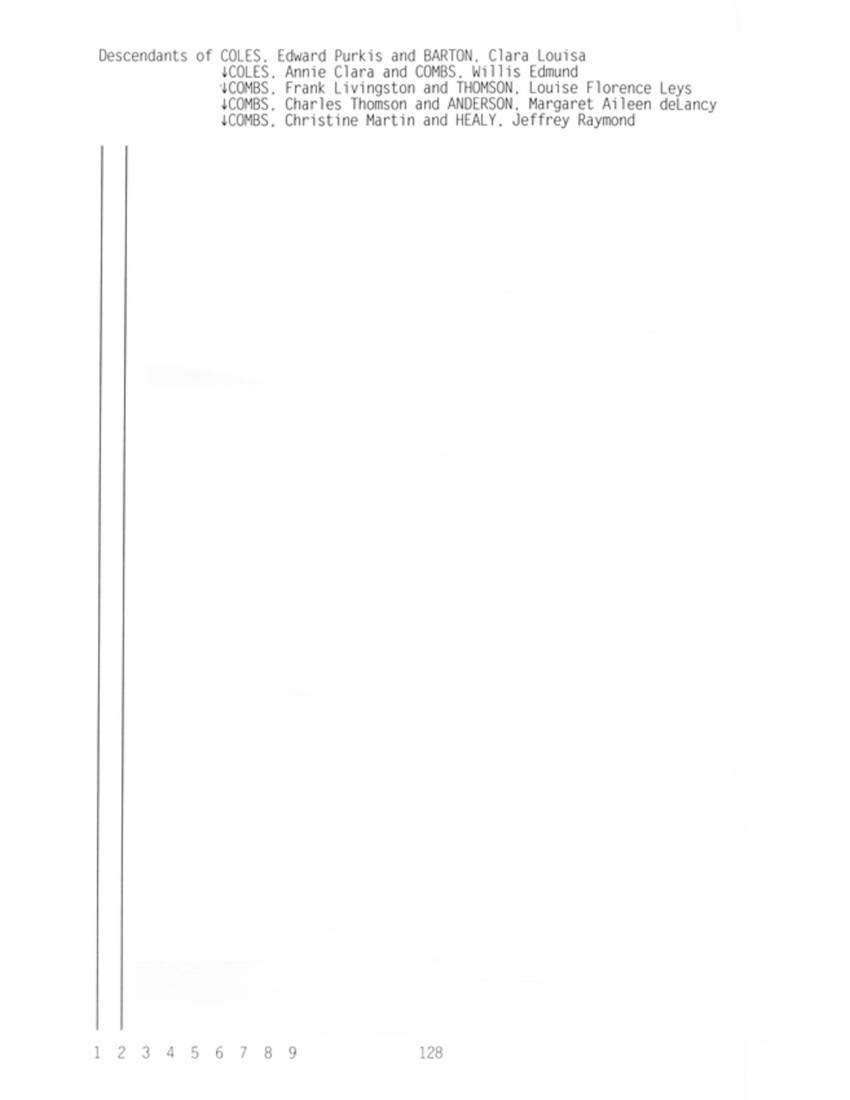



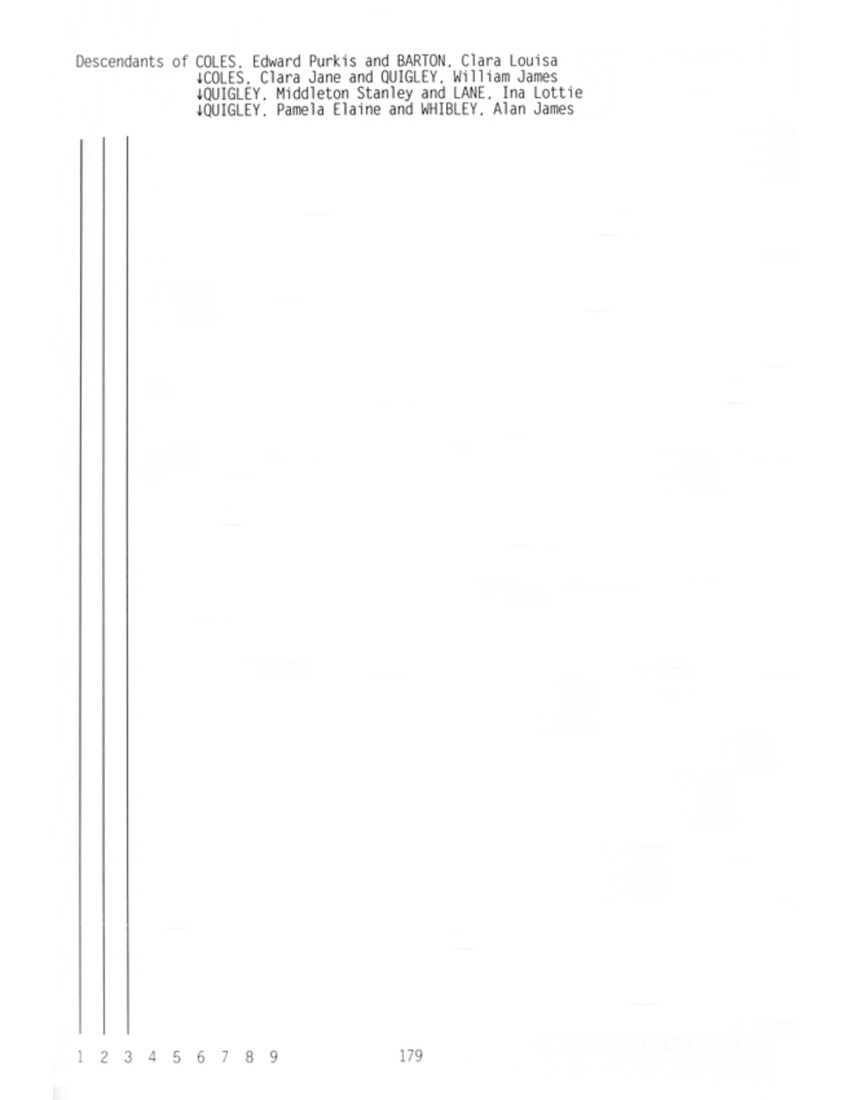

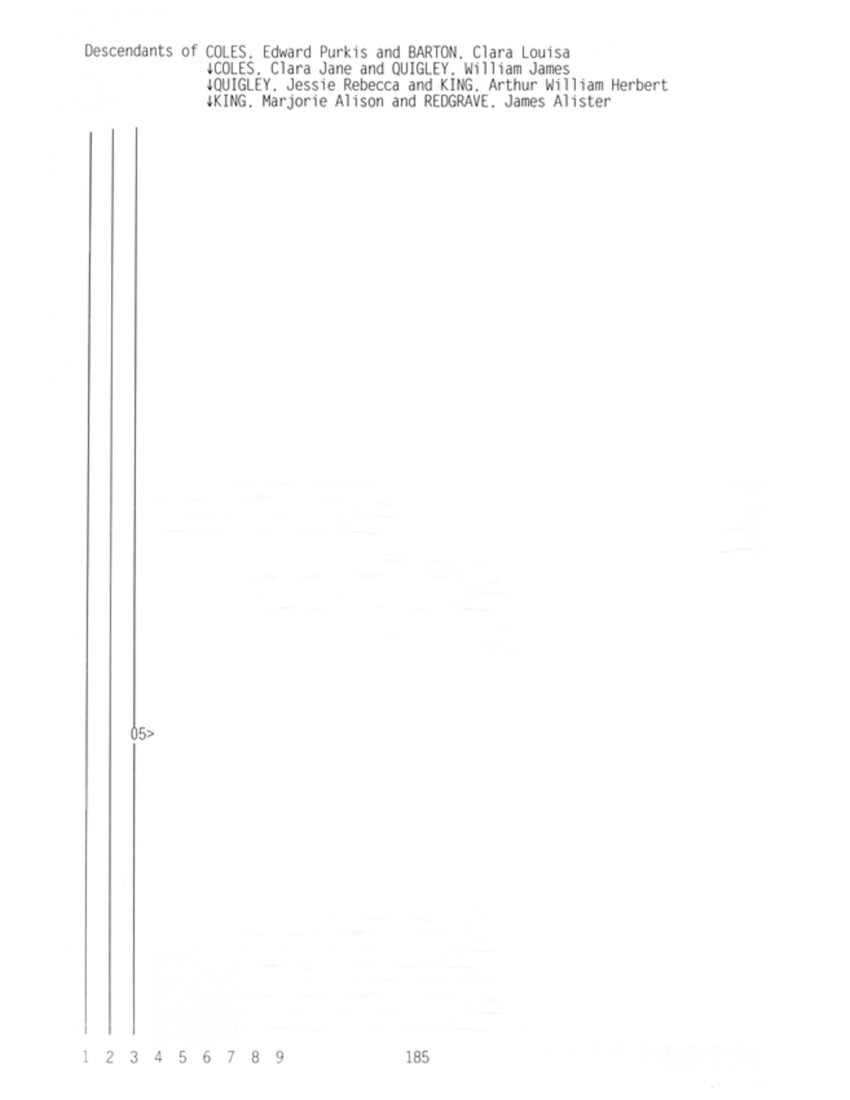

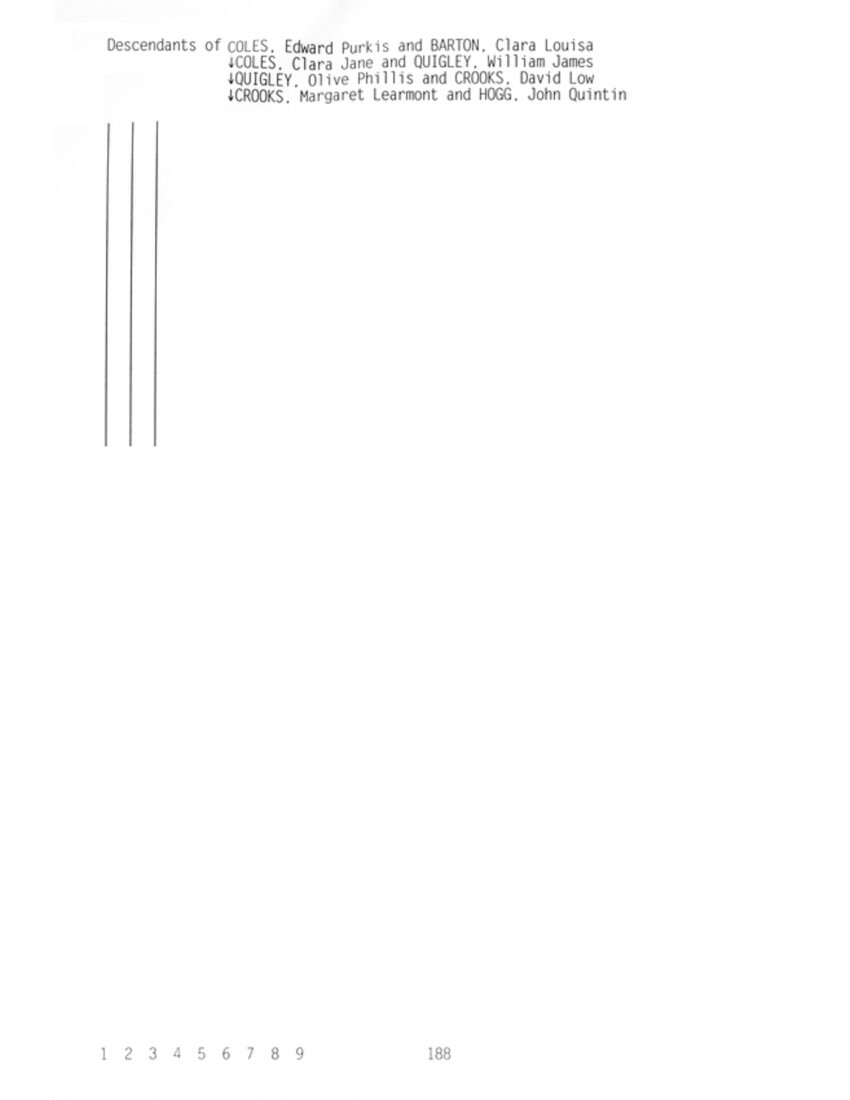
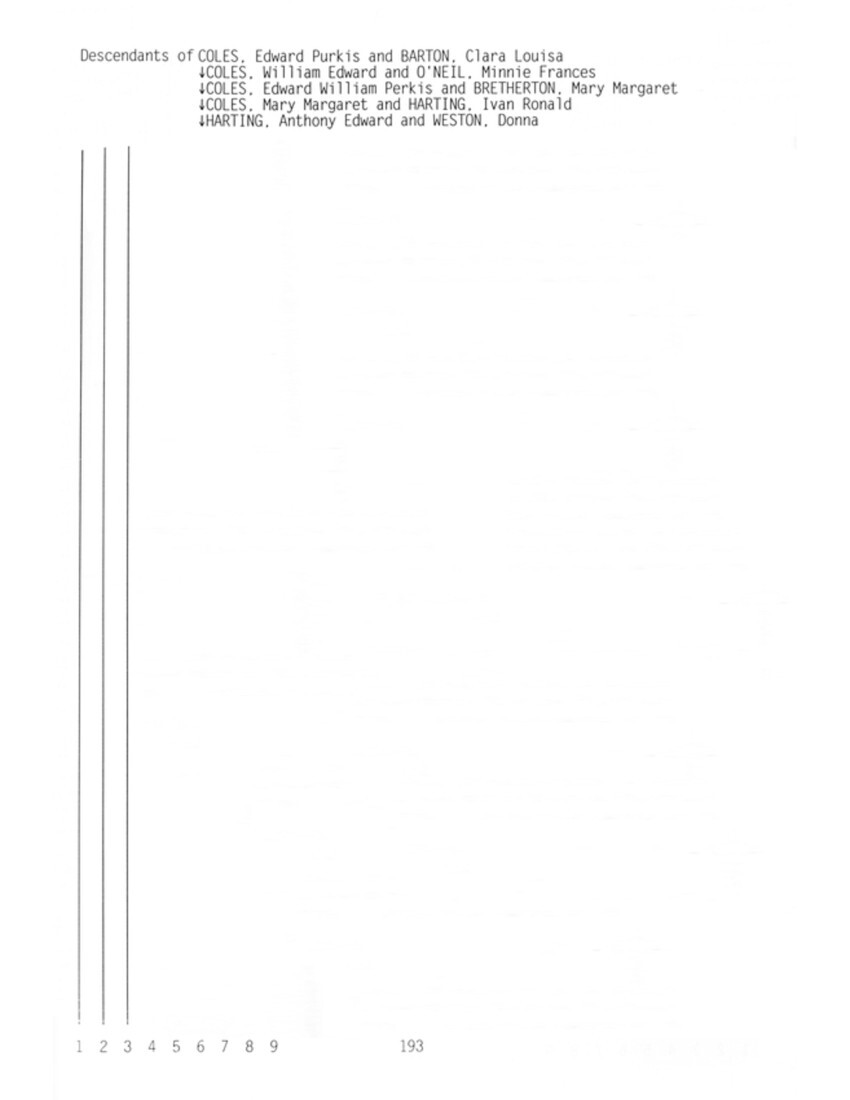







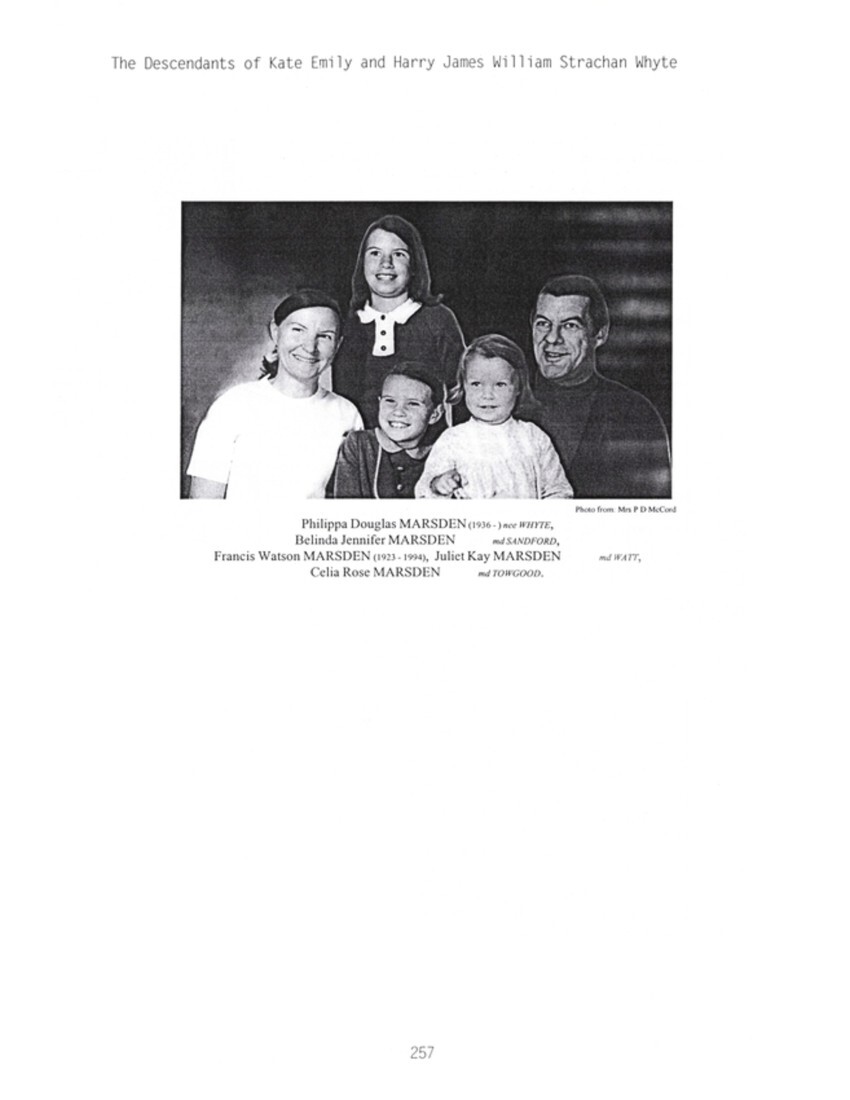





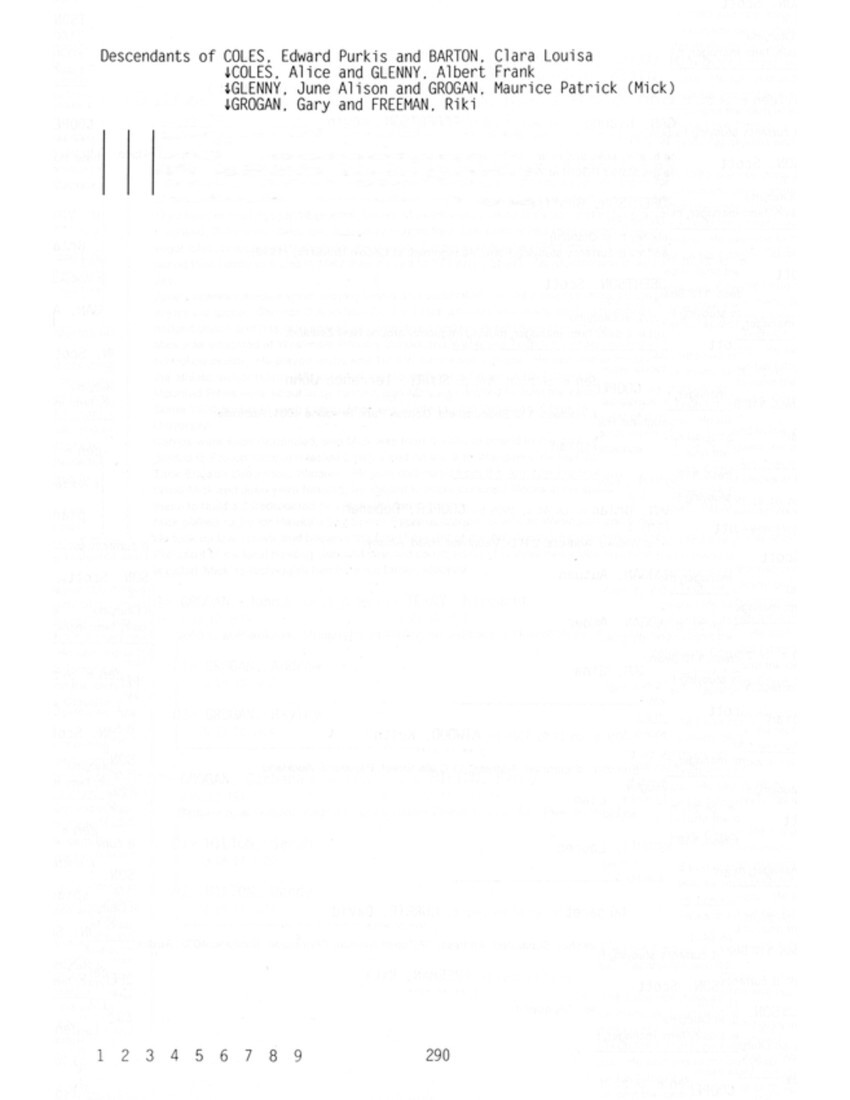









Do you know something about this record?
Please note we cannot verify the accuracy of any information posted by the community.